
Publication of TriQuarterly is made possible in part by the donors of gifts and grants to the magazine. For their recent and continuing support, we are very pleased to thank the Illinois Arts Council, the John D. and Catherine T. MacArthur Foundation, and many individual donors. Major new marketing initiatives at TriQuarterly have been made possible by the Lila Wallace Reader's Digest Literary Publishers Marketing Development Program, funded through a grant to the Council of Literary Magazines and Presses.
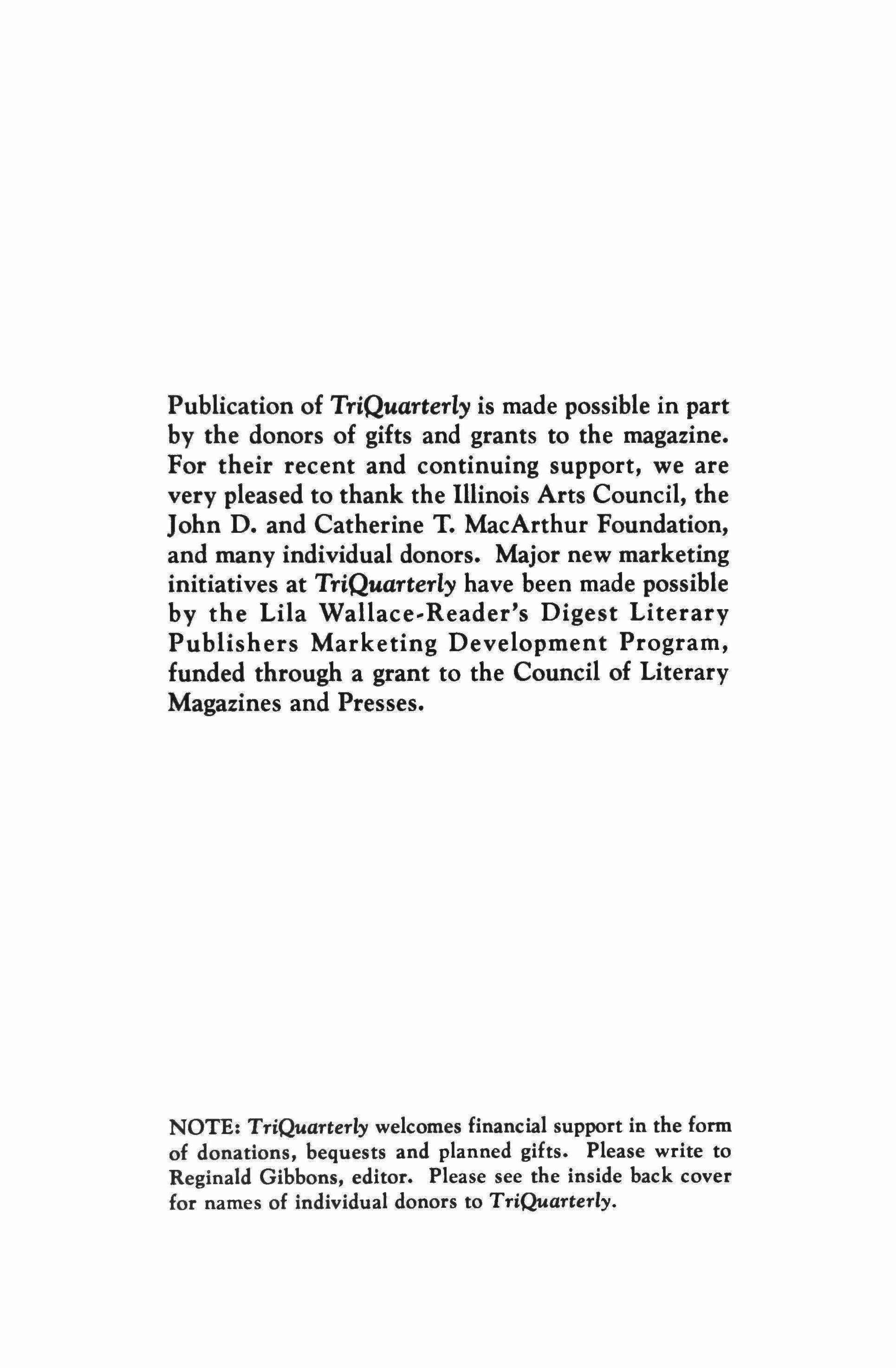
NOTE: TriQuarterly welcomes financial support in the form of donations, bequests and planned gifts. Please write to Reginald Gibbons, editor. Please see the inside back cover for names of individual donors to TriQuarterly.
Please sign me up for:
o a one-year subscription for $20.
o a two-year subscription for $36.
Foreign subscribersplease add $5 peryear.

Please begin my subscription with issue#
Please
o
SUBSCRIBE TO TRIQUARTERLY!
Please
SUBSCRIBE TO TRIQUARTERLY!
life
Name Address. Or call US toll-free at 800-832-3615 to charge it! BI86
o a
subscription for $500. o $ enclosed. o This is a renewal.
sign me up for:
a one-year subscription for $20.
two-year subscription for $36.
o a
please add $5
year.
Foreign subscribers
per
begin my subscription with issue# o a life subscription for $500. o $, enclosed. o This is a renewal. Name Address, Or call US toll-free at 800-832-3615 to charge it! BI86 GIVE TRIQUARTERLY! o $ Buy your first TriQuarlerly gift subscription for $20, and each additional gift subscription costs only $18!! 1st gift subscription ($20) Name Address Gift-card message Add $5/year forforeign subscriptions. enclosed. Name Address 2nd gift subscription ($18) Name Address Gift-card message BG86
TriQuarterly
NORTHWESTERN UNIVERSITY
2020 RIDGE AVE.
EVANSTON, IL 60208-4302
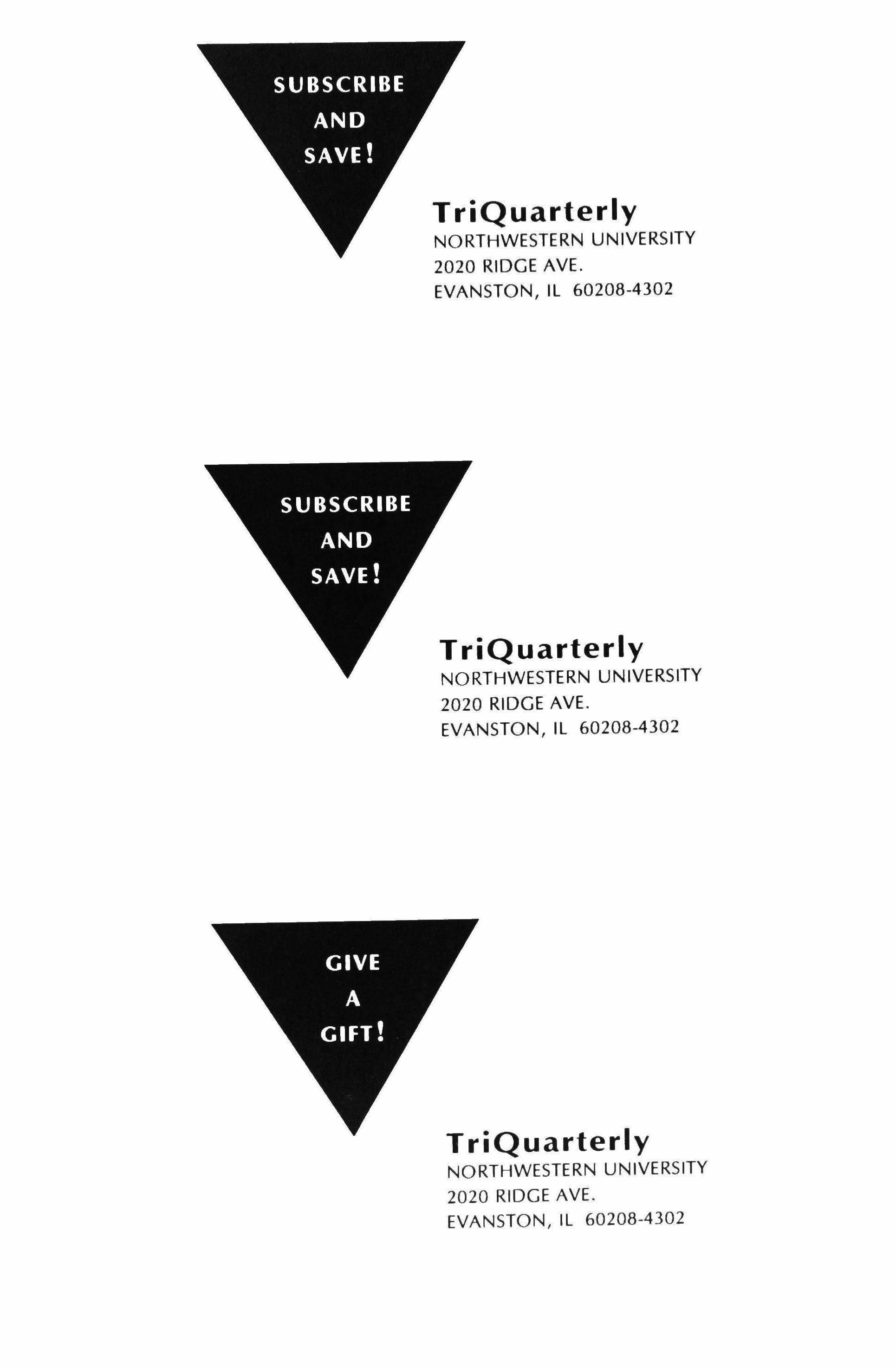
TriQuarterly
NORTHWESTERN UNIVERSITY
2020 RIDGE AVE.
EVANSTON, IL 60208-4302
TriQuarterly
NORTHWESTERN UNIVERSITY
2020 RIDGE AVE.
EVANSTON, IL 60208-4302
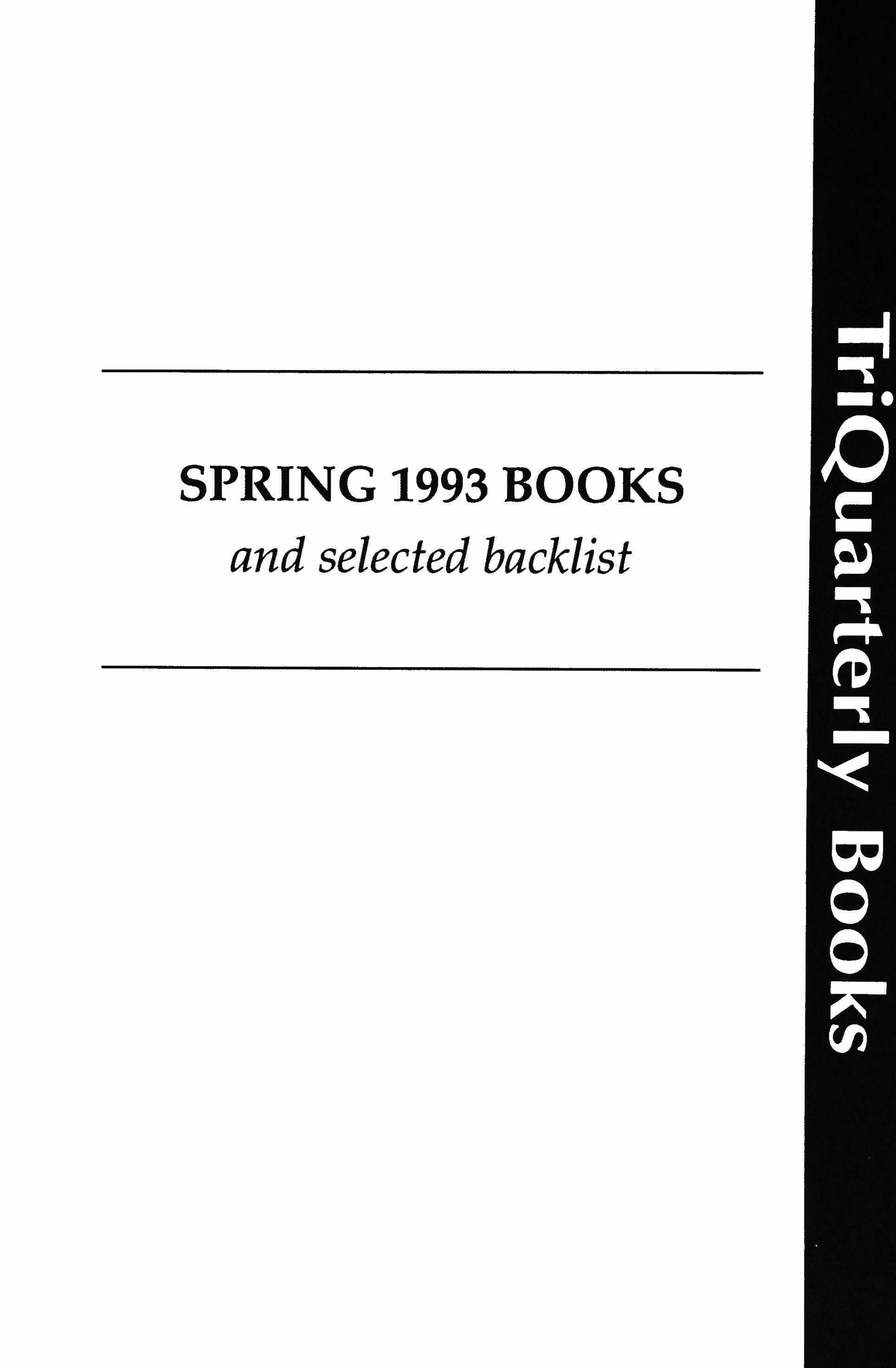
SPRING 1993 BOOKS and selected backlist
EVAN ZIMROTH
Dead, Dinner, or Naked
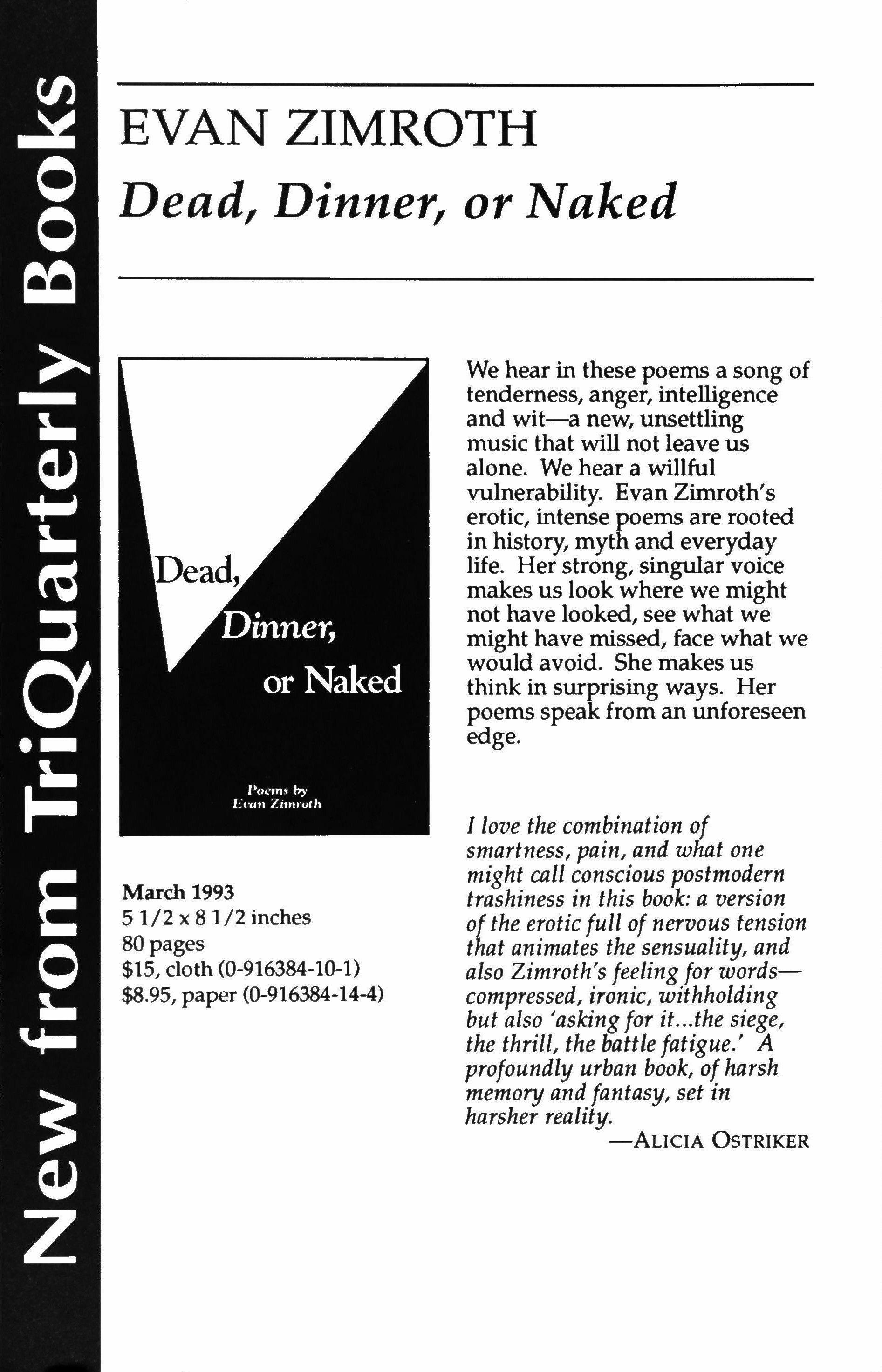
March 1993
51/2 x 81/2 inches
80 pages
$15, cloth (0-916384-10-1)
$8.95, paper (0-916384-14-4)
We hear in these poems a song of tenderness, anger, intelligence and wit-a new, unsettling music that will not leave us alone. We hear a willful vulnerability. Evan Zimroth's erotic, intense poems are rooted in history, myth and everyday life. Her strong, singular voice makes us look where we might not have looked, see what we might have missed, face what we would avoid. She makes us think in surprising ways. Her poems speak from an unforeseen edge.
I love the combination of smartness, pain, and what one might call conscious postmodern trashiness in this book: a version of the erotic full of nervous tension that animates the sensuality, and also Zimroth's feeling for wordscompressed, ironic, withholding but also 'askingfor it...the siege, the thrill, the battle fatigue.' A profoundly urban book, of harsh memory and fantasy, set in harsher reality.
-ALICIA OSTRIKER
On Hearing That Childbirth Is Like Orgasm
So, maybe it's not a maiming altogether but some weird daylong fairy-tale as the door opens into a new chateau and the moat closes over behind you. It's magic: like pricking your finger, the pin just some new animal, for your pleasure; a kind of tickle, you don't feel it anyway having gone somewhere beyond pain, your body limp and blooming as an anemone, 0 the lush stories to tell! the extravagance! the irresistible rules! to be strapped to stirrups, your wrists chained Classier even than The Story of0 it's what the good fairy promised and the good girls get: the kiss in the turret, the happy-ever-after.
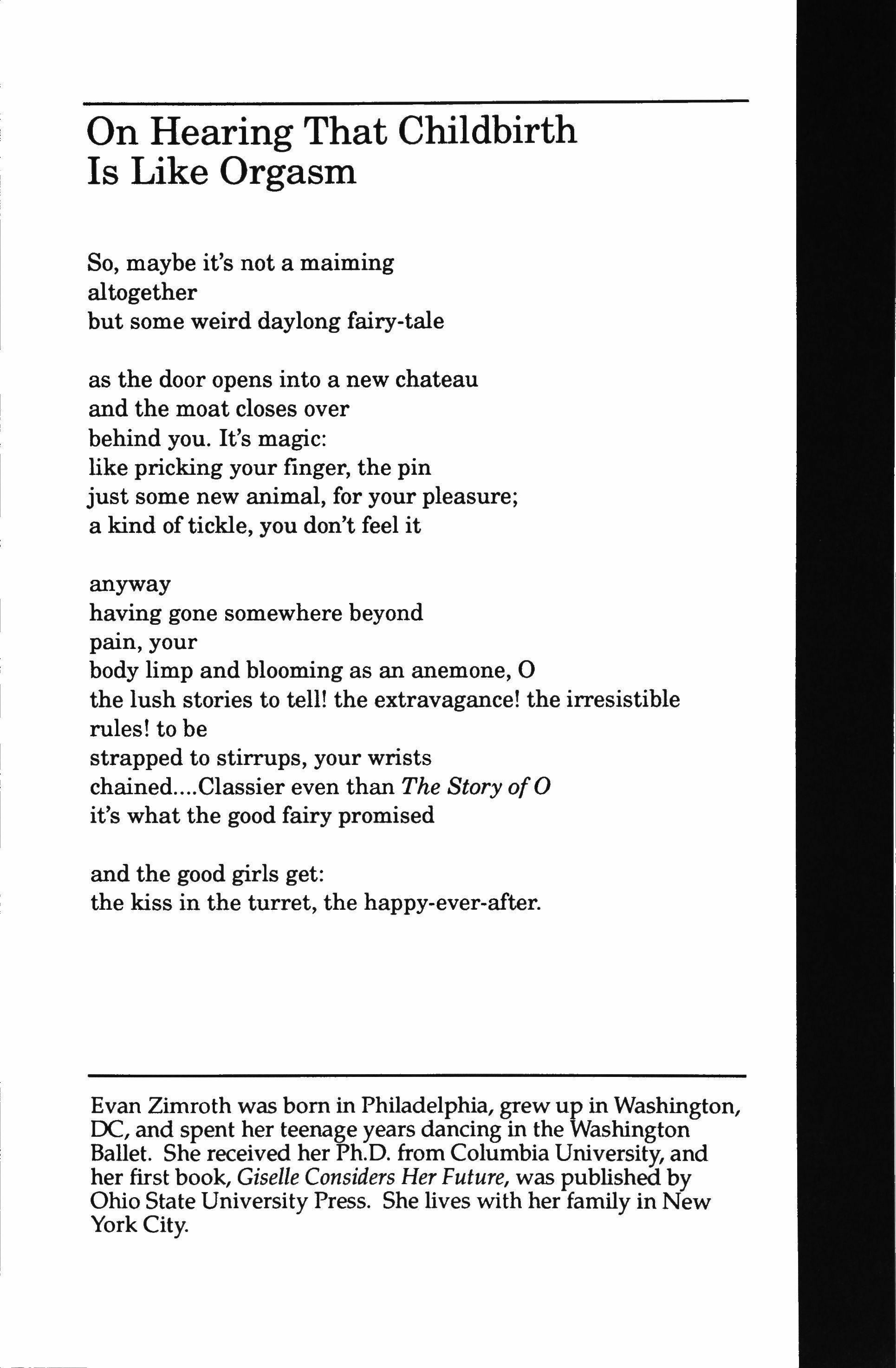
Evan Zimroth was born in Philadelphia, grew up in Washington, IX, and spent her teenage years dancing in the Washington Ballet. She received her Ph.D. from Columbia University, and her first book, Giselle Considers Her Future, was published by Ohio State University Press. She lives with her family in New York City.
New Writingfrom Mexico
Edited by Reginald Gibbons

Beginning in the 1960's, there has been a remarkable flowering of new writing in Mexico. A new generation of writers has come of age. Those writers, born around 1945 and after, have lived through the most dramatic political, social and artistic changes in Mexico's history; they have opened up fiction to new subjects, new places, new techniques; their poetry evokes and meditates on the Mexican reality more fully and more vividly than ever before. Notable among these new writers are the voices of women and the voices speaking from the provinces about their rich sense of place-away from the powerful cultural center of Mexico City. This large anthology is not a documentary representation or a survey, but a carefully chosen and scrupulously translated sampling of the most vigorous and exciting new short fiction, poetry and essays being written in Mexico today
a wonderful and timely anthology. Gibbons has gathered 58 of Mexico's most talented writers, and they are as diverse as their nation ln asking the question "What is Mexican?" and with the talented help of many translators, Gibbons has contributed a great deal to the understanding ofMexico.
-BOOKLIST
6 x 91/4 inches
448 pages
$27, cloth (0-916384-12-8), $15, paper (0-916384-13-6)
MURIEL RUKEYSER
Out of Silence: Selected Poems
Edited by Kate Daniels
In a recent article, someone defined the deplorable state of publishing (and the Republic) by a singlefact: Muriel Rukeyser's poetry was out ofprint. So this is not just another book: it is a restitution. Muriel Rukeyser held her ground at the bloody crossroads ofpolitics and art; she gave the word "witness" poetic weight. The first of our women poets to enter and engage the Western tradition ofprophetic outrage, she warmed it with the living voices of the injured. And in her activism and generosity, Rukeyser was as good as her word. She said it best: "It is a great thing to hear the words of those who are worthy to speak them."
-ELEANOR WILNER
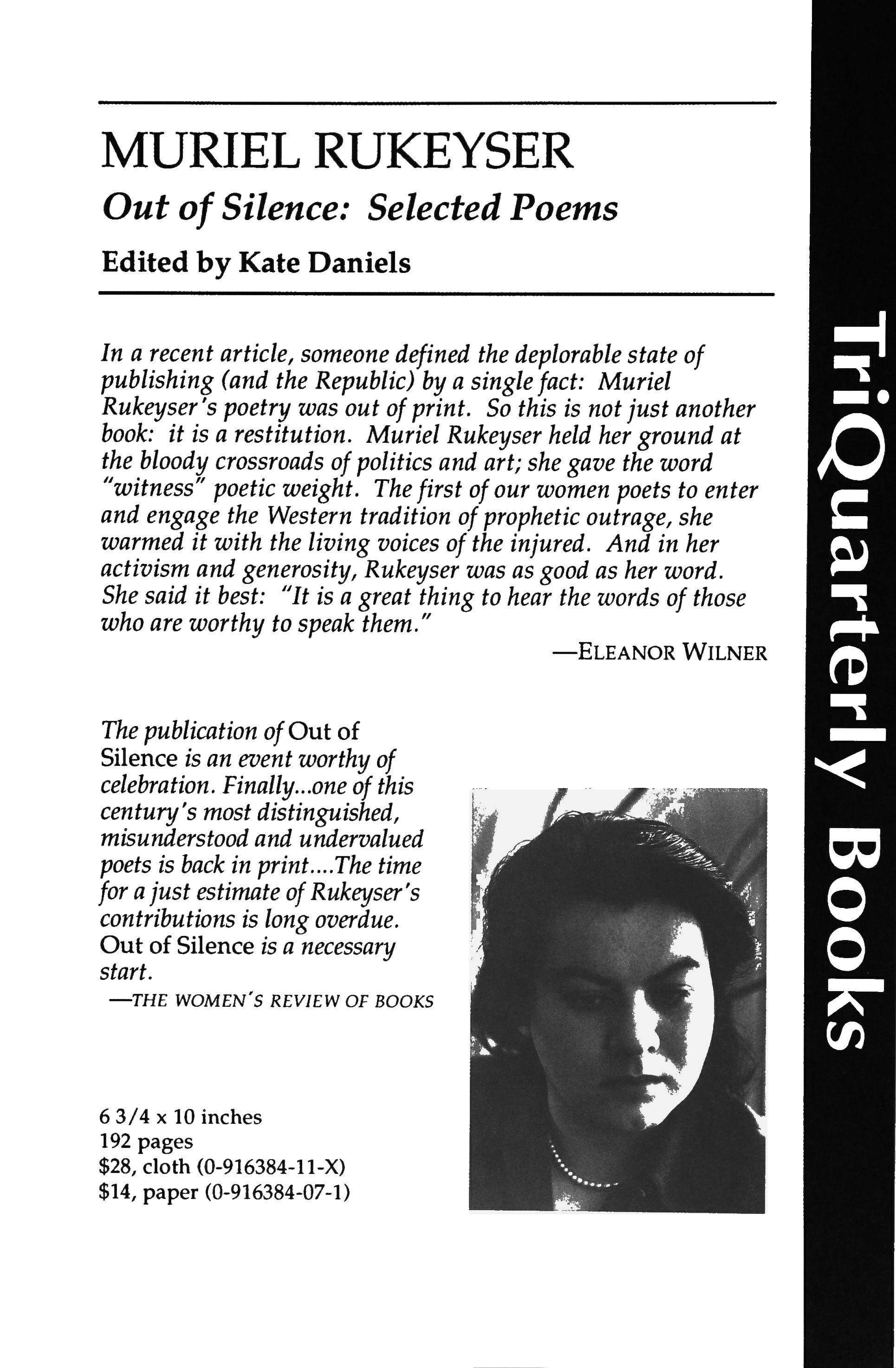
The publication ofOut of Silence is an event worthy of celebration. Finally one of this century's most distinguished, misunderstood and undervalued poets is back in print The time for a just estimate ofRukeyser's contributions is long overdue. Out of Silence is a necessary start.
-THE WOMEN'S REVIEW OF BOOKS
63/4 x 10 inches
192 pages
$28, cloth (0-916384-11-X)
$14, paper (0-916384-07-1)
BRUCE WEIGL
What Saves Us
In these wrenching, elegant poems Bruce Weigl writes out of uncompromising memory and vision. His subject is both the transport and the anguish of being open to the lived and living moment. He writes of love, sex, violence, and the inhuman crossfire of historical forces. From bars and bedrooms, in Ohio and Nicaragua and Vietnam, his voice rises through the noise of history and habit to reach us with impeccable grace and remarkable invention. The images he discovers do not fade from our minds, and we are grateful for "what saves us" no matter who we are or where we have been.
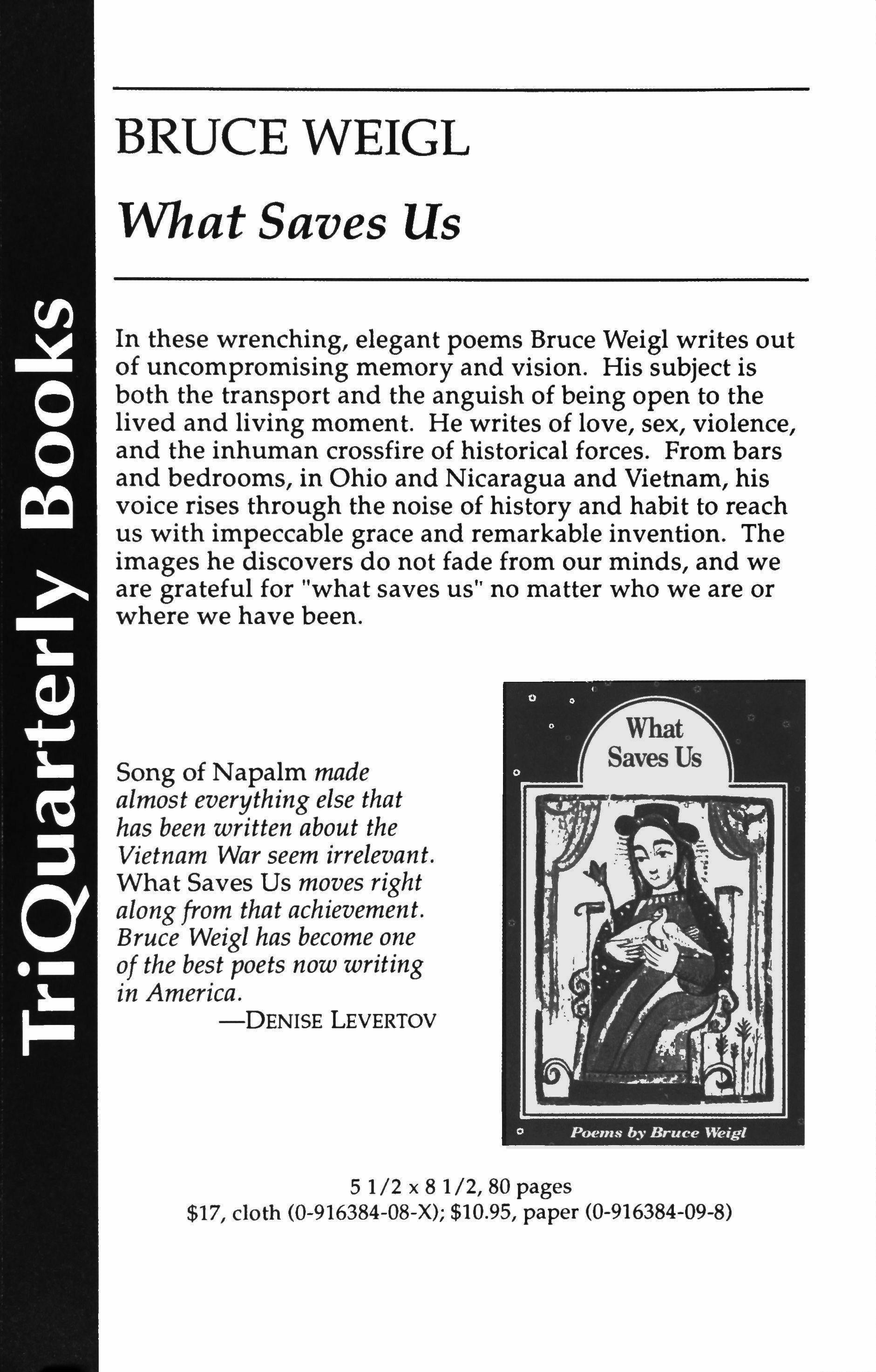
Song of Napalm made almost everything else that has been written about the Vietnam War seem irrelevant. What Saves Us moves right alongfrom that achievement. Bruce Weigl has become one of the best poets now writing in America.
-DENISE LEVERTOV
51/2 x 8 1/2,80 pages $17, cloth (0-916384-08-X); $10.95, paper (0-916384-09-8)
LINDA McCARRISTON Eva-Mary
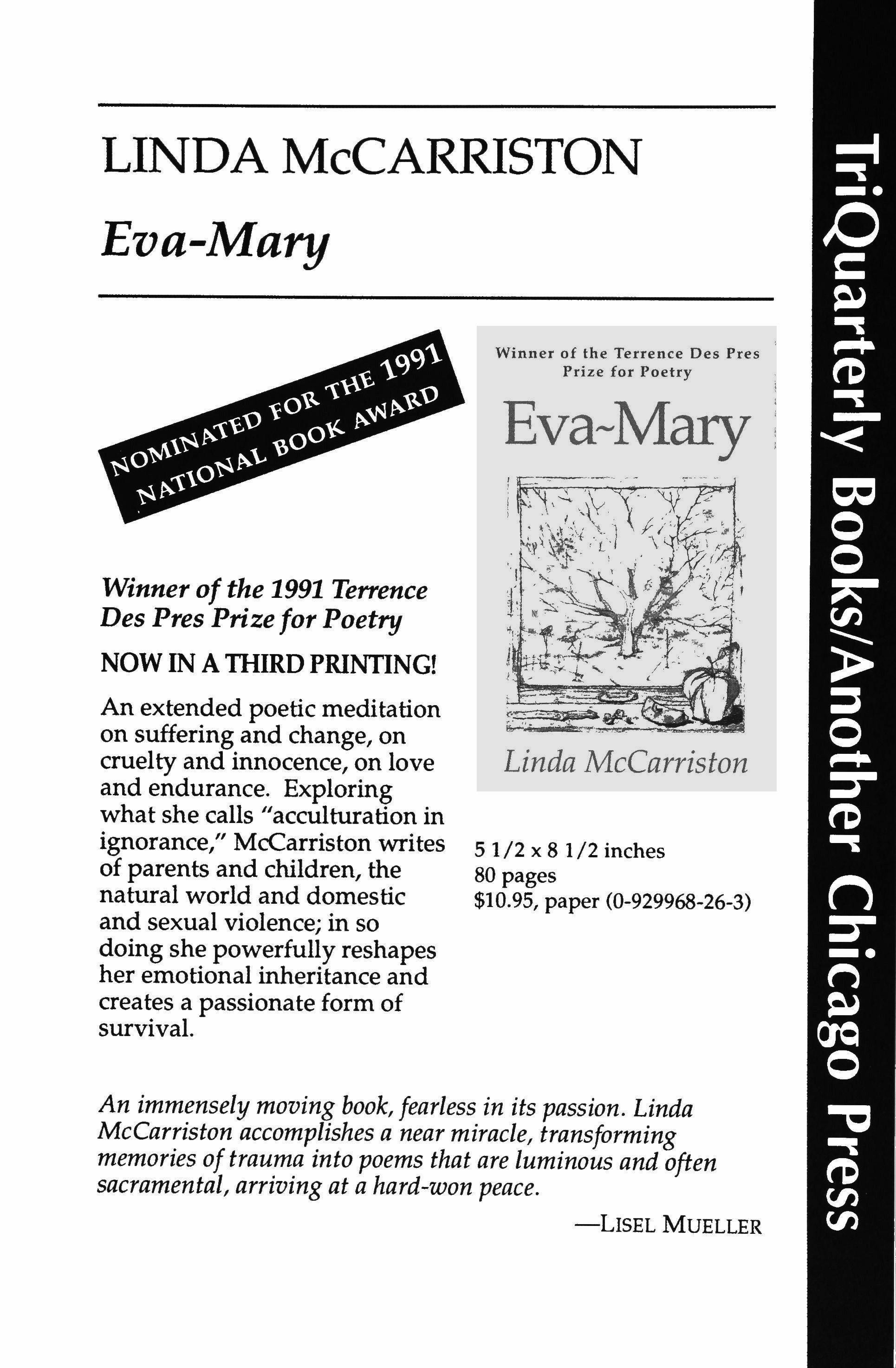
Eva-Mary
Winner of the 1991 Terrence Des Pres Prize forPoetry
NOW IN A THIRD PRINTING!
An extended poetic meditation on suffering and change, on cruelty and innocence, on love and endurance. Exploring what she calls "acculturation in ignorance," McCarriston writes of parents and children, the natural world and domestic and sexual violence; in so doing she powerfullyreshapes her emotional inheritance and creates a passionate form of survival.
51/2 x 81/2 inches
80 pages $10.95, paper (0-929968-26-3)
An immensely moving book, fearless in its passion. Linda McCarriston accomplishes a near miracle, transforming memories of trauma into poems that are luminous and often sacramental, arriving at a hard-won peace.
-LISEL MUELLER
Winner of the Terrence Des Pres Prize for Poetry
Linda McCarriston
GORDON WEAVER
Men Who Would Be Good
Alcoholism, violence, and free enterprise-all the damage that men can do is visible in thesefiercely comic and alarming stories
-CHARLES BAXTER
In this "diverse collection of masterfully written stories" (Booklist), Gordon Weaver explores with insight, intensity and humor the situations of seven men pushed to the limits of their lives. Weaver's earnest and passionate men have learned the rules for being good, but in following them they arrive at desperate and sometimes ludicrous ends.
Mr. Weaver combines powerful inventiveness with a giftfor exact observation. He gets the gritty details right He has a veryfine ear for ordinary speech and comradely jargon, which he twists brilliantly to reflect the deep unreality that pervades these lives Mr. Weaver has written a sad, sharp, unnerving book.
-NEW YORK TIMES BOOK REVIEW
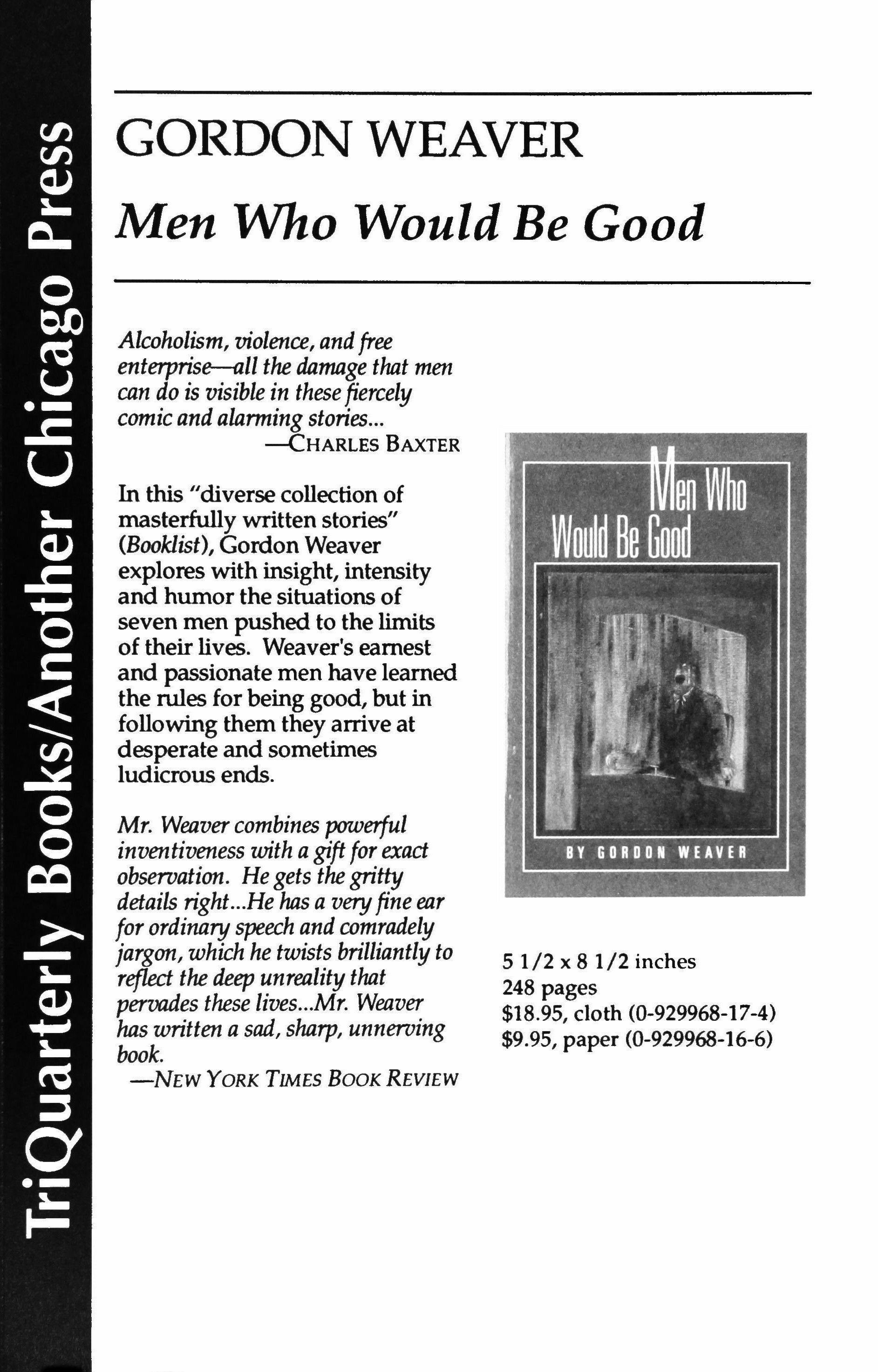
51/2 x 81/2 inches
248 pages
$18.95, cloth (0-929968-17-4) $9.95, paper (0-929968-16-6)
Fiction of the Eighties
Edited by Reginald Gibbons and Susan Hahn
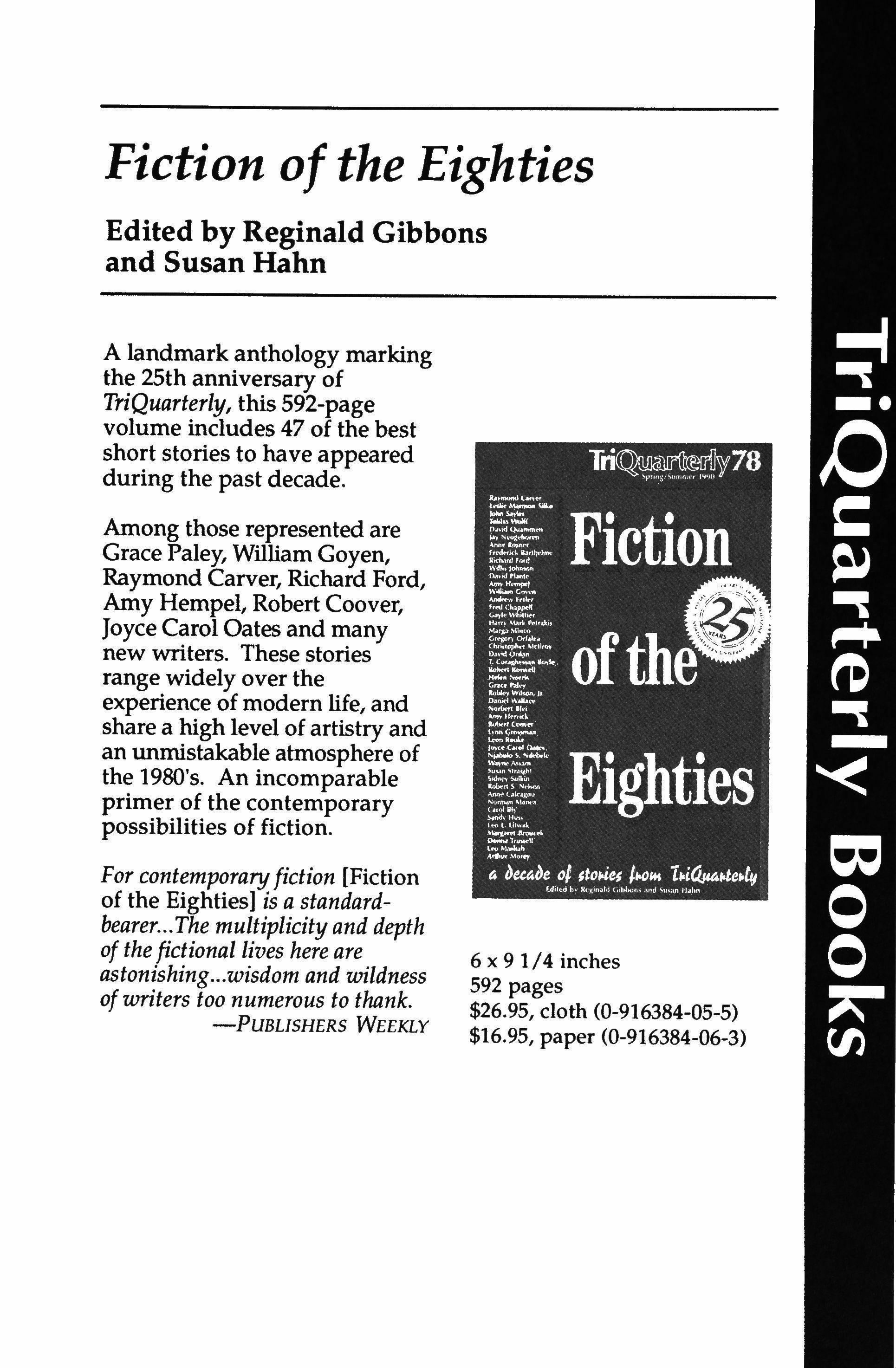
A landmark anthology marking the 25th anniversary of TriQuarterly, this 592-page volume includes 47 of the best short stories to have appeared during the past decade.
Among those represented are Grace Paley, William Goyen, Raymond Carver, Richard Ford, Amy Hempel, Robert Coover, Joyce Carol Oates and many new writers. These stories range widely over the experience of modern life, and share a high level of artistry and an unmistakable atmosphere of the 1980's. An incomparable primer of the contemporary possibilities of fiction.
For contemporaryfiction [Fiction of the Eighties] is a standardbearer The multiplicity and depth of the fictional lives here are astonishing wisdom and wildness of writers too numerous to thank.
-PUBLISHERS WEEKLY
6 x 91/4 inches 592 pages
$26.95, cloth (0-916384-05-5)
$16.95, paper (0-916384-06-3)
E.S. GOLDMAN
Earthly Justice
First winner of the William Goyen Prize for Fiction, E.S. Goldman brings to these stories a sure mastery of language and an eye for the often shocking moral dilemmas of everyday life. EarthlyJustice is filled with surprise, delight, devastation and poignancy.
Readers discovering E.S. Goldman for the first time will be delighted by this debut collection of short stories and by the depth and variety of the characters who inhabit them.
-PUBLISHERS WEEKLY
Earthly Justice deserves a place on the Americana bookshelf next to Winesburg, Ohio and Spoon River Anthology.
-CHICAGO TRIBUNE
Seldom do short stories leave the reader with so much to think about The characters are ordinary, their concerns universal, and their behavior satisfyingly bizarre.
-Los ANGELES TIMES BOOK REVIEW
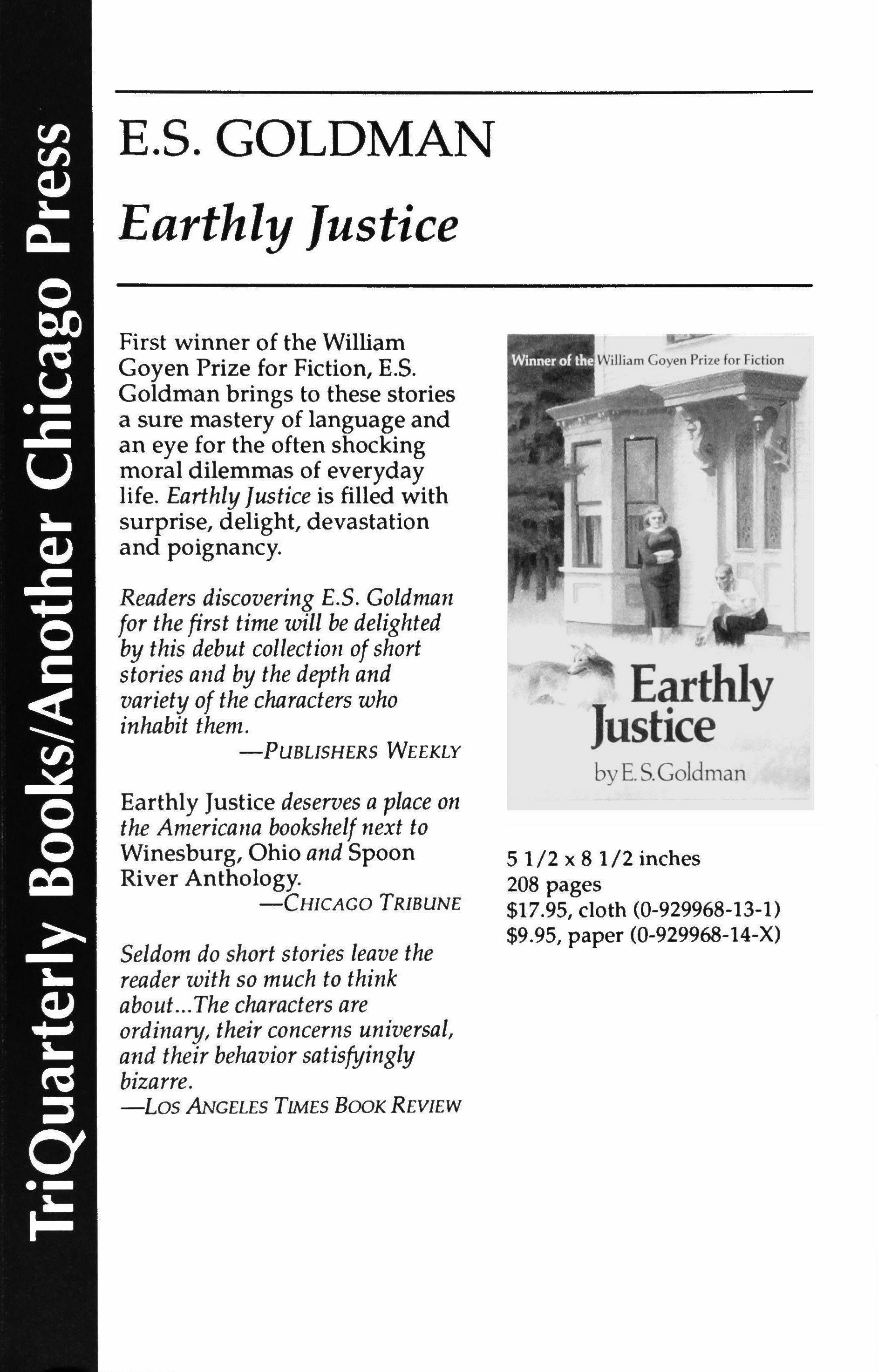
EarthlyJustice
by E. S.Goldman
51/2 x 81/2 inches
208 pages
$17.95, cloth (0-929968-13-1) $9.95, paper (0-929968-14-X)
STANISLAW BARANCZAK
The Weight of the Body: Selected Poems
The first winner of the Terrence Des Pres prize for Poetry-these trenchant poems evoke the difficulty of life in Poland before the revolution of 1989 and the sadness of exile. Their astonishing force makes it possible for us to feel how it was in Poland, and-from a special point of view on our own society-what it is like to be living in the U.S. now.
74 pages
$16.95, cloth (0-929968-02-6)
$8.95, paper (0-929968-01-8)
The Collected Poems ofSterlingA. Brown
Edited by Michael S. Harper
Sterling A. Brown is a legend among writers, teachers and readers-an extraordinary poet, the founder of AfricanAmerican literary criticism and a great teacher and scholar. His poems have brought neglected but essential and precious subjects, tones of voice and poetic techniques into American poetry, and remain a living testament that will be read for generations.
280 pages
$12.95, paper (0-929968-07-7)
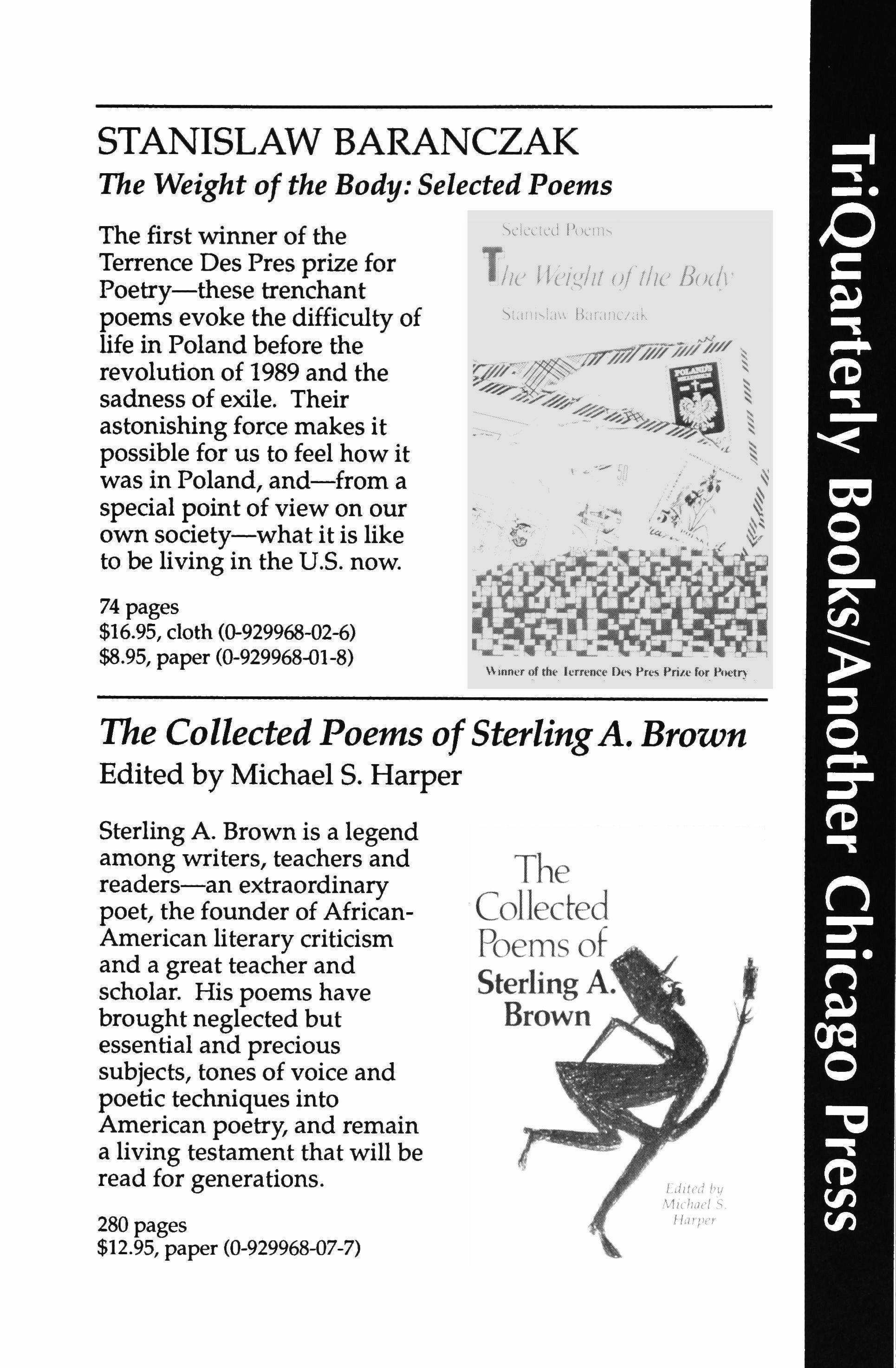
The Collected Poems of Sterling A. Brown
\\ mner of the Ierrence [), 1'"-s Prize for Puct!")
I.dll<,d hi! /'dlcihlc/ C; H.71per
Stephen Deutch, Photographer: From Paris to Chicago, 1932-1989
The gift book-with stunning photos of Chicago over decades of change, including Deutch's Pulitzernominated photos from the Daily News. This collection and analysis of Deutch's work, with plates both in duotone and in color, is the first full record of Deutch's achievement to be published.
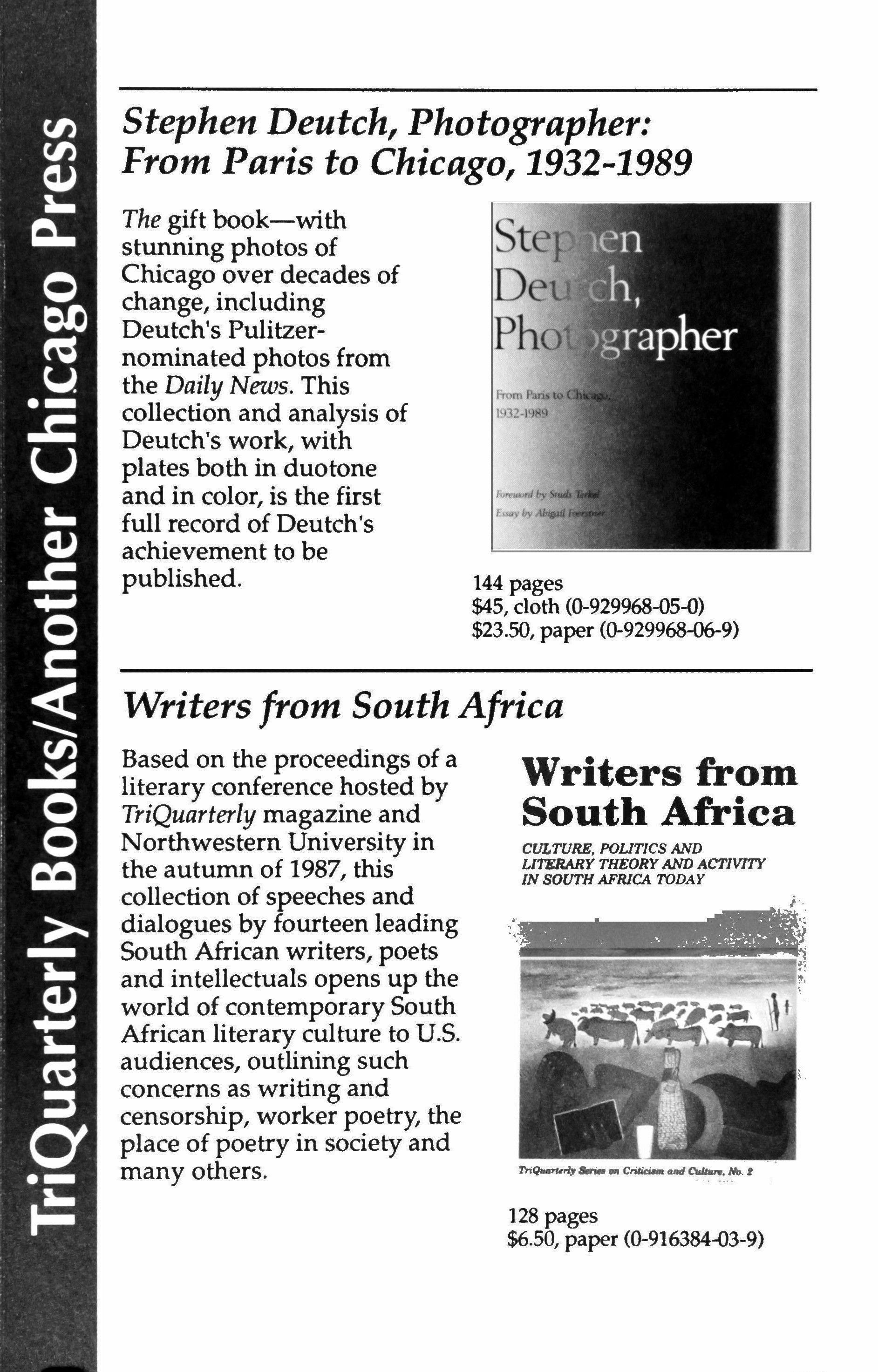
144 pages
$45, cloth (0-929968-05-0)
$23.50, paper (0-929968-06-9)
Writers from South Africa
Based on the proceedings of a literary conference hosted by TriQuarterly magazine and Northwestern University in the autumn of 1987, this collection of speeches and dialogues by fourteen leading South African writers, poets and intellectuals opens up the world of contemporary South African literary culture to U.S. audiences, outlining such concerns as writing and censorship, worker poetry, the place of poetry in society and many others.
Writers from South Africa
128 pages $6.50, paper (0-916384-03-9)
Ste
Pho 1932-J989
De
CULTURE, POLITICS AND LITERARY THEORY AND ACTNITY IN SOUTH AFRICA TODAY '; ,., t. [��·_�'t�..-·�:f � l.
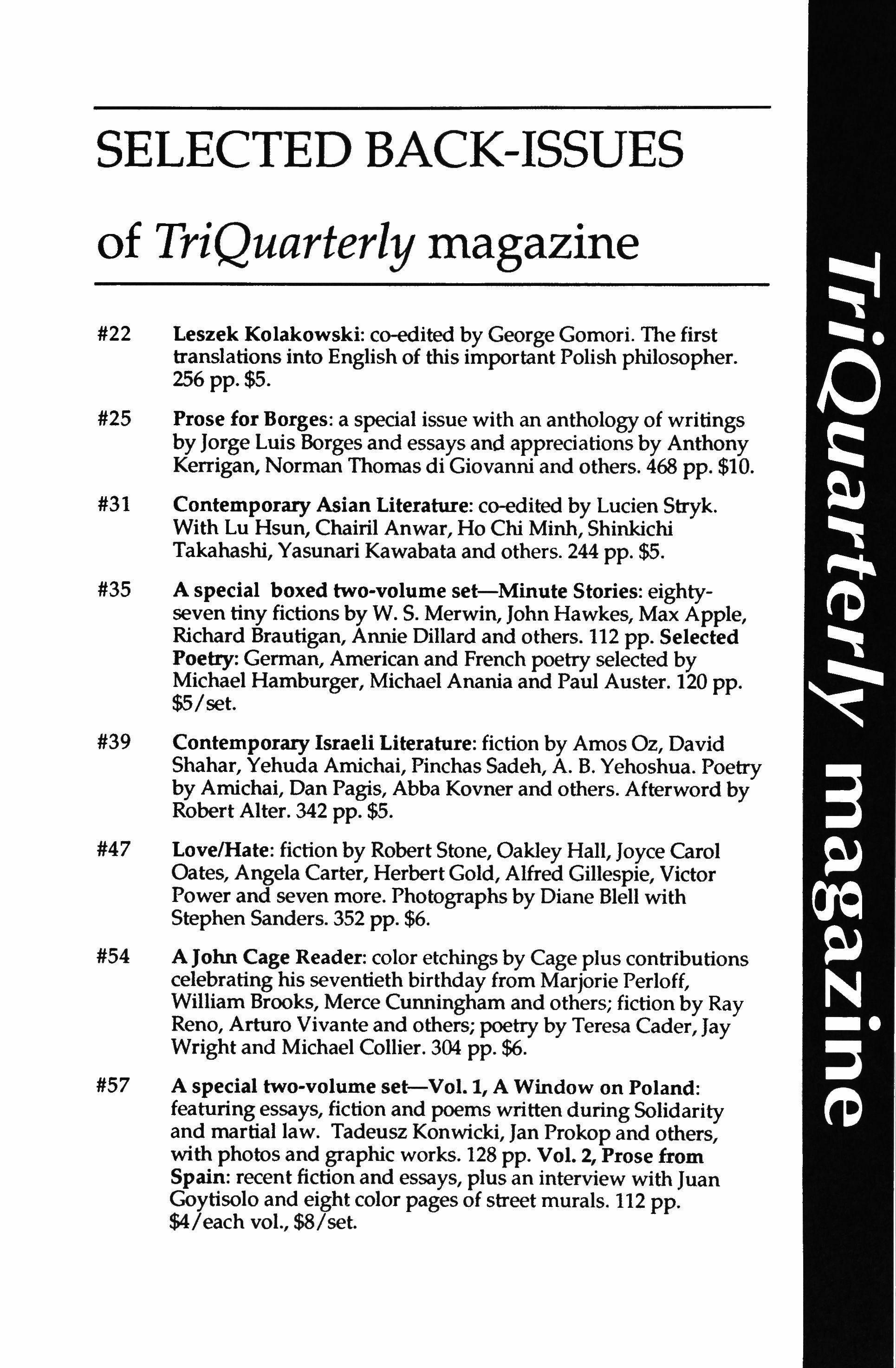
SELECTED BACK-ISSUES
of TriQuarterly magazine
#22 Leszek Kolakowski: co-edited by George Gomori. The first translations into English of this important Polish philosopher. 256 pp.$5.
#25 Prose for Borges: a special issue with an anthology of writings by Jorge Luis Borges and essays and appreciations by Anthony Kerrigan, Norman Thomas di Giovanni and others. 468 pp. $10.
#31 Contemporary Asian Literature: co-edited by Lucien Stryk. With Lu Hsun, Chairil Anwar, Ho Chi Minh, Shinkichi Takahashi, Yasunari Kawabata and others. 244 pp. $S.
#35 A special boxed two-volume set-Minute Stories: eightyseven tiny fictions by W. S. Merwin, John Hawkes, Max Apple, Richard Brautigan, Annie Dillard and others. 112 pp. Selected Poetry: German, American and French poetry selected by Michael Hamburger, Michael Anania and Paul Auster. 120 pp. $S/set.
#39 Contemporary Israeli Literature: fiction by Amos Oz, David Shahar, Yehuda Arnichai, Pinchas Sadeh, A. B. Yehoshua. Poetry by Arnichai, Dan Pagis, Abba Kovner and others. Afterword by Robert Alter. 342 pp. $S.
#47 LovelHate: fiction by Robert Stone, Oakley Hall, Joyce Carol Oates, Angela Carter, Herbert Gold, Alfred Gillespie, Victor Power and seven more. Photographs by Diane Blell with Stephen Sanders. 352 pp. $6.
#54 A John Cage Reader: color etchings by Cage plus contributions celebrating his seventieth birthday from Marjorie Perloff, William Brooks, Merce Cunningham and others; fiction by Ray Reno, Arturo Vivante and others; poetry by Teresa Cader, Jay Wright and Michael Collier. 304 pp. $6.
#57 A special two-volume set-Vol. 1, A Window on Poland: featuring essays, fiction and poems written during Solidarity and martial law. Tadeusz Konwicki, Jan Prokop and others, with photos and graphic works. 128 pp. Vol. 2, Prose from Spain: recent fiction and essays, plus an interview with Juan Goytisolo and eight color pages of street murals. 112 pp. $4Ieach vol., $8Iset.
#59 The American Blues: fiction by Ward Just, Joyce Carol Oates, Gayle Whittier and others; poetry by Bruce Weigl, John Ciardi, John Frederick Nims, Maxine Kumin and others; photographs from Vietnam and of American political figures by Mark Godfrey; II Alberti and Others," a supplement of poetry and prose complementing Prosefrom Spain (#57, Vol. 2). 272 pp. $7.
#63 TQ 20: twentieth-anniversary issue, with fiction by James T. Farrell, Richard Brautigan, Stanley Elkin, Jorge Luis Borges, Joyce Carol Oates, Vladimir Nabokov, Cynthia Ozick, Raymond Carver, William Goyen, Lorraine Hansberry and others; poetry by Anne Sexton, Howard Nemerov, W. S. Merwin, Jack Kerouac, Marvin Bell and others; interview with Saul Bellow; illustrations and photographs. 684 pp. $13.
#65 The Writer in Our World: symposium featuring Stanislaw Baranczak, Terrence Des Pres, Gloria Emerson, Leslie Epstein, Carolyn Forche, Michael S. Harper, Ward Just, Grace Paley, Mary Lee Settle, Robert Stone, Derek Walcott and C. K. Williams, with original work by most participants and by moderators Angela Jackson and Bruce Weigl; photographs. 332 pp. $9.
#72
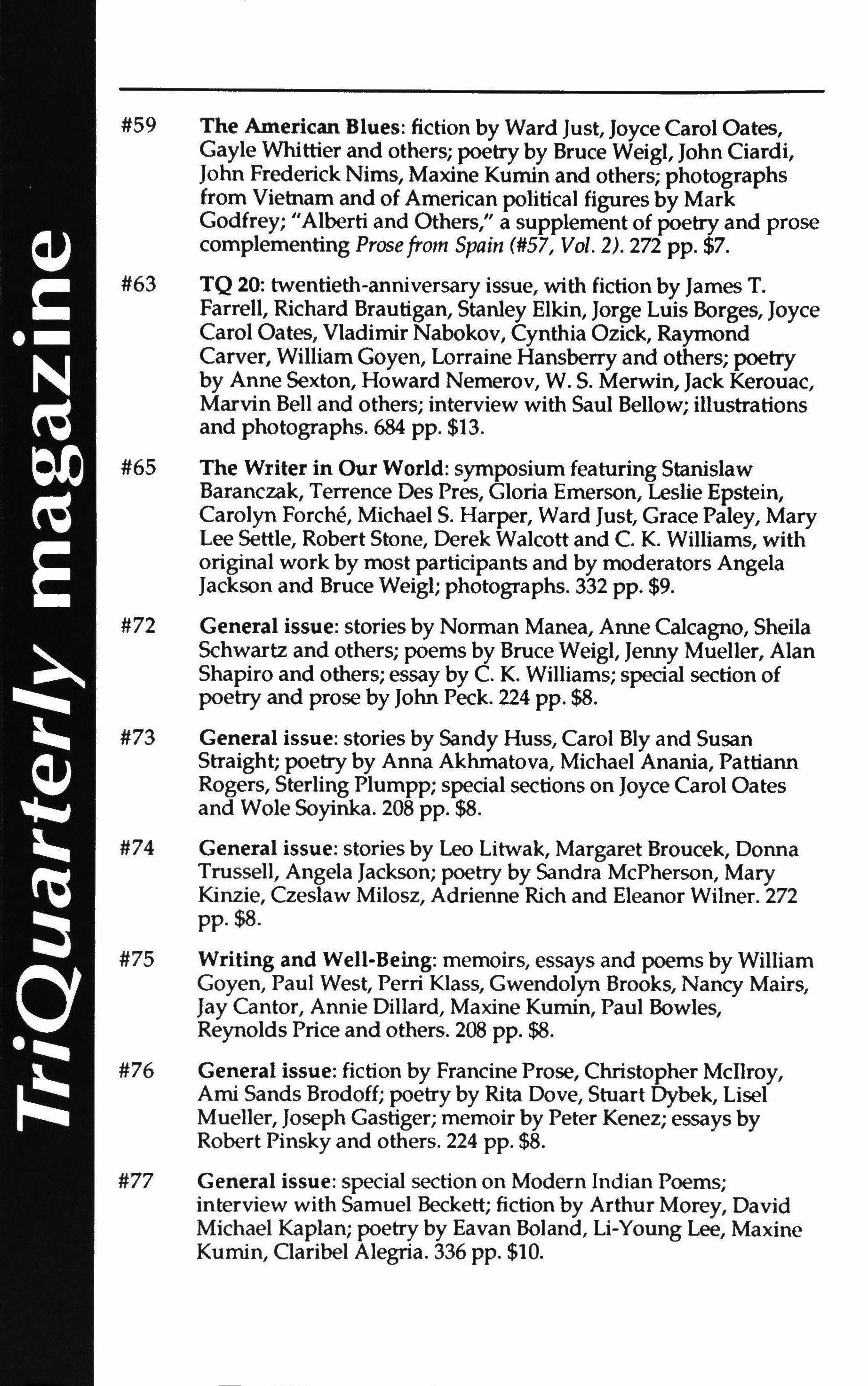
General issue: stories by Norman Manea, Anne Calcagno, Sheila Schwartz and others; poems by Bruce Weigl, Jenny Mueller, Alan Shapiro and others; essay by C. K. Williams; special section of poetry and prose by John Peck. 224 pp. $8.
#73 General issue: stories by Sandy Huss, Carol Bly and Susan Straight; poetry by Anna Akhmatova, Michael Anania, Pattiann Rogers, Sterling Plumpp; special sections on Joyce Carol Oates and Wole Soyinka. 208 pp. $8.
#74 General issue: stories by Leo Litwak, Margaret Broucek, Donna Trussell, Angela Jackson; poetry by Sandra McPherson, Mary Kinzie, Czeslaw Milosz, Adrienne Rich and Eleanor Wilner. 272 pp.$8.
#75 Writing and Well-Being: memoirs, essays and poems by William Goyen, Paul West, Perri Klass, Gwendolyn Brooks, Nancy Mairs, Jay Cantor, Annie Dillard, Maxine Kumin, Paul Bowles, Reynolds Price and others. 208 pp. $8.
#76 General issue: fiction by Francine Prose, Christopher McIlroy, Ami Sands Brodoff; poetry by Rita Dove, Stuart Dybek, Lisel Mueller, Joseph Gastiger; memoir by Peter Kenez; essays by Robert Pinsky and others. 224 pp. $8.
#77 General issue: special section on Modern Indian Poems; interview with Samuel Beckett; fiction by Arthur Morey, David Michael Kaplan; poetry by Eavan Boland, Li-Young Lee, Maxine Kumin, Claribel Alegria. 336 pp. $10.
ORDERING INFORMATION
Individuals
If you are unable to obtain a TriQuarterly Book from your bookseller, you may order directly using the order form on the next page, byphoning 800/832-3615 or via FAX to 708/467-2096. Please include payment with your order and add $2 for postage and handling. Add 50¢ per book for quantity orders.
If you order 5 or more books, you are entitled to a 40% discount.

Trade
Please call us at 800/832-3615 for current distribution information.
Subscriptions to TriQuarterly magazine
TriQuarterly is available to individuals at the following rates:
1 year-$20 2years-$36 Life-$500
Subscribers may purchase additional gift subscriptions for only $17/year. Foreign subscribers please add $4 per year. You may subscribe using our order form, or via phone or FAX with a credit card.
Name

Subtotal. Discount.
Postage & handling, Total,
o Check enclosed (payable to TriQuarterly)
o Visa 0 Mastercard
Acct. no. Exp. date
Signature.
Shipping address ifdifferent from above (TQ Books make fine gifts!)
Name Address
Send
Order
Form Date
Quantity Price
Address Title
orders to: TriQuarterly Books, Northwestern University, 2020 Ridge Avenue, Evanston, IL 60208-4302 Phone: 800 1832-3615 FAX: 708/467-2096
T�u1t<wi])f86
Editor Reginald Gibbons
Managing Editor Kirstie Felland
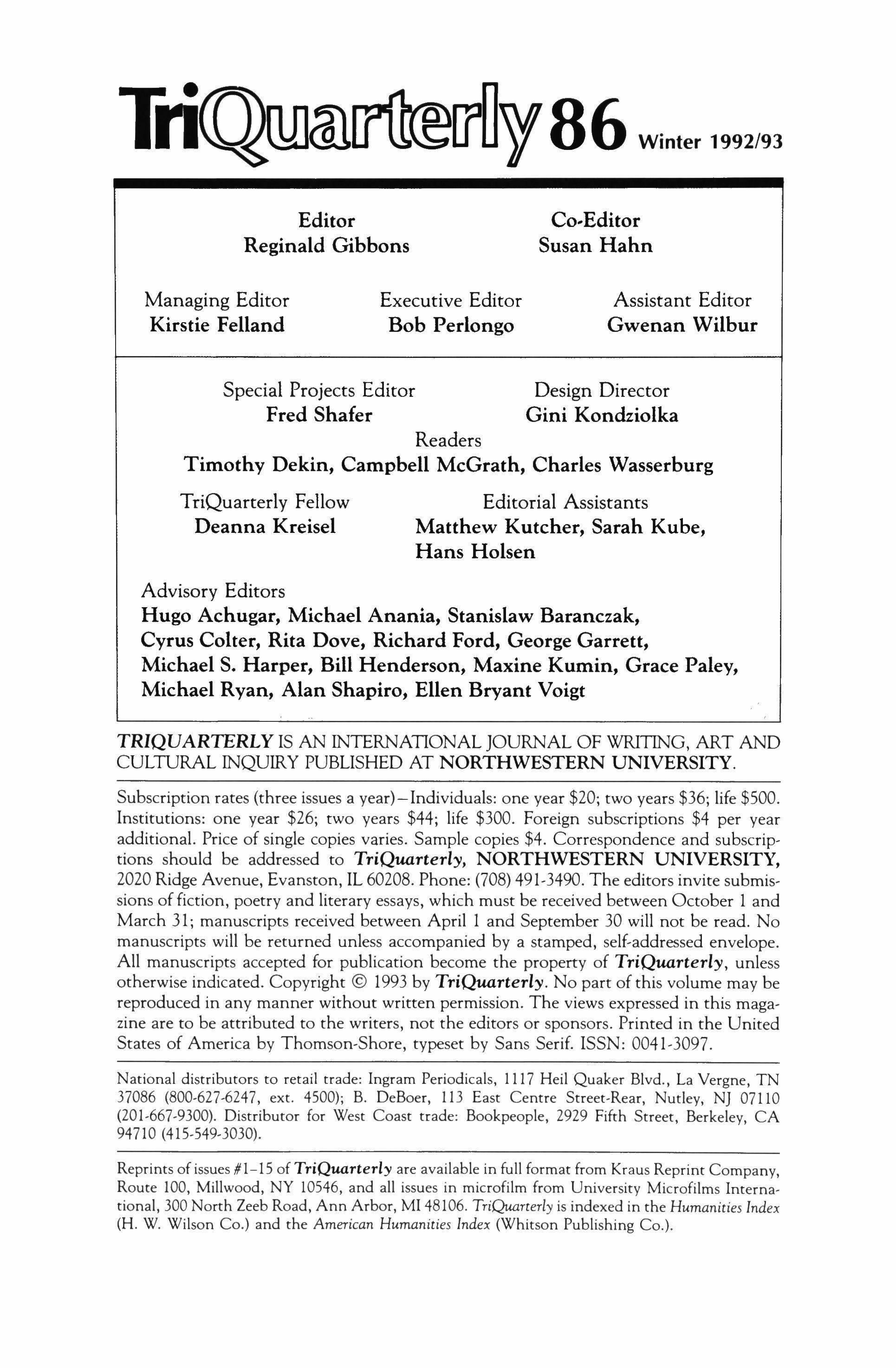
Executive Editor Bob Perlongo
Special Projects Editor Fred Shafer
Readers
Winter 1992/93
Co-Editor Susan Hahn
Assistant Editor Gwenan Wilbur
Design Director Gini Kondziolka
Timothy Dekin, Campbell McGrath, Charles Wasserburg
TriQuarterly Fellow Deanna Kreisel
Advisory Editors
Editorial Assistants Matthew Kutcher, Sarah Kube, Hans Holsen
Hugo Achugar, Michael Anania, Stanislaw Baranczak, Cyrus Colter, Rita Dove, Richard Ford, George Garrett, Michael S. Harper, Bill Henderson, Maxine Kumin, Grace Paley, Michael Ryan, Alan Shapiro, Ellen Bryant Voigt
TRIQUARTERLY IS AN INTERNATIONAL JOURNAL OF WRITING, ART AND CULTURAL INQUIRY PUBLISHED AT NORTHWESTERN UNIVERSITY.
Subscription rates (three issues a year)-Individuals: one year $20; two years $36; life $500. Institutions: one year $26; two years $44; life $300. Foreign subscriptions $4 per year additional. Price of single copies varies. Sample copies $4. Correspondence and subscriptions should be addressed to TriQuarterly, NORTHWESTERN UNIVERSITY, 2020 Ridge Avenue, Evanston, IL 60208. Phone: (708) 491-3490. The editors invite submissions of fiction, poetry and literary essays, which must be received between October 1 and March 31; manuscripts received between April 1 and September 30 will not be read. No manuscripts will be returned unless accompanied by a stamped, self-addressed envelope. All manuscripts accepted for publication become the property of TriQuarterly, unless otherwise indicated. Copyright © 1993 by TriQuarterly. No part of this volume may be reproduced in any manner without written permission. The views expressed in this magazine are to be attributed to the writers, not the editors or sponsors. Printed in the United States of America by Thomson-Shore, typeset by Sans Serif. ISSN: 0041-3097.
National distributors to retail trade: Ingram Periodicals, 1117 Heil Quaker Blvd., La Vergne, TN 37086 (800-627-6247, ext. 4500); B. DeBoer, 113 East Centre Street-Rear, Nutley, NJ 07110 (201-667-9300). Distributor for West Coast trade: Bookpeople, 2929 Fifth Street, Berkeley, CA 94710 (415-549-3030).
Reprints of issues #1-15 of TriQuarterly are available in full format from Kraus Reprint Company, Route 100, Millwood, NY 10546, and all issues in microfilm from University Microfilms International, 300 North Zeeb Road, Ann Arbor, MI 48106. TriQuarterly is indexed in the Humanities Index (H. W. Wilson Co.) and the American Humanities Index (Whitson Publishing Co.).
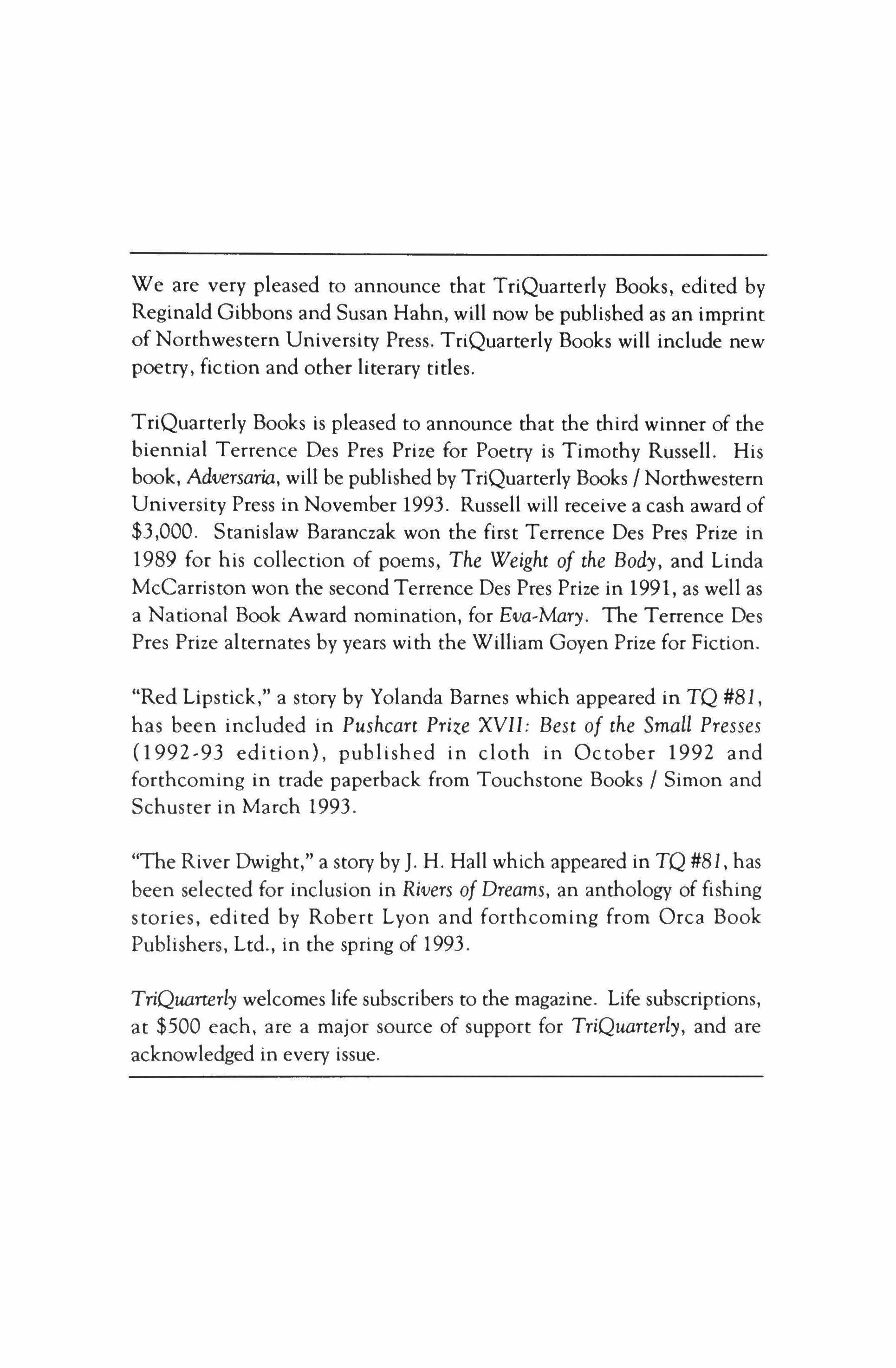
We are very pleased to announce that TriQuarterly Books, edited by Reginald Gibbons and Susan Hahn, will now be published as an imprint of Northwestern University Press. TriQuarterly Books will include new poetry, fiction and other literary titles.
TriQuarterly Books is pleased to announce that the third winner of the biennial Terrence Des Pres Prize for Poetry is Timothy Russell. His book, Adversaria, will be published by TriQuarterly Books I Northwestern University Press in November 1993. Russell will receive a cash award of $3,000. Stanislaw Baranczak won the first Terrence Des Pres Prize in 1989 for his collection of poems, The Weight of the Body, and Linda McCarriston won the second Terrence Des Pres Prize in 1991, as well as a National Book Award nomination, for Eva-Mary. The Terrence Des Pres Prize alternates by years with the William Goyen Prize for Fiction.
"Red Lipstick," a story by Yolanda Barnes which appeared in TQ #81, has been included in Pushcart Prize XVII: Best of the Small Presses (1992-93 edition), published in cloth in October 1992 and forthcoming in trade paperback from Touchstone Books I Simon and Schuster in March 1993.
"The River Dwight," a story by J. H. Hall which appeared in TQ #81, has been selected for inclusion in Rivers of Dreams, an anthology of fishing stories, edited by Robert Lyon and forthcoming from Orca Book Publishers, Ltd., in the spring of 1993.
TriQuarterly welcomes life subscribers to the magazine. Life subscriptions, at $500 each, are a major source of support for TriQuarterly, and are acknowledged in every issue.
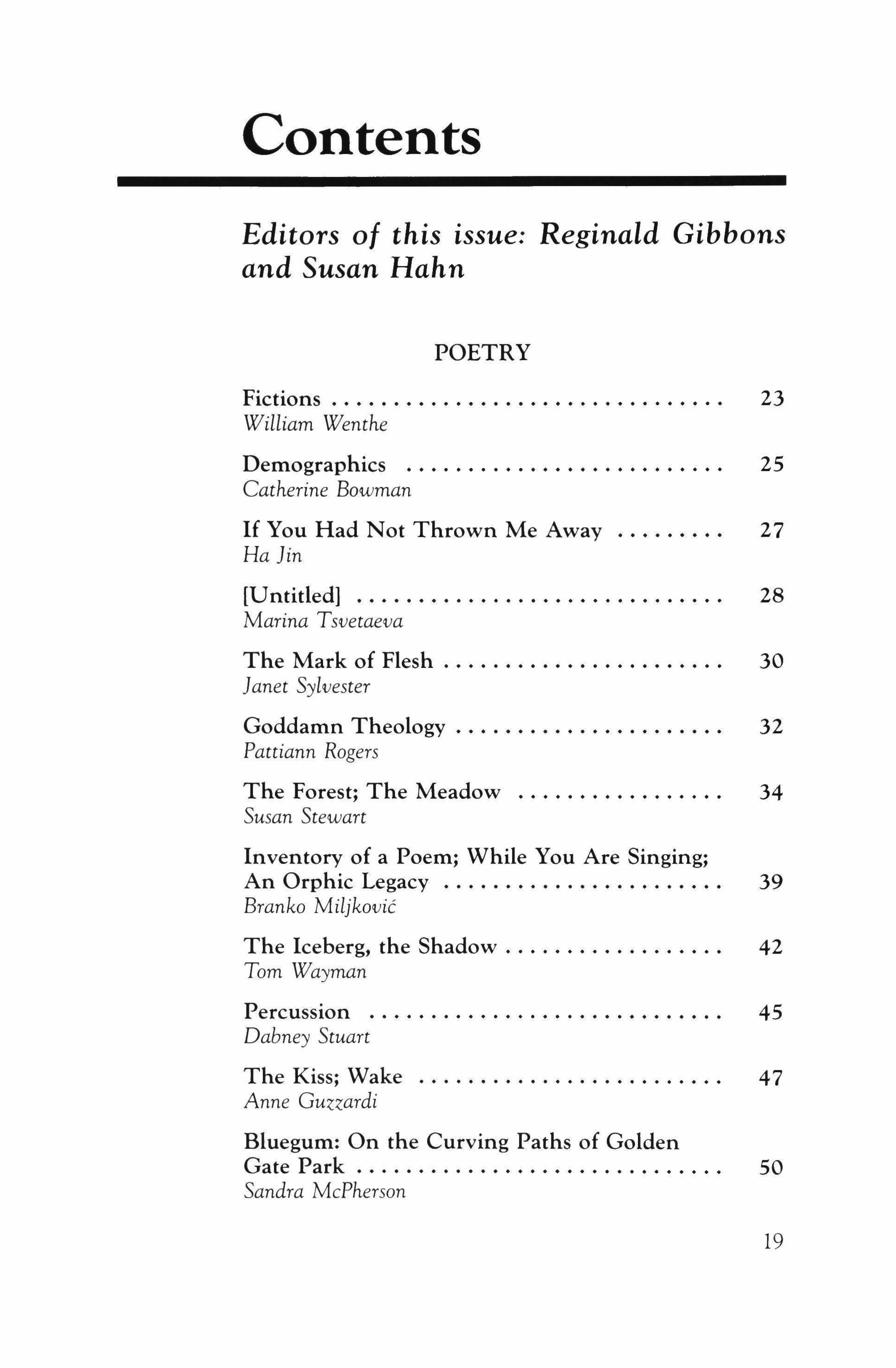
Contents Editors of this issue: Reginald Gibbons and Susan Hahn POETRY Fictions 23 William Wenthe Demographics 25 Catherine Bowman If You Had Not Thrown Me Away HaJin 27 [Untitled] 28 Marina Tsvetaeva The Mark of Flesh 30 Janet Sylvester Goddamn Theology. 32 Pattiann Rogers The Forest; The Meadow 34 Susan Stewart Inventory of a Poem; While You Are Singing; An Orphic Legacy 39 Branko Miljkovic The Iceberg, the Shadow. 42 Tom Wayman Percussion 45 Dabney Stuart The Kiss; Wake 47 Anne Guzzardi Bluegum: On the Curving Paths of Golden Gate Park 50 Sandra McPherson 19
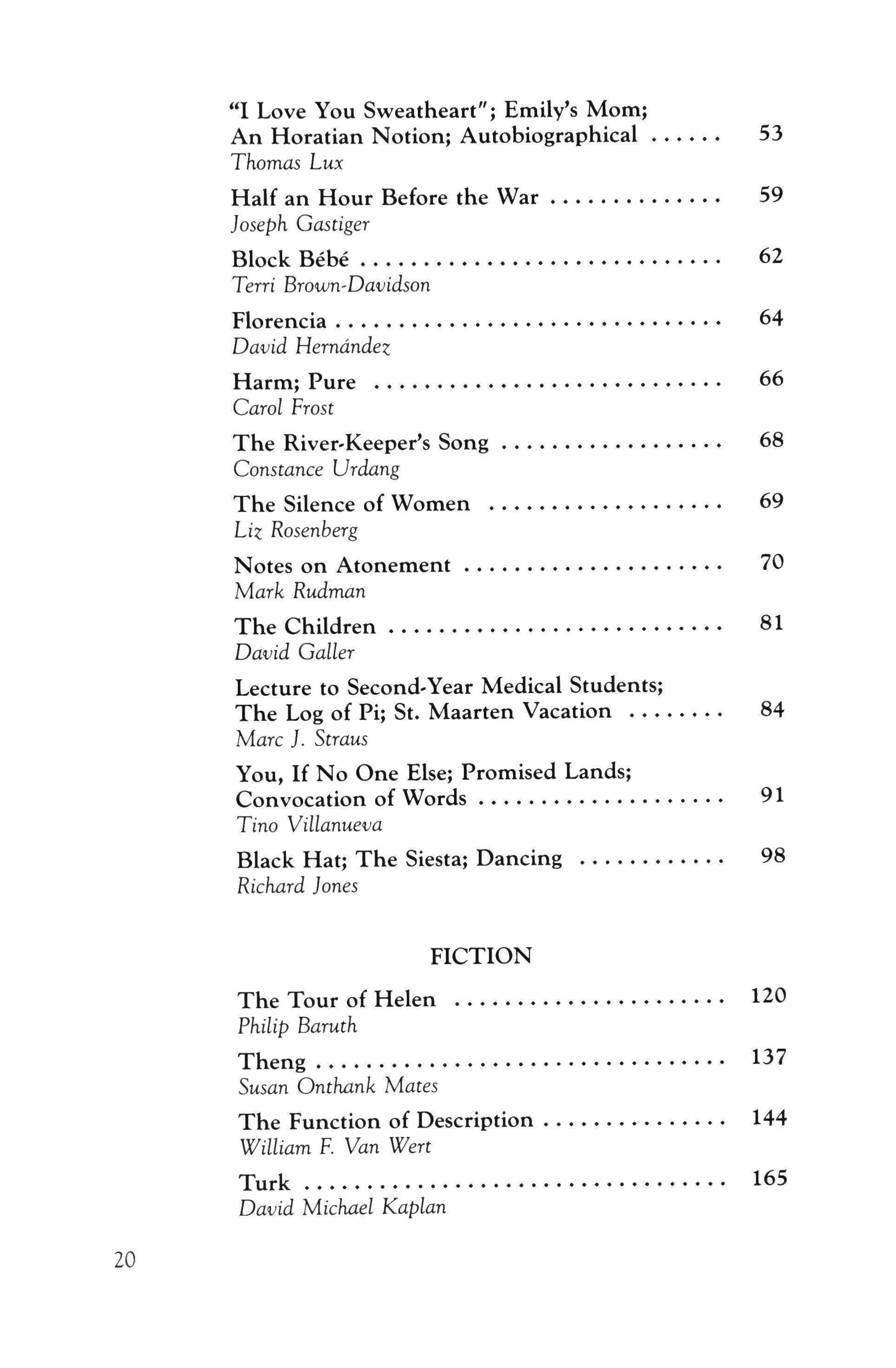
"I Love You Sweatheart"; Emily's Mom; An Horatian Notion; Autobiographical Thomas Lux Half an Hour Before the War 59 Joseph Gastiger Block Bebe 62 53 Terri Brown-Davidson Florencia 64 David Hernandez Harm; Pure 66 Carol Frost The River-Keeper's Song Constance Urdang The Silence of Women Liz Rosenberg 68 69 Notes on Atonement Mark Rudman The Children 81 David Galler 70 Lecture to Second-Year Medical Students; The Log of Pi; St. Maarten Vacation 84 Marc J. Straus You, If No One Else; Promised Lands; Convocation of Words. 91 Tino Villanueva Black Hat; The Siesta; Dancing Richard Jones 98 FICTION The Tour of Helen 120 Philip Baruth Theng 137 Susan Onthank Mates The Function of Description. 144 William F. Van Wert Turk 165 David Michael Kaplan 20
SPECIAL SECTION
Poetry and Second Thoughts; Sappho: A Garland; Afterwords on Sappho 209
Jim Powell
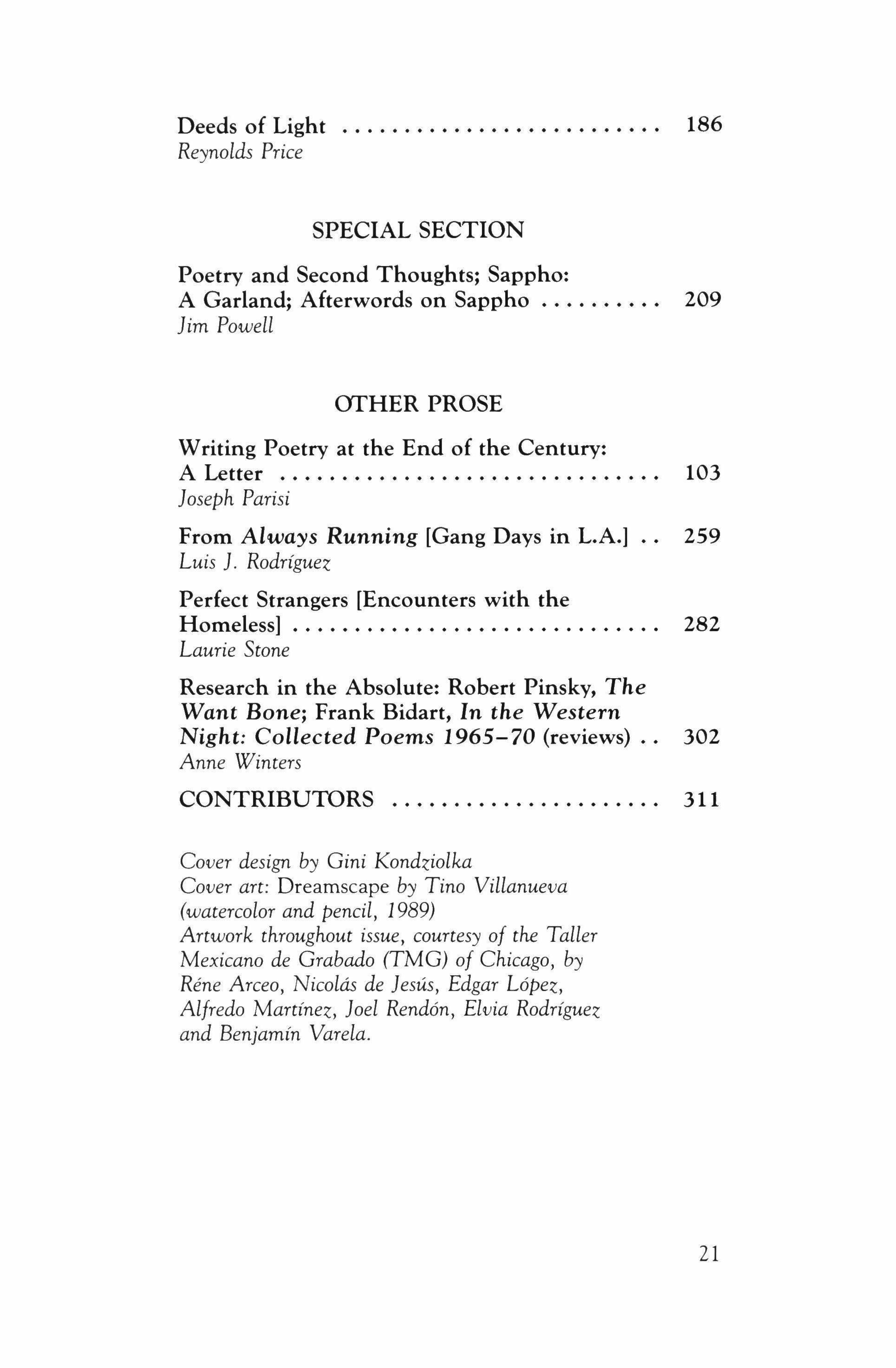
OTHER PROSE
Writing Poetry at the End of the Century: A Letter 103
Joseph Parisi
From Always Running [Gang Days in L.A.] 259
Luis J. Rodriguez
Perfect Strangers [Encounters with the Homeless] 282
Laurie Stone
Research in the Absolute: Robert Pinsky, The Want Bone; Frank Bidart, In the Western Night: Collected Poems 1965-70 (reviews) 302
Anne Winters
CONTRIBUTORS 311
Cover design by Gini Kondziolka
Cover art: Dreamscape by Tino Villanueva (watercolor and pencil, 1989)
Artwork throughout issue, courtesy of the Taller Mexicano de Grabado (TMG) of Chicago, by Rene Arceo, Nicolas de Jesus, Edgar L6pez, Alfredo Martinez, Joel Rend6n, Elvia Rodriguez and Benjamin Varela.
Deeds of Light
Price 186
Reynolds
21

Fictions
William Wenthe
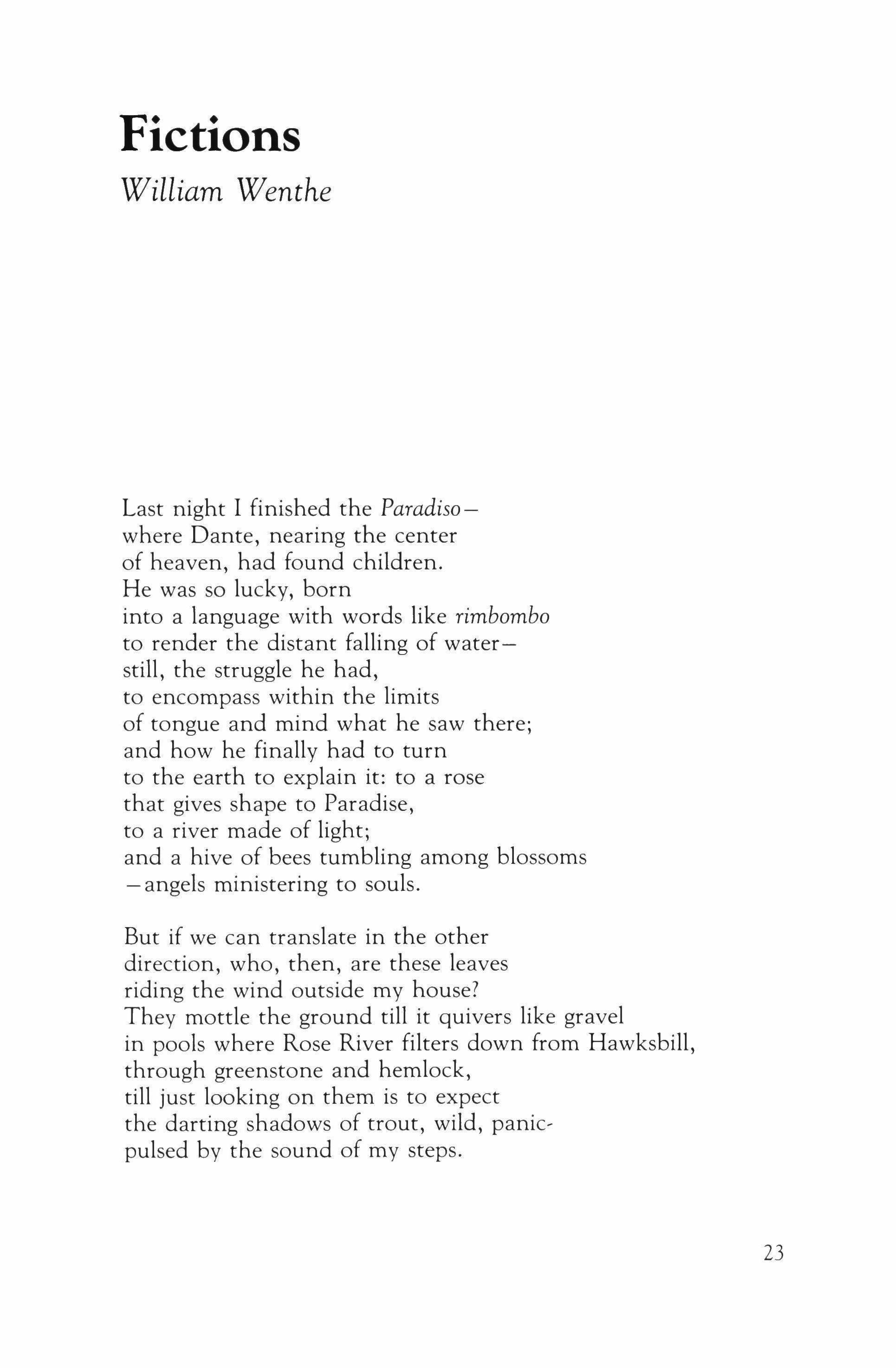
Last night I finished the Paradisowhere Dante, nearing the center of heaven, had found children. He was so lucky, born into a language with words like rimbombo to render the distant falling of waterstill, the struggle he had, to encompass within the limits of tongue and mind what he saw there; and how he finally had to turn to the earth to explain it: to a rose that gives shape to Paradise, to a river made of light; and a hive of bees tumbling among blossoms - angels ministering to souls.
But if we can translate in the other direction, who, then, are these leaves riding the wind outside my house? They mottle the ground till it quivers like gravel in pools where Rose River filters down from Hawksbill, through greenstone and hemlock, till just looking on them is to expect the darting shadows of trout, wild, panicpulsed by the sound of my steps.
23
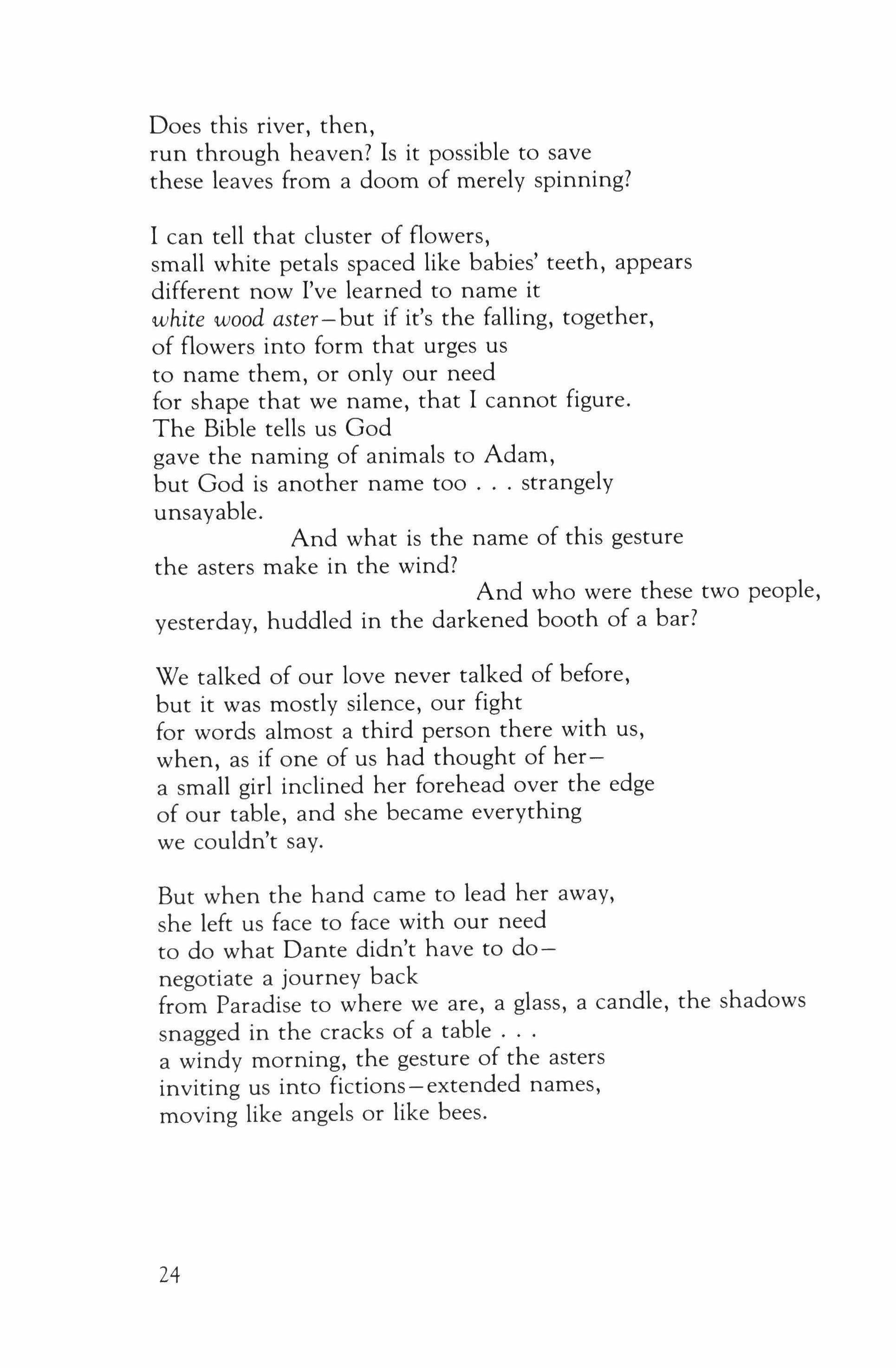
Does this river, then, run through heaven? Is it possible to save these leaves from a doom of merely spinning?
I can tell that cluster of flowers, small white petals spaced like babies' teeth, appears different now I've learned to name it white wood aster- but if it's the falling, together, of flowers into form that urges us to name them, or only our need for shape that we name, that I cannot figure. The Bible tells us God gave the naming of animals to Adam, but God is another name too strangely unsayable.
And what is the name of this gesture the asters make in the wind?
And who were these two people, yesterday, huddled in the darkened booth of a bar?
We talked of our love never talked of before, but it was mostly silence, our fight for words almost a third person there with us, when, as if one of us had thought of hera small girl inclined her forehead over the edge of our table, and she became everything we couldn't say.
But when the hand came to lead her away, she left us face to face with our need to do what Dante didn't have to donegotiate a journey back from Paradise to where we are, a glass, a candle, the shadows snagged in the cracks of a table a windy morning, the gesture of the asters inviting us into fictions-extended names, moving like angels or like bees.
24
Demographics
Catherine Bowman
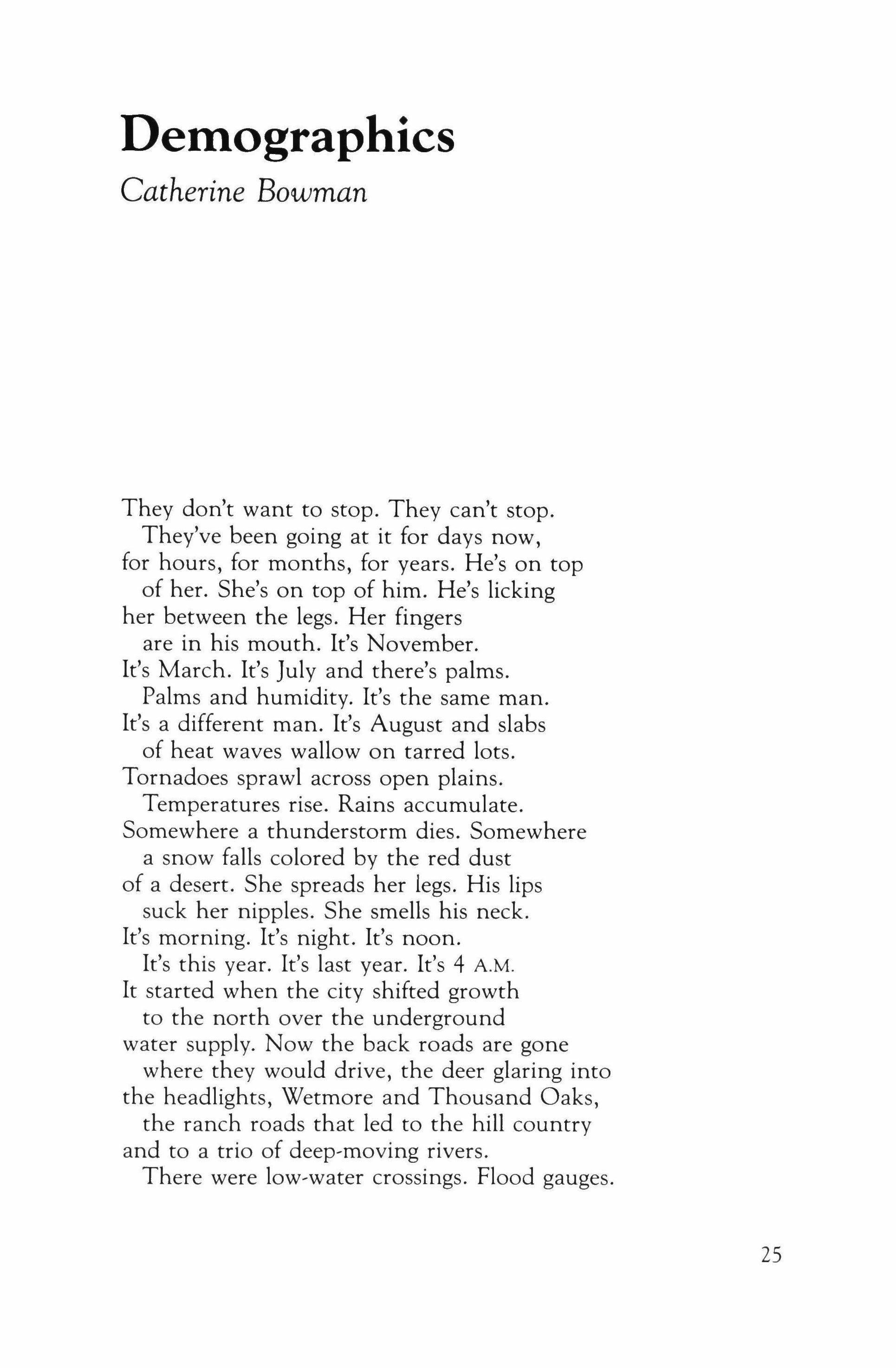
They don't want to stop. They can't stop. They've been going at it for days now, for hours, for months, for years. He's on top of her. She's on top of him. He's licking her between the legs. Her fingers are in his mouth. It's November. It's March. It's July and there's palms. Palms and humidity. It's the same man. It's a different man. It's August and slabs of heat waves wallow on tarred lots. Tornadoes sprawl across open plains. Temperatures rise. Rains accumulate. Somewhere a thunderstorm dies. Somewhere a snow falls colored by the red dust of a desert. She spreads her legs. His lips suck her nipples. She smells his neck. It's morning. It's night. It's noon. It's this year. It's last year. It's 4 A.M. It started when the city shifted growth to the north over the underground water supply. Now the back roads are gone where they would drive, the deer glaring into the headlights, Wetmore and Thousand Oaks, the ranch roads that led to the hill country and to a trio of deep-moving rivers. There were low-water crossings. Flood gauges.
25
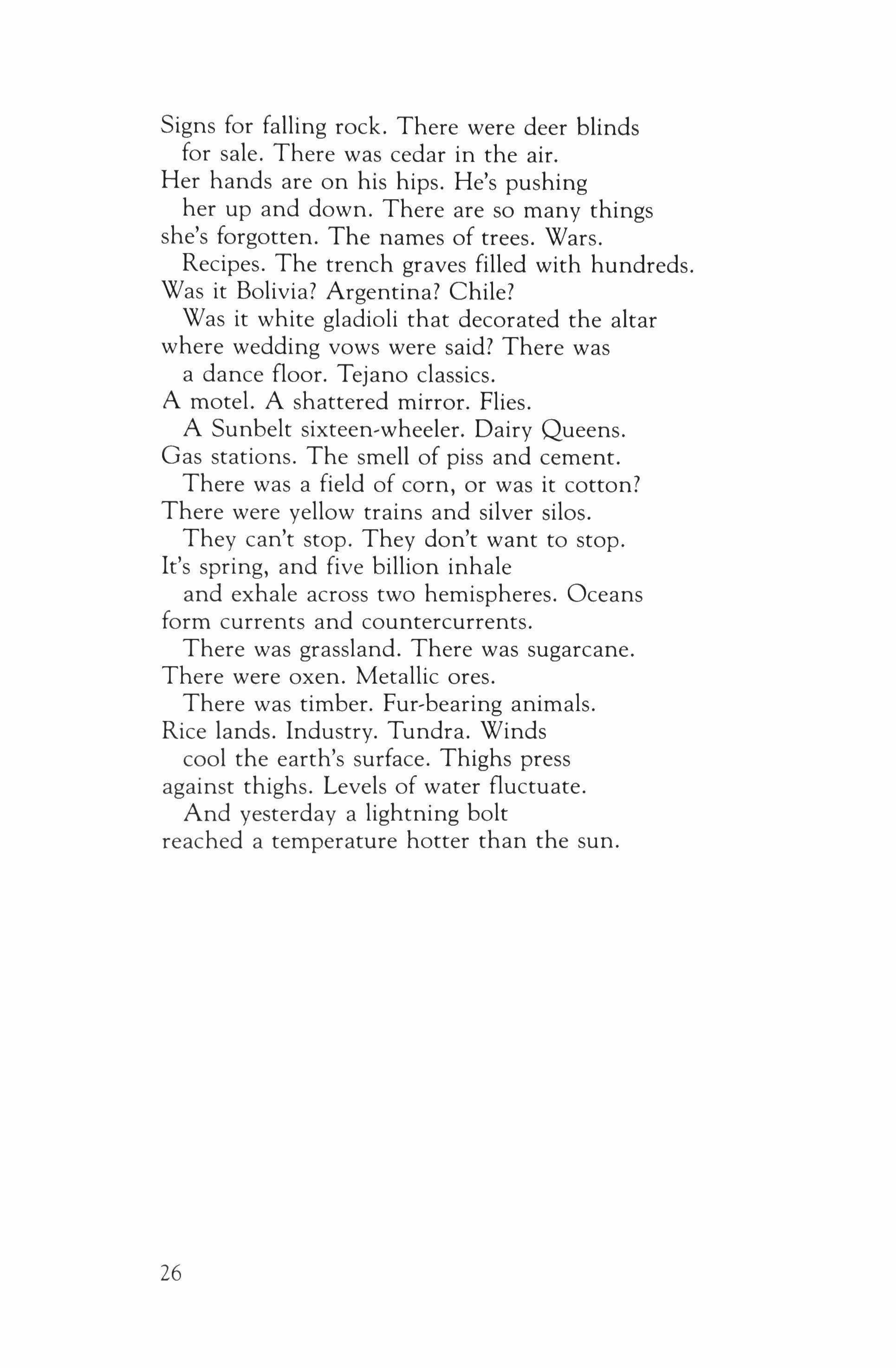
Signs for falling rock. There were deer blinds for sale. There was cedar in the air. Her hands are on his hips. He's pushing her up and down. There are so many things she's forgotten. The names of trees. Wars. Recipes. The trench graves filled with hundreds. Was it Bolivia? Argentina? Chile? Was it white gladioli that decorated the altar where wedding vows were said? There was a dance floor. Tejano classics. A motel. A shattered mirror. Flies. A Sunbelt sixteen-wheeler. Dairy Queens. Gas stations. The smell of piss and cement. There was a field of corn, or was it cotton? There were yellow trains and silver silos. They can't stop. They don't want to stop. It's spring, and five billion inhale and exhale across two hemispheres. Oceans form currents and countercurrents. There was grassland. There was sugarcane. There were oxen. Metallic ores. There was timber. Fur-bearing animals. Rice lands. Industry. Tundra. Winds cool the earth's surface. Thighs press against thighs. Levels of water fluctuate. And yesterday a lightning bolt reached a temperature hotter than the sun.
26
If You Had Not Thrown
Me Away
Ha lin
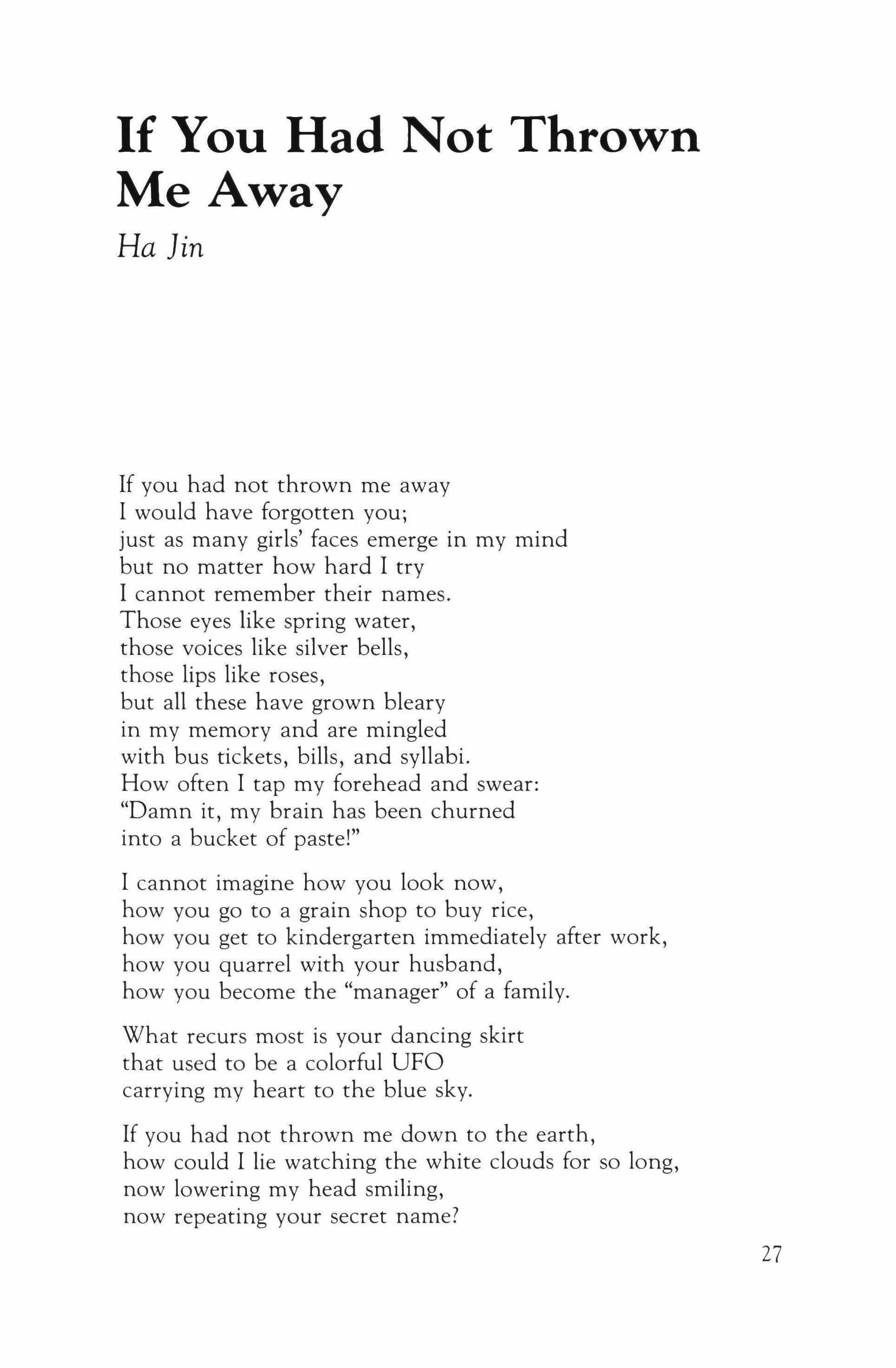
If you had not thrown me away I would have forgotten you; just as many girls' faces emerge in my mind but no matter how hard I try
I cannot remember their names. Those eyes like spring water, those voices like silver bells, those lips like roses, but all these have grown bleary in my memory and are mingled with bus tickets, bills, and syllabi. How often I tap my forehead and swear: "Damn it, my brain has been churned into a bucket of paste!"
I cannot imagine how you look now, how you go to a grain shop to buy rice, how you get to kindergarten immediately after work, how you quarrel with your husband, how you become the "manager" of a family.
What recurs most is your dancing skirt that used to be a colorful UFO carrying my heart to the blue sky.
If you had not thrown me down to the earth, how could I lie watching the white clouds for so long, now lowering my head smiling, now repeating your secret name?
27
[Untitled]
Marina Tsvetaeva
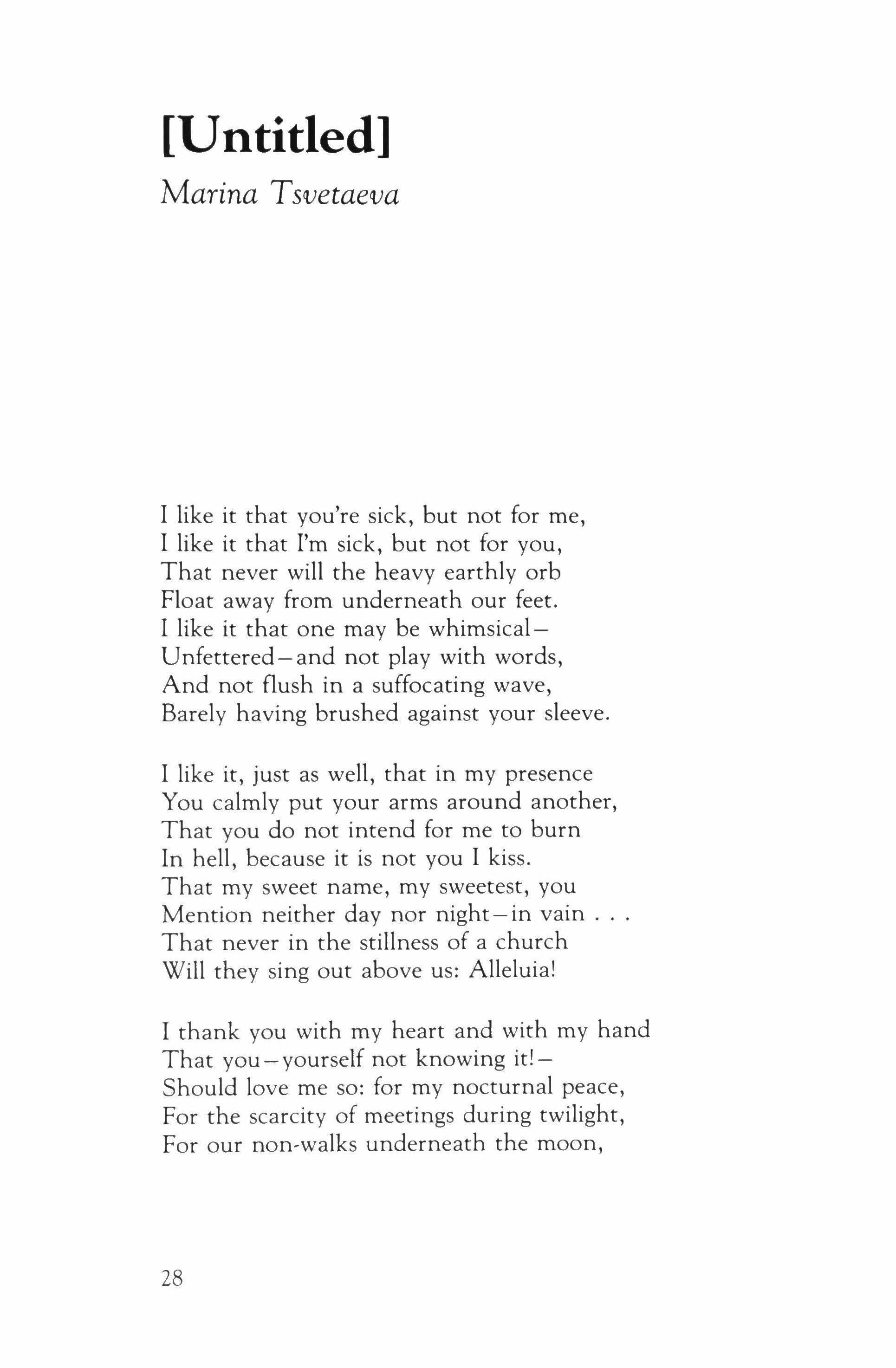
I like it that you're sick, but not for me, I like it that I'm sick, but not for you, That never will the heavy earthly orb Float away from underneath our feet. I like it that one may be whimsicalUnfettered-and not play with words, And not flush in a suffocating wave, Barely having brushed against your sleeve.
I like it, just as well, that in my presence You calmly put your arms around another, That you do not intend for me to burn In hell, because it is not you I kiss. That my sweet name, my sweetest, you Mention neither day nor night - in vain
That never in the stillness of a church Will they sing out above us: Alleluia!
I thank you with my heart and with my hand That you - yourself not knowing it!Should love me so: for my nocturnal peace, For the scarcity of meetings during twilight, For our non-walks underneath the moon,
28
For the sun, which is not above our heads
That you're sick - alas! - but not for me, That I'm sick - alas! - but not for you!
 Translated by Gwenan Wilbur
Translated by Gwenan Wilbur
29
The Mark of Flesh
]anet Sylvester
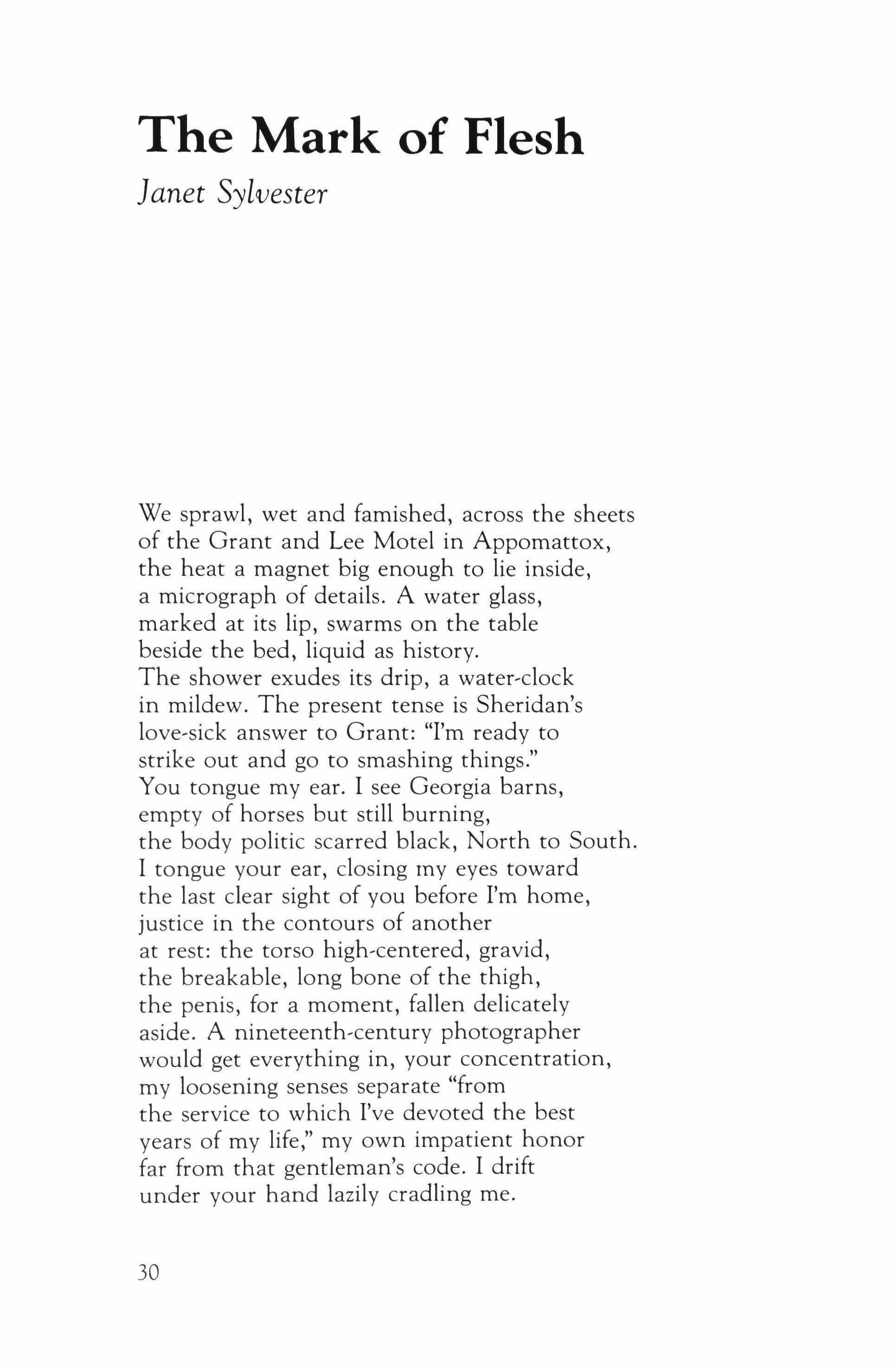
We sprawl, wet and famished, across the sheets of the Grant and Lee Motel in Appomattox, the heat a magnet big enough to lie inside, a micrograph of details. A water glass, marked at its lip, swarms on the table beside the bed, liquid as history. The shower exudes its drip, a water-clock in mildew. The present tense is Sheridan's love-sick answer to Grant: "I'm ready to strike out and go to smashing things." You tongue my ear. I see Georgia barns, empty of horses but still burning, the body politic scarred black, North to South. I tongue your ear, closing my eyes toward the last clear sight of you before I'm home, justice in the contours of another at rest: the torso high-centered, gravid, the breakable, long bone of the thigh, the penis, for a moment, fallen delicately aside. A nineteenth-centurv photographer would get everything in, your concentration, my loosening senses separate "from the service to which I've devoted the best years of my life," my own impatient honor far from that gentleman's code. I drift under your hand lazily cradling me.
30
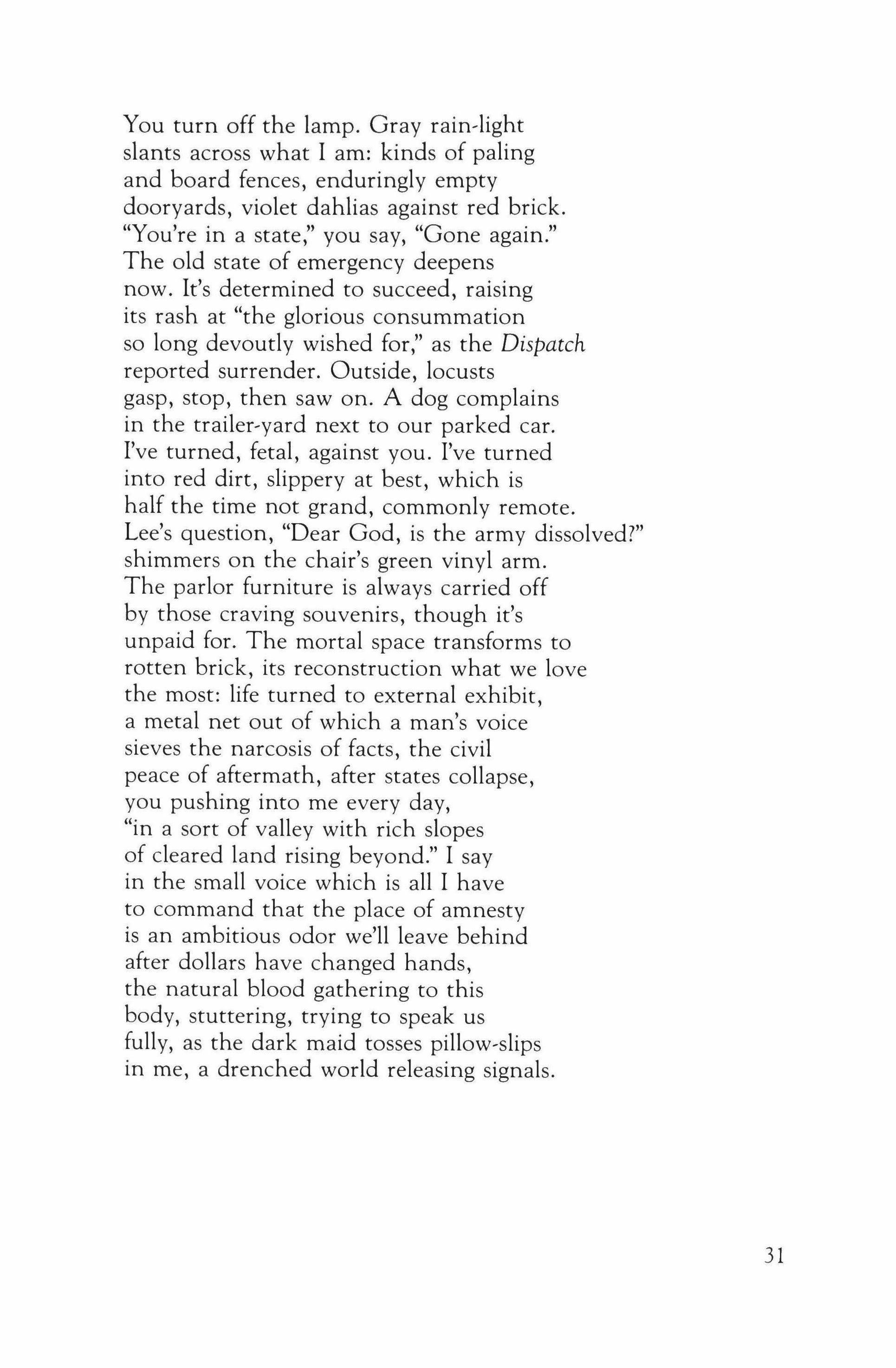
You turn off the lamp. Gray rain-light slants across what I am: kinds of paling and board fences, enduringly empty dooryards, violet dahlias against red brick. "You're in a state," you say, "Gone again." The old state of emergency deepens now. It's determined to succeed, raising its rash at "the glorious consummation so long devoutly wished for," as the Dispatch reported surrender. Outside, locusts gasp, stop, then saw on. A dog complains in the trailer-yard next to our parked car. I've turned, fetal, against you. I've turned into red dirt, slippery at best, which is half the time not grand, commonly remote. Lee's question, "Dear God, is the army dissolved?" shimmers on the chair's green vinyl arm. The parlor furniture is always carried off by those craving souvenirs, though it's unpaid for. The mortal space transforms to rotten brick, its reconstruction what we love the most: life turned to external exhibit, a metal net out of which a man's voice sieves the narcosis of facts, the civil peace of aftermath, after states collapse, you pushing into me every day, "in a sort of valley with rich slopes of cleared land rising beyond." I say in the small voice which is all I have to command that the place of amnesty is an ambitious odor we'll leave behind after dollars have changed hands, the natural blood gathering to this body, stuttering, trying to speak us fully, as the dark maid tosses pillow-slips in me, a drenched world releasing signals.
31
Goddamn Theology
Pattiann Rogers
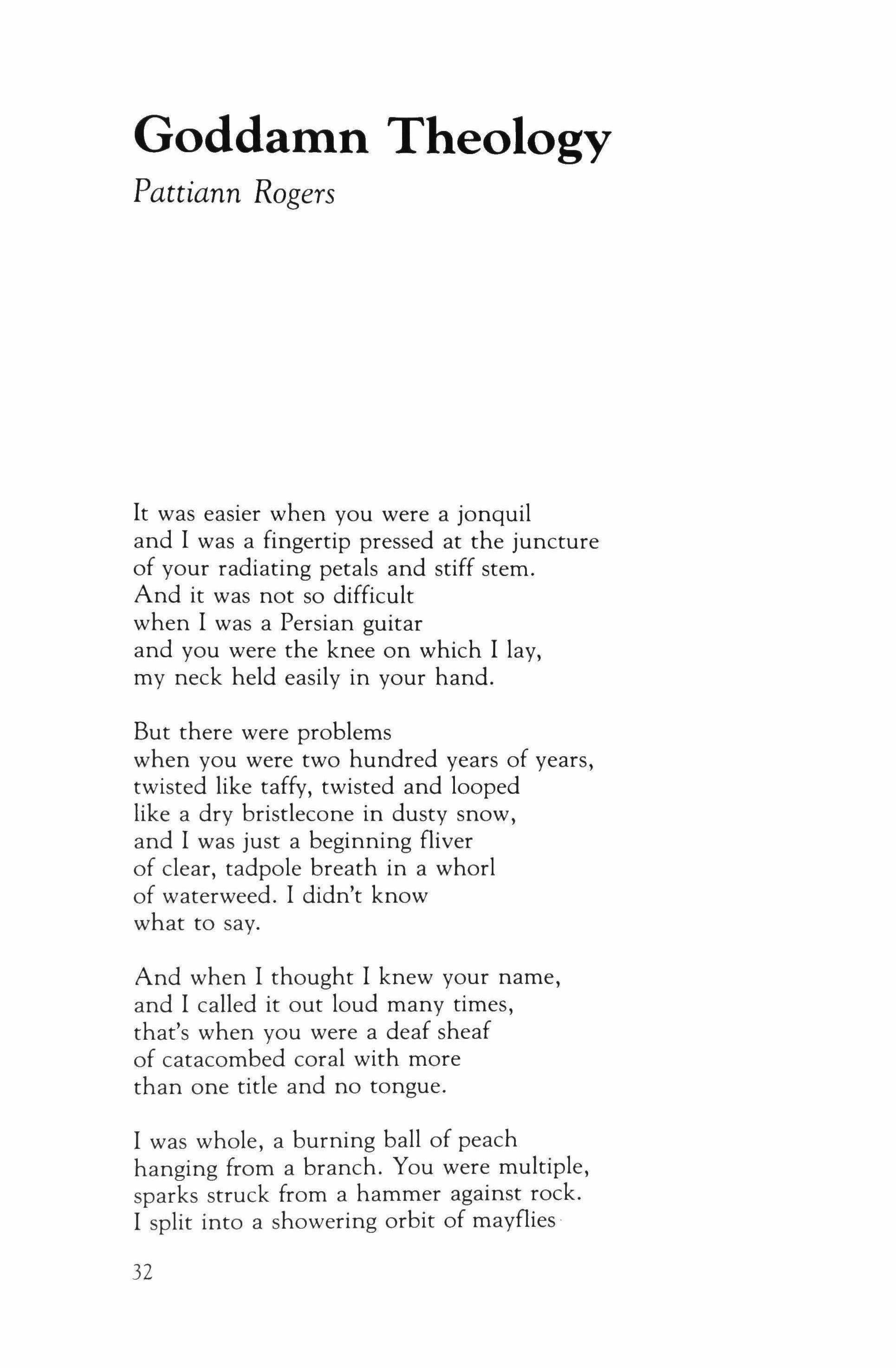
It was easier when you were a jonquil and I was a fingertip pressed at the juncture of your radiating petals and stiff stem. And it was not so difficult when I was a Persian guitar and you were the knee on which I lay, my neck held easily in your hand.
But there were problems when you were two hundred years of years, twisted like taffy, twisted and looped like a dry bristlecone in dusty snow, and I was just a beginning fliver of clear, tadpole breath in a whorl of waterweed. I didn't know what to say.
And when I thought I knew your name, and I called it out loud many times, that's when you were a deaf sheaf of catacombed coral with more than one title and no tongue.
I was whole, a burning ball of peach hanging from a branch. You were multiple, sparks struck from a hammer against rock. I split into a showering orbit of mayflies
32
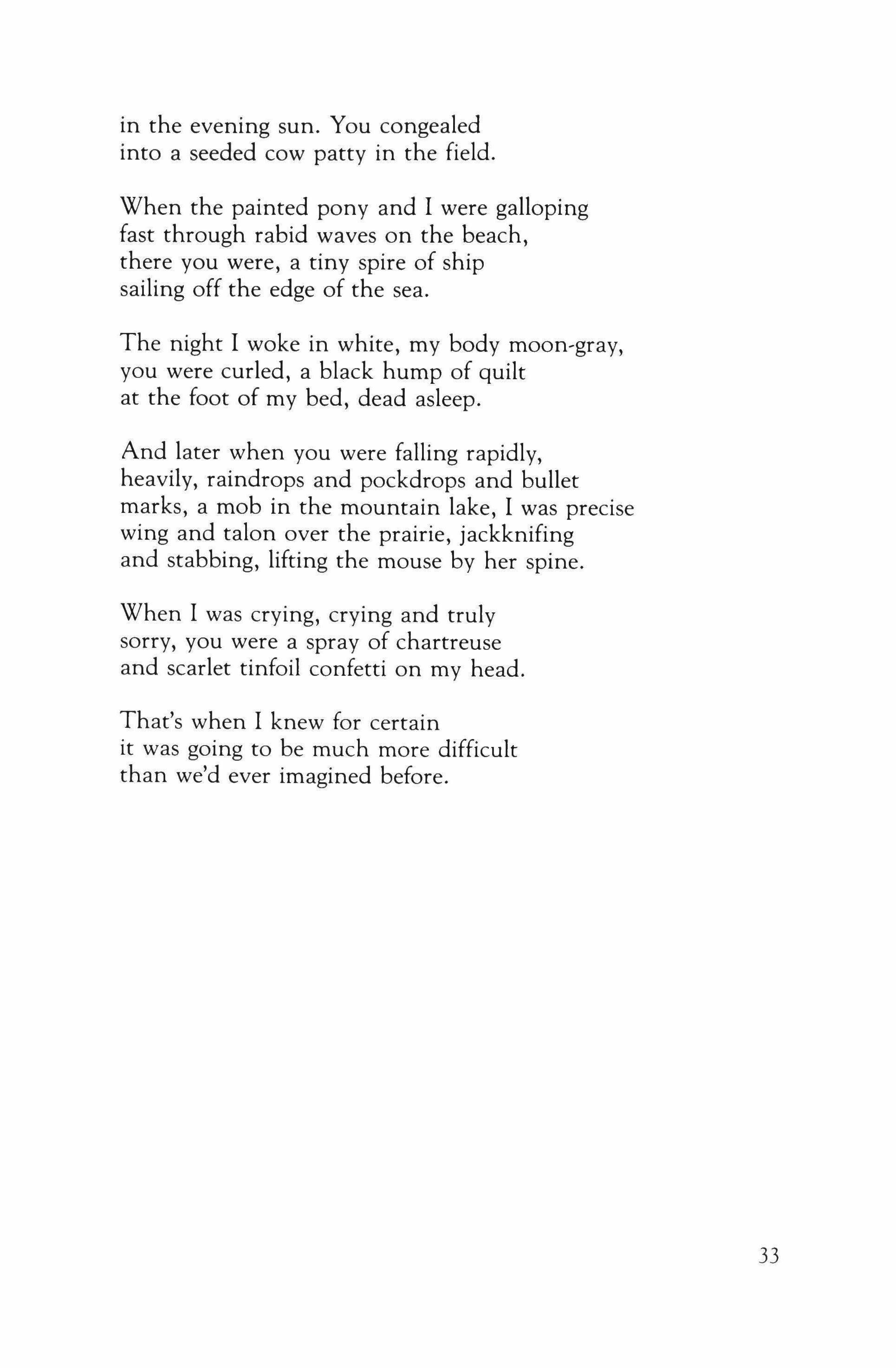
in the evening sun. You congealed into a seeded cow patty in the field.
When the painted pony and I were galloping fast through rabid waves on the beach, there you were, a tiny spire of ship sailing off the edge of the sea.
The night I woke in white, my body moon-gray, you were curled, a black hump of quilt at the foot of my bed, dead asleep.
And later when you were falling rapidly, heavily, raindrops and pockdrops and bullet marks, a mob in the mountain lake, I was precise wing and talon over the prairie, jackknifing and stabbing, lifting the mouse by her spine.
When I was crying, crying and truly sorry, you were a spray of chartreuse and scarlet tinfoil confetti on my head.
That's when I knew for certain it was going to be much more difficult than we'd ever imagined before.
33
Two Poems
Susan Stewart

The Forest
You should lie down now and remember the forest, for it is disappearingno, the truth is it is gone now and so what details you can bring back might have a kind of life.
Not the one you had hoped for, but a lifeyou should lie down now and remember the forestnonetheless, you might call it "in the forest," no the truth is it is gone now, starting somewhere near the beginning, that edge,
Or instead the first layer, the place you remember (not the one you had hoped for, but a life) as if it were firm, underfoot, for that place is a sea, nonetheless, you might call it "in the forest," which we can never drift above, we were there or we were not,
No surface, skimming. And blank in life, too, or instead the first layer, the place you remember, as layers fold in time, black humus there, as if it were firm, underfoot, for that place is a sea, like a light left hand descending, always on the same keys.
The flecked birds of the forest sing behind and before no surface, skimming. And blank in life, too, sing without a music where there cannot be an order,
34
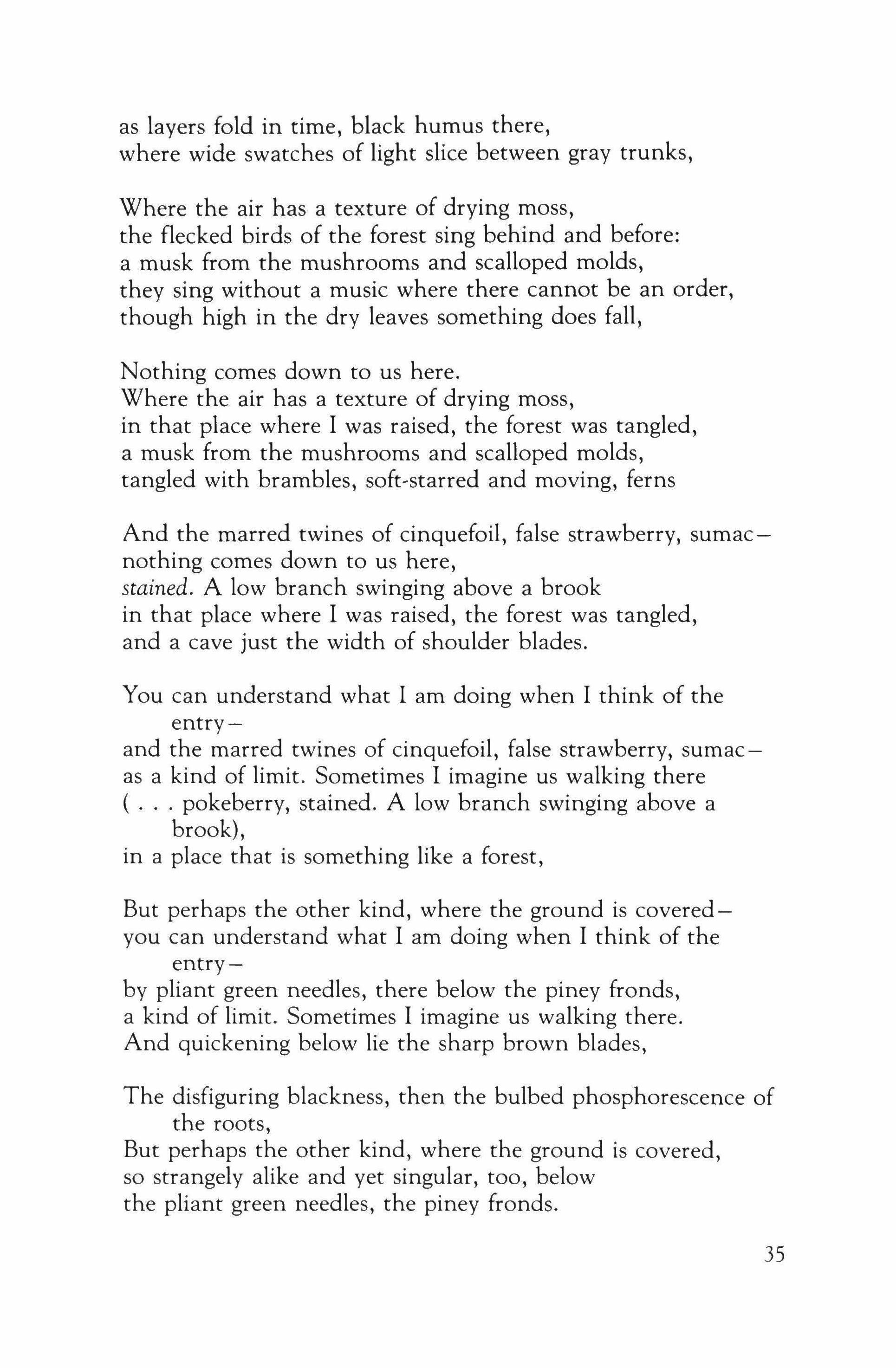
as layers fold in time, black humus there, where wide swatches of light slice between gray trunks,
Where the air has a texture of drying moss, the flecked birds of the forest sing behind and before: a musk from the mushrooms and scalloped molds, they sing without a music where there cannot be an order, though high in the dry leaves something does fall,
Nothing comes down to us here.
Where the air has a texture of drying moss, in that place where I was raised, the forest was tangled, a musk from the mushrooms and scalloped molds, tangled with brambles, soft-starred and moving, ferns
And the marred twines of cinquefoil, false strawberry, sumacnothing comes down to us here, stained. A low branch swinging above a brook in that place where I was raised, the forest was tangled, and a cave just the width of shoulder blades.
You can understand what I am doing when I think of the entryand the marred twines of cinquefoil, false strawberry, sumacas a kind of limit. Sometimes I imagine us walking there ( pokeberry, stained. A low branch swinging above a brook), in a place that is something like a forest,
But perhaps the other kind, where the ground is coveredyou can understand what I am doing when I think of the entryby pliant green needles, there below the piney fronds, a kind of limit. Sometimes I imagine us walking there. And quickening below lie the sharp brown blades,
The disfiguring blackness, then the bulbed phosphorescence of the roots, But perhaps the other kind, where the ground is covered, so strangely alike and yet singular, too, below the pliant green needles, the piney fronds.
35

Once we were lost in the forest, so strangely alike, and yet singular, too, but the truth is, it is, lost to us now.
36
The Meadow
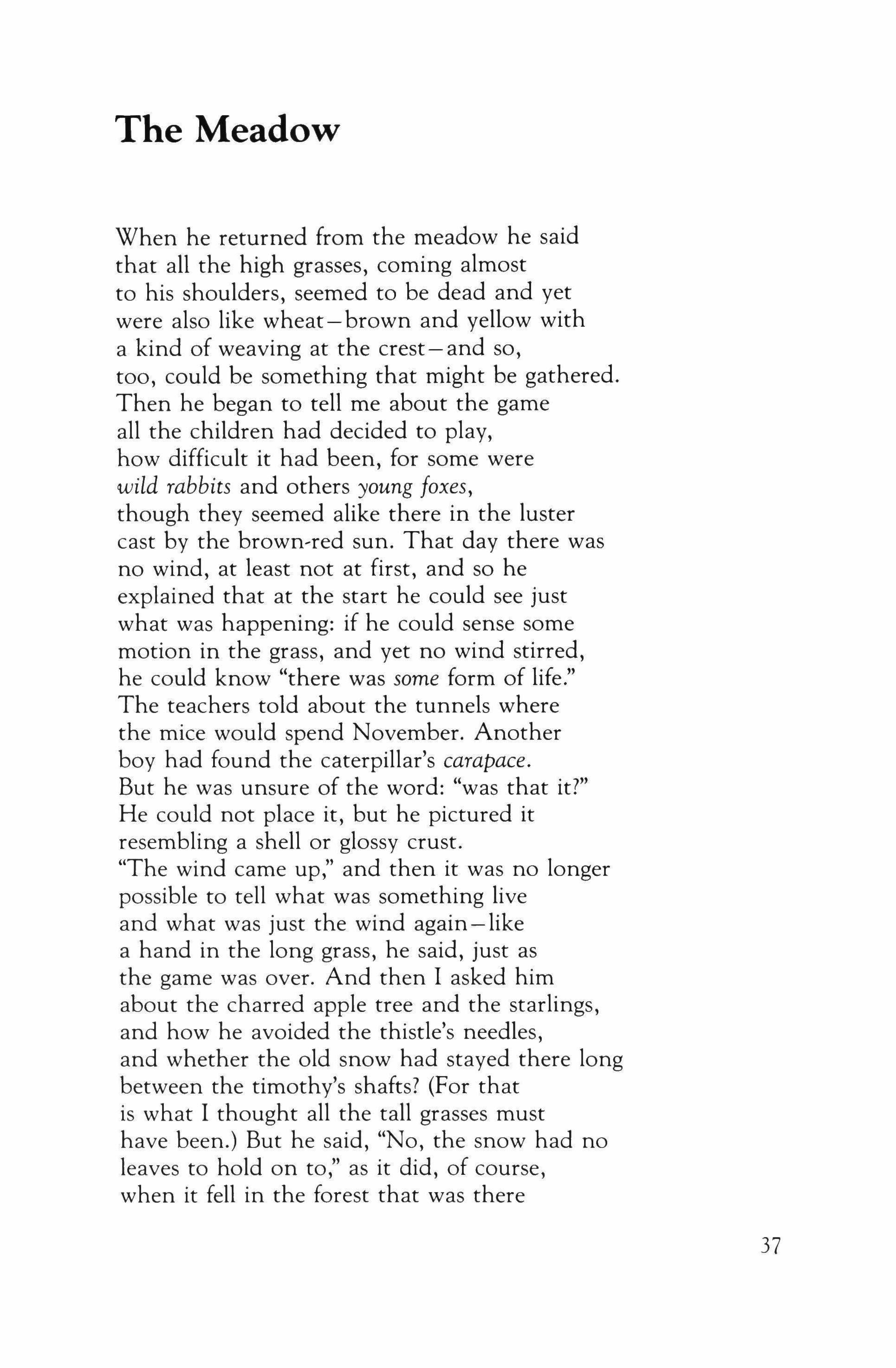
When he returned from the meadow he said that all the high grasses, coming almost to his shoulders, seemed to be dead and yet were also like wheat - brown and yellow with a kind of weaving at the crest - and so, too, could be something that might be gathered. Then he began to tell me about the game all the children had decided to play, how difficult it had been, for some were wild rabbits and others young foxes, though they seemed alike there in the luster cast by the brown-red sun. That day there was no wind, at least not at first, and so he explained that at the start he could see just what was happening: if he could sense some motion in the grass, and yet no wind stirred, he could know "there was some form of life." The teachers told about the tunnels where the mice would spend November. Another boy had found the caterpillar's carapace. But he was unsure of the word: "was that it?" He could not place it, but he pictured it resembling a shell or glossy crust. "The wind came up," and then it was no longer possible to tell what was something live and what was just the wind again-like a hand in the long grass, he said, just as the game was over. And then I asked him about the charred apple tree and the starlings, and how he avoided the thistle's needles, and whether the old snow had stayed there long between the timothy's shafts? (For that is what I thought all the tall grasses must have been.) But he said, "No, the snow had no leaves to hold on to," as it did, of course, when it fell in the forest that was there
37

in the distance. And he said that nothing was alive now that wasn't the color of grasses. He hadn't seen them, was sure he hadn't seen them and he wondered what kind of meadow I could be thinking of.
38
Three Poems
Branko Miljkovic
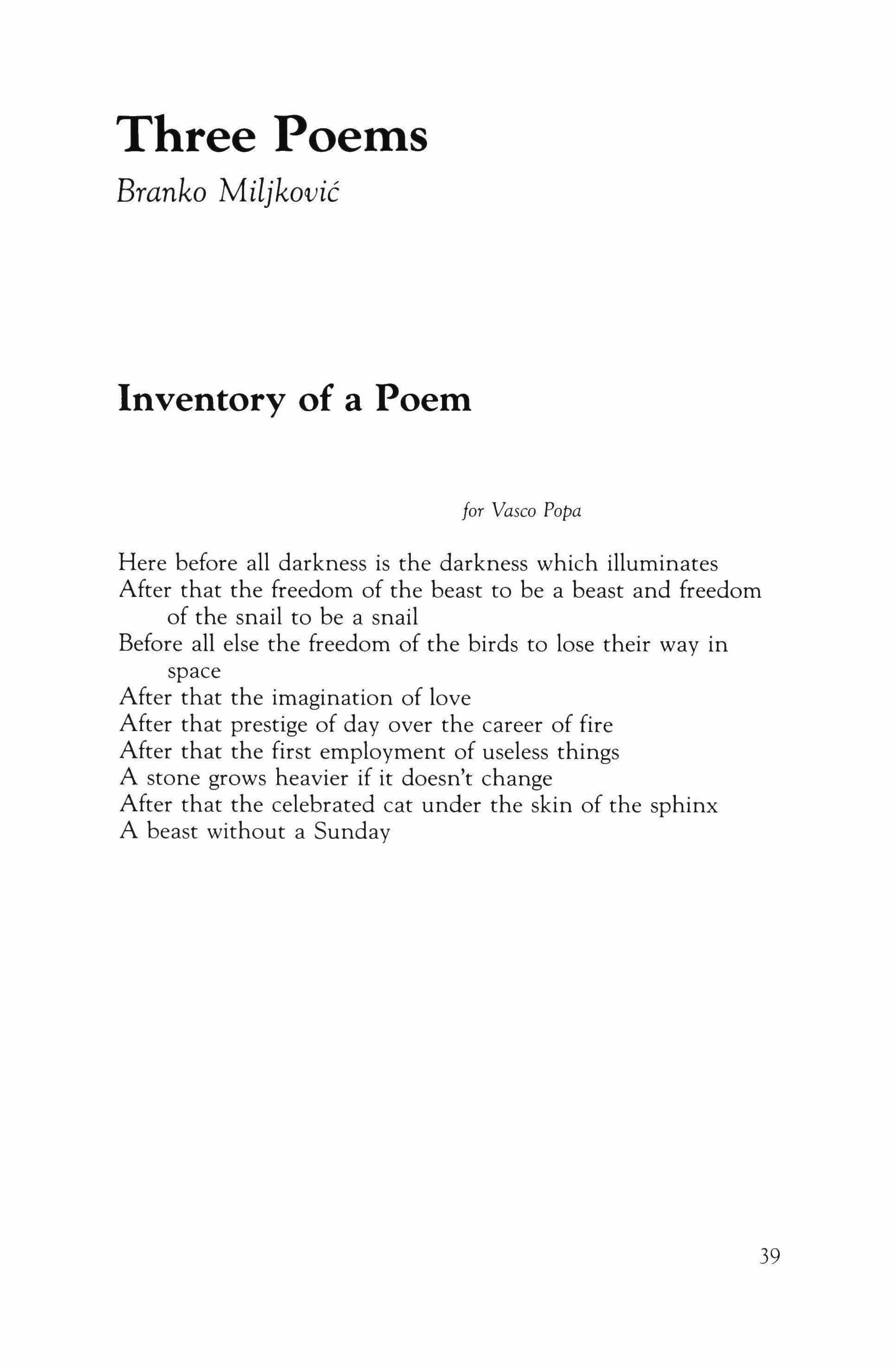
Inventory of a Poem
for Vasco Papa
Here before all darkness is the darkness which illuminates
After that the freedom of the beast to be a beast and freedom of the snail to be a snail
Before all else the freedom of the birds to lose their way in space
After that the imagination of love
After that prestige of day over the career of fire
After that the first employment of useless things
A stone grows heavier if it doesn't change
After that the celebrated cat under the skin of the sphinx
A beast without a Sunday
39
While You Are Singing
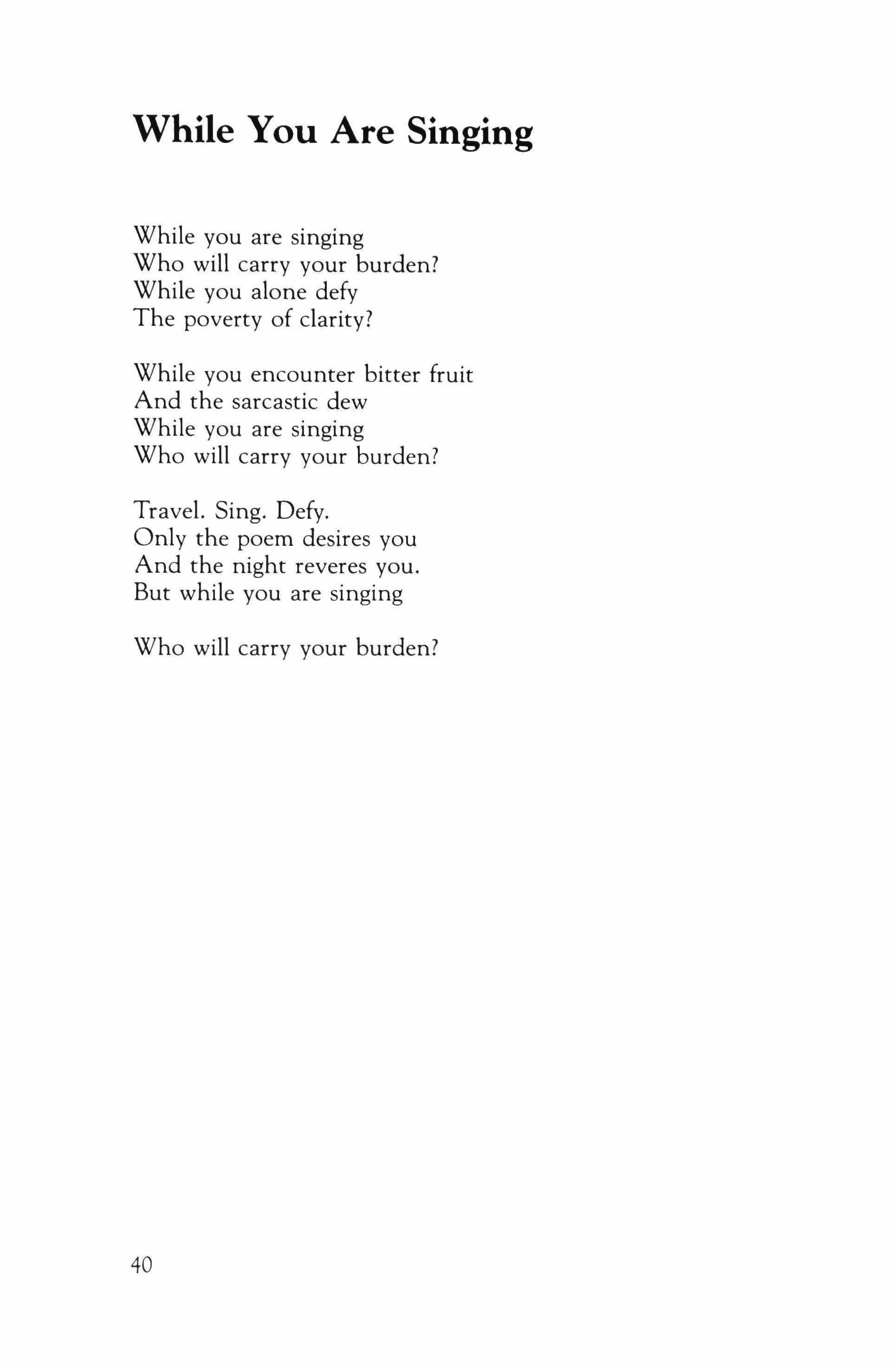
While you are singing
Who will carry your burden?
While you alone defy The poverty of clarity?
While you encounter bitter fruit And the sarcastic dew
While you are singing Who will carry your burden?
Travel. Sing. Defy.
Only the poem desires you And the night reveres you.
But while you are singing
Who will carry your burden?
40
An Orphic Legacy
If you think you want a poem
Descend into the earth
But first domesticate the beast-
Then you'll know it will permit return
If you think you want a poem
Dig it from the earth
But be careful of its habits
And its knowledge of the underground
Words have the soul of a crowd
They're mollified by simplicity and doves
But the dangers overcome by metaphor
Sing more ominously somewhere else
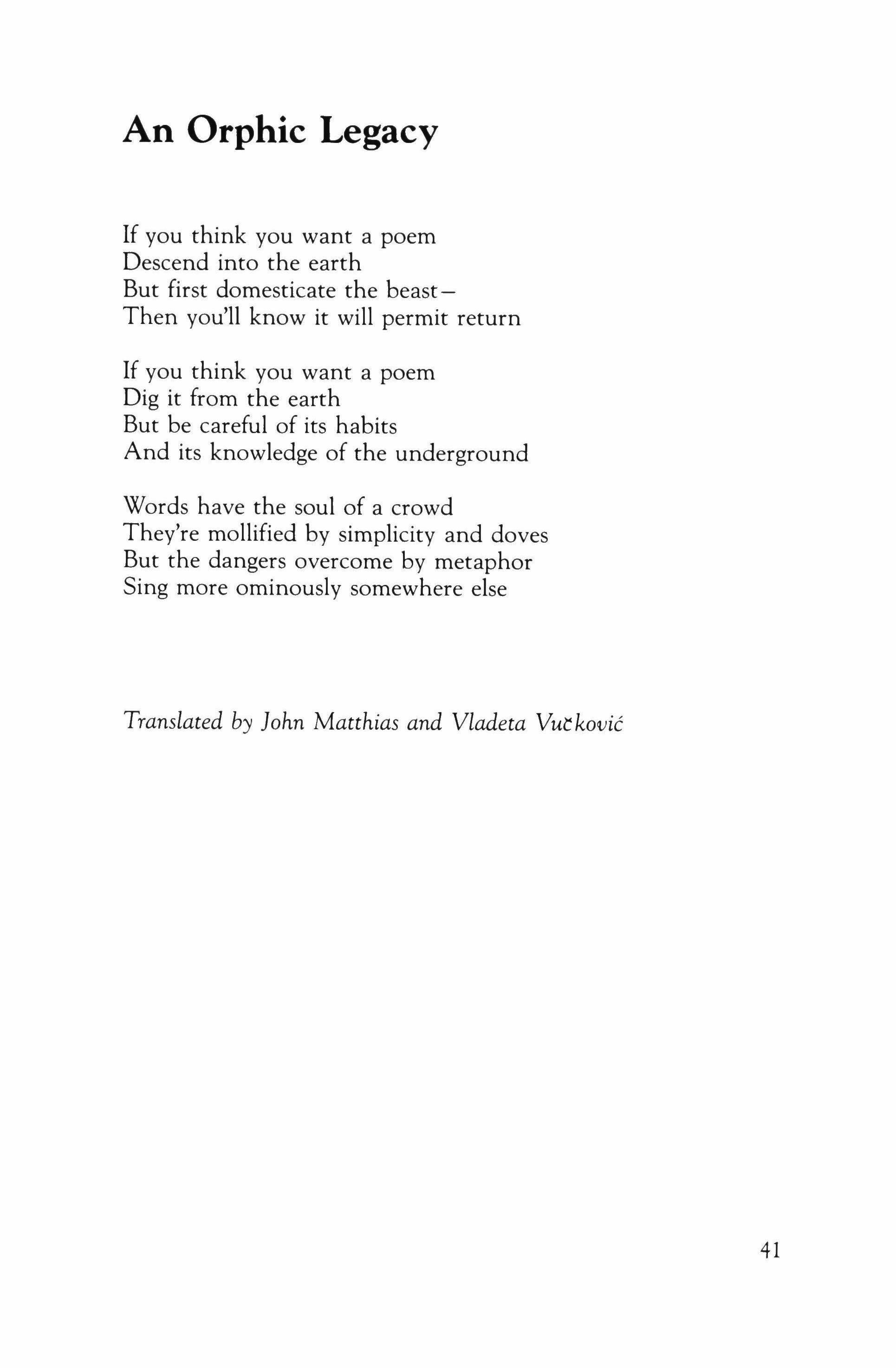 Translated
Translated
by
John Matthias and Vladeta Vutkovic
41
The Iceberg, the Shadow
Tom Wayman
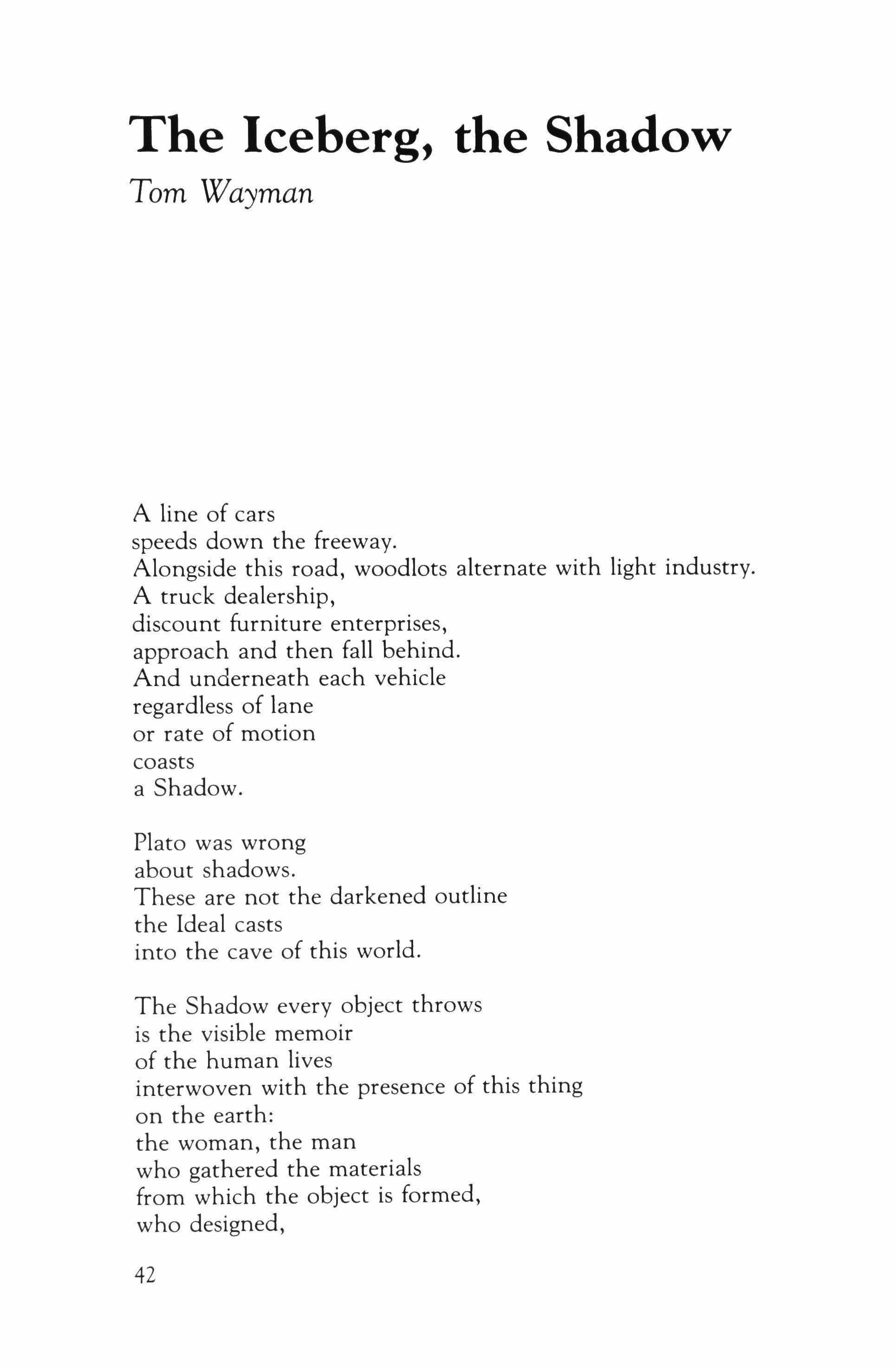
A line of cars speeds down the freeway. Alongside this road, woodlots alternate with light industry. A truck dealership, discount furniture enterprises, approach and then fall behind. And underneath each vehicle regardless of lane or rate of motion coasts a Shadow.
Plato was wrong about shadows. These are not the darkened outline the Ideal casts into the cave of this world.
The Shadow every object throws is the visible memoir of the human lives interwoven with the presence of this thing on the earth: the woman, the man who gathered the materials from which the object is formed, who designed,
42
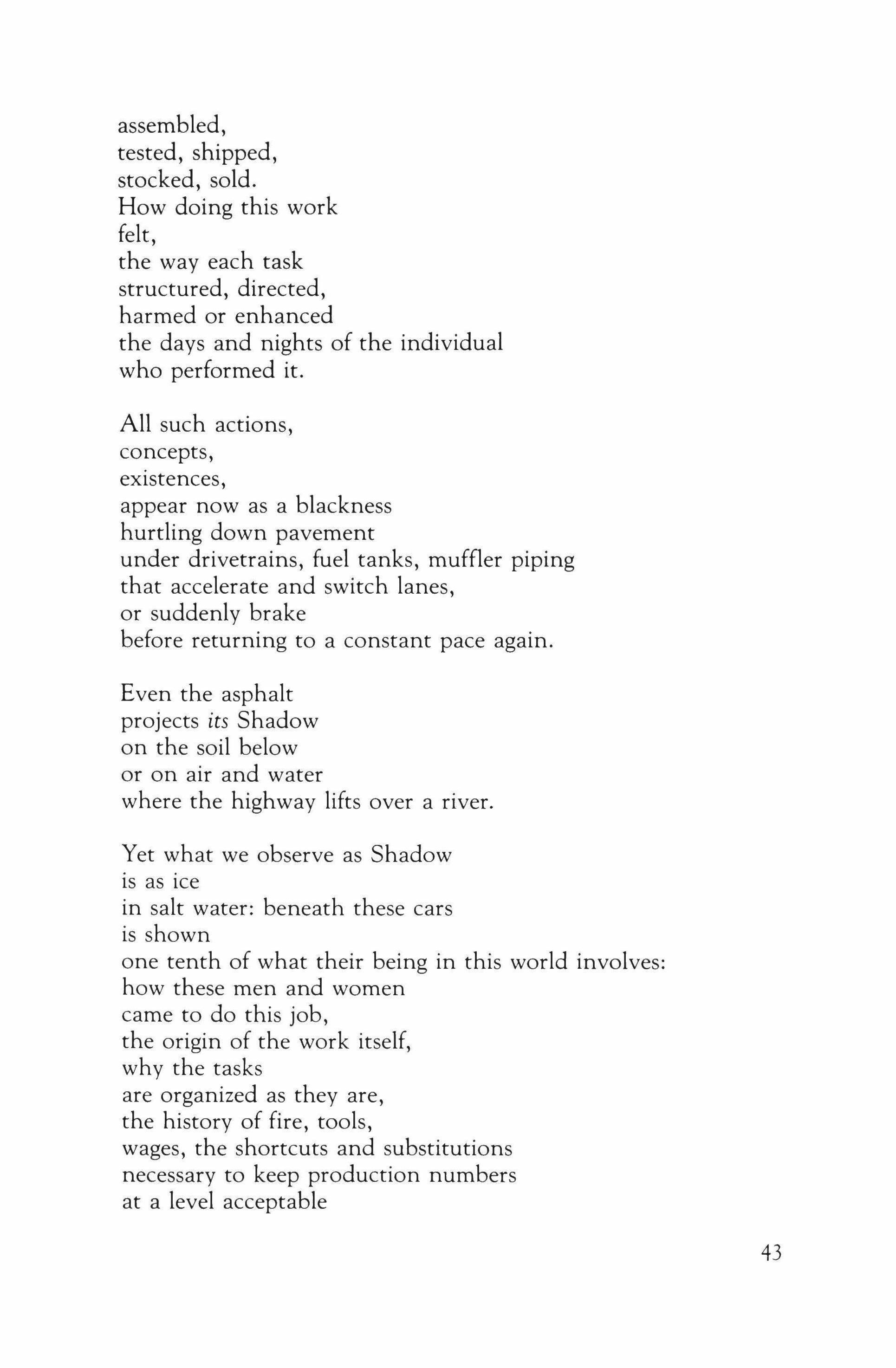
assembled, tested, shipped, stocked, sold. How doing this work felt, the way each task structured, directed, harmed or enhanced the days and nights of the individual who performed it.
All such actions, concepts, existences, appear now as a blackness hurtling down pavement under drivetrains, fuel tanks, muffler piping that accelerate and switch lanes, or suddenly brake before returning to a constant pace again.
Even the asphalt projects its Shadow on the soil below or on air and water where the highway lifts over a river.
Yet what we observe as Shadow is as ice in salt water: beneath these cars is shown one tenth of what their being in this world involves: how these men and women came to do this job, the origin of the work itself, why the tasks are organized as they are, the history of fire, tools, wages, the shortcuts and substitutions necessary to keep production numbers at a level acceptable
43
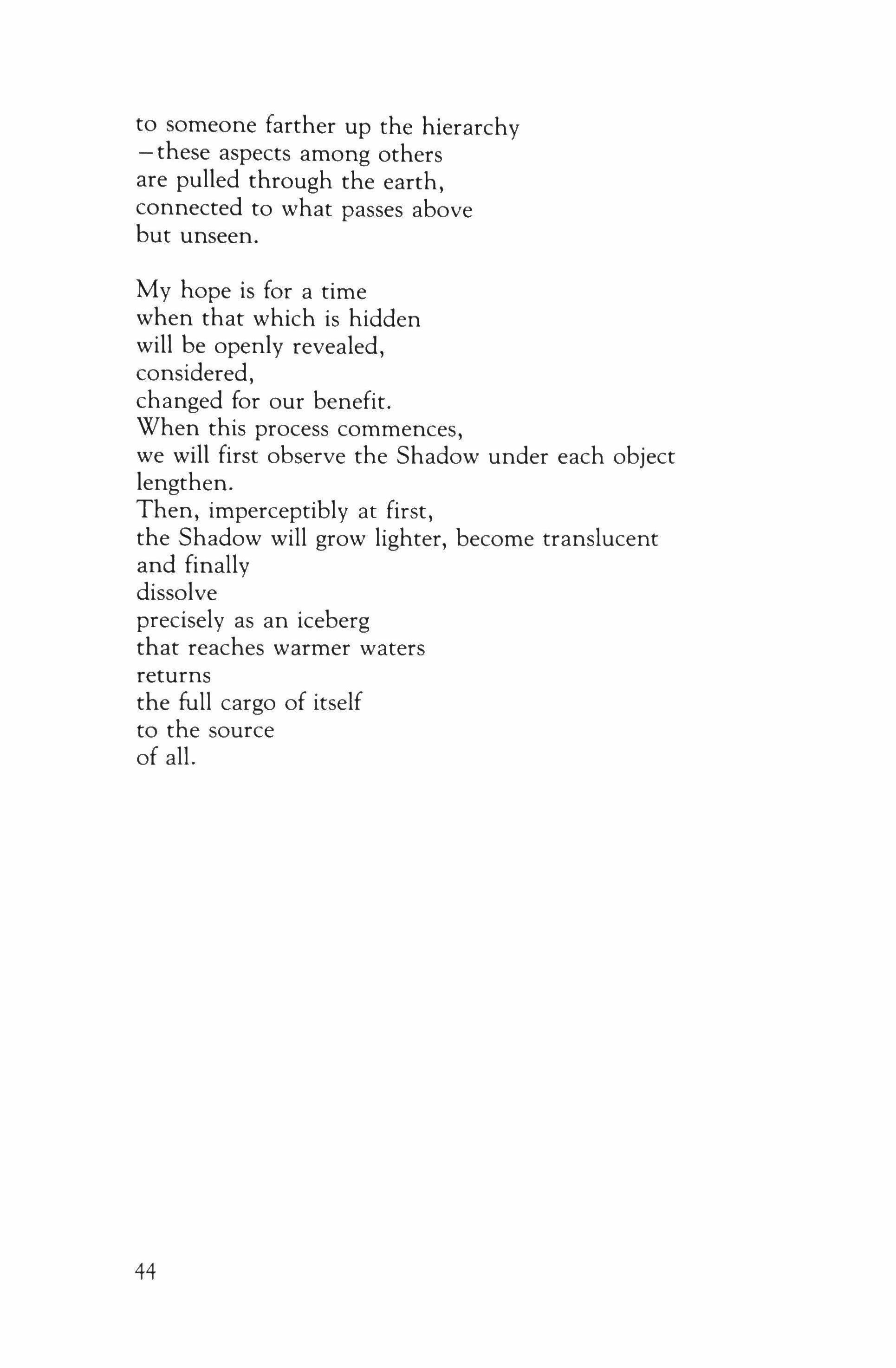
to someone farther up the hierarchy - these aspects among others are pulled through the earth, connected to what passes above but unseen.
My hope is for a time when that which is hidden will be openly revealed, considered, changed for our benefit. When this process commences, we will first observe the Shadow under each object lengthen.
Then, imperceptibly at first, the Shadow will grow lighter, become translucent and finally dissolve precisely as an iceberg that reaches warmer waters returns the full cargo of itself to the source of all.
44
Percussion
Dabney Stuart

It's nothing more than last night's coating of ice on the magnolia cracking as the day rises, but it sounds like Morse code-explicit, measured, conversant. The tree rising leaved among bare others becomes isolate, too, in its own sound, self-centered, breaking out in a language that would invent its listeners, the best of whom would dance to it, hearing the beat within the beat sleeved, insistent. Mozart, the Missa Luba. The pupa's first slow distending ticks here, too, in the morning's waste, and the wresting of sound from the joints of a body on the rack. The other person standing across the lawn, just visible through the brittle leaves, holds his upper arm level with the horizon, as if his elbow were strung to a crutch above: his neck tilts slightly, his hand twitches. He moves
45
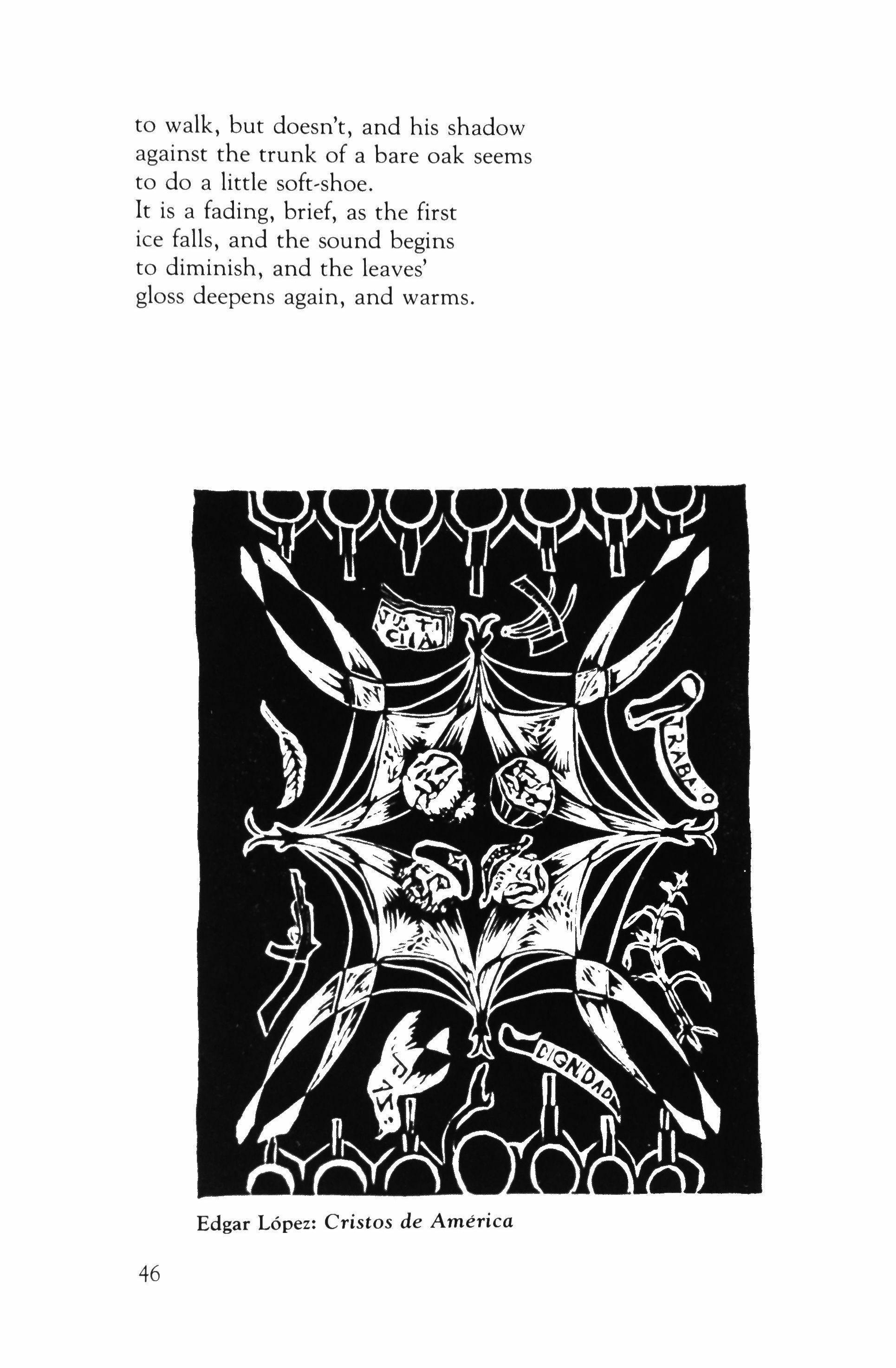
to walk, but doesn't, and his shadow against the trunk of a bare oak seems to do a little soft-shoe.
It is a fading, brief, as the first ice falls, and the sound begins to diminish, and the leaves' gloss deepens again, and warms.
46
Edgar Lopez: Cristos de America
Two Poems
Anne Guzzardi
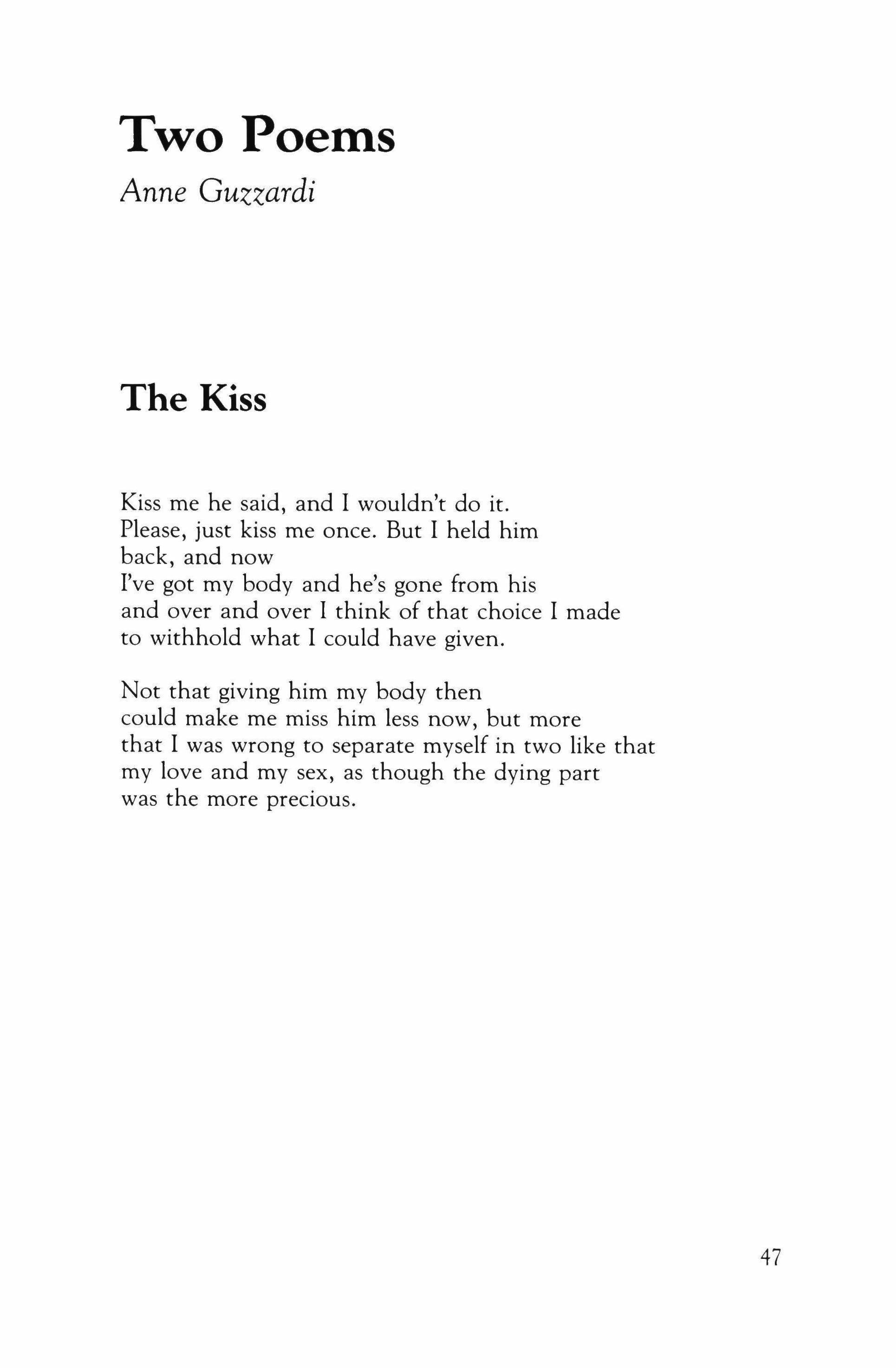
The Kiss
Kiss me he said, and I wouldn't do it. Please, just kiss me once. But I held him back, and now I've got my body and he's gone from his and over and over I think of that choice I made to withhold what I could have given.
Not that giving him my body then could make me miss him less now, but more that I was wrong to separate myself in two like that my love and my sex, as though the dying part was the more precious.
47
Wake
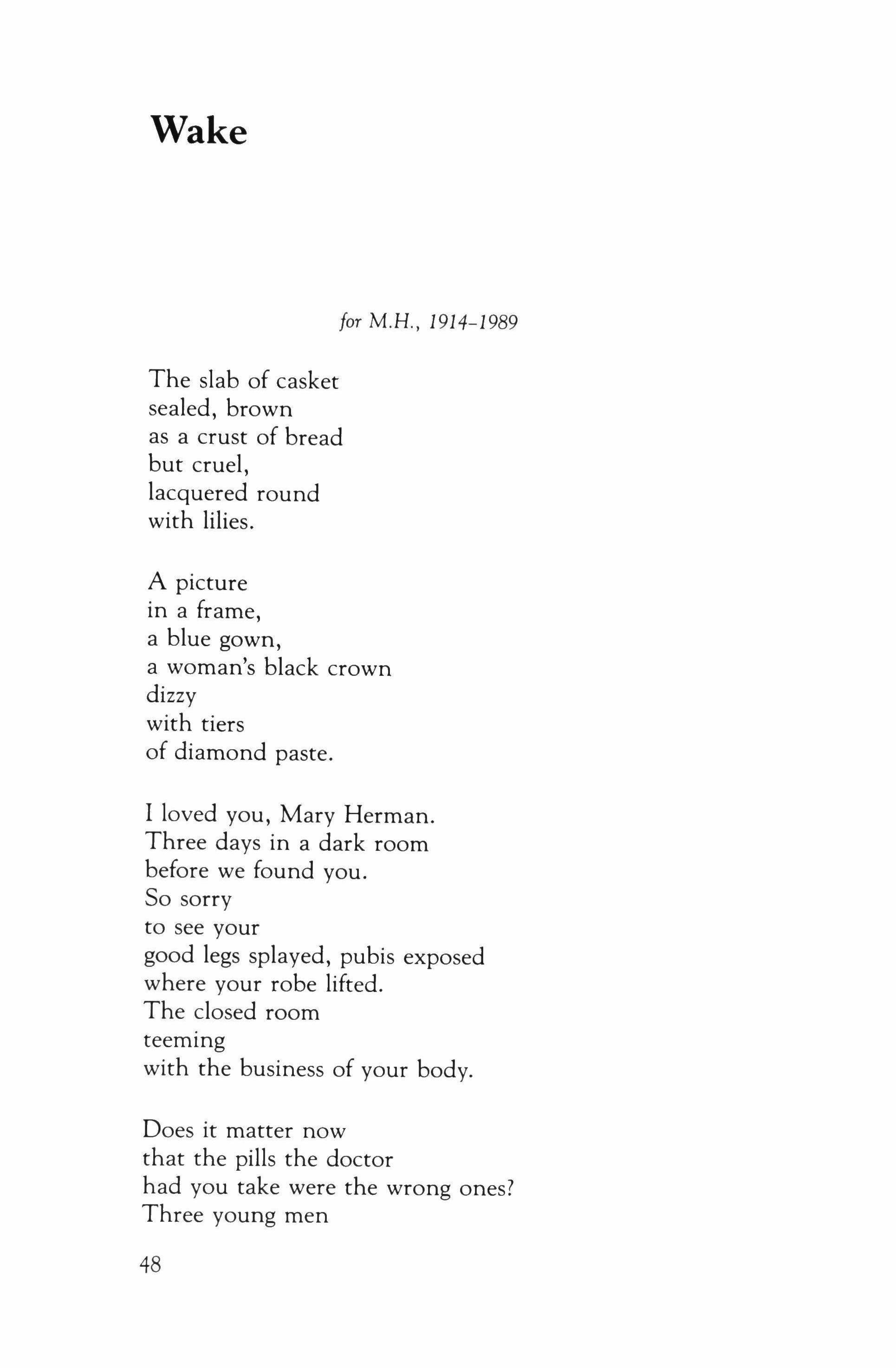
fOT M.H., 1914-1989
The slab of casket sealed, brown as a crust of bread but cruel, lacquered round with lilies.
A picture in a frame, a blue gown, a woman's black crown dizzy with tiers of diamond paste.
I loved you, Mary Herman. Three days in a dark room before we found you. So sorry to see your good legs splayed, pubis exposed where your robe lifted. The closed room teeming with the business of your body. Does it matter now that the pills the doctor had you take were the wrong ones? Three young men
48
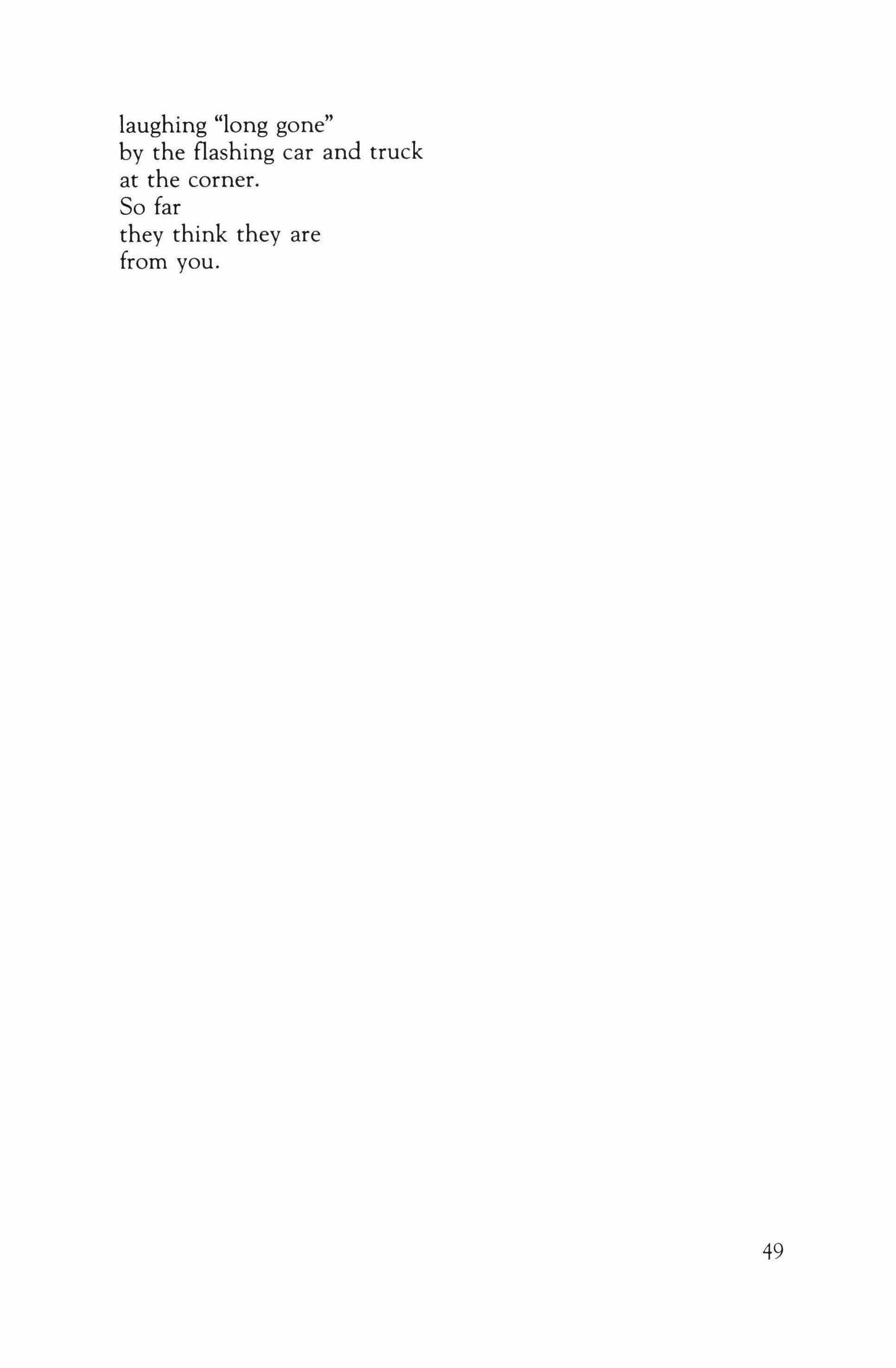
laughing "long gone" by the flashing car and truck at the corner. So far they think they are from you.
49
Bluegum: On the Curving Paths of Golden Gate Park
Sandra McPherson
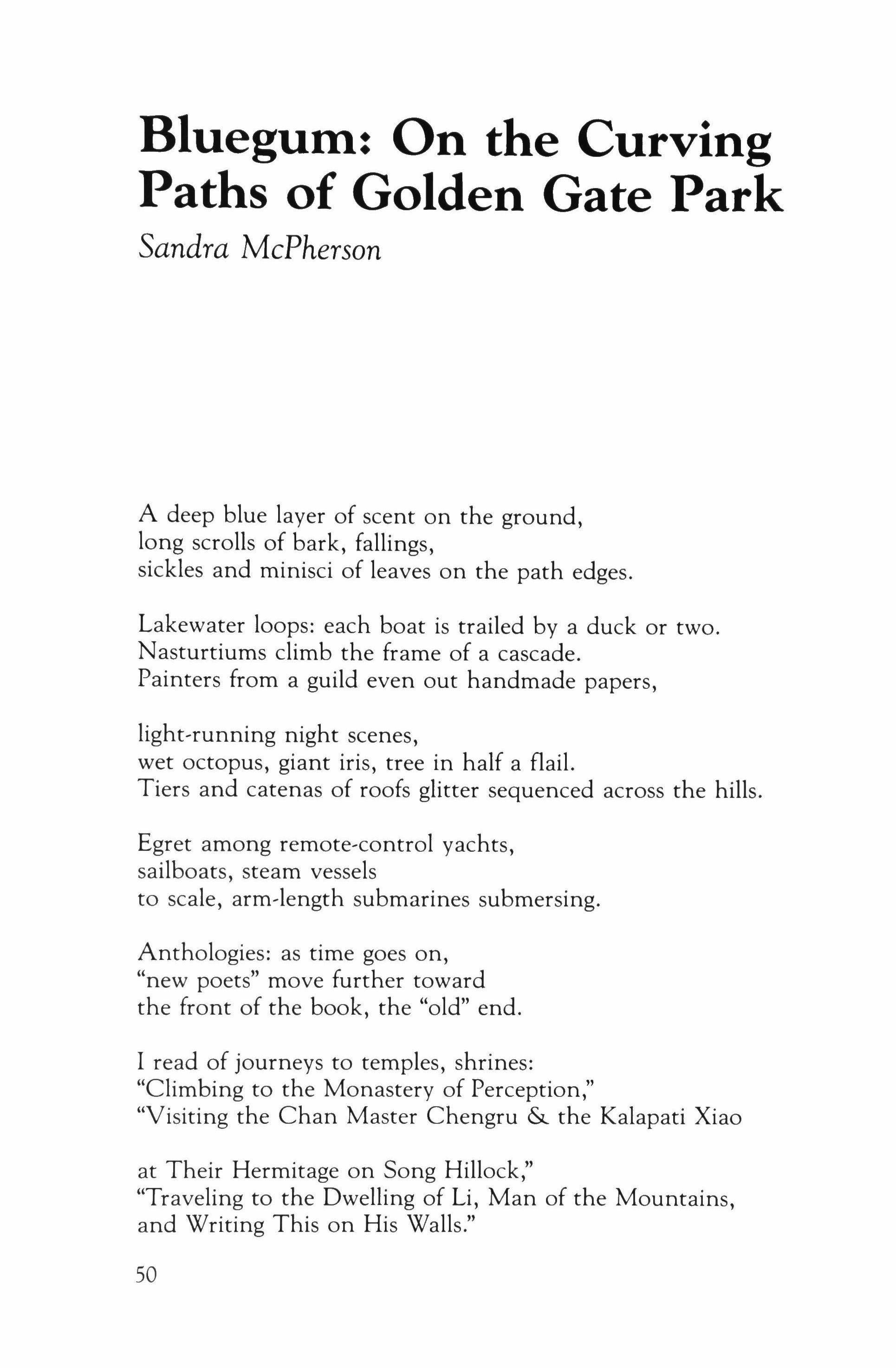
A deep blue layer of scent on the ground, long scrolls of bark, fallings, sickles and minisci of leaves on the path edges.
Lakewater loops: each boat is trailed by a duck or two. Nasturtiums climb the frame of a cascade. Painters from a guild even out handmade papers, light-running night scenes, wet octopus, giant iris, tree in half a flail. Tiers and catenas of roofs glitter sequenced across the hills.
Egret among remote-control yachts, sailboats, steam vessels to scale, arm-length submarines submersing.
Anthologies: as time goes on, "new poets" move further toward the front of the book, the "old" end.
I read of journeys to temples, shrines: "Climbing to the Monastery of Perception," "Visiting the Chan Master Chengru & the Kalapati Xiao
at Their Hermitage on Song Hillock," "Traveling to the Dwelling of Li, Man of the Mountains, and Writing This on His Walls."
50
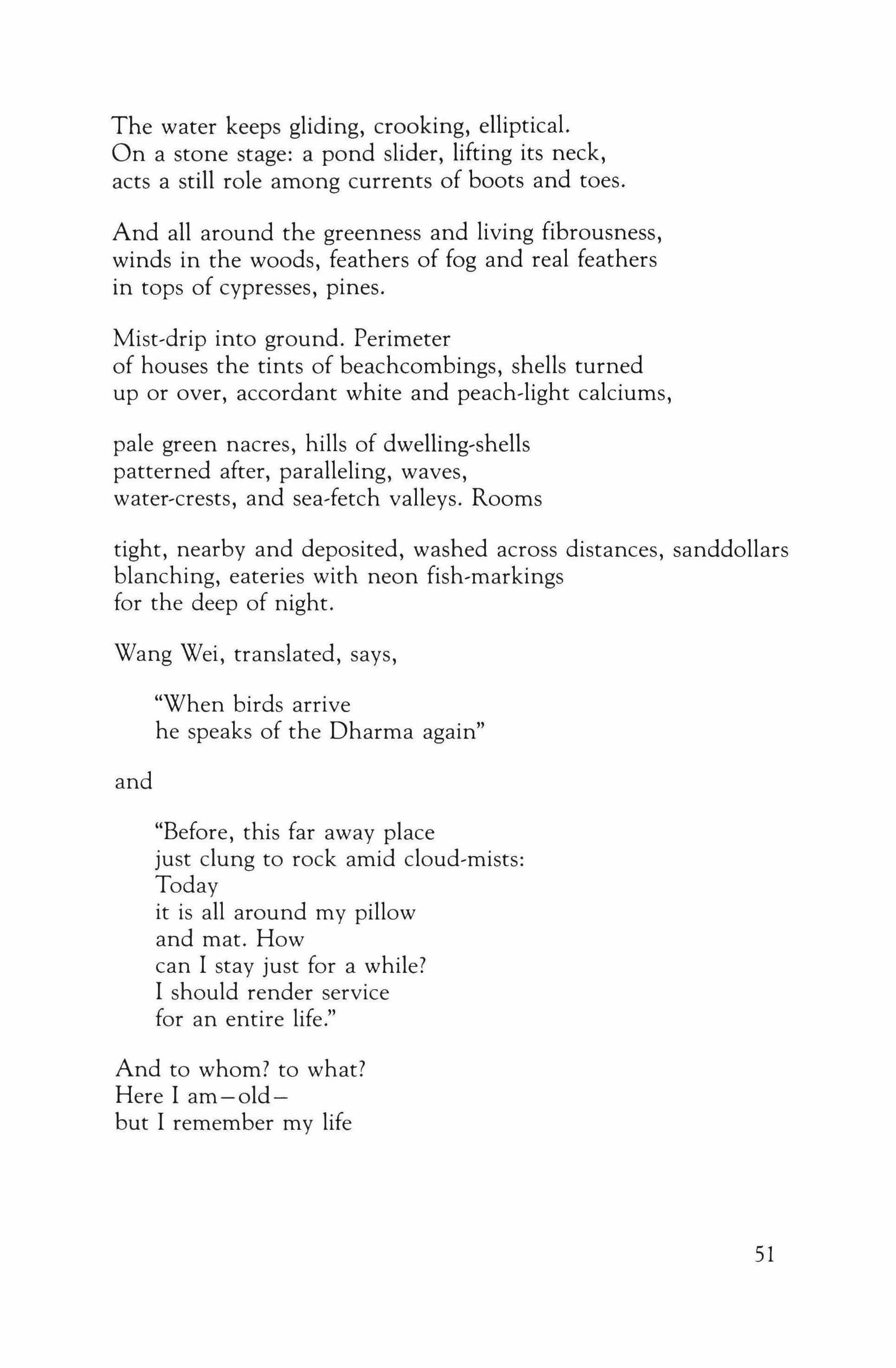
The water keeps gliding, crooking, elliptical. On a stone stage: a pond slider, lifting its neck, acts a still role among currents of boots and toes.
And all around the greenness and living fibrousness, winds in the woods, feathers of fog and real feathers in tops of cypresses, pines.
Mist-drip into ground. Perimeter of houses the tints of beachcombings, shells turned up or over, accordant white and peach-light calciums, pale green nacres, hills of dwelling-shells patterned after, paralleling, waves, water-crests, and sea-fetch valleys. Rooms tight, nearby and deposited, washed across distances, sanddollars blanching, eateries with neon fish-markings for the deep of night.
Wang Wei, translated, says, "When birds arrive he speaks of the Dharma again" and "Before, this far away place just clung to rock amid cloud-mists: Today it is all around my pillow and mat. How can I stay just for a while? I should render service for an entire life."
And to whom? to what? Here I am-oldbut I remember my life
51
from the time I learned of indelible ink, just south, over that blue range white in fog. But the surfaces it was written on-
silk labels, slick box lids, lists for rain and mildew and illuminations that fadeare speckles now and crumbs and wisps.
Service for life:
as red-beaded banks of toyon bolster the birds and leather bergenia's moist leaves soothe the rough newts.
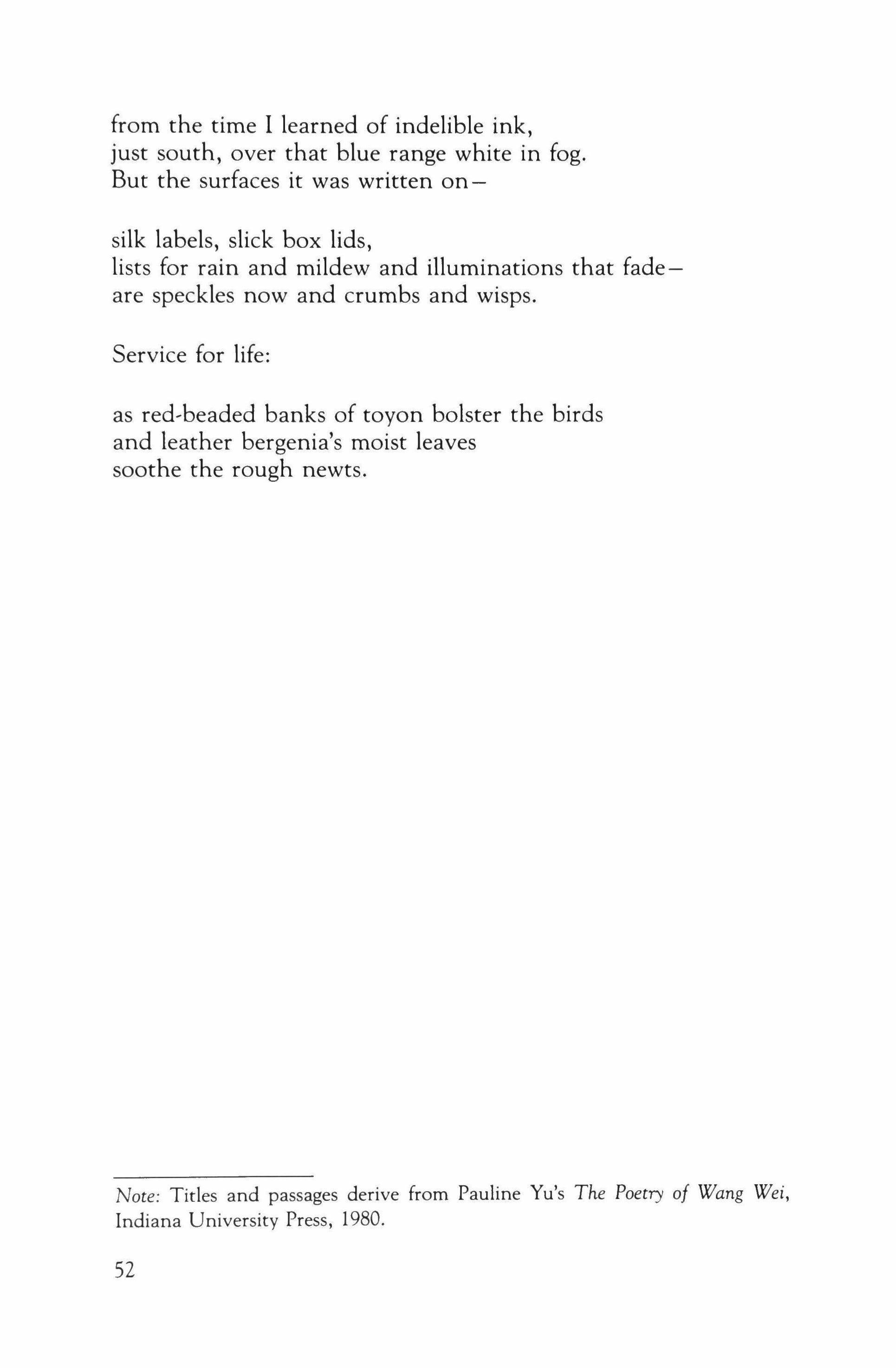
Note: Titles and passages derive from Pauline Yu's The Poetry of Wang Wei, Indiana University Press, 1980.
52
Four Poems
Thomas Lux
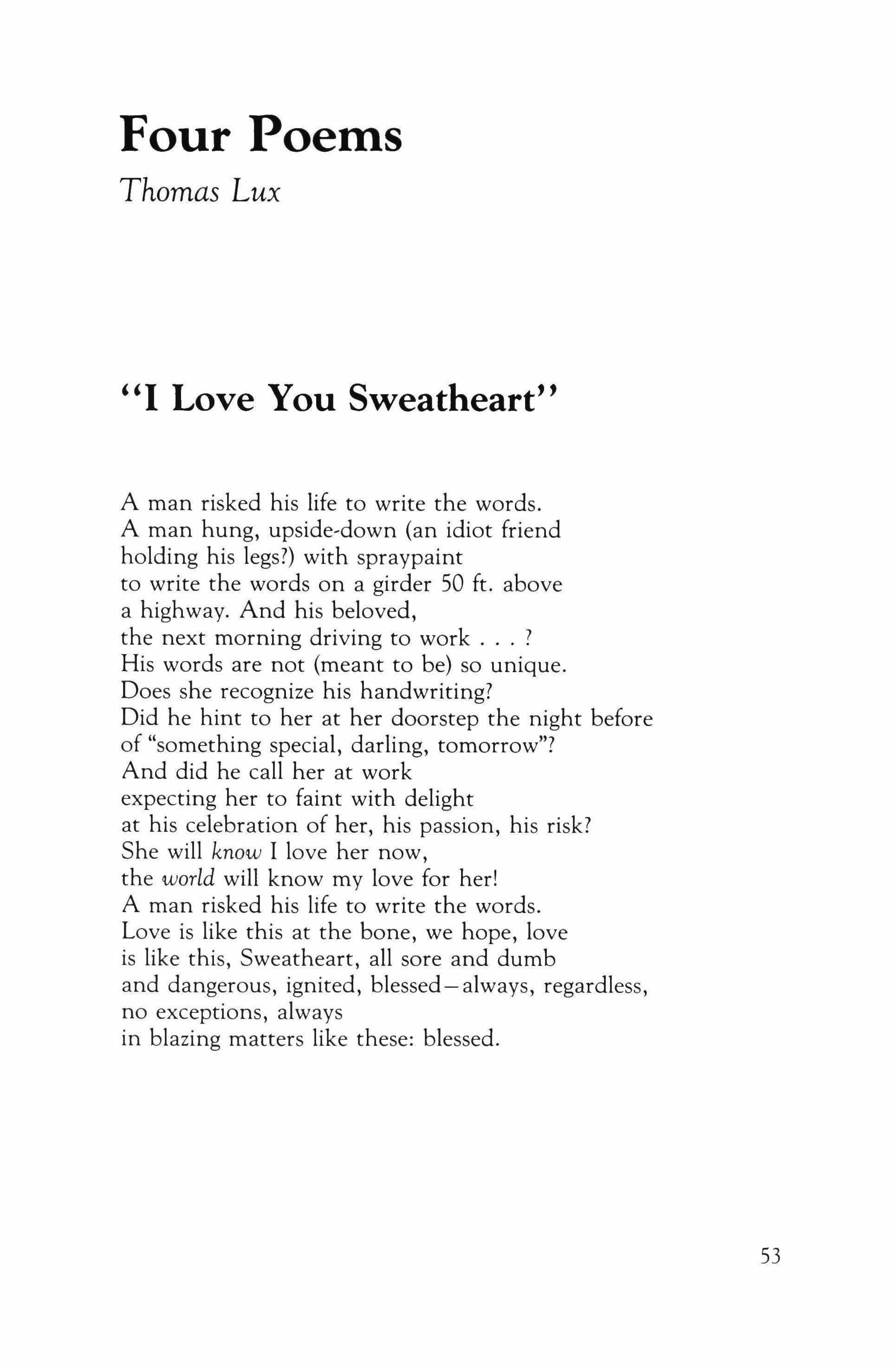
"I Love You Sweatheart"
A man risked his life to write the words. A man hung, upside-down (an idiot friend holding his legs?) with spraypaint to write the words on a girder 50 ft. above a highway. And his beloved, the next morning driving to work ? His words are not (meant to be) so unique. Does she recognize his handwriting? Did he hint to her at her doorstep the night before of "something special, darling, tomorrow"? And did he call her at work expecting her to faint with delight at his celebration of her, his passion, his risk? She will know I love her now, the world will know my love for her! A man risked his life to write the words. Love is like this at the bone, we hope, love is like this, Sweatheart, all sore and dumb and dangerous, ignited, blessed - always, regardless, no exceptions, always in blazing matters like these: blessed.
53
Emily's Mom
(Emily Norcross Dickinson, 1804-1882, mother of Emily Elizabeth Dickinson, 1830-1886)
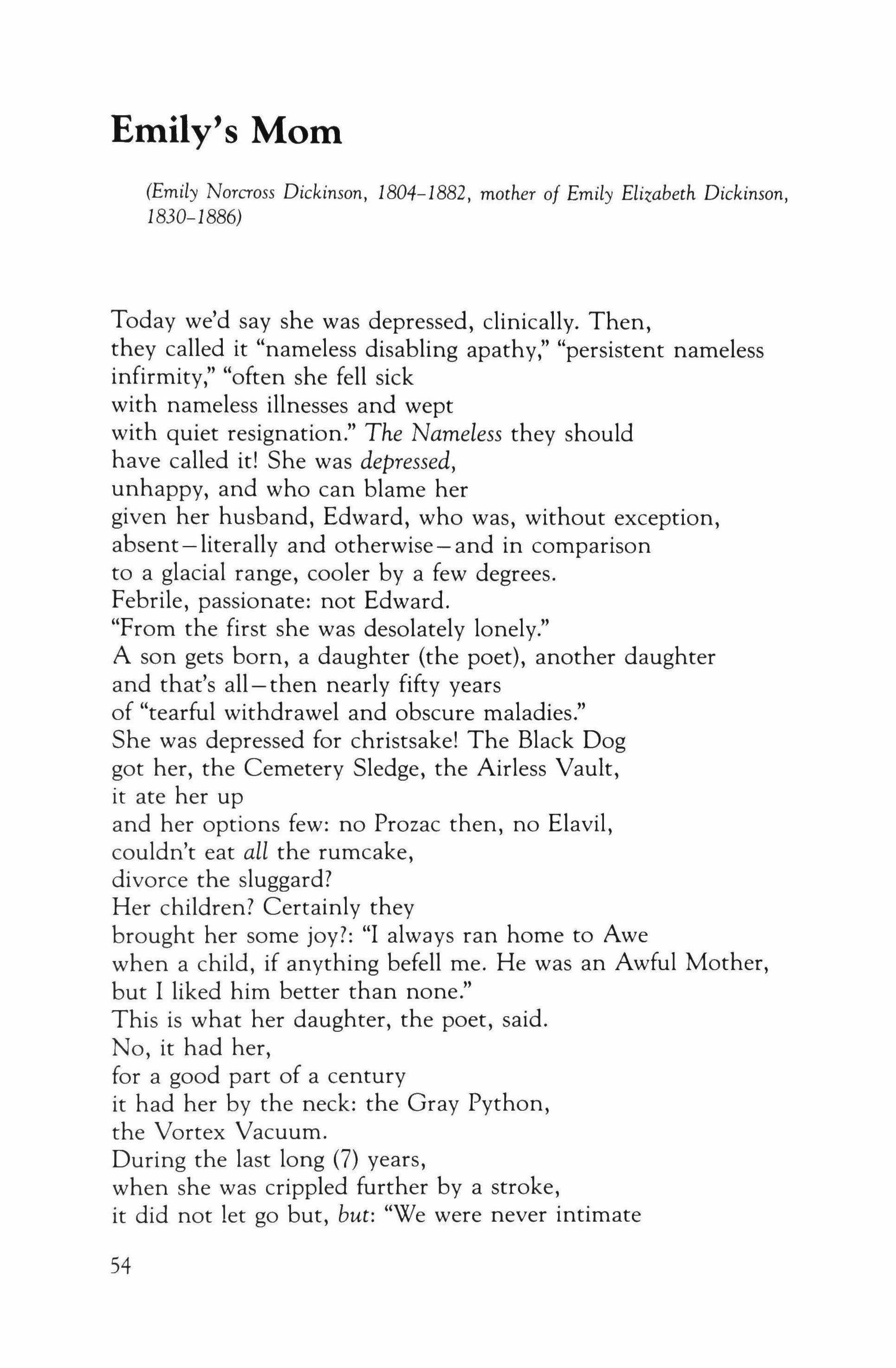
Today we'd say she was depressed, clinically. Then, they called it "nameless disabling apathy," "persistent nameless infirmity," "often she fell sick with nameless illnesses and wept with quiet resignation." The Nameless they should have called it! She was depressed, unhappy, and who can blame her given her husband, Edward, who was, without exception, absent-literally and otherwise - and in comparison to a glacial range, cooler by a few degrees. Febrile, passionate: not Edward. "From the first she was desolately lonely."
A son gets born, a daughter (the poet), another daughter and that's all-then nearly fifty years of "tearful withdrawel and obscure maladies." She was depressed for christsake! The Black Dog got her, the Cemetery Sledge, the Airless Vault, it ate her up and her options few: no Prozac then, no Elavil, couldn't eat all the rumcake, divorce the sluggard?
Her children? Certainly they brought her some joy?: "I always ran home to Awe when a child, if anything befell me. He was an Awful Mother, but I liked him better than none."
This is what her daughter, the poet, said. No, it had her, for a good part of a century it had her by the neck: the Gray Python, the Vortex Vacuum.
During the last long (7) years, when she was crippled further by a stroke, it did not let go but, but: "We were never intimate
54
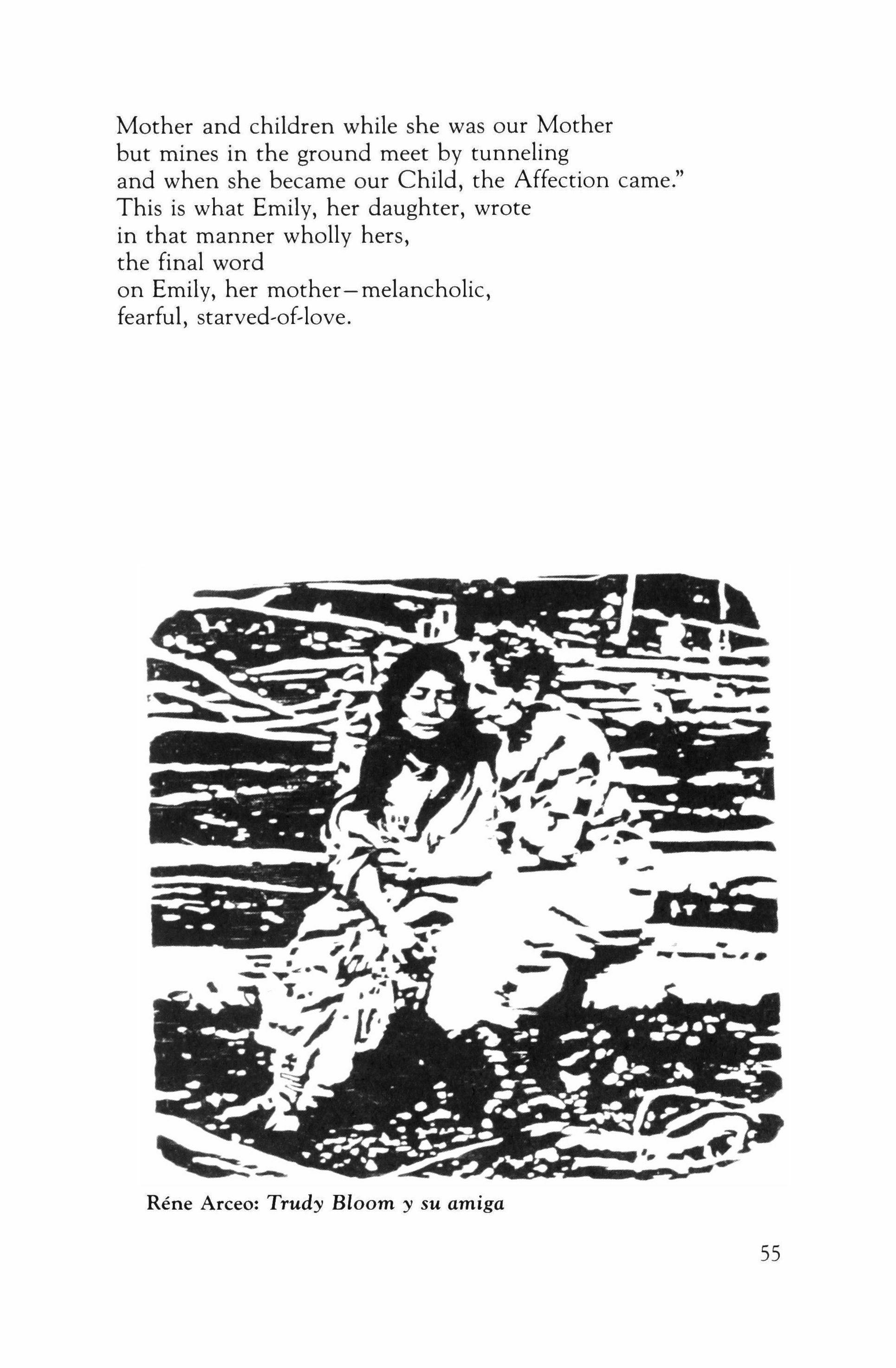
Mother and children while she was our Mother but mines in the ground meet by tunneling and when she became our Child, the Affection came." This is what Emily, her daughter, wrote in that manner wholly hers, the final word on Emily, her mother-melancholic, fearful, starved-of-love.
55
Rene Arceo: Trudy Bloom y su amiga
An Horatian Notion
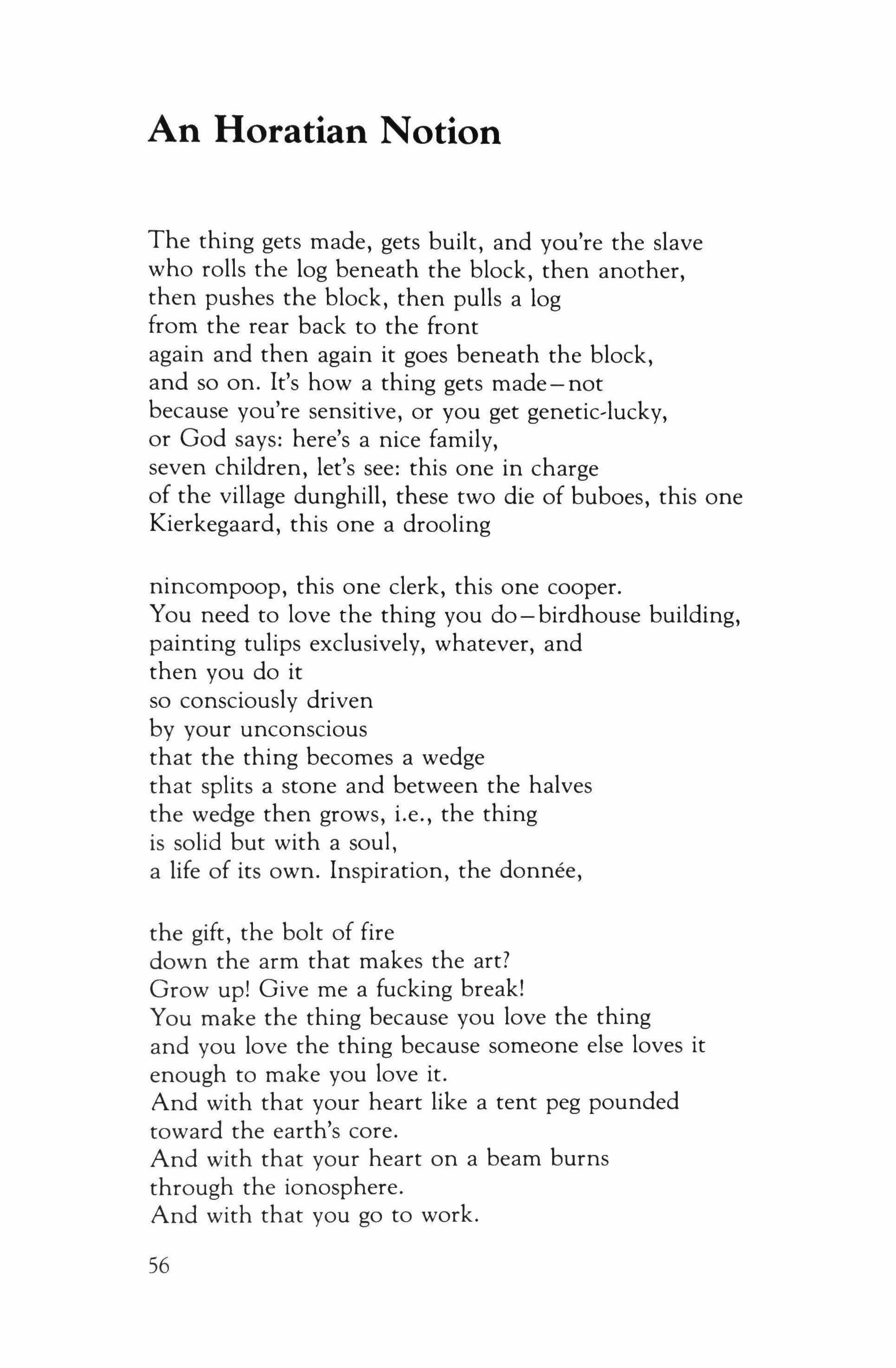
The thing gets made, gets built, and you're the slave who rolls the log beneath the block, then another, then pushes the block, then pulls a log from the rear back to the front again and then again it goes beneath the block, and so on. It's how a thing gets made-not because you're sensitive, or you get genetic-lucky, or God says: here's a nice family, seven children, let's see: this one in charge of the village dunghill, these two die of buboes, this one Kierkegaard, this one a drooling
nincompoop, this one clerk, this one cooper. You need to love the thing you do-birdhouse building, painting tulips exclusively, whatever, and then you do it so consciously driven by your unconscious that the thing becomes a wedge that splits a stone and between the halves the wedge then grows, i.e., the thing is solid but with a soul, a life of its own. Inspiration, the donnee, the gift, the bolt of fire down the arm that makes the art? Grow up! Give me a fucking break! You make the thing because you love the thing and you love the thing because someone else loves it enough to make you love it. And with that your heart like a tent peg pounded toward the earth's core. And with that your heart on a beam burns through the ionosphere. And with that you go to work.
56
Autobiographical
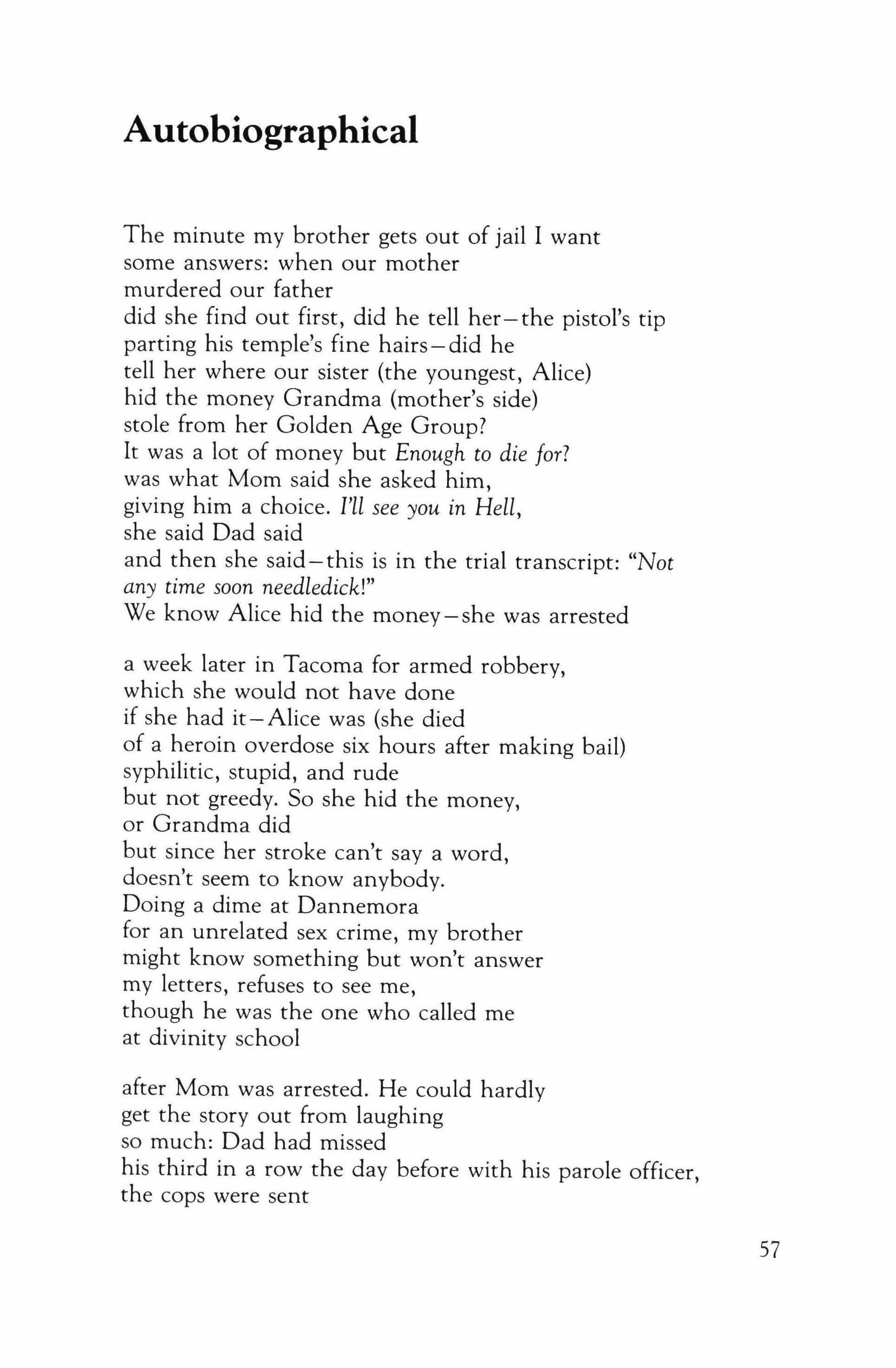
The minute my brother gets out of jail I want some answers: when our mother murdered our father did she find out first, did he tell her-the pistol's tip parting his temple's fine hairs-did he tell her where our sister (the youngest, Alice) hid the money Grandma (mother's side) stole from her Golden Age Group? It was a lot of money but Enough to die for? was what Mom said she asked him, giving him a choice. I'll see you in Hell, she said Dad said and then she said-this is in the trial transcript: "Not any time soon needledick!"
We know Alice hid the money-she was arrested a week later in Tacoma for armed robbery, which she would not have done if she had it - Alice was (she died of a heroin overdose six hours after making bail) syphilitic, stupid, and rude but not greedy. So she hid the money, or Grandma did but since her stroke can't say a word, doesn't seem to know anybody.
Doing a dime at Dannemora for an unrelated sex crime, my brother might know something but won't answer my letters, refuses to see me, though he was the one who called me at divinity school after Mom was arrested. He could hardly get the story out from laughing so much: Dad had missed his third in a row the day before with his parole officer, the cops were sent
57
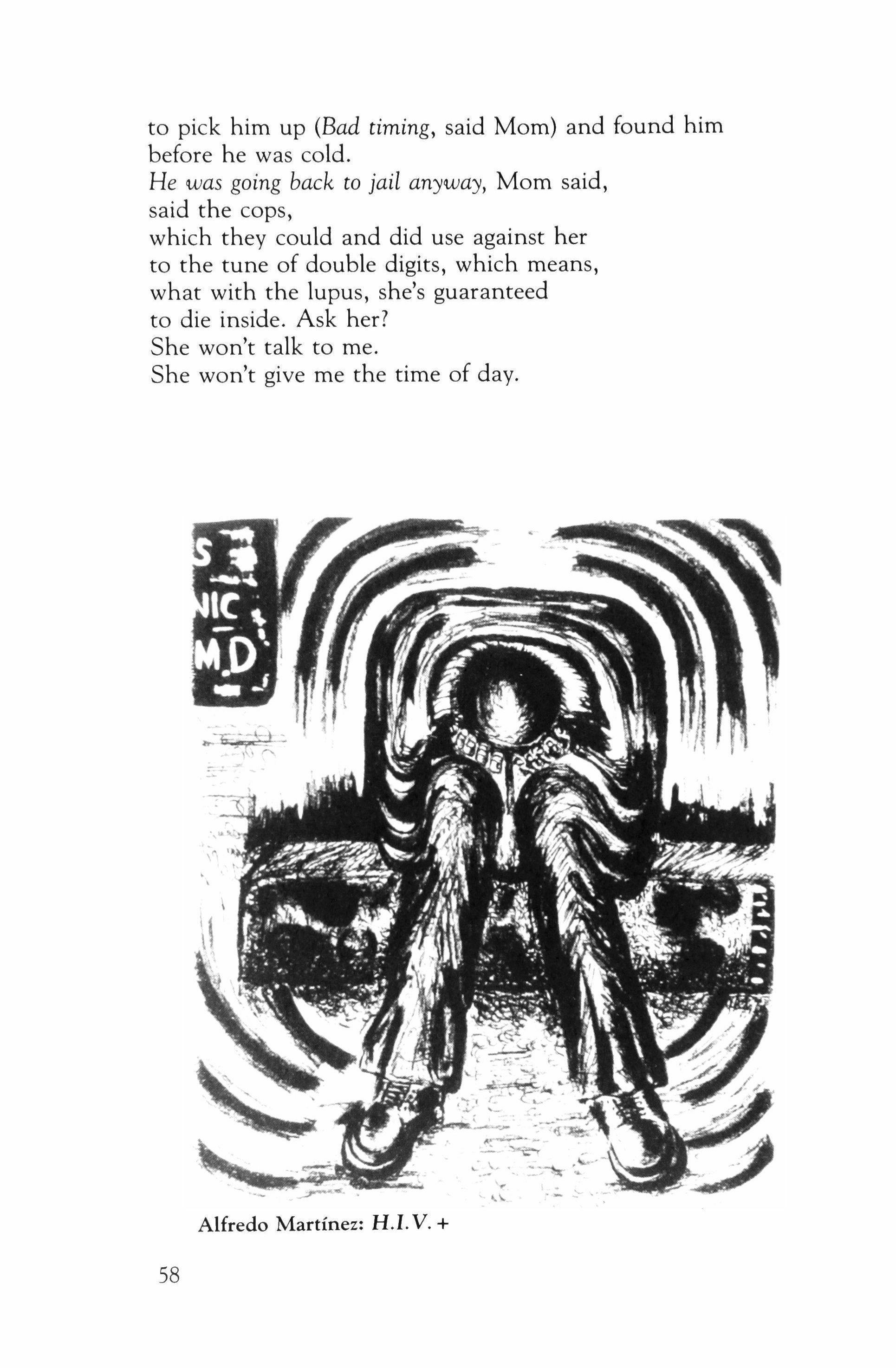
to pick him up (Bad timing, said Mom) and found him before he was cold.
He was going back to jail anyway, Mom said, said the cops, which they could and did use against her to the tune of double digits, which means, what with the lupus, she's guaranteed to die inside. Ask her? She won't talk to me. She won't give me the time of day.
58
Alfredo Martinez: H.I. V. +
Half an Hour Before the War
]oseph Gastiger
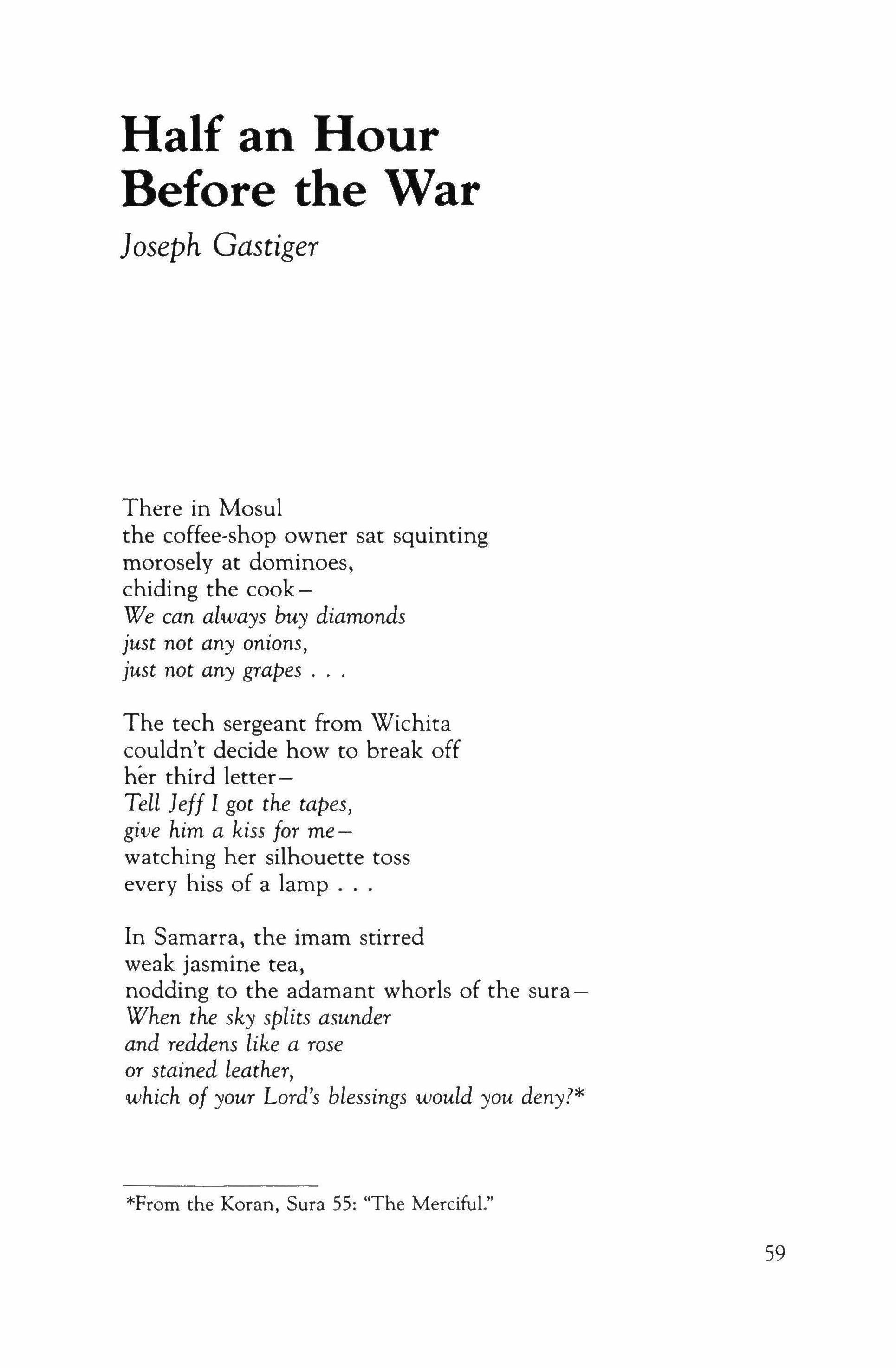
There in Mosul the coffee-shop owner sat squinting morosely at dominoes, chiding the cookWe can always buy diamonds just not any onions, just not any grapes
The tech sergeant from Wichita couldn't decide how to break off her third letterTell Jeff I got the tapes, give him a kiss for mewatching her silhouette toss every hiss of a lamp
In Samarra, the imam stirred weak jasmine tea, nodding to the adamant whorls of the suraWhen the sky splits asunder and reddens like a rose or stained leather, which of your Lord's blessings would you deny?*
*From the Koran, Sura 55: "The Merciful."
59
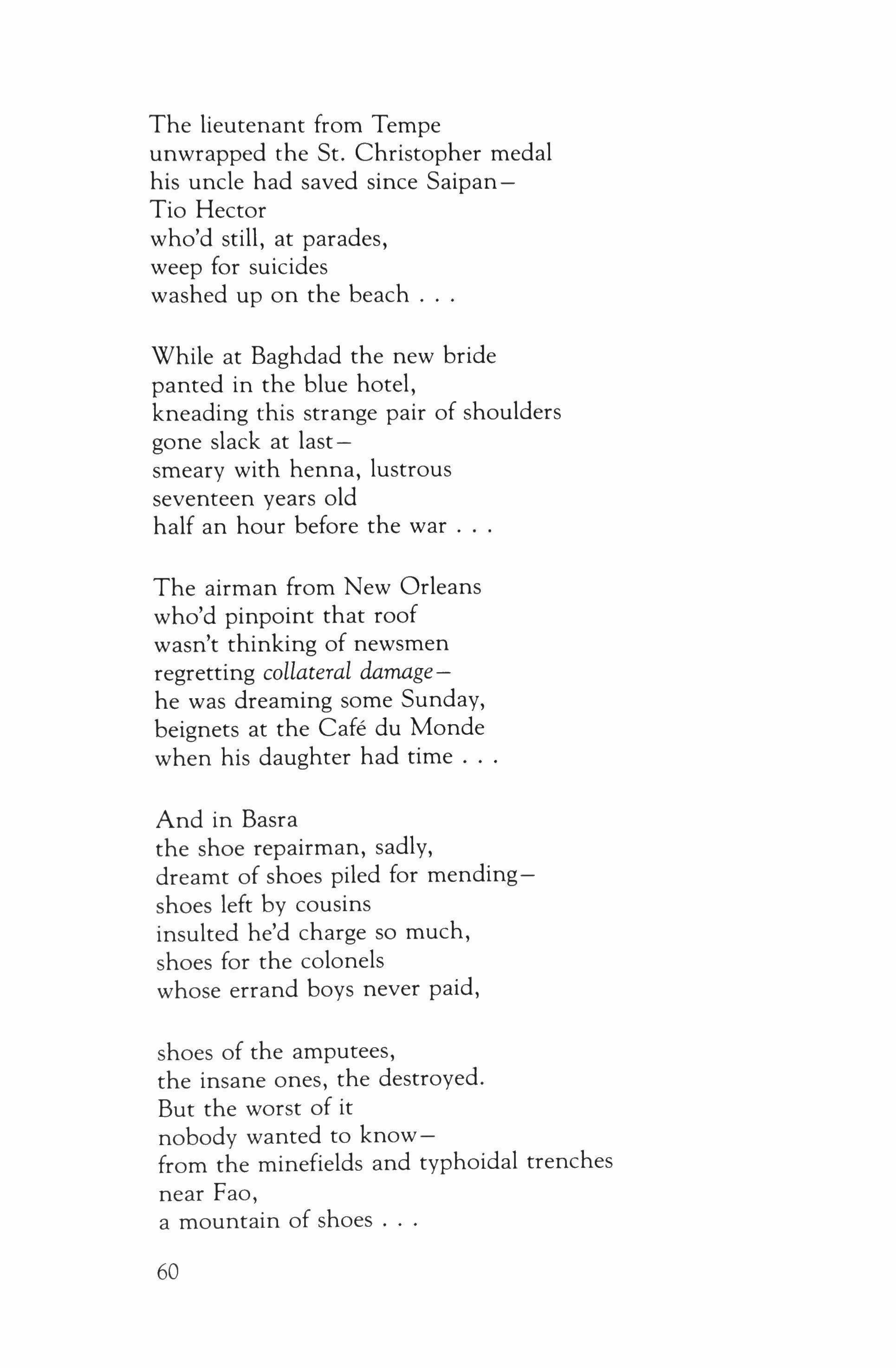
The lieutenant from Tempe unwrapped the St. Christopher medal his uncle had saved since SaipanTio Hector who'd still, at parades, weep for suicides washed up on the beach
While at Baghdad the new bride panted in the blue hotel, kneading this strange pair of shoulders gone slack at lastsmeary with henna, lustrous seventeen years old half an hour before the war
The airman from New Orleans who'd pinpoint that roof wasn't thinking of newsmen regretting collateral damagehe was dreaming some Sunday, beignets at the Cafe du Monde when his daughter had time
And in Basra the shoe repairman, sadly, dreamt of shoes piled for mendingshoes left by cousins insulted he'd charge so much, shoes for the colonels whose errand boys never paid,
shoes of the amputees, the insane ones, the destroyed. But the worst of it nobody wanted to knowfrom the minefields and typhoidal trenches near Fao, a mountain of shoes
60
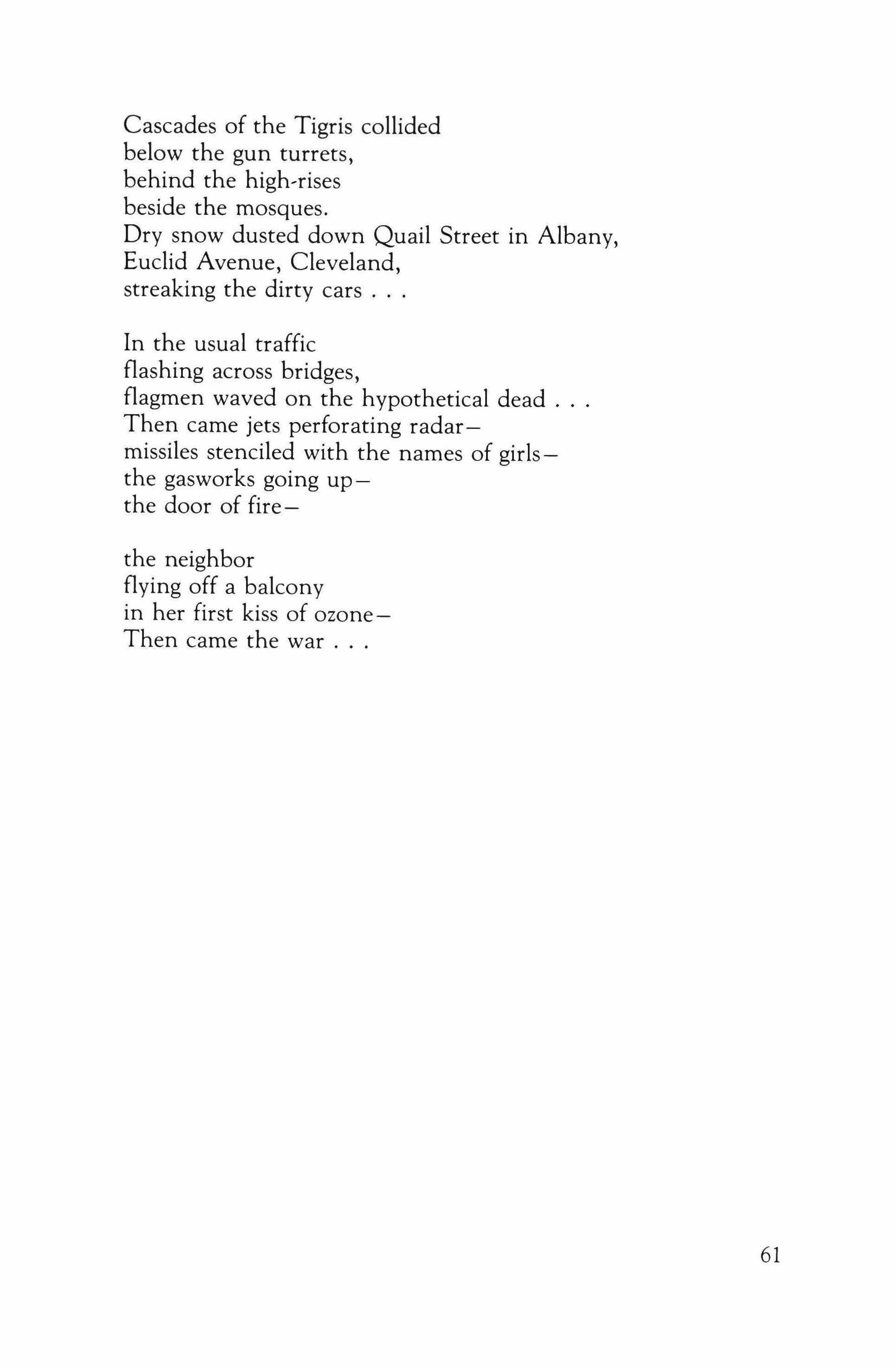
Cascades of the Tigris collided below the gun turrets, behind the high-rises beside the mosques.
Dry snow dusted down Quail Street in Albany, Euclid Avenue, Cleveland, streaking the dirty cars
In the usual traffic flashing across bridges, flagmen waved on the hypothetical dead Then came jets perforating radarmissiles stenciled with the names of girlsthe gasworks going upthe door of fire-
the neighbor flying off a balcony in her first kiss of ozoneThen came the war
61
Block Bebe
Terri Brown-Davidson
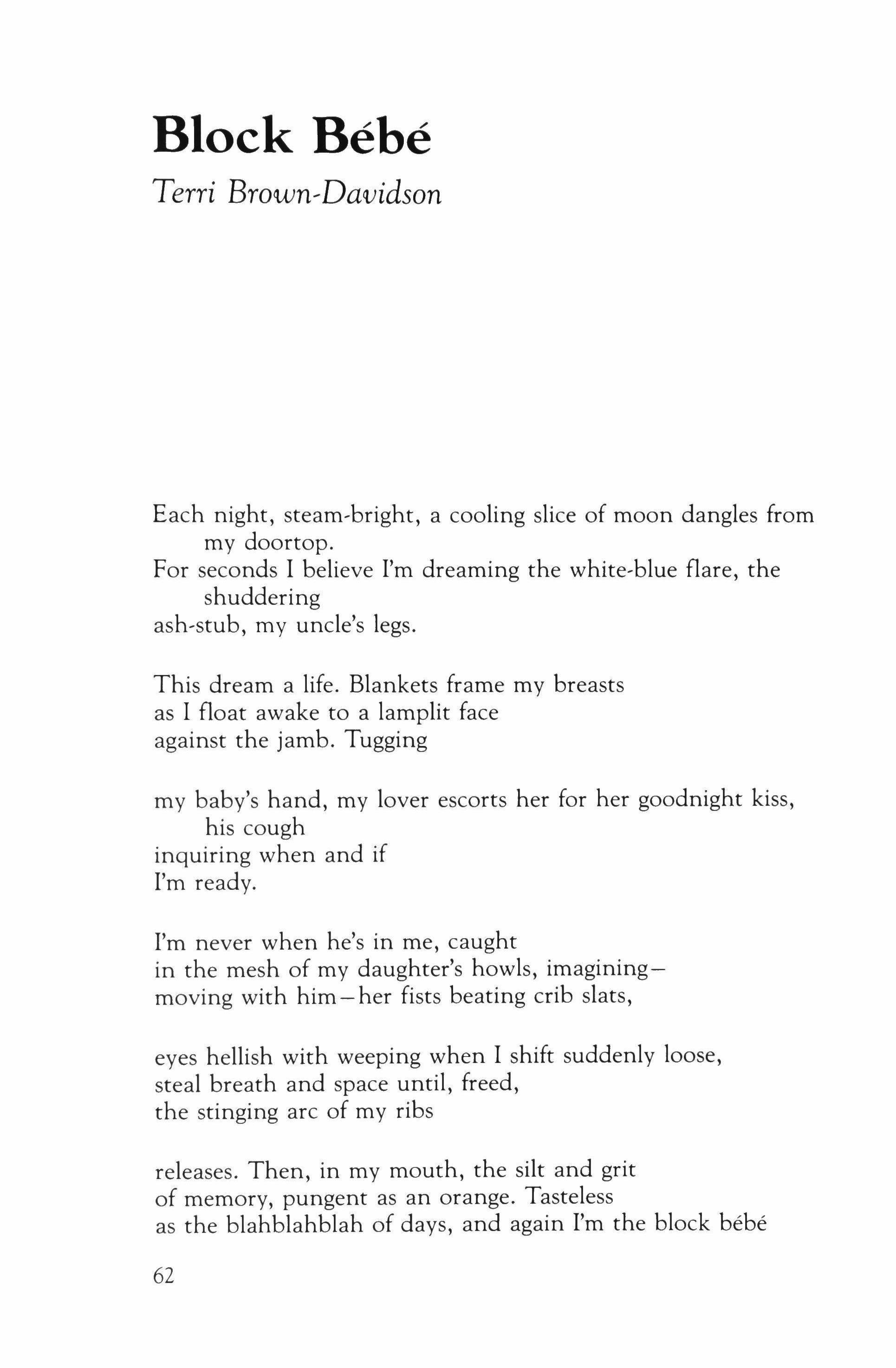
Each night, steam-bright, a cooling slice of moon dangles from my doortop. For seconds I believe I'm dreaming the white-blue flare, the shuddering ash-stub, my uncle's legs.
This dream a life. Blankets frame my breasts as I float awake to a lamplit face against the jamb. Tugging
my baby's hand, my lover escorts her for her goodnight kiss, his cough inquiring when and if I'm ready.
I'm never when he's in me, caught in the mesh of my daughter's howls, imaginingmoving with him - her fists beating crib slats,
eyes hellish with weeping when I shift suddenly loose, steal breath and space until, freed, the stinging arc of my ribs
releases. Then, in my mouth, the silt and grit of memory, pungent as an orange. Tasteless as the blahblahblah of days, and again I'm the block bebe
62
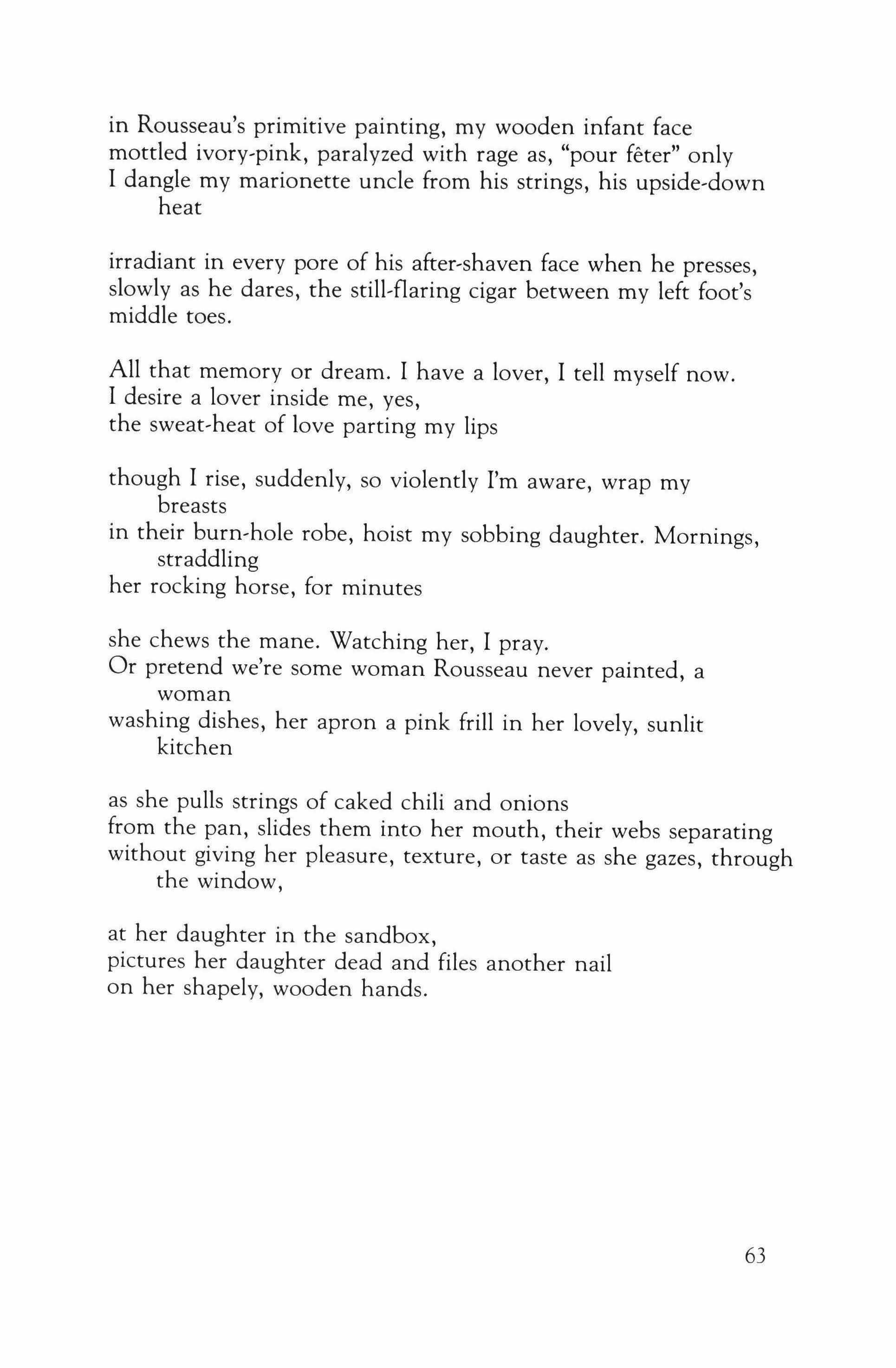
in Rousseau's primitive painting, my wooden infant face mottled ivory-pink, paralyzed with rage as, "pour feter" only I dangle my marionette uncle from his strings, his upside-down heat
irradiant in every pore of his after-shaven face when he presses, slowly as he dares, the still-flaring cigar between my left foot's middle toes.
All that memory or dream. I have a lover, I tell myself now. I desire a lover inside me, yes, the sweat-heat of love parting my lips
though I rise, suddenly, so violently I'm aware, wrap my breasts in their burn-hole robe, hoist my sobbing daughter. Mornings, straddling her rocking horse, for minutes
she chews the mane. Watching her, I pray. Or pretend we're some woman Rousseau never painted, a woman
washing dishes, her apron a pink frill in her lovely, sunlit kitchen
as she pulls strings of caked chili and onions from the pan, slides them into her mouth, their webs separating without giving her pleasure, texture, or taste as she gazes, through the window,
at her daughter in the sandbox, pictures her daughter dead and files another nail on her shapely, wooden hands.
63
Florencia
David Hernandez
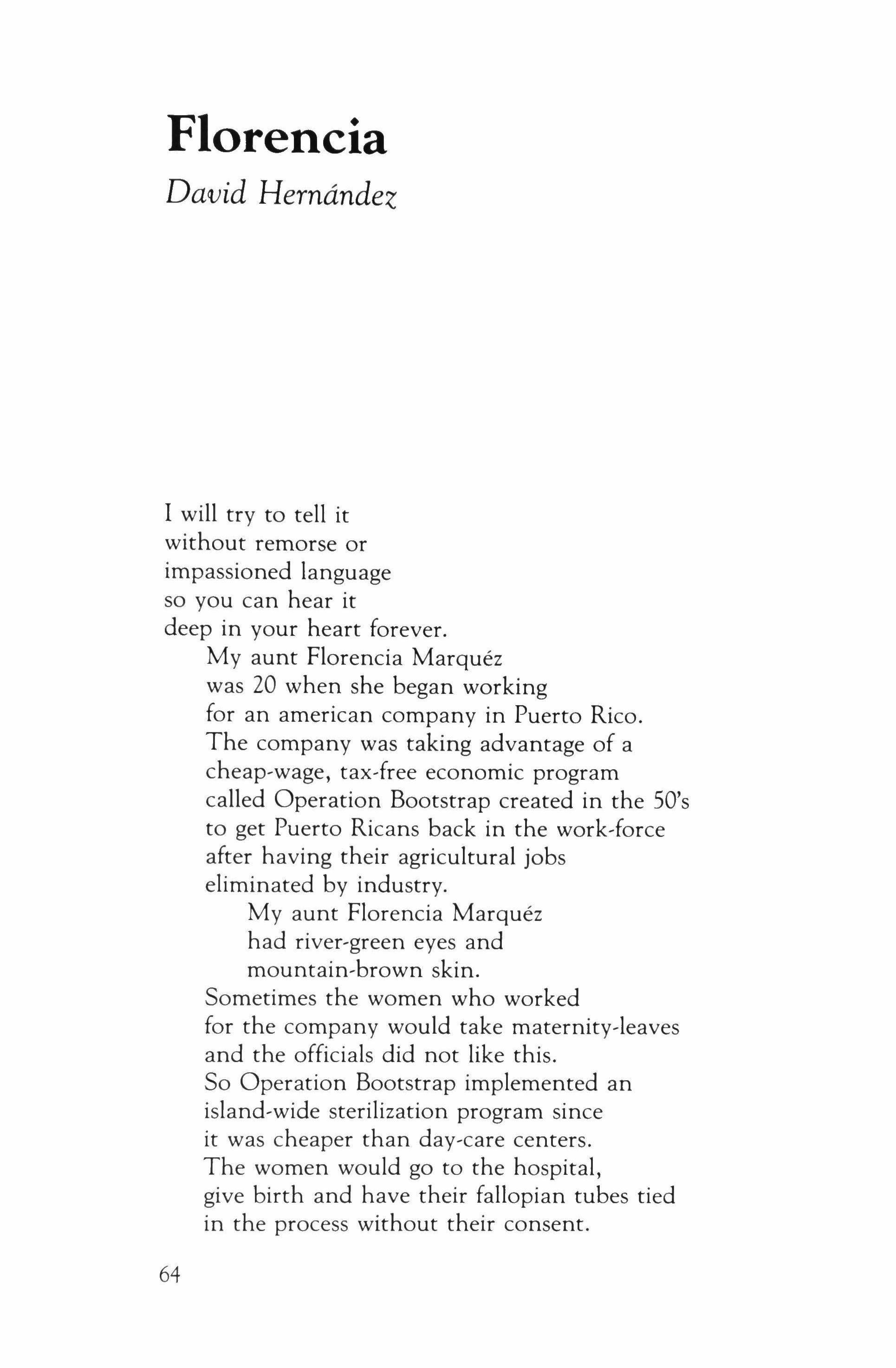
I will try to tell it without remorse or impassioned language so you can hear it deep in your heart forever.
My aunt Florencia Marquez was 20 when she began working for an american company in Puerto Rico. The company was taking advantage of a cheap-wage, tax-free economic program called Operation Bootstrap created in the 50's to get Puerto Ricans back in the work-force after having their agricultural jobs eliminated by industry.
My aunt Florencia Marquez had river-green eyes and mountain-brown skin. Sometimes the women who worked for the company would take maternity-leaves and the officials did not like this.
So Operation Bootstrap implemented an island-wide sterilization program since it was cheaper than day-care centers. The women would go to the hospital, give birth and have their fallopian tubes tied in the process without their consent.
64
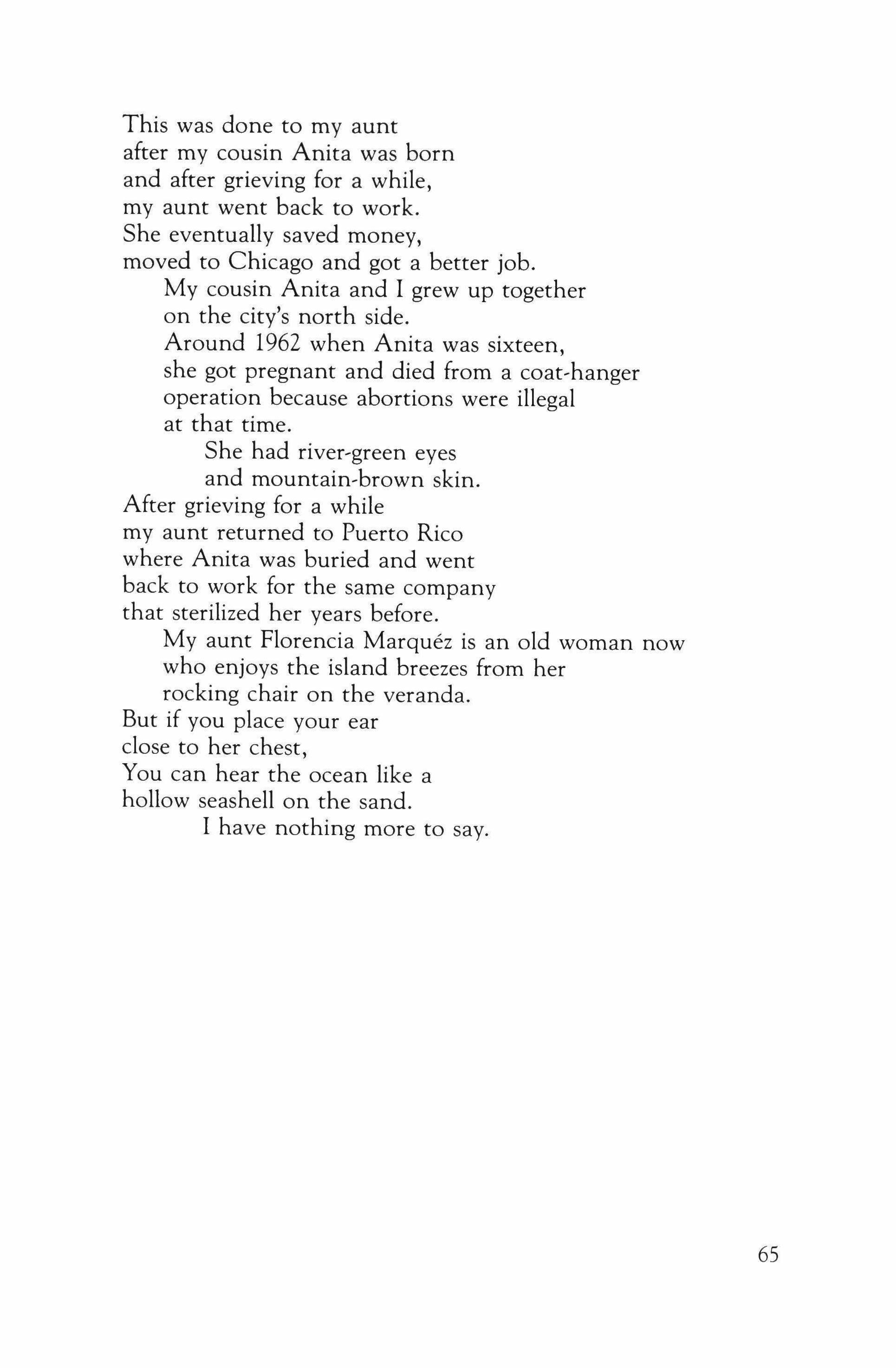
This was done to my aunt after my cousin Anita was born and after grieving for a while, my aunt went back to work. She eventually saved money, moved to Chicago and got a better job. My cousin Anita and I grew up together on the city's north side.
Around 1962 when Anita was sixteen, she got pregnant and died from a coat-hanger operation because abortions were illegal at that time.
She had river-green eyes and mountain-brown skin.
After grieving for a while my aunt returned to Puerto Rico where Anita was buried and went back to work for the same company that sterilized her years before.
My aunt Florencia Marquez is an old woman now who enjoys the island breezes from her rocking chair on the veranda.
But if you place your ear close to her chest, You can hear the ocean like a hollow seashell on the sand.
I have nothing more to say.
65
Two Poems
Carol Frost
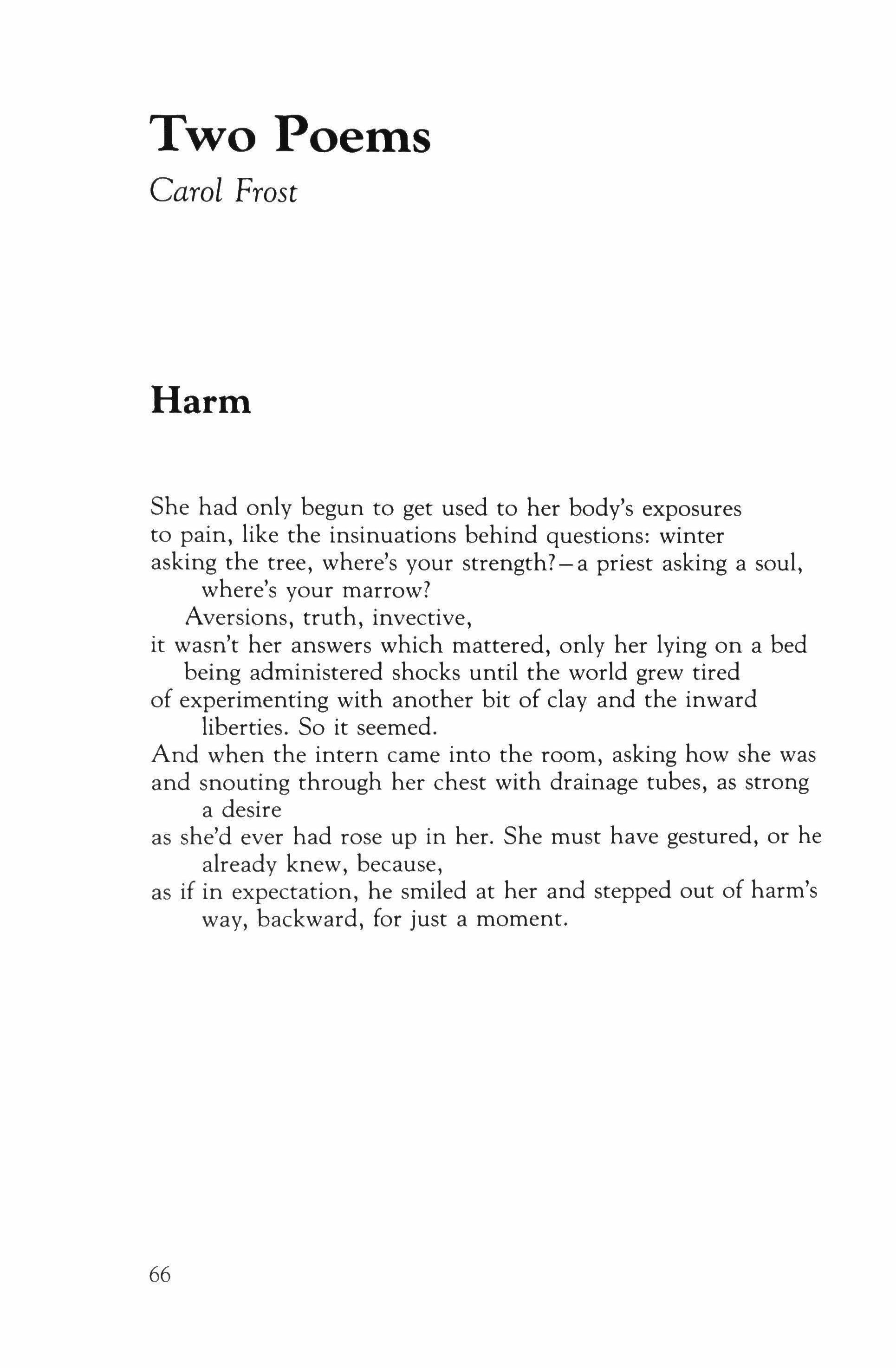
Harm
She had only begun to get used to her body's exposures to pain, like the insinuations behind questions: winter asking the tree, where's your strength? - a priest asking a soul, where's your marrow?
Aversions, truth, invective, it wasn't her answers which mattered, only her lying on a bed being administered shocks until the world grew tired of experimenting with another bit of clay and the inward liberties. So it seemed. And when the intern came into the room, asking how she was and snouting through her chest with drainage tubes, as strong a desire as she'd ever had rose up in her. She must have gestured, or he already knew, because, as if in expectation, he smiled at her and stepped out of harm's way, backward, for just a moment.
66
Pure
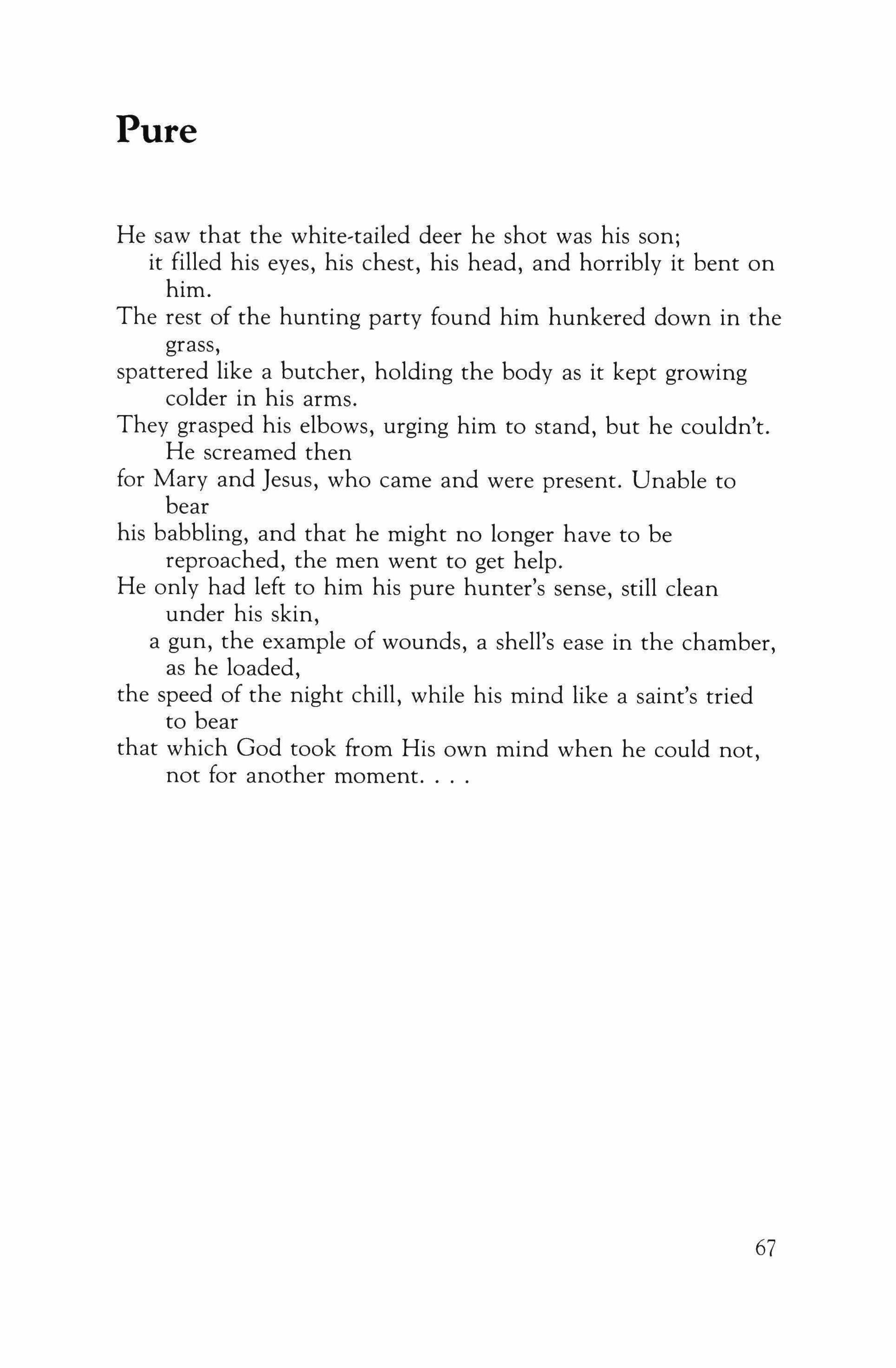
He saw that the white-tailed deer he shot was his son; it filled his eyes, his chest, his head, and horribly it bent on him.
The rest of the hunting party found him hunkered down in the grass, spattered like a butcher, holding the body as it kept growing colder in his arms. They grasped his elbows, urging him to stand, but he couldn't. He screamed then for Mary and Jesus, who came and were present. Unable to bear his babbling, and that he might no longer have to be reproached, the men went to get help. He only had left to him his pure hunter's sense, still clean under his skin, a gun, the example of wounds, a shell's ease in the chamber, as he loaded, the speed of the night chill, while his mind like a saint's tried to bear that which God took from His own mind when he could not, not for another moment
67
The River-Keeper's Song
Constance Urdang
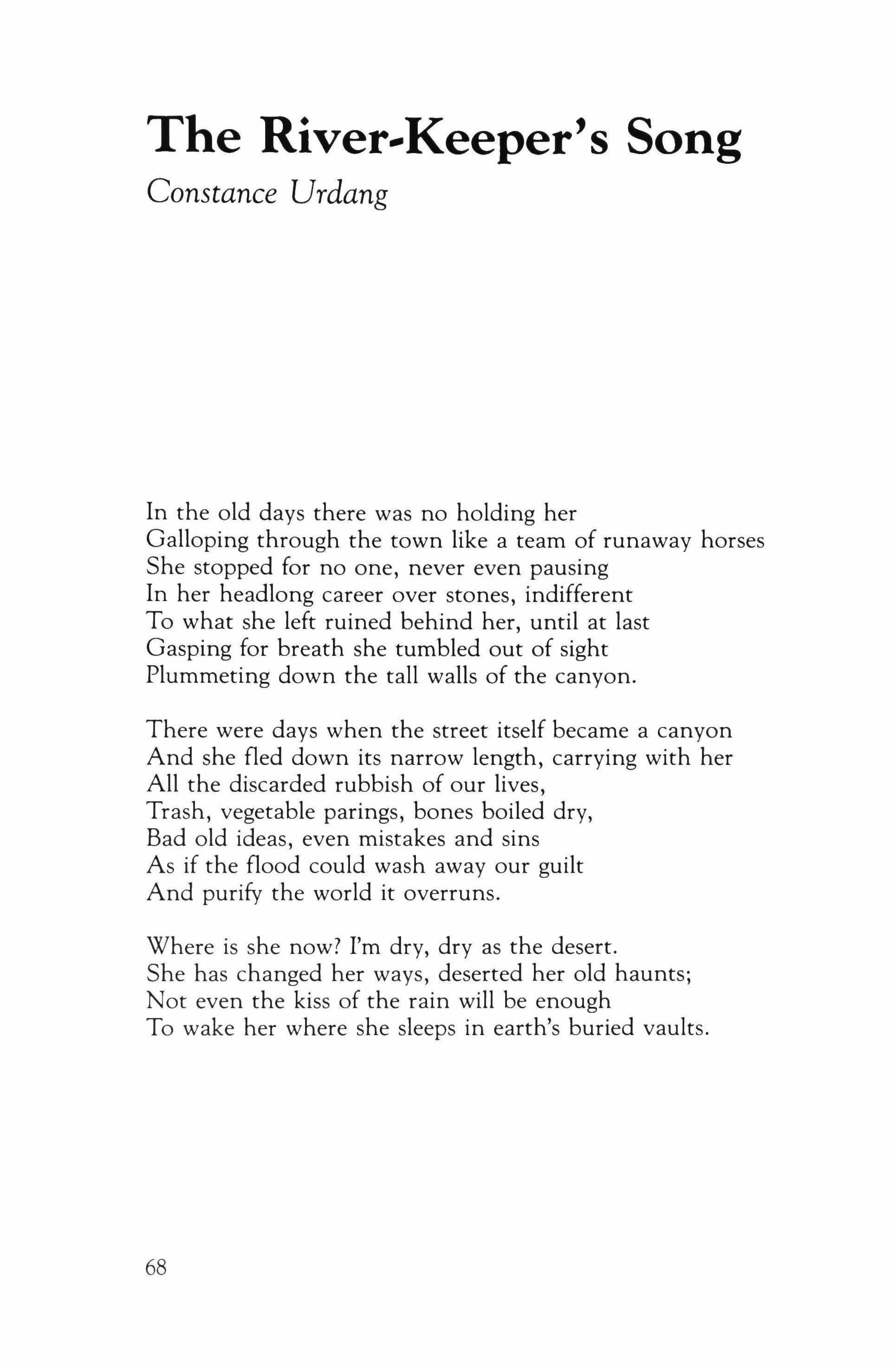
In the old days there was no holding her Galloping through the town like a team of runaway horses She stopped for no one, never even pausing In her headlong career over stones, indifferent To what she left ruined behind her, until at last Gasping for breath she tumbled out of sight Plummeting down the tall walls of the canyon.
There were days when the street itself became a canyon
And she fled down its narrow length, carrying with her All the discarded rubbish of our lives, Trash, vegetable parings, bones boiled dry, Bad old ideas, even mistakes and sins
As if the flood could wash away our guilt And purify the world it overruns.
Where is she now? I'm dry, dryas the desert. She has changed her ways, deserted her old haunts; Not even the kiss of the rain will be enough To wake her where she sleeps in earth's buried vaults.
68
The Silence of Women
LiZ Rosenberg
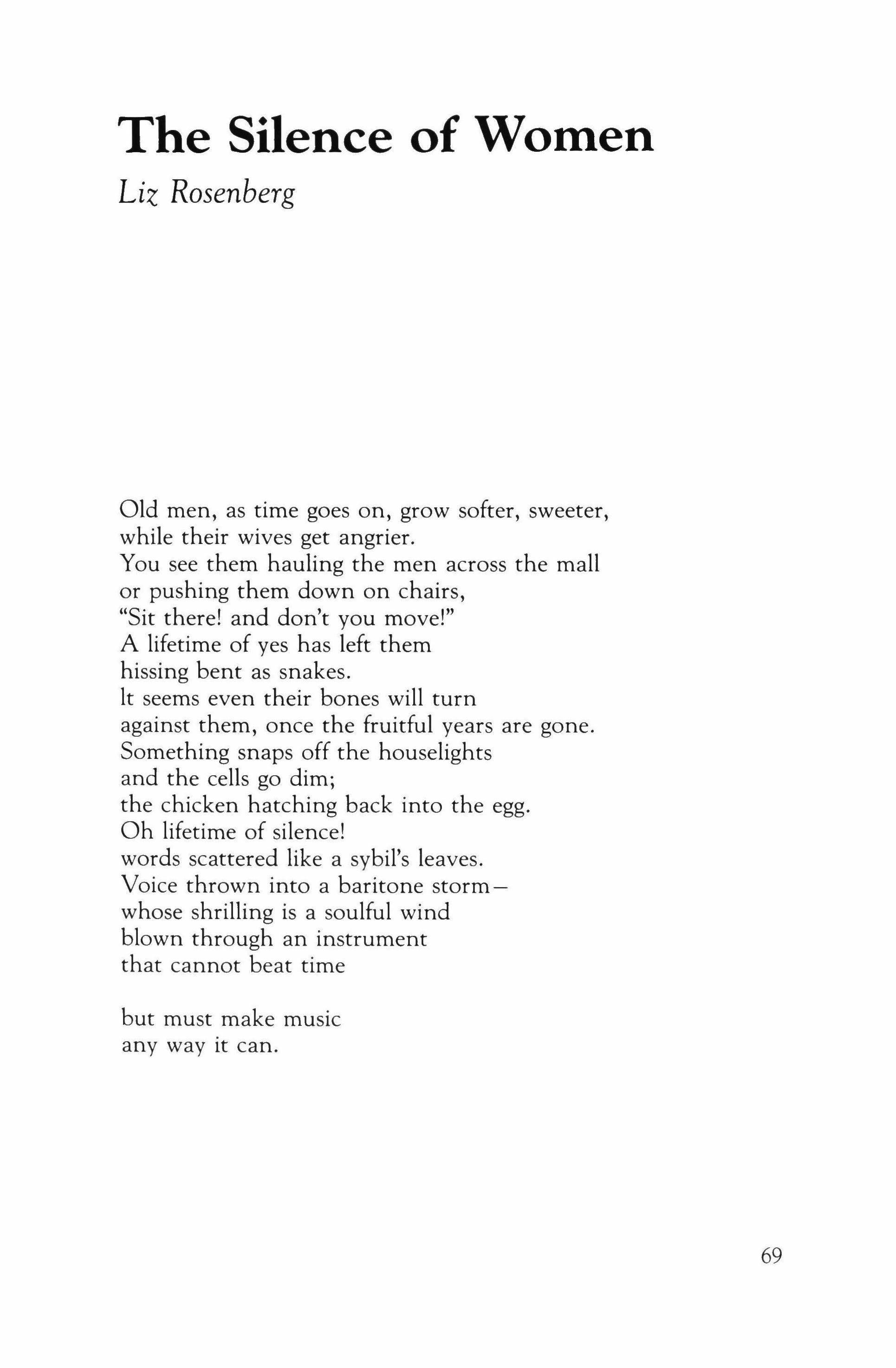
Old men, as time goes on, grow softer, sweeter, while their wives get angrier. You see them hauling the men across the mall or pushing them down on chairs, "Sit there! and don't you move!" A lifetime of yes has left them hissing bent as snakes. It seems even their bones will turn against them, once the fruitful years are gone. Something snaps off the houselights and the cells go dim; the chicken hatching back into the egg. Oh lifetime of silence! words scattered like a sybil's leaves. Voice thrown into a baritone stormwhose shrilling is a soulful wind blown through an instrument that cannot beat time but must make music any way it can.
69
Notes on Atonement
Mark Rudman
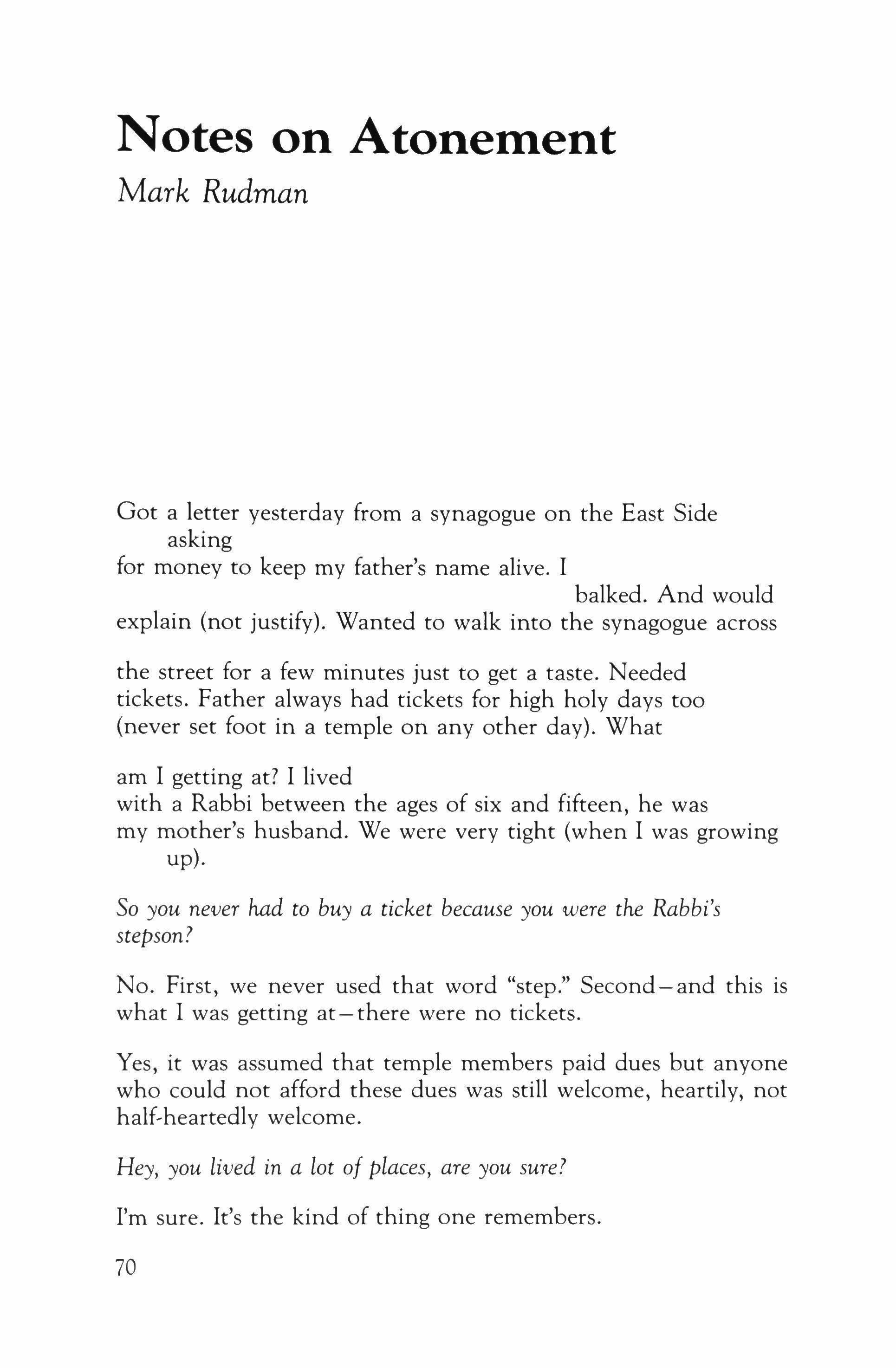
Got a letter yesterday from a synagogue on the East Side asking for money to keep my father's name alive. I balked. And would explain (not justify). Wanted to walk into the synagogue across the street for a few minutes just to get a taste. Needed tickets. Father always had tickets for high holy days too (never set foot in a temple on any other day). What
am I getting at? I lived with a Rabbi between the ages of six and fifteen, he was my mother's husband. We were very tight (when I was growing up).
So you never had to buy a ticket because you were the Rabbi's stepson?
No. First, we never used that word "step." Second-and this is what I was getting at - there were no tickets.
Yes, it was assumed that temple members paid dues but anyone who could not afford these dues was still welcome, heartily, not half-heartedly welcome.
Hey, you lived in a lot of places, are you sure?
I'm sure. It's the kind of thing one remembers.
70
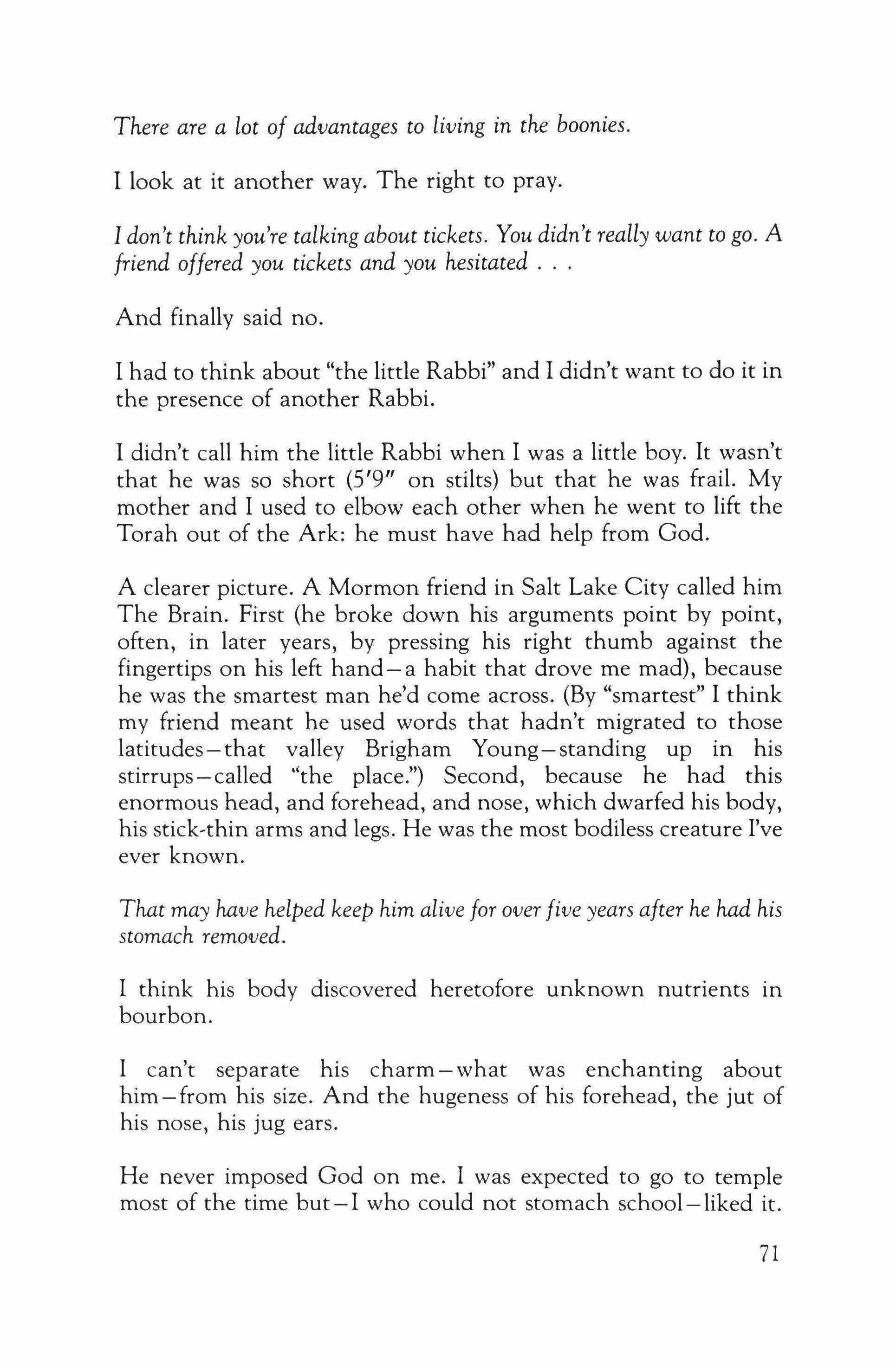
There are a lot of advantages to living in the boonies.
I look at it another way. The right to pray.
I don't think you're talking about tickets. You didn't really want to go. A friend offered you tickets and you hesitated
And finally said no.
I had to think about "the little Rabbi" and I didn't want to do it in the presence of another Rabbi.
I didn't call him the little Rabbi when I was a little boy. It wasn't that he was so short (5'9" on stilts) but that he was frail. My mother and I used to elbow each other when he went to lift the Torah out of the Ark: he must have had help from God.
A clearer picture. A Mormon friend in Salt Lake City called him The Brain. First (he broke down his arguments point by point, often, in later years, by pressing his right thumb against the fingertips on his left hand-a habit that drove me mad), because he was the smartest man he'd come across. (By "smartest" I think my friend meant he used words that hadn't migrated to those latitudes-that valley Brigham Young-standing up in his stirrups - called "the place.") Second, because he had this enormous head, and forehead, and nose, which dwarfed his body, his stick-thin arms and legs. He was the most bodiless creature I've ever known.
That may have helped keep him alive for over five years after he had his stomach removed.
I think his body discovered heretofore unknown nutrients in bourbon.
I can't separate his charm-what was enchanting about him-from his size. And the hugeness of his forehead, the jut of his nose, his jug ears.
He never imposed God on me. I was expected to go to temple most of the time but-I who could not stomach school-liked it.
71
He was on such intimate terms with God, had thought so deeply about scripture, made the stories so compelling. And he looked so holy in his robes.
This immense head suspended over the pulpit.
(The anonymous Caxinua poem of the moon's creation: "You going to the sky, head?")
There's more. The small communities we lived in in those first years together were welcoming. It meant something more to be a Jew in small towns in Illinois (in Chicago Heights and Kankakee) where there were, at best, a few hundred out of 20,000
Mourning for him has been difficult. Mourning for my real father took so much out of me (That phrase always makes me bristle.) And then the type of cancer he had, combined with his frailty, made me think of him, in those last few years, in an almost post-mortem way. Every meeting had that feel of "the last" meeting and it began to get to me.
Can you be more specific?
It began to get to me.
I wanted him to live or die, not hover between two worlds-as if this hovering weren't our condition.
And he asked so many questions. He trafficked in confidences.
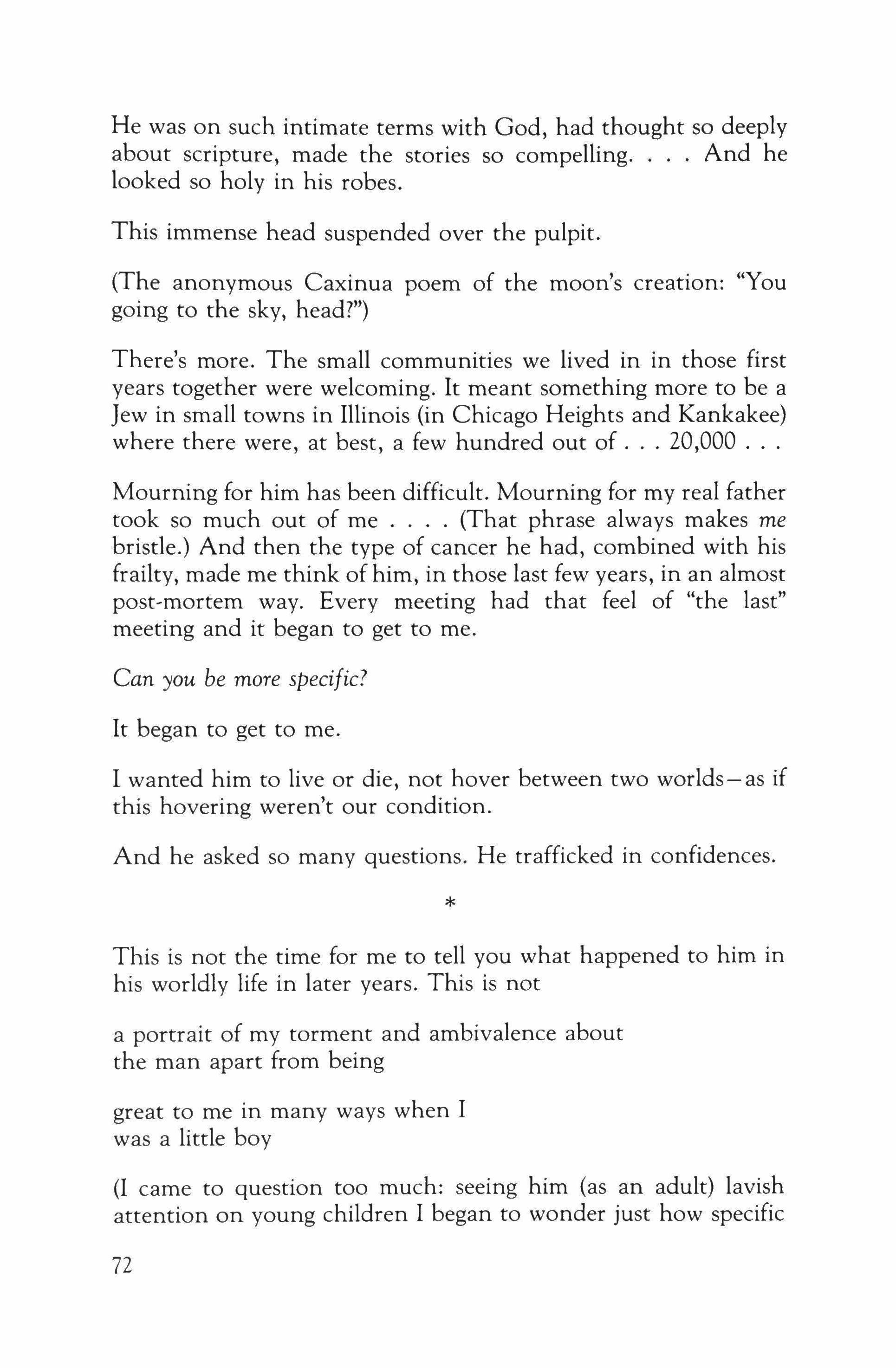
This is not the time for me to tell you what happened to him in his worldly life in later years. This is not a portrait of my torment and ambivalence about the man apart from being great to me in many ways when I was a little boy
(I came to question too much: seeing him (as an adult) lavish attention on young children I began to wonder just how specific
*
72
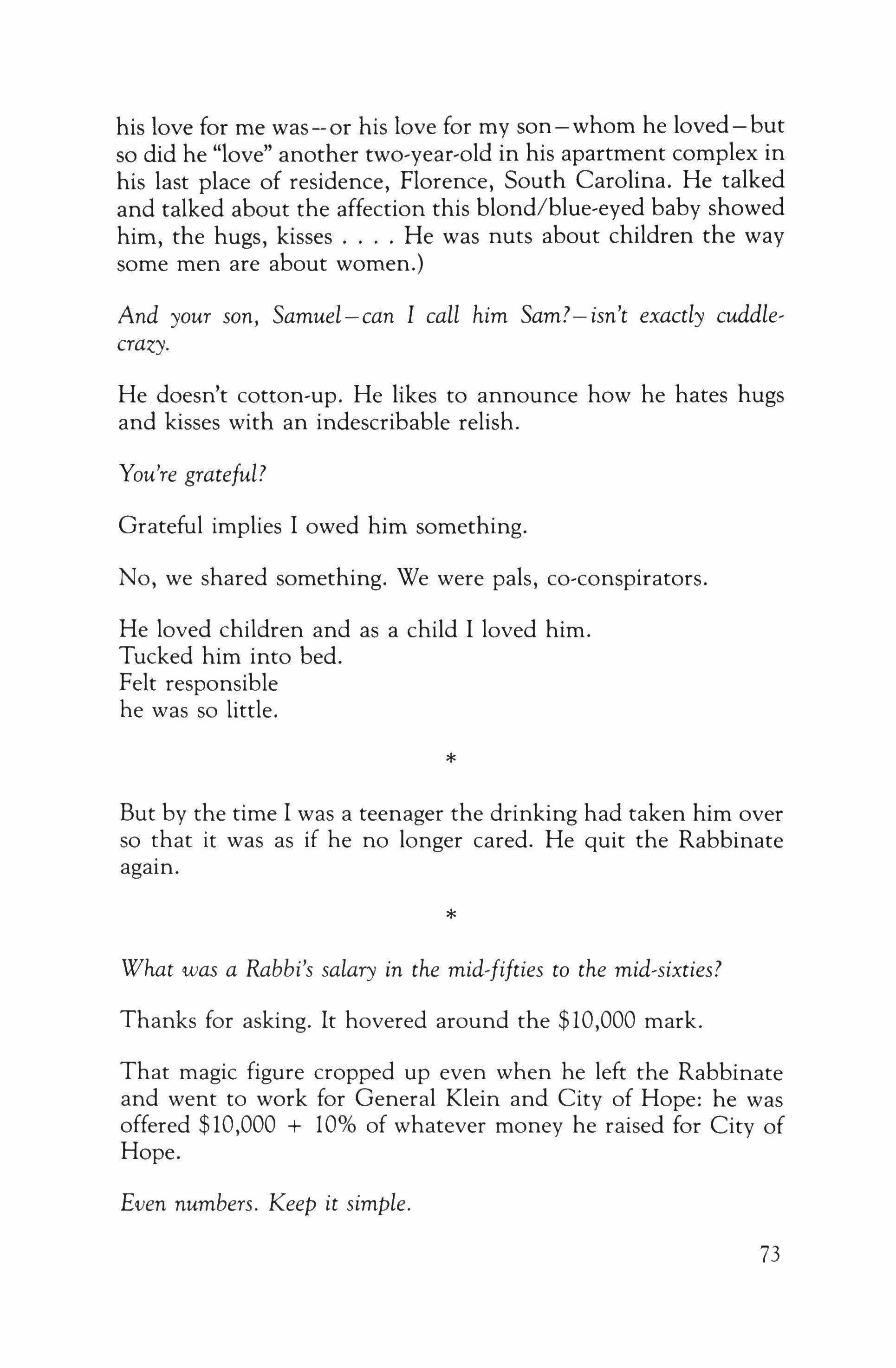
his love for me was-or his love for my son-whom he loved-but so did he "love" another two-year-old in his apartment complex in his last place of residence, Florence, South Carolina. He talked and talked about the affection this blond/blue-eyed baby showed him, the hugs, kisses He was nuts about children the way some men are about women.}
And your son, Samuel- can I call him Sam? - isn't exactly cuddle� crazy.
He doesn't cotton-up. He likes to announce how he hates hugs and kisses with an indescribable relish.
You're grateful?
Grateful implies lowed him something.
No, we shared something. We were pals, co-conspirators.
He loved children and as a child I loved him. Tucked him into bed. Felt responsible he was so little.
*
But by the time I was a teenager the drinking had taken him over so that it was as if he no longer cared. He quit the Rabbinate again.
*
What was a Rabbi's salary in the mid�fifties to the mid-sixties]
Thanks for asking. It hovered around the $10,000 mark.
That magic figure cropped up even when he left the Rabbinate and went to work for General Klein and City of Hope: he was offered $10,000 + 10% of whatever money he raised for City of Hope.
Even numbers. Keep it simple.
73
But what made that salary so galling was that his average congregant earned at least twice that, and many three, four, five, twenty times more. And then put that 10% of zero-since he was constitutionally incapable of asking anyone for money, "closing a deal," as they put it in the business-against what the actors made who funded the City of Hope.
1 won't do that. But I get your point.
It was a different world than the world of his childhood.
He tried to marry out of it in marrying your mother.
And look what he got into there: sturm and drang and no reward. Once again he misread the signs. He mistook the fancy address and the accumulated possessions of fifty years for money in the bank he would one day - have access to.
Are you implying something smarmy here?
No, but others have, especially, or should I say predictably, my father.
He called your grandfather a mountebank.
I liked that. But they didn't have to joust and quarrel so much.
I was intoxicated by the Biblical stories he told me as a child; not me really-religion only entered our house on the sabbath-our class at Sunday school. I loved to hear how the Jews overcame obstacles and suffering through miracles and prayer. He spoke "off the cuff," without condescension - as if he knew that children were his deepest (nonworldly) allies in this life.
*
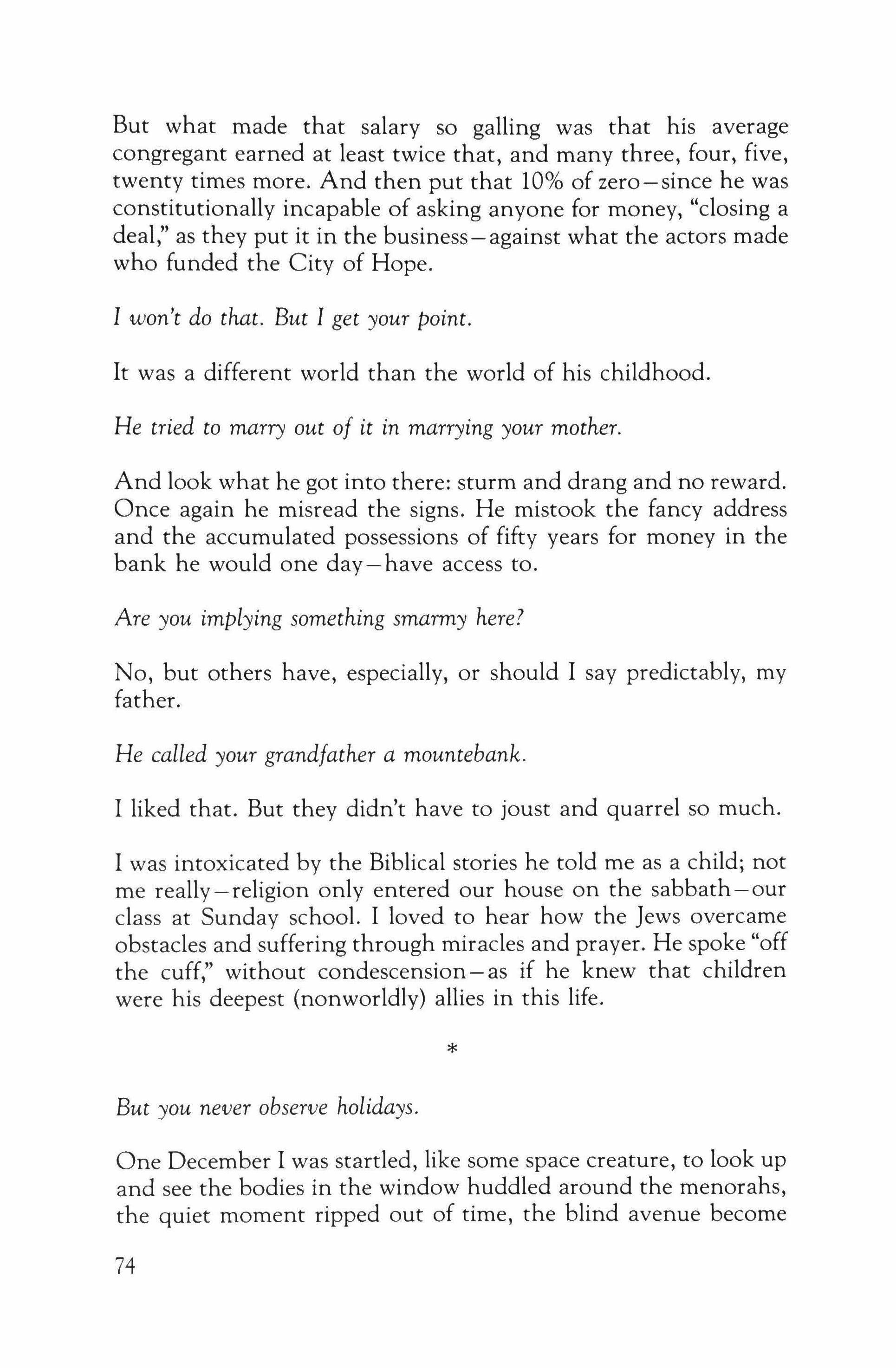
But you never observe holidays.
One December I was startled, like some space creature, to look up and see the bodies in the window huddled around the menorahs, the quiet moment ripped out of time, the blind avenue become
74
human for a moment, out of a time yet in time; only one candle lit the first night, the other branches of the menorah scarcely visible if visible at all behind these gray windows in the winter dusk; the story no more than an image of persistence against the odds; the miraculous oil burning beyond its energy quotient
So oil was an issue even then?
That's what the little Rabbi offered in his sermons: contemporary takes on ancient themes.
Let's go back. You were walking in the winter dusk. You looked up and felt alone: those others still had rituals, like a balm.
To speak of balm is to speak of wounds. These followers of Mammon claim the right to pray; to be heard by a higher order.
You with your "days of the spirit" have no hope that anyone might hear.
But that's another matter. I was talking about lights in windows at nightfall, at that precise moment when something in your brain clicks and knows it's dark (when it wasn't a moment ago), and the bodies outlined. It is an image of what cannot be possessed, what can never be taken for granted, or taken at all.
*
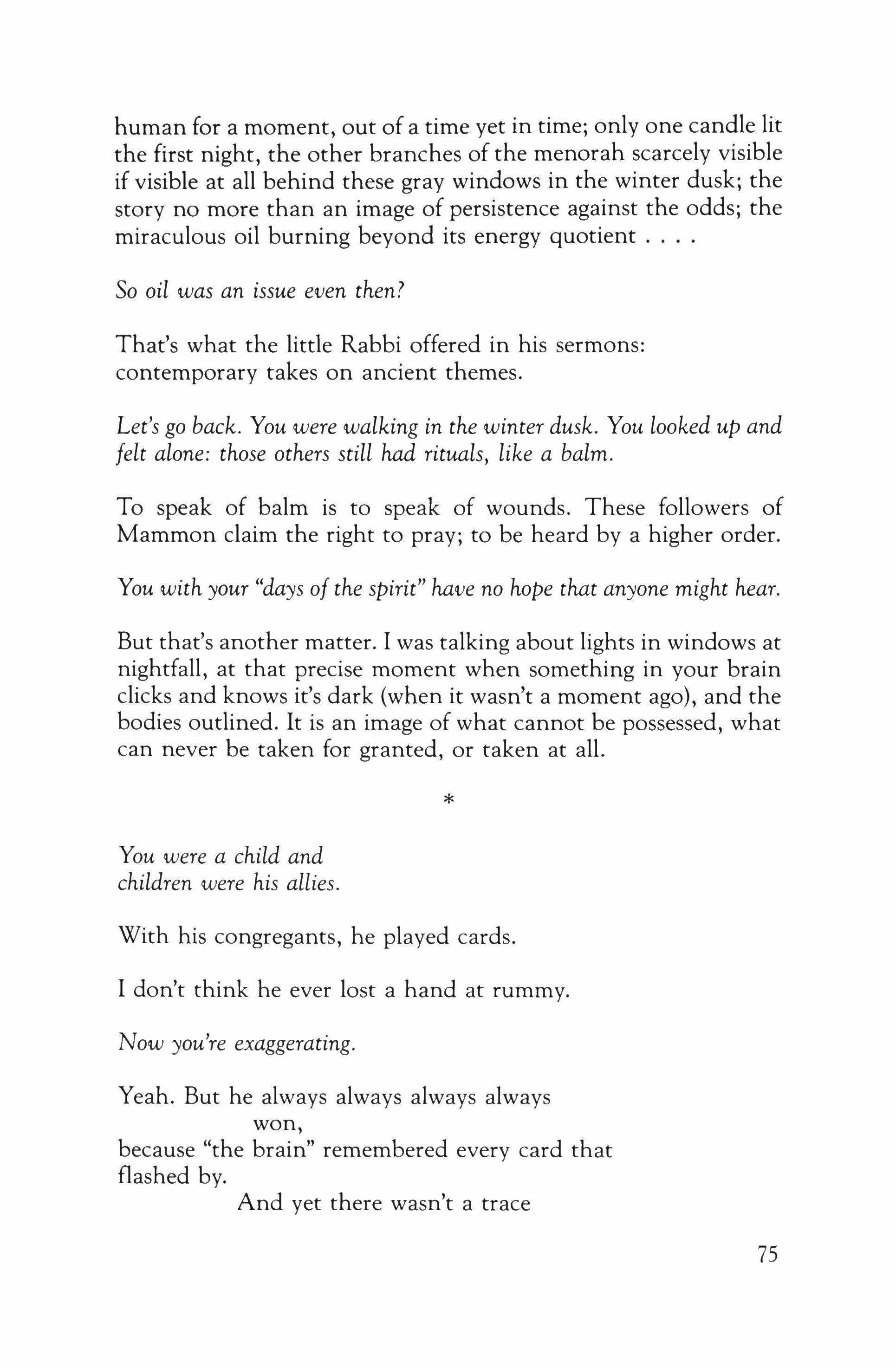
You were a child and children were his allies.
With his congregants, he played cards.
I don't think he ever lost a hand at rummy.
Now you're exaggerating.
Yeah. But he always always always always won, because "the brain" remembered every card that flashed by.
And yet there wasn't a trace
75
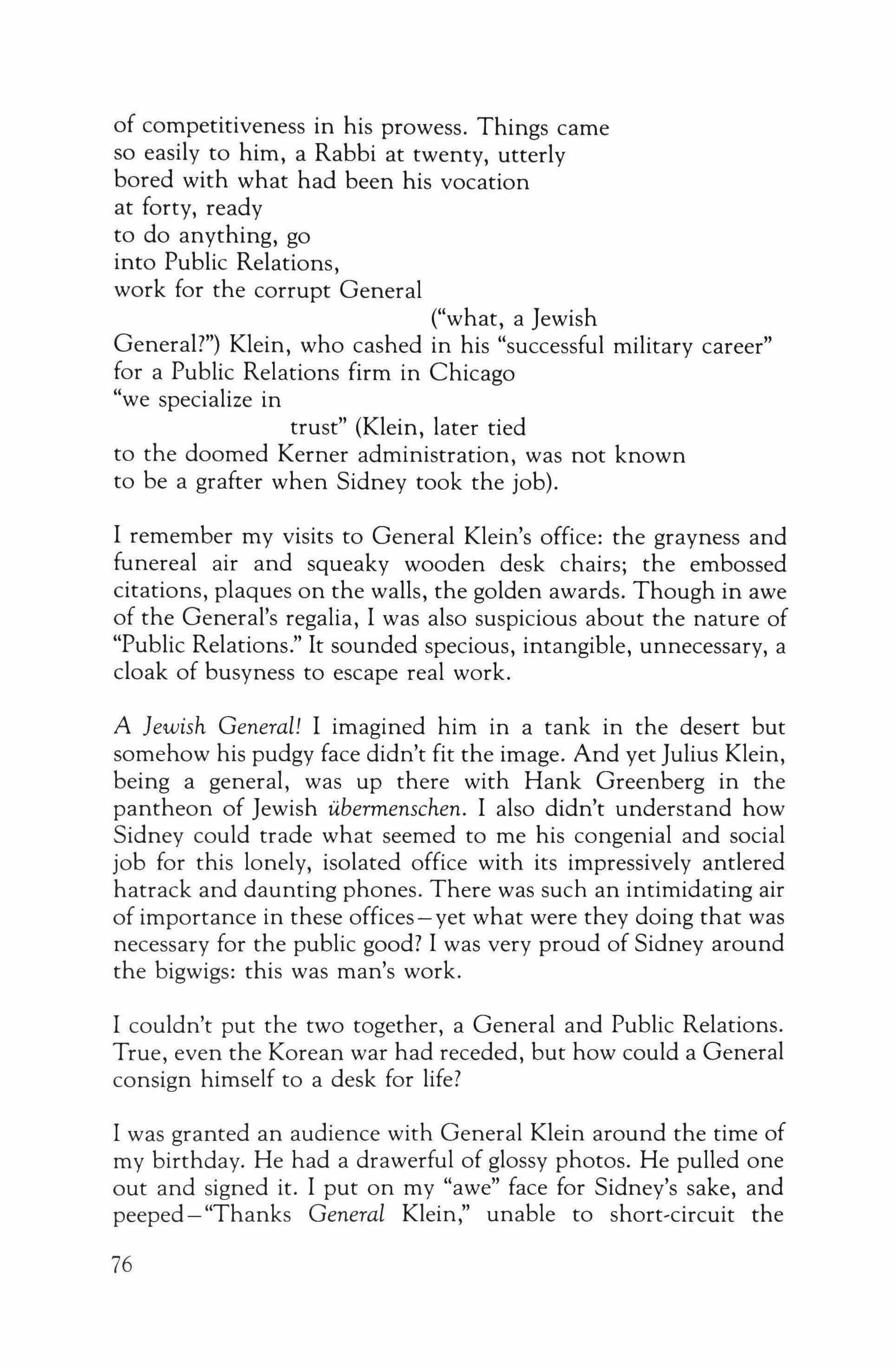
of competitiveness in his prowess. Things came so easily to him, a Rabbi at twenty, utterly bored with what had been his vocation at forty, ready to do anything, go into Public Relations, work for the corrupt General ("what, a Jewish General?") Klein, who cashed in his "successful military career" for a Public Relations firm in Chicago "we specialize in trust" (Klein, later tied to the doomed Kerner administration, was not known to be a grafter when Sidney took the job).
I remember my visits to General Klein's office: the grayness and funereal air and squeaky wooden desk chairs; the embossed citations, plaques on the walls, the golden awards. Though in awe of the General's regalia, I was also suspicious about the nature of "Public Relations." It sounded specious, intangible, unnecessary, a cloak of busyness to escape real work.
A Jewish General! I imagined him in a tank in the desert but somehow his pudgy face didn't fit the image. And yet Julius Klein, being a general, was up there with Hank Greenberg in the pantheon of Jewish ubermenschen. I also didn't understand how Sidney could trade what seemed to me his congenial and social job for this lonely, isolated office with its impressively antlered hatrack and daunting phones. There was such an intimidating air of importance in these offices-yet what were they doing that was necessary for the public good? I was very proud of Sidney around the bigwigs: this was man's work.
I couldn't put the two together, a General and Public Relations. True, even the Korean war had receded, but how could a General consign himself to a desk for life?
1 was granted an audience with General Klein around the time of my birthday. He had a drawerful of glossy photos. He pulled one out and signed it. I put on my "awe" face for Sidney's sake, and peeped - "Thanks General Klein," unable to short-circuit the
76
emphasis on his title. "Thanks," Sidney echoed nasally, and ushered me out.
"What would you like to do now?"
"Buy some soldiers."
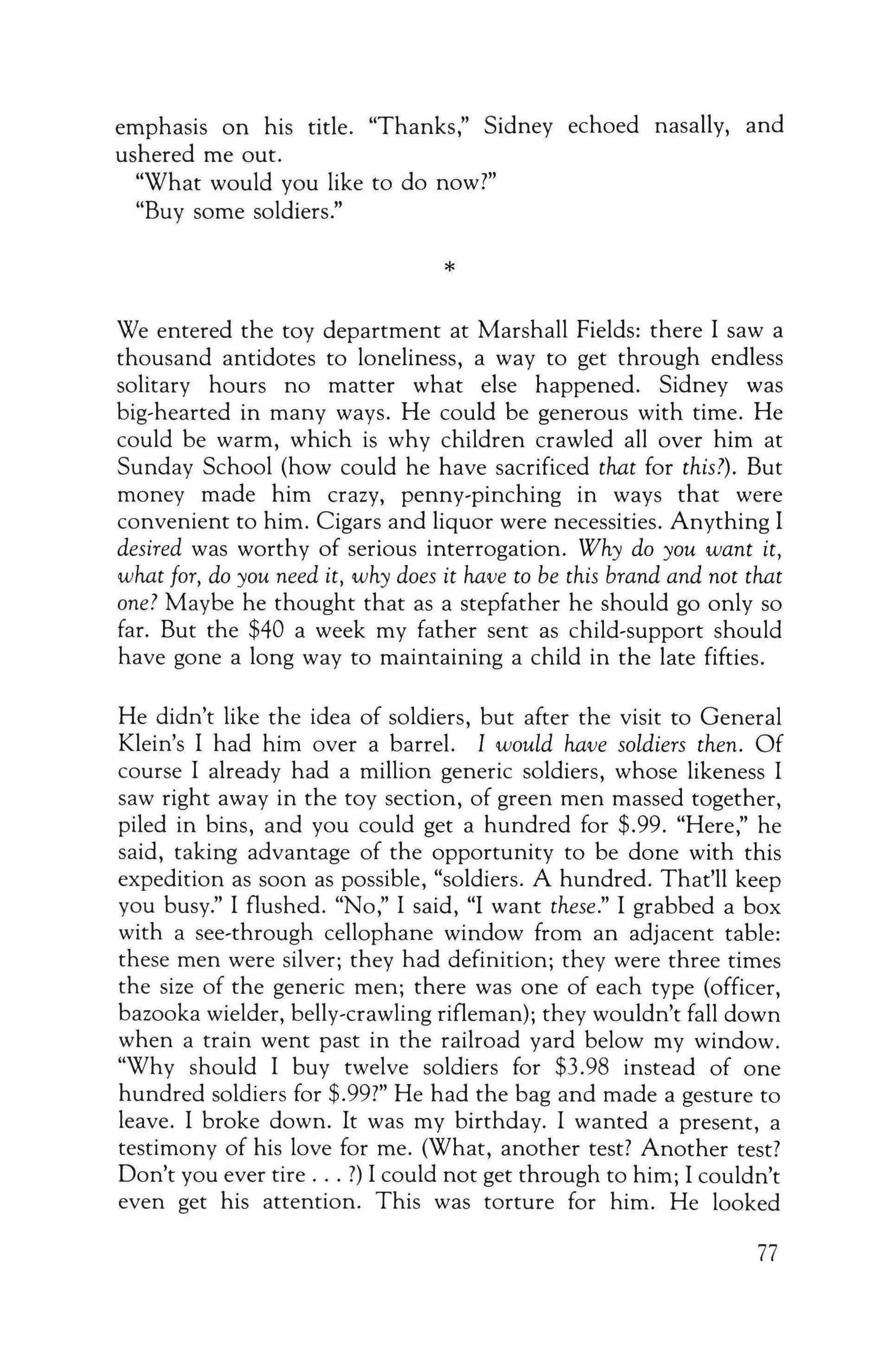
*
We entered the toy department at Marshall Fields: there I saw a thousand antidotes to loneliness, a way to get through endless solitary hours no matter what else happened. Sidney was big-hearted in many ways. He could be generous with time. He could be warm, which is why children crawled all over him at Sunday School (how could he have sacrificed that for this?). But money made him crazy, penny-pinching in ways that were convenient to him. Cigars and liquor were necessities. Anything I desired was worthy of serious interrogation. Why do you want it, what for, do you need it, why does it have to be this brand and not that one? Maybe he thought that as a stepfather he should go only so far. But the $40 a week my father sent as child-support should have gone a long way to maintaining a child in the late fifties.
He didn't like the idea of soldiers, but after the visit to General Klein's I had him over a barrel. I would have soldiers then. Of course I already had a million generic soldiers, whose likeness I saw right away in the toy section, of green men massed together, piled in bins, and you could get a hundred for $.99. "Here," he said, taking advantage of the opportunity to be done with this expedition as soon as possible, "soldiers. A hundred. That'll keep you busy." I flushed. "No," I said, "I want these." I grabbed a box with a see-through cellophane window from an adjacent table: these men were silver: they had definition; they were three times the size of the generic men; there was one of each type (officer, bazooka wielder, belly-crawling rifleman); they wouldn't fall down when a train went past in the railroad yard below my window. "Why should I buy twelve soldiers for $3.98 instead of one hundred soldiers for $.99?" He had the bag and made a gesture to leave. I broke down. It was my birthday. I wanted a present, a testimony of his love for me. (What, another test? Another test? Don't you ever tire ?) I could not get through to him; I couldn't even get his attention. This was torture for him. He looked
77
overheated too in his fedora and heavy tweed overcoat and cranberry cashmere scarf. "I am not going to spend three dollars and ninety�eight cents on twelve soldiers and that's final. Have these or nothing." Exact amounts of money, dollars and cents, were given the same vocal emphasis as the names of his favorite prophets when he stood on the pulpit. Venom coursed through me: if I'd been a snake I would have hissed. The simplest litany imaginable was running through my head: "I just want you to buy this for me because it's what I want and it's my birthday."
I could hear it coming: the lecture about the Rockefeller children's small allowances.
They worked so hard not to spoil me.
What are you doing now?
Sitting at a white iron table at Cafe 112 on 112th St. and Broadway at 9: 15 (A.M.),
the green letters and intersecting circles of a billboard on a wall above a garage on the east side of 113th St. simply
it says and the G and the A and the R are effaced so that the garage sign reads
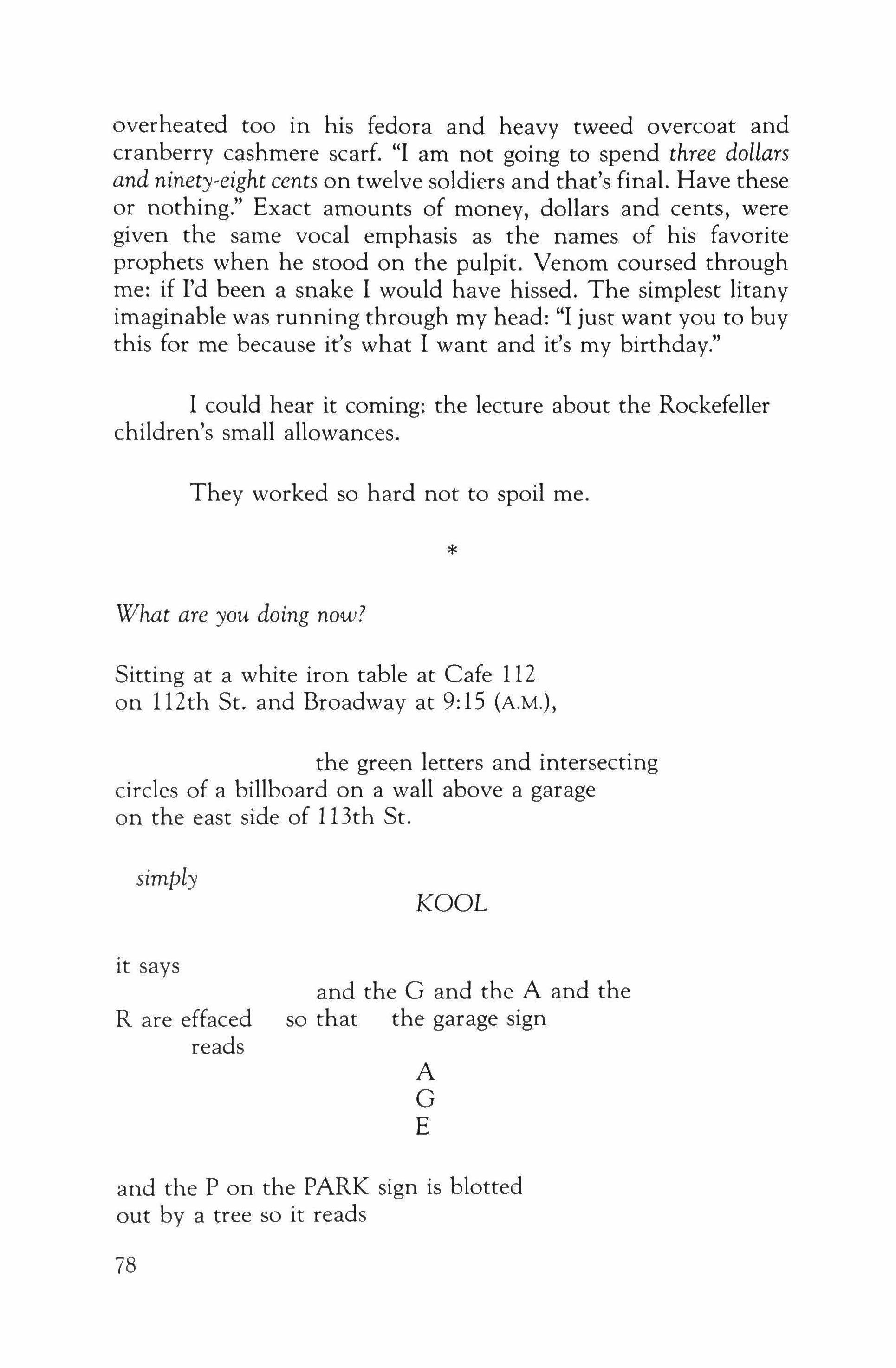
and the P on the PARK sign is blotted out by a tree so it reads
*
KOOL
A G E
78
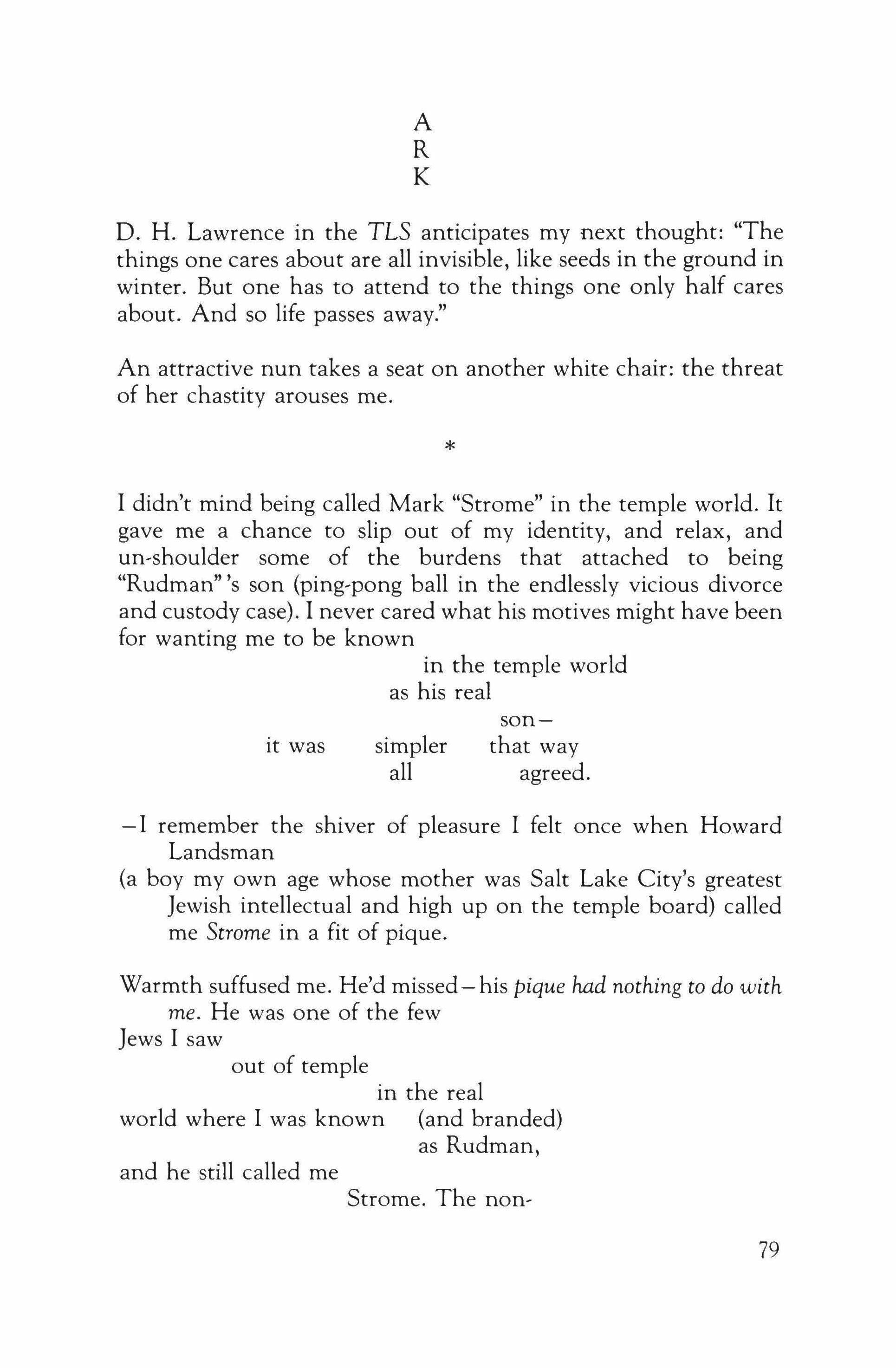
D. H. Lawrence in the TLS anticipates my next thought: "The things one cares about are all invisible, like seeds in the ground in winter. But one has to attend to the things one only half cares about. And so life passes away."
An attractive nun takes a seat on another white chair: the threat of her chastity arouses me. *
I didn't mind being called Mark "Strome" in the temple world. It gave me a chance to slip out of my identity, and relax, and uri-shoulder some of the burdens that attached to being "Rudman" 's son (ping-pong ball in the endlessly vicious divorce and custody case). I never cared what his motives might have been for wanting me to be known in the temple world as his real it was simpler all sonthat way agreed.
- I remember the shiver of pleasure I felt once when Howard Landsman (a boy my own age whose mother was Salt Lake City's greatest Jewish intellectual and high up on the temple board) called me Strome in a fit of pique.
Warmth suffused me. He'd missed-his pique had nothing to do with me. He was one of the few Jews I saw out of temple in the real world where I was known (and branded) as Rudman, and he still called me
Strome. The non-
A
R K
79
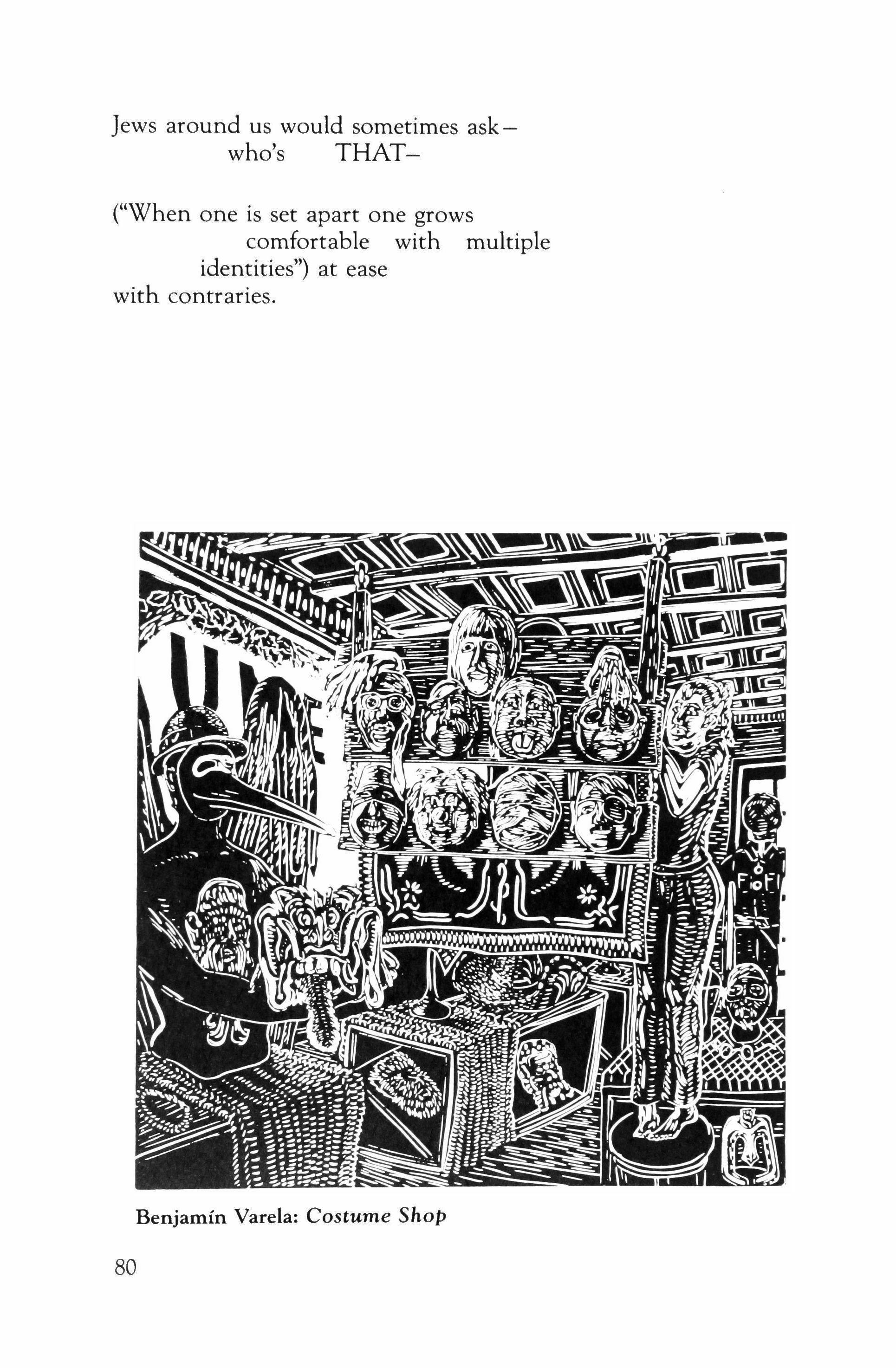
Jews around us would sometimes askwho's THAT-
("When one is set apart one grows comfortable with multiple identities") at ease with contraries.
80
Benjamin Varela: Costume Shop
The Children
David Galler
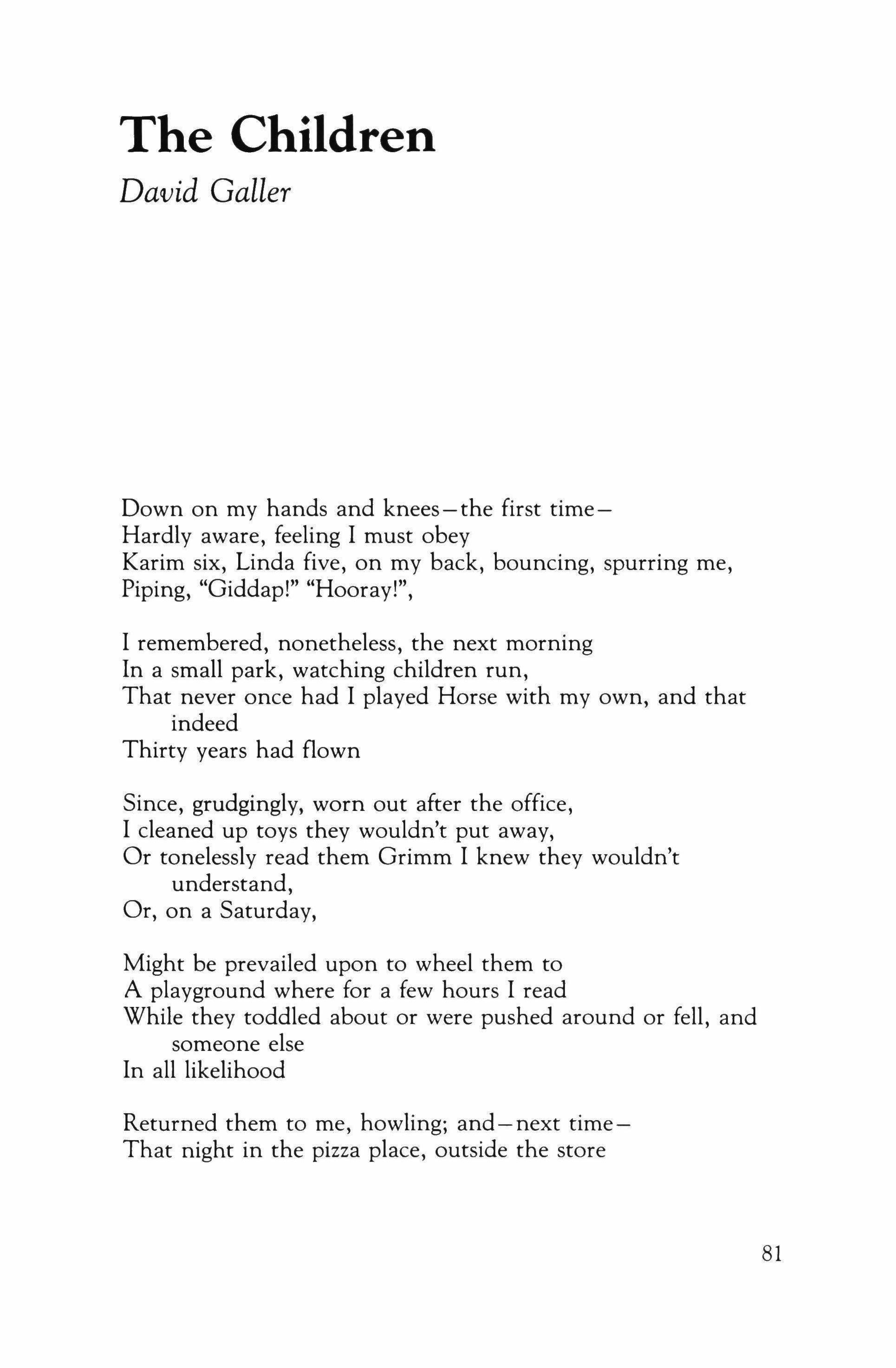
Down on my hands and knees-the first timeHardly aware, feeling I must obey Karim six, Linda five, on my back, bouncing, spurring me, Piping, "Giddap!" "Hooray!",
I remembered, nonetheless, the next morning In a small park, watching children run, That never once had I played Horse with my own, and that indeed Thirty years had flown
Since, grudgingly, worn out after the office, I cleaned up toys they wouldn't put away, Or tonelessly read them Grimm I knew they wouldn't understand, Or, on a Saturday,
Might be prevailed upon to wheel them to A playground where for a few hours I read While they toddled about or were pushed around or fell, and someone else In all likelihood
Returned them to me, howling; and-next timeThat night in the pizza place, outside the store
81
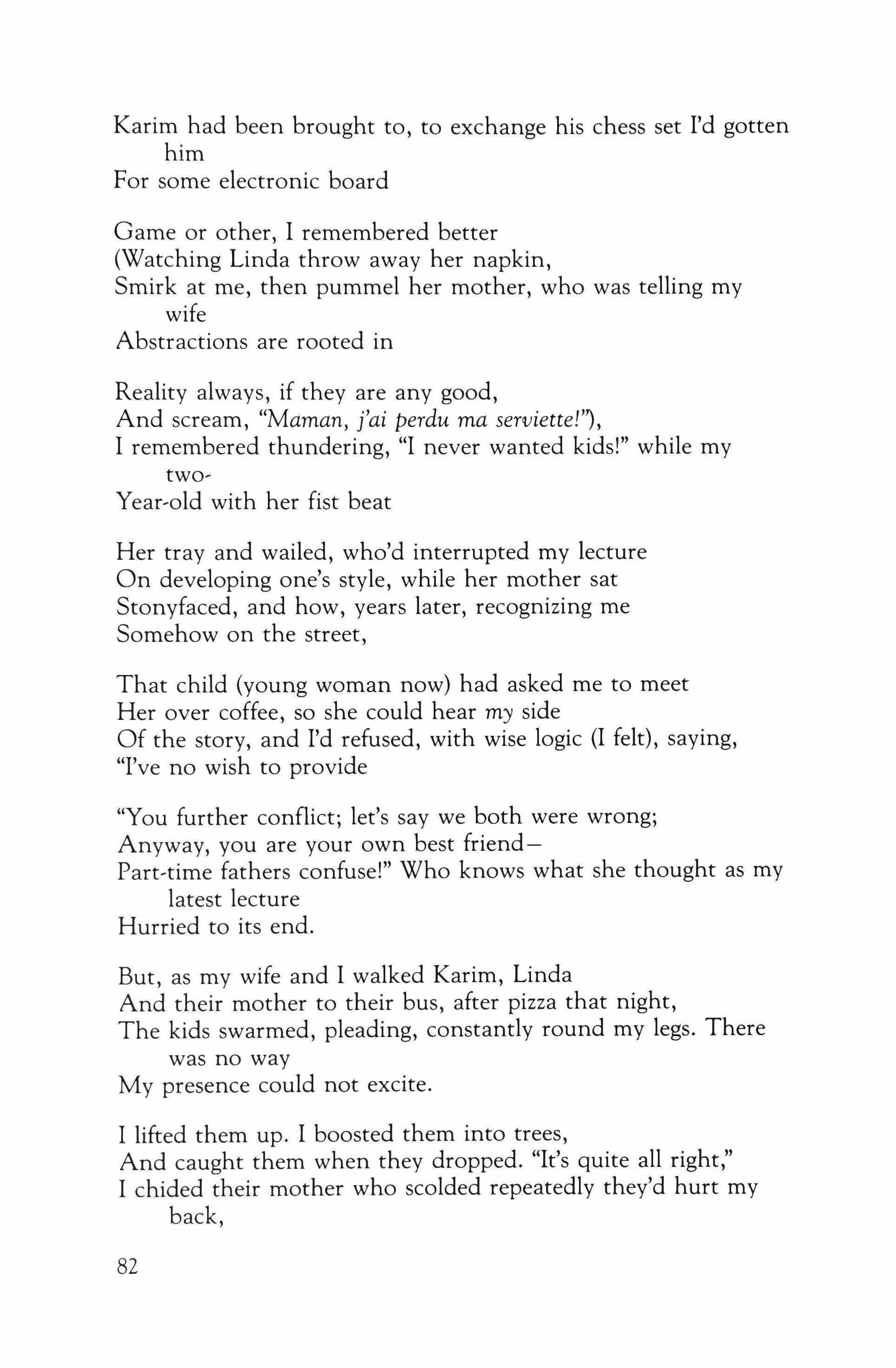
Karim had been brought to, to exchange his chess set I'd gotten him
For some electronic board
Game or other, I remembered better (Watching Linda throwaway her napkin, Smirk at me, then pummel her mother, who was telling my wife
Abstractions are rooted in
Reality always, if they are any good, And scream, IIMaman, j'ai perdu ma serviette!'), I remembered thundering, "I never wanted kids!" while my two-
Year-old with her fist beat
Her tray and wailed, who'd interrupted my lecture On developing one's style, while her mother sat Stonyfaced, and how, years later, recognizing me Somehow on the street,
That child (young woman now) had asked me to meet Her over coffee, so she could hear my side Of the story, and I'd refused, with wise logic (I felt), saying, "I've no wish to provide
"You further conflict; let's say we both were wrong; Anyway, you are your own best friendPart-time fathers confuse!" Who knows what she thought as my latest lecture Hurried to its end.
But, as my wife and I walked Karim, Linda And their mother to their bus, after pizza that night, The kids swarmed, pleading, constantly round my legs. There was no way
My presence could not excite.
I lifted them up. I boosted them into trees, And caught them when they dropped. "It's quite all right," I chided their mother who scolded repeatedly they'd hurt my back,
82
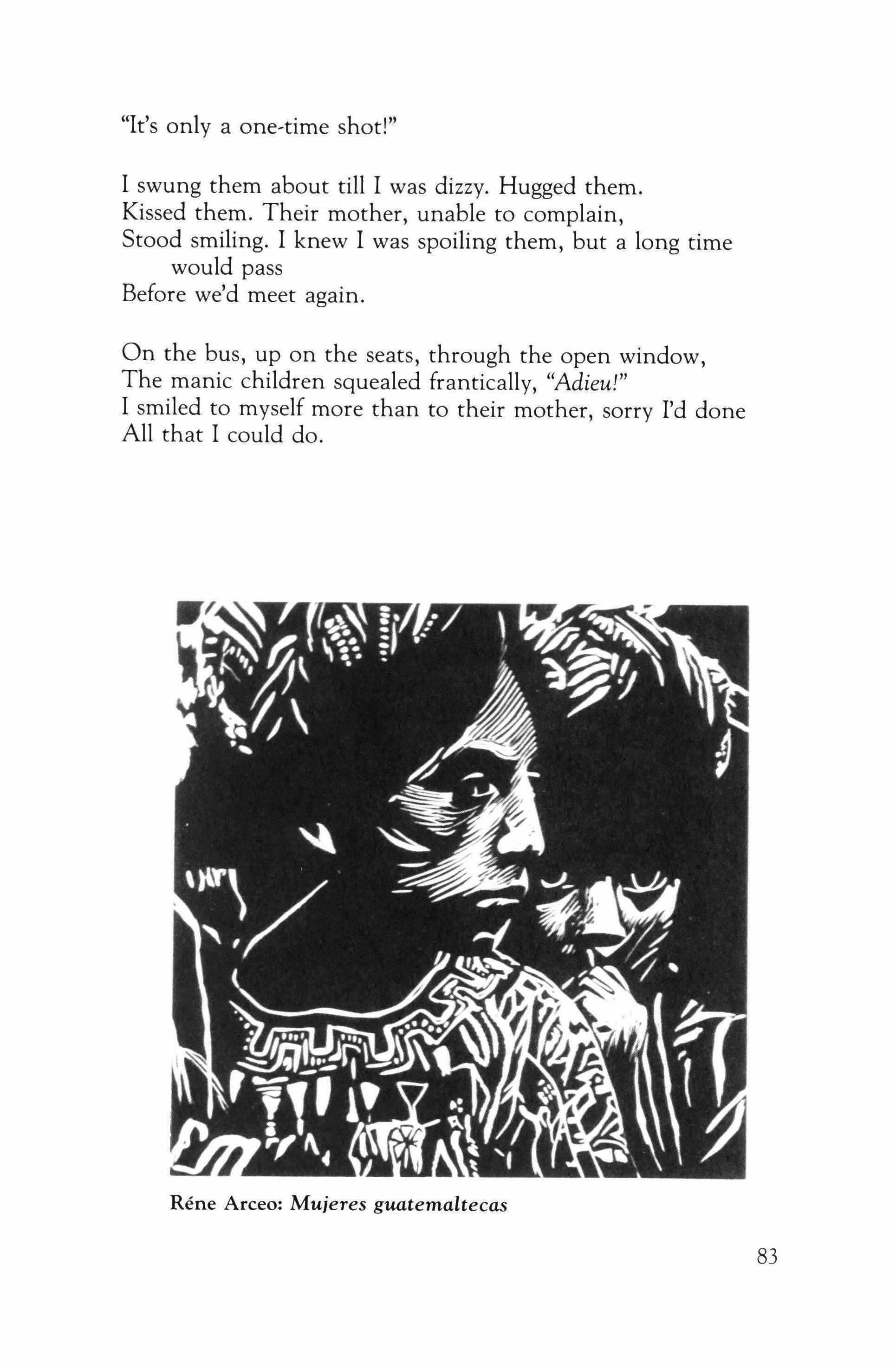
"It's only a one-time shot!"
I swung them about till I was dizzy. Hugged them. Kissed them. Their mother, unable to complain, Stood smiling. I knew I was spoiling them, but a long time would pass Before we'd meet again.
On the bus, up on the seats, through the open window, The manic children squealed frantically, "Adieu!" I smiled to myself more than to their mother, sorry I'd done All that I could do.
83
Rene Arceo: Mujeres guatemaltecas
Three Poems
Marc ]. Straus
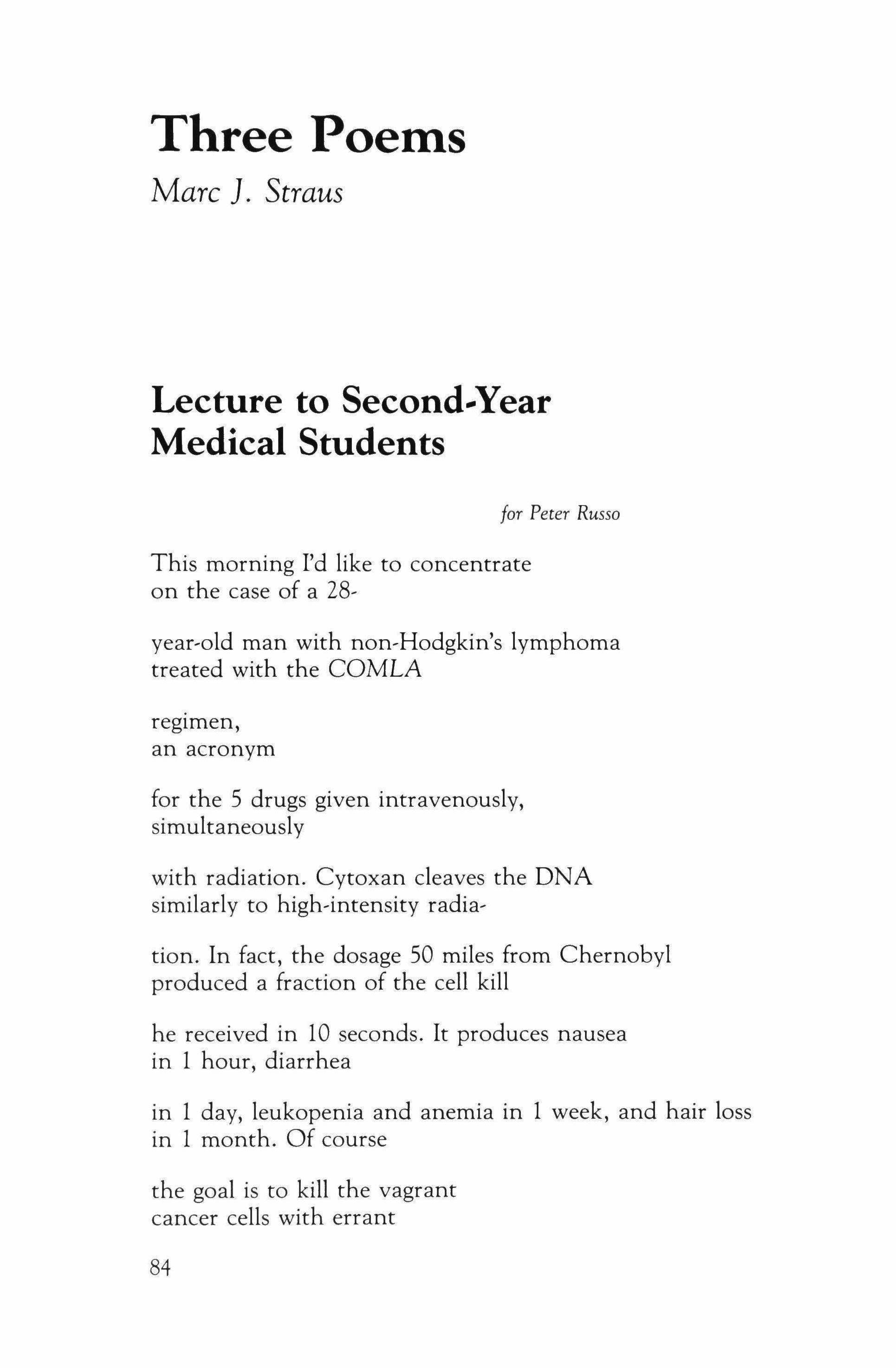
Lecture to Second Year Medical Students for
Peter Russo
This morning I'd like to concentrate on the case of a 28year-old man with non-Hodgkin's lymphoma treated with the COMLA regimen, an acronym for the 5 drugs given intravenously, simultaneously with radiation. Cytoxan cleaves the DNA similarly to high-intensity radiation. In fact, the dosage 50 miles from Chernobyl produced a fraction of the cell kill he received in 10 seconds. It produces nausea in 1 hour, diarrhea in 1 day, leukopenia and anemia in 1 week, and hair loss in 1 month. Of course the goal is to kill the vagrant cancer cells with errant
84
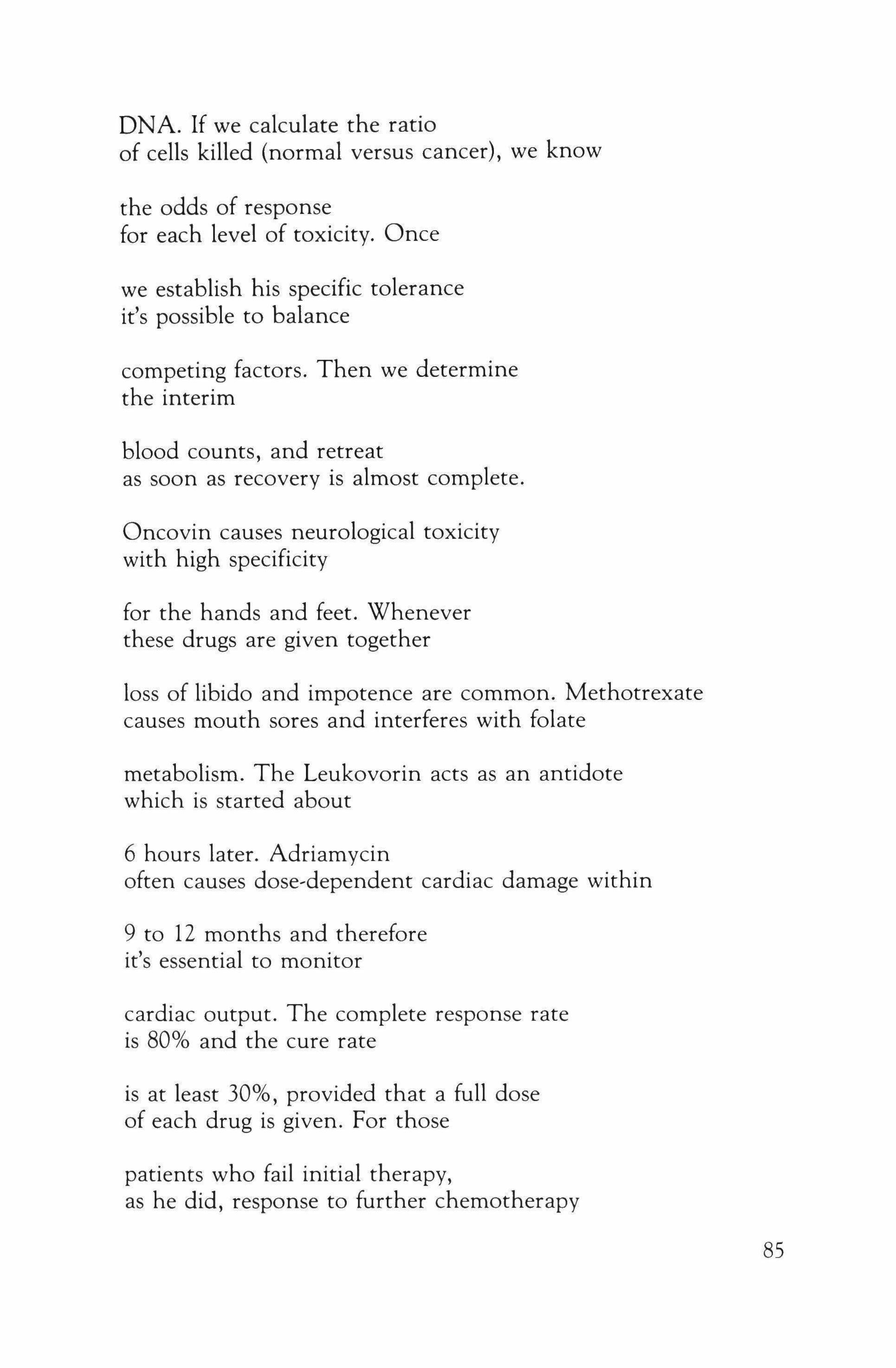
DNA. If we calculate the ratio of cells killed (normal versus cancer), we know the odds of response for each level of toxicity. Once
we establish his specific tolerance it's possible to balance competing factors. Then we determine the interim blood counts, and retreat as soon as recovery is almost complete.
Oncovin causes neurological toxicity with high specificity for the hands and feet. Whenever these drugs are given together
loss of libido and impotence are common. Methotrexate causes mouth sores and interferes with folate
metabolism. The Leukovorin acts as an antidote which is started about
6 hours later. Adriamycin often causes dose-dependent cardiac damage within 9 to 12 months and therefore it's essential to monitor
cardiac output. The complete response rate is 80% and the cure rate
is at least 30%, provided that a full dose of each drug is given. For those
patients who fail initial therapy, as he did, response to further chemotherapy
85
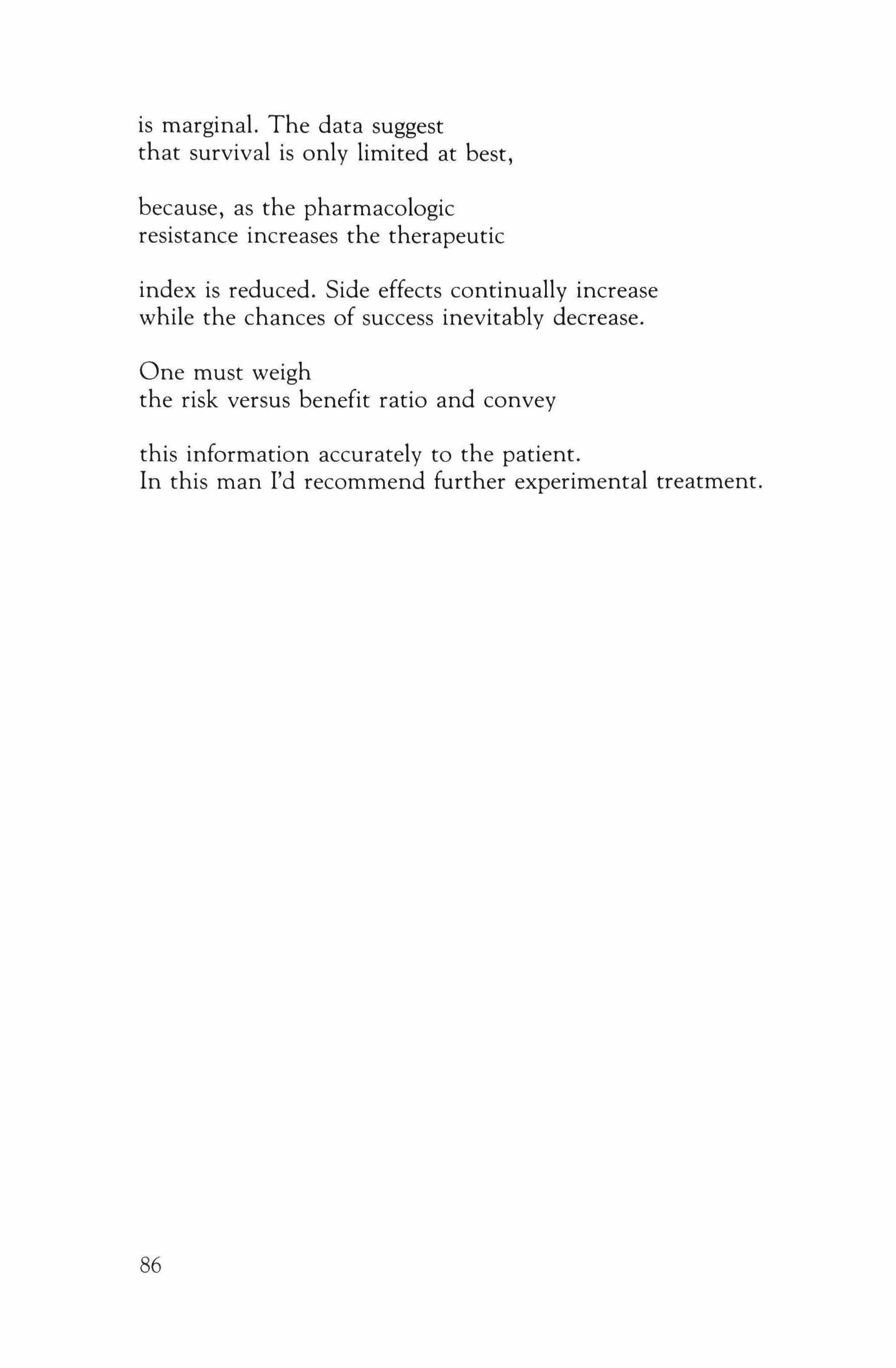
is marginal. The data suggest that survival is only limited at best, because, as the pharmacologic resistance increases the therapeutic index is reduced. Side effects continually increase while the chances of success inevitably decrease.
One must weigh the risk versus benefit ratio and convey this information accurately to the patient. In this man I'd recommend further experimental treatment.
86
The Log of Pi
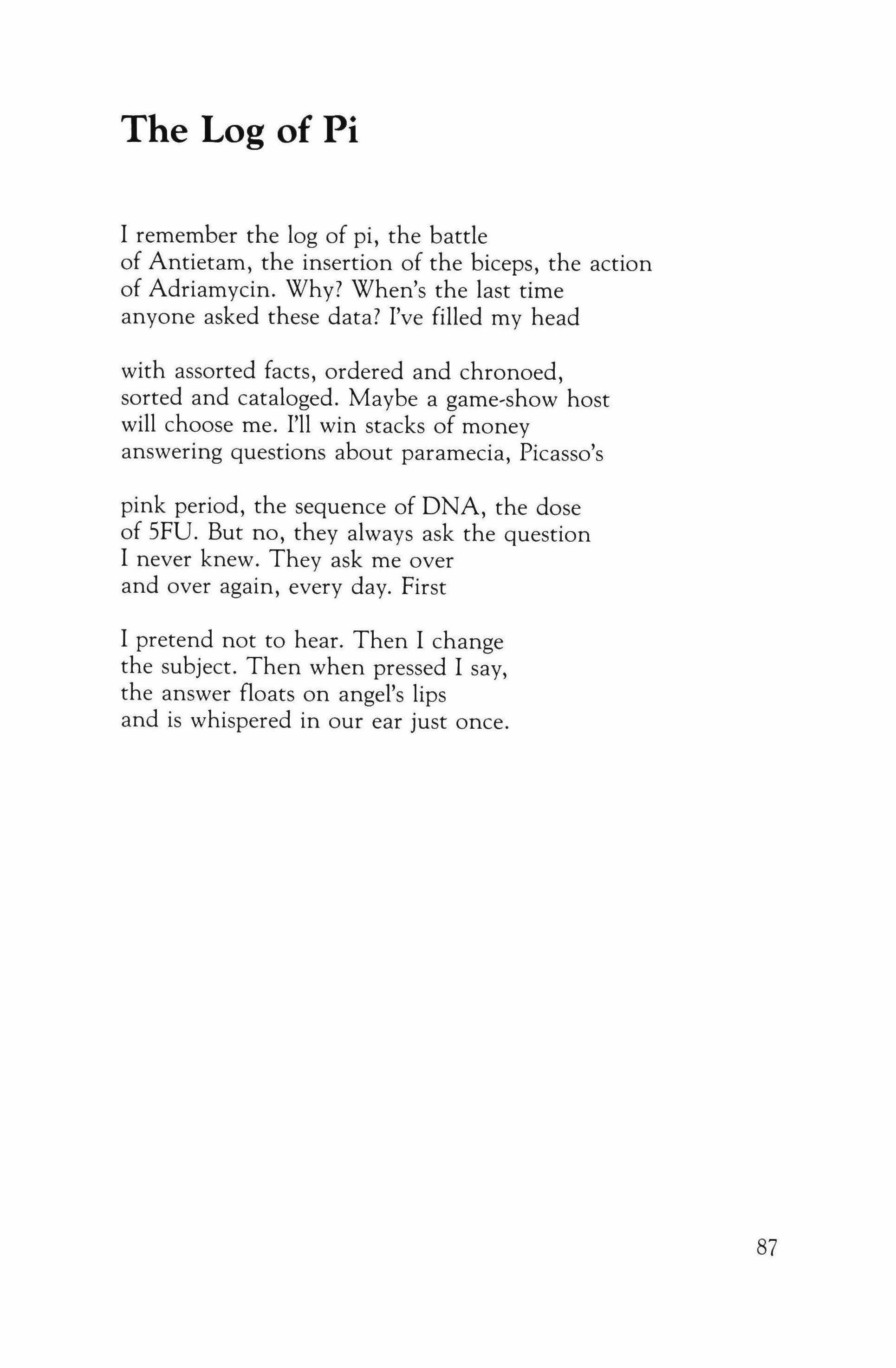
I remember the log of pi, the battle of Antietam, the insertion of the biceps, the action of Adriamycin. Why? When's the last time anyone asked these data? I've filled my head
with assorted facts, ordered and chronoed, sorted and cataloged. Maybe a game-show host will choose me. I'll win stacks of money answering questions about paramecia, Picasso's
pink period, the sequence of DNA, the dose of SFU. But no, they always ask the question I never knew. They ask me over and over again, every day. First
I pretend not to hear. Then I change the subject. Then when pressed I say, the answer floats on angel's lips and is whispered in our ear just once.
87
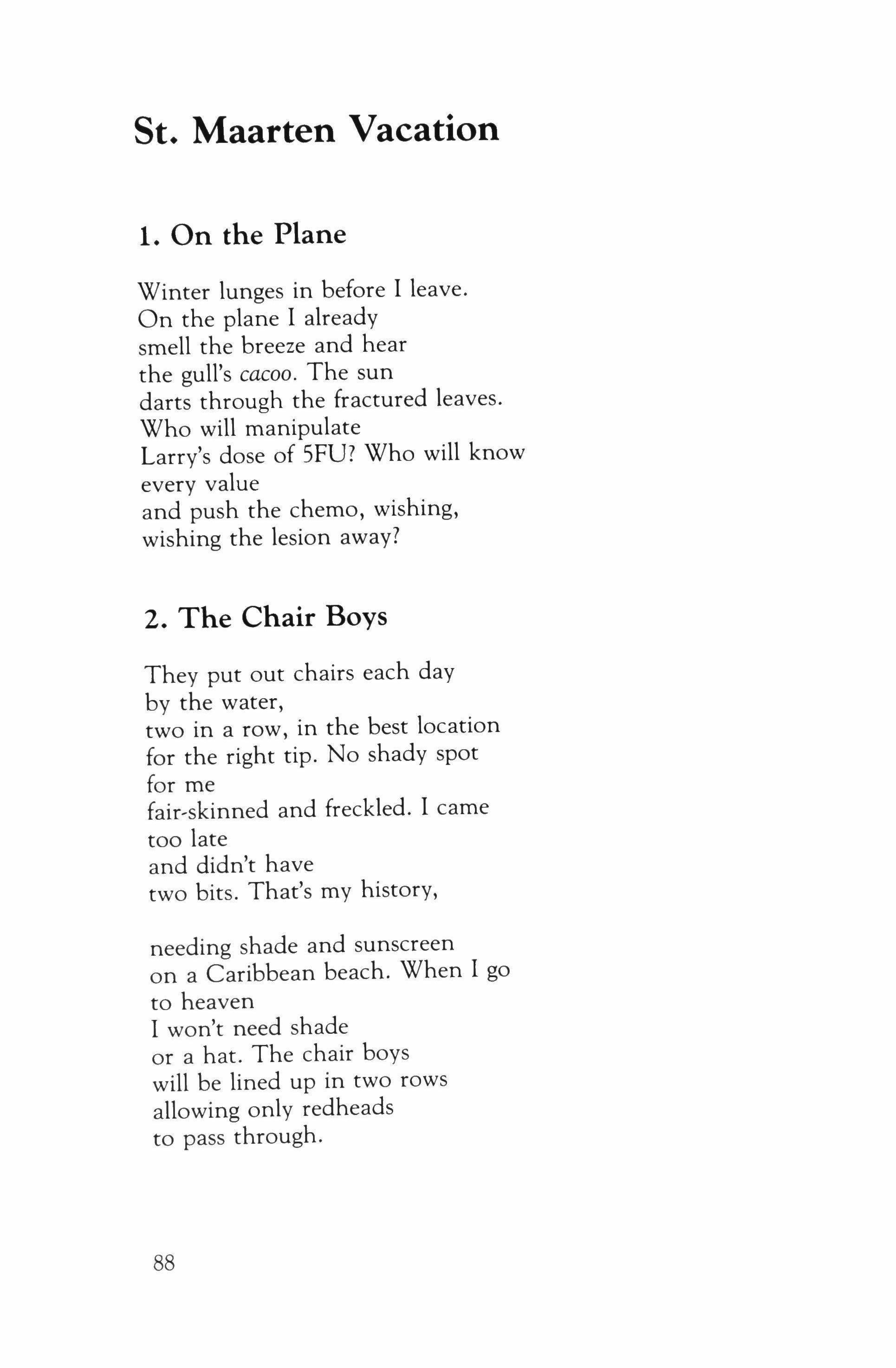
St. Maarten Vacation
1. On the Plane
Winter lunges in before I leave. On the plane I already smell the breeze and hear the gull's cacoo. The sun darts through the fractured leaves. Who will manipulate Larry's dose of SFU? Who will know every value and push the chemo, wishing, wishing the lesion away?
2. The Chair Boys
They put out chairs each day by the water, two in a row, in the best location for the right tip. No shady spot for me fair-skinned and freckled. I came too late and didn't have two bits. That's my history, needing shade and sunscreen on a Caribbean beach. When I go to heaven I won't need shade or a hat. The chair boys will be lined up in two rows allowing only redheads to pass through.
88
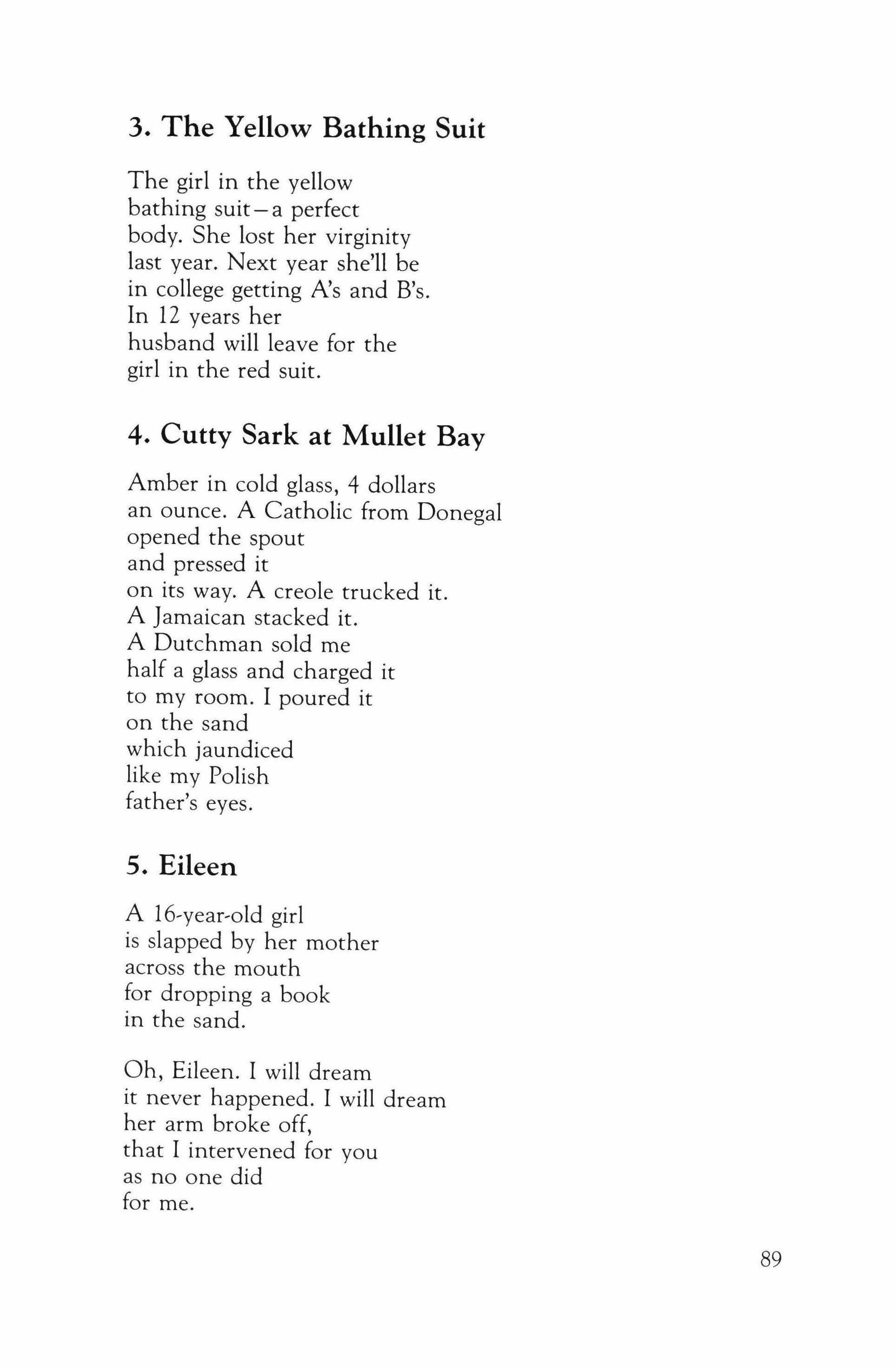
3. The Yellow Bathing Suit
The girl in the yellow bathing suit - a perfect body. She lost her virginity last year. Next year she'll be in college getting Ns and B's. In 12 years her husband will leave for the girl in the red suit.
4. Cutty Sark at Mullet Bay
Amber in cold glass, 4 dollars an ounce. A Catholic from Donegal opened the spout and pressed it on its way. A creole trucked it. A Jamaican stacked it. A Dutchman sold me half a glass and charged it to my room. I poured it on the sand which jaundiced like my Polish father's eyes.
5. Eileen
A l o-vear-old girl is slapped by her mother across the mouth for dropping a book in the sand.
Oh, Eileen. I will dream it never happened. I will dream her arm broke off, that I intervened for you as no one did for me.
89
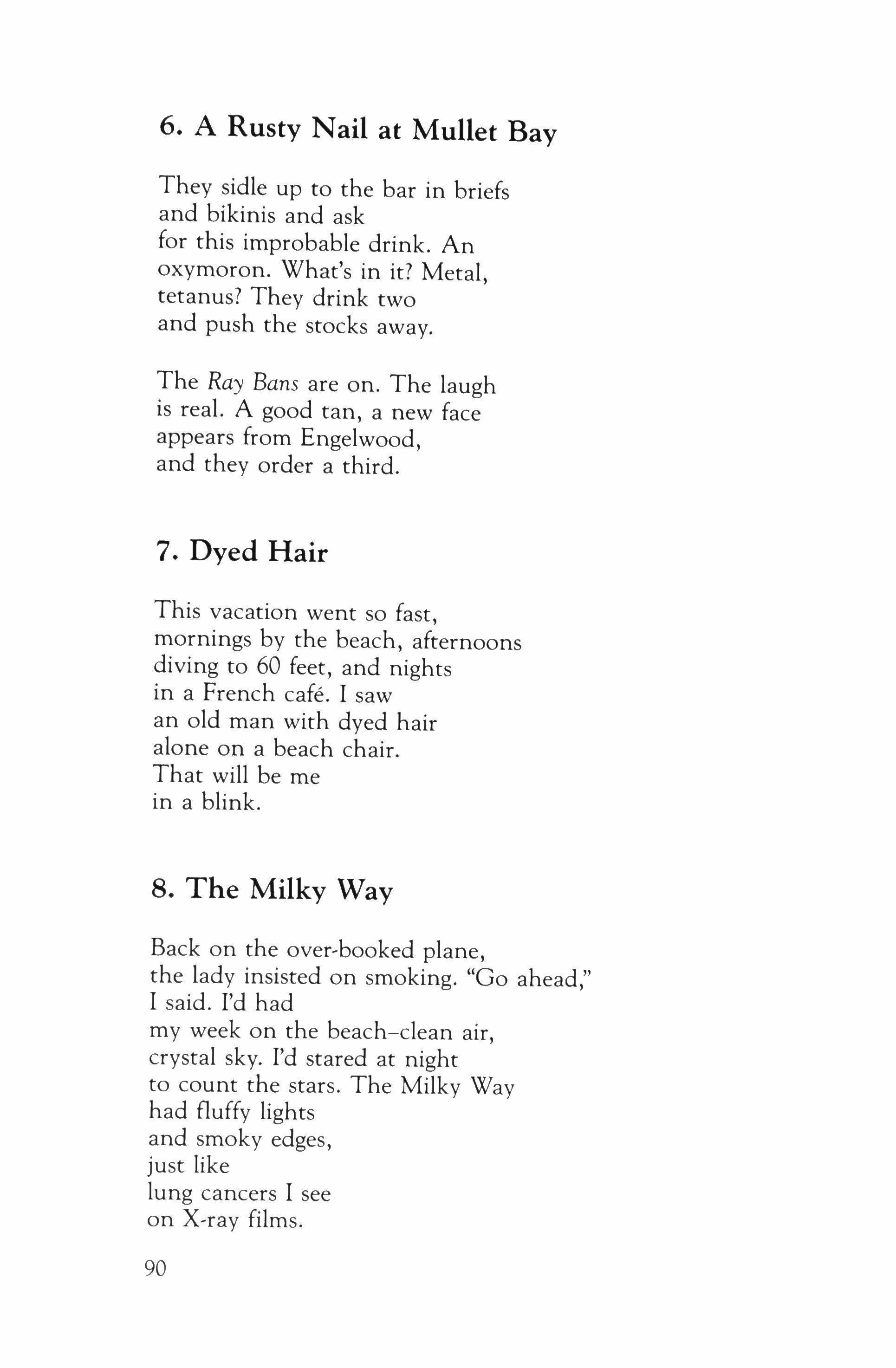
6. A Rusty Nail at Mullet Bay
They sidle up to the bar in briefs and bikinis and ask for this improbable drink. An oxymoron. What's in it? Metal, tetanus? They drink two and push the stocks away.
The Ray Bans are on. The laugh is real. A good tan, a new face appears from Engelwood, and they order a third.
7. Dyed Hair
This vacation went so fast, mornings by the beach, afternoons diving to 60 feet, and nights in a French cafe. I saw an old man with dyed hair alone on a beach chair. That will be me in a blink.
8. The Milky Way
Back on the over-booked plane, the lady insisted on smoking. "Go ahead," I said. I'd had my week on the beach-clean air, crystal sky. I'd stared at night to count the stars. The Milky Way had fluffy lights and smoky edges, just like lung cancers I see on Xvrav films.
90
Three Poems
Tina Villanueva
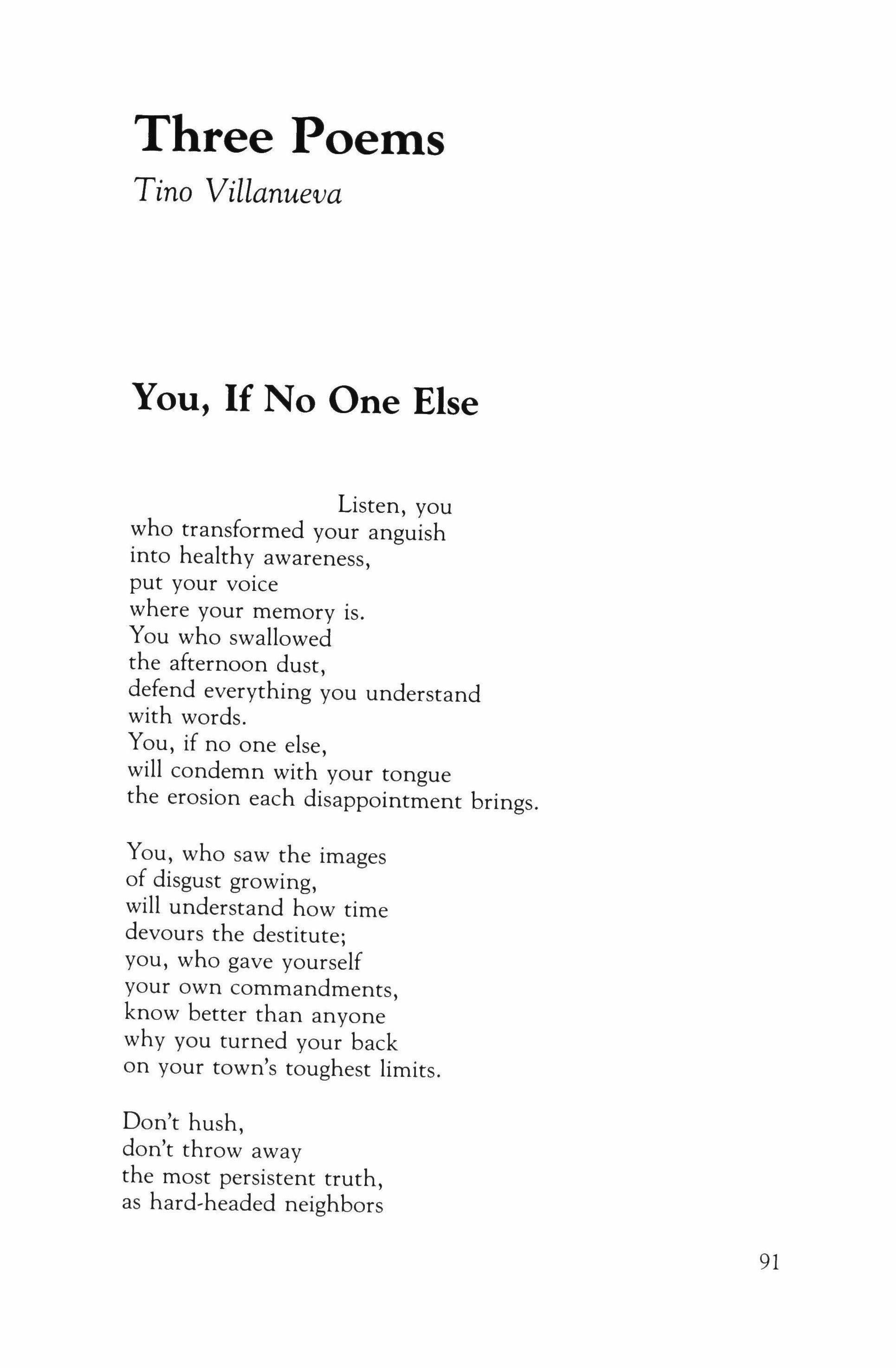
You, If No One Else
Listen, you who transformed your anguish into healthy awareness, put your voice where your memory is. You who swallowed the afternoon dust, defend everything you understand with words.
You, if no one else, will condemn with your tongue the erosion each disappointment brings.
You, who saw the images of disgust growing, will understand how time devours the destitute; you, who gave yourself your own commandments, know better than anyone why you turned your back on your town's toughest limits.
Don't hush, don't throwaway the most persistent truth, as hard-headed neighbors
91
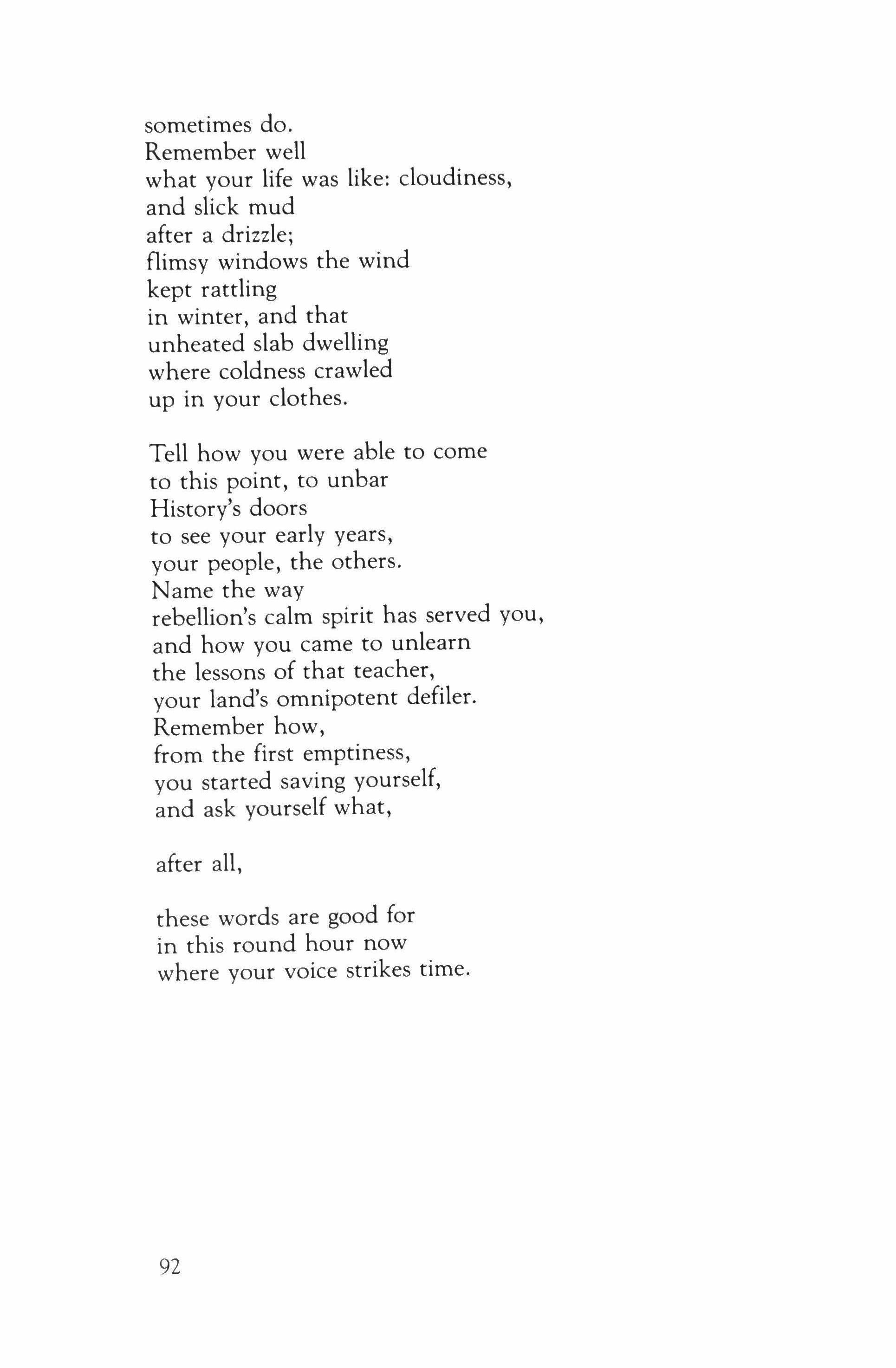
sometimes do. Remember well what your life was like: cloudiness, and slick mud after a drizzle; flimsy windows the wind kept rattling in winter, and that unheated slab dwelling where coldness crawled up in your clothes.
Tell how you were able to come to this point, to unbar History's doors to see your early years, your people, the others. Name the way rebellion's calm spirit has served you, and how you came to unlearn the lessons of that teacher, your land's omnipotent defiler. Remember how, from the first emptiness, you started saving yourself, and ask yourself what,
after all, these words are good for in this round hour now where your voice strikes time.
92
Promised Lands
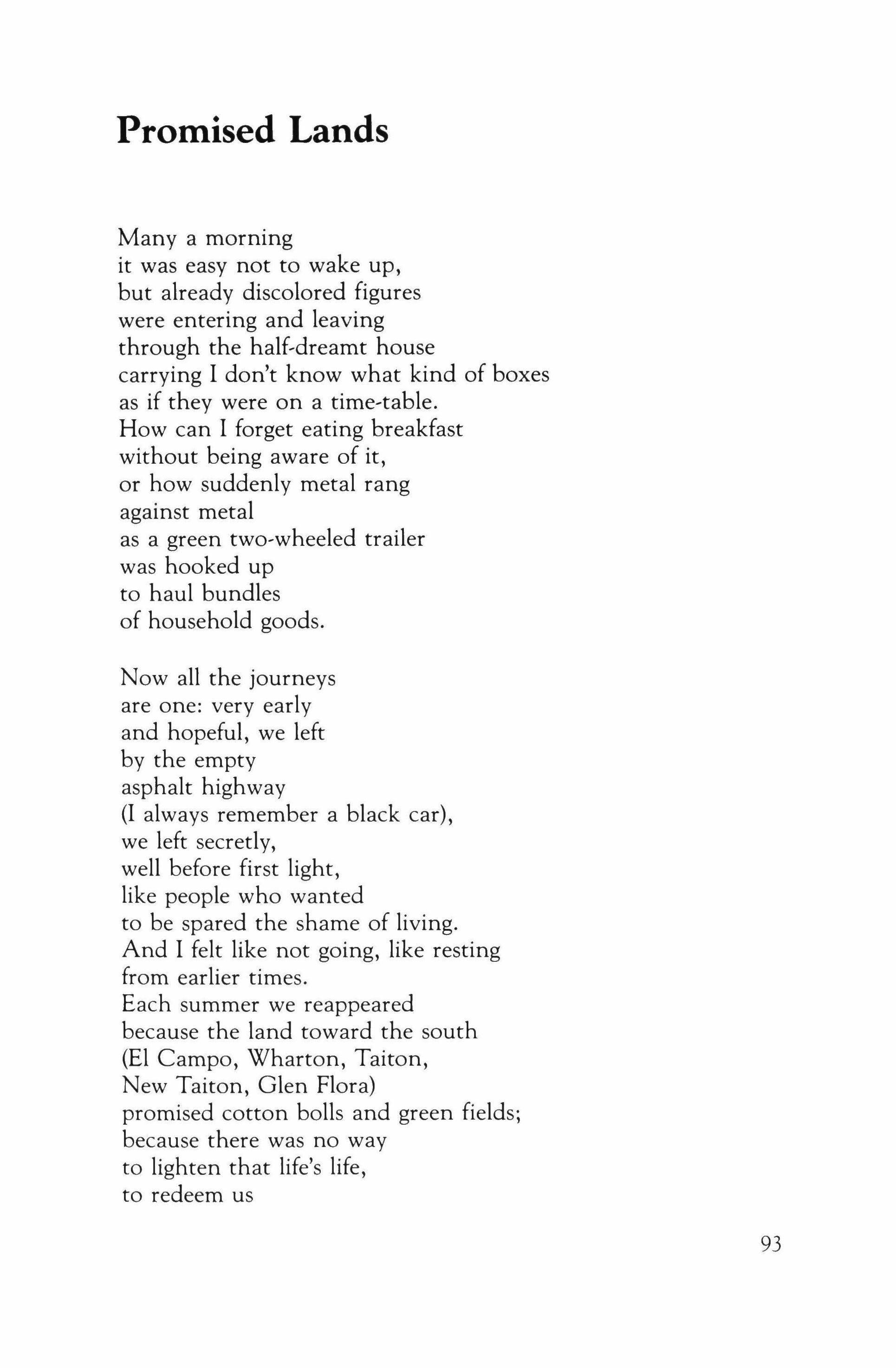
Many a morning it was easy not to wake up, but already discolored figures were entering and leaving through the half-dreamt house carrying I don't know what kind of boxes as if they were on a time-table. How can I forget eating breakfast without being aware of it, or how suddenly metal rang against metal as a green two-wheeled trailer was hooked up to haul bundles of household goods.
Now all the journeys are one: very early and hopeful, we left by the empty asphalt highway (I always remember a black car), we left secretly, well before first light, like people who wanted to be spared the shame of living. And I felt like not going, like resting from earlier times. Each summer we reappeared because the land toward the south (EI Campo, Wharton, Taiton, New Taiton, Glen Flora) promised cotton bolls and green fields; because there was no way to lighten that life's life, to redeem us
93
from one single excessively sunny afternoon when the body was soaked with sweat, and the sun's daggers let us have it in the back.
(Please, who will come one day for me to cure me of the horror of being here, to quench my thirst forever?)
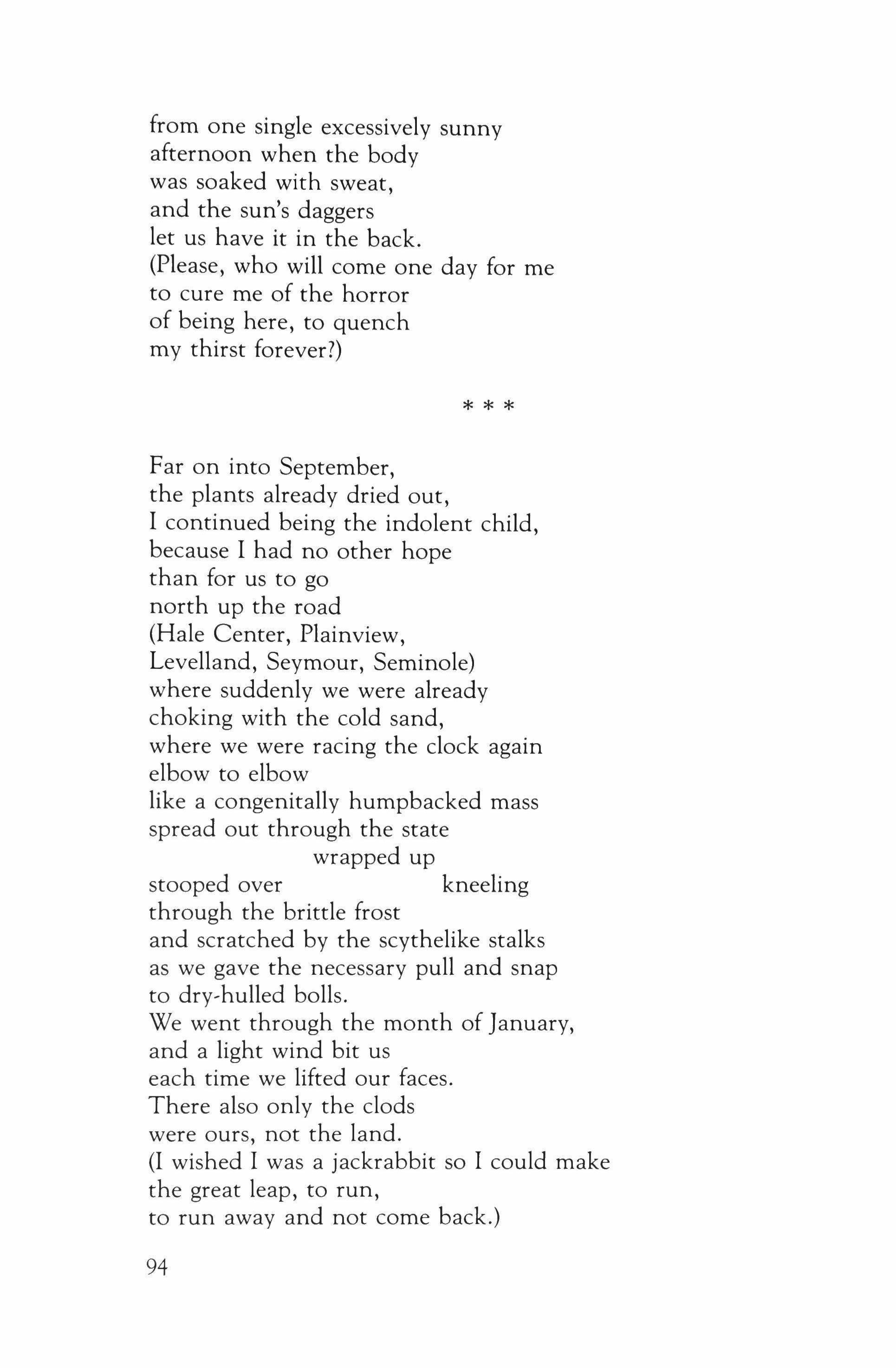
Far on into September, the plants already dried out, I continued being the indolent child, because I had no other hope than for us to go north up the road (Hale Center, Plainview, Levelland, Seymour, Seminole) where suddenly we were already choking with the cold sand, where we were racing the clock again elbow to elbow like a congenitally humpbacked mass spread out through the state wrapped up stooped over kneeling through the brittle frost and scratched by the scythelike stalks as we gave the necessary pull and snap to dry,hulled bolls. We went through the month of January, and a light wind bit us each time we lifted our faces. There also only the clods were ours, not the land. (I wished I was a jackrabbit so I could make the great leap, to run, to run away and not come back.)
* * *
94

Because of all I'm concerned with today, I give more thought now to how prisonlike that childhood was in the abhorrent world of cotton-field work. Who gave the order in the 40's the furrows had to be so long, and the time that dragged in picking them was slavering to devour me? In the 50's the answer was already unimportant to me. I told myself: everything's lost, get up and go as best you can. You're not getting anything here. I couldn't separate past from future till the 60's, and leave the hot unshaded roads behind, and the ones frozen over.
95
Convocation of Words
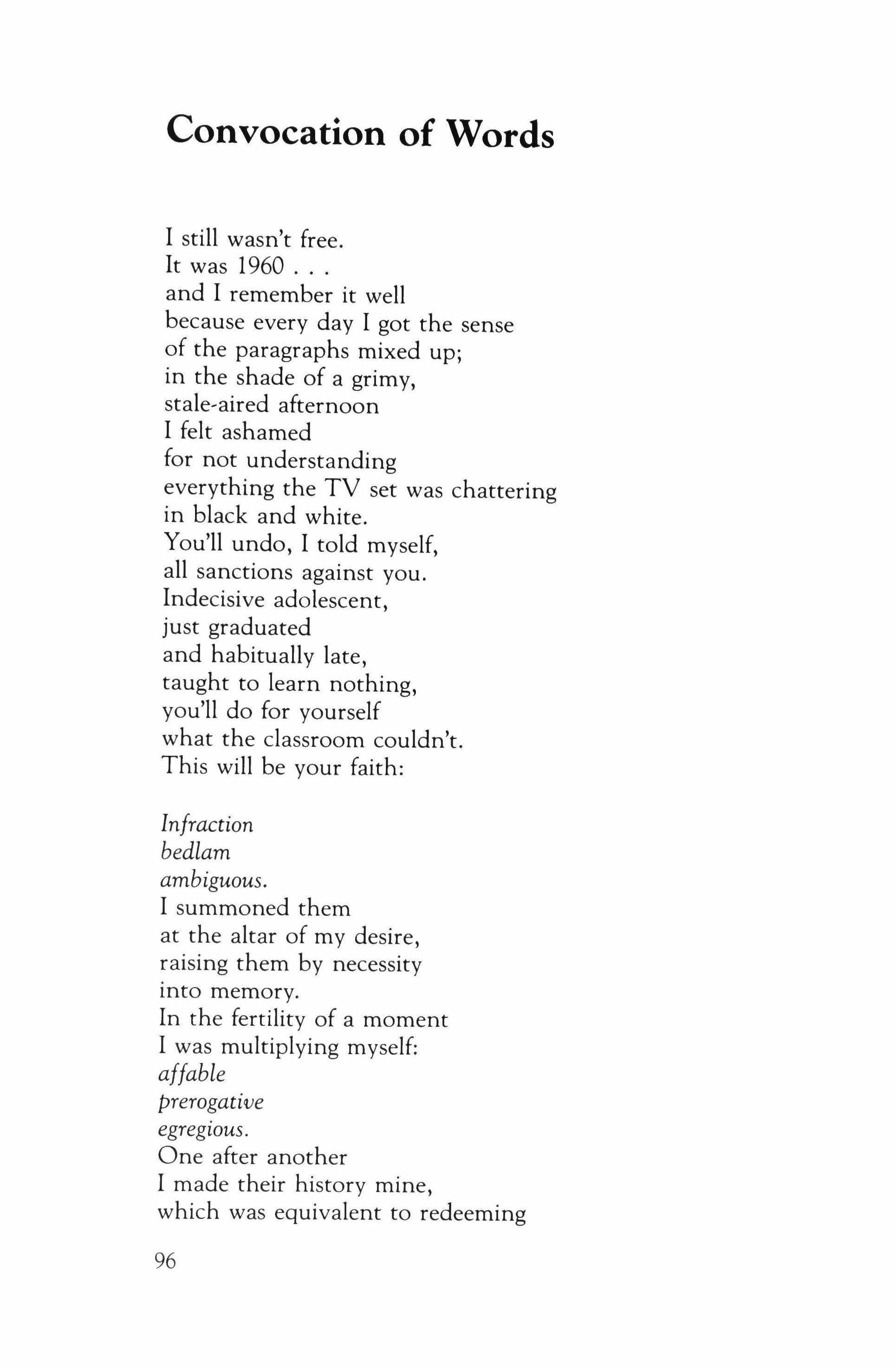
I still wasn't free. It was 1960 and I remember it well because every day I got the sense of the paragraphs mixed up; in the shade of a grimy, stale-aired afternoon I felt ashamed for not understanding everything the TV set was chattering in black and white. You'll undo, I told myself, all sanctions against you. Indecisive adolescent, just graduated and habitually late, taught to learn nothing, you'll do for yourself what the classroom couldn't. This will be your faith: Infraction bedlam ambiguous. I summoned them at the altar of my desire, raising them by necessity into memory. In the fertility of a moment I was multiplying myself: affable prerogative egregious. One after another I made their history mine, which was equivalent to redeeming
96
what was mine: priggish eschew impecunious. Because I turned them into hourly repeated doctrine, suddenly I was not the same as before: assiduous faux pas suffragette.
I descend from them inexhaustibly now, and they are my hereditary offering, trails of living blood on the ever-present paper: exhume querimonious kibitzer.
A constant effort, creating myself in my own image each time I pronounced one of them: postprandial subsequently and finally willing myself to write the fourteen letters of my name and over them the word libertad.
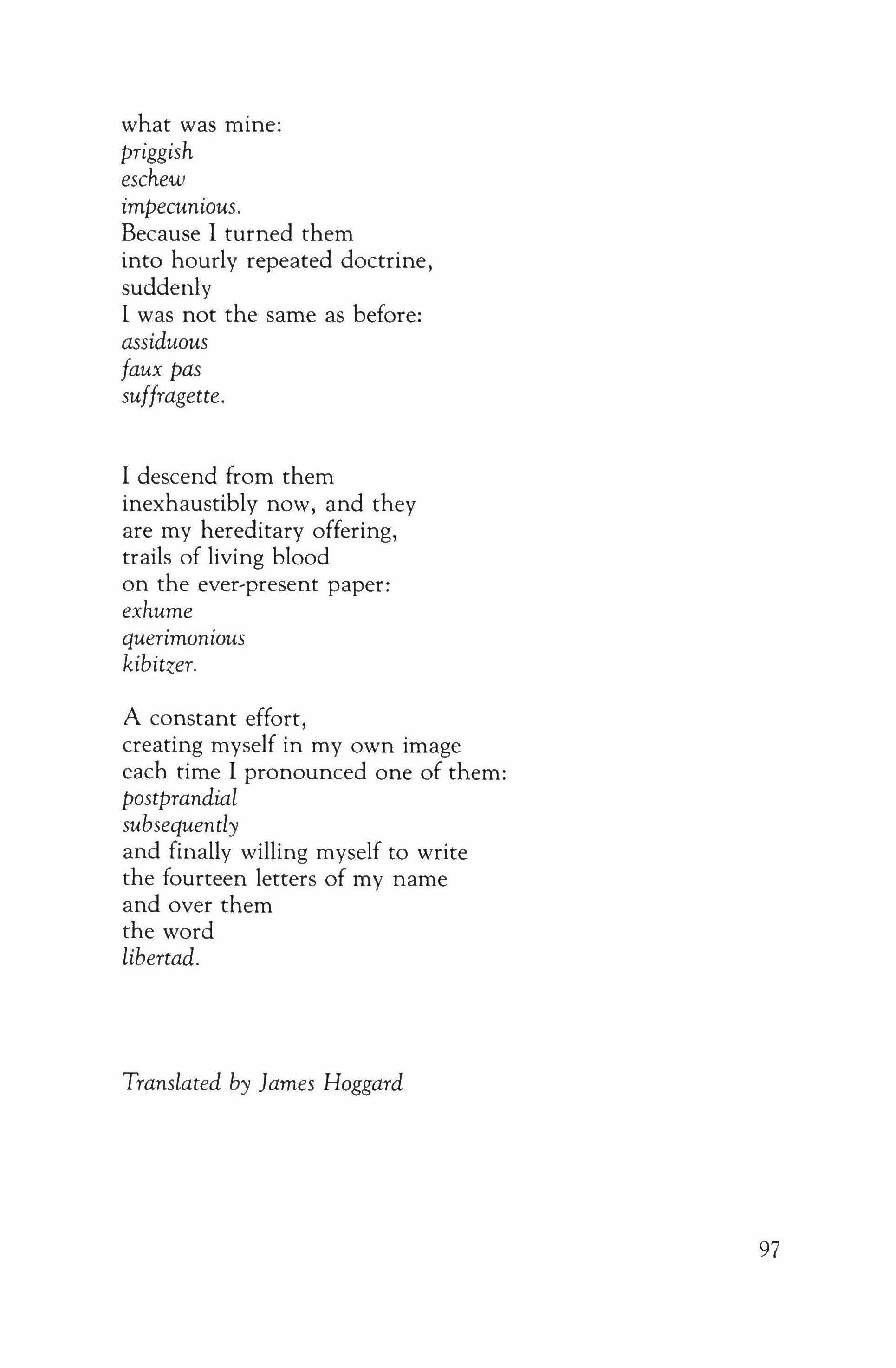 Translated by James Hoggard
Translated by James Hoggard
97
Three Poems
Richard Jones
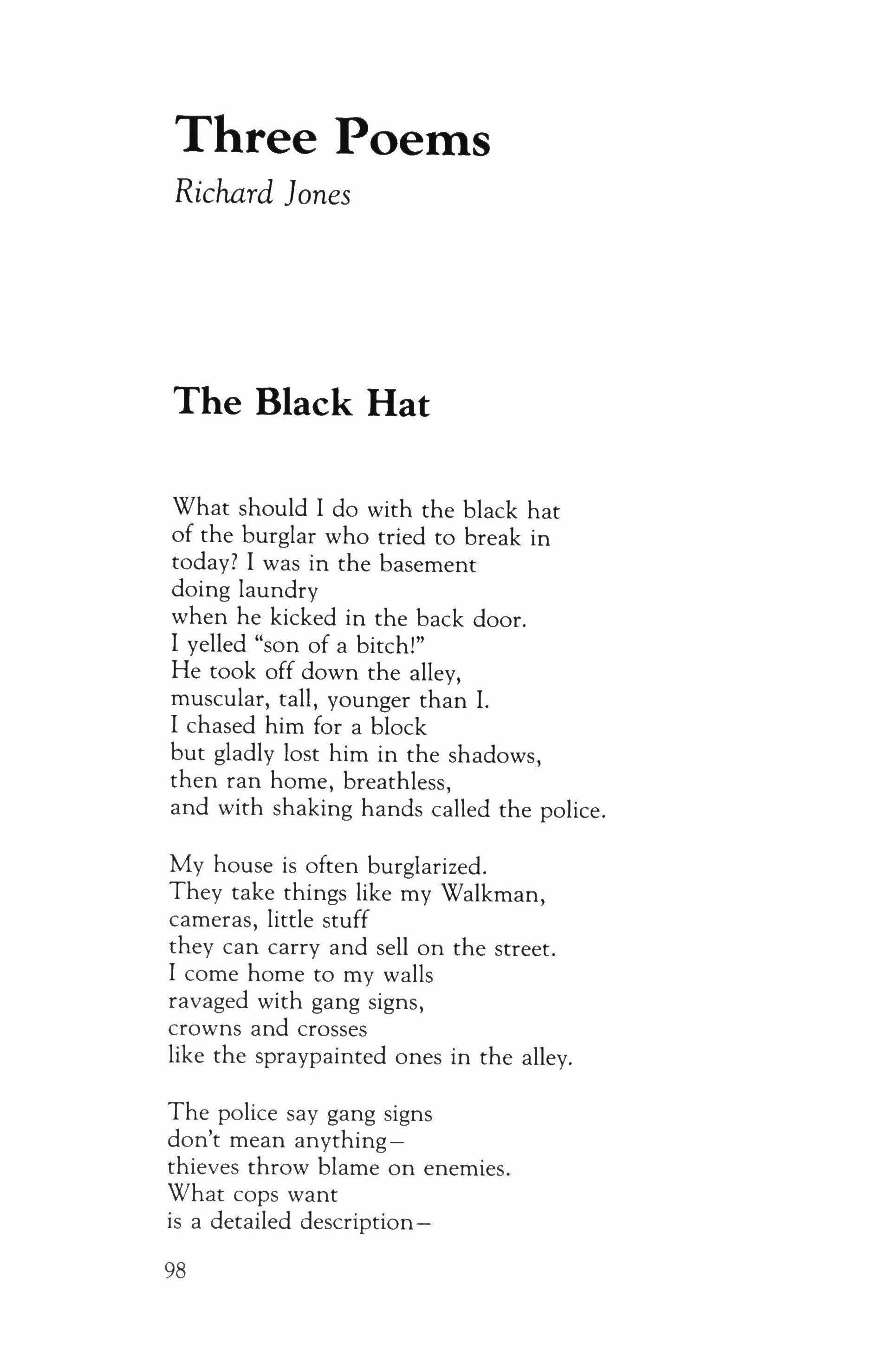
The Black Hat
What should I do with the black hat of the burglar who tried to break in today? I was in the basement doing laundry when he kicked in the back door. I yelled "son of a bitch!" He took off down the alley, muscular, tall, younger than 1. I chased him for a block but gladly lost him in the shadows, then ran home, breathless, and with shaking hands called the police.
My house is often burglarized. They take things like my Walkman, cameras, little stuff they can carry and sell on the street. I come home to my walls ravaged with gang signs, crowns and crosses like the spraypainted ones in the alley.
The police say gang signs don't mean anythingthieves throw blame on enemies. What cops want is a detailed description-
98
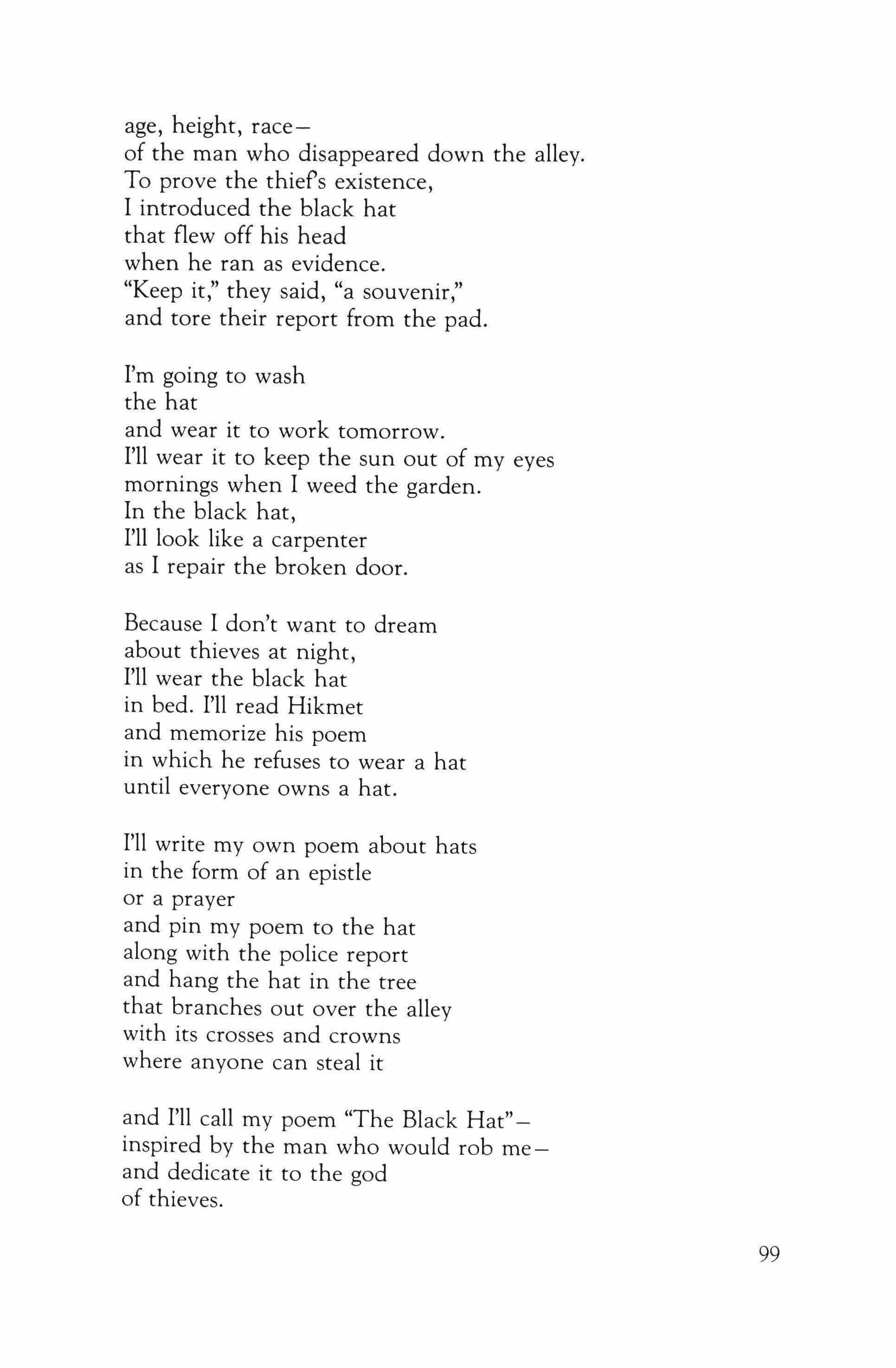
age, height, raceof the man who disappeared down the alley. To prove the thief's existence, I introduced the black hat that flew off his head when he ran as evidence. "Keep it," they said, "a souvenir," and tore their report from the pad.
I'm going to wash the hat and wear it to work tomorrow. I'll wear it to keep the sun out of my eyes mornings when I weed the garden. In the black hat, I'll look like a carpenter as I repair the broken door.
Because I don't want to dream about thieves at night, I'll wear the black hat in bed. I'll read Hikmet and memorize his poem in which he refuses to wear a hat until everyone owns a hat.
I'll write my own poem about hats in the form of an epistle or a prayer and pin my poem to the hat along with the police report and hang the hat in the tree that branches out over the alley with its crosses and crowns where anyone can steal it and I'll call my poem "The Black Hat"inspired by the man who would rob meand dedicate it to the god of thieves.
99
The Siesta
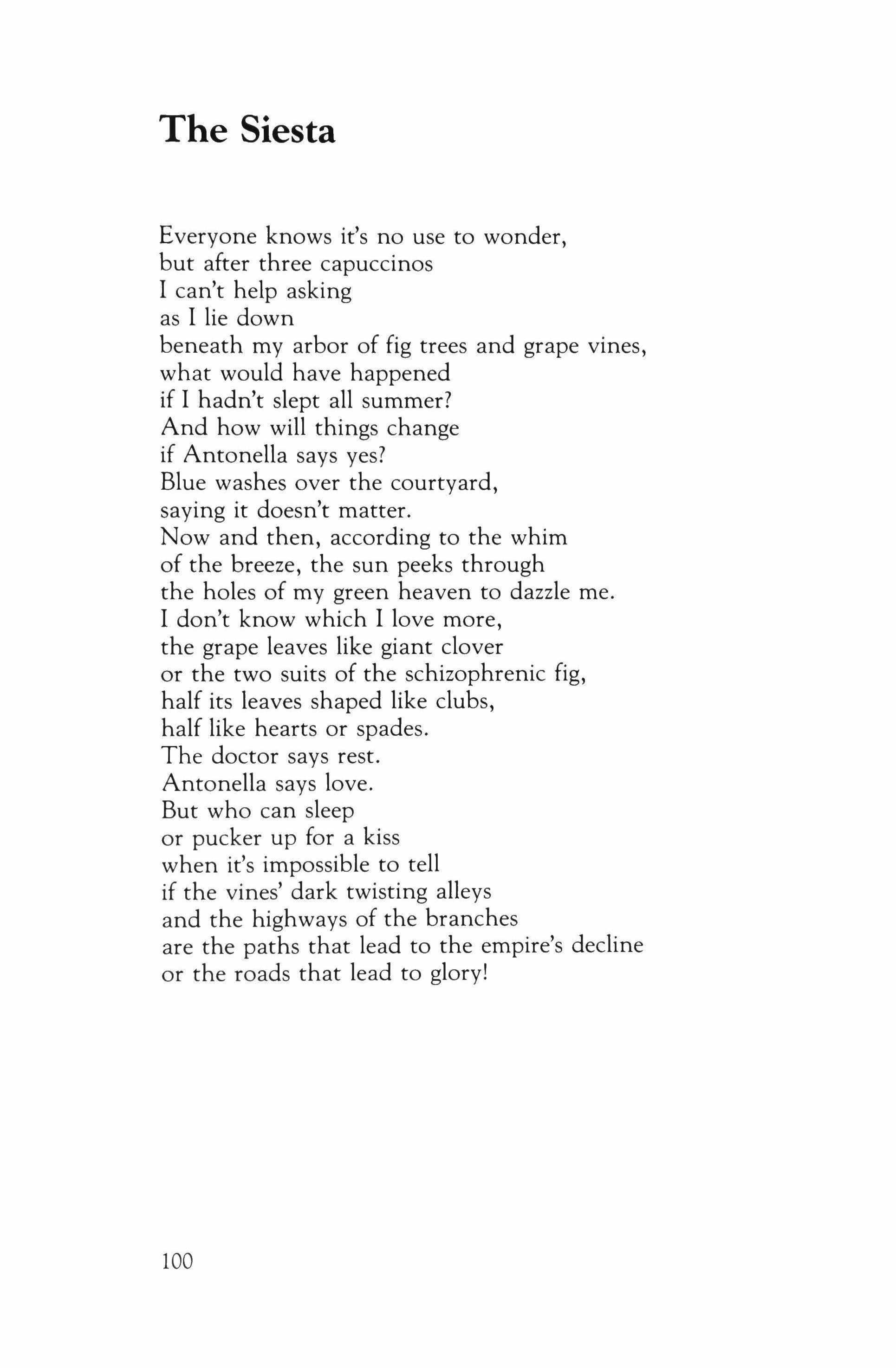
Everyone knows it's no use to wonder, but after three capuccinos
I can't help asking as I lie down beneath my arbor of fig trees and grape vines, what would have happened if I hadn't slept all summer? And how will things change if Antonella says yes? Blue washes over the courtyard, saying it doesn't matter. Now and then, according to the whim of the breeze, the sun peeks through the holes of my green heaven to dazzle me. I don't know which I love more, the grape leaves like giant clover or the two suits of the schizophrenic fig, half its leaves shaped like clubs, half like hearts or spades.
The doctor says rest. Antonella says love. But who can sleep or pucker up for a kiss when it's impossible to tell if the vines' dark twisting alleys and the highways of the branches are the paths that lead to the empire's decline or the roads that lead to glory!
100
Dancing
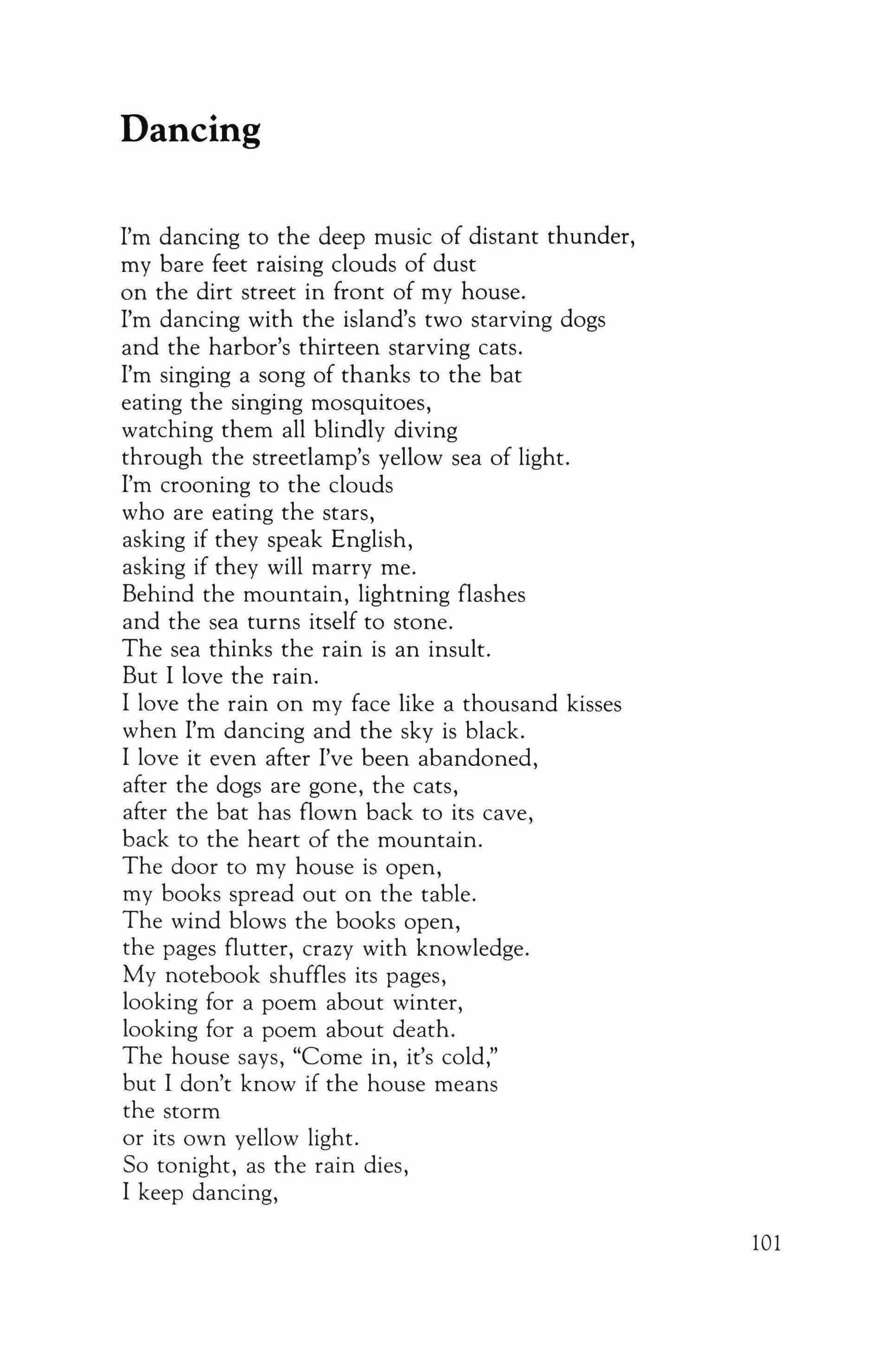
I'm dancing to the deep music of distant thunder, my bare feet raising clouds of dust on the dirt street in front of my house.
I'm dancing with the island's two starving dogs and the harbor's thirteen starving cats.
I'm singing a song of thanks to the bat eating the singing mosquitoes, watching them all blindly diving through the streetlamp's yellow sea of light. I'm crooning to the clouds who are eating the stars, asking if they speak English, asking if they will marry me.
Behind the mountain, lightning flashes and the sea turns itself to stone.
The sea thinks the rain is an insult. But I love the rain.
I love the rain on my face like a thousand kisses when I'm dancing and the sky is black.
I love it even after I've been abandoned, after the dogs are gone, the cats, after the bat has flown back to its cave, back to the heart of the mountain.
The door to my house is open, my books spread out on the table.
The wind blows the books open, the pages flutter, crazy with knowledge. My notebook shuffles its pages, looking for a poem about winter, looking for a poem about death.
The house says, "Come in, it's cold," but I don't know if the house means the storm or its own yellow light.
So tonight, as the rain dies, I keep dancing,
101
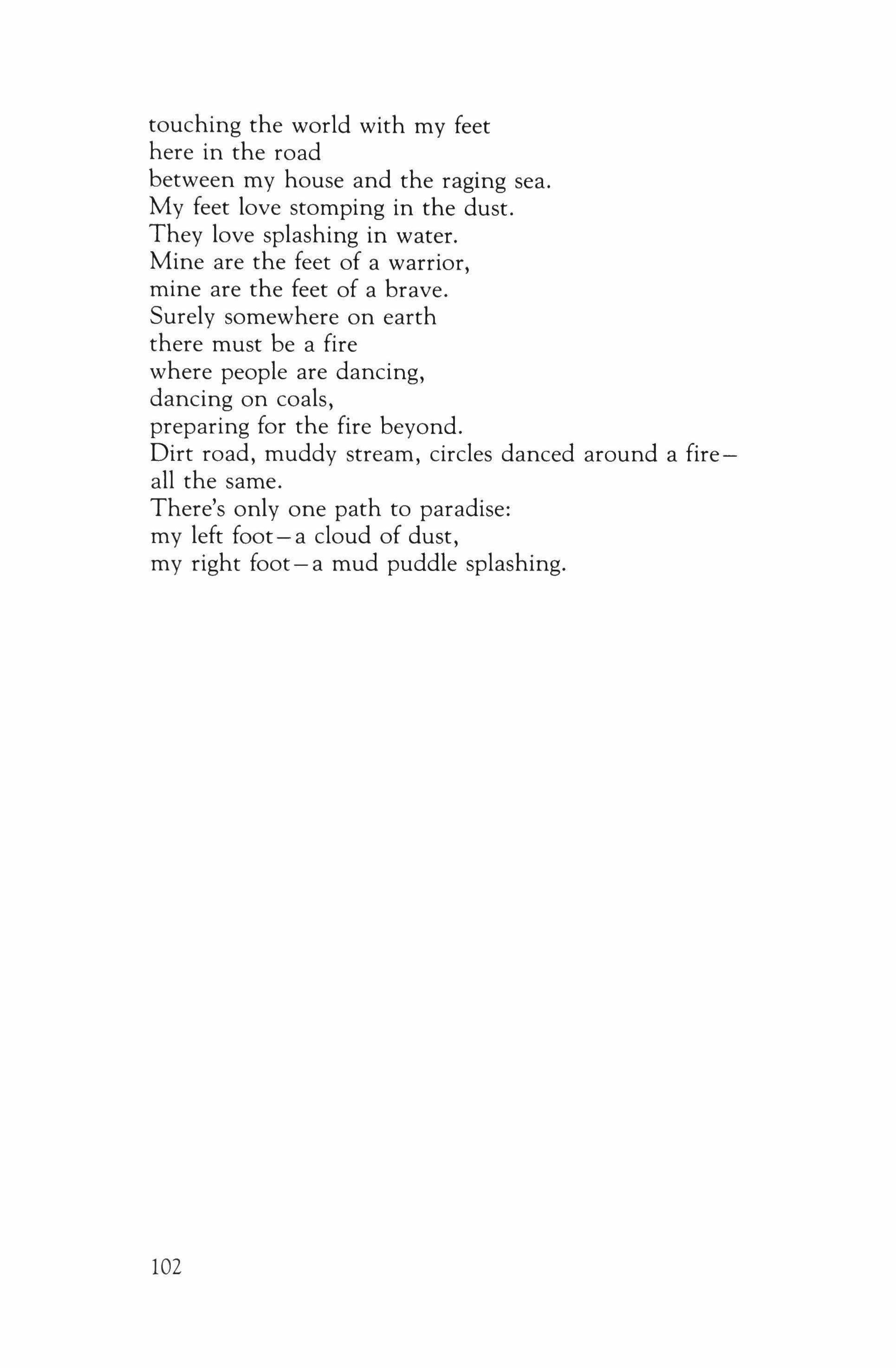
touching the world with my feet here in the road between my house and the raging sea. My feet love stomping in the dust. They love splashing in water.
Mine are the feet of a warrior, mine are the feet of a brave. Surely somewhere on earth there must be a fire where people are dancing, dancing on coals, preparing for the fire beyond. Dirt road, muddy stream, circles danced around a fireall the same.
There's only one path to paradise: my left foot - a cloud of dust, my right foot-a mud puddle splashing.
102
Writing Poetry at the End of the Century: A Letter
Joseph Parisi
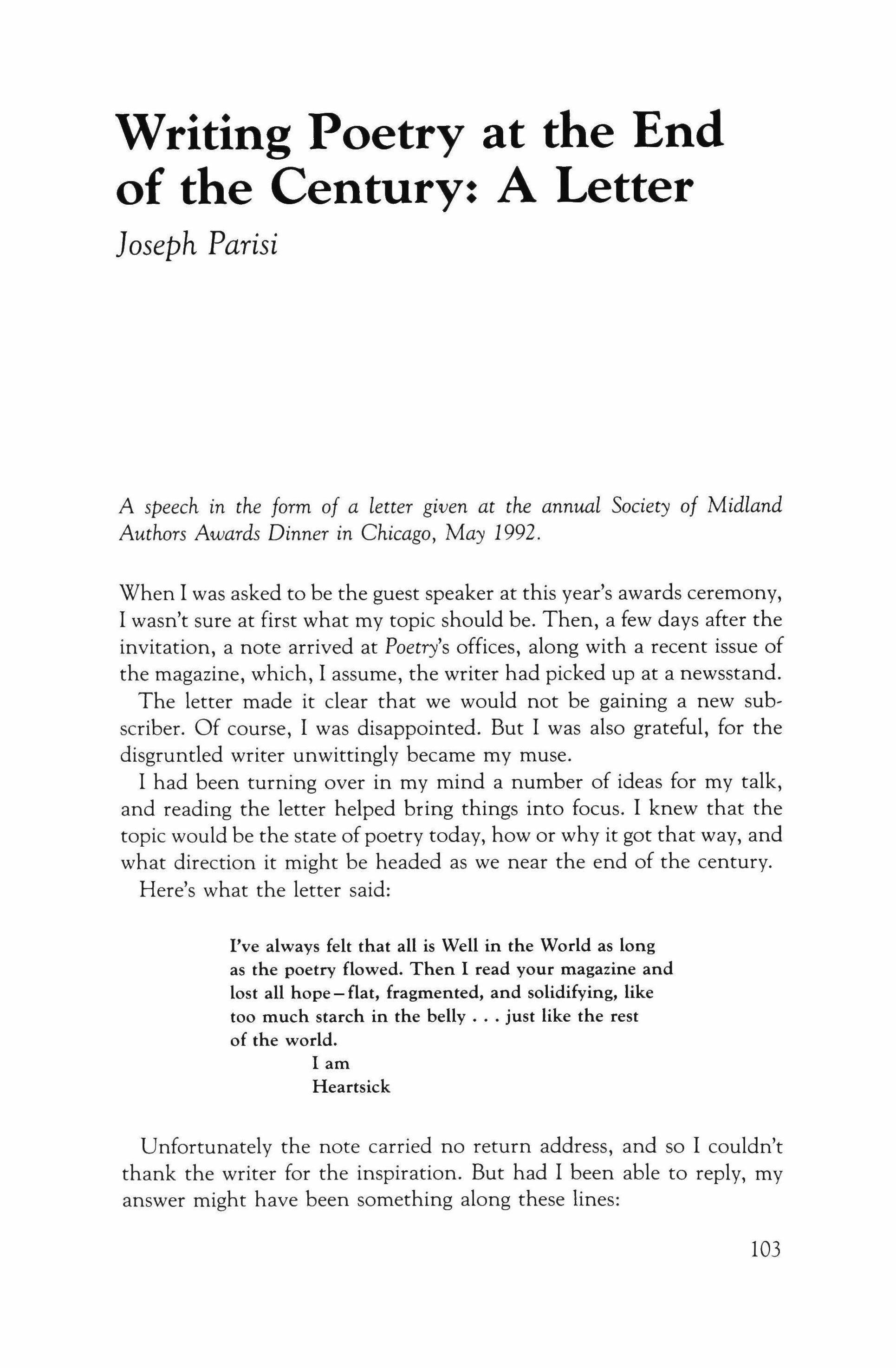
A speech in the form of a letter given at the annual Society of Midland Authors Awards Dinner in Chicago, May 1992.
When I was asked to be the guest speaker at this year's awards ceremony, I wasn't sure at first what my topic should be. Then, a few days after the invitation, a note arrived at Poetry's offices, along with a recent issue of the magazine, which, I assume, the writer had picked up at a newsstand. The letter made it clear that we would not be gaining a new subscriber. Of course, I was disappointed. But I was also grateful, for the disgruntled writer unwittingly became my muse.
I had been turning over in my mind a number of ideas for my talk, and reading the letter helped bring things into focus. I knew that the topic would be the state of poetry today, how or why it got that way, and what direction it might be headed as we near the end of the century.
Here's what the letter said:
I've always felt that all is Well in the World as long as the poetry flowed. Then I read your magazine and lost all hope - flat, fragmented, and solidifying, like too much starch in the belly just like the rest of the world.
lam Heartsick
Unfortunately the note carried no return address, and so I couldn't thank the writer for the inspiration. But had I been able to reply, my answer might have been something along these lines:
103
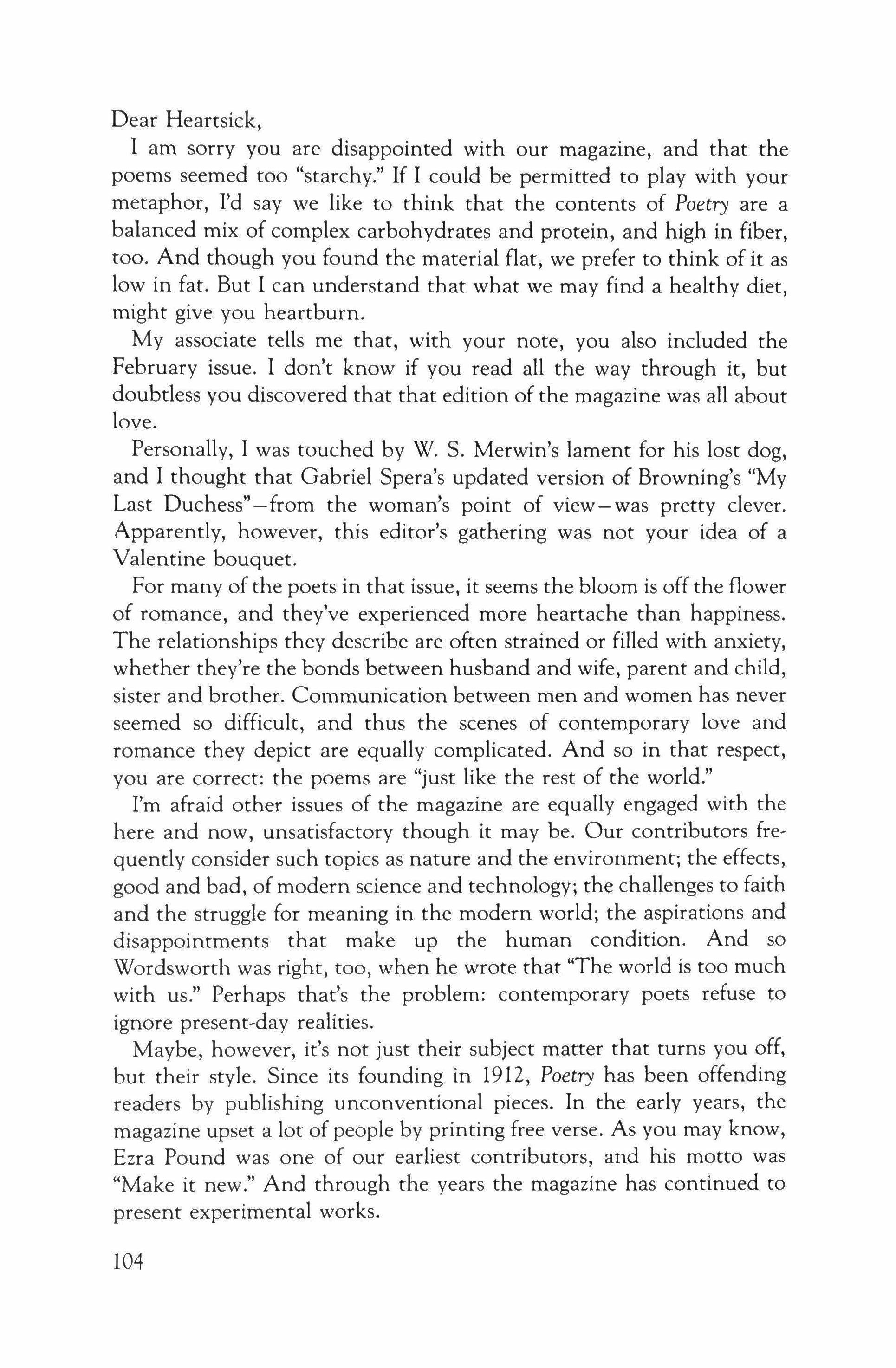
Dear Heartsick,
I am sorry you are disappointed with our magazine, and that the poems seemed too "starchy." If I could be permitted to play with your metaphor, I'd say we like to think that the contents of Poetry are a balanced mix of complex carbohydrates and protein, and high in fiber, too. And though you found the material flat, we prefer to think of it as low in fat. But I can understand that what we may find a healthy diet, might give you heartburn.
My associate tells me that, with your note, you also included the February issue. I don't know if you read all the way through it, but doubtless you discovered that that edition of the magazine was all about love.
Personally, I was touched by W. S. Merwin's lament for his lost dog, and I thought that Gabriel Spera's updated version of Browning's "My Last Duchess" - from the woman's point of view - was pretty clever. Apparently, however, this editor's gathering was not your idea of a Valentine bouquet.
For many of the poets in that issue, it seems the bloom is off the flower of romance, and they've experienced more heartache than happiness. The relationships they describe are often strained or filled with anxiety, whether they're the bonds between husband and wife, parent and child, sister and brother. Communication between men and women has never seemed so difficult, and thus the scenes of contemporary love and romance they depict are equally complicated. And so in that respect, you are correct: the poems are "just like the rest of the world."
I'm afraid other issues of the magazine are equally engaged with the here and now, unsatisfactory though it may be. Our contributors frequently consider such topics as nature and the environment; the effects, good and bad, of modern science and technology; the challenges to faith and the struggle for meaning in the modern world; the aspirations and disappointments that make up the human condition. And so Wordsworth was right, too, when he wrote that "The world is too much with us." Perhaps that's the problem: contemporary poets refuse to ignore present-day realities.
Maybe, however, it's not just their subject matter that turns you off, but their style. Since its founding in 1912, Poetry has been offending readers by publishing unconventional pieces. In the early years, the magazine upset a lot of people by printing free verse. As you may know, Ezra Pound was one of our earliest contributors, and his motto was "Make it new." And through the years the magazine has continued to present experimental works.
104
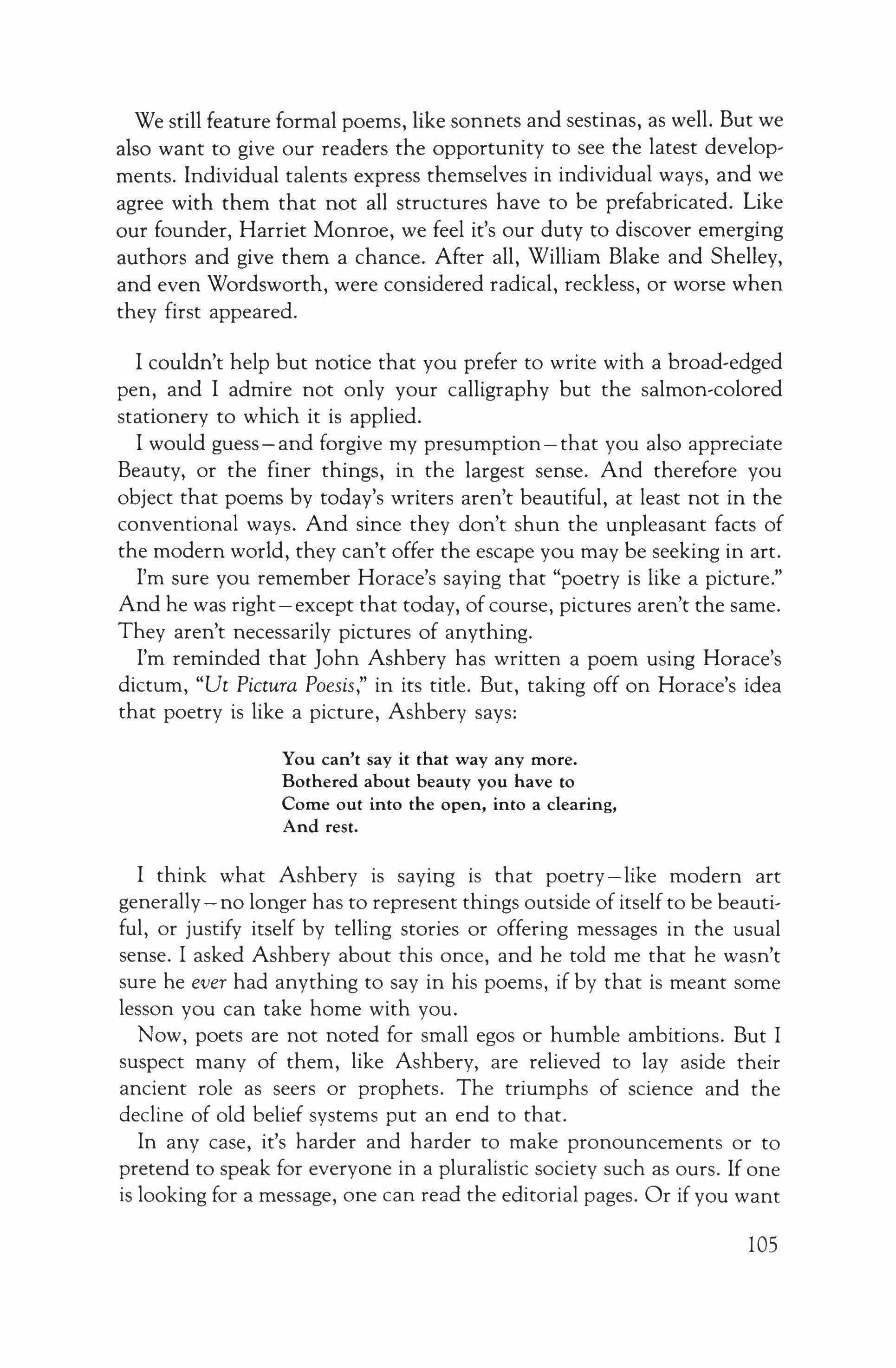
We still feature formal poems, like sonnets and sestinas, as well. But we also want to give our readers the opportunity to see the latest developments. Individual talents express themselves in individual ways, and we agree with them that not all structures have to be prefabricated. Like our founder, Harriet Monroe, we feel it's our duty to discover emerging authors and give them a chance. After all, William Blake and Shelley, and even Wordsworth, were considered radical, reckless, or worse when they first appeared.
I couldn't help but notice that you prefer to write with a broad-edged pen, and I admire not only your calligraphy but the salmon-colored stationery to which it is applied.
I would guess-and forgive my presumption-that you also appreciate Beauty, or the finer things, in the largest sense. And therefore you object that poems by today's writers aren't beautiful, at least not in the conventional ways. And since they don't shun the unpleasant facts of the modern world, they can't offer the escape you may be seeking in art.
I'm sure you remember Horace's saying that "poetry is like a picture." And he was right-except that today, of course, pictures aren't the same. They aren't necessarily pictures of anything.
I'm reminded that John Ashbery has written a poem using Horace's dictum, "Ut Pictura Poesis," in its title. But, taking off on Horace's idea that poetry is like a picture, Ashbery says:
You can't say it that way any more. Bothered about beauty you have to Come out into the open, into a clearing, And rest.
I think what Ashbery is saying is that poetry -like modern art generally - no longer has to represent things outside of itself to be beautiful, or justify itself by telling stories or offering messages in the usual sense. I asked Ashbery about this once, and he told me that he wasn't sure he ever had anything to say in his poems, if by that is meant some lesson you can take home with you.
Now, poets are not noted for small egos or humble ambitions. But I suspect many of them, like Ashbery, are relieved to lay aside their ancient role as seers or prophets. The triumphs of science and the decline of old belief systems put an end to that.
In any case, it's harder and harder to make pronouncements or to pretend to speak for everyone in a pluralistic society such as ours. If one is looking for a message, one can read the editorial pages. Or if you want
105
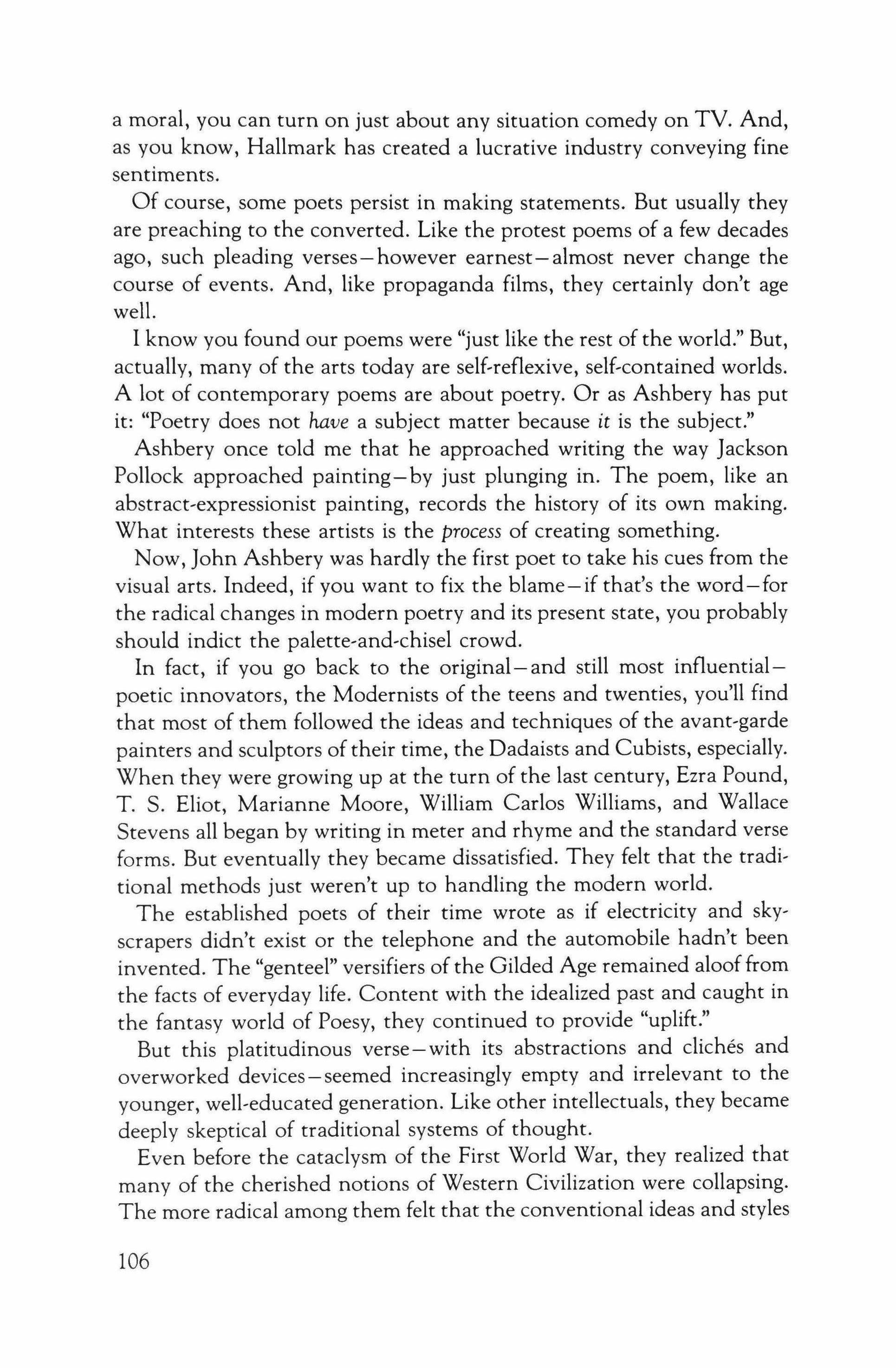
a moral, you can turn on just about any situation comedy on TV. And, as you know, Hallmark has created a lucrative industry conveying fine sentiments.
Of course, some poets persist in making statements. But usually they are preaching to the converted. Like the protest poems of a few decades ago, such pleading verses-however earnest-almost never change the course of events. And, like propaganda films, they certainly don't age well.
I know you found our poems were "just like the rest of the world." But, actually, many of the arts today are self-reflexive, self-contained worlds. A lot of contemporary poems are about poetry. Or as Ashbery has put it: "Poetry does not have a subject matter because it is the subject."
Ashbery once told me that he approached writing the way Jackson Pollock approached painting - by just plunging in. The poem, like an abstract-expressionist painting, records the history of its own making. What interests these artists is the process of creating something.
Now, John Ashbery was hardly the first poet to take his cues from the visual arts. Indeed, if you want to fix the blame-if that's the word-for the radical changes in modern poetry and its present state, you probably should indict the palette-and-chisel crowd.
In fact, if you go back to the original-and still most influentialpoetic innovators, the Modernists of the teens and twenties, you'll find that most of them followed the ideas and techniques of the avant-garde painters and sculptors of their time, the Dadaists and Cubists, especially. When they were growing up at the turn of the last century, Ezra Pound, T. S. Eliot, Marianne Moore, William Carlos Williams, and Wallace Stevens all began by writing in meter and rhyme and the standard verse forms. But eventually they became dissatisfied. They felt that the traditional methods just weren't up to handling the modern world.
The established poets of their time wrote as if electricity and skyscrapers didn't exist or the telephone and the automobile hadn't been invented. The "genteel" versifiers of the Gilded Age remained aloof from the facts of everyday life. Content with the idealized past and caught in the fantasy world of Poesy, they continued to provide "uplift."
But this platitudinous verse-with its abstractions and cliches and overworked devices - seemed increasingly empty and irrelevant to the younger, well-educated generation. Like other intellectuals, they became deeply skeptical of traditional systems of thought.
Even before the cataclysm of the First World War, they realized that many of the cherished notions of Western Civilization were collapsing. The more radical among them felt that the conventional ideas and styles
106
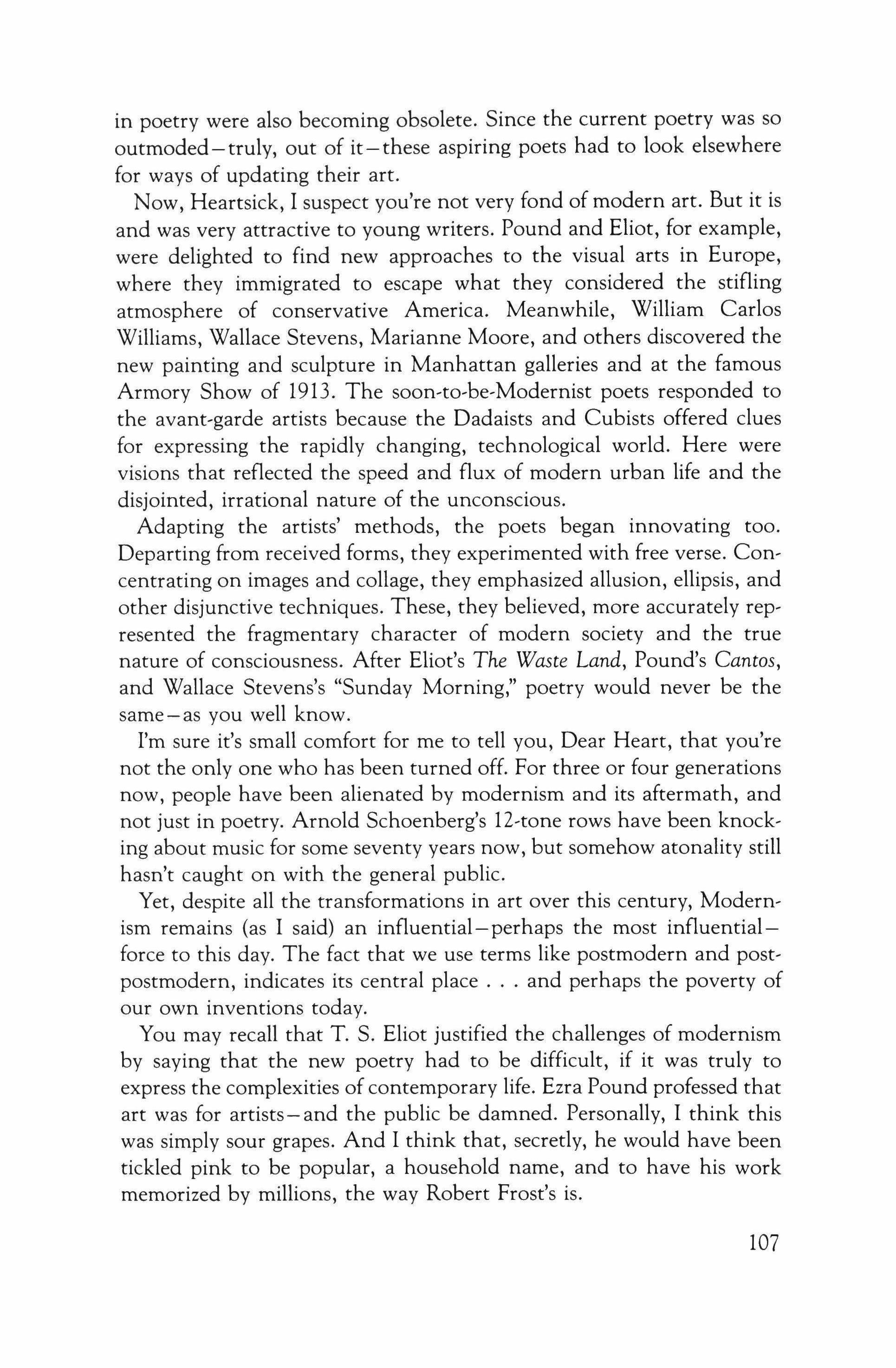
in poetry were also becoming obsolete. Since the current poetry was so outmoded-truly, out of it-these aspiring poets had to look elsewhere for ways of updating their art.
Now, Heartsick, I suspect you're not very fond of modern art. But it is and was very attractive to young writers. Pound and Eliot, for example, were delighted to find new approaches to the visual arts in Europe, where they immigrated to escape what they considered the stifling atmosphere of conservative America. Meanwhile, William Carlos Williams, Wallace Stevens, Marianne Moore, and others discovered the new painting and sculpture in Manhattan galleries and at the famous Armory Show of 1913. The soon-to-be-Modernist poets responded to the avant-garde artists because the Dadaists and Cubists offered clues for expressing the rapidly changing, technological world. Here were visions that reflected the speed and flux of modern urban life and the disjointed, irrational nature of the unconscious.
Adapting the artists' methods, the poets began innovating too. Departing from received forms, they experimented with free verse. Concentrating on images and collage, they emphasized allusion, ellipsis, and other disjunctive techniques. These, they believed, more accurately represented the fragmentary character of modern society and the true nature of consciousness. After Eliot's The Waste Land, Pound's Cantos, and Wallace Stevens's "Sunday Morning," poetry would never be the same - as you well know.
I'm sure it's small comfort for me to tell you, Dear Heart, that you're not the only one who has been turned off. For three or four generations now, people have been alienated by modernism and its aftermath, and not just in poetry. Arnold Schoenberg's 12-tone rows have been knocking about music for some seventy years now, but somehow atonality still hasn't caught on with the general public.
Yet, despite all the transformations in art over this century, Modernism remains (as I said) an influential-perhaps the most influentialforce to this day. The fact that we use terms like postmodern and postpostmodern, indicates its central place and perhaps the poverty of our own inventions today.
You may recall that T. S. Eliot justified the challenges of modernism by saying that the new poetry had to be difficult, if it was truly to express the complexities of contemporary life. Ezra Pound professed that art was for artists-and the public be damned. Personally, I think this was simply sour grapes. And I think that, secretly, he would have been tickled pink to be popular, a household name, and to have his work memorized by millions, the way Robert Frost's is.
107
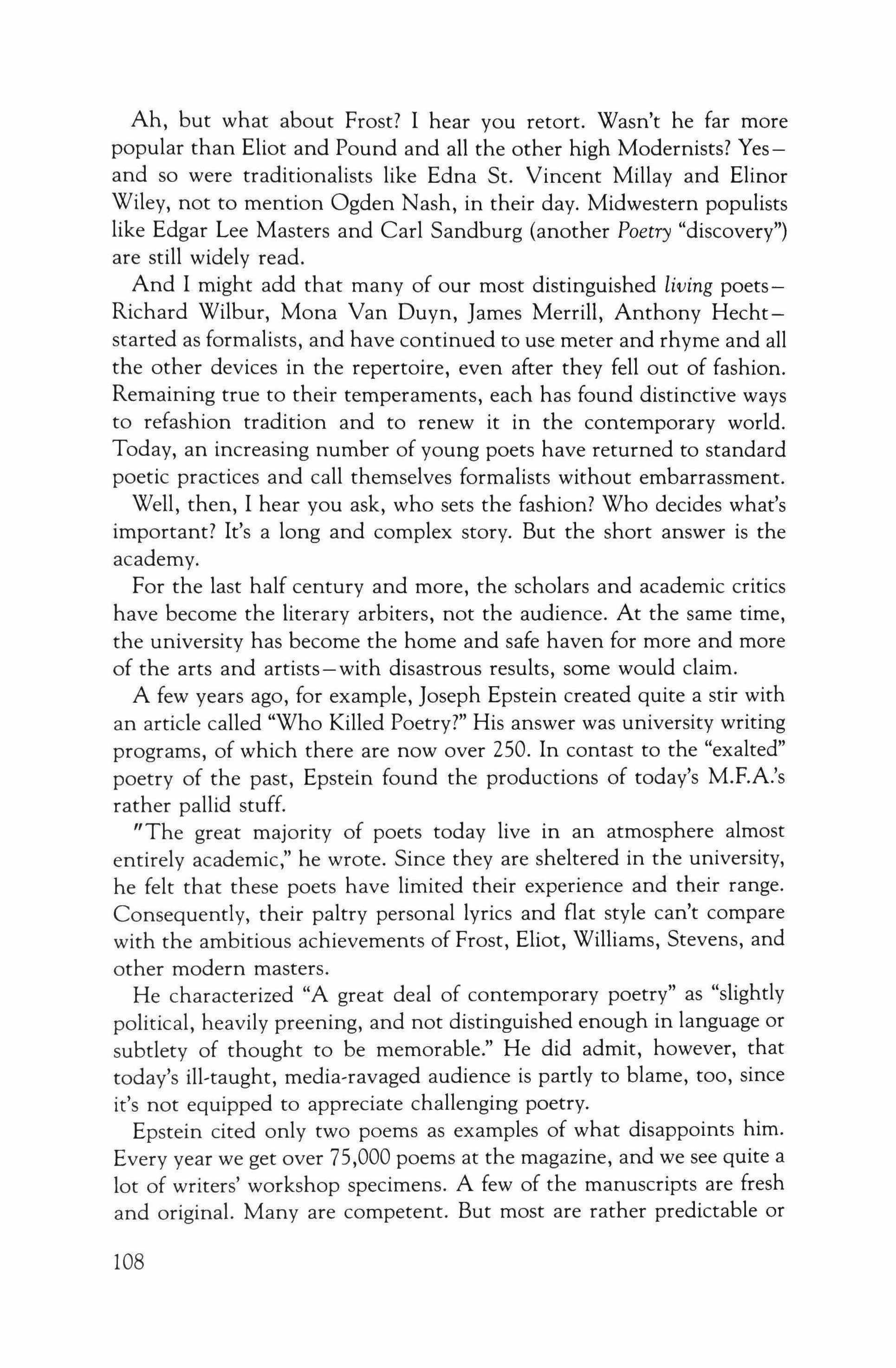
Ah, but what about Frost? I hear you retort. Wasn't he far more popular than Eliot and Pound and all the other high Modernists? Yesand so were traditionalists like Edna St. Vincent Millay and Elinor Wiley, not to mention Ogden Nash, in their day. Midwestern populists like Edgar Lee Masters and Carl Sandburg (another Poetry "discovery") are still widely read.
And I might add that many of our most distinguished living poetsRichard Wilbur, Mona Van Duyn, James Merrill, Anthony Hechtstarted as formalists, and have continued to use meter and rhyme and all the other devices in the repertoire, even after they fell out of fashion.
Remaining true to their temperaments, each has found distinctive ways to refashion tradition and to renew it in the contemporary world. Today, an increasing number of young poets have returned to standard poetic practices and call themselves formalists without embarrassment.
Well, then, I hear you ask, who sets the fashion? Who decides what's important? It's a long and complex story. But the short answer is the academy.
For the last half century and more, the scholars and academic critics have become the literary arbiters, not the audience. At the same time, the university has become the home and safe haven for more and more of the arts and artists-with disastrous results, some would claim.
A few years ago, for example, Joseph Epstein created quite a stir with an article called "Who Killed Poetry?" His answer was university writing programs, of which there are now over 250. In contast to the "exalted" poetry of the past, Epstein found the productions of today's M.F.A.'s rather pallid stuff.
"The great majority of poets today live in an atmosphere almost entirely academic," he wrote. Since they are sheltered in the university, he felt that these poets have limited their experience and their range. Consequently, their paltry personal lyrics and flat style can't compare with the ambitious achievements of Frost, Eliot, Williams, Stevens, and other modern masters.
He characterized "A great deal of contemporary poetry" as "slightly political, heavily preening, and not distinguished enough in language or subtlety of thought to be memorable." He did admit, however, that today's ill-taught, media-ravaged audience is partly to blame, too, since it's not equipped to appreciate challenging poetry.
Epstein cited only two poems as examples of what disappoints him. Every year we get over 75,000 poems at the magazine, and we see quite a lot of writers' workshop specimens. A few of the manuscripts are fresh and original. Many are competent. But most are rather predictable or
108
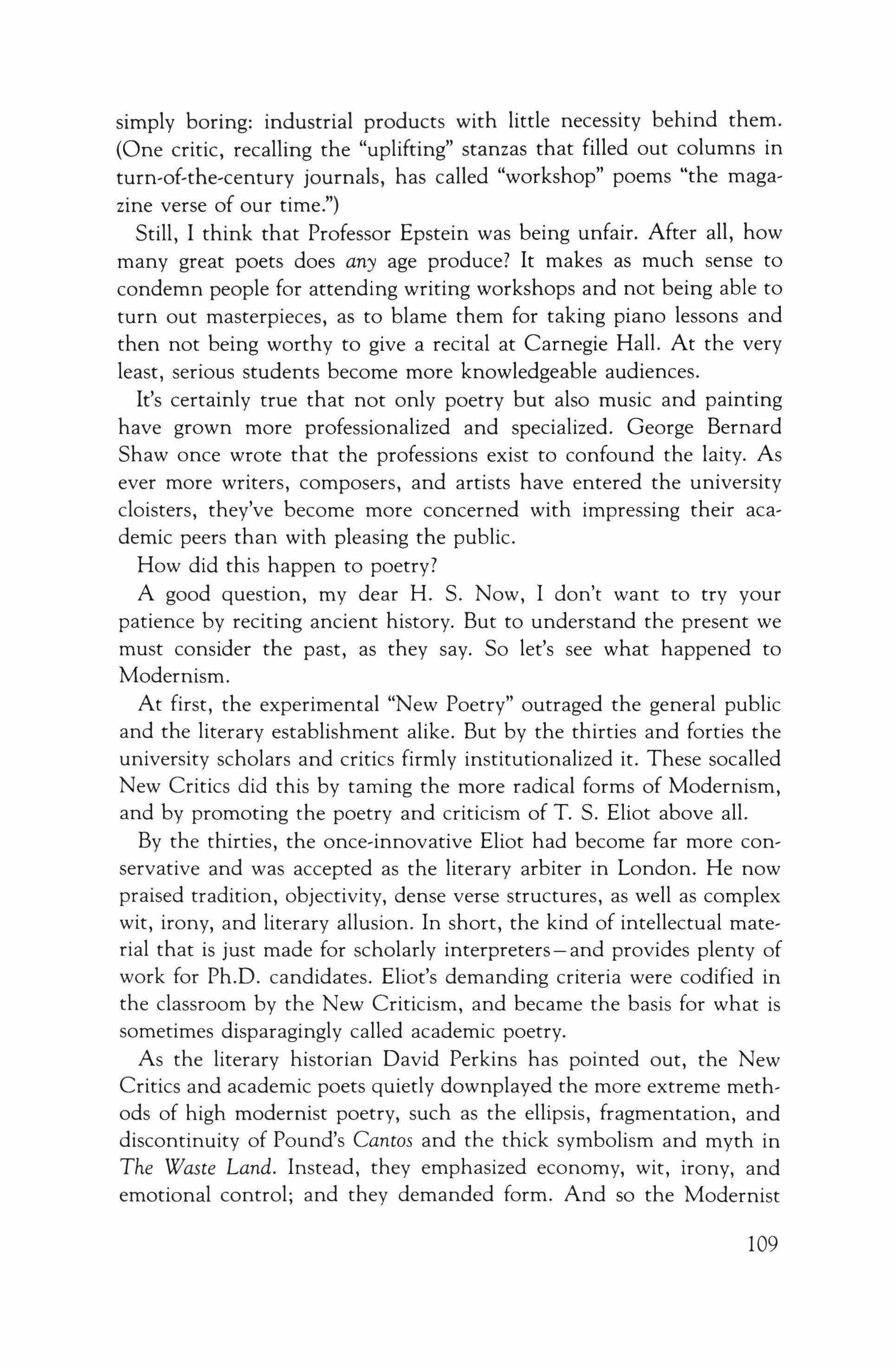
simply boring: industrial products with little necessity behind them. (One critic, recalling the "uplifting" stanzas that filled out columns in turn-of-the-century journals, has called "workshop" poems "the magazine verse of our time.")
Still, I think that Professor Epstein was being unfair. After all, how many great poets does any age produce? It makes as much sense to condemn people for attending writing workshops and not being able to turn out masterpieces, as to blame them for taking piano lessons and then not being worthy to give a recital at Carnegie Hall. At the very least, serious students become more knowledgeable audiences.
It's certainly true that not only poetry but also music and painting have grown more professionalized and specialized. George Bernard Shaw once wrote that the professions exist to confound the laity. As ever more writers, composers, and artists have entered the university cloisters, they've become more concerned with impressing their academic peers than with pleasing the public.
How did this happen to poetry?
A good question, my dear H. S. Now, I don't want to try your patience by reciting ancient history. But to understand the present we must consider the past, as they say. So let's see what happened to Modernism.
At first, the experimental "New Poetry" outraged the general public and the literary establishment alike. But by the thirties and forties the university scholars and critics firmly institutionalized it. These socalled New Critics did this by taming the more radical forms of Modernism, and by promoting the poetry and criticism of T. S. Eliot above all.
By the thirties, the once-innovative Eliot had become far more conservative and was accepted as the literary arbiter in London. He now praised tradition, objectivity, dense verse structures, as well as complex wit, irony, and literary allusion. In short, the kind of intellectual material that is just made for scholarly interpreters- and provides plenty of work for Ph.D. candidates. Eliot's demanding criteria were codified in the classroom by the New Criticism, and became the basis for what is sometimes disparagingly called academic poetry.
As the literary historian David Perkins has pointed out, the New Critics and academic poets quietly downplayed the more extreme methods of high modernist poetry, such as the ellipsis, fragmentation, and discontinuity of Pound's Cantos and the thick symbolism and myth in The Waste Land. Instead, they emphasized economy, wit, irony, and emotional control; and they demanded form. And so the Modernist
109
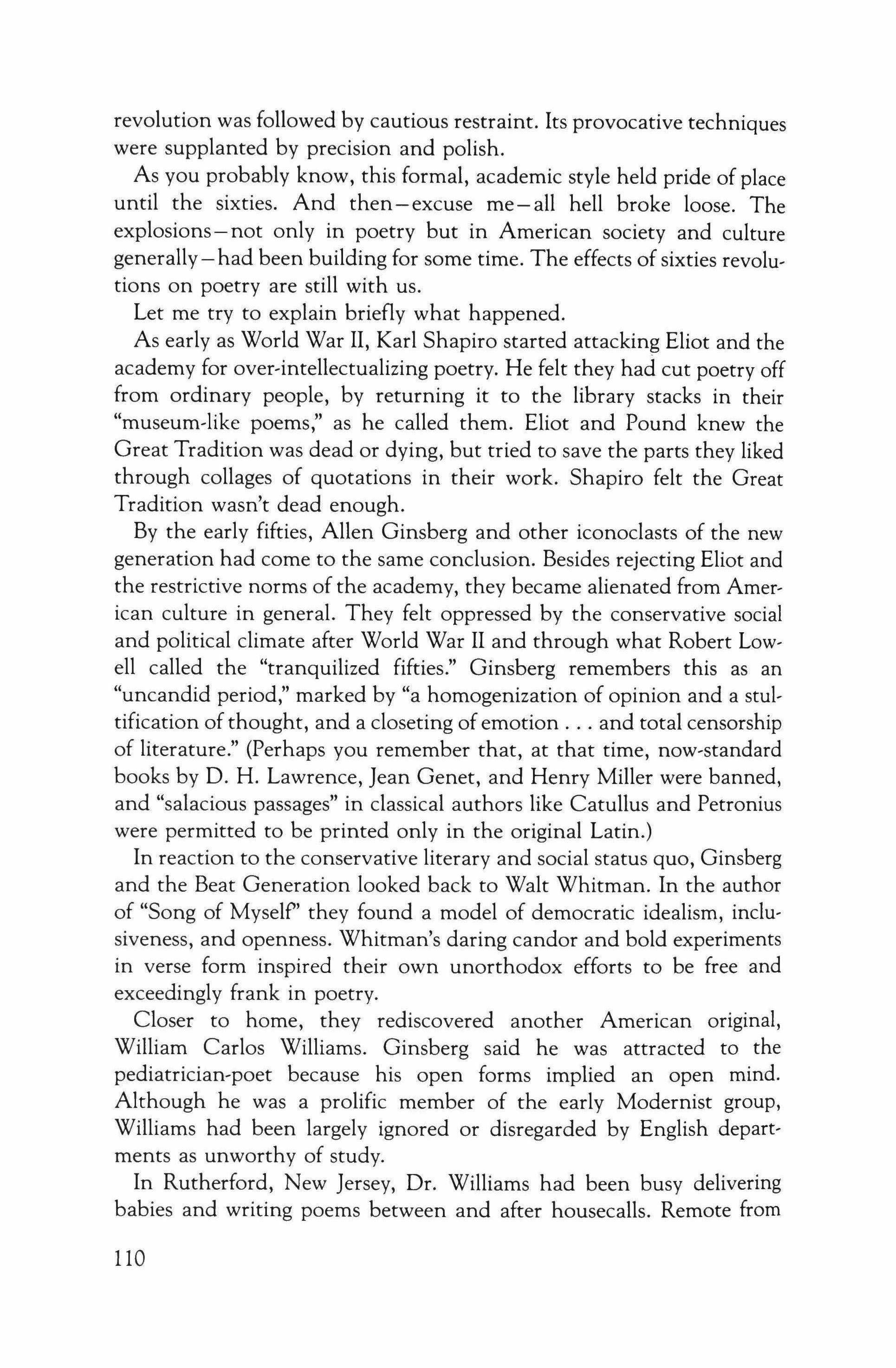
revolution was followed by cautious restraint. Its provocative techniques were supplanted by precision and polish.
As you probably know, this formal, academic style held pride of place until the sixties. And then-excuse me-all hell broke loose. The explosions-not only in poetry but in American society and culture generally - had been building for some time. The effects of sixties revolutions on poetry are still with us.
Let me try to explain briefly what happened.
As early as World War II, Karl Shapiro started attacking Eliot and the academy for over-intellectualizing poetry. He felt they had cut poetry off from ordinary people, by returning it to the library stacks in their "museum-like poems," as he called them. Eliot and Pound knew the Great Tradition was dead or dying, but tried to save the parts they liked through collages of quotations in their work. Shapiro felt the Great Tradition wasn't dead enough.
By the early fifties, Allen Ginsberg and other iconoclasts of the new generation had come to the same conclusion. Besides rejecting Eliot and the restrictive norms of the academy, they became alienated from American culture in general. They felt oppressed by the conservative social and political climate after World War II and through what Robert Lowell called the "tranquilized fifties." Ginsberg remembers this as an "uncandid period," marked by "a homogenization of opinion and a stultification of thought, and a closeting of emotion and total censorship of literature." (Perhaps you remember that, at that time, now-standard books by D. H. Lawrence, Jean Genet, and Henry Miller were banned, and "salacious passages" in classical authors like Catullus and Petronius were permitted to be printed only in the original Latin.)
In reaction to the conservative literary and social status quo, Ginsberg and the Beat Generation looked back to Walt Whitman. In the author of "Song of Myself" they found a model of democratic idealism, inclusiveness, and openness. Whitman's daring candor and bold experiments in verse form inspired their own unorthodox efforts to be free and exceedingly frank in poetry.
Closer to home, they rediscovered another American original, William Carlos Williams. Ginsberg said he was attracted to the pediatrician-poet because his open forms implied an open mind. Although he was a prolific member of the early Modernist group, Williams had been largely ignored or disregarded by English departments as unworthy of study.
In Rutherford, New Jersey, Dr. Williams had been busy delivering babies and writing poems between and after housecalls. Remote from
110
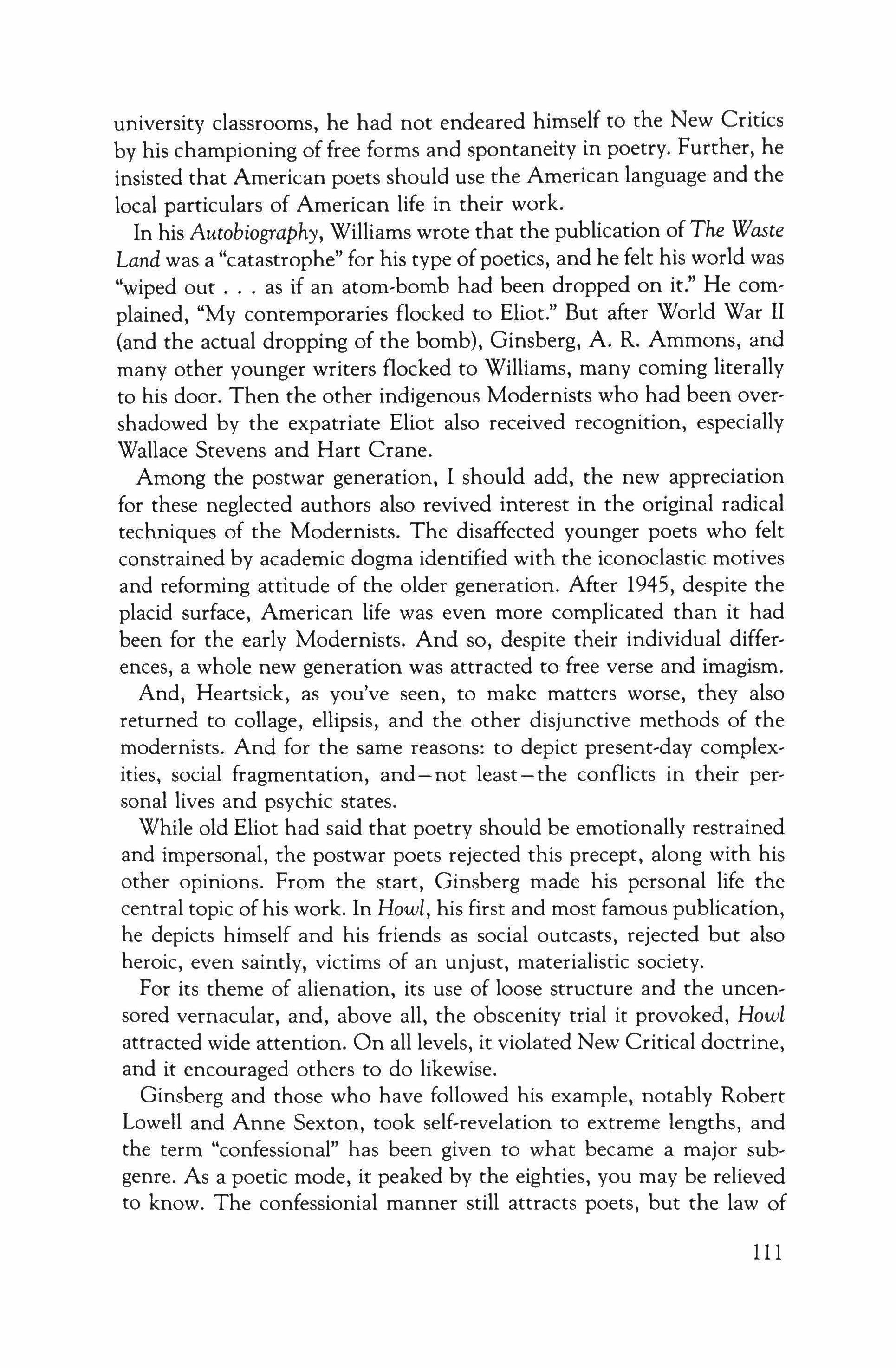
university classrooms, he had not endeared himself to the New Critics by his championing of free forms and spontaneity in poetry. Further, he insisted that American poets should use the American language and the local particulars of American life in their work.
In his Autobiography, Williams wrote that the publication of The Waste Land was a "catastrophe" for his type ofpoetics, and he felt his world was "wiped out as if an atom-bomb had been dropped on it." He complained, "My contemporaries flocked to Eliot." But after World War 11 (and the actual dropping of the bomb), Ginsberg, A. R. Ammons, and many other younger writers flocked to Williams, many coming literally to his door. Then the other indigenous Modernists who had been overshadowed by the expatriate Eliot also received recognition, especially Wallace Stevens and Hart Crane.
Among the postwar generation, I should add, the new appreciation for these neglected authors also revived interest in the original radical techniques of the Modernists. The disaffected younger poets who felt constrained by academic dogma identified with the iconoclastic motives and reforming attitude of the older generation. After 1945, despite the placid surface, American life was even more complicated than it had been for the early Modernists. And so, despite their individual differences, a whole new generation was attracted to free verse and imagism.
And, Heartsick, as you've seen, to make matters worse, they also returned to collage, ellipsis, and the other disjunctive methods of the modernists. And for the same reasons: to depict present-day complexities, social fragmentation, and - not least - the conflicts in their personal lives and psychic states.
While old Eliot had said that poetry should be emotionally restrained and impersonal, the postwar poets rejected this precept, along with his other opinions. From the start, Ginsberg made his personal life the central topic of his work. In Howl, his first and most famous publication, he depicts himself and his friends as social outcasts, rejected but also heroic, even saintly, victims of an unjust, materialistic society.
For its theme of alienation, its use of loose structure and the uncensored vernacular, and, above all, the obscenity trial it provoked, Howl attracted wide attention. On all levels, it violated New Critical doctrine, and it encouraged others to do likewise.
Ginsberg and those who have followed his example, notably Robert Lowell and Anne Sexton, took self-revelation to extreme lengths, and the term "confessional" has been given to what became a major subgenre. As a poetic mode, it peaked by the eighties, you may be relieved to know. The confessionial manner still attracts poets, but the law of
111
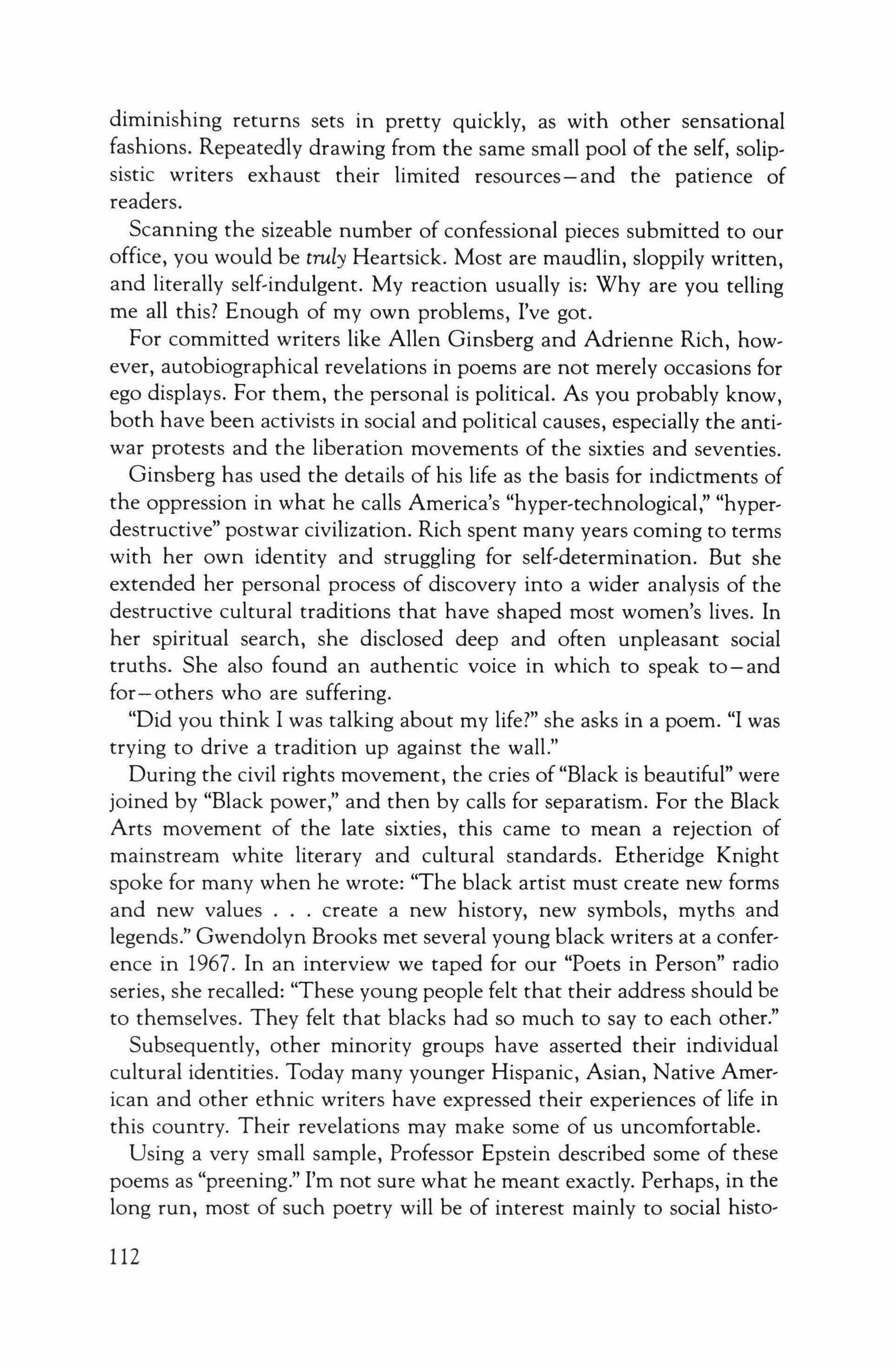
diminishing returns sets in pretty quickly, as with other sensational fashions. Repeatedly drawing from the same small pool of the self, solipsistic writers exhaust their limited resources-and the patience of readers.
Scanning the sizeable number of confessional pieces submitted to our office, you would be truly Heartsick. Most are maudlin, sloppily written, and literally self-indulgent. My reaction usually is: Why are you telling me all this? Enough of my own problems, I've got.
For committed writers like Allen Ginsberg and Adrienne Rich, however, autobiographical revelations in poems are not merely occasions for ego displays. For them, the personal is political. As you probably know, both have been activists in social and political causes, especially the antiwar protests and the liberation movements of the sixties and seventies.
Ginsberg has used the details of his life as the basis for indictments of the oppression in what he calls America's "hyper-technological," "hyperdestructive" postwar civilization. Rich spent many years coming to terms with her own identity and struggling for self-determination. But she extended her personal process of discovery into a wider analysis of the destructive cultural traditions that have shaped most women's lives. In her spiritual search, she disclosed deep and often unpleasant social truths. She also found an authentic voice in which to speak to-and for-others who are suffering.
"Did you think I was talking about my life?" she asks in a poem. "I was trying to drive a tradition up against the wall."
During the civil rights movement, the cries of "Black is beautiful" were joined by "Black power," and then by calls for separatism. For the Black Arts movement of the late sixties, this came to mean a rejection of mainstream white literary and cultural standards. Etheridge Knight spoke for many when he wrote: "The black artist must create new forms and new values create a new history, new symbols, myths and legends." Gwendolyn Brooks met several young black writers at a conference in 1967. In an interview we taped for our "Poets in Person" radio series, she recalled: "These young people felt that their address should be to themselves. They felt that blacks had so much to say to each other."
Subsequently, other minority groups have asserted their individual cultural identities. Today many younger Hispanic, Asian, Native American and other ethnic writers have expressed their experiences of life in this country. Their revelations may make some of us uncomfortable.
Using a very small sample, Professor Epstein described some of these poems as "preening." I'm not sure what he meant exactly. Perhaps, in the long run, most of such poetry will be of interest mainly to social histo-
112
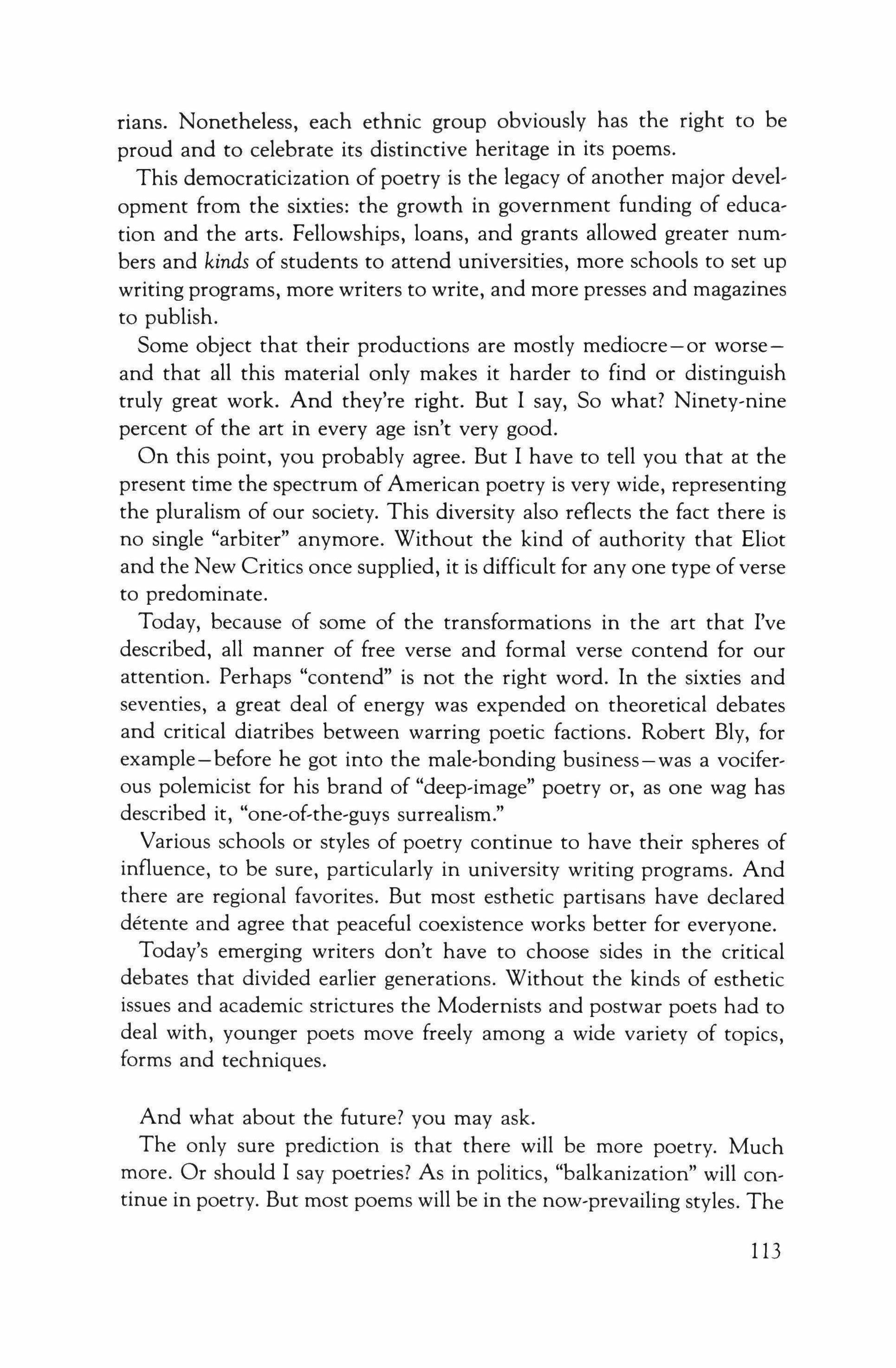
rians. Nonetheless, each ethnic group obviously has the right to be proud and to celebrate its distinctive heritage in its poems.
This democraticization of poetry is the legacy of another major development from the sixties: the growth in government funding of education and the arts. Fellowships, loans, and grants allowed greater numbers and kinds of students to attend universities, more schools to set up writing programs, more writers to write, and more presses and magazines to publish.
Some object that their productions are mostly mediocre-or worseand that all this material only makes it harder to find or distinguish truly great work. And they're right. But I say, So what? Ninety-nine percent of the art in every age isn't very good.
On this point, you probably agree. But I have to tell you that at the present time the spectrum of American poetry is very wide, representing the pluralism of our society. This diversity also reflects the fact there is no single "arbiter" anymore. Without the kind of authority that Eliot and the New Critics once supplied, it is difficult for anyone type of verse to predominate.
Today, because of some of the transformations in the art that I've described, all manner of free verse and formal verse contend for our attention. Perhaps "contend" is not the right word. In the sixties and seventies, a great deal of energy was expended on theoretical debates and critical diatribes between warring poetic factions. Robert Bly, for example-before he got into the male-bonding business-was a vociferous polemicist for his brand of "deep-image" poetry or, as one wag has described it, "one-of-the-guys surrealism."
Various schools or styles of poetry continue to have their spheres of influence, to be sure, particularly in university writing programs. And there are regional favorites. But most esthetic partisans have declared detente and agree that peaceful coexistence works better for everyone.
Today's emerging writers don't have to choose sides in the critical debates that divided earlier generations. Without the kinds of esthetic issues and academic strictures the Modernists and postwar poets had to deal with, younger poets move freely among a wide variety of topics, forms and techniques.
And what about the future? you may ask.
The only sure prediction is that there will be more poetry. Much more. Or should I say poetries? As in politics, "balkanization" will continue in poetry. But most poems will be in the now-prevailing styles. The
113
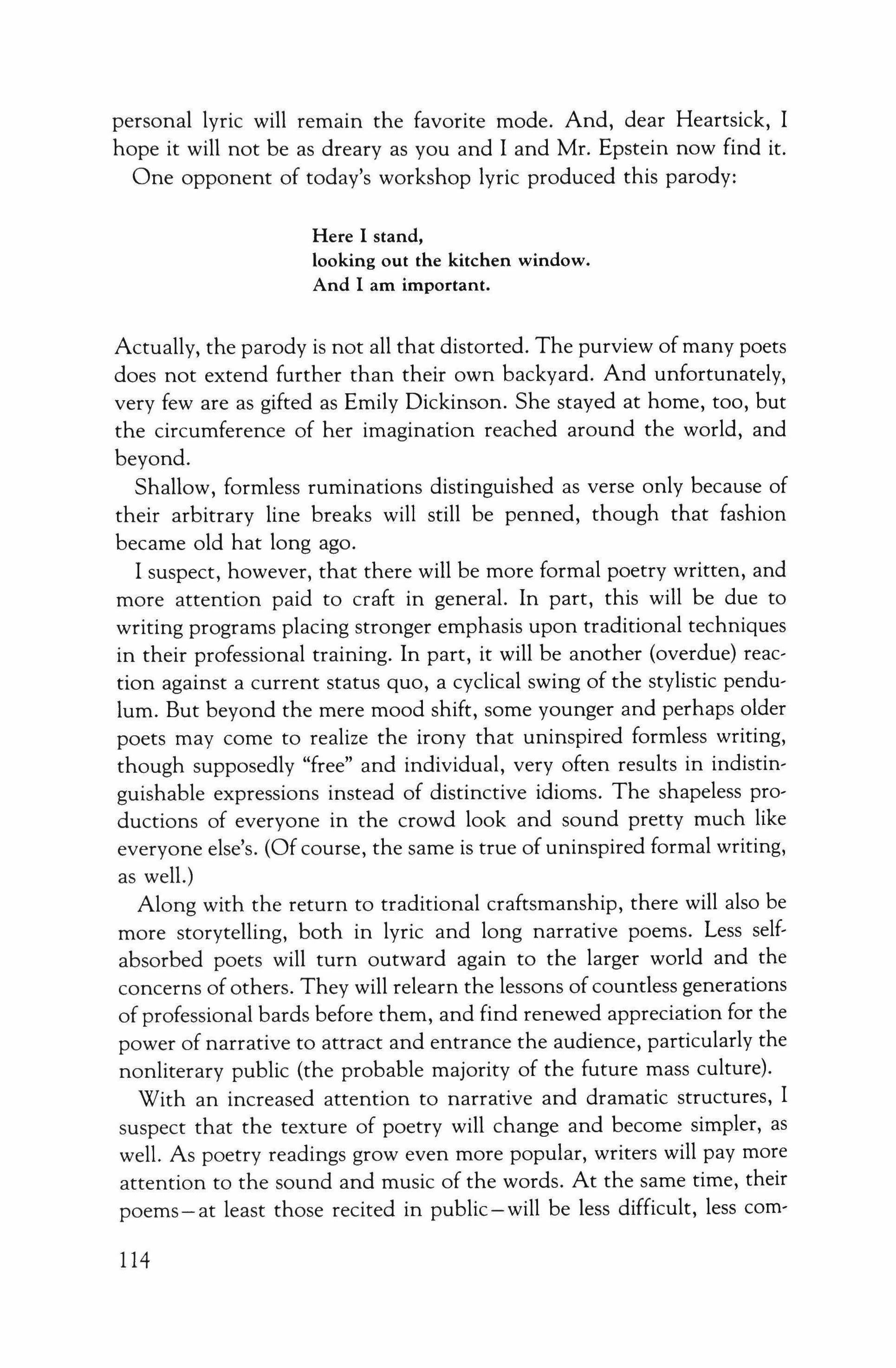
personal lyric will remain the favorite mode. And, dear Heartsick, I hope it will not be as dreary as you and I and Mr. Epstein now find it.
One opponent of today's workshop lyric produced this parody:
Here I stand, looking out the kitchen window. And I am important.
Actually, the parody is not all that distorted. The purview of many poets does not extend further than their own backyard. And unfortunately, very few are as gifted as Emily Dickinson. She stayed at home, too, but the circumference of her imagination reached around the world, and beyond.
Shallow, formless ruminations distinguished as verse only because of their arbitrary line breaks will still be penned, though that fashion became old hat long ago.
I suspect, however, that there will be more formal poetry written, and more attention paid to craft in general. In part, this will be due to writing programs placing stronger emphasis upon traditional techniques in their professional training. In part, it will be another (overdue) reaction against a current status quo, a cyclical swing of the stylistic pendulum. But beyond the mere mood shift, some younger and perhaps older poets may come to realize the irony that uninspired formless writing, though supposedly "free" and individual, very often results in indistinguishable expressions instead of distinctive idioms. The shapeless productions of everyone in the crowd look and sound pretty much like everyone else's. (Of course, the same is true of uninspired formal writing, as well.)
Along with the return to traditional craftsmanship, there will also be more storytelling, both in lyric and long narrative poems. Less selfabsorbed poets will turn outward again to the larger world and the concerns of others. They will relearn the lessons ofcountless generations of professional bards before them, and find renewed appreciation for the power of narrative to attract and entrance the audience, particularly the nonliterary public (the probable majority of the future mass culture).
With an increased attention to narrative and dramatic structures, I suspect that the texture of poetry will change and become simpler, as well. As poetry readings grow even more popular, writers will pay more attention to the sound and music of the words. At the same time, their poems - at least those recited in public - will be less difficult, less com-
114
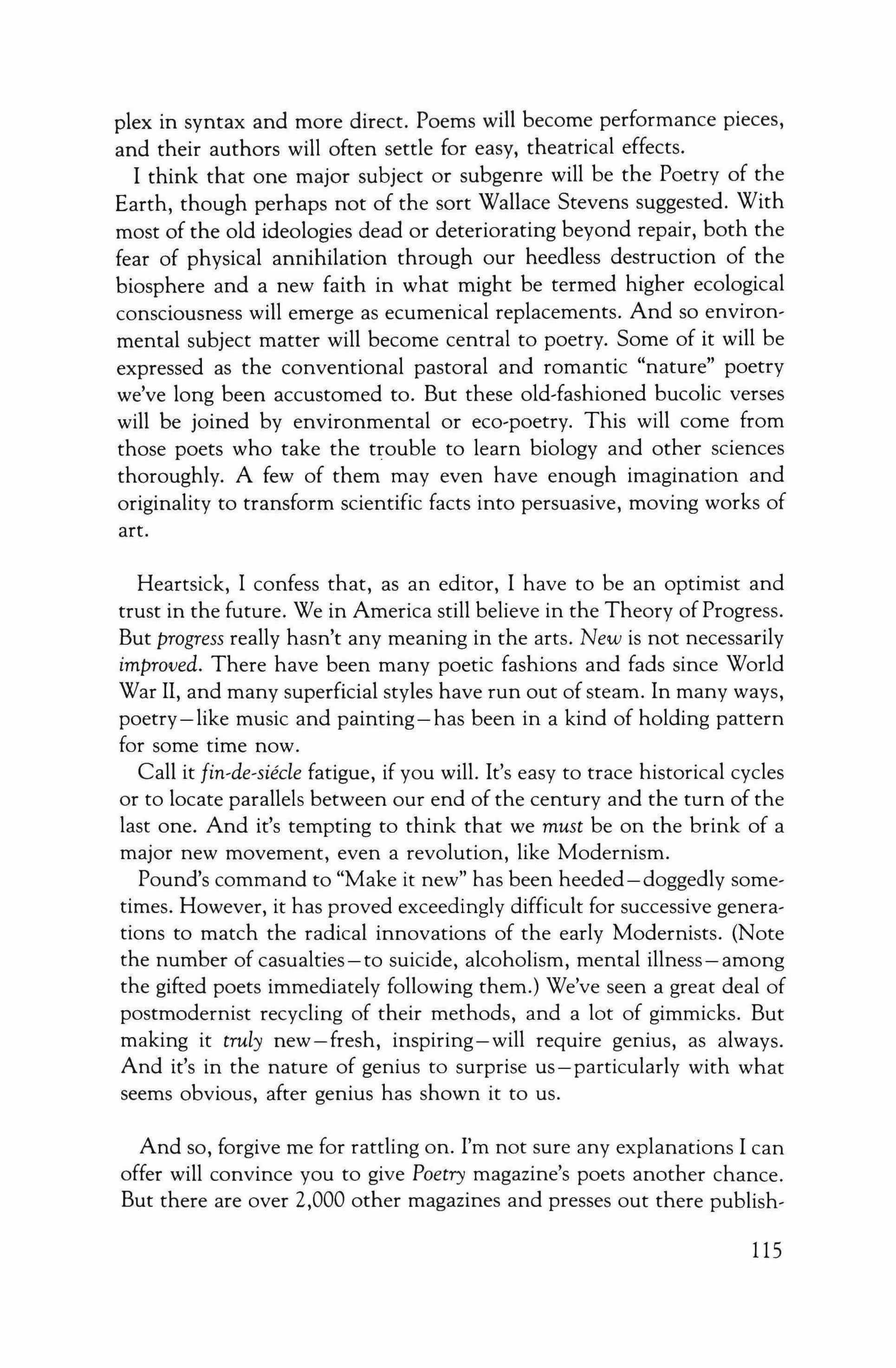
plex in syntax and more direct. Poems will become performance pieces, and their authors will often settle for easy, theatrical effects.
I think that one major subject or subgenre will be the Poetry of the Earth, though perhaps not of the sort Wallace Stevens suggested. With most of the old ideologies dead or deteriorating beyond repair, both the fear of physical annihilation through our heedless destruction of the biosphere and a new faith in what might be termed higher ecological consciousness will emerge as ecumenical replacements. And so environmental subject matter will become central to poetry. Some of it will be expressed as the conventional pastoral and romantic "nature" poetry we've long been accustomed to. But these old-fashioned bucolic verses will be joined by environmental or eco-poetry. This will come from those poets who take the trouble to learn biology and other sciences thoroughly. A few of them may even have enough imagination and originality to transform scientific facts into persuasive, moving works of art.
Heartsick, I confess that, as an editor, I have to be an optimist and trust in the future. We in America still believe in the Theory of Progress. But progress really hasn't any meaning in the arts. New is not necessarily improved. There have been many poetic fashions and fads since World War II, and many superficial styles have run out of steam. In many ways, poetry-like music and painting-has been in a kind of holding pattern for some time now.
Call it [in-de-siecle fatigue, if you will. It's easy to trace historical cycles or to locate parallels between our end of the century and the turn of the last one. And it's tempting to think that we must be on the brink of a major new movement, even a revolution, like Modernism.
Pound's command to "Make it new" has been heeded-doggedly sometimes. However, it has proved exceedingly difficult for successive generations to match the radical innovations of the early Modernists. (Note the number of casualties-to suicide, alcoholism, mental illness-among the gifted poets immediately following them.) We've seen a great deal of postmodernist recycling of their methods, and a lot of gimmicks. But making it truly new-fresh, inspiring-will require genius, as always. And it's in the nature of genius to surprise us-particularly with what seems obvious, after genius has shown it to us.
And so, forgive me for rattling on. I'm not sure any explanations I can offer will convince you to give Poetry magazine's poets another chance. But there are over 2,000 other magazines and presses out there publish-
115
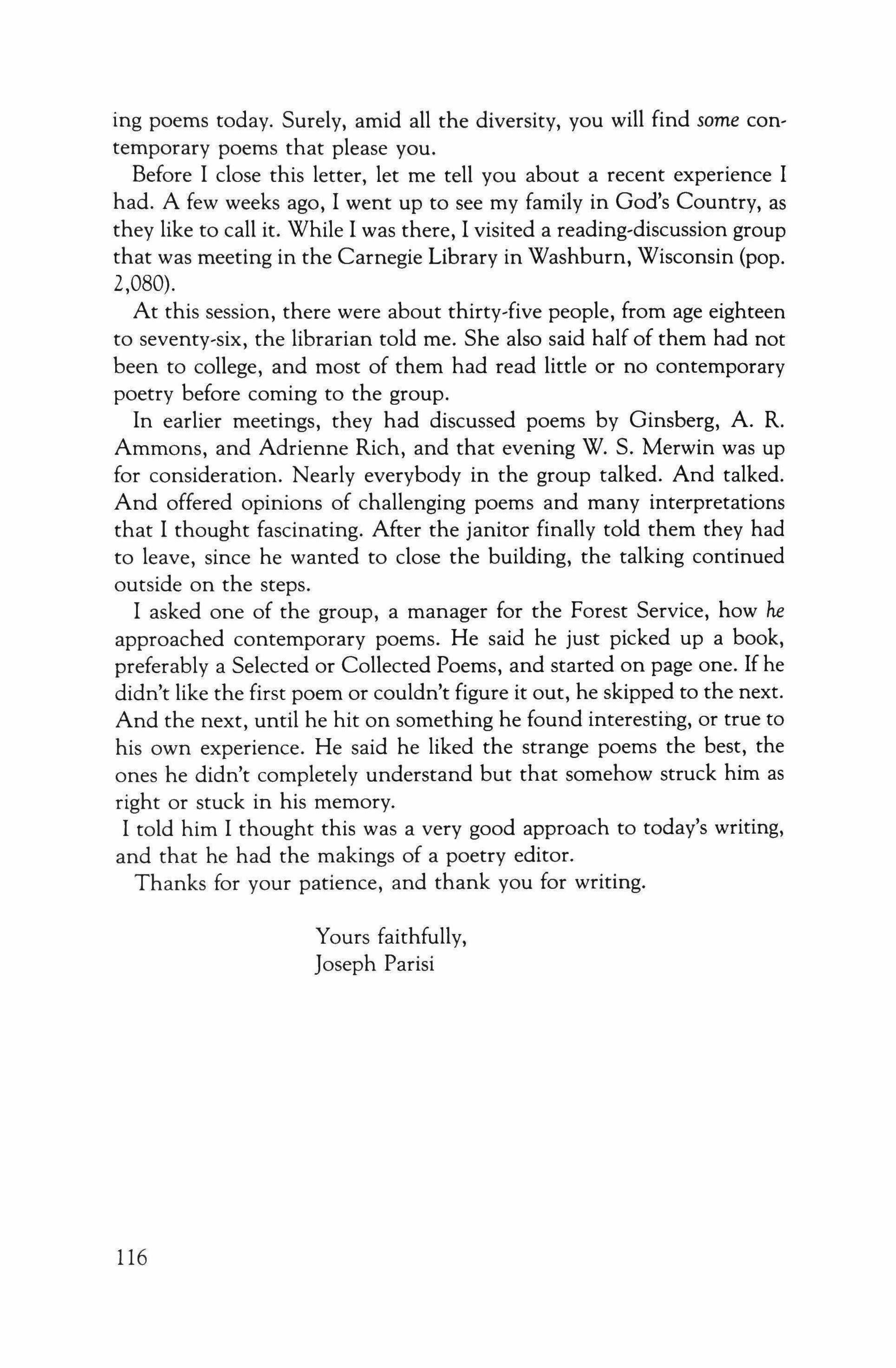
ing poems today. Surely, amid all the diversity, you will find some contemporary poems that please you.
Before I close this letter, let me tell you about a recent experience I had. A few weeks ago, I went up to see my family in God's Country, as they like to call it. While I was there, I visited a reading-discussion group that was meeting in the Carnegie Library in Washburn, Wisconsin (pop. 2,080).
At this session, there were about thirty-five people, from age eighteen to seventy-six, the librarian told me. She also said half of them had not been to college, and most of them had read little or no contemporary poetry before coming to the group.
In earlier meetings, they had discussed poems by Ginsberg, A. R. Ammons, and Adrienne Rich, and that evening W. S. Merwin was up for consideration. Nearly everybody in the group talked. And talked. And offered opinions of challenging poems and many interpretations that I thought fascinating. After the janitor finally told them they had to leave, since he wanted to close the building, the talking continued outside on the steps.
I asked one of the group, a manager for the Forest Service, how he approached contemporary poems. He said he just picked up a book, preferably a Selected or Collected Poems, and started on page one. If he didn't like the first poem or couldn't figure it out, he skipped to the next. And the next, until he hit on something he found interesting, or true to his own experience. He said he liked the strange poems the best, the ones he didn't completely understand but that somehow struck him as right or stuck in his memory.
I told him I thought this was a very good approach to today's writing, and that he had the makings of a poetry editor.
Thanks for your patience, and thank you for writing.
Yours faithfully, Joseph
Parisi
116
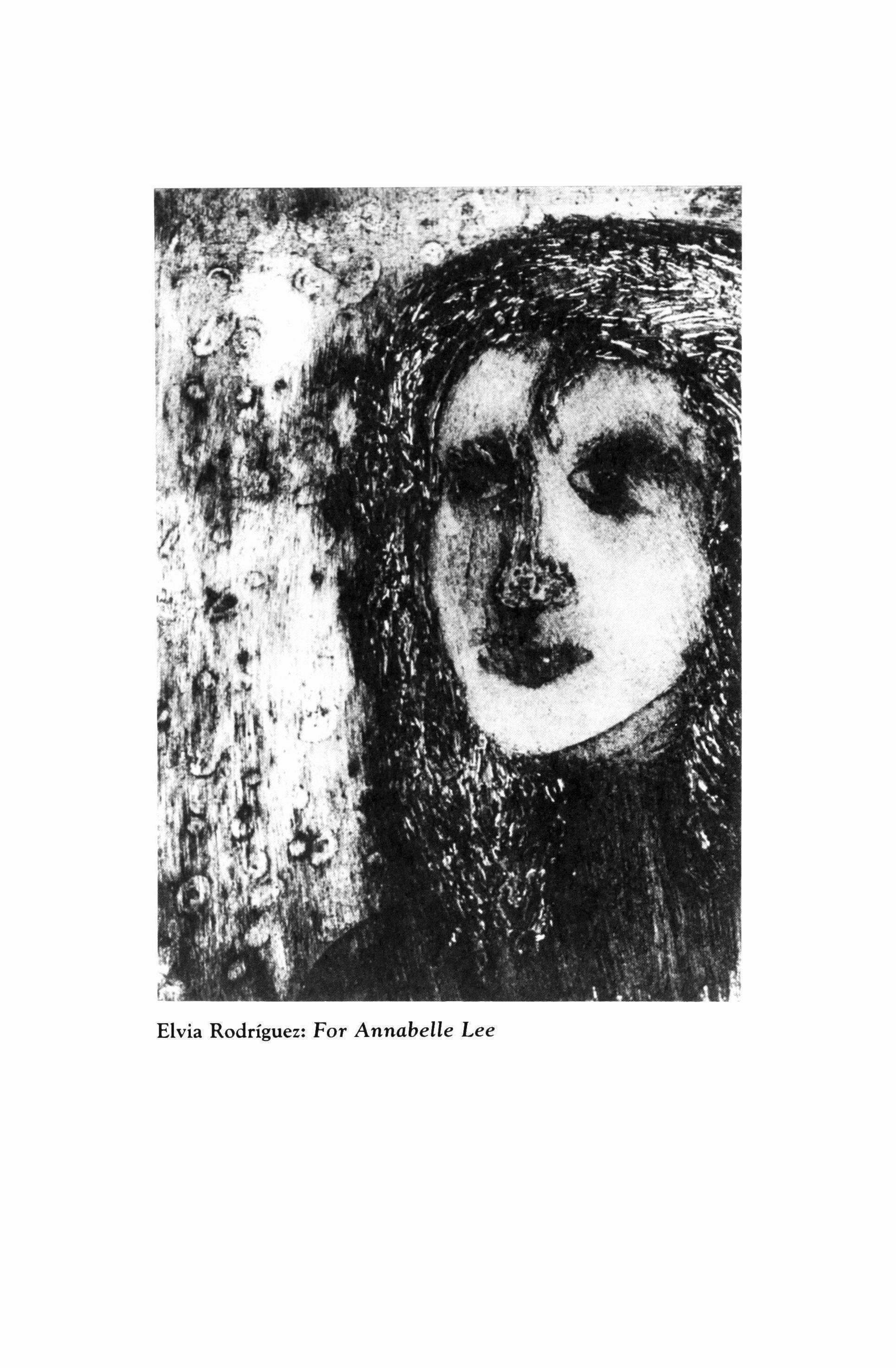 Elvia Rodriguez: For Annabelle Lee
Elvia Rodriguez: For Annabelle Lee
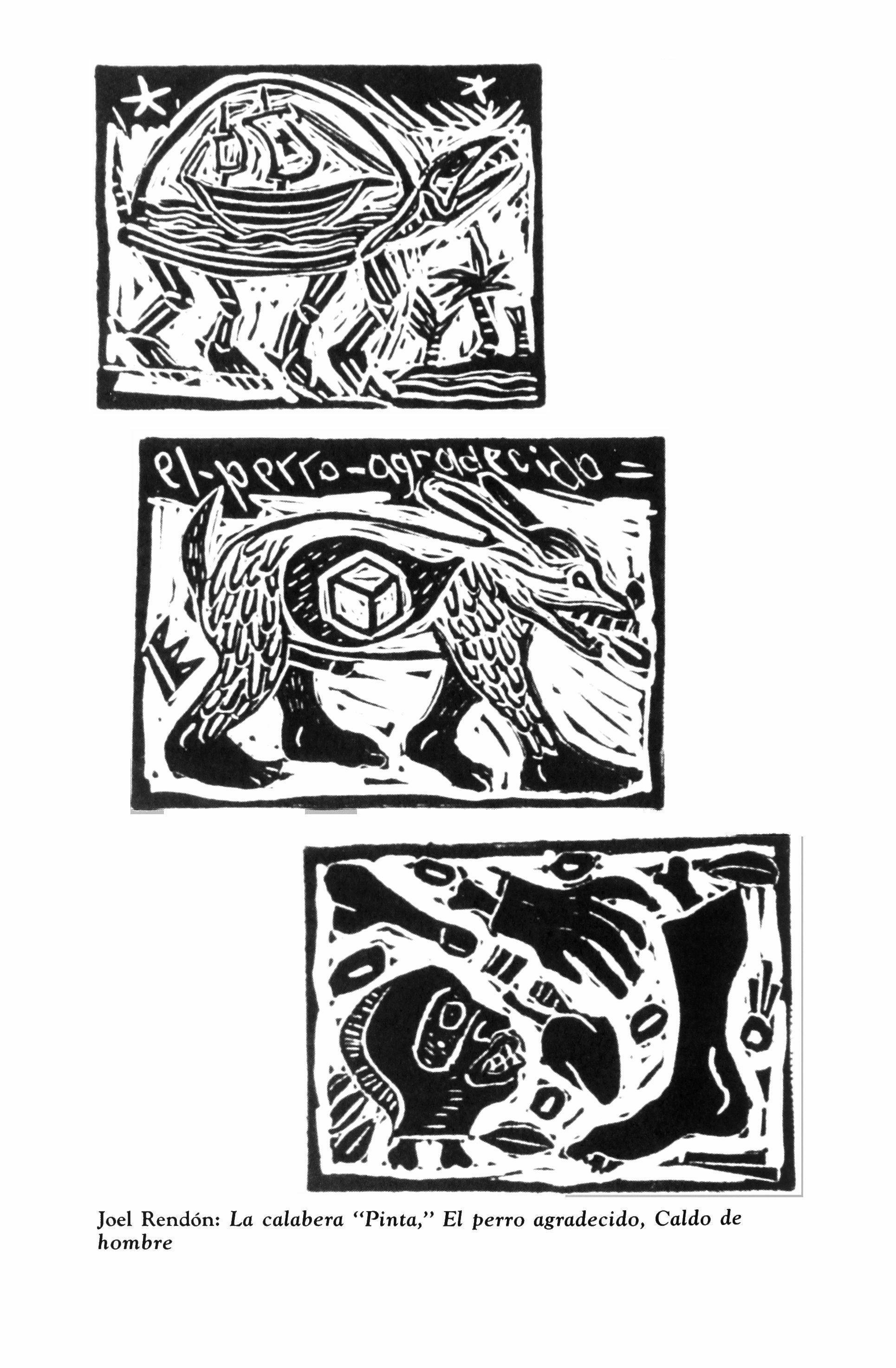 Joel Rendon: La calabera «Pinta," El perro agradecido, Caldo de hombre
Joel Rendon: La calabera «Pinta," El perro agradecido, Caldo de hombre
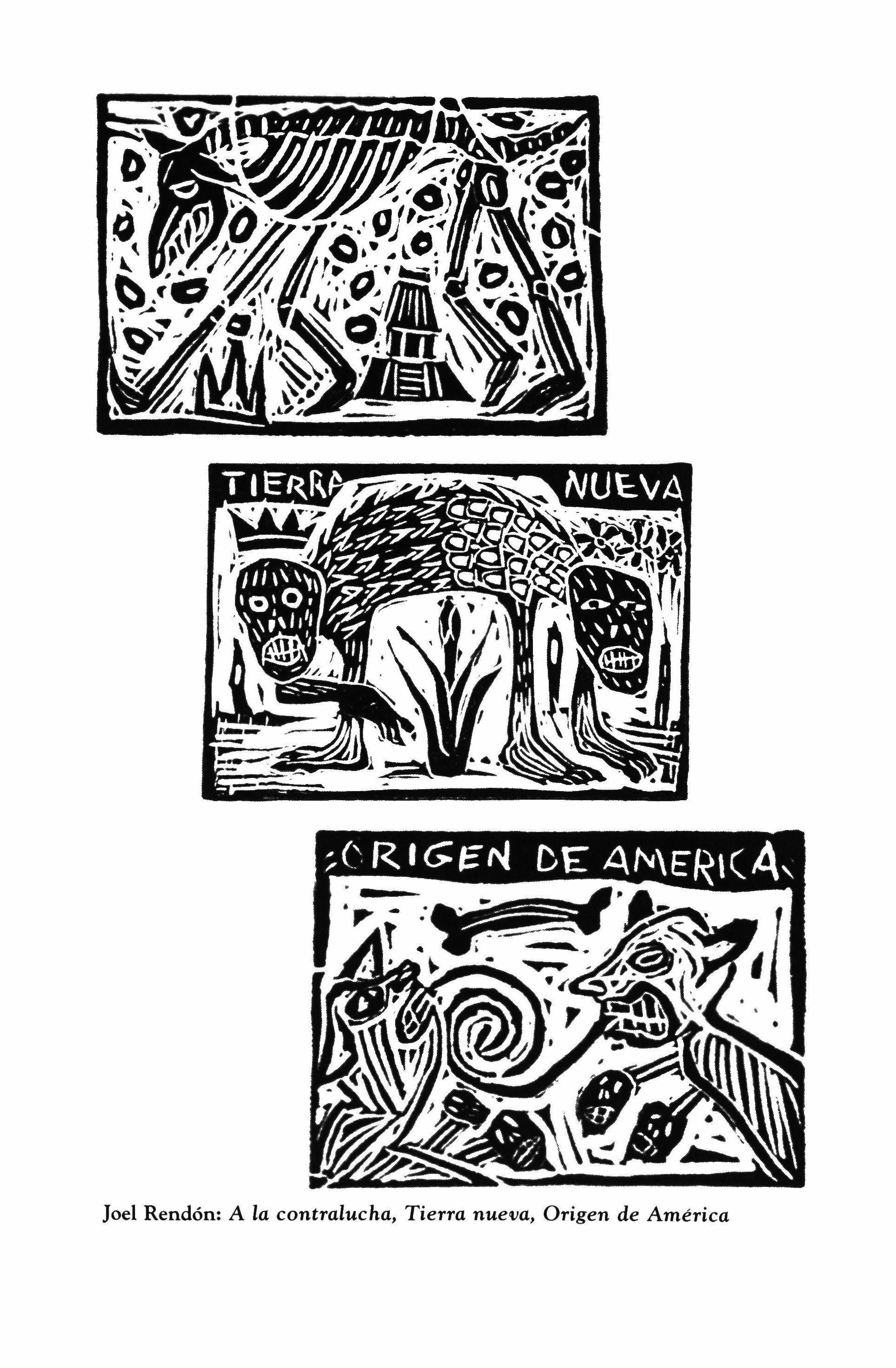 Joel Rendon: A la contralucha, Tierra nueva, Origen de America
Joel Rendon: A la contralucha, Tierra nueva, Origen de America
The Tour of Helen
Philip Baruth
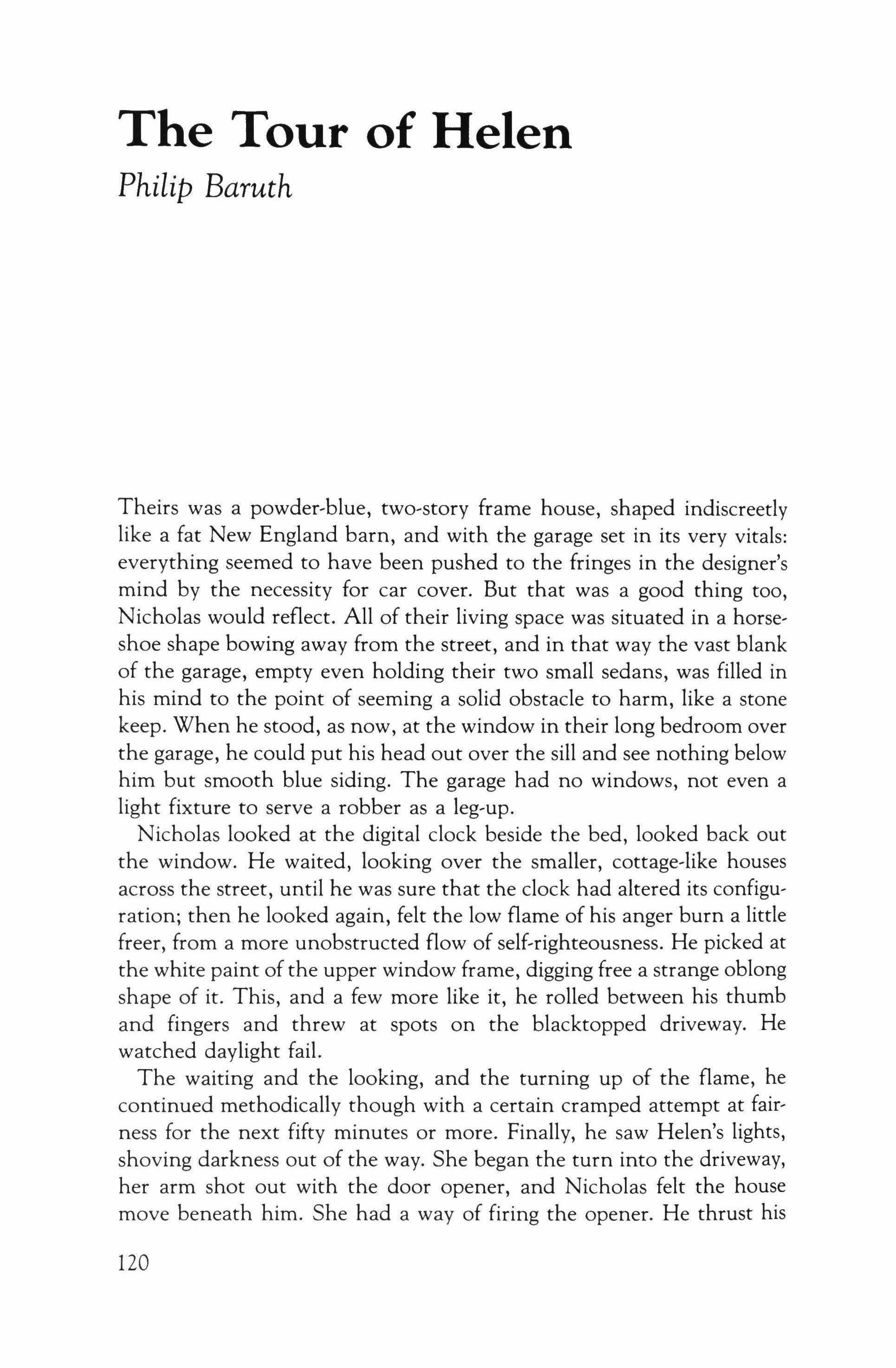
Theirs was a powder-blue, two-story frame house, shaped indiscreetly like a fat New England barn, and with the garage set in its very vitals: everything seemed to have been pushed to the fringes in the designer's mind by the necessity for car cover. But that was a good thing too, Nicholas would reflect. All of their living space was situated in a horseshoe shape bowing away from the street, and in that way the vast blank of the garage, empty even holding their two small sedans, was filled in his mind to the point of seeming a solid obstacle to harm, like a stone keep. When he stood, as now, at the window in their long bedroom over the garage, he could put his head out over the sill and see nothing below him but smooth blue siding. The garage had no windows, not even a light fixture to serve a robber as a leg-up.
Nicholas looked at the digital clock beside the bed, looked back out the window. He waited, looking over the smaller, cottage-like houses across the street, until he was sure that the clock had altered its configuration; then he looked again, felt the low flame of his anger burn a little freer, from a more unobstructed flow of self-righteousness. He picked at the white paint of the upper window frame, digging free a strange oblong shape of it. This, and a few more like it, he rolled between his thumb and fingers and threw at spots on the blacktopped driveway. He watched daylight fail.
The waiting and the looking, and the turning up of the flame, he continued methodically though with a certain cramped attempt at fairness for the next fifty minutes or more. Finally, he saw Helen's lights, shoving darkness out of the way. She began the turn into the driveway, her arm shot out with the door opener, and Nicholas felt the house move beneath him. She had a way of firing the opener. He thrust his
120
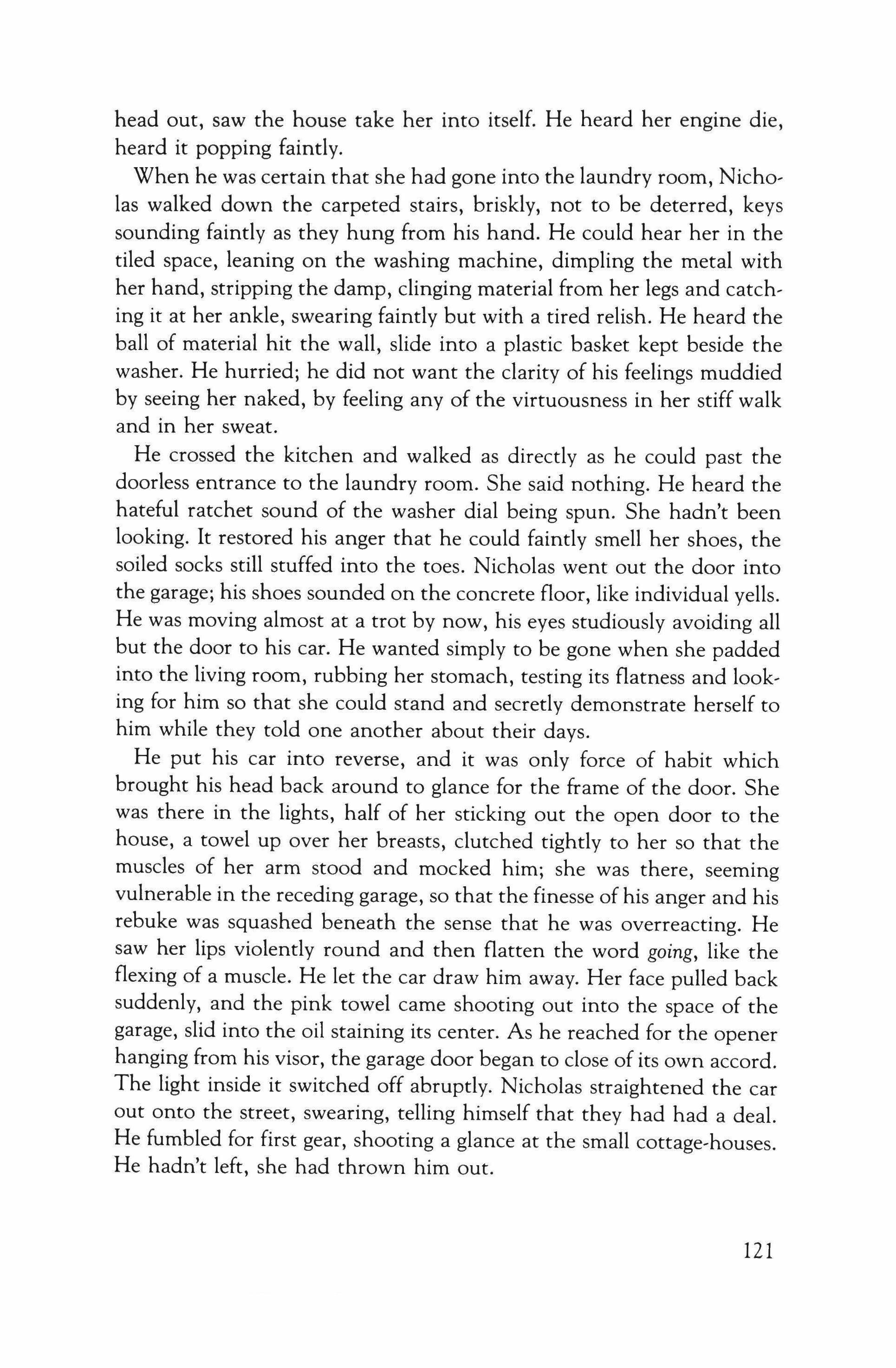
head out, saw the house take her into itself. He heard her engine die, heard it popping faintly.
When he was certain that she had gone into the laundry room, Nicholas walked down the carpeted stairs, briskly, not to be deterred, keys sounding faintly as they hung from his hand. He could hear her in the tiled space, leaning on the washing machine, dimpling the metal with her hand, stripping the damp, clinging material from her legs and catching it at her ankle, swearing faintly but with a tired relish. He heard the ball of material hit the wall, slide into a plastic basket kept beside the washer. He hurried; he did not want the clarity of his feelings muddied by seeing her naked, by feeling any of the virtuousness in her stiff walk and in her sweat.
He crossed the kitchen and walked as directly as he could past the doorless entrance to the laundry room. She said nothing. He heard the hateful ratchet sound of the washer dial being spun. She hadn't been looking. It restored his anger that he could faintly smell her shoes, the soiled socks still stuffed into the toes. Nicholas went out the door into the garage; his shoes sounded on the concrete floor, like individual yells. He was moving almost at a trot by now, his eyes studiously avoiding all but the door to his car. He wanted simply to be gone when she padded into the living room, rubbing her stomach, testing its flatness and looking for him so that she could stand and secretly demonstrate herself to him while they told one another about their days.
He put his car into reverse, and it was only force of habit which brought his head back around to glance for the frame of the door. She was there in the lights, half of her sticking out the open door to the house, a towel up over her breasts, clutched tightly to her so that the muscles of her arm stood and mocked him; she was there, seeming vulnerable in the receding garage, so that the finesse of his anger and his rebuke was squashed beneath the sense that he was overreacting. He saw her lips violently round and then flatten the word going, like the flexing of a muscle. He let the car draw him away. Her face pulled back suddenly, and the pink towel came shooting out into the space of the garage, slid into the oil staining its center. As he reached for the opener hanging from his visor, the garage door began to close of its own accord. The light inside it switched off abruptly. Nicholas straightened the car out onto the street, swearing, telling himself that they had had a deal. He fumbled for first gear, shooting a glance at the small cottage-houses. He hadn't left, she had thrown him out.
121
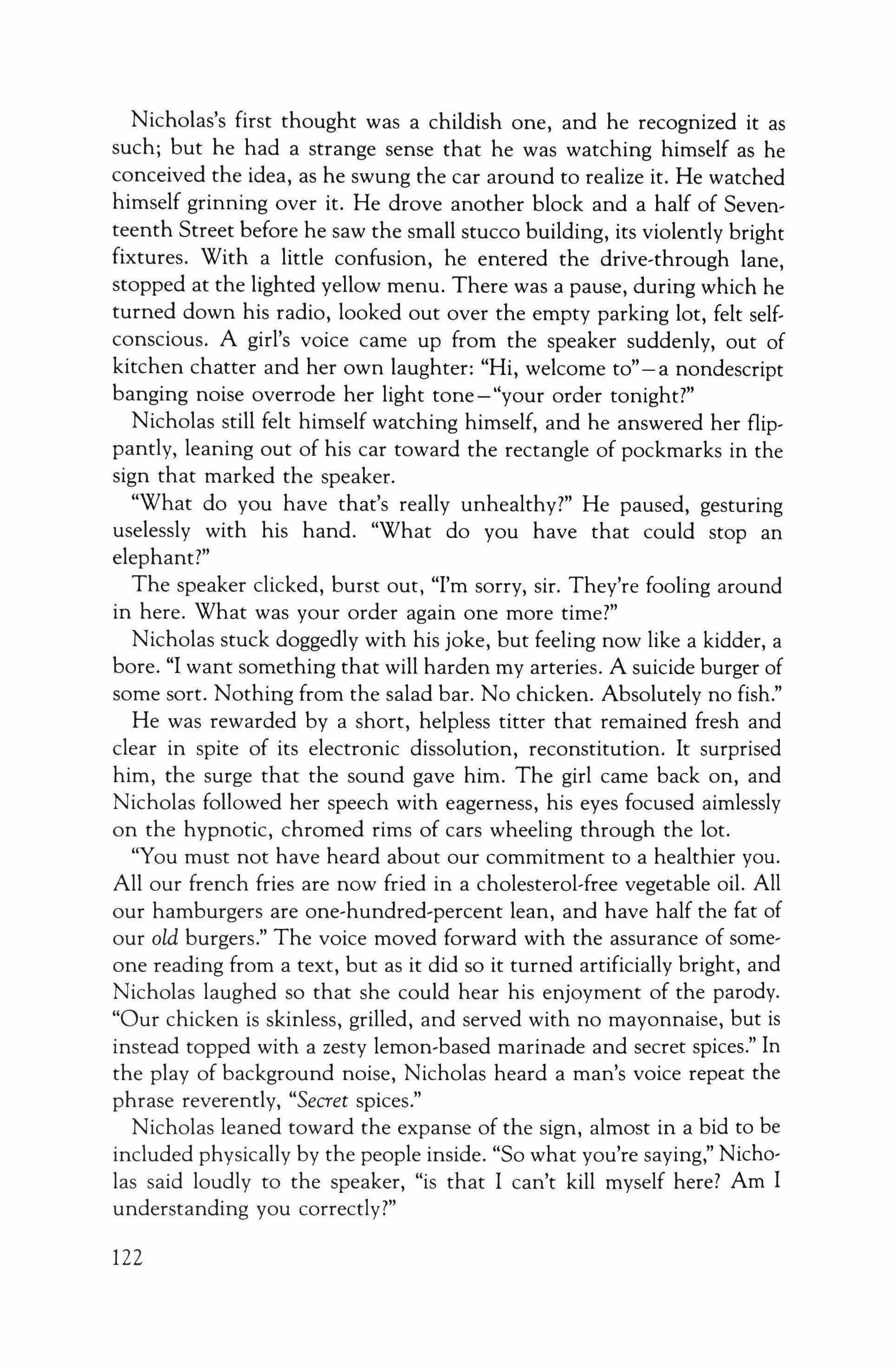
Nicholas's first thought was a childish one, and he recognized it as such; but he had a strange sense that he was watching himself as he conceived the idea, as he swung the car around to realize it. He watched himself grinning over it. He drove another block and a half of Seventeenth Street before he saw the small stucco building, its violently bright fixtures. With a little confusion, he entered the drive-through lane, stopped at the lighted yellow menu. There was a pause, during which he turned down his radio, looked out over the empty parking lot, felt selfconscious. A girl's voice came up from the speaker suddenly, out of kitchen chatter and her own laughter: "Hi, welcome to" - a nondescript banging noise overrode her light tone- "your order tonight?"
Nicholas still felt himself watching himself, and he answered her flippantly, leaning out of his car toward the rectangle of pockmarks in the sign that marked the speaker.
"What do you have that's really unhealthy?" He paused, gesturing uselessly with his hand. "What do you have that could stop an elephant?"
The speaker clicked, burst out, "I'm sorry, sir. They're fooling around in here. What was your order again one more time?"
Nicholas stuck doggedly with his joke, but feeling now like a kidder, a bore. "I want something that will harden my arteries. A suicide burger of some sort. Nothing from the salad bar. No chicken. Absolutely no fish."
He was rewarded by a short, helpless titter that remained fresh and clear in spite of its electronic dissolution, reconstitution. It surprised him, the surge that the sound gave him. The girl came back on, and Nicholas followed her speech with eagerness, his eyes focused aimlessly on the hypnotic, chromed rims of cars wheeling through the lot.
"You must not have heard about our commitment to a healthier you. All our french fries are now fried in a cholesterol-free vegetable oil. All our hamburgers are one-hundred-percent lean, and have half the fat of our old burgers." The voice moved forward with the assurance of someone reading from a text, but as it did so it turned artificially bright, and Nicholas laughed so that she could hear his enjoyment of the parody. "Our chicken is skinless, grilled, and served with no mayonnaise, but is instead topped with a zesty lemon-based marinade and secret spices." In the play of background noise, Nicholas heard a man's voice repeat the phrase reverently, "Secret spices."
Nicholas leaned toward the expanse of the sign, almost in a bid to be included physically by the people inside. "So what you're saying," Nicholas said loudly to the speaker, "is that I can't kill myself here? Am I understanding you correctly?"
122
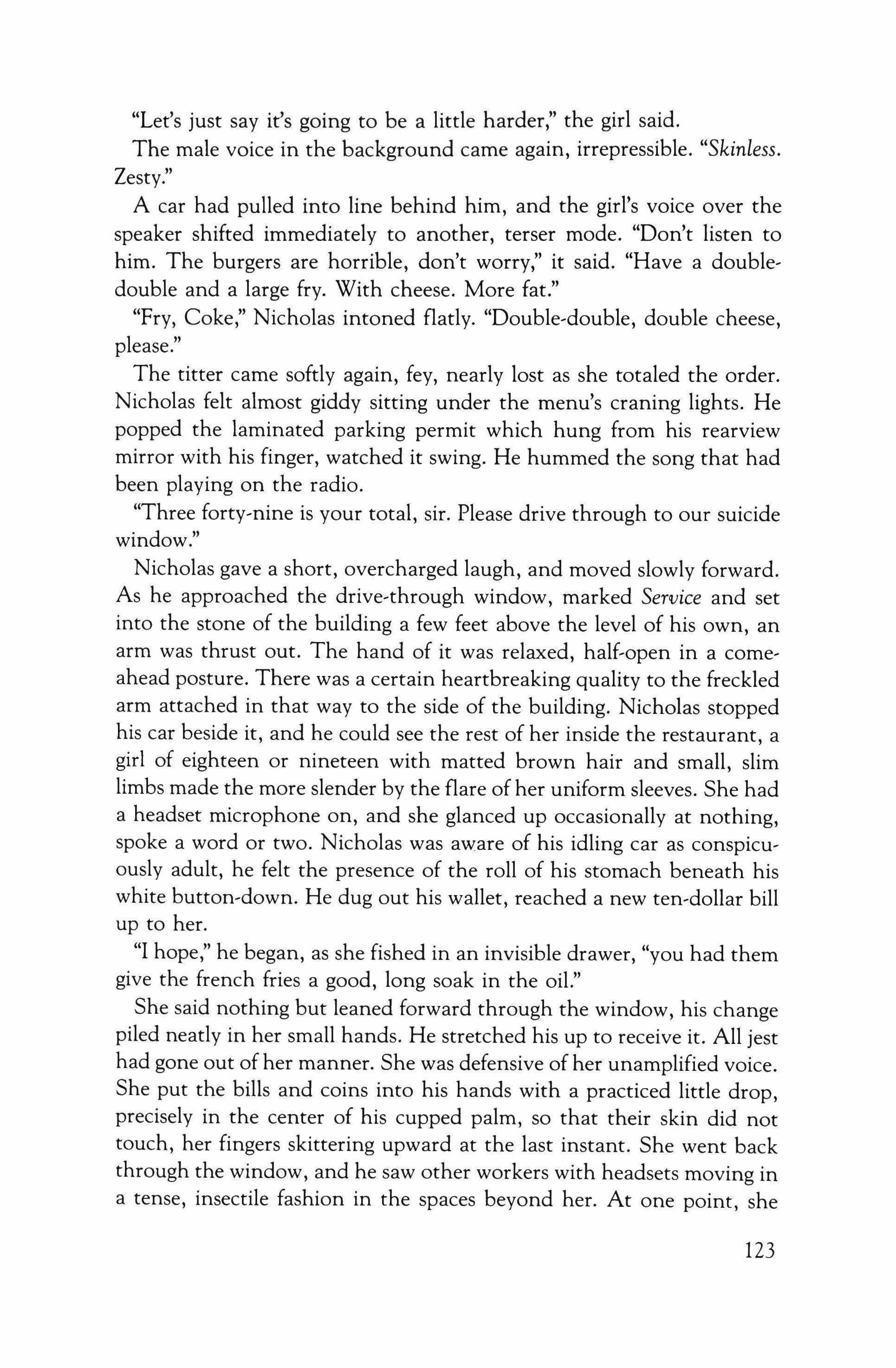
"Let's just say it's going to be a little harder:' the girl said. The male voice in the background came again, irrepressible. "Skinless. Zesty."
A car had pulled into line behind him, and the girl's voice over the speaker shifted immediately to another, terser mode. "Don't listen to him. The burgers are horrible, don't worry," it said. "Have a doubledouble and a large fry. With cheese. More fat."
"Fry, Coke," Nicholas intoned flatly. "Double-double, double cheese, please."
The titter came softly again, fey, nearly lost as she totaled the order. Nicholas felt almost giddy sitting under the menu's craning lights. He popped the laminated parking permit which hung from his rearview mirror with his finger, watched it swing. He hummed the song that had been playing on the radio.
"Three forty-nine is your total, sir. Please drive through to our suicide window."
Nicholas gave a short, overcharged laugh, and moved slowly forward. As he approached the drive-through window, marked Service and set into the stone of the building a few feet above the level of his own, an arm was thrust out. The hand of it was relaxed, half-open in a comeahead posture. There was a certain heartbreaking quality to the freckled arm attached in that way to the side of the building. Nicholas stopped his car beside it, and he could see the rest of her inside the restaurant, a girl of eighteen or nineteen with matted brown hair and small, slim limbs made the more slender by the flare of her uniform sleeves. She had a headset microphone on, and she glanced up occasionally at nothing, spoke a word or two. Nicholas was aware of his idling car as conspicuously adult, he felt the presence of the roll of his stomach beneath his white button-down. He dug out his wallet, reached a new ten-dollar bill up to her.
"I hope," he began, as she fished in an invisible drawer, "you had them give the french fries a good, long soak in the oil."
She said nothing but leaned forward through the window, his change piled neatly in her small hands. He stretched his up to receive it. All jest had gone out of her manner. She was defensive of her unamplified voice. She put the bills and coins into his hands with a practiced little drop, precisely in the center of his cupped palm, so that their skin did not touch, her fingers skittering upward at the last instant. She went back through the window, and he saw other workers with headsets moving in a tense, insectile fashion in the spaces beyond her. At one point, she
123
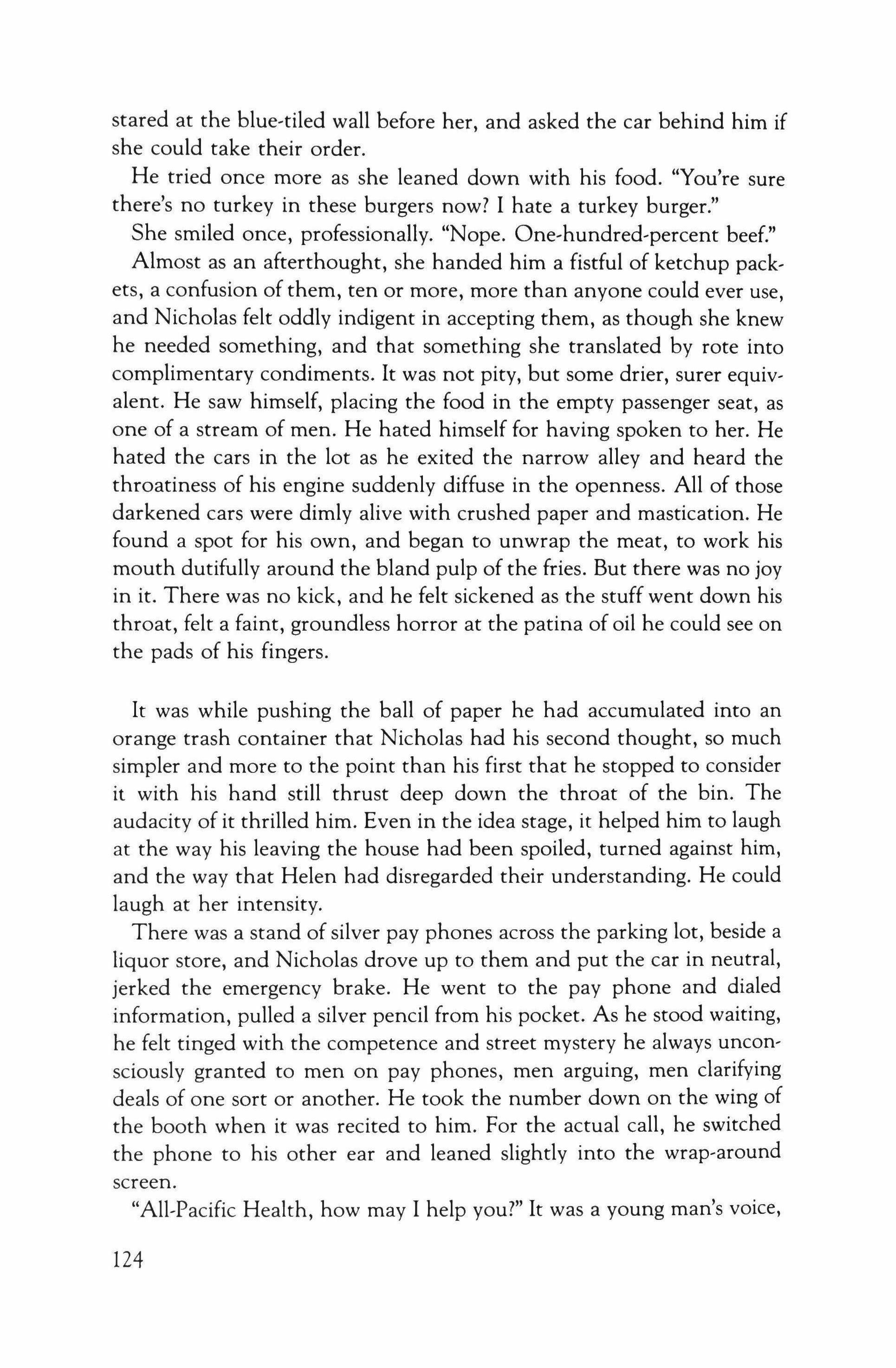
stared at the blue-tiled wall before her, and asked the car behind him if she could take their order.
He tried once more as she leaned down with his food. "You're sure there's no turkey in these burgers now? I hate a turkey burger."
She smiled once, professionally. "Nope. One-hundred-percent beef."
Almost as an afterthought, she handed him a fistful of ketchup packets, a confusion of them, ten or more, more than anyone could ever use, and Nicholas felt oddly indigent in accepting them, as though she knew he needed something, and that something she translated by rote into complimentary condiments. It was not pity, but some drier, surer equivalent. He saw himself, placing the food in the empty passenger seat, as one of a stream of men. He hated himself for having spoken to her. He hated the cars in the lot as he exited the narrow alley and heard the throatiness of his engine suddenly diffuse in the openness. All of those darkened cars were dimly alive with crushed paper and mastication. He found a spot for his own, and began to unwrap the meat, to work his mouth dutifully around the bland pulp of the fries. But there was no joy in it. There was no kick, and he felt sickened as the stuff went down his throat, felt a faint, groundless horror at the patina of oil he could see on the pads of his fingers.
It was while pushing the ball of paper he had accumulated into an orange trash container that Nicholas had his second thought, so much simpler and more to the point than his first that he stopped to consider it with his hand still thrust deep down the throat of the bin. The audacity of it thrilled him. Even in the idea stage, it helped him to laugh at the way his leaving the house had been spoiled, turned against him, and the way that Helen had disregarded their understanding. He could laugh at her intensity.
There was a stand of silver pay phones across the parking lot, beside a liquor store, and Nicholas drove up to them and put the car in neutral, jerked the emergency brake. He went to the pay phone and dialed information, pulled a silver pencil from his pocket. As he stood waiting, he felt tinged with the competence and street mystery he always unconsciously granted to men on pay phones, men arguing, men clarifying deals of one sort or another. He took the number down on the wing of the booth when it was recited to him. For the actual call, he switched the phone to his other ear and leaned slightly into the wrap-around screen.
"All-Pacific Health, how may I help you?" It was a young man's voice,
124
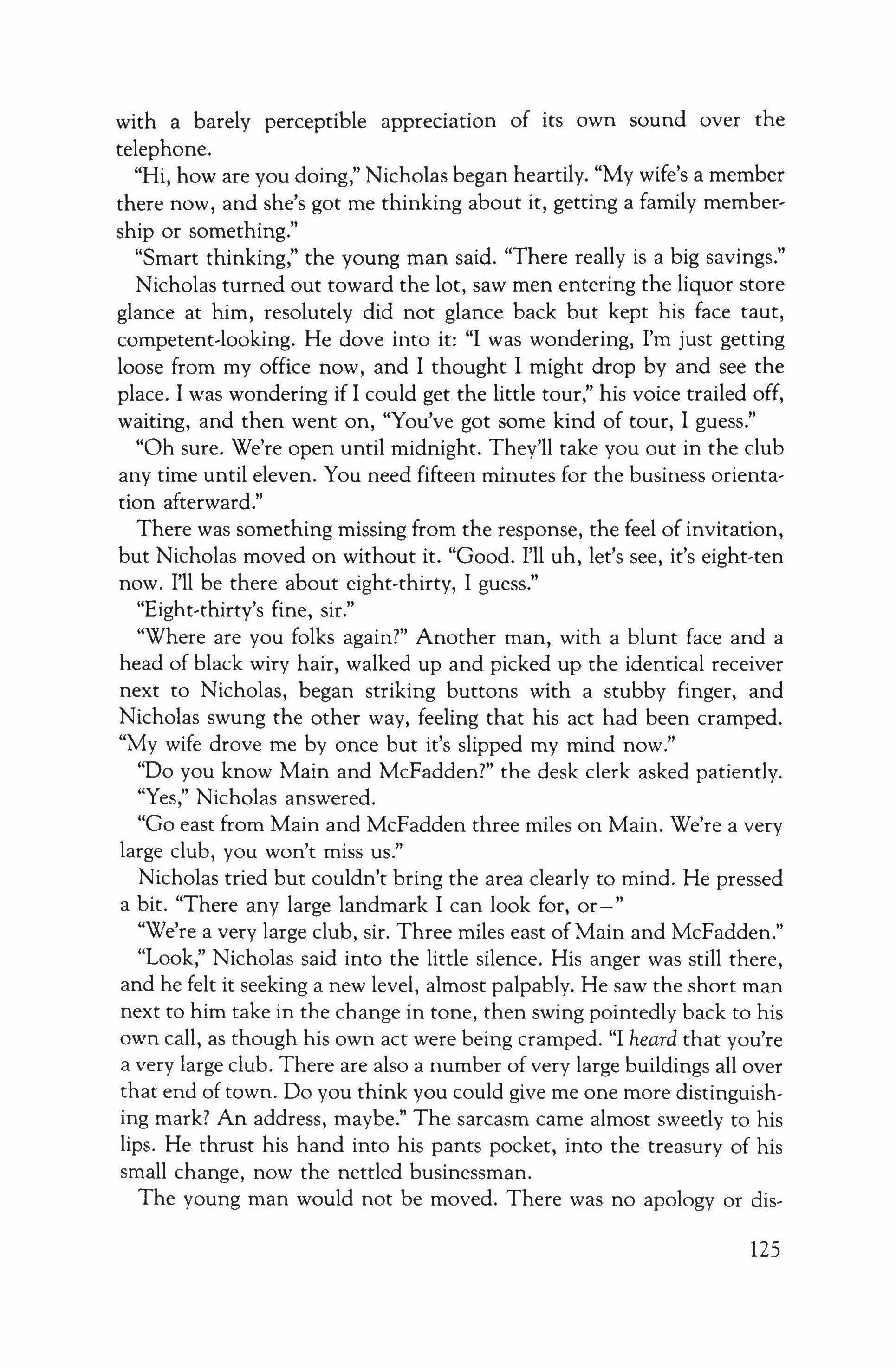
with a barely perceptible appreciation of its own sound over the telephone.
"Hi, how are you doing," Nicholas began heartily. "My wife's a member there now, and she's got me thinking about it, getting a family member, ship or something."
"Smart thinking," the young man said. "There really is a big savings."
Nicholas turned out toward the lot, saw men entering the liquor store glance at him, resolutely did not glance back but kept his face taut, competent-looking. He dove into it: "I was wondering, I'm just getting loose from my office now, and I thought I might drop by and see the place. I was wondering if I could get the little tour," his voice trailed off, waiting, and then went on, "You've got some kind of tour, I guess."
"Oh sure. We're open until midnight. They'll take you out in the club any time until eleven. You need fifteen minutes for the business orienta, tion afterward."
There was something missing from the response, the feel of invitation, but Nicholas moved on without it. "Good. I'll uh, let's see, it's eight-ten now. I'll be there about eight,thirty, I guess."
"Eight,thirty's fine, sir."
"Where are you folks again?" Another man, with a blunt face and a head of black wiry hair, walked up and picked up the identical receiver next to Nicholas, began striking buttons with a stubby finger, and Nicholas swung the other way, feeling that his act had been cramped. "My wife drove me by once but it's slipped my mind now."
"Do you know Main and McFadden?" the desk clerk asked patiently. "Yes," Nicholas answered.
"Go east from Main and McFadden three miles on Main. We're a very large club, you won't miss us."
Nicholas tried but couldn't bring the area clearly to mind. He pressed a bit. "There any large landmark I can look for, or-"
"We're a very large club, sir. Three miles east of Main and McFadden."
"Look," Nicholas said into the little silence. His anger was still there, and he felt it seeking a new level, almost palpably. He saw the short man next to him take in the change in tone, then swing pointedly back to his own call, as though his own act were being cramped. "I heard that you're a very large club. There are also a number of very large buildings all over that end of town. Do you think you could give me one more distinguish, ing mark? An address, maybe." The sarcasm came almost sweetly to his lips. He thrust his hand into his pants pocket, into the treasury of his small change, now the nettled businessman.
The young man would not be moved. There was no apology or dis,
125
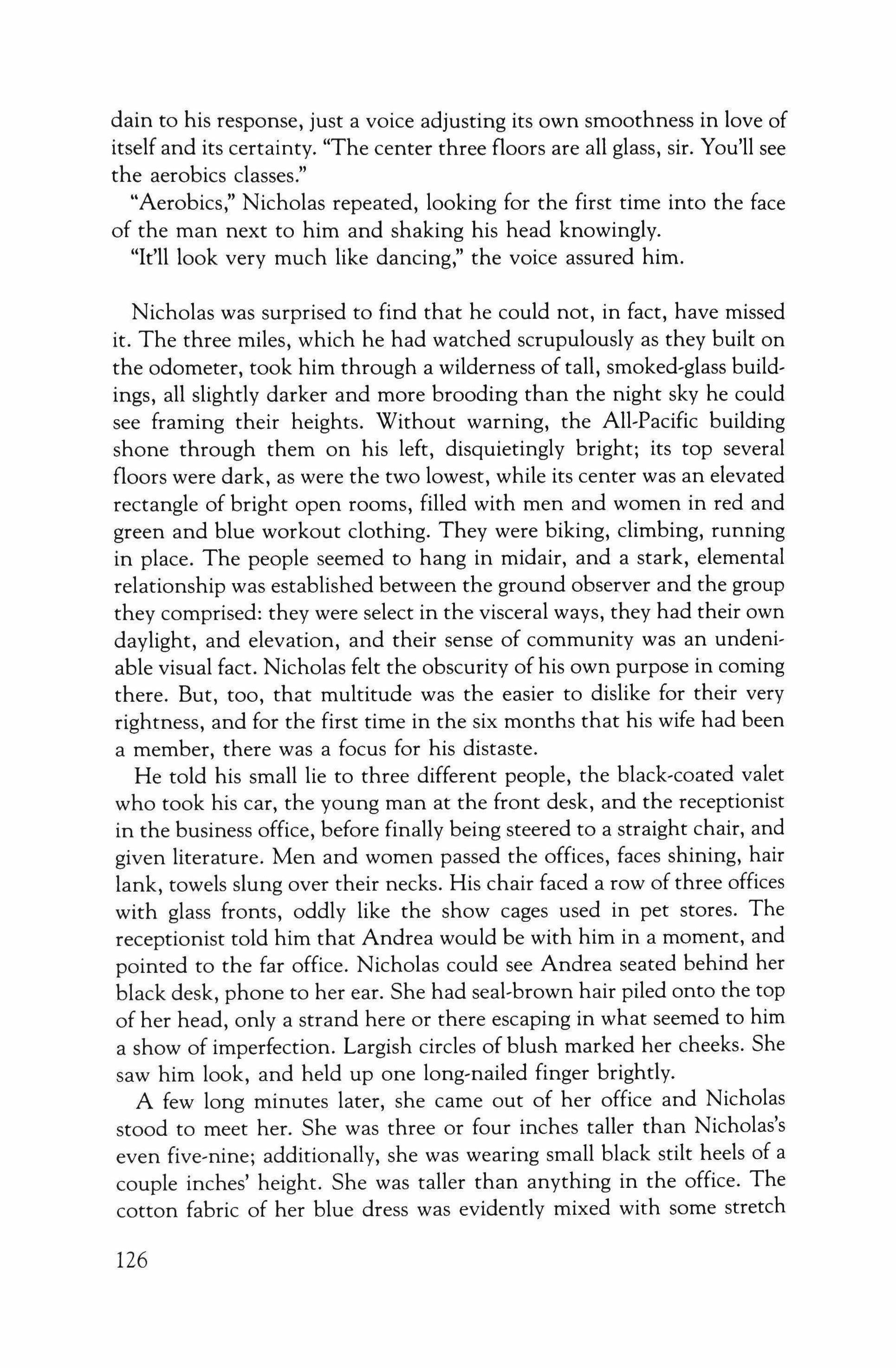
dain to his response, just a voice adjusting its own smoothness in love of itself and its certainty. "The center three floors are all glass, sir. You'll see the aerobics classes."
"Aerobics," Nicholas repeated, looking for the first time into the face of the man next to him and shaking his head knowingly.
"It'll look very much like dancing," the voice assured him.
Nicholas was surprised to find that he could not, in fact, have missed it. The three miles, which he had watched scrupulously as they built on the odometer, took him through a wilderness of tall, smoked-glass buildings, all slightly darker and more brooding than the night sky he could see framing their heights. Without warning, the All-Pacific building shone through them on his left, disquietingly bright; its top several floors were dark, as were the two lowest, while its center was an elevated rectangle of bright open rooms, filled with men and women in red and green and blue workout clothing. They were biking, climbing, running in place. The people seemed to hang in midair, and a stark, elemental relationship was established between the ground observer and the group they comprised: they were select in the visceral ways, they had their own daylight, and elevation, and their sense of community was an undeniable visual fact. Nicholas felt the obscurity of his own purpose in coming there. But, too, that multitude was the easier to dislike for their very rightness, and for the first time in the six months that his wife had been a member, there was a focus for his distaste.
He told his small lie to three different people, the black-coated valet who took his car, the young man at the front desk, and the receptionist in the business office, before finally being steered to a straight chair, and given literature. Men and women passed the offices, faces shining, hair lank, towels slung over their necks. His chair faced a row of three offices with glass fronts, oddly like the show cages used in pet stores. The receptionist told him that Andrea would be with him in a moment, and pointed to the far office. Nicholas could see Andrea seated behind her black desk, phone to her ear. She had seal-brown hair piled onto the top of her head, only a strand here or there escaping in what seemed to him a show of imperfection. Largish circles of blush marked her cheeks. She saw him look, and held up one long-nailed finger brightly.
A few long minutes later, she came out of her office and Nicholas stood to meet her. She was three or four inches taller than Nicholas's even five-nine; additionally, she was wearing small black stilt heels of a couple inches' height. She was taller than anything in the office. The cotton fabric of her blue dress was evidently mixed with some stretch
126
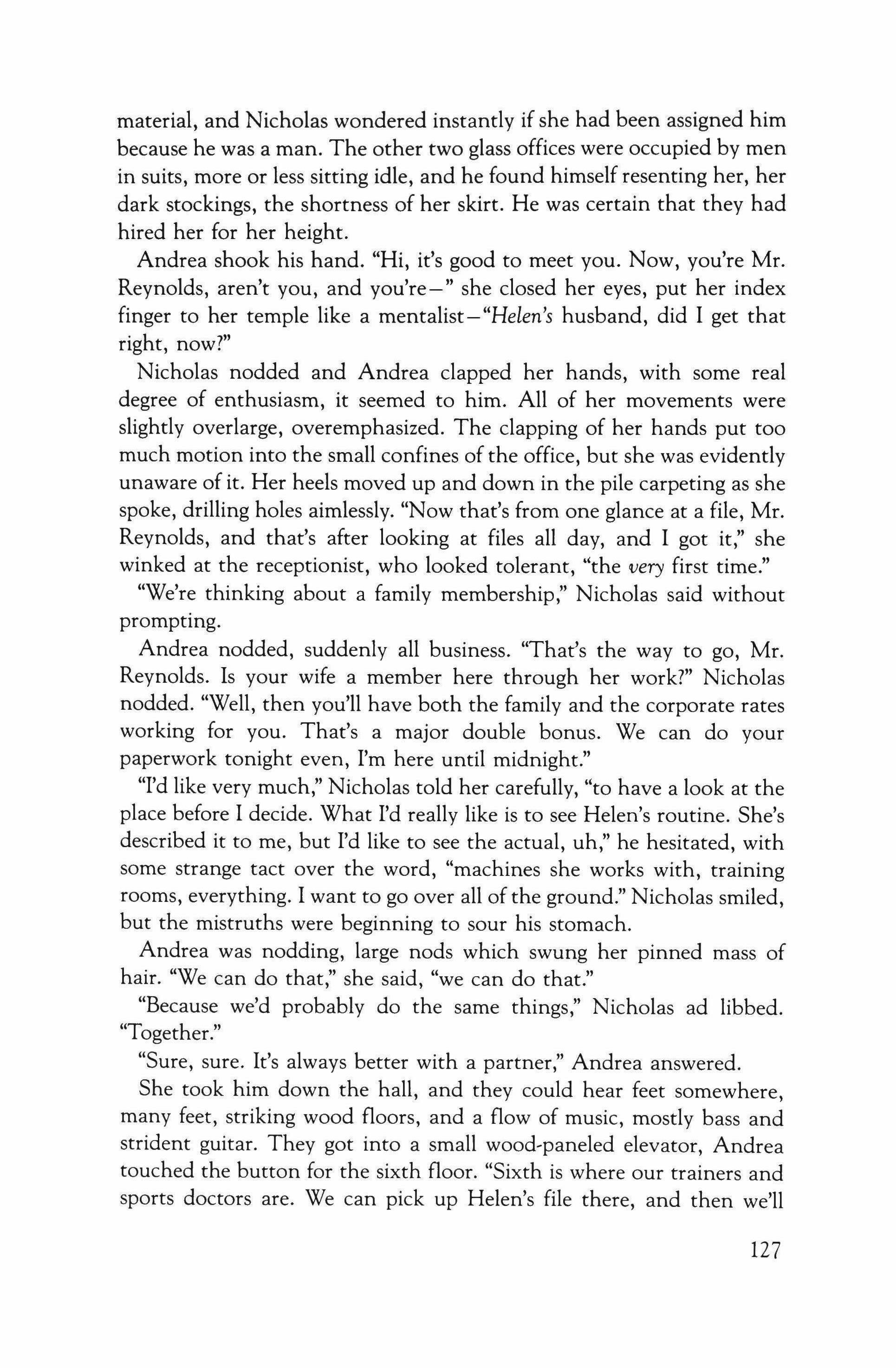
material, and Nicholas wondered instantly if she had been assigned him because he was a man. The other two glass offices were occupied by men in suits, more or less sitting idle, and he found himself resenting her, her dark stockings, the shortness of her skirt. He was certain that they had hired her for her height.
Andrea shook his hand. "Hi, it's good to meet you. Now, you're Mr. Reynolds, aren't you, and you're-" she closed her eyes, put her index finger to her temple like a mentalist - "Helen's husband, did I get that right, now?"
Nicholas nodded and Andrea clapped her hands, with some real degree of enthusiasm, it seemed to him. All of her movements were slightly overlarge, overemphasized. The clapping of her hands put too much motion into the small confines of the office, but she was evidently unaware of it. Her heels moved up and down in the pile carpeting as she spoke, drilling holes aimlessly. "Now that's from one glance at a file, Mr. Reynolds, and that's after looking at files all day, and I got it," she winked at the receptionist, who looked tolerant, "the very first time."
"We're thinking about a family membership," Nicholas said without prompting.
Andrea nodded, suddenly all business. "That's the way to go, Mr. Reynolds. Is your wife a member here through her work?" Nicholas nodded. "Well, then you'll have both the family and the corporate rates working for you. That's a major double bonus. We can do your paperwork tonight even, I'm here until midnight."
"I'd like very much," Nicholas told her carefully, "to have a look at the place before I decide. What I'd really like is to see Helen's routine. She's described it to me, but I'd like to see the actual, uh," he hesitated, with some strange tact over the word, "machines she works with, training rooms, everything. I want to go over all of the ground." Nicholas smiled, but the mistruths were beginning to sour his stomach.
Andrea was nodding, large nods which swung her pinned mass of hair. "We can do that," she said, "we can do that."
"Because we'd probably do the same things," Nicholas ad libbed. "Together."
"Sure, sure. It's always better with a partner," Andrea answered. She took him down the hall, and they could hear feet somewhere, many feet, striking wood floors, and a flow of music, mostly bass and strident guitar. They got into a small wood-paneled elevator, Andrea touched the button for the sixth floor. "Sixth is where our trainers and sports doctors are. We can pick up Helen's file there, and then we'll
127
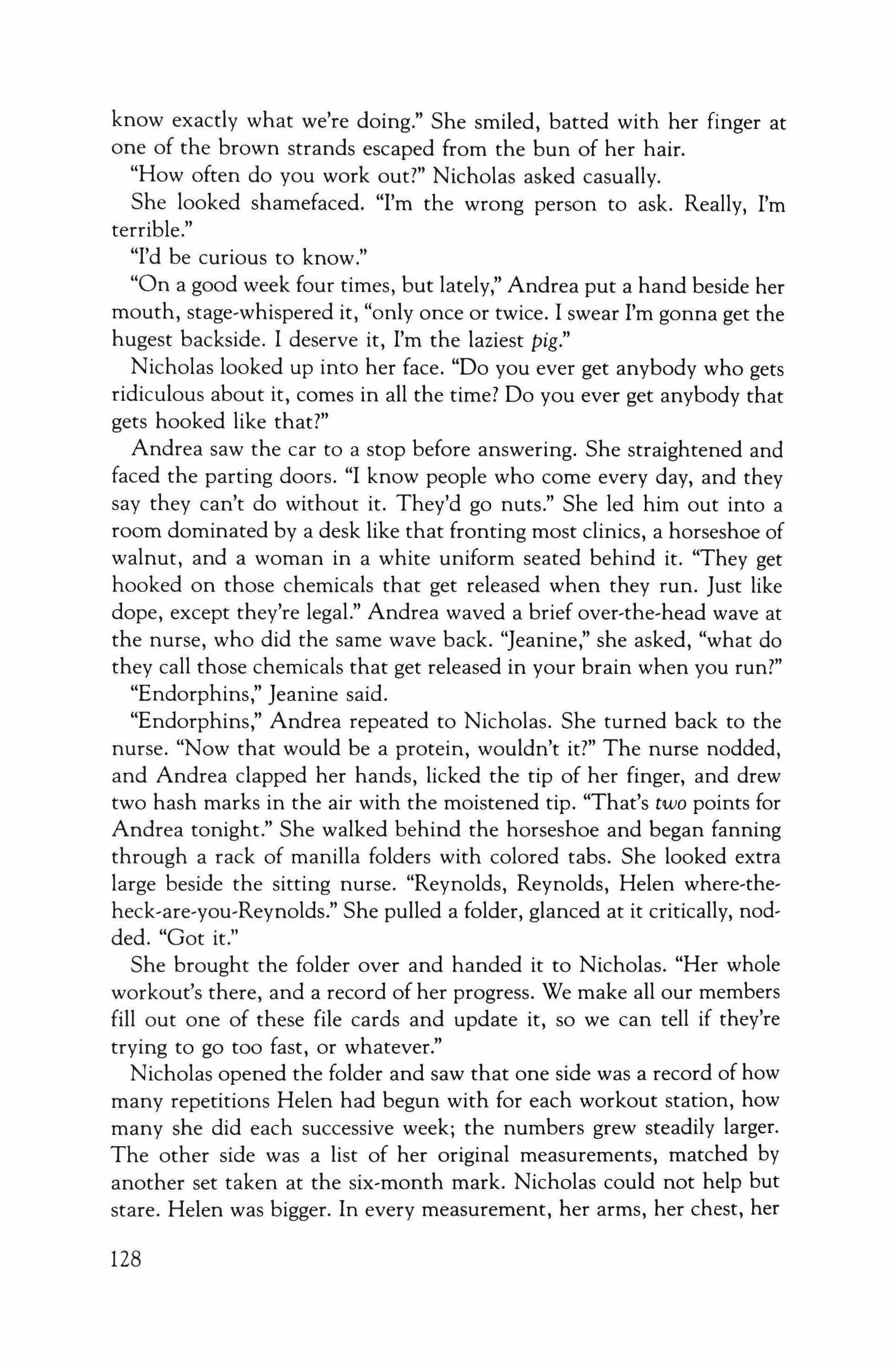
know exactly what we're doing." She smiled, batted with her finger at one of the brown strands escaped from the bun of her hair.
"How often do you work out?" Nicholas asked casually. She looked shamefaced. "I'm the wrong person to ask. Really, I'm terrible."
"I'd be curious to know."
"On a good week four times, but lately," Andrea put a hand beside her mouth, stage-whispered it, "only once or twice. I swear I'm gonna get the hugest backside. I deserve it, I'm the laziest pig."
Nicholas looked up into her face. "Do you ever get anybody who gets ridiculous about it, comes in all the time? Do you ever get anybody that gets hooked like that?"
Andrea saw the car to a stop before answering. She straightened and faced the parting doors. "I know people who come every day, and they say they can't do without it. They'd go nuts." She led him out into a room dominated by a desk like that fronting most clinics, a horseshoe of walnut, and a woman in a white uniform seated behind it. "They get hooked on those chemicals that get released when they run. Just like dope, except they're legal." Andrea waved a brief over-the-head wave at the nurse, who did the same wave back. "Jeanine," she asked, "what do they call those chemicals that get released in your brain when you run?"
"Endorphins," Jeanine said.
"Endorphins," Andrea repeated to Nicholas. She turned back to the nurse. "Now that would be a protein, wouldn't it?" The nurse nodded, and Andrea clapped her hands, licked the tip of her finger, and drew two hash marks in the air with the moistened tip. "That's two points for Andrea tonight." She walked behind the horseshoe and began fanning through a rack of manilla folders with colored tabs. She looked extra large beside the sitting nurse. "Reynolds, Reynolds, Helen where-theheck-are-you-Reynolds." She pulled a folder, glanced at it critically, nodded. "Got it."
She brought the folder over and handed it to Nicholas. "Her whole workout's there, and a record of her progress. We make all our members fill out one of these file cards and update it, so we can tell if they're trying to go too fast, or whatever."
Nicholas opened the folder and saw that one side was a record of how many repetitions Helen had begun with for each workout station, how many she did each successive week; the numbers grew steadily larger. The other side was a list of her original measurements, matched by another set taken at the six-month mark. Nicholas could not help but stare. Helen was bigger. In every measurement, her arms, her chest, her
128
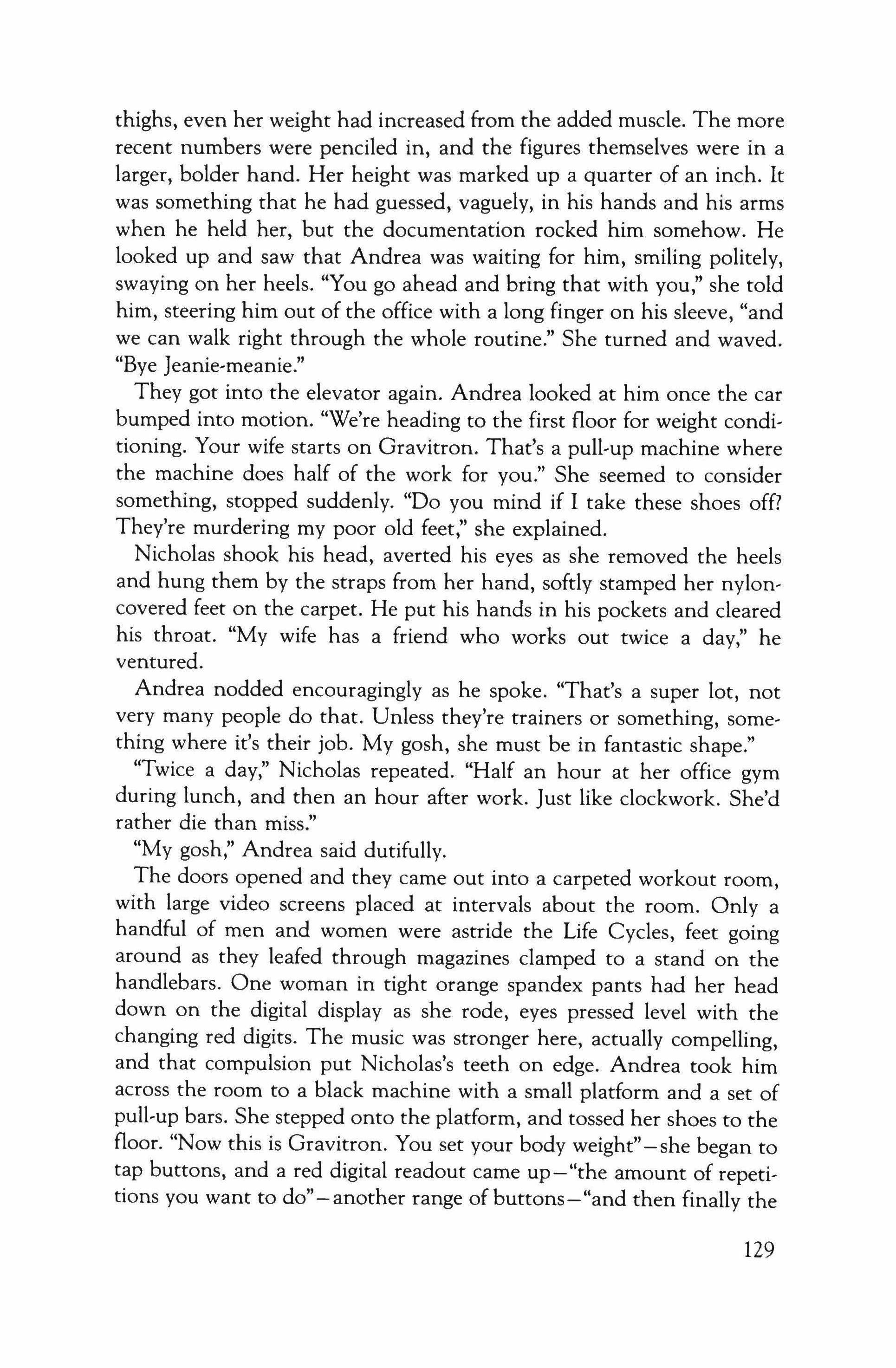
thighs, even her weight had increased from the added muscle. The more recent numbers were penciled in, and the figures themselves were in a larger, bolder hand. Her height was marked up a quarter of an inch. It was something that he had guessed, vaguely, in his hands and his arms when he held her, but the documentation rocked him somehow. He looked up and saw that Andrea was waiting for him, smiling politely, swaying on her heels. "You go ahead and bring that with you," she told him, steering him out of the office with a long finger on his sleeve, "and we can walk right through the whole routine." She turned and waved. "Bye [eanie-rneanie."
They got into the elevator again. Andrea looked at him once the car bumped into motion. "We're heading to the first floor for weight conditioning. Your wife starts on Gravitron. That's a pull-up machine where the machine does half of the work for you." She seemed to consider something, stopped suddenly. "Do you mind if I take these shoes off? They're murdering my poor old feet," she explained.
Nicholas shook his head, averted his eyes as she removed the heels and hung them by the straps from her hand, softly stamped her nyloncovered feet on the carpet. He put his hands in his pockets and cleared his throat. "My wife has a friend who works out twice a day," he ventured.
Andrea nodded encouragingly as he spoke. "That's a super lot, not very many people do that. Unless they're trainers or something, something where it's their job. My gosh, she must be in fantastic shape."
"Twice a day," Nicholas repeated. "Half an hour at her office gym during lunch, and then an hour after work. Just like clockwork. She'd rather die than miss."
"My gosh," Andrea said dutifully.
The doors opened and they came out into a carpeted workout room, with large video screens placed at intervals about the room. Only a handful of men and women were astride the Life Cycles, feet going around as they leafed through magazines clamped to a stand on the handlebars. One woman in tight orange spandex pants had her head down on the digital display as she rode, eyes pressed level with the changing red digits. The music was stronger here, actually compelling, and that compulsion put Nicholas's teeth on edge. Andrea took him across the room to a black machine with a small platform and a set of pull-up bars. She stepped onto the platform, and tossed her shoes to the floor. "Now this is Gravitron. You set your body weight" - she began to tap buttons, and a red digital readout came up-"the amount of repetitions you want to do" - another range of buttons - "and then finally the
129
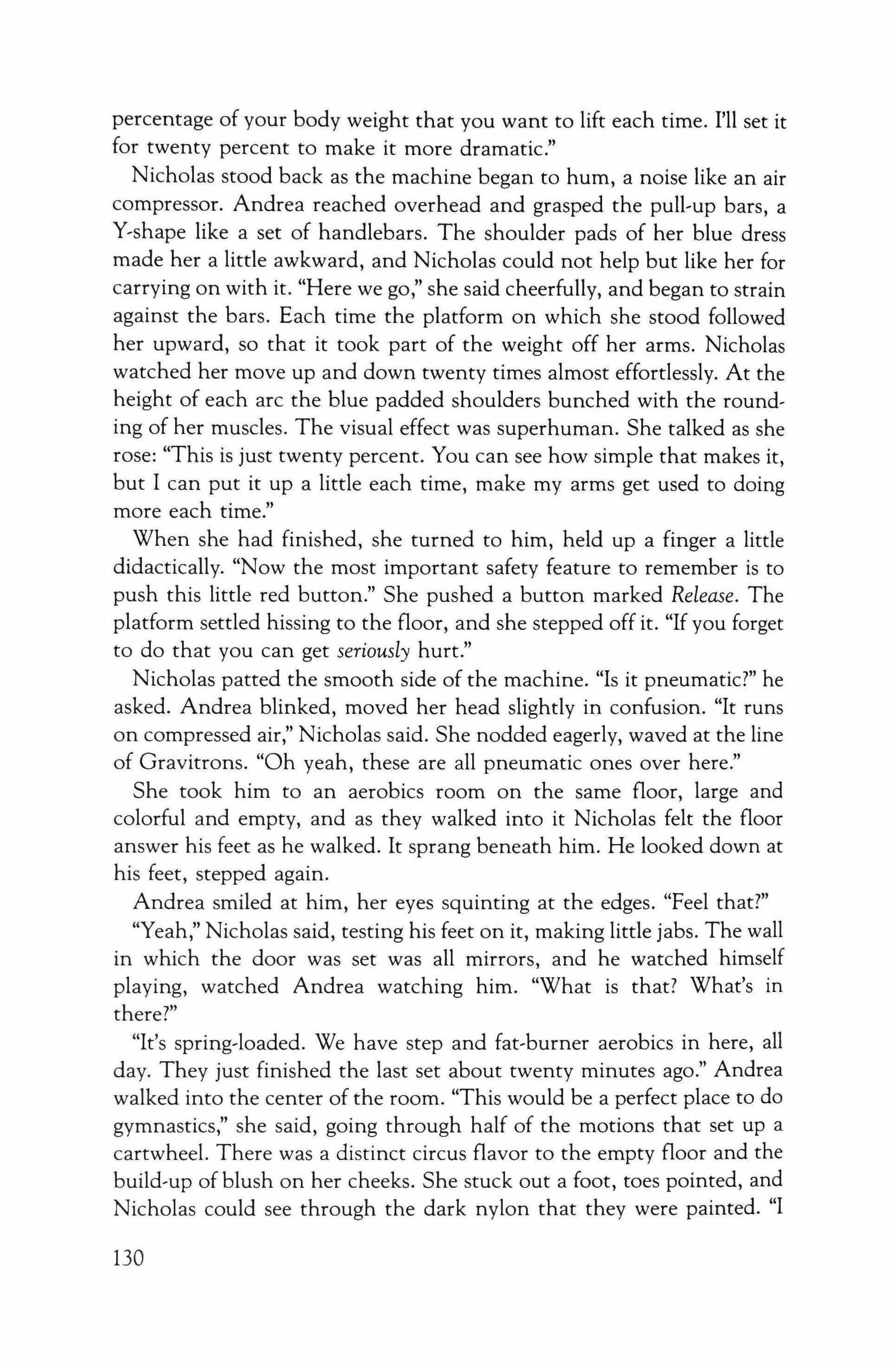
percentage of your body weight that you want to lift each time. I'll set it for twenty percent to make it more dramatic."
Nicholas stood back as the machine began to hum, a noise like an air compressor. Andrea reached overhead and grasped the pull-up bars, a Yshape like a set of handlebars. The shoulder pads of her blue dress made her a little awkward, and Nicholas could not help but like her for carrying on with it. "Here we go," she said cheerfully, and began to strain against the bars. Each time the platform on which she stood followed her upward, so that it took part of the weight off her arms. Nicholas watched her move up and down twenty times almost effortlessly. At the height of each arc the blue padded shoulders bunched with the round, ing of her muscles. The visual effect was superhuman. She talked as she rose: "This is just twenty percent. You can see how simple that makes it, but I can put it up a little each time, make my arms get used to doing more each time."
When she had finished, she turned to him, held up a finger a little didactically. "Now the most important safety feature to remember is to push this little red button." She pushed a button marked Release. The platform settled hissing to the floor, and she stepped off it. "If you forget to do that you can get seriously hurt."
Nicholas patted the smooth side of the machine. "Is it pneumatic?" he asked. Andrea blinked, moved her head slightly in confusion. "It runs on compressed air," Nicholas said. She nodded eagerly, waved at the line of Gravitrons. "Oh yeah, these are all pneumatic ones over here."
She took him to an aerobics room on the same floor, large and colorful and empty, and as they walked into it Nicholas felt the floor answer his feet as he walked. It sprang beneath him. He looked down at his feet, stepped again.
Andrea smiled at him, her eyes squinting at the edges. "Feel that?"
"Yeah," Nicholas said, testing his feet on it, making little jabs. The wall in which the door was set was all mirrors, and he watched himself playing, watched Andrea watching him. "What is that? What's in there?"
"It's spring-loaded. We have step and fat-burner aerobics in here, all day. They just finished the last set about twenty minutes ago." Andrea walked into the center of the room. "This would be a perfect place to do gymnastics," she said, going through half of the motions that set up a cartwheel. There was a distinct circus flavor to the empty floor and the build-up of blush on her cheeks. She stuck out a foot, toes pointed, and Nicholas could see through the dark nylon that they were painted. "I
130
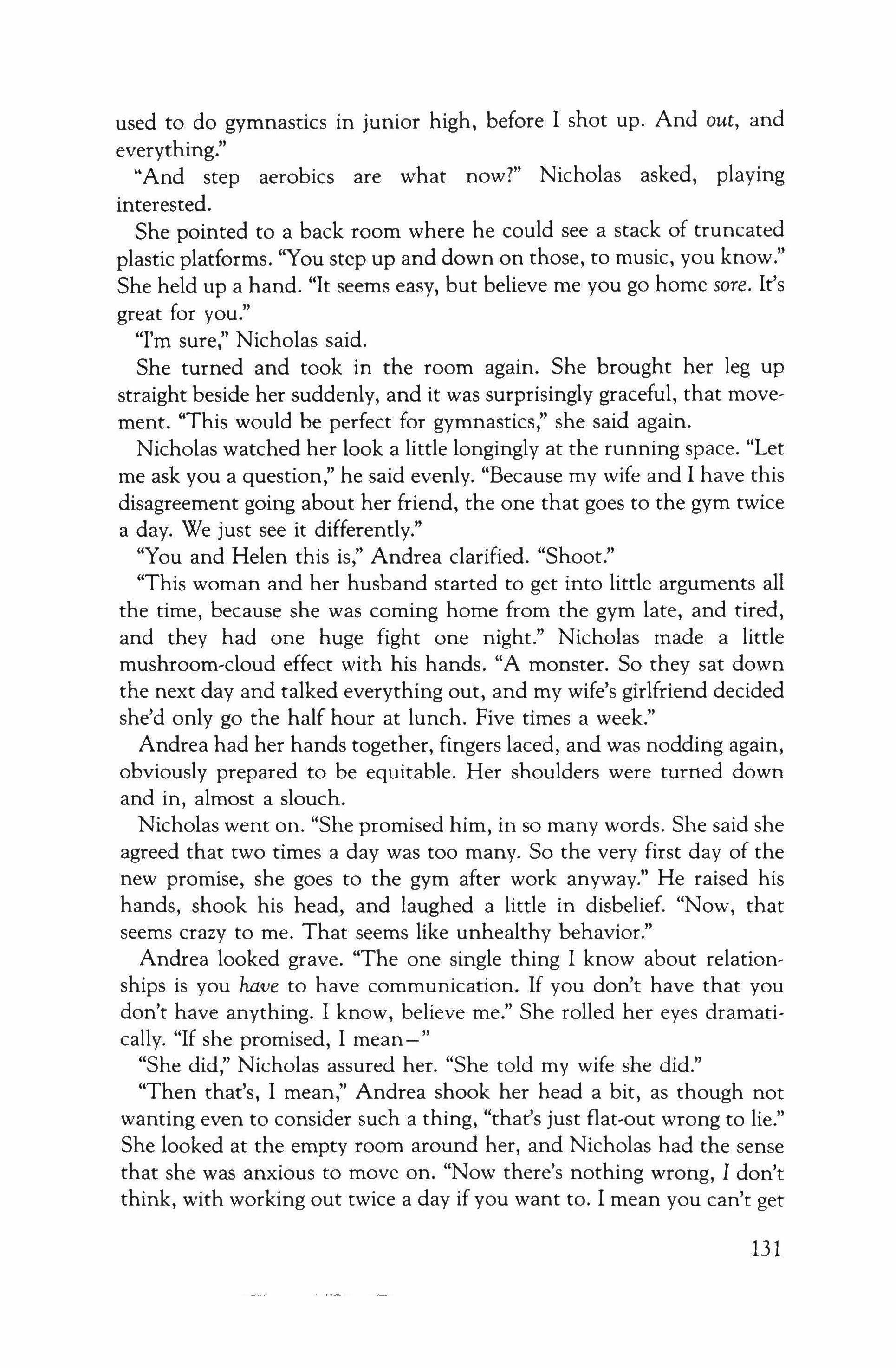
used to do gymnastics in junior high, before I shot up. And out, and everything."
"And step aerobics are what now?" Nicholas asked, playing interested.
She pointed to a back room where he could see a stack of truncated plastic platforms. "You step up and down on those, to music, you know." She held up a hand. lilt seems easy, but believe me you go home sore. It's great for you."
"I'm sure:' Nicholas said.
She turned and took in the room again. She brought her leg up straight beside her suddenly, and it was surprisingly graceful, that movement. "This would be perfect for gymnastics," she said again.
Nicholas watched her look a little longingly at the running space. "Let me ask you a question," he said evenly. "Because my wife and I have this disagreement going about her friend, the one that goes to the gym twice a day. We just see it differently."
"You and Helen this is," Andrea clarified. "Shoot."
"This woman and her husband started to get into little arguments all the time, because she was coming home from the gym late, and tired, and they had one huge fight one night." Nicholas made a little mushroom-cloud effect with his hands. "A monster. So they sat down the next day and talked everything out, and my wife's girlfriend decided she'd only go the half hour at lunch. Five times a week."
Andrea had her hands together, fingers laced, and was nodding again, obviously prepared to be equitable. Her shoulders were turned down and in, almost a slouch.
Nicholas went on. "She promised him, in so many words. She said she agreed that two times a day was too many. So the very first day of the new promise, she goes to the gym after work anyway." He raised his hands, shook his head, and laughed a little in disbelief. "Now, that seems crazy to me. That seems like unhealthy behavior."
Andrea looked grave. "The one single thing I know about relationships is you have to have communication. If you don't have that you don't have anything. I know, believe me." She rolled her eyes dramatically. "If she promised, I mean -"
"She did:' Nicholas assured her. "She told my wife she did."
"Then that's, I mean," Andrea shook her head a bit, as though not wanting even to consider such a thing, "that's just flat-out wrong to lie." She looked at the empty room around her, and Nicholas had the sense that she was anxious to move on. "Now there's nothing wrong, I don't think, with working out twice a day if you want to. I mean you can't get
131
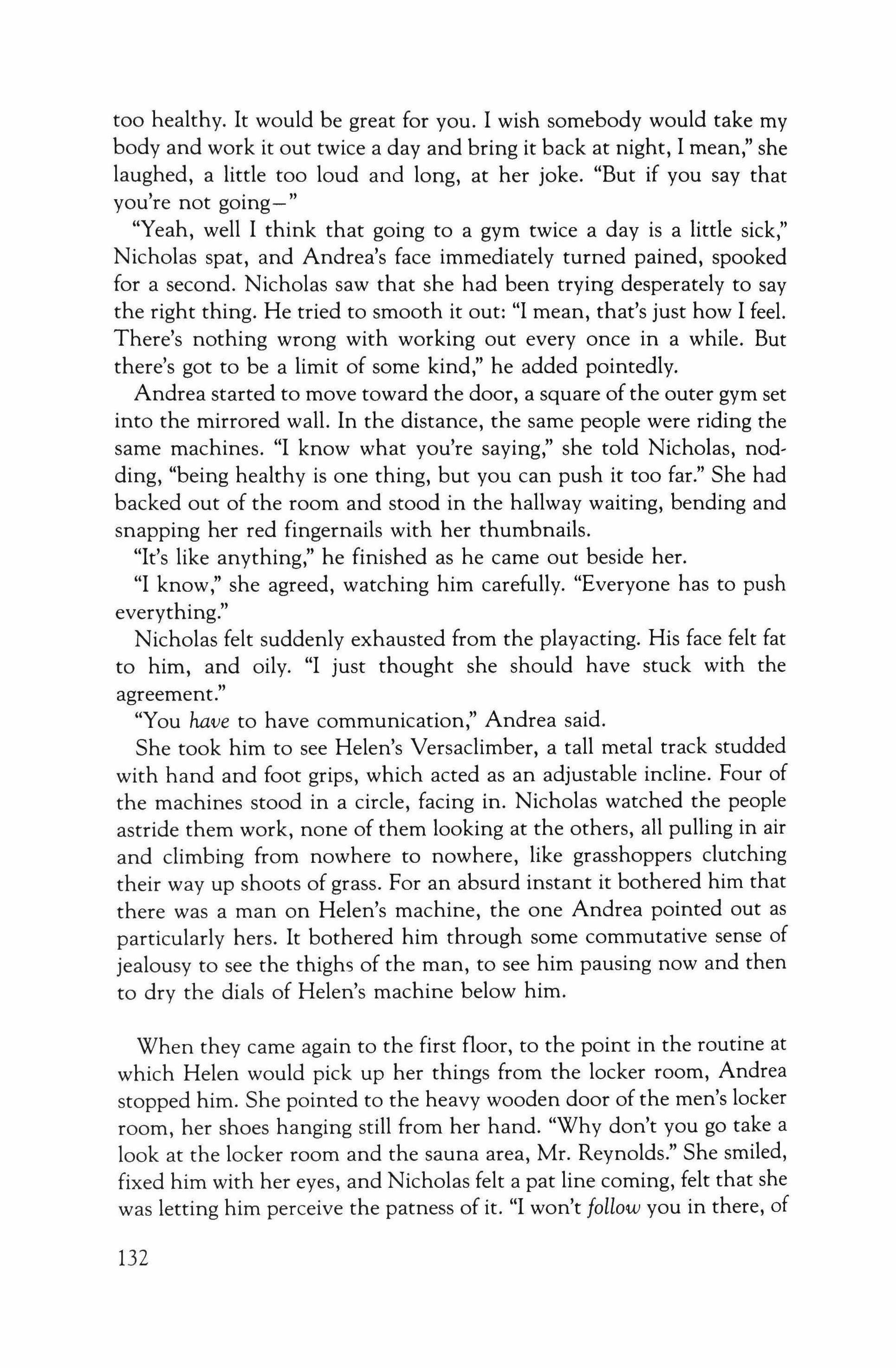
too healthy. It would be great for you. 1 wish somebody would take my body and work it out twice a day and bring it back at night, 1 mean," she laughed, a little too loud and long, at her joke. "But if you say that you're not going-"
"Yeah, well 1 think that going to a gym twice a day is a little sick," Nicholas spat, and Andrea's face immediately turned pained, spooked for a second. Nicholas saw that she had been trying desperately to say the right thing. He tried to smooth it out: "1 mean, that's just how 1 feel. There's nothing wrong with working out every once in a while. But there's got to be a limit of some kind," he added pointedly.
Andrea started to move toward the door, a square of the outer gym set into the mirrored wall. In the distance, the same people were riding the same machines. "I know what you're saying," she told Nicholas, nodding, "being healthy is one thing, but you can push it too far." She had backed out of the room and stood in the hallway waiting, bending and snapping her red fingernails with her thumbnails.
"It's like anything," he finished as he came out beside her.
"1 know," she agreed, watching him carefully. "Everyone has to push everything."
Nicholas felt suddenly exhausted from the playacting. His face felt fat to him, and oily. "1 just thought she should have stuck with the agreement."
"You have to have communication," Andrea said.
She took him to see Helen's Versaclimber, a tall metal track studded with hand and foot grips, which acted as an adjustable incline. Four of the machines stood in a circle, facing in. Nicholas watched the people astride them work, none of them looking at the others, all pulling in air and climbing from nowhere to nowhere, like grasshoppers clutching their way up shoots of grass. For an absurd instant it bothered him that there was a man on Helen's machine, the one Andrea pointed out as particularly hers. It bothered him through some commutative sense of jealousy to see the thighs of the man, to see him pausing now and then to dry the dials of Helen's machine below him.
When they came again to the first floor, to the point in the routine at which Helen would pick up her things from the locker room, Andrea stopped him. She pointed to the heavy wooden door of the men's locker room, her shoes hanging still from her hand. "Why don't you go take a look at the locker room and the sauna area, Mr. Reynolds." She smiled, fixed him with her eyes, and Nicholas felt a pat line coming, felt that she was letting him perceive the patness of it. "I won't follow you in there, of
132
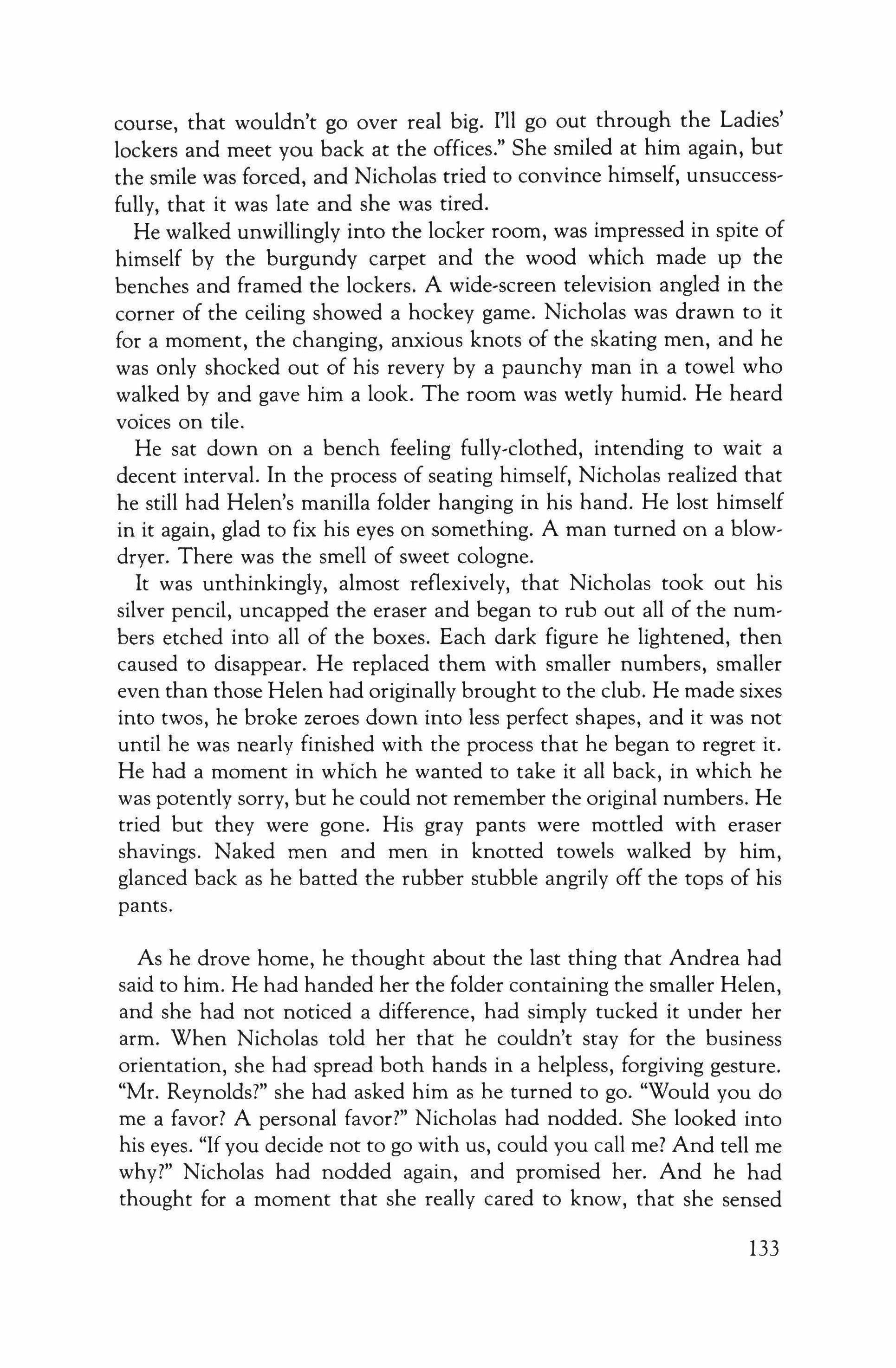
course, that wouldn't go over real big. I'll go out through the Ladies' lockers and meet you back at the offices." She smiled at him again, but the smile was forced, and Nicholas tried to convince himself, unsuccessfully, that it was late and she was tired.
He walked unwillingly into the locker room, was impressed in spite of himself by the burgundy carpet and the wood which made up the benches and framed the lockers. A wide-screen television angled in the corner of the ceiling showed a hockey game. Nicholas was drawn to it for a moment, the changing, anxious knots of the skating men, and he was only shocked out of his revery by a paunchy man in a towel who walked by and gave him a look. The room was wetly humid. He heard voices on tile.
He sat down on a bench feeling fully-clothed, intending to wait a decent interval. In the process of seating himself, Nicholas realized that he still had Helen's manilla folder hanging in his hand. He lost himself in it again, glad to fix his eyes on something. A man turned on a blowdryer. There was the smell of sweet cologne.
It was unthinkingly, almost reflexively, that Nicholas took out his silver pencil, uncapped the eraser and began to rub out all of the numbers etched into all of the boxes. Each dark figure he lightened, then caused to disappear. He replaced them with smaller numbers, smaller even than those Helen had originally brought to the club. He made sixes into twos, he broke zeroes down into less perfect shapes, and it was not until he was nearly finished with the process that he began to regret it. He had a moment in which he wanted to take it all back, in which he was potently sorry, but he could not remember the original numbers. He tried but they were gone. His gray pants were mottled with eraser shavings. Naked men and men in knotted towels walked by him, glanced back as he batted the rubber stubble angrily off the tops of his pants.
As he drove home, he thought about the last thing that Andrea had said to him. He had handed her the folder containing the smaller Helen, and she had not noticed a difference, had simply tucked it under her arm. When Nicholas told her that he couldn't stay for the business orientation, she had spread both hands in a helpless, forgiving gesture. "Mr. Reynolds?" she had asked him as he turned to go. "Would you do me a favor? A personal favor?" Nicholas had nodded. She looked into his eyes. "If you decide not to go with us, could you call me? And tell me why?" Nicholas had nodded again, and promised her. And he had thought for a moment that she really cared to know, that she sensed
133
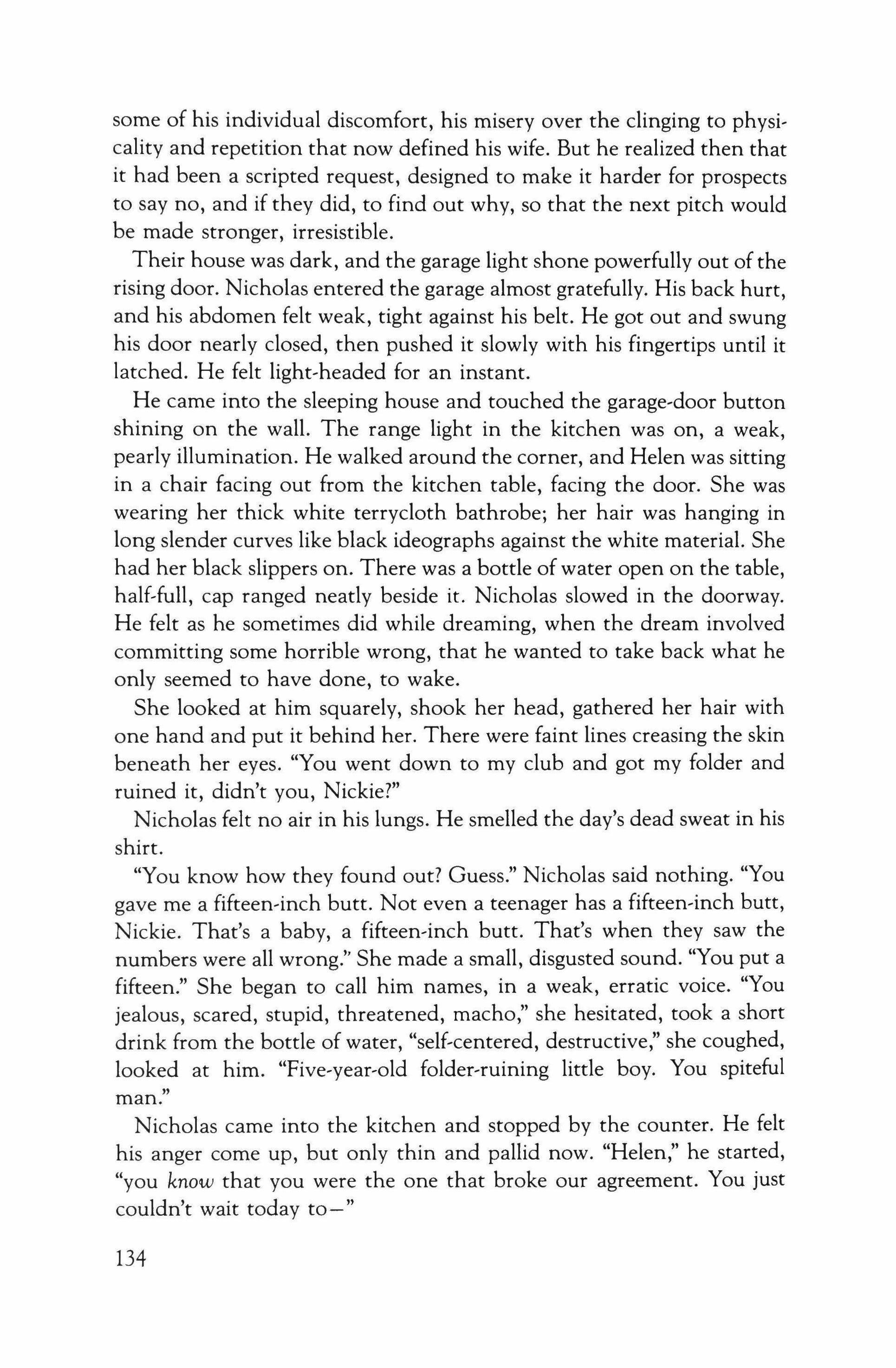
some of his individual discomfort, his misery over the clinging to physicality and repetition that now defined his wife. But he realized then that it had been a scripted request, designed to make it harder for prospects to say no, and if they did, to find out why, so that the next pitch would be made stronger, irresistible.
Their house was dark, and the garage light shone powerfully out of the rising door. Nicholas entered the garage almost gratefully. His back hurt, and his abdomen felt weak, tight against his belt. He got out and swung his door nearly closed, then pushed it slowly with his fingertips until it latched. He felt light-headed for an instant.
He came into the sleeping house and touched the garage-door button shining on the wall. The range light in the kitchen was on, a weak, pearly illumination. He walked around the corner, and Helen was sitting in a chair facing out from the kitchen table, facing the door. She was wearing her thick white terrycloth bathrobe; her hair was hanging in long slender curves like black ideographs against the white material. She had her black slippers on. There was a bottle of water open on the table, half-full, cap ranged neatly beside it. Nicholas slowed in the doorway. He felt as he sometimes did while dreaming, when the dream involved committing some horrible wrong, that he wanted to take back what he only seemed to have done, to wake.
She looked at him squarely, shook her head, gathered her hair with one hand and put it behind her. There were faint lines creasing the skin beneath her eyes. "You went down to my club and got my folder and ruined it, didn't you, Nickie?"
Nicholas felt no air in his lungs. He smelled the day's dead sweat in his shirt.
"You know how they found out? Guess." Nicholas said nothing. "You gave me a fifteen-inch butt. Not even a teenager has a fifteen-inch butt, Nickie. That's a baby, a fifteen-inch butt. That's when they saw the numbers were all wrong." She made a small, disgusted sound. "You put a fifteen." She began to call him names, in a weak, erratic voice. "You jealous, scared, stupid, threatened, macho," she hesitated, took a short drink from the bottle of water, "self-centered, destructive," she coughed, looked at him. "Five-year-old folder-ruining little boy. You spiteful man.
Nicholas came into the kitchen and stopped by the counter. He felt his anger come up, but only thin and pallid now. "Helen," he started, "you know that you were the one that broke our agreement. You just couldn't wait today to-"
134
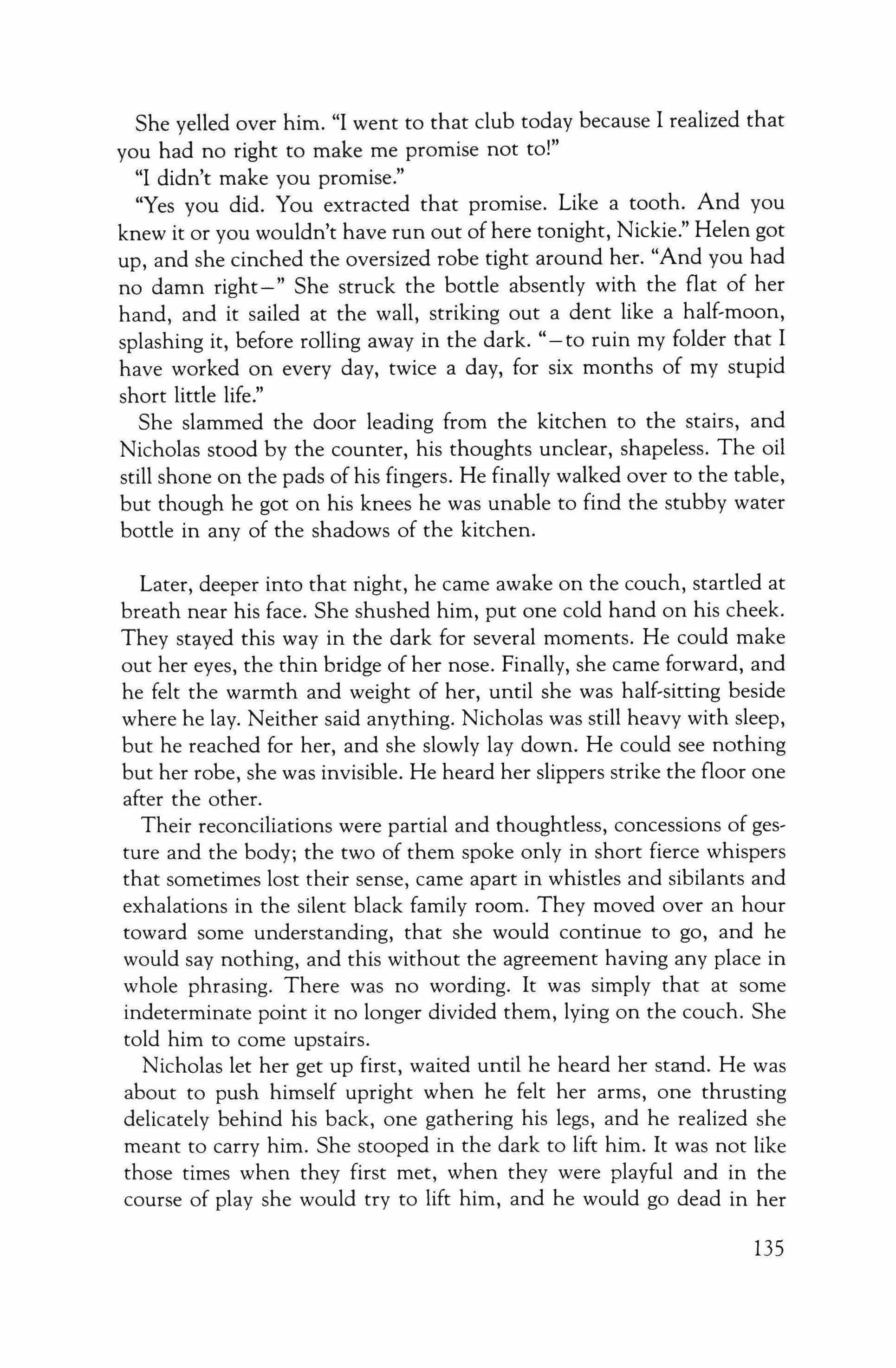
She yelled over him. "I went to that club today because I realized that you had no right to make me promise not to!"
"I didn't make you promise."
"Yes you did. You extracted that promise. Like a tooth. And you knew it or you wouldn't have run out of here tonight, Nickie." Helen got up, and she cinched the oversized robe tight around her. "And you had no damn right-" She struck the bottle absently with the flat of her hand, and it sailed at the wall, striking out a dent like a half-moon, splashing it, before rolling away in the dark. "-to ruin my folder that I have worked on every day, twice a day, for six months of my stupid short little life."
She slammed the door leading from the kitchen to the stairs, and Nicholas stood by the counter, his thoughts unclear, shapeless. The oil still shone on the pads of his fingers. He finally walked over to the table, but though he got on his knees he was unable to find the stubby water bottle in any of the shadows of the kitchen.
Later, deeper into that night, he came awake on the couch, startled at breath near his face. She shushed him, put one cold hand on his cheek. They stayed this way in the dark for several moments. He could make out her eyes, the thin bridge of her nose. Finally, she came forward, and he felt the warmth and weight of her, until she was half-sitting beside where he lay. Neither said anything. Nicholas was still heavy with sleep, but he reached for her, and she slowly lay down. He could see nothing but her robe, she was invisible. He heard her slippers strike the floor one after the other.
Their reconciliations were partial and thoughtless, concessions of gesture and the body; the two of them spoke only in short fierce whispers that sometimes lost their sense, came apart in whistles and sibilants and exhalations in the silent black family room. They moved over an hour toward some understanding, that she would continue to go, and he would say nothing, and this without the agreement having any place in whole phrasing. There was no wording. It was simply that at some indeterminate point it no longer divided them, lying on the couch. She told him to come upstairs.
Nicholas let her get up first, waited until he heard her stand. He was about to push himself upright when he felt her arms, one thrusting delicately behind his back, one gathering his legs, and he realized she meant to carry him. She stooped in the dark to lift him. It was not like those times when they first met, when they were playful and in the course of play she would try to lift him, and he would go dead in her
135
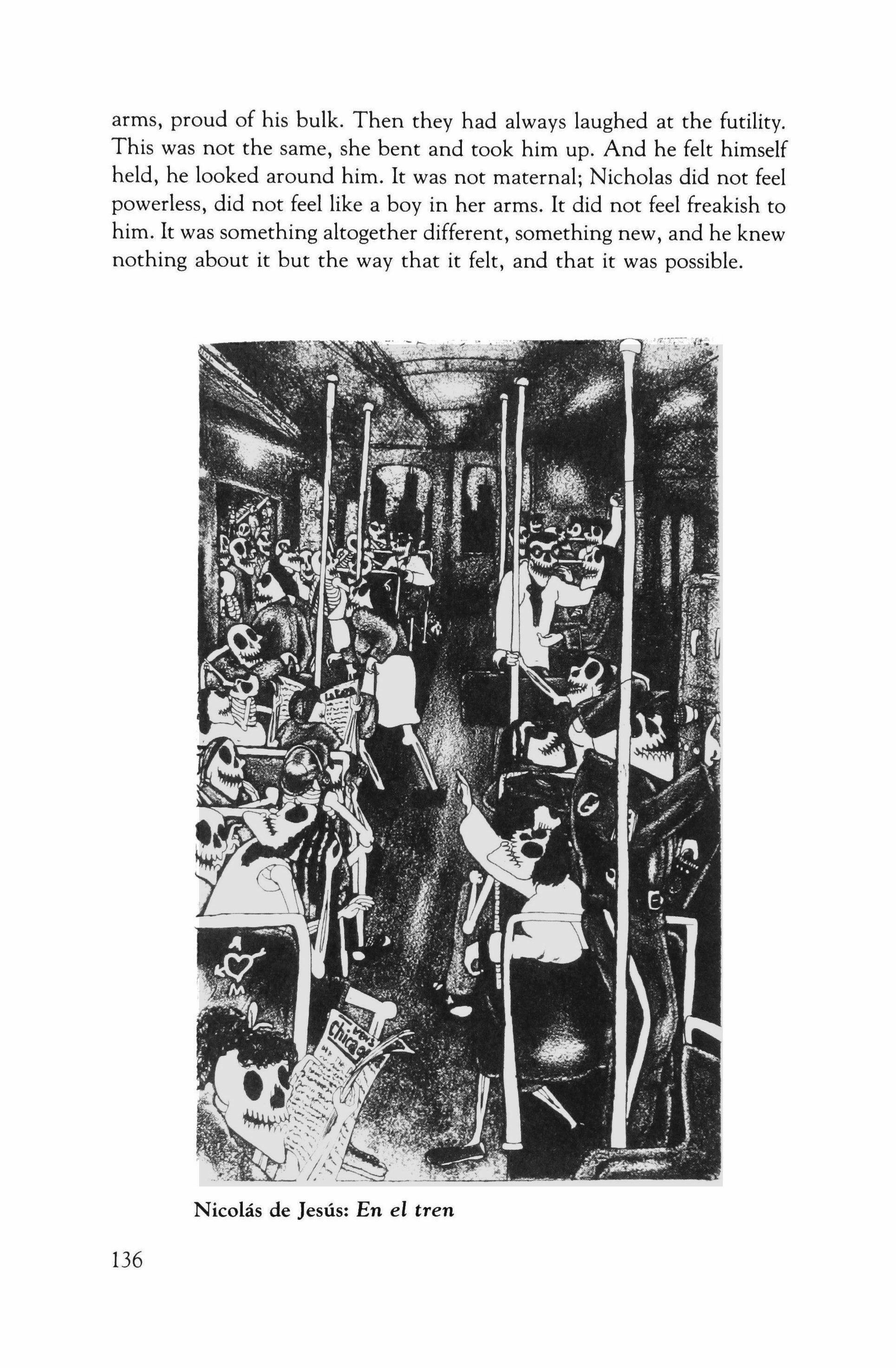
arms, proud of his bulk. Then they had always laughed at the futility. This was not the same, she bent and took him up. And he felt himself held, he looked around him. It was not maternal; Nicholas did not feel powerless, did not feel like a boy in her arms. It did not feel freakish to him. It was something altogether different, something new, and he knew nothing about it but the way that it felt, and that it was possible.
136
Nicolas de Jesus: En el tren
Theng
Susan Onthank Mates
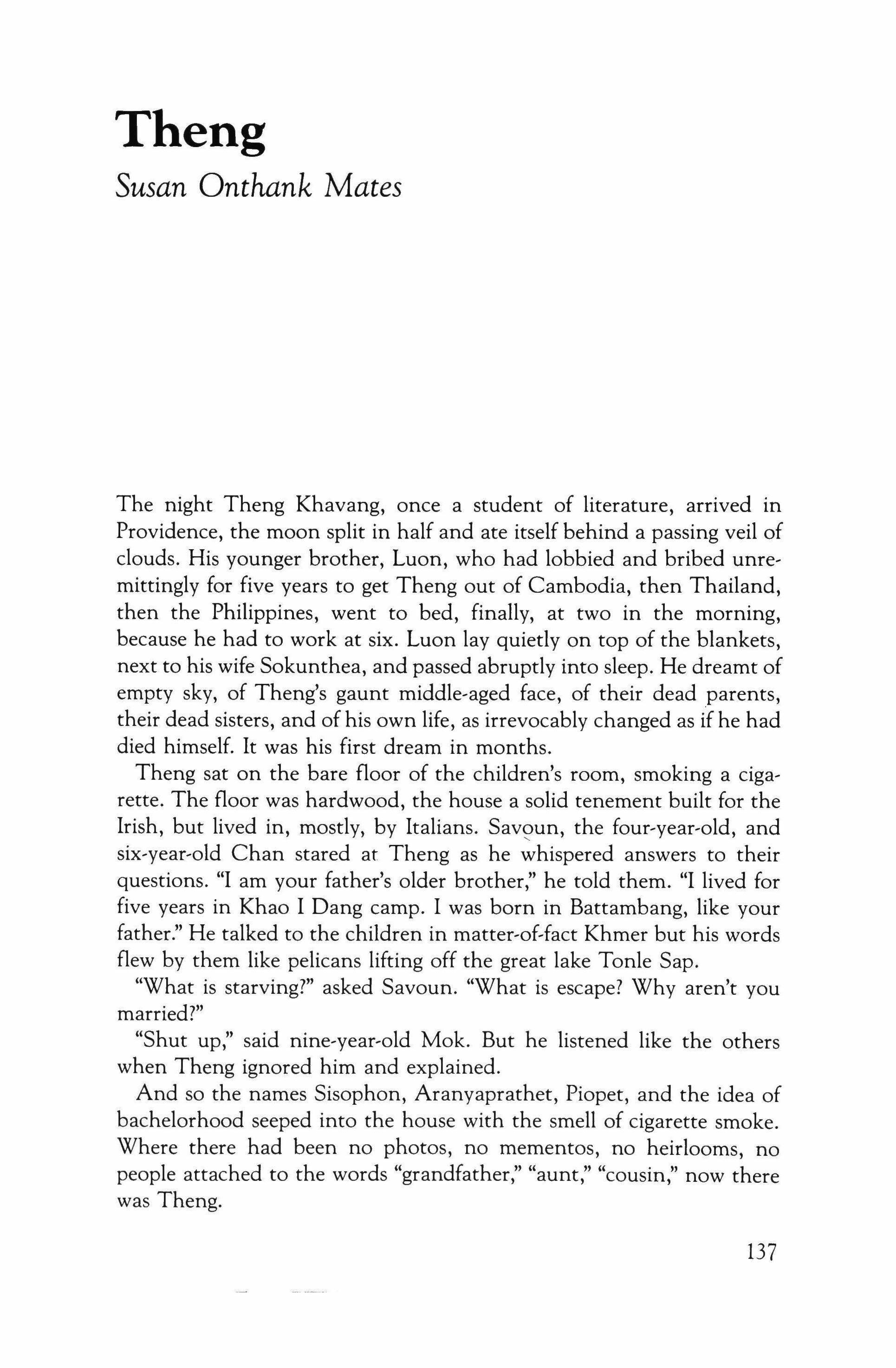
The night Theng Khavang, once a student of literature, arrived in Providence, the moon split in half and ate itself behind a passing veil of clouds. His younger brother, Luon, who had lobbied and bribed unremittingly for five years to get Theng out of Cambodia, then Thailand, then the Philippines, went to bed, finally, at two in the morning, because he had to work at six. Luon lay quietly on top of the blankets, next to his wife Sokunthea, and passed abruptly into sleep. He dreamt of empty sky, of Theng's gaunt middle-aged face, of their dead parents, their dead sisters, and of his own life, as irrevocably changed as if he had died himself. It was his first dream in months.
Theng sat on the bare floor of the children's room, smoking a cigarette. The floor was hardwood, the house a solid tenement built for the Irish, but lived in, mostly, by Italians. Savoun, the four-year-old, and six-year-old Chan stared at Theng as he whispered answers to their questions. "I am your father's older brother," he told them. "I lived for five years in Khao I Dang camp. I was born in Battambang, like your father." He talked to the children in matter-of-fact Khmer but his words flew by them like pelicans lifting off the great lake Tonie Sap.
"What is starving?" asked Savoun. "What is escape? Why aren't you married?"
"Shut up," said nine-year-old Mok. But he listened like the others when Theng ignored him and explained.
And so the names Sisophon, Aranyaprathet, Piopet, and the idea of bachelorhood seeped into the house with the smell of cigarette smoke. Where there had been no photos, no mementos, no heirlooms, no people attached to the words "grandfather," "aunt," "cousin," now there was Theng.
137
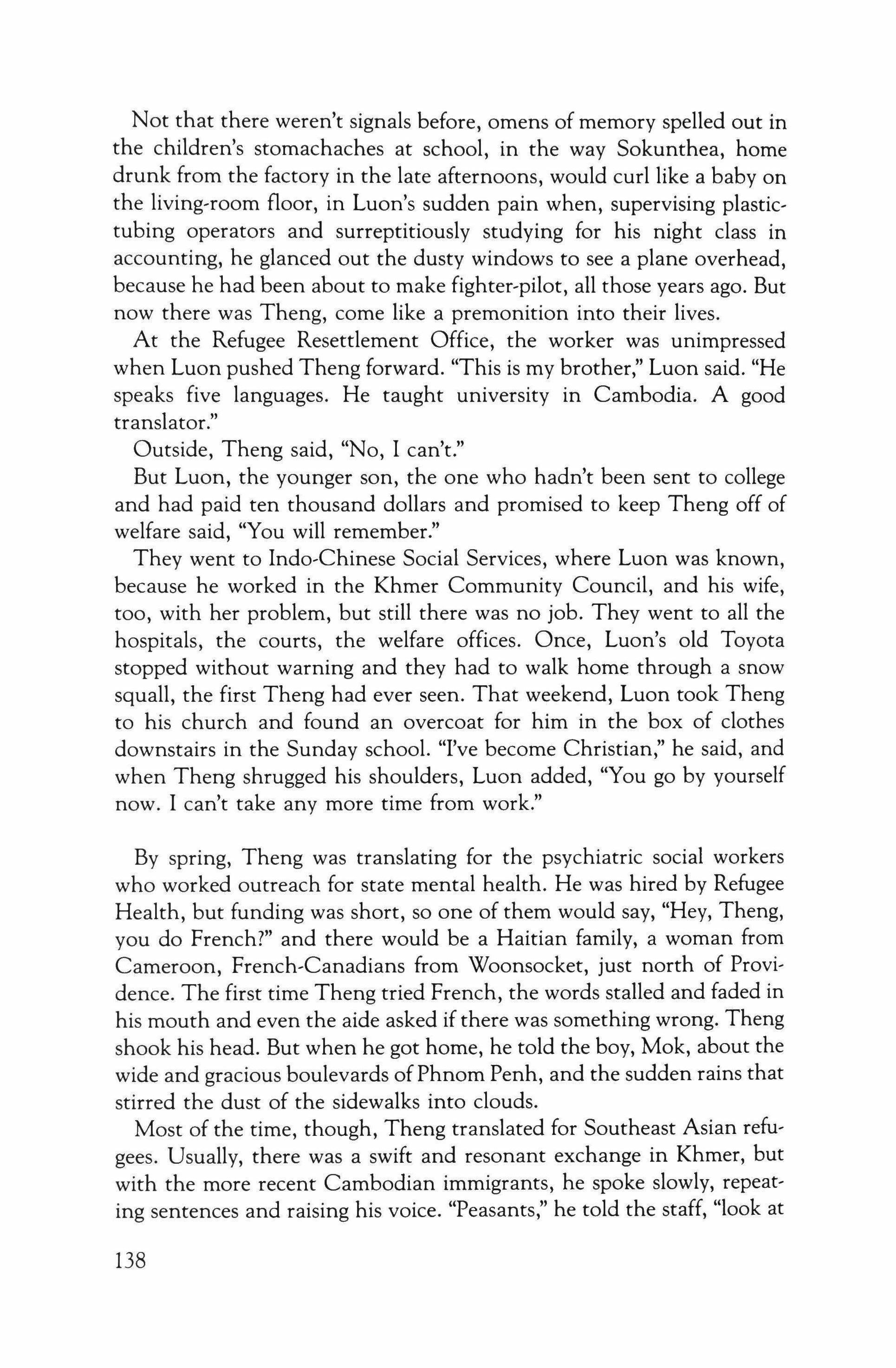
Not that there weren't signals before, omens of memory spelled out in the children's stomachaches at school, in the way Sokunthea, home drunk from the factory in the late afternoons, would curl like a baby on the living-room floor, in Luon's sudden pain when, supervising plastictubing operators and surreptitiously studying for his night class in accounting, he glanced out the dusty windows to see a plane overhead, because he had been about to make fighter-pilot, all those years ago. But now there was Theng, come like a premonition into their lives.
At the Refugee Resettlement Office, the worker was unimpressed when Luon pushed Theng forward. "This is my brother," Luon said. "He speaks five languages. He taught university in Cambodia. A good translator."
Outside, Theng said, "No, I can't."
But Luon, the younger son, the one who hadn't been sent to college and had paid ten thousand dollars and promised to keep Theng off of welfare said, "You will remember."
They went to Indo-Chinese Social Services, where Luon was known, because he worked in the Khmer Community Council, and his wife, too, with her problem, but still there was no job. They went to all the hospitals, the courts, the welfare offices. Once, Luon's old Toyota stopped without warning and they had to walk home through a snow squall, the first Theng had ever seen. That weekend, Luon took Theng to his church and found an overcoat for him in the box of clothes downstairs in the Sunday school. "I've become Christian," he said, and when Theng shrugged his shoulders, Luon added, "You go by yourself now. I can't take any more time from work."
By spring, Theng was translating for the psychiatric social workers who worked outreach for state mental health. He was hired by Refugee Health, but funding was short, so one of them would say, "Hey, Theng, you do French?" and there would be a Haitian family, a woman from Cameroon, French-Canadians from Woonsocket, just north of Providence. The first time Theng tried French, the words stalled and faded in his mouth and even the aide asked if there was something wrong. Theng shook his head. But when he got home, he told the boy, Mok, about the wide and gracious boulevards of Phnom Penh, and the sudden rains that stirred the dust of the sidewalks into clouds.
Most of the time, though, Theng translated for Southeast Asian refugees. Usually, there was a swift and resonant exchange in Khmer, but with the more recent Cambodian immigrants, he spoke slowly, repeating sentences and raising his voice. "Peasants," he told the staff, "look at
138
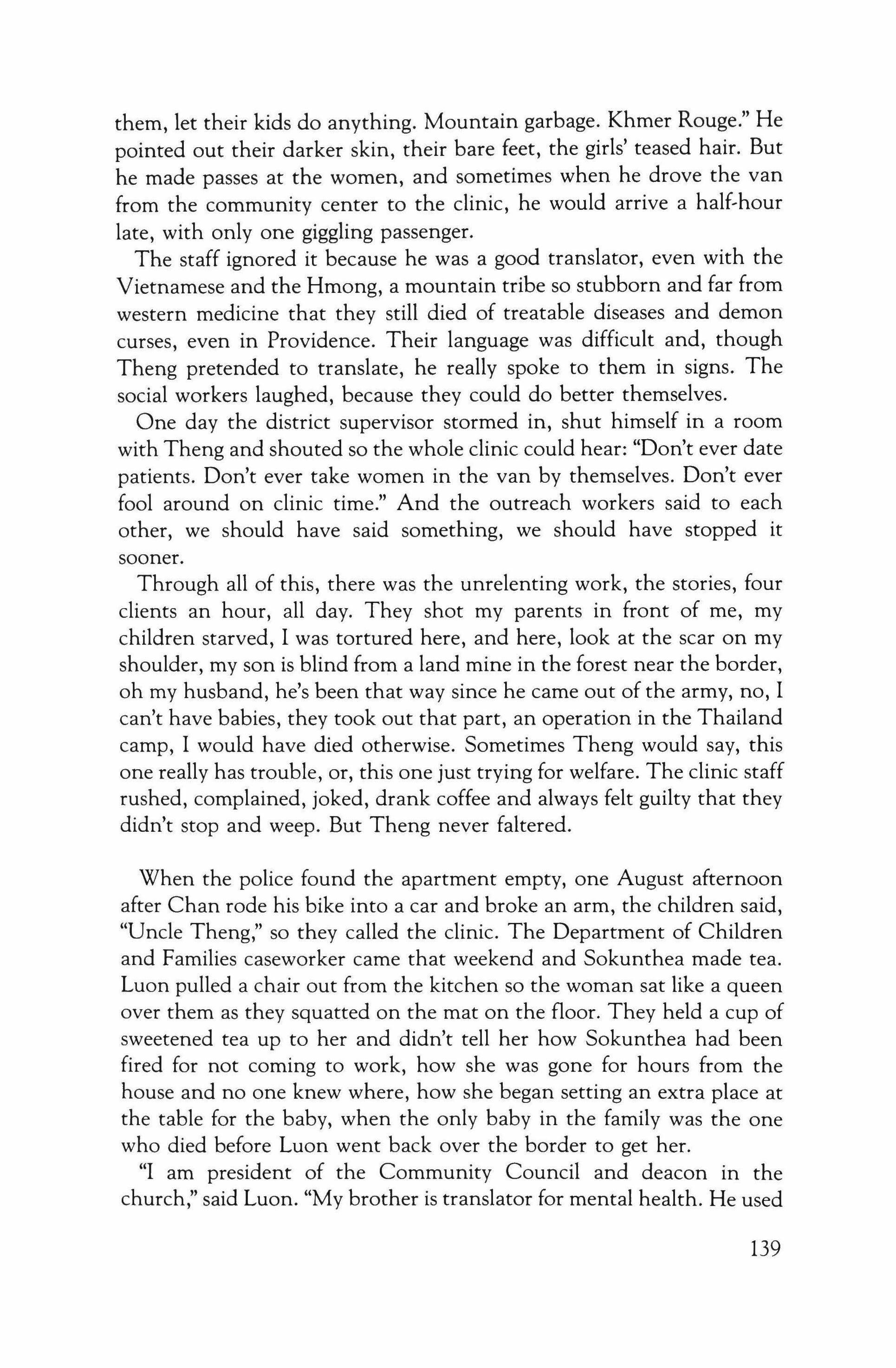
them, let their kids do anything. Mountain garbage. Khmer Rouge." He pointed out their darker skin, their bare feet, the girls' teased hair. But he made passes at the women, and sometimes when he drove the van from the community center to the clinic, he would arrive a half-hour late, with only one giggling passenger.
The staff ignored it because he was a good translator, even with the Vietnamese and the Hmong, a mountain tribe so stubborn and far from western medicine that they still died of treatable diseases and demon curses, even in Providence. Their language was difficult and, though Theng pretended to translate, he really spoke to them in signs. The social workers laughed, because they could do better themselves.
One day the district supervisor stormed in, shut himself in a room with Theng and shouted so the whole clinic could hear: "Don't ever date patients. Don't ever take women in the van by themselves. Don't ever fool around on clinic time." And the outreach workers said to each other, we should have said something, we should have stopped it sooner.
Through all of this, there was the unrelenting work, the stories, four clients an hour, all day. They shot my parents in front of me, my children starved, I was tortured here, and here, look at the scar on my shoulder, my son is blind from a land mine in the forest near the border, oh my husband, he's been that way since he came out of the army, no, I can't have babies, they took out that part, an operation in the Thailand camp, I would have died otherwise. Sometimes Theng would say, this one really has trouble, or, this one just trying for welfare. The clinic staff rushed, complained, joked, drank coffee and always felt guilty that they didn't stop and weep. But Theng never faltered.
When the police found the apartment empty, one August afternoon after Chan rode his bike into a car and broke an arm, the children said, "Uncle Theng," so they called the clinic. The Department of Children and Families caseworker came that weekend and Sokunthea made tea. Luon pulled a chair out from the kitchen so the woman sat like a queen over them as they squatted on the mat on the floor. They held a cup of sweetened tea up to her and didn't tell her how Sokunthea had been fired for not coming to work, how she was gone for hours from the house and no one knew where, how she began setting an extra place at the table for the baby, when the only baby in the family was the one who died before Luon went back over the border to get her.
"I am president of the Community Council and deacon in the church," said Luon. "My brother is translator for mental health. He used
139
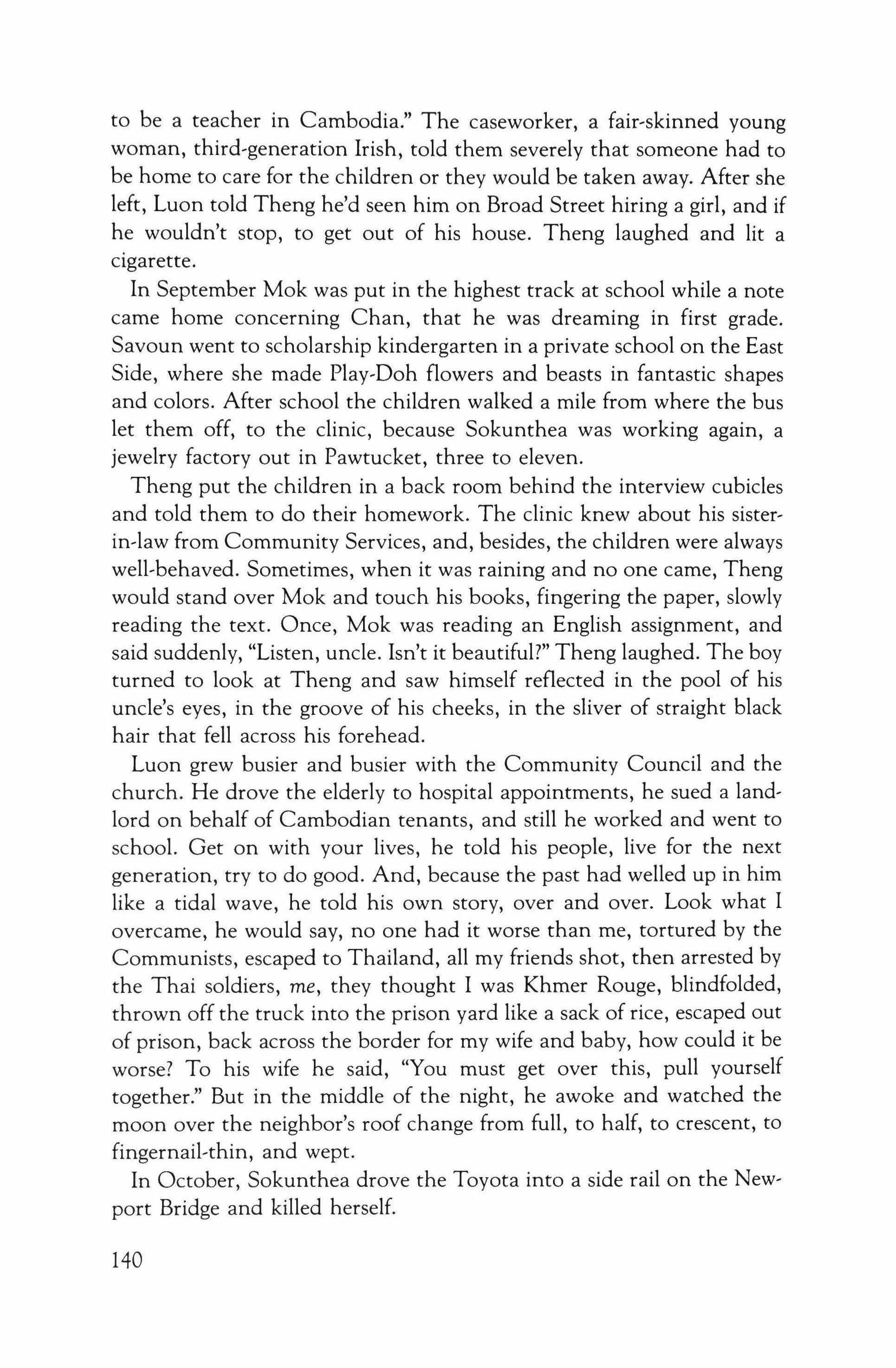
to be a teacher in Cambodia." The caseworker, a fair-skinned young woman, third-generation Irish, told them severely that someone had to be home to care for the children or they would be taken away. After she left, Luon told Theng he'd seen him on Broad Street hiring a girl, and if he wouldn't stop, to get out of his house. Theng laughed and lit a cigarette.
In September Mok was put in the highest track at school while a note came home concerning Chan, that he was dreaming in first grade. Savoun went to scholarship kindergarten in a private school on the East Side, where she made Play-Doh flowers and beasts in fantastic shapes and colors. After school the children walked a mile from where the bus let them off, to the clinic, because Sokunthea was working again, a jewelry factory out in Pawtucket, three to eleven.
Theng put the children in a back room behind the interview cubicles and told them to do their homework. The clinic knew about his sisterin-law from Community Services, and, besides, the children were always well-behaved. Sometimes, when it was raining and no one came, Theng would stand over Mok and touch his books, fingering the paper, slowly reading the text. Once, Mok was reading an English assignment, and said suddenly, "Listen, uncle. Isn't it beautiful?" Theng laughed. The boy turned to look at Theng and saw himself reflected in the pool of his uncle's eyes, in the groove of his cheeks, in the sliver of straight black hair that fell across his forehead.
Luon grew busier and busier with the Community Council and the church. He drove the elderly to hospital appointments, he sued a landlord on behalf of Cambodian tenants, and still he worked and went to school. Get on with your lives, he told his people, live for the next generation, try to do good. And, because the past had welled up in him like a tidal wave, he told his own story, over and over. Look what I overcame, he would say, no one had it worse than me, tortured by the Communists, escaped to Thailand, all my friends shot, then arrested by the Thai soldiers, me, they thought I was Khmer Rouge, blindfolded, thrown off the truck into the prison yard like a sack of rice, escaped out of prison, back across the border for my wife and baby, how could it be worse? To his wife he said, "You must get over this, pull yourself together." But in the middle of the night, he awoke and watched the moon over the neighbor's roof change from full, to half, to crescent, to fingernail-thin, and wept.
In October, Sokunthea drove the Toyota into a side rail on the Newport Bridge and killed herself.
140
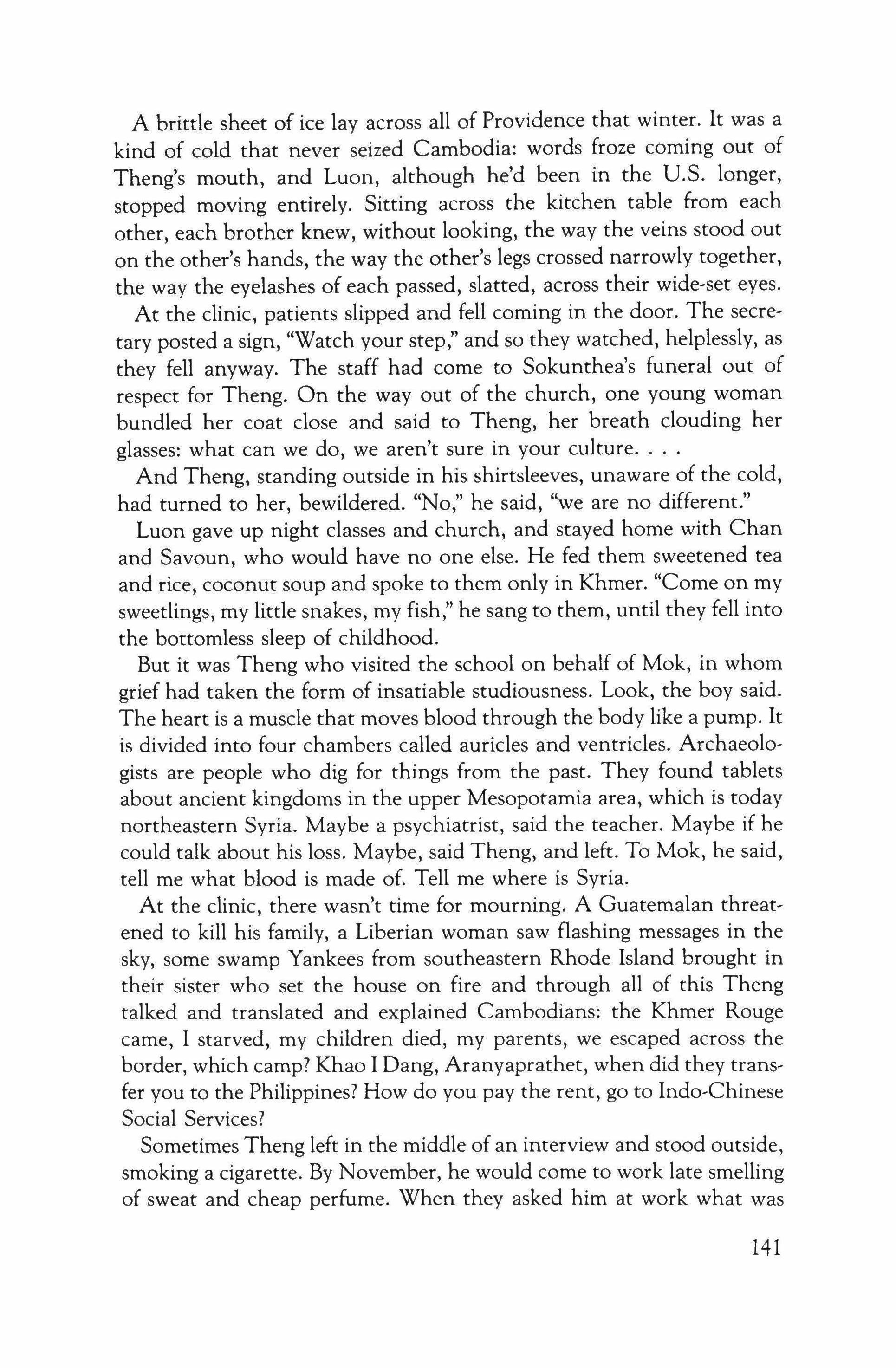
A brittle sheet of ice lay across all of Providence that winter. It was a kind of cold that never seized Cambodia: words froze coming out of Theng's mouth, and Luon, although he'd been in the U.S. longer, stopped moving entirely. Sitting across the kitchen table from each other, each brother knew, without looking, the way the veins stood out on the other's hands, the way the other's legs crossed narrowly together, the way the eyelashes of each passed, slatted, across their wide-set eyes.
At the clinic, patients slipped and fell coming in the door. The secretary posted a sign, "Watch your step," and so they watched, helplessly, as they fell anyway. The staff had come to Sokunthea's funeral out of respect for Theng. On the way out of the church, one young woman bundled her coat close and said to Theng, her breath clouding her glasses: what can we do, we aren't sure in your culture
And Theng, standing outside in his shirtsleeves, unaware of the cold, had turned to her, bewildered. "No," he said, "we are no different."
Luon gave up night classes and church, and stayed home with Chan and Savoun, who would have no one else. He fed them sweetened tea and rice, coconut soup and spoke to them only in Khmer. "Come on my sweetlings, my little snakes, my fish," he sang to them, until they fell into the bottomless sleep of childhood.
But it was Theng who visited the school on behalf of Mok, in whom grief had taken the form of insatiable studiousness. Look, the boy said. The heart is a muscle that moves blood through the body like a pump. It is divided into four chambers called auricles and ventricles. Archaeologists are people who dig for things from the past. They found tablets about ancient kingdoms in the upper Mesopotamia area, which is today northeastern Syria. Maybe a psychiatrist, said the teacher. Maybe if he could talk about his loss. Maybe, said Theng, and left. To Mok, he said, tell me what blood is made of. Tell me where is Syria.
At the clinic, there wasn't time for mourning. A Guatemalan threatened to kill his family, a Liberian woman saw flashing messages in the sky, some swamp Yankees from southeastern Rhode Island brought in their sister who set the house on fire and through all of this Theng talked and translated and explained Cambodians: the Khmer Rouge came, I starved, my children died, my parents, we escaped across the border, which camp? Khao I Dang, Aranyaprathet, when did they transfer you to the Philippines? How do you pay the rent, go to Indo-Chinese Social Services?
Sometimes Theng left in the middle of an interview and stood outside, smoking a cigarette. By November, he would come to work late smelling of sweat and cheap perfume. When they asked him at work what was
141
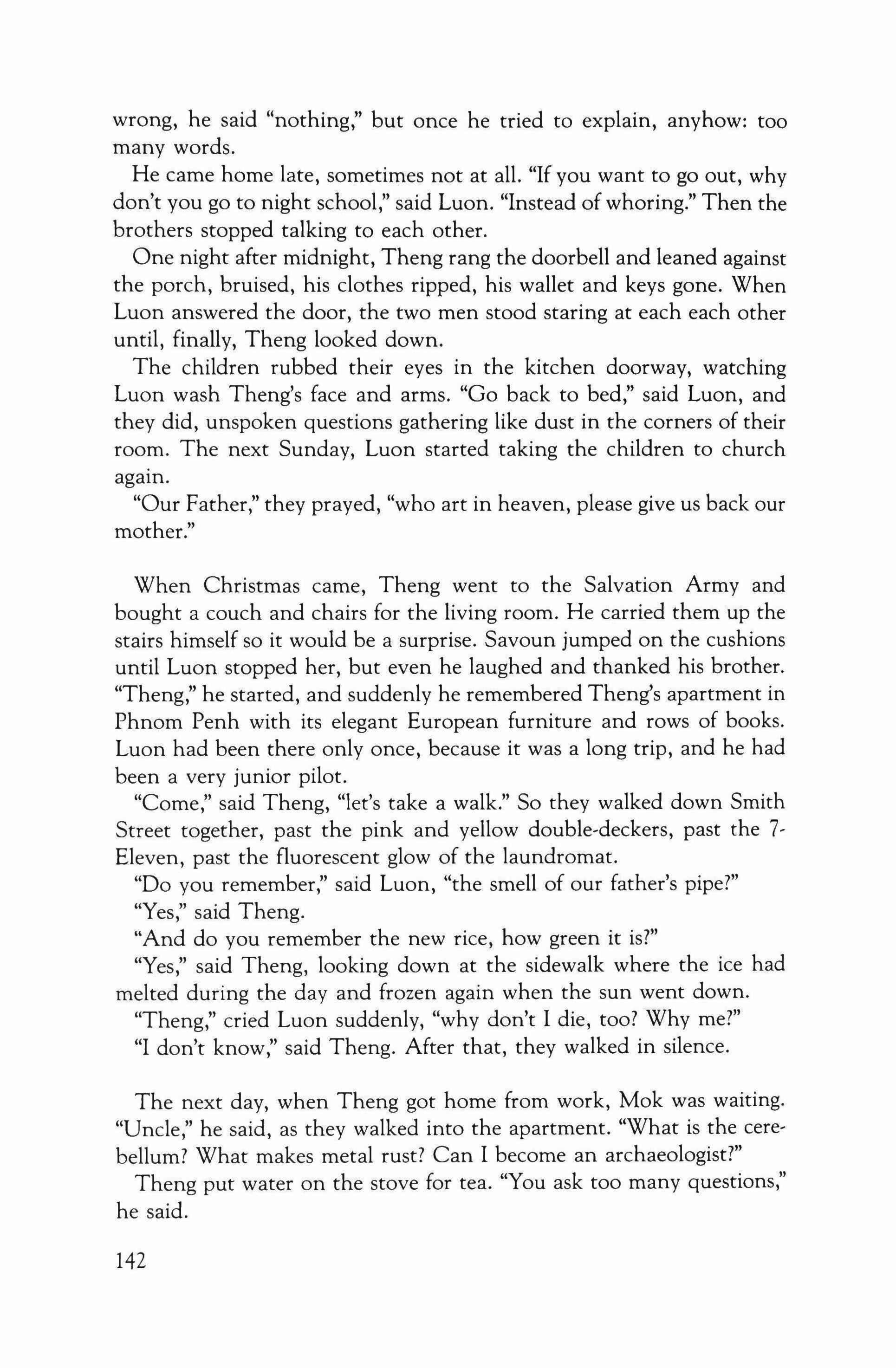
wrong, he said "nothing," but once he tried to explain, anyhow: too many words.
He came home late, sometimes not at all. "If you want to go out, why don't you go to night school," said Luon. "Instead of whoring." Then the brothers stopped talking to each other.
One night after midnight, Theng rang the doorbell and leaned against the porch, bruised, his clothes ripped, his wallet and keys gone. When Luon answered the door, the two men stood staring at each each other until, finally, Theng looked down.
The children rubbed their eyes in the kitchen doorway, watching Luon wash Theng's face and arms. "Go back to bed," said Luon, and they did, unspoken questions gathering like dust in the corners of their room. The next Sunday, Luon started taking the children to church again.
"Our Father," they prayed, "who art in heaven, please give us back our mother."
When Christmas came, Theng went to the Salvation Army and bought a couch and chairs for the living room. He carried them up the stairs himself so it would be a surprise. Savoun jumped on the cushions until Luon stopped her, but even he laughed and thanked his brother. "Theng," he started, and suddenly he remembered Theng's apartment in Phnom Penh with its elegant European furniture and rows of books. Luon had been there only once, because it was a long trip, and he had been a very junior pilot.
"Come," said Theng, "let's take a walk." So they walked down Smith Street together, past the pink and yellow double-deckers, past the 7Eleven, past the fluorescent glow of the laundromat.
"Do you remember," said Luon, "the smell of our father's pipe?"
"Yes," said Theng.
"And do you remember the new rice, how green it is?"
"Yes," said Theng, looking down at the sidewalk where the ice had melted during the day and frozen again when the sun went down.
"Theng," cried Luon suddenly, "why don't I die, too? Why me?"
"I don't know," said Theng. After that, they walked in silence.
The next day, when Theng got home from work, Mok was waiting. "Uncle," he said, as they walked into the apartment. "What is the cerebellum? What makes metal rust? Can I become an archaeologist?"
Theng put water on the stove for tea. "You ask too many questions," he said.
142
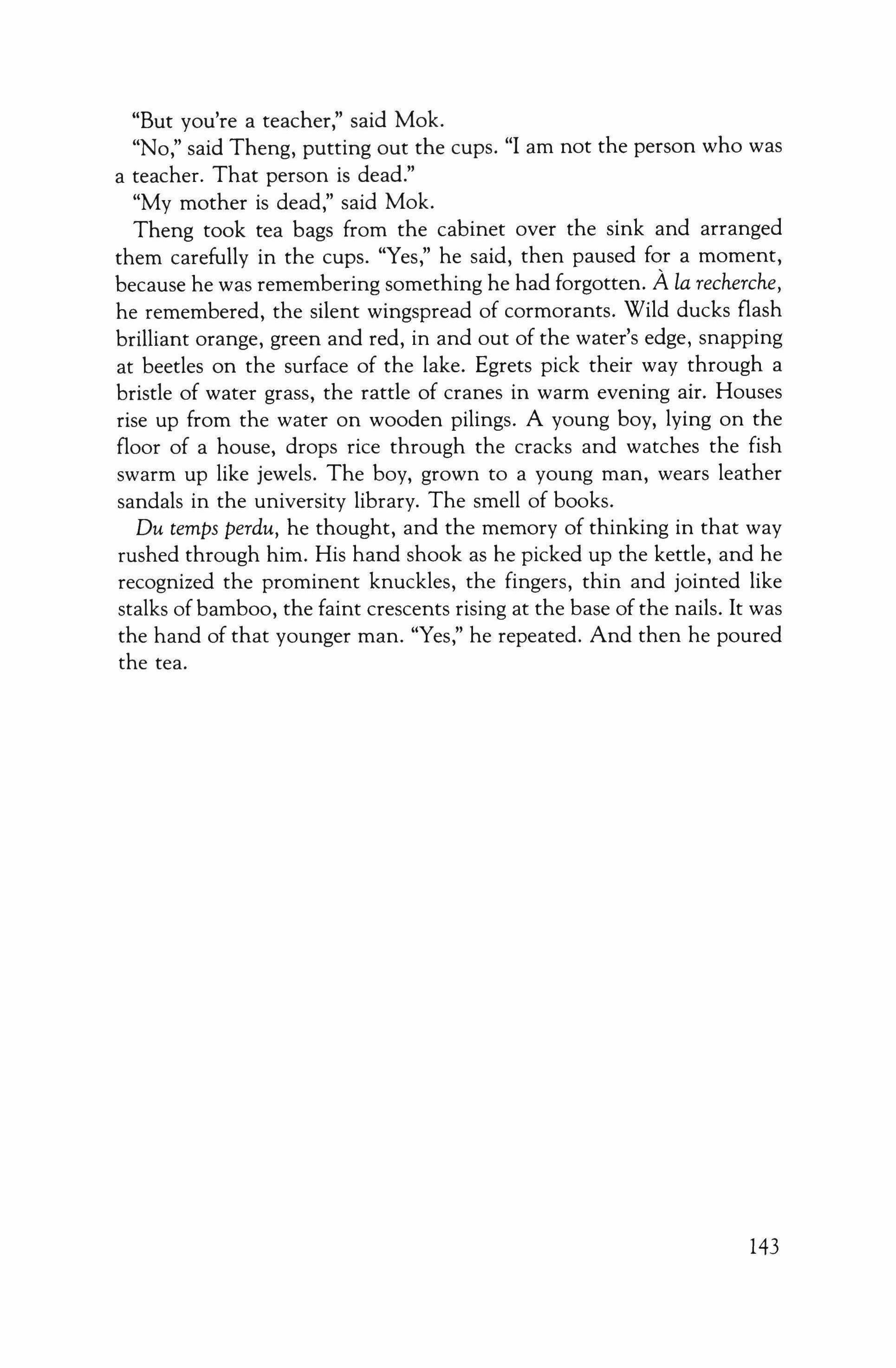
"But you're a teacher," said Mok. "No," said Theng, putting out the cups. "I am not the person who was a teacher. That person is dead."
"My mother is dead," said Mok.
Theng took tea bags from the cabinet over the sink and arranged them carefully in the cups. "Yes," he said, then paused for a moment, because he was remembering something he had forgotten. A la recherche, he remembered, the silent wingspread of cormorants. Wild ducks flash brilliant orange, green and red, in and out of the water's edge, snapping at beetles on the surface of the lake. Egrets pick their way through a bristle of water grass, the rattle of cranes in warm evening air. Houses rise up from the water on wooden pilings. A young boy, lying on the floor of a house, drops rice through the cracks and watches the fish swarm up like jewels. The boy, grown to a young man, wears leather sandals in the university library. The smell of books.
Du temps perdu, he thought, and the memory of thinking in that way rushed through him. His hand shook as he picked up the kettle, and he recognized the prominent knuckles, the fingers, thin and jointed like stalks of bamboo, the faint crescents rising at the base of the nails. It was the hand of that younger man. "Yes," he repeated. And then he poured the tea.
143
The Function of Description
William F. Van Wert
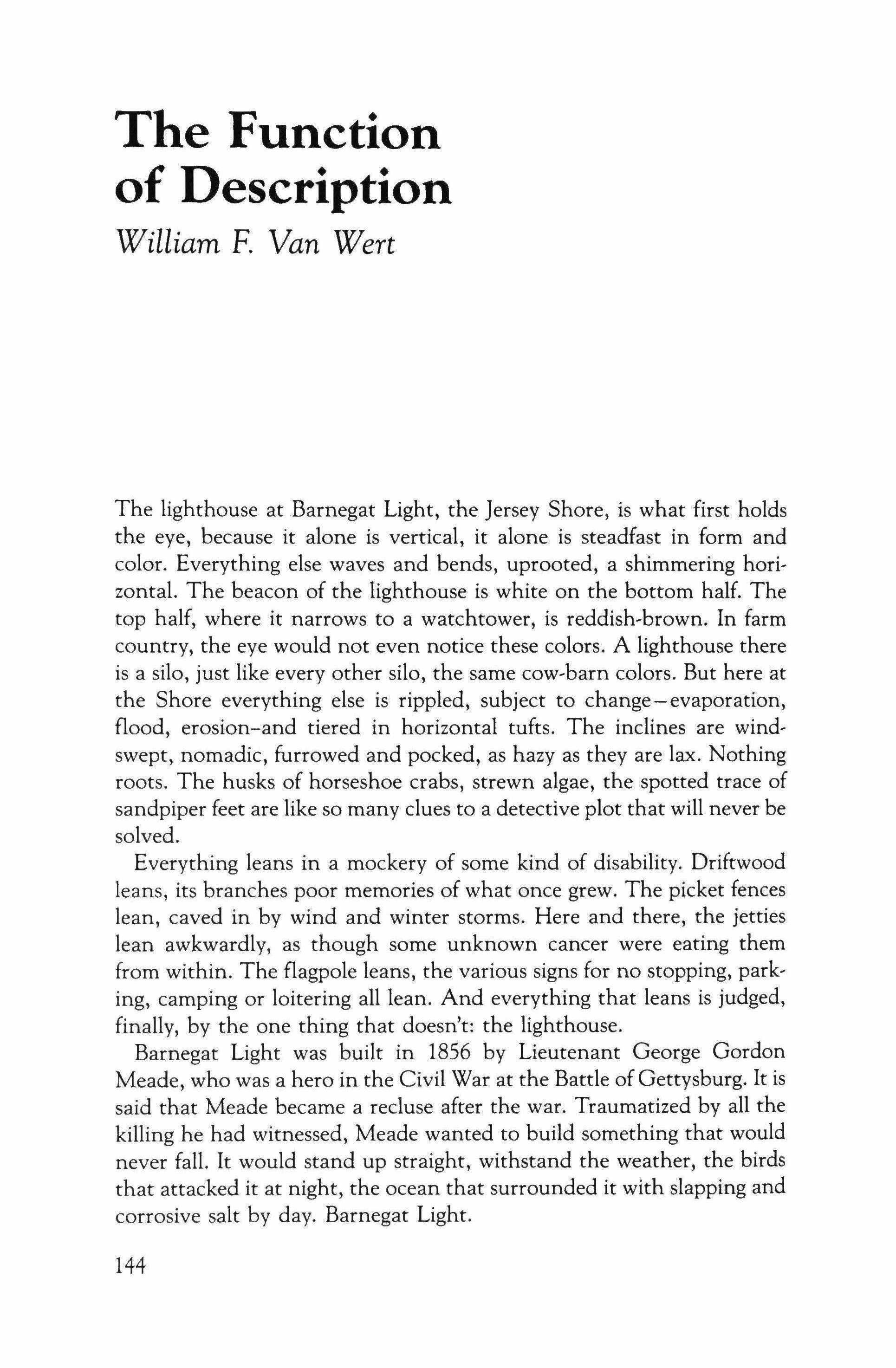
The lighthouse at Barnegat Light, the Jersey Shore, is what first holds the eye, because it alone is vertical, it alone is steadfast in form and color. Everything else waves and bends, uprooted, a shimmering horizontal. The beacon of the lighthouse is white on the bottom half. The top half, where it narrows to a watchtower, is reddish-brown. In farm country, the eye would not even notice these colors. A lighthouse there is a silo, just like every other silo, the same cow-barn colors. But here at the Shore everything else is rippled, subject to change-evaporation, flood, erosion-and tiered in horizontal tufts. The inclines are windswept, nomadic, furrowed and pocked, as hazy as they are lax. Nothing roots. The husks of horseshoe crabs, strewn algae, the spotted trace of sandpiper feet are like so many clues to a detective plot that will never be solved.
Everything leans in a mockery of some kind of disability. Driftwood leans, its branches poor memories of what once grew. The picket fences lean, caved in by wind and winter storms. Here and there, the jetties lean awkwardly, as though some unknown cancer were eating them from within. The flagpole leans, the various signs for no stopping, parking, camping or loitering all lean. And everything that leans is judged, finally, by the one thing that doesn't: the lighthouse.
Barnegat Light was built in 1856 by Lieutenant George Gordon Meade, who was a hero in the Civil War at the Battle of Gettysburg. It is said that Meade became a recluse after the war. Traumatized by all the killing he had witnessed, Meade wanted to build something that would never fall. It would stand up straight, withstand the weather, the birds that attacked it at night, the ocean that surrounded it with slapping and corrosive salt by day. Barnegat Light.
144
Even then, back in 1856, the footsteps were here, like some generic ever-present march of history, the sand like a sawdust of souls. It is rumored that Meade talked to the footstep traces in the sand, ordered their withdrawal, as though he were trying to save his fallen comrades at Gettysburg. And in the late afternoons, when the surf is still blue and the inclines of sand go from beige to gray, the seascape resembles the Civil War. No one can fault Meade for mistaking himself and insisting upon the upper half of the lighthouse, barrel-shaped and like a cannon pointed at God, but reddish-brown, the color of shot bodies.
I remember a line from a poem: "Beneath the snow upon the frozen lake, there is still the lake." The line has become literal for me. Even after the ocean has disappeared from my view, there is still the description.
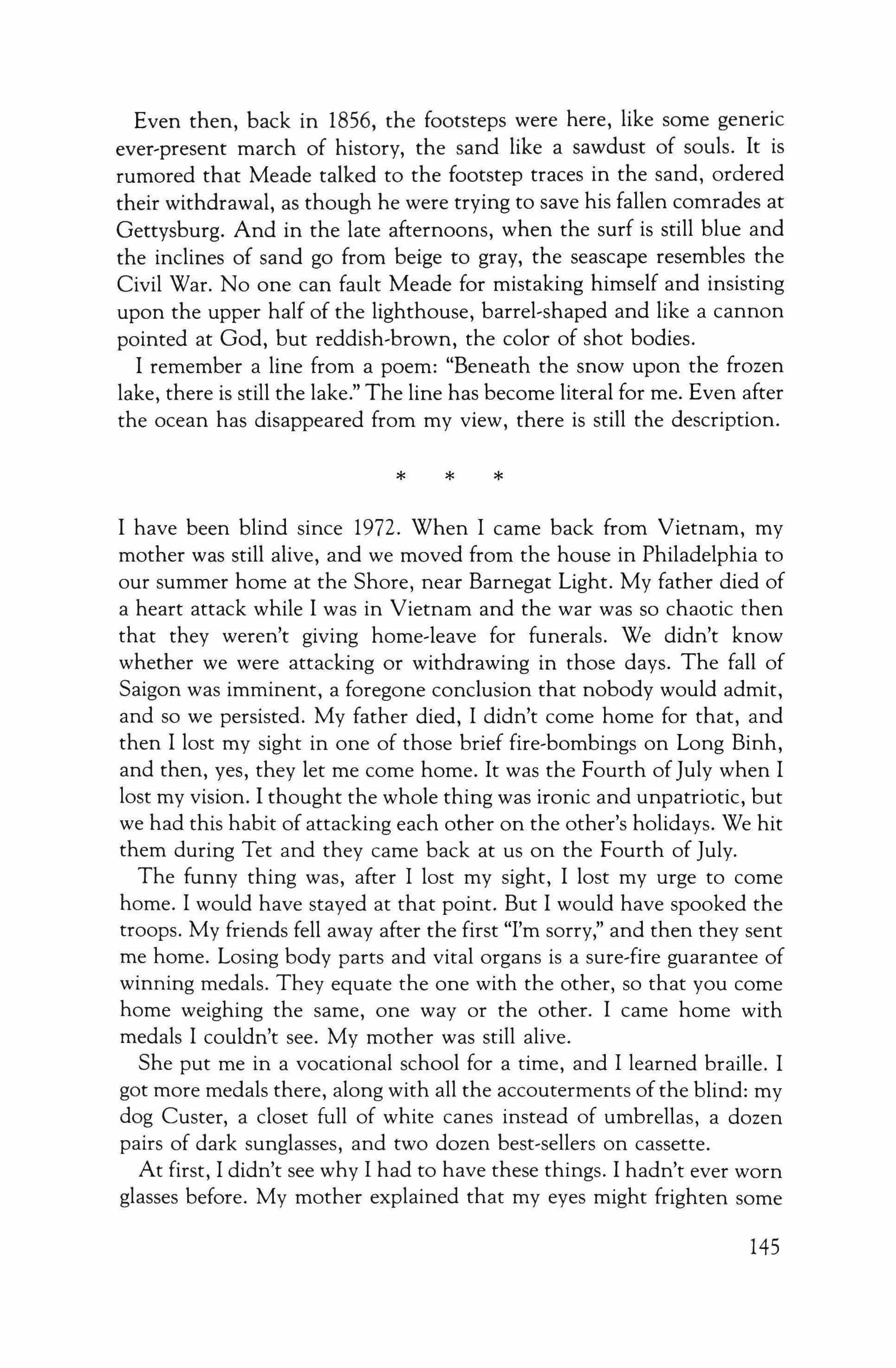
I have been blind since 1972. When I came back from Vietnam, my mother was still alive, and we moved from the house in Philadelphia to our summer home at the Shore, near Barnegat Light. My father died of a heart attack while I was in Vietnam and the war was so chaotic then that they weren't giving home-leave for funerals. We didn't know whether we were attacking or withdrawing in those days. The fall of Saigon was imminent, a foregone conclusion that nobody would admit, and so we persisted. My father died, I didn't come home for that, and then I lost my sight in one of those brief fire-bombings on Long Binh, and then, yes, they let me come home. It was the Fourth ofJuly when I lost my vision. I thought the whole thing was ironic and unpatriotic, but we had this habit of attacking each other on the other's holidays. We hit them during Tet and they came back at us on the Fourth of July.
The funny thing was, after I lost my sight, I lost my urge to come home. I would have stayed at that point. But I would have spooked the troops. My friends fell away after the first "I'm sorry," and then they sent me home. Losing body parts and vital organs is a sure-fire guarantee of winning medals. They equate the one with the other, so that you come home weighing the same, one way or the other. I came home with medals I couldn't see. My mother was still alive.
She put me in a vocational school for a time, and I learned braille. I got more medals there, along with all the accouterments ofthe blind: my dog Custer, a closet full of white canes instead of umbrellas, a dozen pairs of dark sunglasses, and two dozen best-sellers on cassette.
At first, I didn't see why I had to have these things. I hadn't ever worn glasses before. My mother explained that my eyes might frighten some
* * *
145
people. Dark sunglasses were for other people, not for the blind person who wore them. And maybe the canes were white for the opposite reason, so that other people would see them. Anyway, I was colorcoupled, even though there is no such thing as a pure color like black and white for a blind person. For me, colors collide, they constantly wash and smear, they turn in dizzying spirals, one screen after another, colors instead of depth. And they're noisy and painful, like the insides of headaches. I could describe my colors as what sighted people see inside kaleidoscopes, and this description would be close, but it would be a lie. I could never exhaust all the colors, many of which have no names, nor their shapes, which are always wavy and changing.
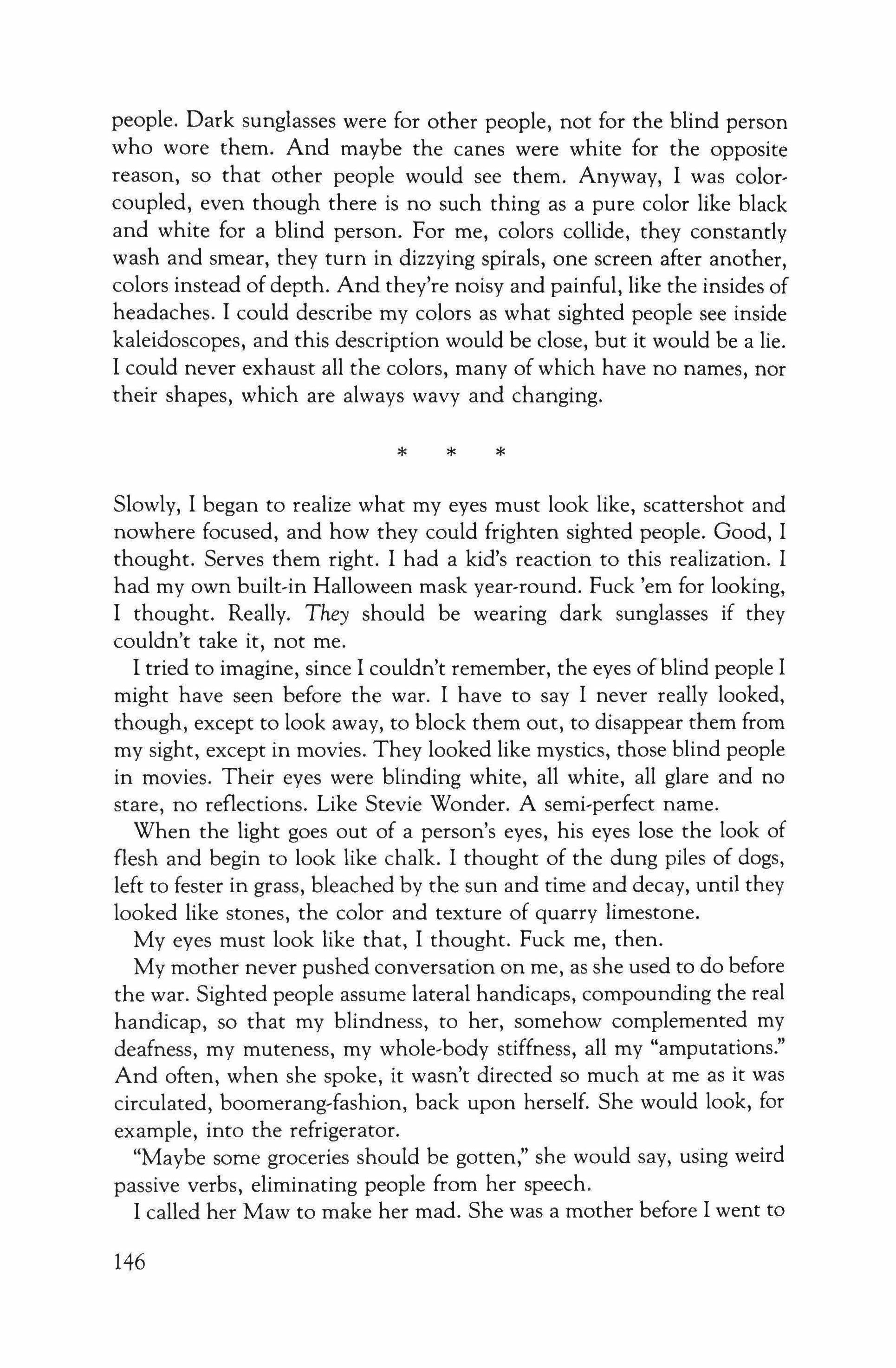
Slowly, I began to realize what my eyes must look like, scattershot and nowhere focused, and how they could frighten sighted people. Good, I thought. Serves them right. I had a kid's reaction to this realization. I had my own built-in Halloween mask year-round. Fuck 'em for looking, I thought. Really. They should be wearing dark sunglasses if they couldn't take it, not me.
I tried to imagine, since I couldn't remember, the eyes of blind people I might have seen before the war. I have to say I never really looked, though, except to look away, to block them out, to disappear them from my sight, except in movies. They looked like mystics, those blind people in movies. Their eyes were blinding white, all white, all glare and no stare, no reflections. Like Stevie Wonder. A semi-perfect name.
When the light goes out of a person's eyes, his eyes lose the look of flesh and begin to look like chalk. I thought of the dung piles of dogs, left to fester in grass, bleached by the sun and time and decay, until they looked like stones, the color and texture of quarry limestone.
My eyes must look like that, I thought. Fuck me, then.
My mother never pushed conversation on me, as she used to do before the war. Sighted people assume lateral handicaps, compounding the real handicap, so that my blindness, to her, somehow complemented my deafness, my muteness, my whole-body stiffness, all my "amputations." And often, when she spoke, it wasn't directed so much at me as it was circulated, boomerang-fashion, back upon herself. She would look, for example, into the refrigerator.
"Maybe some groceries should be gotten," she would say, using weird passive verbs, eliminating people from her speech.
I called her Maw to make her mad. She was a mother before I went to
* * *
146
war, a grandmother when I came back. I couldn't see her, but she felt grandmotherly to me, in all the wrong ways. She sighed a lot, talked to herself, complained about the weather, other people's infirmities, crime in the cities. She used to sing before the war. Now she hummed, as though she had forgotten all the words or maybe because she thought full singing would somehow remind me of my blindness. She talked about me to other people, as though I weren't there. She rocked in the rocking chair, a grating manic rocking, as though she were hyperventilating.
"We won't dwell on things we can't change," she said more than once, her way of avoiding all talk about my father or my blindness.
She saved coupons, baked bread, rubbed her fingers, all the Gramma things I found so annoying, and I called her Maw.
I always assumed that I was a burden, incredibly dependent upon my mother. What I didn't realize, until after her death, was how dependent she was on me. I was her static foil, her grief sampler, her walking pain. She could no more get me out of her sight than I could get the lighthouse out of mine. She had lost her husband, and, left to herself, she would have become a recluse, a piece of furniture, dried paint on the wall. It was clear to me that she no longer thought of me as a growing son, someone to pin aspirations on. I was her habit.
My future was as murky as her past. We were both martyrs, looking for a scapegoat. If my father hadn't died, we would have had him to blame. He got out of his war without a scratch. He liked to talk about his war "adventures," but never in detail and always with a sheep-smile, as though he were talking about a porn film he got to see but would never let me or my mother see. The bastard. I would have called him Paw.
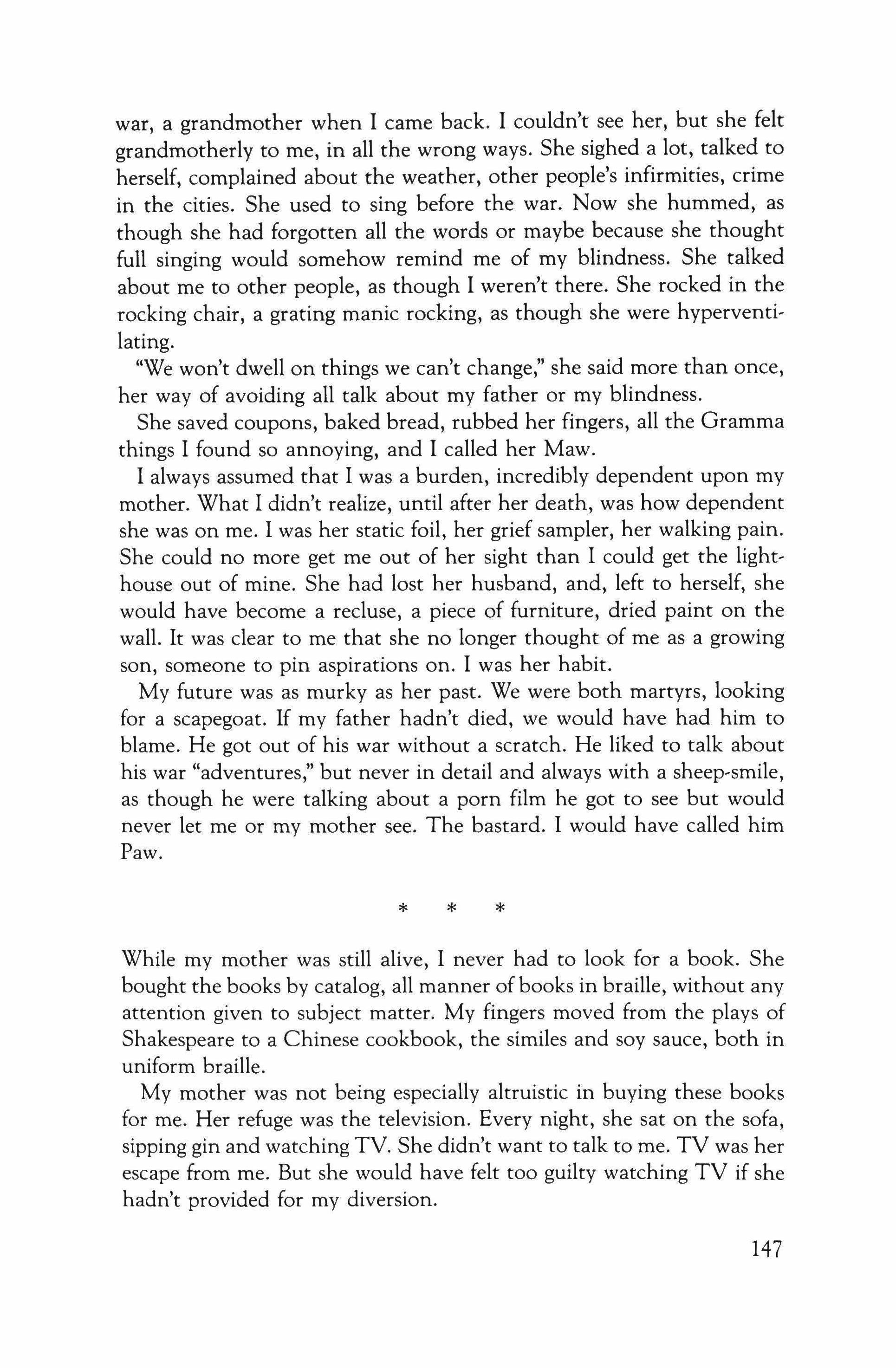
While my mother was still alive, I never had to look for a book. She bought the books by catalog, all manner of books in braille, without any attention given to subject matter. My fingers moved from the plays of Shakespeare to a Chinese cookbook, the similes and soy sauce, both in uniform braille.
My mother was not being especially altruistic in buying these books for me. Her refuge was the television. Every night, she sat on the sofa, sipping gin and watching TV. She didn't want to talk to me. TV was her escape from me. But she would have felt too guilty watching TV if she hadn't provided for my diversion.
* * *
147
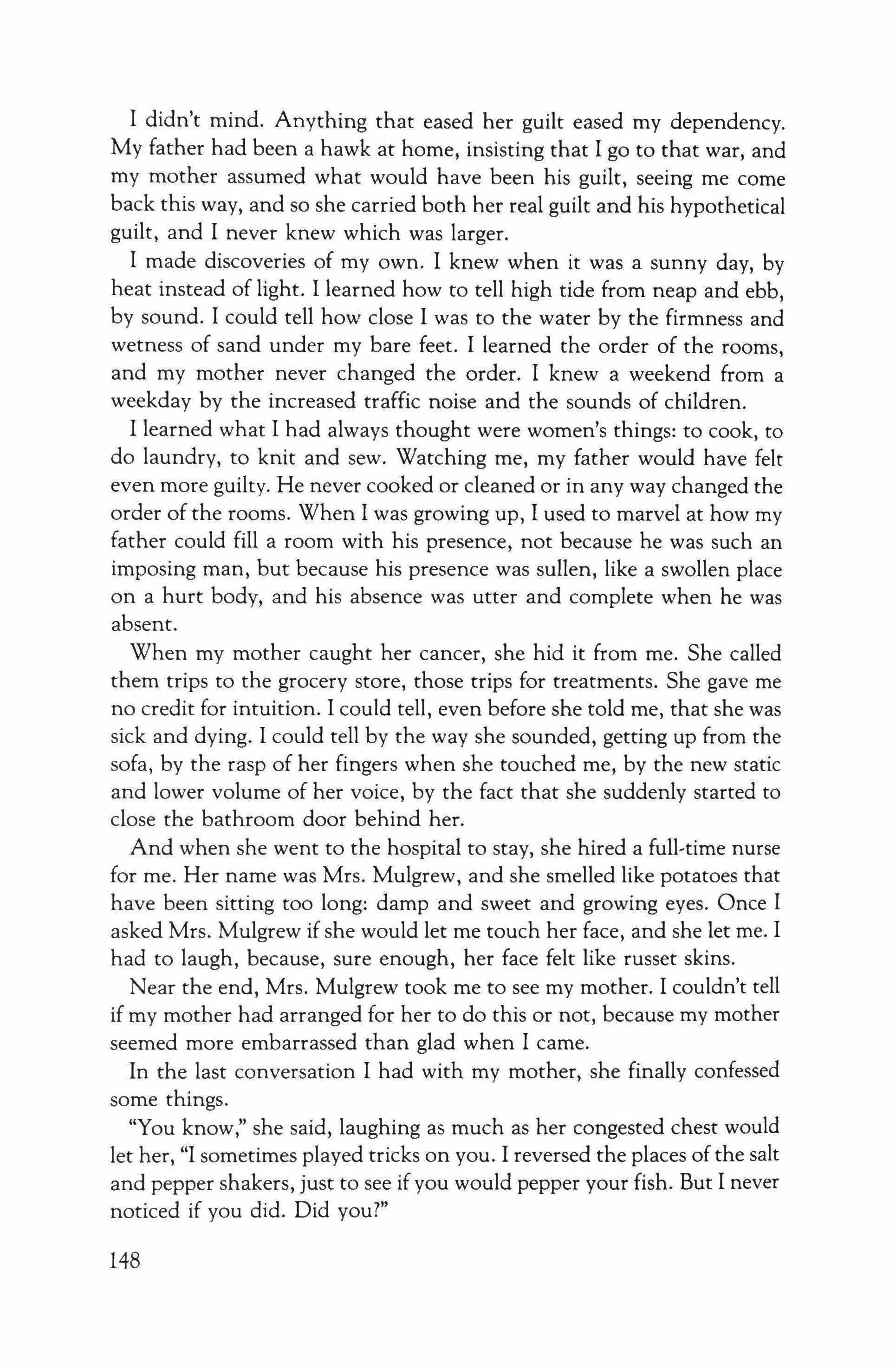
I didn't mind. Anything that eased her guilt eased my dependency. My father had been a hawk at home, insisting that I go to that war, and my mother assumed what would have been his guilt, seeing me come back this way, and so she carried both her real guilt and his hypothetical guilt, and I never knew which was larger.
I made discoveries of my own. I knew when it was a sunny day, by heat instead of light. I learned how to tell high tide from neap and ebb, by sound. I could tell how close I was to the water by the firmness and wetness of sand under my bare feet. I learned the order of the rooms, and my mother never changed the order. I knew a weekend from a weekday by the increased traffic noise and the sounds of children.
I learned what I had always thought were women's things: to cook, to do laundry, to knit and sew. Watching me, my father would have felt even more guilty. He never cooked or cleaned or in any way changed the order of the rooms. When I was growing up, I used to marvel at how my father could fill a room with his presence, not because he was such an imposing man, but because his presence was sullen, like a swollen place on a hurt body, and his absence was utter and complete when he was absent.
When my mother caught her cancer, she hid it from me. She called them trips to the grocery store, those trips for treatments. She gave me no credit for intuition. I could tell, even before she told me, that she was sick and dying. I could tell by the way she sounded, getting up from the sofa, by the rasp of her fingers when she touched me, by the new static and lower volume of her voice, by the fact that she suddenly started to close the bathroom door behind her.
And when she went to the hospital to stay, she hired a full-time nurse for me. Her name was Mrs. Mulgrew, and she smelled like potatoes that have been sitting too long: damp and sweet and growing eyes. Once I asked Mrs. Mulgrew if she would let me touch her face, and she let me. I had to laugh, because, sure enough, her face felt like russet skins.
Near the end, Mrs. Mulgrew took me to see my mother. I couldn't tell if my mother had arranged for her to do this or not, because my mother seemed more embarrassed than glad when I came.
In the last conversation I had with my mother, she finally confessed some things.
"You know," she said, laughing as much as her congested chest would let her, "I sometimes played tricks on you. I reversed the places of the salt and pepper shakers, just to see if you would pepper your fish. But I never noticed if you did. Did you?"
148
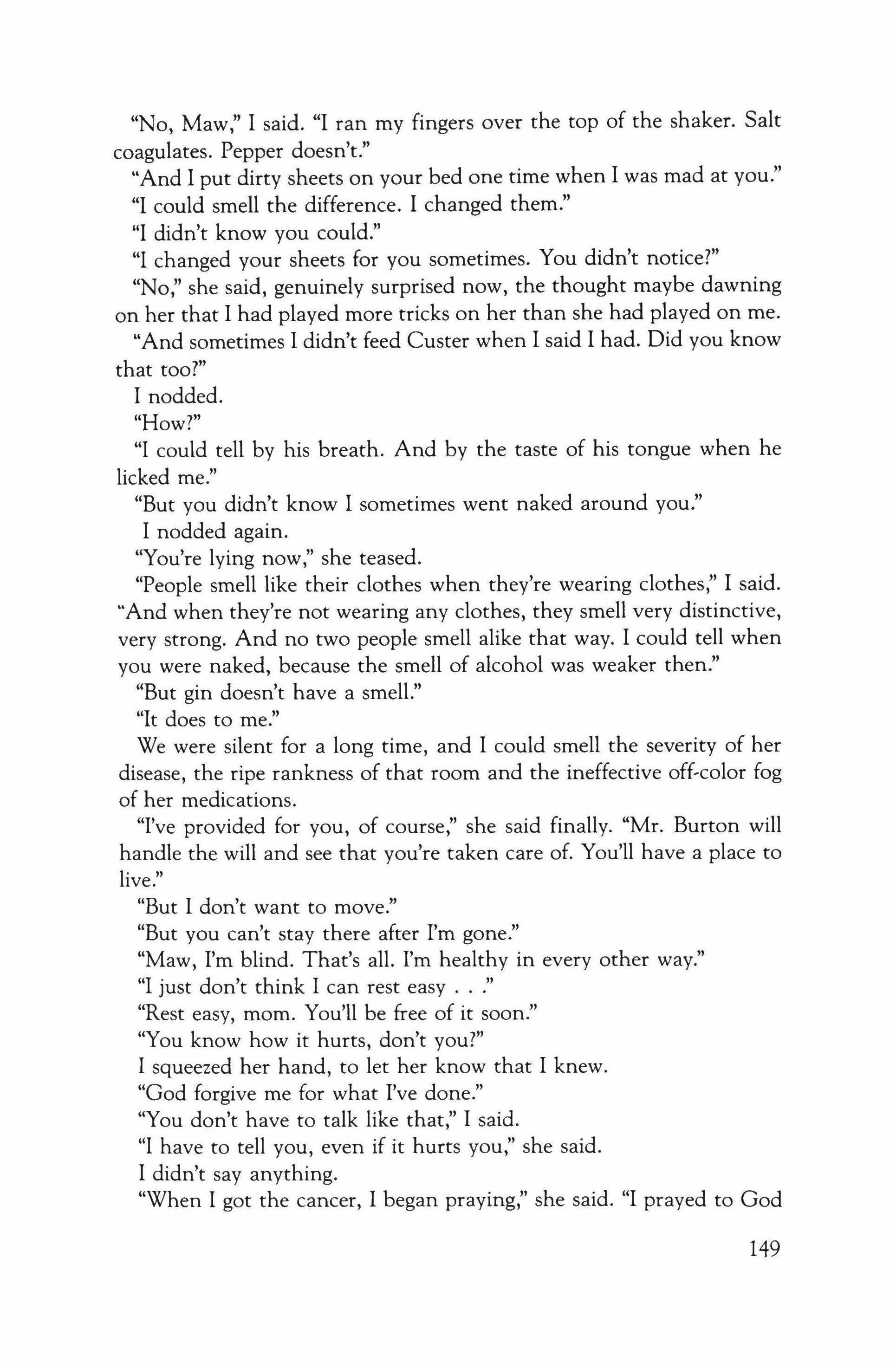
"No, Maw," I said. "I ran my fingers over the top of the shaker. Salt coagulates. Pepper doesn't."
"And I put dirty sheets on your bed one time when I was mad at you."
"I could smell the difference. I changed them."
"I didn't know you could."
"I changed your sheets for you sometimes. You didn't notice?"
"No:' she said, genuinely surprised now, the thought maybe dawning on her that I had played more tricks on her than she had played on me.
"And sometimes I didn't feed Custer when I said I had. Did you know that too?"
I nodded.
"How?"
"I could tell by his breath. And by the taste of his tongue when he licked me."
"But you didn't know I sometimes went naked around you."
I nodded again.
"You're lying now," she teased.
"People smell like their clothes when they're wearing clothes," I said. "And when they're not wearing any clothes, they smell very distinctive, very strong. And no two people smell alike that way. I could tell when you were naked, because the smell of alcohol was weaker then."
"But gin doesn't have a smell."
"It does to me."
We were silent for a long time, and I could smell the severity of her disease, the ripe rankness of that room and the ineffective off-color fog of her medications.
"I've provided for you, of course," she said finally. "Mr. Burton will handle the will and see that you're taken care of. You'll have a place to live."
"But I don't want to move."
"But you can't stay there after I'm gone."
"Maw, I'm blind. That's all. I'm healthy in every other way."
"I just don't think I can rest easy
"Rest easy, mom. You'll be free of it soon."
"You know how it hurts, don't you?"
I squeezed her hand, to let her know that I knew.
"God forgive me for what I've done."
"You don't have to talk like that," I said.
"I have to tell you, even if it hurts you," she said.
I didn't say anything.
"When I got the cancer, I began praying," she said. "I prayed to God
149
that you die first. You understand? I prayed for your death, so that I could die without having to worry about you. I'm sorry to have to tell you, but I'm not sorry I did it. I still wish God had answered my prayers. I want you struck by lightning, drowned in a storm on one of your walks, shot by robbers, hit by a car, something so quick you barely feel it, so you can be out of this sorry life."
I never said a word. I let her talk. Her most private sin, then, wishing my death, turned out to be the most care she ever showed me.
She died, and I felt that my blindness spared me much of the grief that sighted people would have had. My visual memory of her predated my going to the war in Vietnam. And her absence, after I had gotten used to living alone in the beach house, was no greater than my father's absence. Like photographs remind sighted people of the absence of the people in those photographs, I felt that way about my parents, and I didn't have to torture myself with photographs. I wasn't obsessed with the visual of them. I put my mother's death behind my eyes, in the darkness behind my eyes, where it soared like a kite, got higher and smaller, just like a kite, once you've let go.
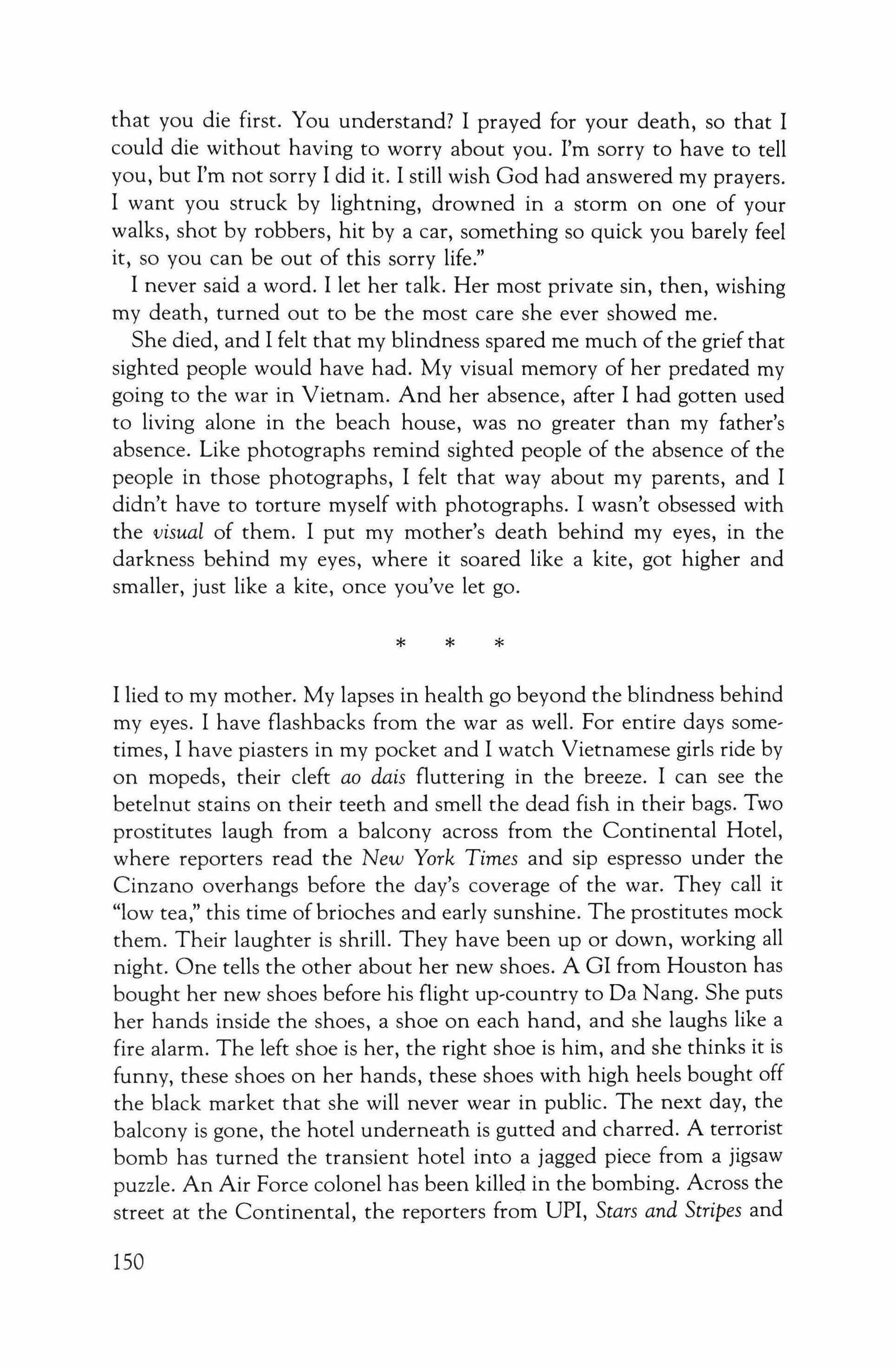
I lied to my mother. My lapses in health go beyond the blindness behind my eyes. I have flashbacks from the war as well. For entire days sometimes, I have piasters in my pocket and I watch Vietnamese girls ride by on mopeds, their cleft ao dais fluttering in the breeze. I can see the betelnut stains on their teeth and smell the dead fish in their bags. Two prostitutes laugh from a balcony across from the Continental Hotel, where reporters read the New York Times and sip espresso under the Cinzano overhangs before the day's coverage of the war. They call it "low tea," this time of brioches and early sunshine. The prostitutes mock them. Their laughter is shrill. They have been up or down, working all night. One tells the other about her new shoes. A GI from Houston has bought her new shoes before his flight up-country to Da Nang. She puts her hands inside the shoes, a shoe on each hand, and she laughs like a fire alarm. The left shoe is her, the right shoe is him, and she thinks it is funny, these shoes on her hands, these shoes with high heels bought off the black market that she will never wear in public. The next day, the balcony is gone, the hotel underneath is gutted and charred. A terrorist bomb has turned the transient hotel into a jagged piece from a jigsaw puzzle. An Air Force colonel has been killed in the bombing. Across the street at the Continental, the reporters from UPI, Stars and Stripes and
* * *
150
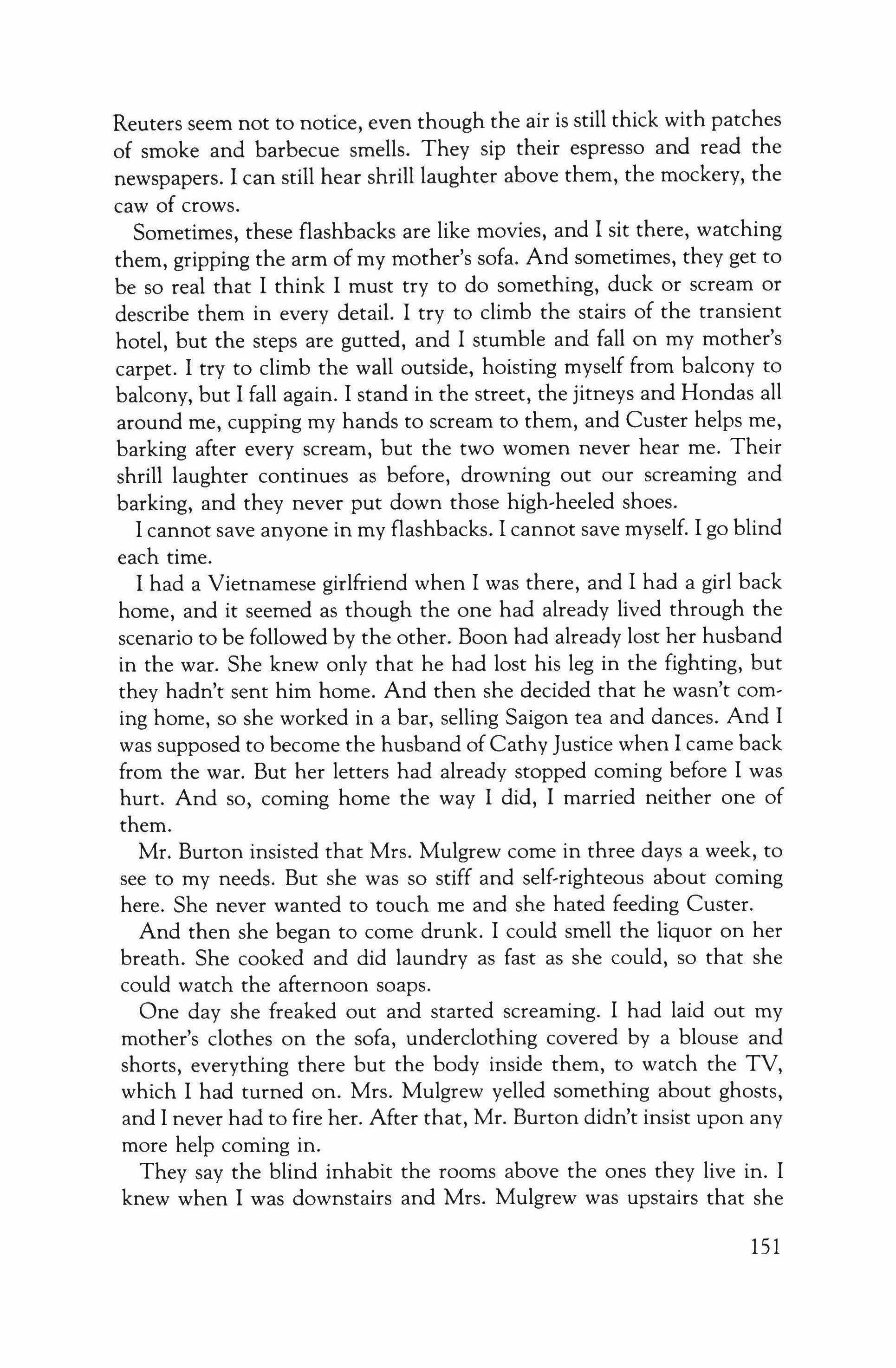
Reuters seem not to notice, even though the air is still thick with patches of smoke and barbecue smells. They sip their espresso and read the newspapers. I can still hear shrill laughter above them, the mockery, the caw of crows.
Sometimes, these flashbacks are like movies, and I sit there, watching them, gripping the arm of my mother's sofa. And sometimes, they get to be so real that I think I must try to do something, duck or scream or describe them in every detail. I try to climb the stairs of the transient hotel, but the steps are gutted, and I stumble and fall on my mother's carpet. I try to climb the wall outside, hoisting myself from balcony to balcony, but I fall again. I stand in the street, the jitneys and Hondas all around me, cupping my hands to scream to them, and Custer helps me, barking after every scream, but the two women never hear me. Their shrill laughter continues as before, drowning out our screaming and barking, and they never put down those high-heeled shoes.
I cannot save anyone in my flashbacks. I cannot save myself. I go blind each time.
I had a Vietnamese girlfriend when I was there, and I had a girl back home, and it seemed as though the one had already lived through the scenario to be followed by the other. Boon had already lost her husband in the war. She knew only that he had lost his leg in the fighting, but they hadn't sent him home. And then she decided that he wasn't coming home, so she worked in a bar, selling Saigon tea and dances. And I was supposed to become the husband of Cathy Justice when I came back from the war. But her letters had already stopped coming before I was hurt. And so, coming home the way I did, I married neither one of them.
Mr. Burton insisted that Mrs. Mulgrew come in three days a week, to see to my needs. But she was so stiff and self-righteous about coming here. She never wanted to touch me and she hated feeding Custer.
And then she began to come drunk. I could smell the liquor on her breath. She cooked and did laundry as fast as she could, so that she could watch the afternoon soaps.
One day she freaked out and started screaming. I had laid out my mother's clothes on the sofa, underclothing covered by a blouse and shorts, everything there but the body inside them, to watch the TV, which I had turned on. Mrs. Mulgrew yelled something about ghosts, and I never had to fire her. After that, Mr. Burton didn't insist upon any more help coming in.
They say the blind inhabit the rooms above the ones they live in. I knew when I was downstairs and Mrs. Mulgrew was upstairs that she
151
was trying on my mother's clothes, going through her jewelry, taking things for herself. I could hear everything as though I were up there with her. But, in fact, I needed to be underneath her to hear this well. When I accused Mrs. Mulgrew of stealing my mother's things, she called me a liar, then a freak, a pervert. Finally, she said my mother had no more use of these things, I certainly had no use for them, and she just knew my mother would have approved, that's all. When I told her things carried the fates of those who had owned them and that taking them meant that she would lose her husband, get cancer, have disabled children, she put them back. She never said so, of course, but I heard her put them back.
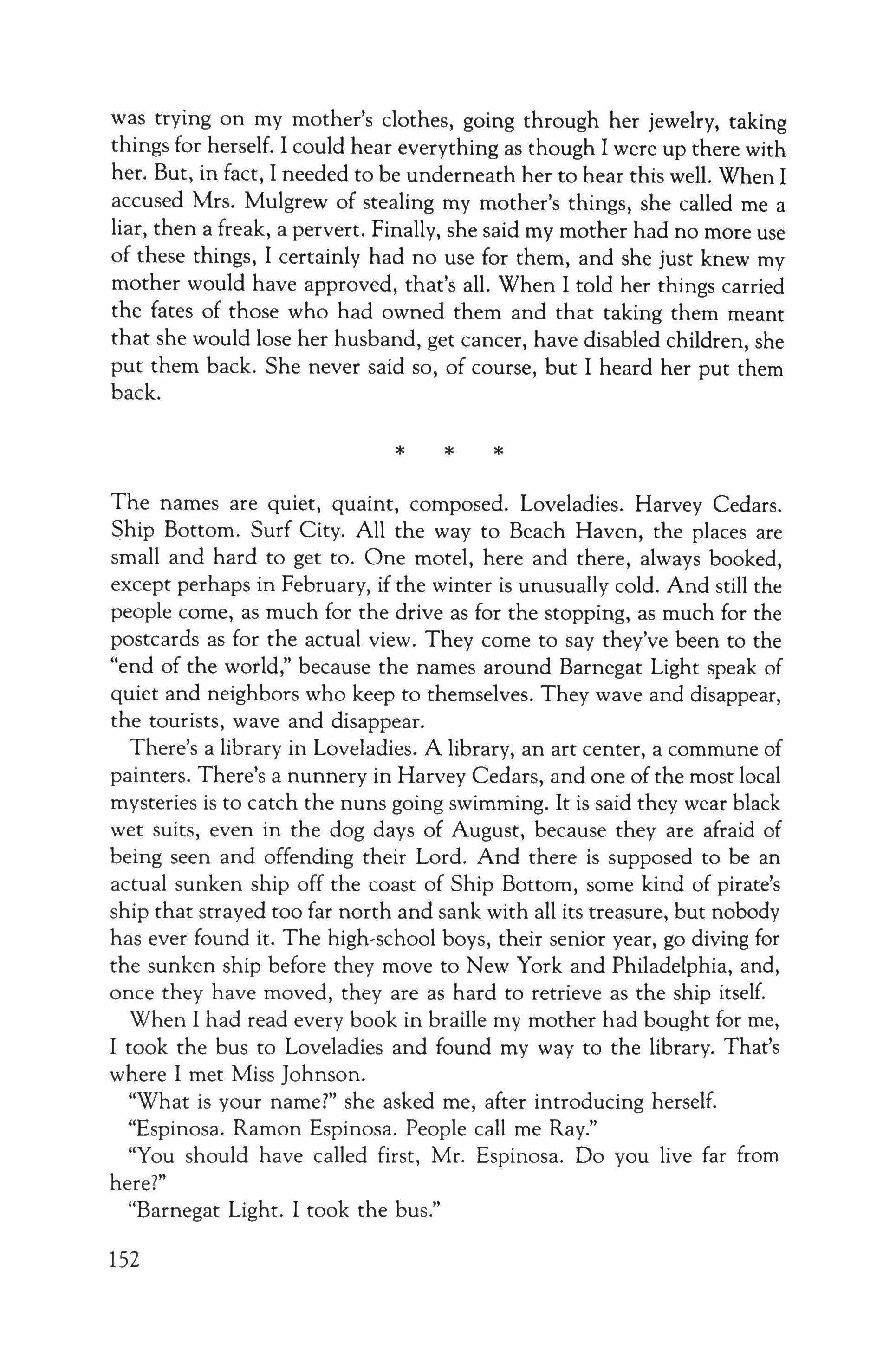
The names are quiet, quaint, composed. Loveladies. Harvey Cedars. Ship Bottom. Surf City. All the way to Beach Haven, the places are small and hard to get to. One motel, here and there, always booked, except perhaps in February, if the winter is unusually cold. And still the people come, as much for the drive as for the stopping, as much for the postcards as for the actual view. They come to say they've been to the "end of the world," because the names around Barnegat Light speak of quiet and neighbors who keep to themselves. They wave and disappear, the tourists, wave and disappear.
There's a library in Loveladies. A library, an art center, a commune of painters. There's a nunnery in Harvey Cedars, and one of the most local mysteries is to catch the nuns going swimming. It is said they wear black wet suits, even in the dog days of August, because they are afraid of being seen and offending their Lord. And there is supposed to be an actual sunken ship off the coast of Ship Bottom, some kind of pirate's ship that strayed too far north and sank with all its treasure, but nobody has ever found it. The high-school boys, their senior year, go diving for the sunken ship before they move to New York and Philadelphia, and, once they have moved, they are as hard to retrieve as the ship itself.
When I had read every book in braille my mother had bought for me, I took the bus to Loveladies and found my way to the library. That's where I met Miss Johnson.
"What is your name?" she asked me, after introducing herself. "Espinosa. Ramon Espinosa. People call me Ray."
"You should have called first, Mr. Espinosa. Do you live far from here?"
"Barnegat Light. I took the bus." 152
* * *
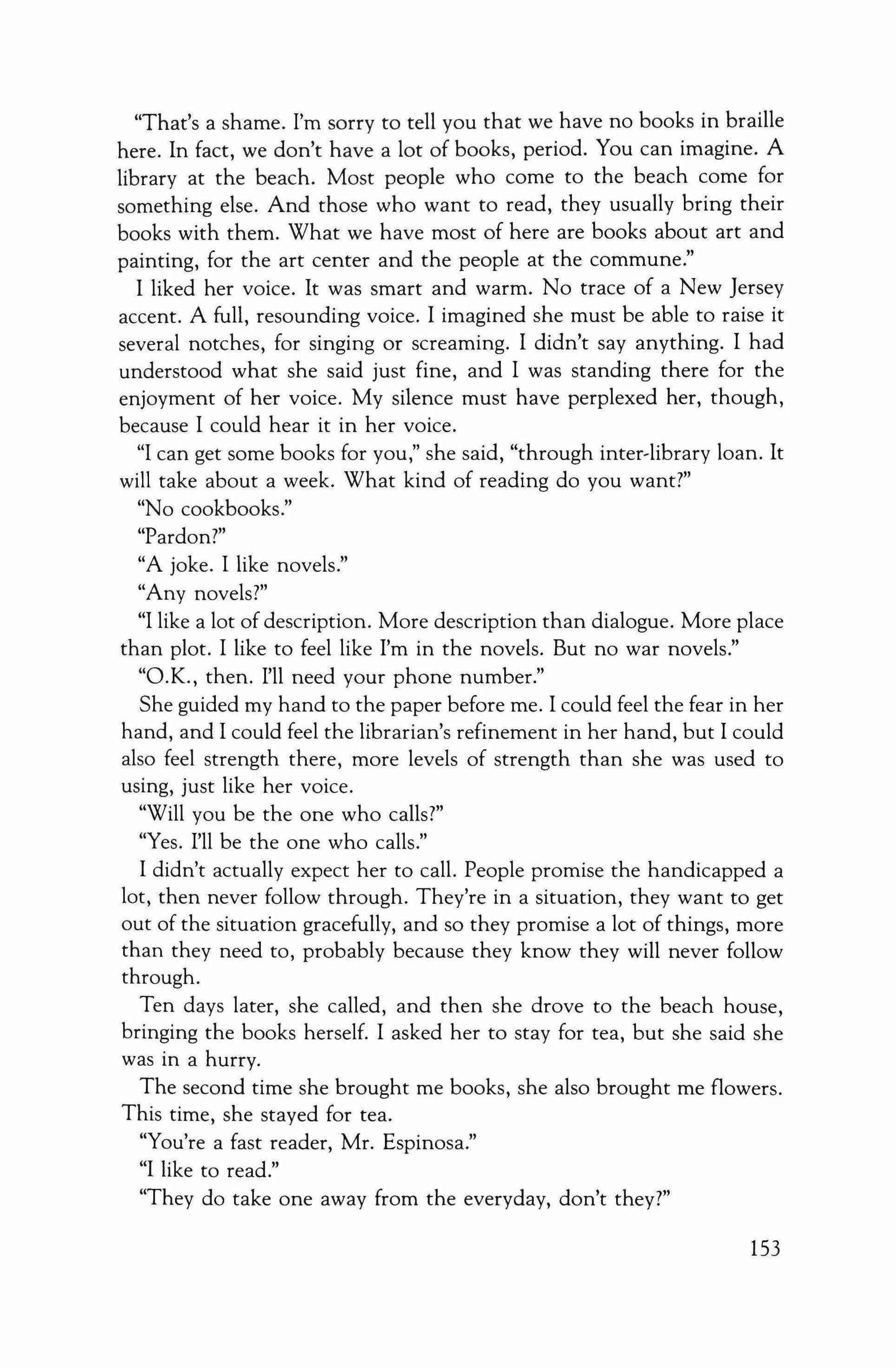
"That's a shame. I'm sorry to tell you that we have no books in braille here. In fact, we don't have a lot of books, period. You can imagine. A library at the beach. Most people who come to the beach come for something else. And those who want to read, they usually bring their books with them. What we have most of here are books about art and painting, for the art center and the people at the commune."
I liked her voice. It was smart and warm. No trace of a New Jersey accent. A full, resounding voice. I imagined she must be able to raise it several notches, for singing or screaming. I didn't say anything. I had understood what she said just fine, and I was standing there for the enjoyment of her voice. My silence must have perplexed her, though, because I could hear it in her voice.
"I can get some books for you," she said, "through inter,library loan. It will take about a week. What kind of reading do you want?"
"No cookbooks."
"Pardon?"
"A joke. I like novels."
"Any novels?"
"I like a lot of description. More description than dialogue. More place than plot. 1 like to feel like I'm in the novels. But no war novels."
"O.K., then. I'll need your phone number."
She guided my hand to the paper before me. I could feel the fear in her hand, and 1 could feel the librarian's refinement in her hand, but 1 could also feel strength there, more levels of strength than she was used to using, just like her voice.
"Will you be the one who calls?"
"Yes. I'll be the one who calls."
1 didn't actually expect her to call. People promise the handicapped a lot, then never follow through. They're in a situation, they want to get out of the situation gracefully, and so they promise a lot of things, more than they need to, probably because they know they will never follow through.
Ten days later, she called, and then she drove to the beach house, bringing the books herself. 1 asked her to stay for tea, but she said she was in a hurry.
The second time she brought me books, she also brought me flowers. This time, she stayed for tea.
"You're a fast reader, Mr. Espinosa."
"1 like to read."
"They do take one away from the everyday, don't they?"
153
I was glad she said something stupid, because I was beginning to idolize her.
"Yes. Do you like to read, Miss Johnson?"
"Am I a librarian? Of course. I read almost as much as you do."
"What do you like to read?"
"Histories. Historical novels. Nonfiction, especially travel accounts. But no horror. No Gothic or harlequins. No science fiction. I have to read just enough of those to help the customers, but I don't read them for pleasure."
She was still nervous around me. I could tell by the way her tea cup did a skid landing on the saucer, the way she didn't have enough breath left by the ends of sentences, the way she kept shifting her weight on the sofa, as though she felt funny facing me.
I wanted to ask her something, something about erotic books, but then I didn't dare, and the tension in the room from not asking made the room feel taut. But then, when Miss Johnson left, the room went slack again.
That night, I awoke from a dream in cold sweats. There wasn't any content to my dream, just endless shifting patterns of colors, only they kept coagulating, chunking up, blocks of quartz and milky grayness, a flood of mushroom clouds. And I realized that if another world war were to break out, I wouldn't even know it.
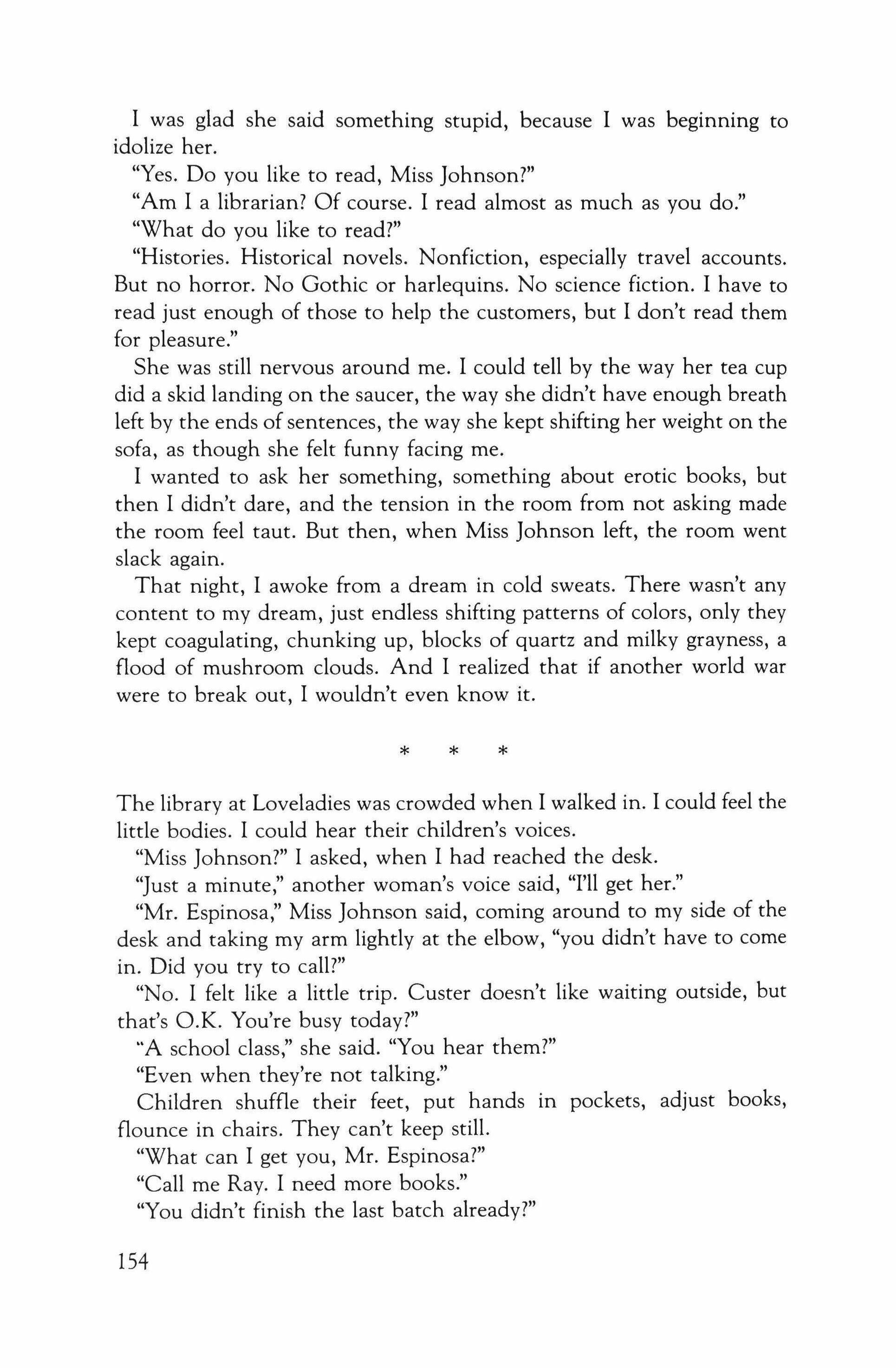
The library at Loveladies was crowded when I walked in. I could feel the little bodies. I could hear their children's voices.
"Miss Johnson?" I asked, when I had reached the desk.
"Just a minute," another woman's voice said, "I'll get her."
"Mr. Espinosa," Miss Johnson said, coming around to my side of the desk and taking my arm lightly at the elbow, "you didn't have to come in. Did you try to call?"
"No. I felt like a little trip. Custer doesn't like waiting outside, but that's O.K. You're busy today?"
"A school class," she said. "You hear them?"
"Even when they're not talking."
Children shuffle their feet, put hands in pockets, adjust books, flounce in chairs. They can't keep still.
"What can I get you, Mr. Espinosa?"
"Call me Ray. I need more books."
"You didn't finish the last batch already?"
* * *
154
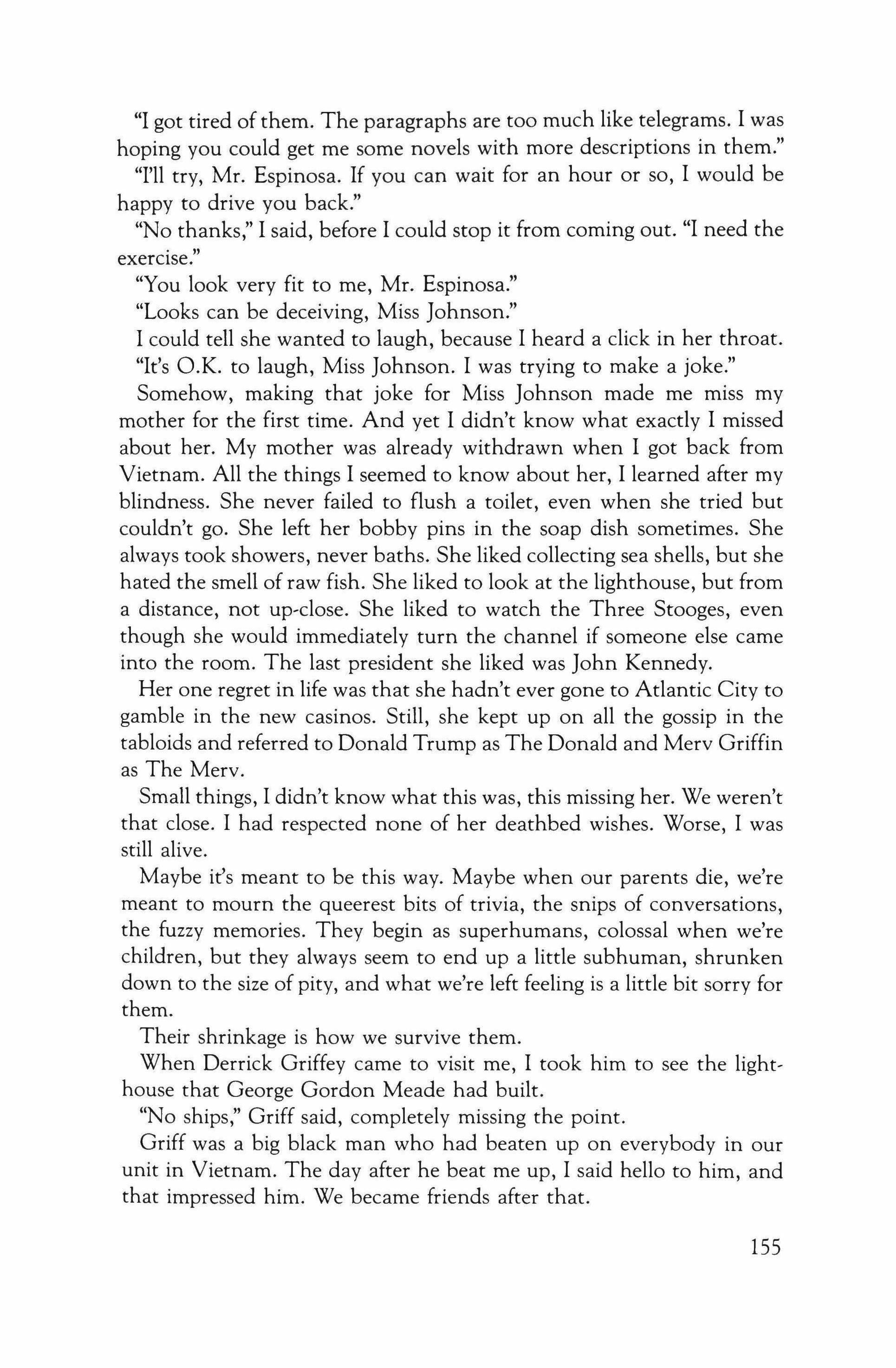
"I got tired ofthem. The paragraphs are too much like telegrams. I was hoping you could get me some novels with more descriptions in them."
"I'll try, Mr. Espinosa. If you can wait for an hour or so, I would be happy to drive you back."
"No thanks," I said, before I could stop it from coming out. "I need the exercise."
"You look very fit to me, Mr. Espinosa."
"Looks can be deceiving, Miss Johnson."
I could tell she wanted to laugh, because I heard a click in her throat.
"It's O.K. to laugh, Miss Johnson. I was trying to make a joke."
Somehow, making that joke for Miss Johnson made me miss my mother for the first time. And yet I didn't know what exactly I missed about her. My mother was already withdrawn when I got back from Vietnam. All the things I seemed to know about her, I learned after my blindness. She never failed to flush a toilet, even when she tried but couldn't go. She left her bobby pins in the soap dish sometimes. She always took showers, never baths. She liked collecting sea shells, but she hated the smell of raw fish. She liked to look at the lighthouse, but from a distance, not up-close. She liked to watch the Three Stooges, even though she would immediately turn the channel if someone else came into the room. The last president she liked was John Kennedy.
Her one regret in life was that she hadn't ever gone to Atlantic City to gamble in the new casinos. Still, she kept up on all the gossip in the tabloids and referred to Donald Trump as The Donald and Merv Griffin as The Merv.
Small things, I didn't know what this was, this missing her. We weren't that close. I had respected none of her deathbed wishes. Worse, I was still alive.
Maybe it's meant to be this way. Maybe when our parents die, we're meant to mourn the queerest bits of trivia, the snips of conversations, the fuzzy memories. They begin as superhumans, colossal when we're children, but they always seem to end up a little subhuman, shrunken down to the size of pity, and what we're left feeling is a little bit sorry for them.
Their shrinkage is how we survive them.
When Derrick Griffey came to visit me, I took him to see the lighthouse that George Gordon Meade had built.
"No ships," Griff said, completely missing the point.
Griff was a big black man who had beaten up on everybody in our unit in Vietnam. The day after he beat me up, I said hello to him, and that impressed him. We became friends after that.
155
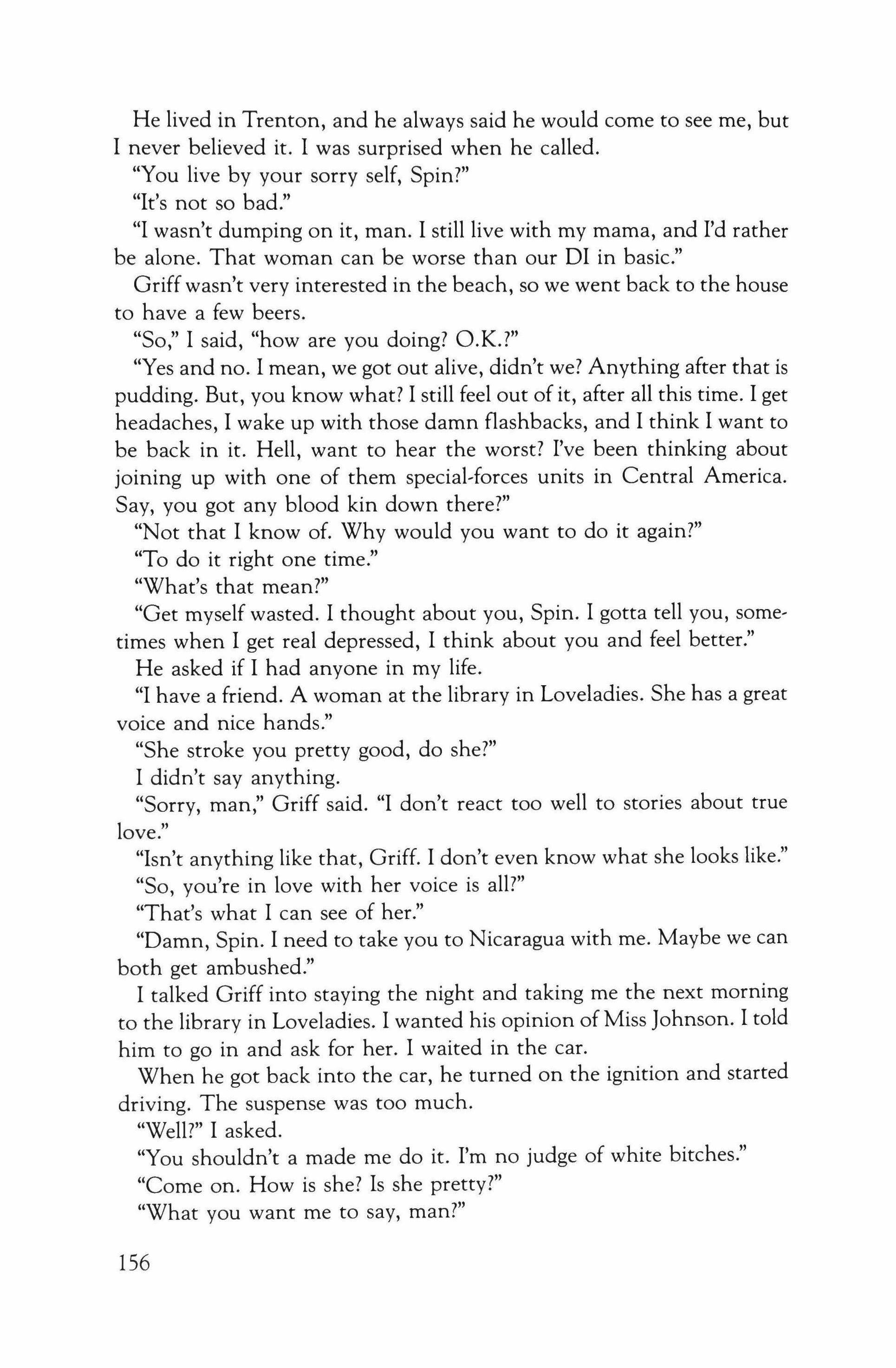
He lived in Trenton, and he always said he would come to see me, but I never believed it. I was surprised when he called.
"You live by your sorry self, Spin?"
"It's not so bad."
"I wasn't dumping on it, man. I still live with my mama, and I'd rather be alone. That woman can be worse than our 01 in basic."
Griff wasn't very interested in the beach, so we went back to the house to have a few beers.
"So," 1 said, "how are you doing? O.K.?"
"Yes and no. I mean, we got out alive, didn't we? Anything after that is pudding. But, you know what? I still feel out of it, after all this time. I get headaches, I wake up with those damn flashbacks, and I think 1 want to be back in it. Hell, want to hear the worst? I've been thinking about joining up with one of them special-forces units in Central America. Say, you got any blood kin down there?"
"Not that I know of. Why would you want to do it again?"
"To do it right one time."
"What's that mean?"
"Get myself wasted. 1 thought about you, Spin. I gotta tell you, some, times when 1 get real depressed, I think about you and feel better."
He asked if I had anyone in my life.
"I have a friend. A woman at the library in Loveladies. She has a great voice and nice hands."
"She stroke you pretty good, do she?"
I didn't say anything.
"Sorry, man," Griff said. "1 don't react too well to stories about true love."
"Isn't anything like that, Griff. 1 don't even know what she looks like."
"So, you're in love with her voice is all?"
"That's what 1 can see of her."
"Damn, Spin. 1 need to take you to Nicaragua with me. Maybe we can both get ambushed."
1 talked Griff into staying the night and taking me the next morning to the library in Loveladies. 1 wanted his opinion of Miss Johnson. 1 told him to go in and ask for her. 1 waited in the car.
When he got back into the car, he turned on the ignition and started driving. The suspense was too much.
"Well?" I asked.
"You shouldn't a made me do it. I'm no judge of white bitches."
"Come on. How is she? Is she pretty?"
"What you want me to say, man?"
156
"Quit stalling. You have to tell me."
"She isn't pretty. She isn't ugly. She's a librarian."
"What's that got to do with it?"
"I mean, she's plain, man. No bends or curves. She's straight road. Not superhighway, not dirt. She's paved, but plainly paved."
He thought he was letting me down. He wasn't. I didn't really care what she looked like, as long as her voice didn't change and her hands were steady.
Griff left after lunch. Again, he promised to call me, but this time I knew he wouldn't. I felt sorry for him. He wasn't beating up on anybody these days.
I had a dream, in which I conversed with George Gordon Meade. I asked him for his opinion of Miss Johnson.
"I'm a better judge of plow horses and dowry sows," he said.
Still, I think he was flattered that I valued his opinion after so many years.
I called the library in Loveladies.
"Miss Johnson," I said, "this is Ray."
At that point my resolve crumbled and I stopped. She waited and then spoke.
"Yes, Mr. Espinosa. What can I do?"
"Miss Johnson, would you be willing to bring me some novels that haven't been put into braille yet and read to me a little while?"
"I thought you'd never ask."
I didn't hear her. I was so prepared for a rejection that I didn't hear her.
"I would be willing to pay you for your time, of course."
"I'll pretend I didn't hear that," she said. "How is Friday night?"
"Friday night is fine."
I couldn't believe it had gone so well. It made me wonder why I hadn't asked her earlier.
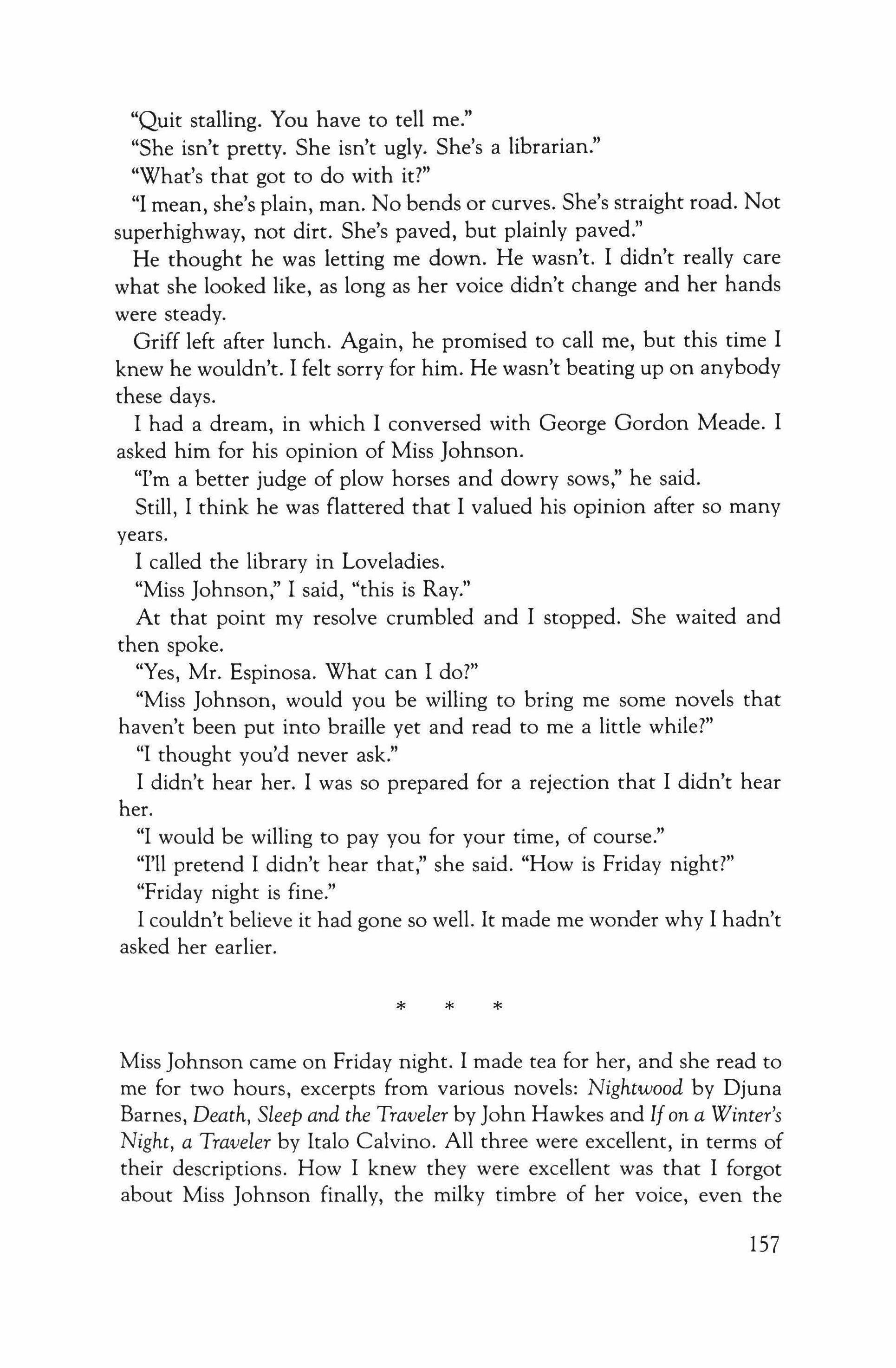
Miss Johnson came on Friday night. I made tea for her, and she read to me for two hours, excerpts from various novels: Nightwood by Djuna Barnes, Death, Sleep and the Traveler by John Hawkes and If on a Winter's Night, a Traveler by Italo Calvino. All three were excellent, in terms of their descriptions. How I knew they were excellent was that I forgot about Miss Johnson finally, the milky timbre of her voice, even the
* * *
157
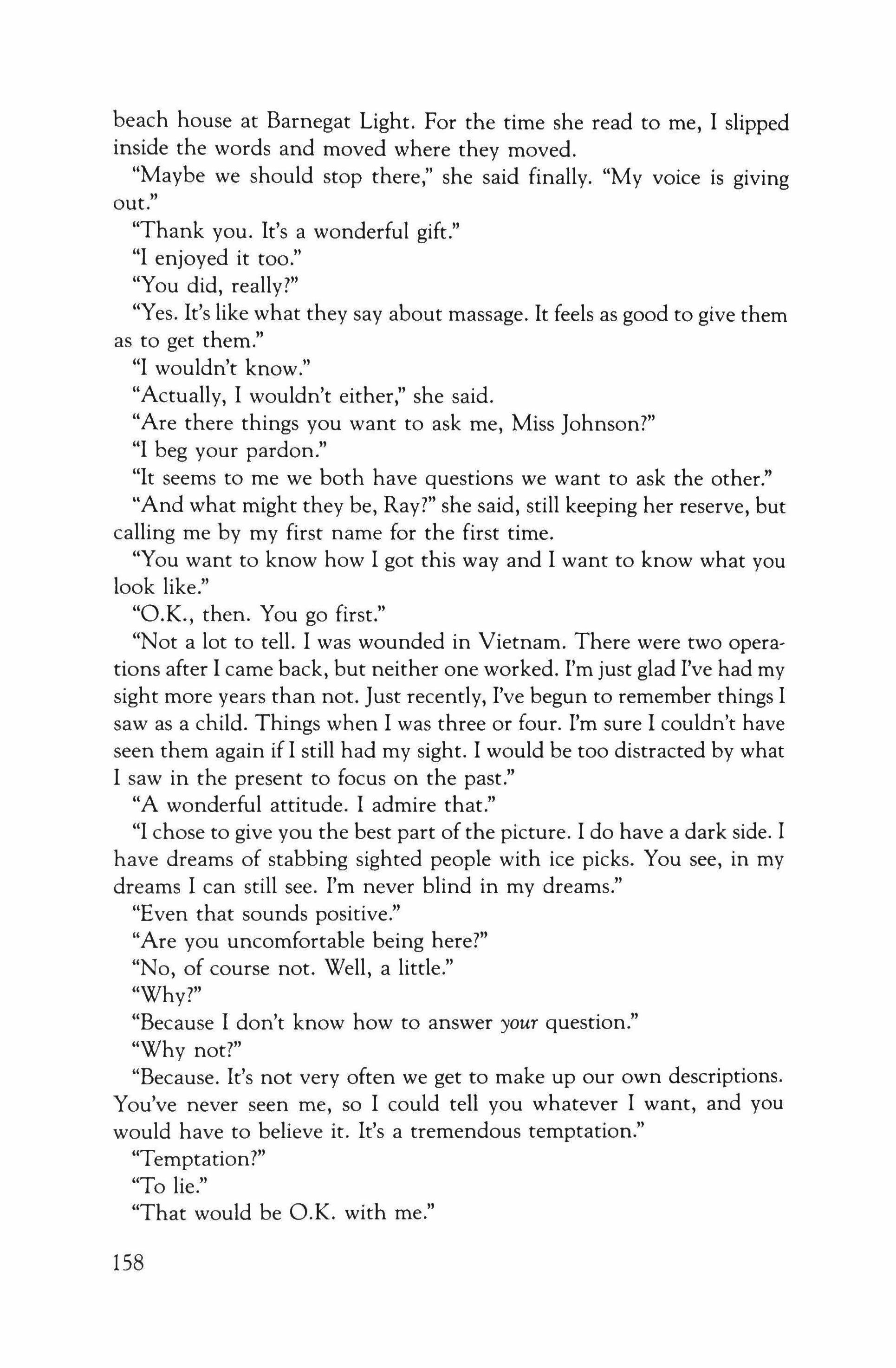
beach house at Barnegat Light. For the time she read to me, I slipped inside the words and moved where they moved.
"Maybe we should stop there," she said finally. "My voice is giving out."
"Thank you. It's a wonderful gift."
"I enjoyed it too."
"You did, really?"
"Yes. It's like what they say about massage. It feels as good to give them as to get them."
"I wouldn't know."
"Actually, I wouldn't either," she said.
"Are there things you want to ask me, Miss Johnson?"
"I beg your pardon."
"It seems to me we both have questions we want to ask the other."
"And what might they be, Ray?" she said, still keeping her reserve, but calling me by my first name for the first time.
"You want to know how I got this way and I want to know what you look like."
"O.K., then. You go first."
"Not a lot to tell. I was wounded in Vietnam. There were two operations after I came back, but neither one worked. I'm just glad I've had my sight more years than not. Just recently, I've begun to remember things I saw as a child. Things when I was three or four. I'm sure I couldn't have seen them again if I still had my sight. I would be too distracted by what I saw in the present to focus on the past."
"A wonderful attitude. I admire that."
"I chose to give you the best part of the picture. I do have a dark side. I have dreams of stabbing sighted people with ice picks. You see, in my dreams I can still see. I'm never blind in my dreams."
"Even that sounds positive."
"Are you uncomfortable being here?"
"No, of course not. Well, a little."
"Why?"
"Because I don't know how to answer your question."
"Why not?"
"Because. It's not very often we get to make up our own descriptions. You've never seen me, so I could tell you whatever I want, and you would have to believe it. It's a tremendous temptation."
"Temptation?"
"To lie."
"That would be O.K. with me."
158
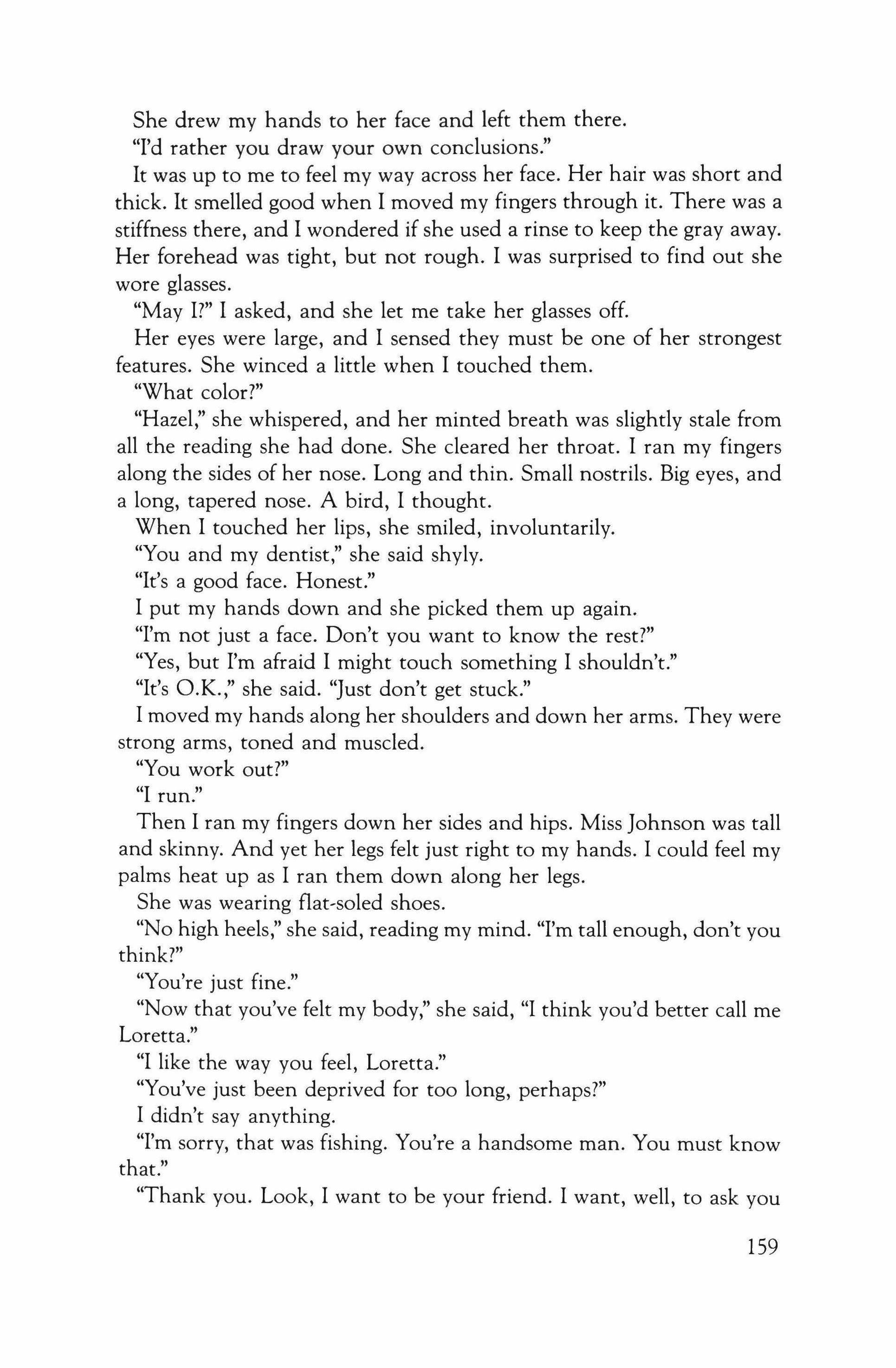
She drew my hands to her face and left them there.
"I'd rather you draw your own conclusions."
It was up to me to feel my way across her face. Her hair was short and thick. It smelled good when I moved my fingers through it. There was a stiffness there, and I wondered if she used a rinse to keep the gray away. Her forehead was tight, but not rough. I was surprised to find out she wore glasses.
"May I?" I asked, and she let me take her glasses off. Her eyes were large, and I sensed they must be one of her strongest features. She winced a little when I touched them.
"What color?"
"Hazel," she whispered, and her minted breath was slightly stale from all the reading she had done. She cleared her throat. I ran my fingers along the sides of her nose. Long and thin. Small nostrils. Big eyes, and a long, tapered nose. A bird, I thought.
When I touched her lips, she smiled, involuntarily.
"You and my dentist," she said shyly.
"It's a good face. Honest."
I put my hands down and she picked them up again.
"I'm not just a face. Don't you want to know the rest?"
"Yes, but I'm afraid I might touch something I shouldn't."
"It's O.K.," she said. "Just don't get stuck."
I moved my hands along her shoulders and down her arms. They were strong arms, toned and muscled.
"You work out?"
"I run."
Then I ran my fingers down her sides and hips. Miss Johnson was tall and skinny. And yet her legs felt just right to my hands. I could feel my palms heat up as I ran them down along her legs.
She was wearing flat-soled shoes.
"No high heels," she said, reading my mind. "I'm tall enough, don't you think?"
"You're just fine."
"Now that you've felt my body," she said, "I think you'd better call me Loretta."
"I like the way you feel, Loretta."
"You've just been deprived for too long, perhaps?"
I didn't say anything.
"I'm sorry, that was fishing. You're a handsome man. You must know that."
"Thank you. Look, I want to be your friend. I want, well, to ask you
159
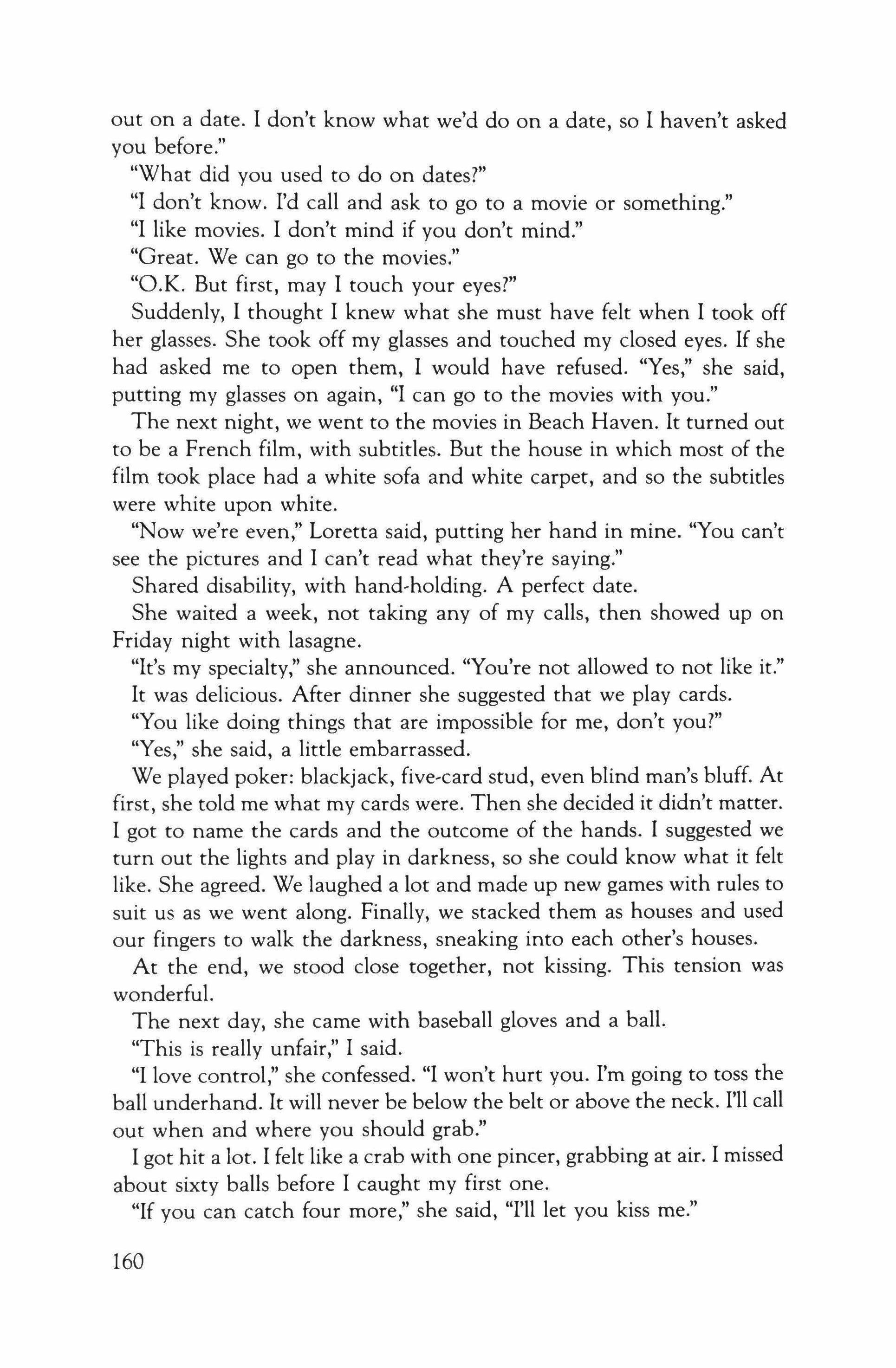
out on a date. I don't know what we'd do on a date, so I haven't asked you before."
"What did you used to do on dates?"
"I don't know. I'd call and ask to go to a movie or something." "I like movies. I don't mind if you don't mind."
"Great. We can go to the movies."
"O.K. But first, may I touch your eyes?"
Suddenly, I thought I knew what she must have felt when I took off her glasses. She took off my glasses and touched my closed eyes. If she had asked me to open them, I would have refused. "Yes," she said, putting my glasses on again, "I can go to the movies with you."
The next night, we went to the movies in Beach Haven. It turned out to be a French film, with subtitles. But the house in which most of the film took place had a white sofa and white carpet, and so the subtitles were white upon white.
"Now we're even," Loretta said, putting her hand in mine. "You can't see the pictures and I can't read what they're saying."
Shared disability, with hand-holding. A perfect date.
She waited a week, not taking any of my calls, then showed up on Friday night with lasagne.
"It's my specialty," she announced. "You're not allowed to not like it."
It was delicious. After dinner she suggested that we play cards.
"You like doing things that are impossible for me, don't you?"
"Yes," she said, a little embarrassed.
We played poker: blackjack, five-card stud, even blind man's bluff. At first, she told me what my cards were. Then she decided it didn't matter. I got to name the cards and the outcome of the hands. I suggested we turn out the lights and play in darkness, so she could know what it felt like. She agreed. We laughed a lot and made up new games with rules to suit us as we went along. Finally, we stacked them as houses and used our fingers to walk the darkness, sneaking into each other's houses.
At the end, we stood close together, not kissing. This tension was wonderful.
The next day, she came with baseball gloves and a ball.
"This is really unfair," I said.
"I love control," she confessed. "I won't hurt you. I'm going to toss the ball underhand. It will never be below the belt or above the neck. I'll call out when and where you should grab."
I got hit a lot. I felt like a crab with one pincer, grabbing at air. I missed about sixty balls before I caught my first one.
"If you can catch four more," she said, "I'll let you kiss me."
160
It must have taken two more hours for me to catch four balls. Loretta put the fourth ball in my glove, a toss of about two inches. "You're cheating," I said.
"Just impatient."
She came to me and put her mouth against mine. I let her do the kissing and was careful not to grab her or hold her or force any more kissing than she wanted.
"I get more reaction from my pillow," she said, laughing. Then I kissed her. A real kiss. Gently, I found my way to her mouth, and we stood there for a long time on that deserted beach. I showed her the lighthouse at Barnegat Light and told her about George Gordon Meade. She said she would make love to me if I climbed to the top of the lighthouse. I was too afraid to go that high without sight.
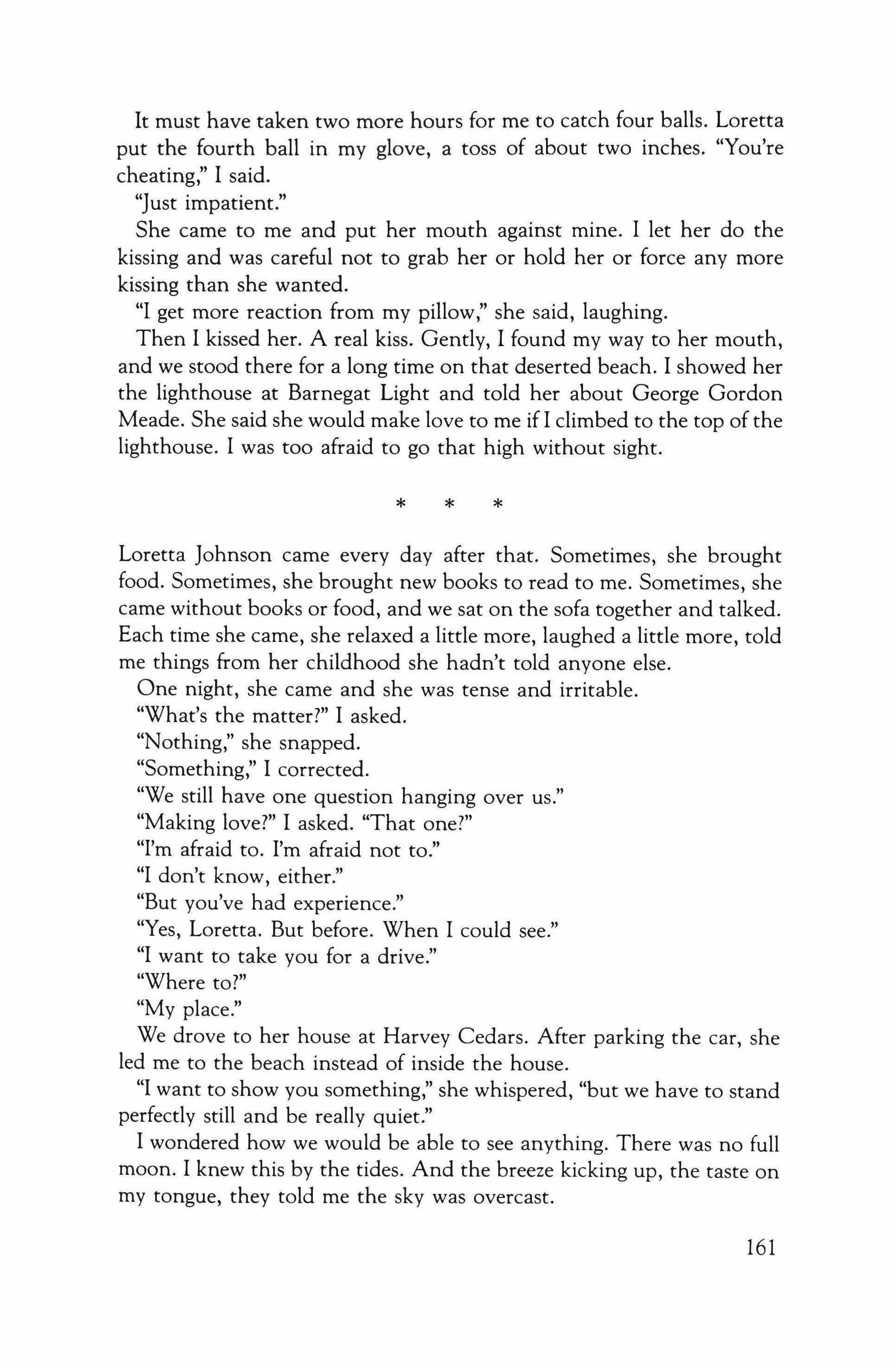
Loretta Johnson came every day after that. Sometimes, she brought food. Sometimes, she brought new books to read to me. Sometimes, she came without books or food, and we sat on the sofa together and talked. Each time she came, she relaxed a little more, laughed a little more, told me things from her childhood she hadn't told anyone else.
One night, she came and she was tense and irritable.
"What's the matter?" I asked.
"Nothing," she snapped.
"Something," I corrected.
"We still have one question hanging over us."
"Making love?" I asked. "That one?"
"I'm afraid to. I'm afraid not to."
"I don't know, either."
"But you've had experience."
"Yes, Loretta. But before. When I could see."
"I want to take you for a drive."
"Where to?"
"My place."
We drove to her house at Harvey Cedars. After parking the car, she led me to the beach instead of inside the house.
"I want to show you something," she whispered, "but we have to stand perfectly still and be really quiet."
I wondered how we would be able to see anything. There was no full moon. I knew this by the tides. And the breeze kicking up, the taste on my tongue, they told me the sky was overcast.
* * *
161
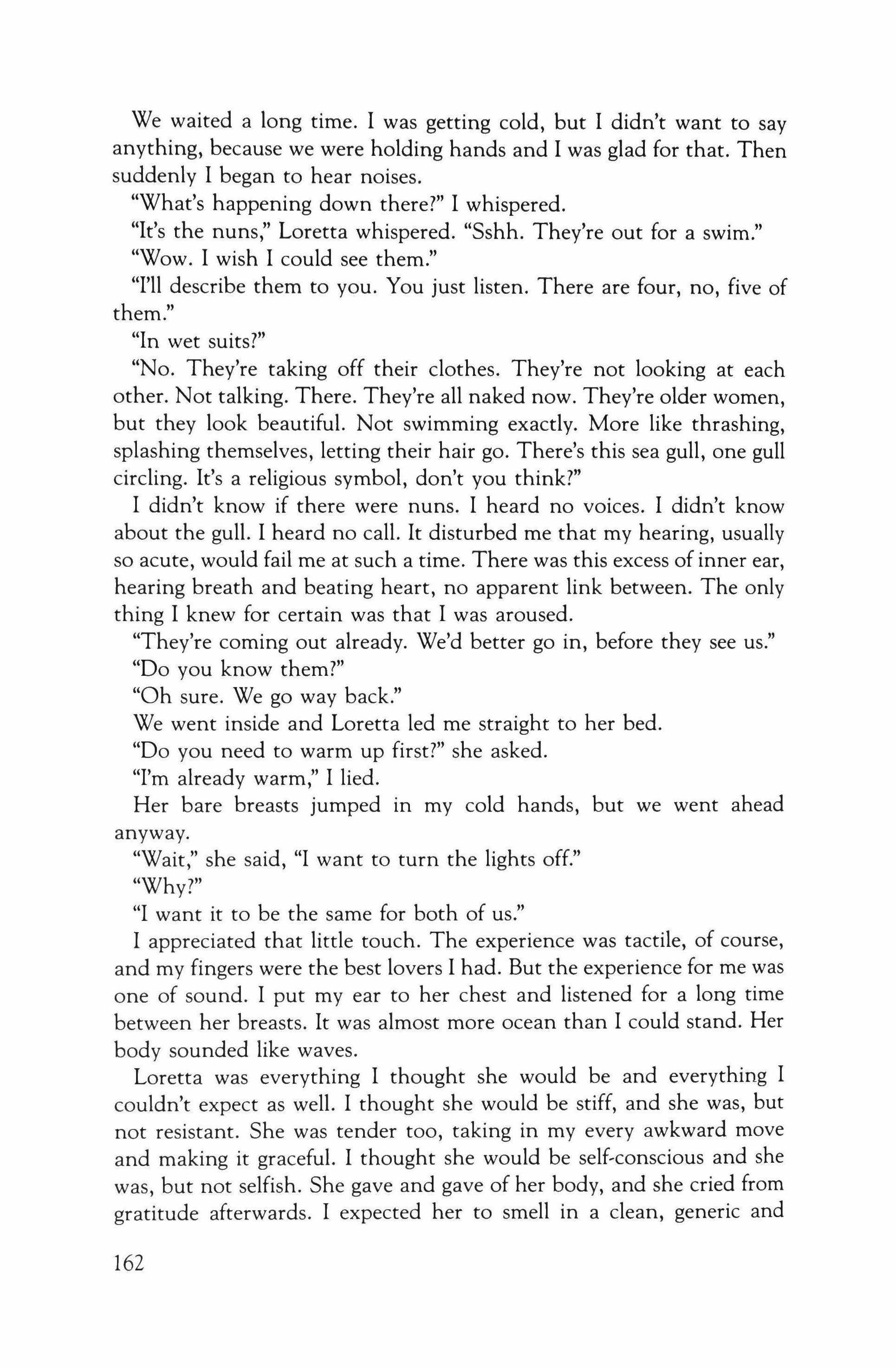
We waited a long time. I was getting cold, but I didn't want to say anything, because we were holding hands and I was glad for that. Then suddenly I began to hear noises.
"What's happening down there?" I whispered.
"It's the nuns:' Loretta whispered. "Sshh. They're out for a swim."
"Wow. I wish I could see them."
"I'll describe them to you. You just listen. There are four, no, five of them."
"In wet suits?"
"No. They're taking off their clothes. They're not looking at each other. Not talking. There. They're all naked now. They're older women, but they look beautiful. Not swimming exactly. More like thrashing, splashing themselves, letting their hair go. There's this sea gull, one gull circling. It's a religious symbol, don't you think?"
I didn't know if there were nuns. I heard no voices. I didn't know about the gull. I heard no call. It disturbed me that my hearing, usually so acute, would fail me at such a time. There was this excess of inner ear, hearing breath and beating heart, no apparent link between. The only thing I knew for certain was that I was aroused.
"They're coming out already. We'd better go in, before they see us."
"Do you know them?"
"Oh sure. We go way back."
We went inside and Loretta led me straight to her bed.
"Do you need to warm up first?" she asked.
"I'm already warm," I lied.
Her bare breasts jumped in my cold hands, but we went ahead anyway.
"Wait," she said, "I want to turn the lights off."
"Why?"
"I want it to be the same for both of us."
I appreciated that little touch. The experience was tactile, of course, and my fingers were the best lovers I had. But the experience for me was one of sound. I put my ear to her chest and listened for a long time between her breasts. It was almost more ocean than I could stand. Her body sounded like waves.
Loretta was everything I thought she would be and everything I couldn't expect as well. I thought she would be stiff, and she was, but not resistant. She was tender too, taking in my every awkward move and making it graceful. I thought she would be self-conscious and she was, but not selfish. She gave and gave of her body, and she cried from gratitude afterwards. I expected her to smell in a clean, generic and
162
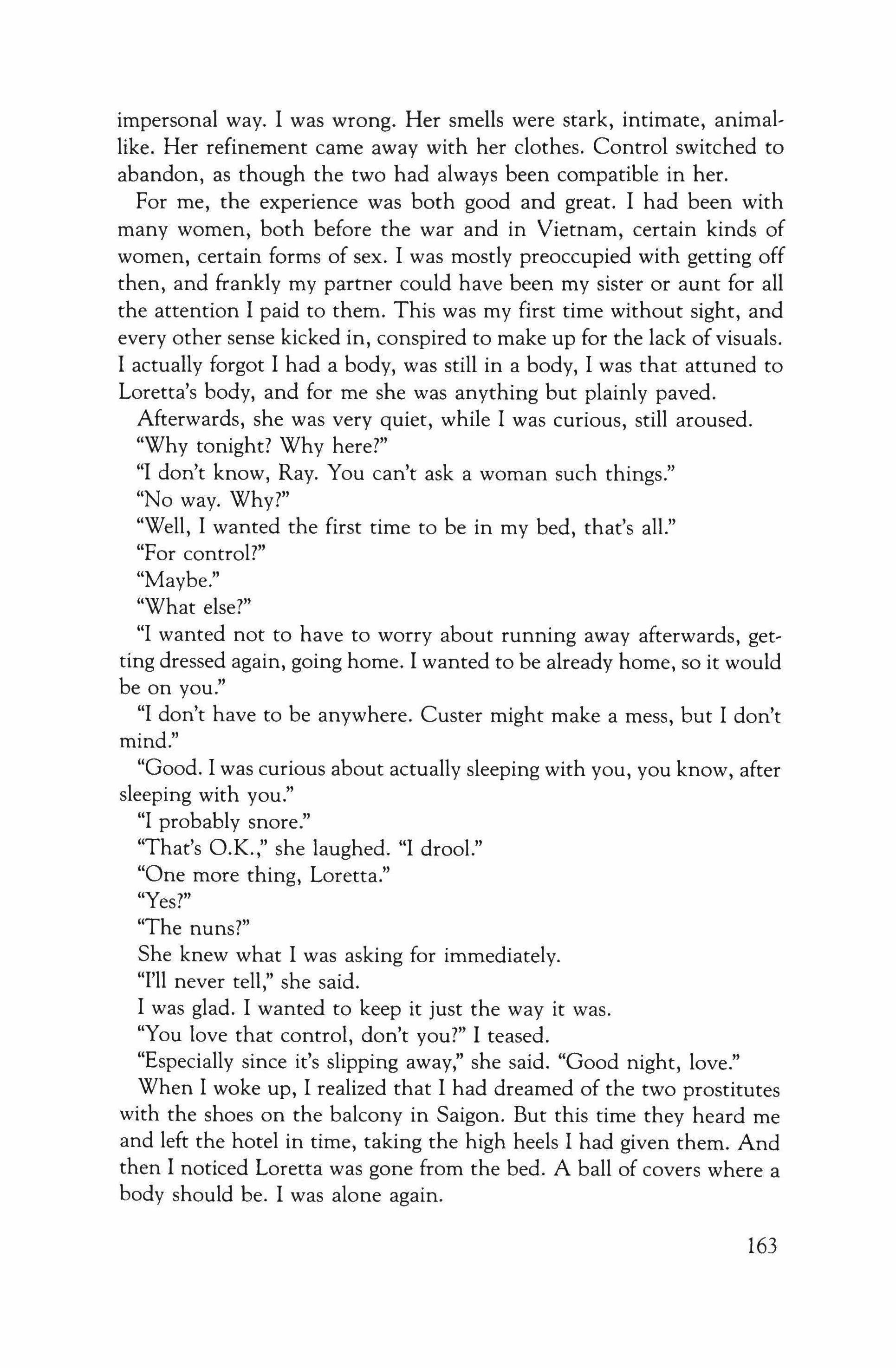
impersonal way. I was wrong. Her smells were stark, intimate, animallike. Her refinement came away with her clothes. Control switched to abandon, as though the two had always been compatible in her.
For me, the experience was both good and great. I had been with many women, both before the war and in Vietnam, certain kinds of women, certain forms of sex. I was mostly preoccupied with getting off then, and frankly my partner could have been my sister or aunt for all the attention I paid to them. This was my first time without sight, and every other sense kicked in, conspired to make up for the lack of visuals. I actually forgot I had a body, was still in a body, I was that attuned to Loretta's body, and for me she was anything but plainly paved. Afterwards, she was very quiet, while I was curious, still aroused.
"Why tonight? Why here?"
"I don't know, Ray. You can't ask a woman such things."
"No way. Why?"
"Well, I wanted the first time to be in my bed, that's al1."
"For control?"
"Maybe."
"What else?"
"I wanted not to have to worry about running away afterwards, getting dressed again, going home. I wanted to be already home, so it would be on you."
"I don't have to be anywhere. Custer might make a mess, but I don't mind."
"Good. I was curious about actually sleeping with you, you know, after sleeping with you."
"I probably snore."
"That's O.K.," she laughed. "I droo1."
"One more thing, Loretta."
"Yes?"
"The nuns?"
She knew what I was asking for immediately.
"I'll never tell," she said.
I was glad. I wanted to keep it just the way it was.
"You love that control, don't you?" I teased.
"Especially since it's slipping away," she said. "Good night, love."
When I woke up, I realized that I had dreamed of the two prostitutes with the shoes on the balcony in Saigon. But this time they heard me and left the hotel in time, taking the high heels I had given them. And then I noticed Loretta was gone from the bed. A ball of covers where a body should be. I was alone again.
163
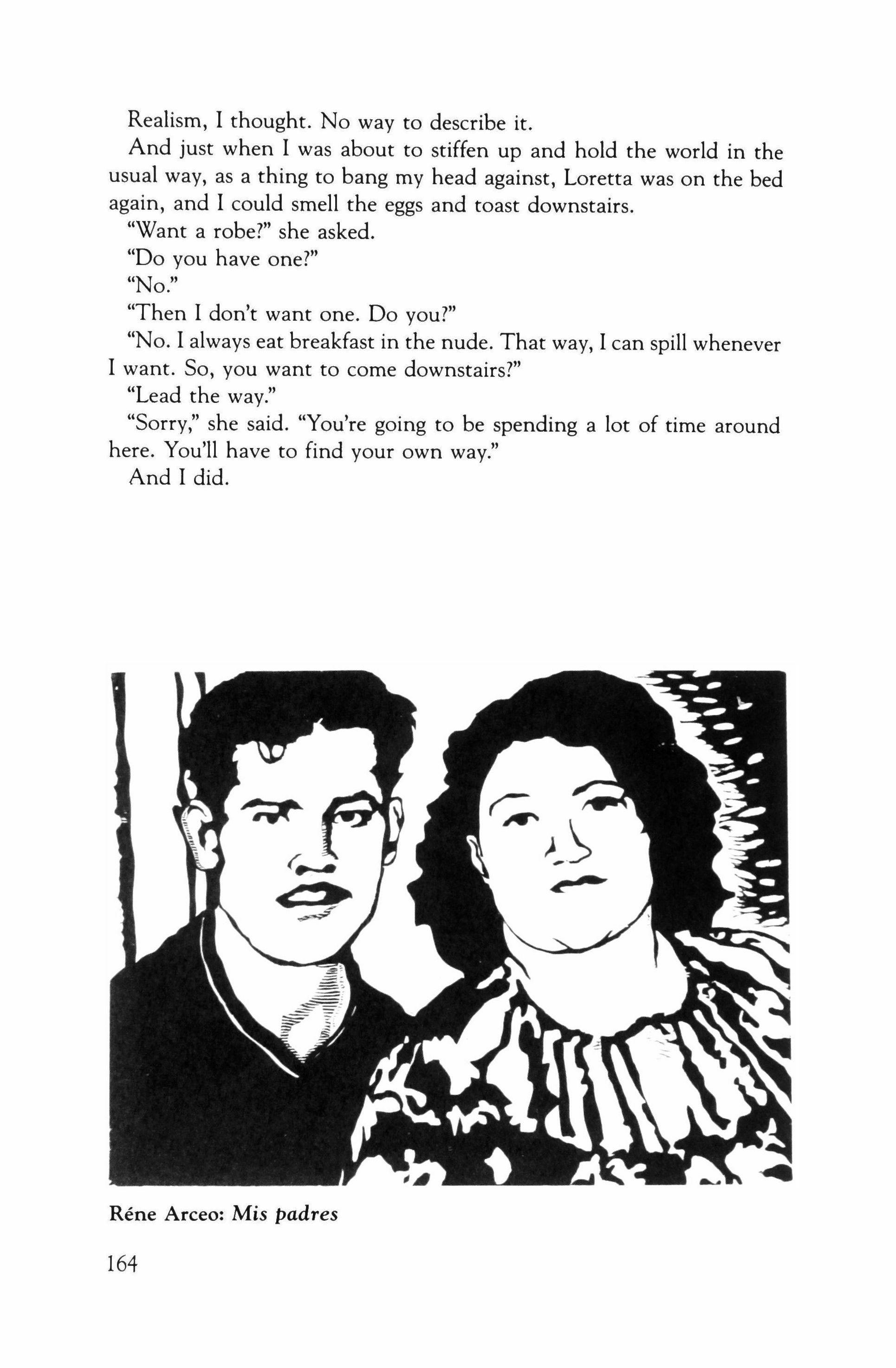
Realism, I thought. No way to describe it. And just when I was about to stiffen up and hold the world in the usual way, as a thing to bang my head against, Loretta was on the bed again, and I could smell the eggs and toast downstairs.
"Want a robe?" she asked.
"Do you have one?"
"No."
"Then I don't want one. Do you?"
"No. I always eat breakfast in the nude. That way, I can spill whenever I want. So, you want to come downstairs?"
"Lead the way."
"Sorry," she said. "You're going to be spending a lot of time around here. You'll have to find your own way." And I did.
164
Rene Arceo: Mis padres
Turk
David Michael Kaplan
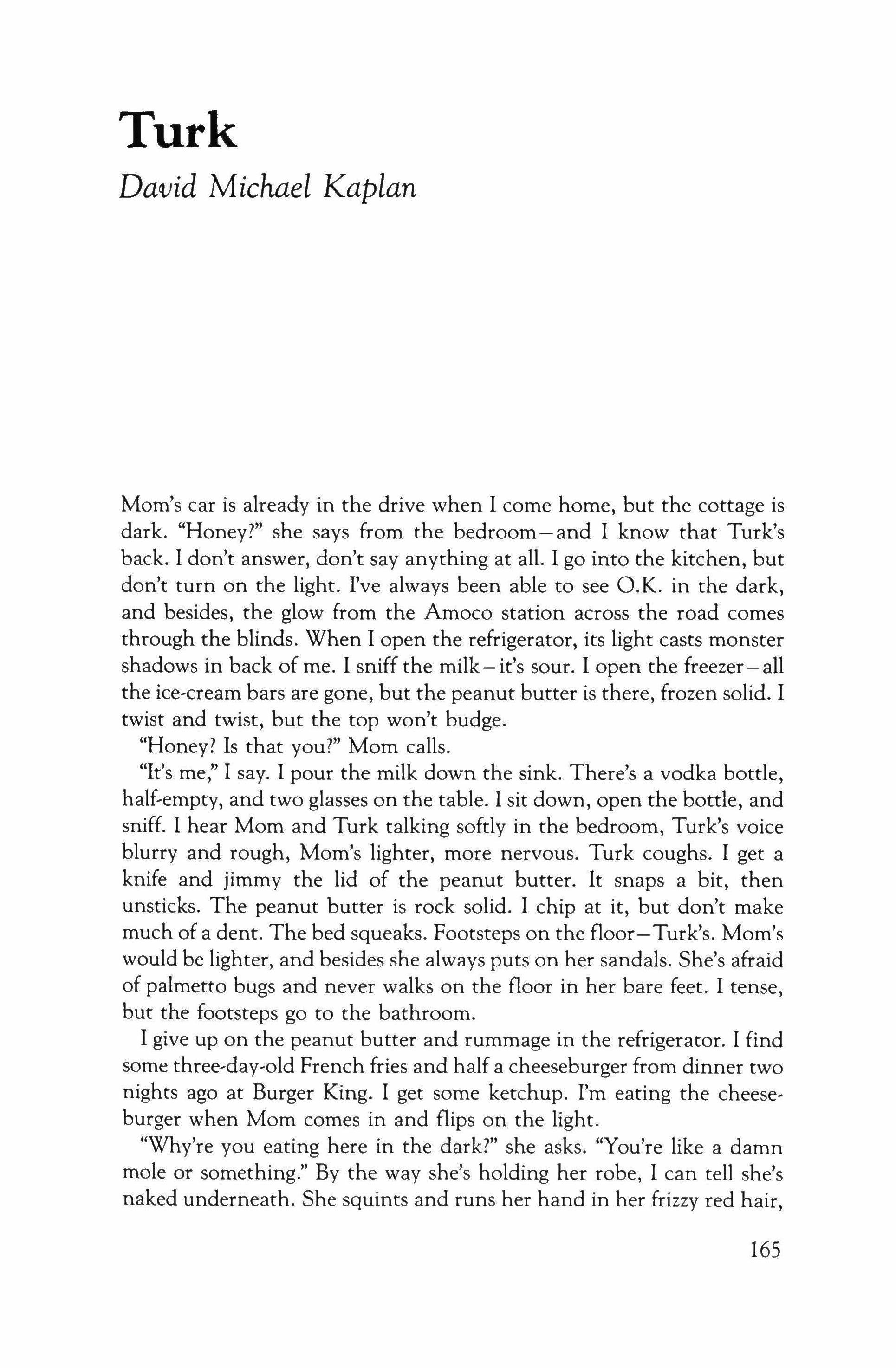
Mom's car is already in the drive when I come home, but the cottage is dark. "Honey?" she says from the bedroom-and I know that Turk's back. I don't answer, don't say anything at all. I go into the kitchen, but don't turn on the light. I've always been able to see O.K. in the dark, and besides, the glow from the Amoco station across the road comes through the blinds. When I open the refrigerator, its light casts monster shadows in back of me. I sniff the milk-it's sour. I open the freezer-all the ice-cream bars are gone, but the peanut butter is there, frozen solid. I twist and twist, but the top won't budge.
"Honey? Is that you?" Mom calls.
"It's me," I say. I pour the milk down the sink. There's a vodka bottle, half-empty, and two glasses on the table. I sit down, open the bottle, and sniff. I hear Mom and Turk talking softly in the bedroom, Turk's voice blurry and rough, Mom's lighter, more nervous. Turk coughs. I get a knife and jimmy the lid of the peanut butter. It snaps a bit, then unsticks. The peanut butter is rock solid. I chip at it, but don't make much of a dent. The bed squeaks. Footsteps on the floor-Turk's. Mom's would be lighter, and besides she always puts on her sandals. She's afraid of palmetto bugs and never walks on the floor in her bare feet. I tense, but the footsteps go to the bathroom.
I give up on the peanut butter and rummage in the refrigerator. I find some three-day-old French fries and half a cheeseburger from dinner two nights ago at Burger King. I get some ketchup. I'm eating the cheeseburger when Mom comes in and flips on the light.
"Why're you eating here in the dark?" she asks. "You're like a damn mole or something." By the way she's holding her robe, I can tell she's naked underneath. She squints and runs her hand in her frizzy red hair,
165
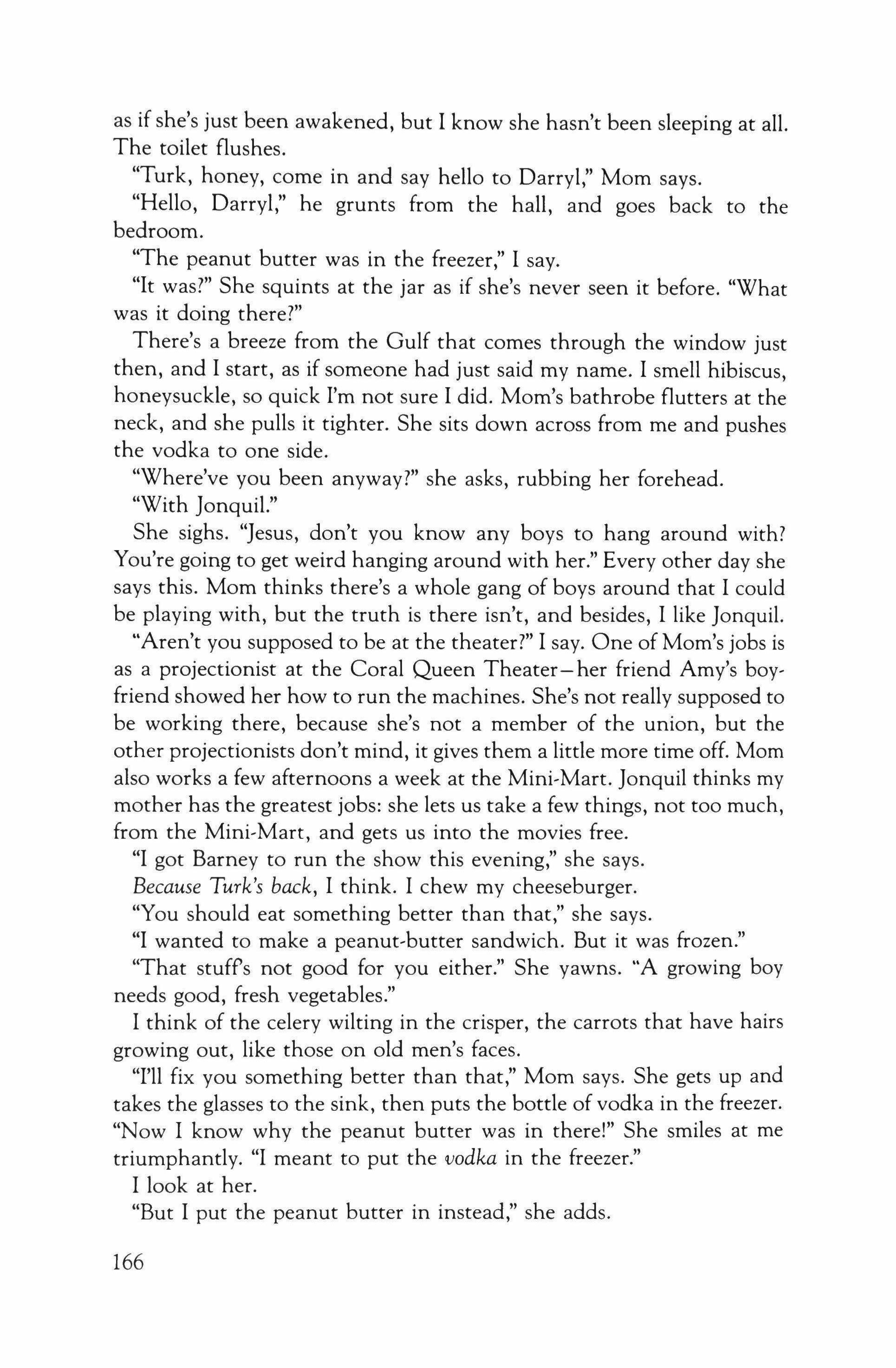
as if she's just been awakened, but I know she hasn't been sleeping at all. The toilet flushes.
"Turk, honey, come in and say hello to Darryl," Mom says.
"Hello, Darryl," he grunts from the hall, and goes back to the bedroom.
"The peanut butter was in the freezer," I say. "It was?" She squints at the jar as if she's never seen it before. "What was it doing there?"
There's a breeze from the Gulf that comes through the window just then, and I start, as if someone had just said my name. I smell hibiscus, honeysuckle, so quick I'm not sure I did. Mom's bathrobe flutters at the neck, and she pulls it tighter. She sits down across from me and pushes the vodka to one side.
"Where've you been anyway?" she asks, rubbing her forehead.
"With Jonquil."
She sighs. "Jesus, don't you know any boys to hang around with? You're going to get weird hanging around with her." Every other day she says this. Mom thinks there's a whole gang of boys around that I could be playing with, but the truth is there isn't, and besides, I like Jonquil.
"Aren't you supposed to be at the theater?" I say. One of Mom's jobs is as a projectionist at the Coral Queen Theater-her friend Amy's boyfriend showed her how to run the machines. She's not really supposed to be working there, because she's not a member of the union, but the other projectionists don't mind, it gives them a little more time off. Mom also works a few afternoons a week at the Mini-Mart. Jonquil thinks my mother has the greatest jobs: she lets us take a few things, not too much, from the Mini-Mart, and gets us into the movies free.
"I got Barney to run the show this evening," she says.
Because Turk's back, I think. I chew my cheeseburger.
"You should eat something better than that," she says.
"I wanted to make a peanut-butter sandwich. But it was frozen."
"That stuff's not good for you either." She yawns. "A growing boy needs good, fresh vegetables."
I think of the celery wilting in the crisper, the carrots that have hairs growing out, like those on old men's faces.
"I'll fix you something better than that," Mom says. She gets up and takes the glasses to the sink, then puts the bottle of vodka in the freezer. "Now I know why the peanut butter was in there!" She smiles at me triumphantly. "I meant to put the vodka in the freezer."
I look at her.
"But I put the peanut butter in instead," she adds.
166
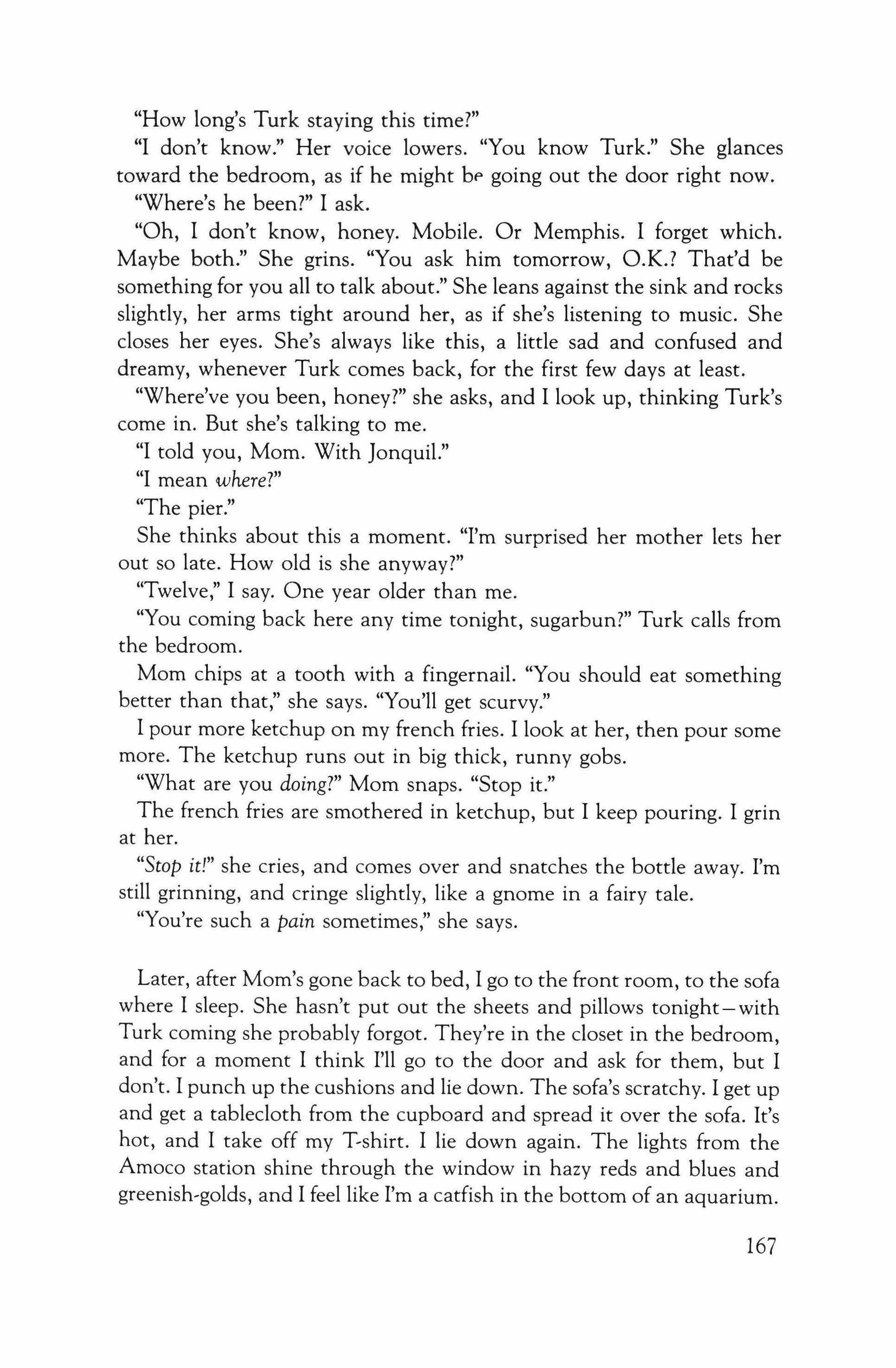
"How long's Turk staying this time?"
"I don't know." Her voice lowers. "You know Turk." She glances toward the bedroom, as if he might be going out the door right now.
"Where's he been?" I ask.
"Oh, I don't know, honey. Mobile. Or Memphis. I forget which. Maybe both." She grins. "You ask him tomorrow, O.K.? That'd be something for you all to talk about." She leans against the sink and rocks slightly, her arms tight around her, as if she's listening to music. She closes her eyes. She's always like this, a little sad and confused and dreamy, whenever Turk comes back, for the first few days at least.
"Where've you been, honey?" she asks, and I look up, thinking Turk's come in. But she's talking to me.
"I told you, Mom. With Jonquil."
"I mean where?"
"The pier."
She thinks about this a moment. "I'm surprised her mother lets her out so late. How old is she anyway?"
"Twelve," I say. One year older than me.
"You coming back here any time tonight, sugarbun?" Turk calls from the bedroom.
Mom chips at a tooth with a fingernail. "You should eat something better than that," she says. "You'll get scurvy."
I pour more ketchup on my french fries. I look at her, then pour some more. The ketchup runs out in big thick, runny gobs.
"What are you doing?" Mom snaps. "Stop it."
The french fries are smothered in ketchup, but I keep pouring. I grin at her.
"Stop it!" she cries, and comes over and snatches the bottle away. I'm still grinning, and cringe slightly, like a gnome in a fairy tale.
"You're such a pain sometimes," she says.
Later, after Mom's gone back to bed, I go to the front room, to the sofa where I sleep. She hasn't put out the sheets and pillows tonight-with Turk coming she probably forgot. They're in the closet in the bedroom, and for a moment I think I'll go to the door and ask for them, but I don't. I punch up the cushions and lie down. The sofa's scratchy. I get up and get a tablecloth from the cupboard and spread it over the sofa. It's hot, and I take off my T'shirt. I lie down again. The lights from the Amoco station shine through the window in hazy reds and blues and greenish-golds, and I feel like I'm a catfish in the bottom of an aquarium.
167
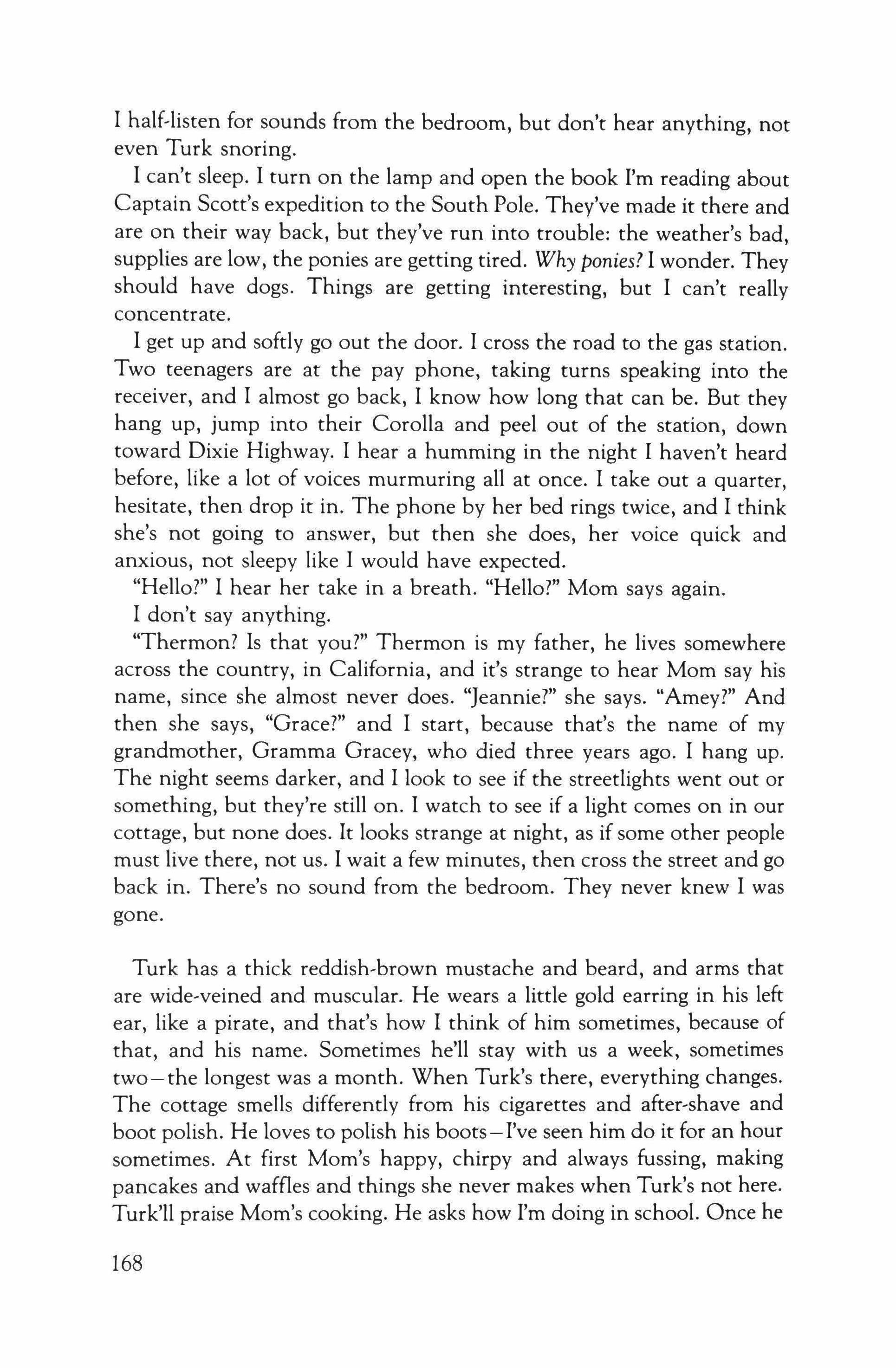
I half-listen for sounds from the bedroom, but don't hear anything, not even Turk snoring.
I can't sleep. I turn on the lamp and open the book I'm reading about Captain Scott's expedition to the South Pole. They've made it there and are on their way back, but they've run into trouble: the weather's bad, supplies are low, the ponies are getting tired. Why ponies? I wonder. They should have dogs. Things are getting interesting, but I can't really concentrate.
I get up and softly go out the door. I cross the road to the gas station. Two teenagers are at the pay phone, taking turns speaking into the receiver, and I almost go back, I know how long that can be. But they hang up, jump into their Corolla and peel out of the station, down toward Dixie Highway. I hear a humming in the night I haven't heard before, like a lot of voices murmuring all at once. I take out a quarter, hesitate, then drop it in. The phone by her bed rings twice, and I think she's not going to answer, but then she does, her voice quick and anxious, not sleepy like I would have expected.
"Hello?" I hear her take in a breath. "Hello?" Mom says again.
I don't say anything.
"Thermon? Is that you?" Thermon is my father, he lives somewhere across the country, in California, and it's strange to hear Mom say his name, since she almost never does. "Jeannie?" she says. "Arney?" And then she says, "Grace?" and I start, because that's the name of my grandmother, Gramma Gracey, who died three years ago. I hang up. The night seems darker, and I look to see if the streetlights went out or something, but they're still on. I watch to see if a light comes on in our cottage, but none does. It looks strange at night, as if some other people must live there, not us. I wait a few minutes, then cross the street and go back in. There's no sound from the bedroom. They never knew I was gone.
Turk has a thick reddish-brown mustache and beard, and arms that are wide-veined and muscular. He wears a little gold earring in his left ear, like a pirate, and that's how I think of him sometimes, because of that, and his name. Sometimes he'll stay with us a week, sometimes two-the longest was a month. When Turk's there, everything changes. The cottage smells differently from his cigarettes and after-shave and boot polish. He loves to polish his boots-I've seen him do it for an hour sometimes. At first Mom's happy, chirpy and always fussing, making pancakes and waffles and things she never makes when Turk's not here. Turk'll praise Mom's cooking. He asks how I'm doing in school. Once he
168
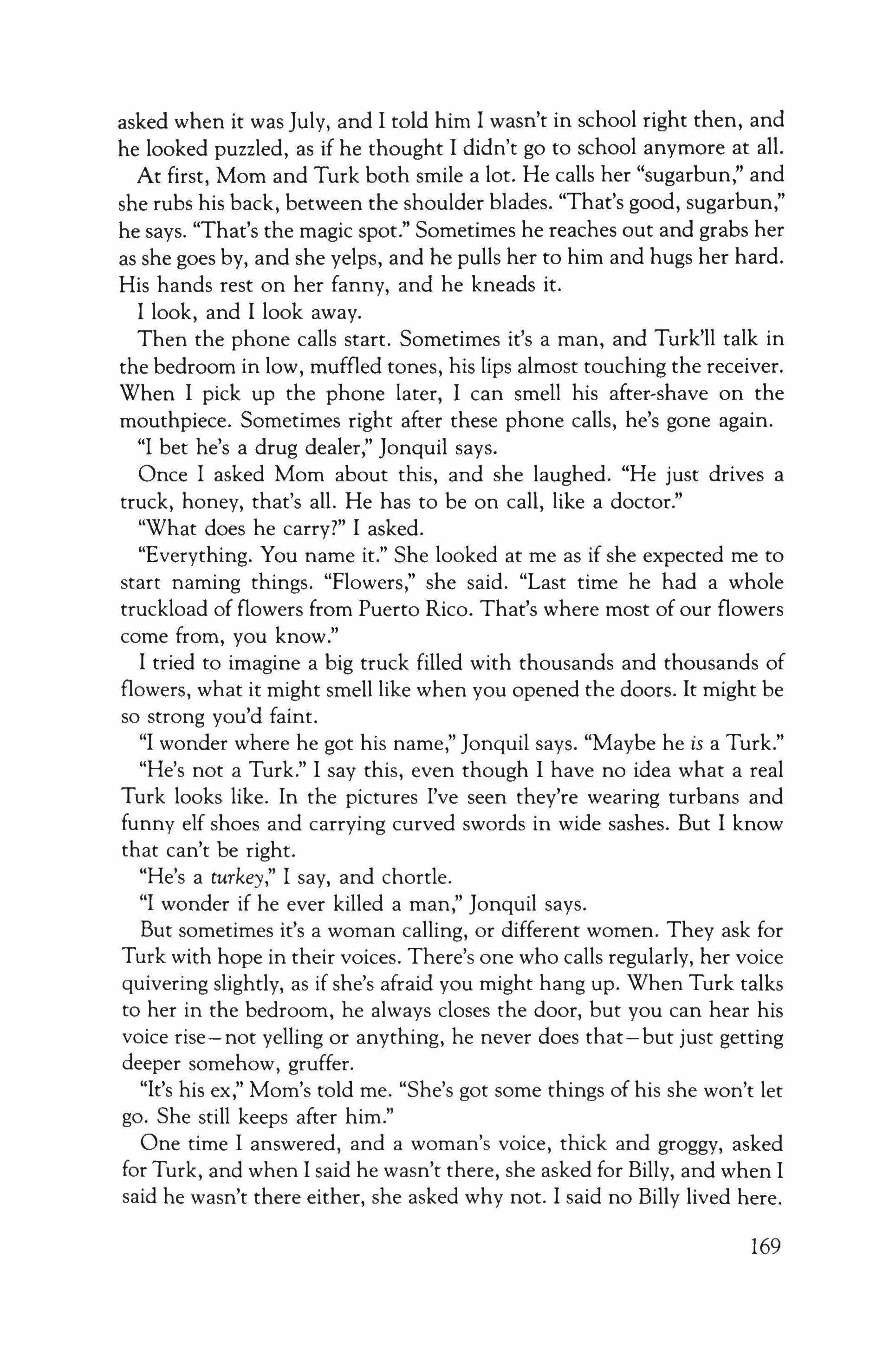
asked when it was July, and I told him I wasn't in school right then, and he looked puzzled, as if he thought I didn't go to school anymore at all.
At first, Mom and Turk both smile a lot. He calls her "sugarbun," and she rubs his back, between the shoulder blades. "That's good, sugarbun," he says. "That's the magic spot." Sometimes he reaches out and grabs her as she goes by, and she yelps, and he pulls her to him and hugs her hard. His hands rest on her fanny, and he kneads it.
I look, and I look away.
Then the phone calls start. Sometimes it's a man, and Turk'll talk in the bedroom in low, muffled tones, his lips almost touching the receiver. When I pick up the phone later, I can smell his after-shave on the mouthpiece. Sometimes right after these phone calls, he's gone again.
"I bet he's a drug dealer," Jonquil says.
Once I asked Mom about this, and she laughed. "He just drives a truck, honey, that's all. He has to be on call, like a doctor."
"What does he carry?" I asked.
"Everything. You name it." She looked at me as if she expected me to start naming things. "Flowers," she said. "Last time he had a whole truckload of flowers from Puerto Rico. That's where most of our flowers come from, you know."
I tried to imagine a big truck filled with thousands and thousands of flowers, what it might smell like when you opened the doors. It might be so strong you'd faint.
"I wonder where he got his name," Jonquil says. "Maybe he is a Turk."
"He's not a Turk." I say this, even though I have no idea what a real Turk looks like. In the pictures I've seen they're wearing turbans and funny elf shoes and carrying curved swords in wide sashes. But I know that can't be right.
"He's a turkey," I say, and chortle.
"I wonder if he ever killed a man," Jonquil says.
But sometimes it's a woman calling, or different women. They ask for Turk with hope in their voices. There's one who calls regularly, her voice quivering slightly, as if she's afraid you might hang up. When Turk talks to her in the bedroom, he always closes the door, but you can hear his voice rise - not yelling or anything, he never does that - but just getting deeper somehow, gruffer.
"It's his ex," Mom's told me. "She's got some things of his she won't let go. She still keeps after him."
One time I answered, and a woman's voice, thick and groggy, asked for Turk, and when I said he wasn't there, she asked for Billy, and when I said he wasn't there either, she asked why not. I said no Billy lived here.
169
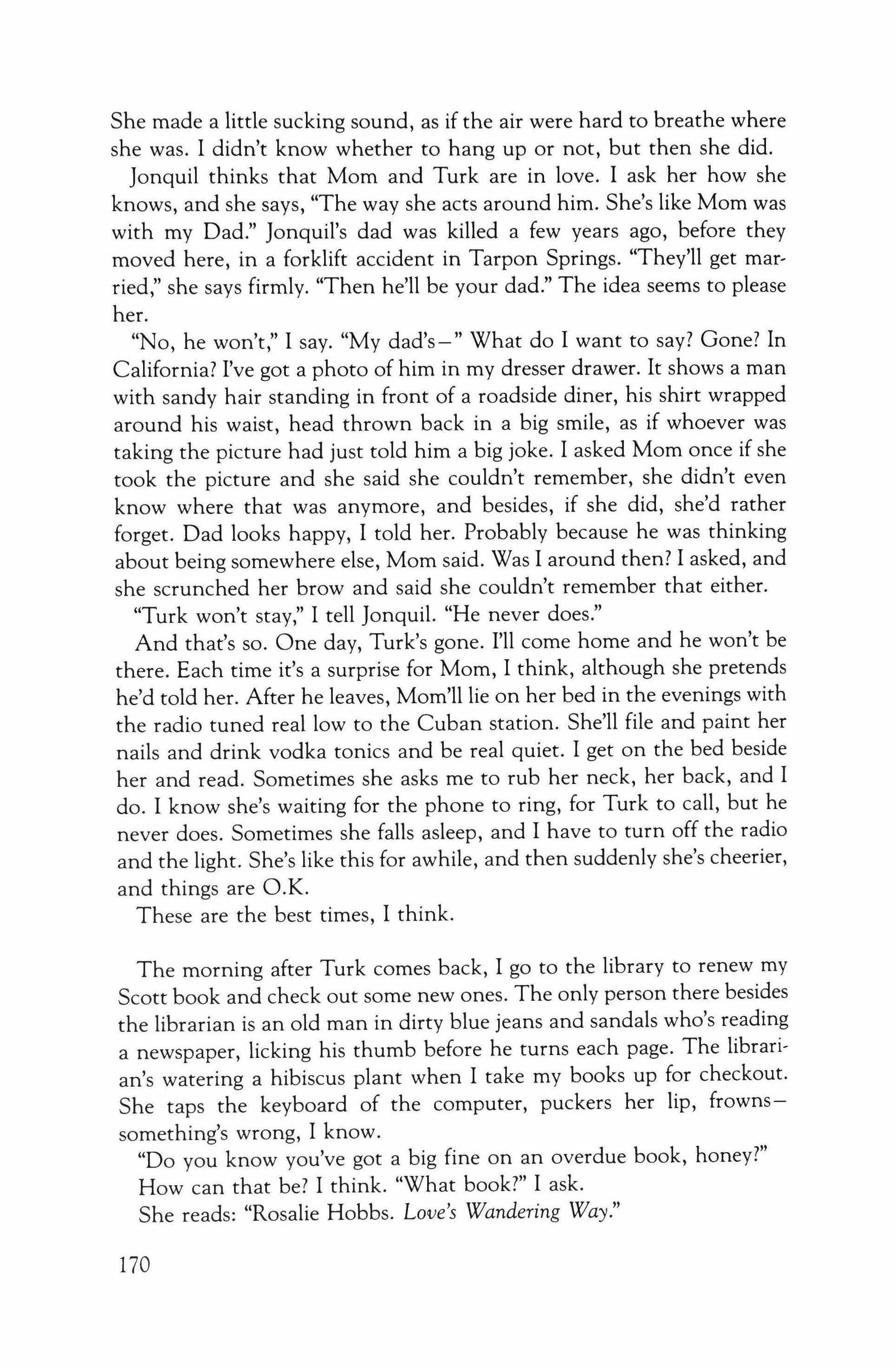
She made a little sucking sound, as if the air were hard to breathe where she was. I didn't know whether to hang up or not, but then she did.
Jonquil thinks that Mom and Turk are in love. I ask her how she knows, and she says, "The way she acts around him. She's like Mom was with my Dad." Jonquil's dad was killed a few years ago, before they moved here, in a forklift accident in Tarpon Springs. "They'll get married," she says firmly. "Then he'll be your dad." The idea seems to please her.
"No, he won't," I say. "My dad's-" What do I want to say? Gone? In California? I've got a photo of him in my dresser drawer. It shows a man with sandy hair standing in front of a roadside diner, his shirt wrapped around his waist, head thrown back in a big smile, as if whoever was taking the picture had just told him a big joke. I asked Mom once if she took the picture and she said she couldn't remember, she didn't even know where that was anymore, and besides, if she did, she'd rather forget. Dad looks happy, I told her. Probably because he was thinking about being somewhere else, Mom said. Was I around then? I asked, and she scrunched her brow and said she couldn't remember that either.
"Turk won't stay," I tell Jonquil. "He never does."
And that's so. One day, Turk's gone. I'll come home and he won't be there. Each time it's a surprise for Mom, I think, although she pretends he'd told her. After he leaves, Mom'lllie on her bed in the evenings with the radio tuned real low to the Cuban station. She'll file and paint her nails and drink vodka tonics and be real quiet. I get on the bed beside her and read. Sometimes she asks me to rub her neck, her back, and I do. I know she's waiting for the phone to ring, for Turk to call, but he never does. Sometimes she falls asleep, and I have to turn off the radio and the light. She's like this for awhile, and then suddenly she's cheerier, and things are O.K.
These are the best times, I think.
The morning after Turk comes back, I go to the library to renew my Scott book and check out some new ones. The only person there besides the librarian is an old man in dirty blue jeans and sandals who's reading a newspaper, licking his thumb before he turns each page. The librarian's watering a hibiscus plant when I take my books up for checkout. She taps the keyboard of the computer, puckers her lip, frownssomething's wrong, I know.
"Do you know you've got a big fine on an overdue book, honey?"
How can that be? I think. "What book?" I ask. She reads: "Rosalie Hobbs. Love's Wandering Way."
170
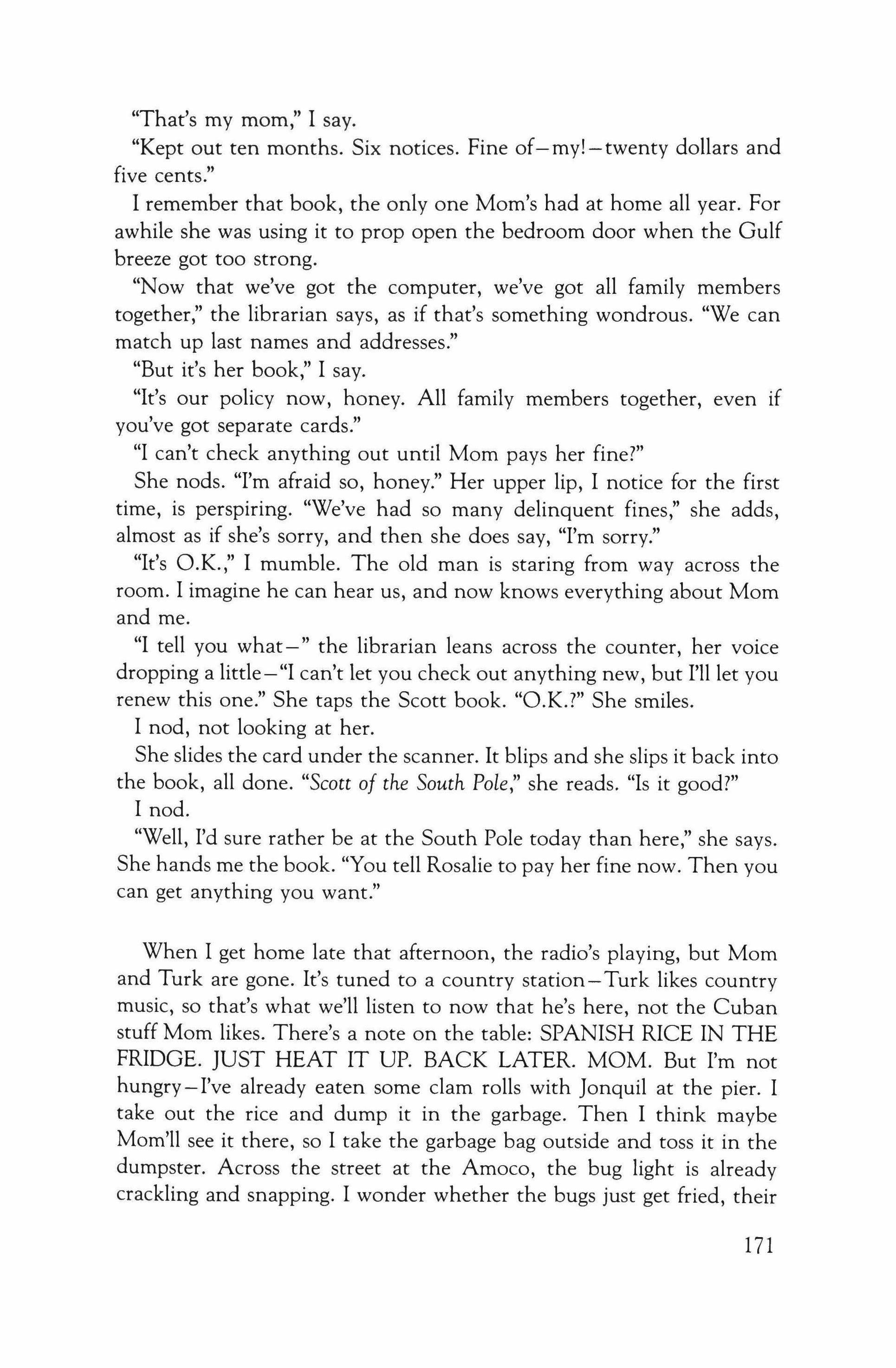
"That's my mom," I say.
"Kept out ten months. Six notices. Fine of-my!-twenty dollars and five cents."
I remember that book, the only one Mom's had at home all year. For awhile she was using it to prop open the bedroom door when the Gulf breeze got too strong.
"Now that we've got the computer, we've got all family members together," the librarian says, as if that's something wondrous. "We can match up last names and addresses."
"But it's her book," I say.
"It's our policy now, honey. All family members together, even if you've got separate cards."
"I can't check anything out until Mom pays her fine?"
She nods. "I'm afraid so, honey." Her upper lip, I notice for the first time, is perspiring. "We've had so many delinquent fines," she adds, almost as if she's sorry, and then she does say, "I'm sorry."
"It's O.K.," I mumble. The old man is staring from way across the room. I imagine he can hear us, and now knows everything about Mom and me.
"I tell you what-" the librarian leans across the counter, her voice dropping a little-"I can't let you check out anything new, but I'll let you renew this one." She taps the Scott book. "O.K.?" She smiles. I nod, not looking at her.
She slides the card under the scanner. It blips and she slips it back into the book, all done. "Scott of the South Pole," she reads. "Is it good?" I nod.
"Well, I'd sure rather be at the South Pole today than here," she says. She hands me the book. "You tell Rosalie to pay her fine now. Then you can get anything you want."
When I get home late that afternoon, the radio's playing, but Mom and Turk are gone. It's tuned to a country station-Turk likes country music, so that's what we'll listen to now that he's here, not the Cuban stuff Mom likes. There's a note on the table: SPANISH RICE IN THE FRIDGE. JUST HEAT IT UP. BACK LATER. MOM. But I'm not hungry-I've already eaten some clam rolls with Jonquil at the pier. I take out the rice and dump it in the garbage. Then I think maybe Mom'll see it there, so I take the garbage bag outside and toss it in the dumpster. Across the street at the Amoco, the bug light is already crackling and snapping. I wonder whether the bugs just get fried, their
171
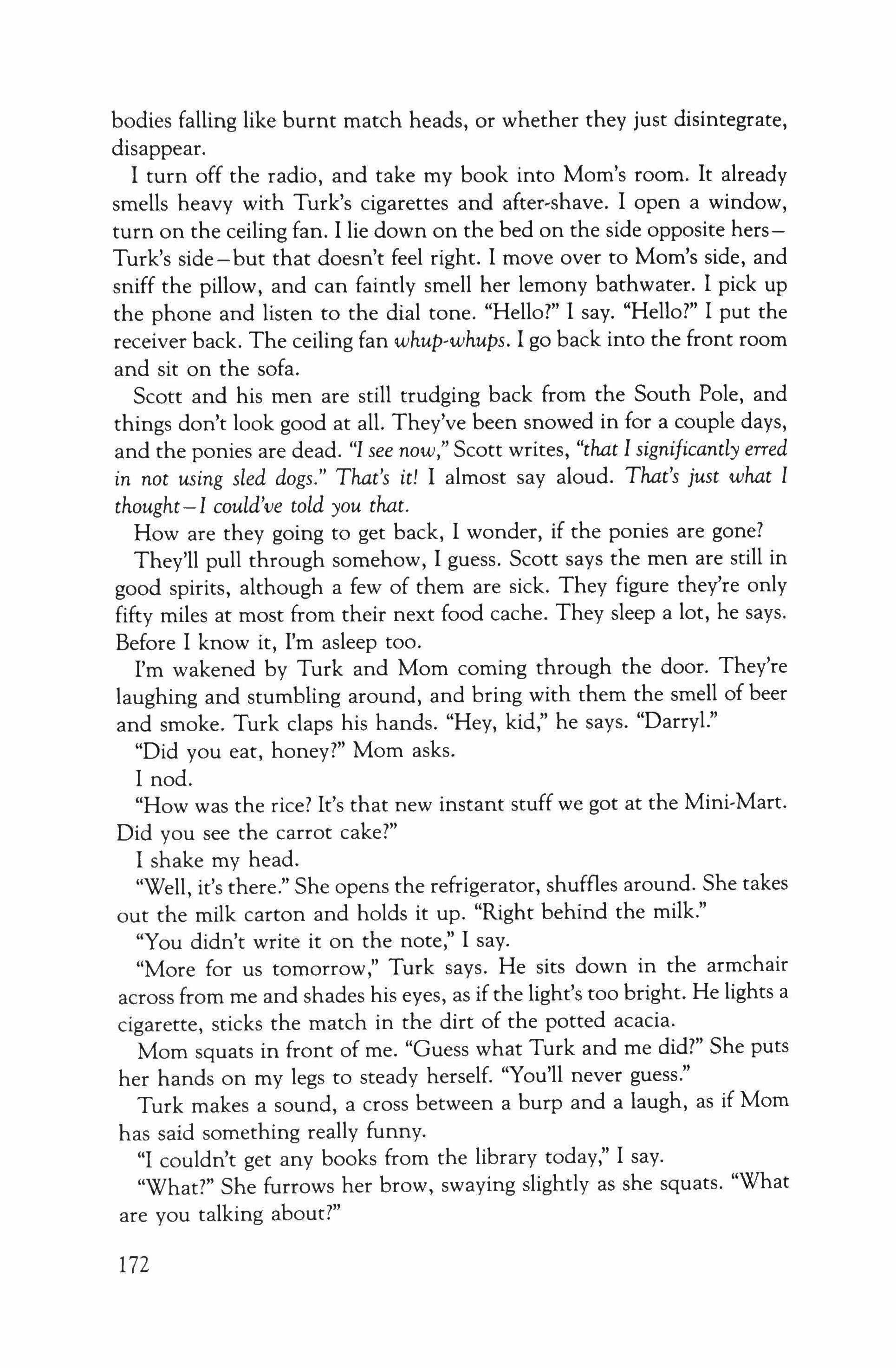
bodies falling like burnt match heads, or whether they just disintegrate, disappear.
I turn off the radio, and take my book into Mom's room. It already smells heavy with Turk's cigarettes and after-shave. I open a window, turn on the ceiling fan. I lie down on the bed on the side opposite hersTurk's side-but that doesn't feel right. I move over to Mom's side, and sniff the pillow, and can faintly smell her lemony bathwater. I pick up the phone and listen to the dial tone. "Hello?" I say. "Hello?" I put the receiver back. The ceiling fan whup-whups. I go back into the front room and sit on the sofa.
Scott and his men are still trudging back from the South Pole, and things don't look good at all. They've been snowed in for a couple days, and the ponies are dead. "I see now," Scott writes, "that I significantly erred in not using sled dogs." That's it! I almost say aloud. That's just what I thought - I could've told you that.
How are they going to get back, I wonder, if the ponies are gone?
They'll pull through somehow, I guess. Scott says the men are still in good spirits, although a few of them are sick. They figure they're only fifty miles at most from their next food cache. They sleep a lot, he says. Before I know it, I'm asleep too.
I'm wakened by Turk and Mom coming through the door. They're laughing and stumbling around, and bring with them the smell of beer and smoke. Turk claps his hands. "Hey, kid," he says. "Darryl."
"Did you eat, honey?" Mom asks.
I nod.
"How was the rice? It's that new instant stuff we got at the Mini-Mart. Did you see the carrot cake?"
I shake my head.
"Well, it's there." She opens the refrigerator, shuffles around. She takes out the milk carton and holds it up. "Right behind the milk."
"You didn't write it on the note," I say.
"More for us tomorrow ," Turk says. He sits down in the armchair across from me and shades his eyes, as ifthe light's too bright. He lights a cigarette, sticks the match in the dirt of the potted acacia.
Mom squats in front of me. "Guess what Turk and me did?" She puts her hands on my legs to steady herself. "You'll never guess."
Turk makes a sound, a cross between a burp and a laugh, as if Mom has said something really funny.
"I couldn't get any books from the library today," I say.
"What?" She furrows her brow, swaying slightly as she squats. "What are you talking about?"
172

"They wouldn't let me check out any books. They said you didn't pay the fine for that book you kept out."
"What book? What the hell are you talking about, Darryl?"
"The one you were using for a doorstop."
She laughs sharply. "That book? I never even finished that book, god, dammit! How can they charge me for it?"
"It don't work that way, Rosalie," Turk says.
"Besides, I did return it."
"It was ten months overdue, Mom."
"Those bastards!" She stands up. "I'm gonna go down and stick that book up their ass!"
"You'll have to check it out again to do that, sugarbun." Turk is chuckling hard. He winks at me.
"Not letting a little boy read! All because of some goddam, ten-cent fine."
"It was twenty dollars," I say.
Turk whistles.
"I don't care if it was a hundred dollars! They got no right to not let a kid of mine have his books. I'm gonna go right down there tomorrow and tell them that."
"Tomorrow's Sunday," I say. "The library's closed."
"I'm a citizen!" Mom cries. "I've been seven years in this goddam town." Her lower lip is quivering.
"Easy, sugarbun," Turk says soothingly. "Don't get weepy on us now."
She reaches down and puts her palm over my forehead, as if checking for a fever. "I didn't have to come to this town," she says.
"Rosalie, why don't you show Darryl what we did tonight?" Turk suggests.
"What?" She blinks.
"What we did, sugarbun."
"Oh!" Mom takes her hand from my forehead. "We got tattoos!" she announces. "Show him your tattoo, Turk, honey."
"I'm not gonna show him my goddam tattoo," he snorts.
"Don't be such a hard-ass," Mom says, pouting.
"Show him yours then."
She kneels in front of me again and grins slyly. She pulls down a strap of her tank top, and for a moment I think she's going to take it off. She turns slightly, to show me the back of her shoulder.
And there's the tattoo, right by her shoulder blade. It's a small rose, petals everywhere, with a ribbon around it, like it was a gift, and on the ribbon it says "TURK." The tattoo looks inflamed and raw, and the skin
173
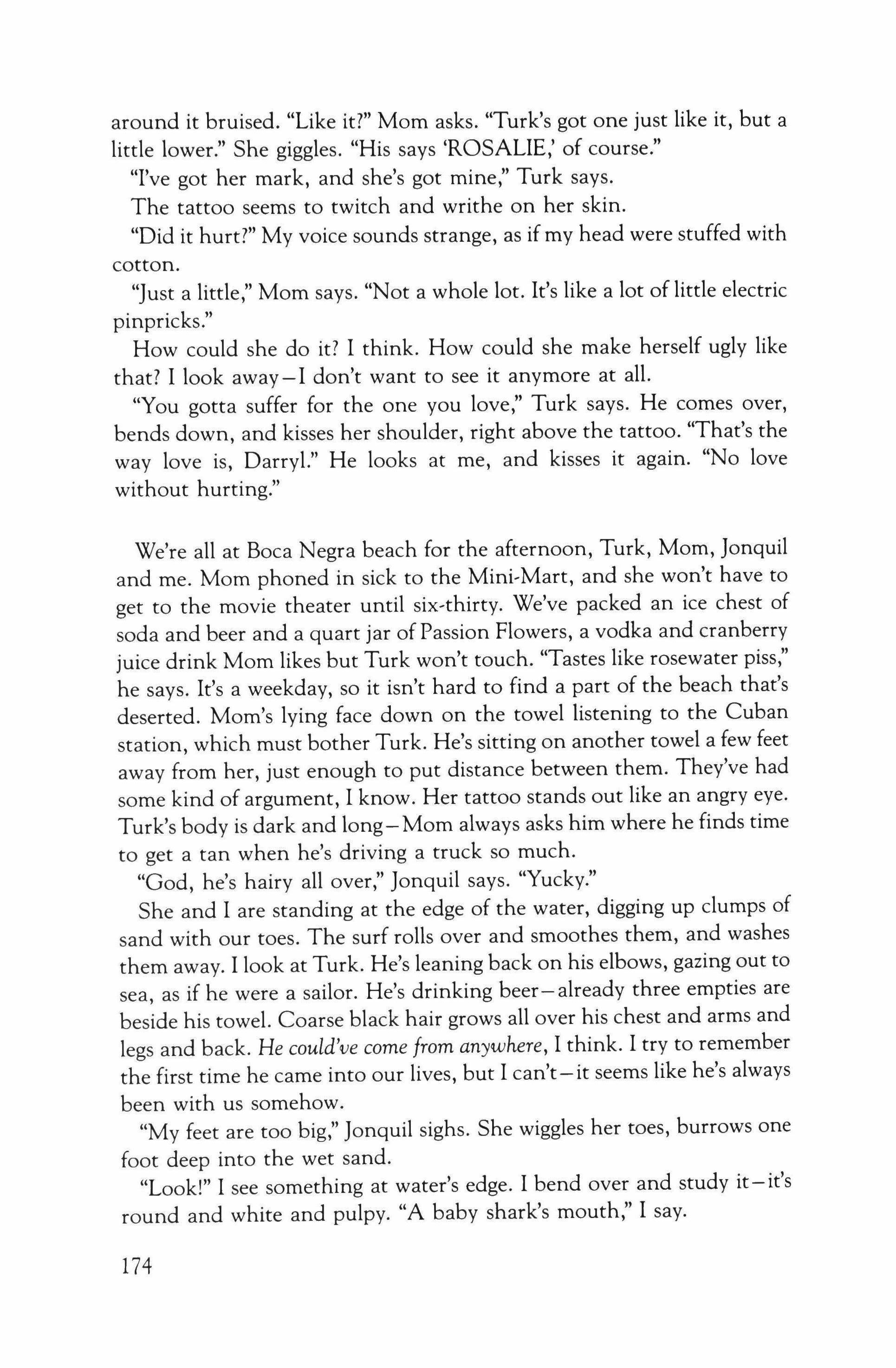
around it bruised. "Like it?" Mom asks. "Turk's got one just like it, but a little lower." She giggles. "His says 'ROSALIE,' of course."
"I've got her mark, and she's got mine," Turk says.
The tattoo seems to twitch and writhe on her skin.
"Did it hurt?" My voice sounds strange, as if my head were stuffed with cotton.
"Just a little," Mom says. "Not a whole lot. It's like a lot of little electric pinpricks."
How could she do it? 1 think. How could she make herself ugly like that? 1 look away-I don't want to see it anymore at all.
"You gotta suffer for the one you love," Turk says. He comes over, bends down, and kisses her shoulder, right above the tattoo. "That's the way love is, Darrvl." He looks at me, and kisses it again. "No love without hurting."
We're all at Boca Negra beach for the afternoon, Turk, Mom, Jonquil and me. Mom phoned in sick to the Mini-Mart, and she won't have to get to the movie theater until six-thirty. We've packed an ice chest of soda and beer and a quart jar of Passion Flowers, a vodka and cranberry juice drink Mom likes but Turk won't touch. "Tastes like rosewater piss," he says. It's a weekday, so it isn't hard to find a part of the beach that's deserted. Mom's lying face down on the towel listening to the Cuban station, which must bother Turk. He's sitting on another towel a few feet away from her, just enough to put distance between them. They've had some kind of argument, 1 know. Her tattoo stands out like an angry eye. Turk's body is dark and long-Mom always asks him where he finds time to get a tan when he's driving a truck so much.
"God, he's hairy all over," Jonquil says. "Yucky."
She and 1 are standing at the edge of the water, digging up clumps of sand with our toes. The surf rolls over and smoothes them, and washes them away. 1 look at Turk. He's leaning back on his elbows, gazing out to sea, as if he were a sailor. He's drinking beer-already three empties are beside his towel. Coarse black hair grows all over his chest and arms and legs and back. He could've come from anywhere, 1 think. I try to remember the first time he came into our lives, but I can't-it seems like he's always been with us somehow.
"My feet are too big," Jonquil sighs. She wiggles her toes, burrows one foot deep into the wet sand.
"Look!" 1 see something at water's edge. I bend over and study it-it's round and white and pulpy. "A baby shark's mouth," I say.
174
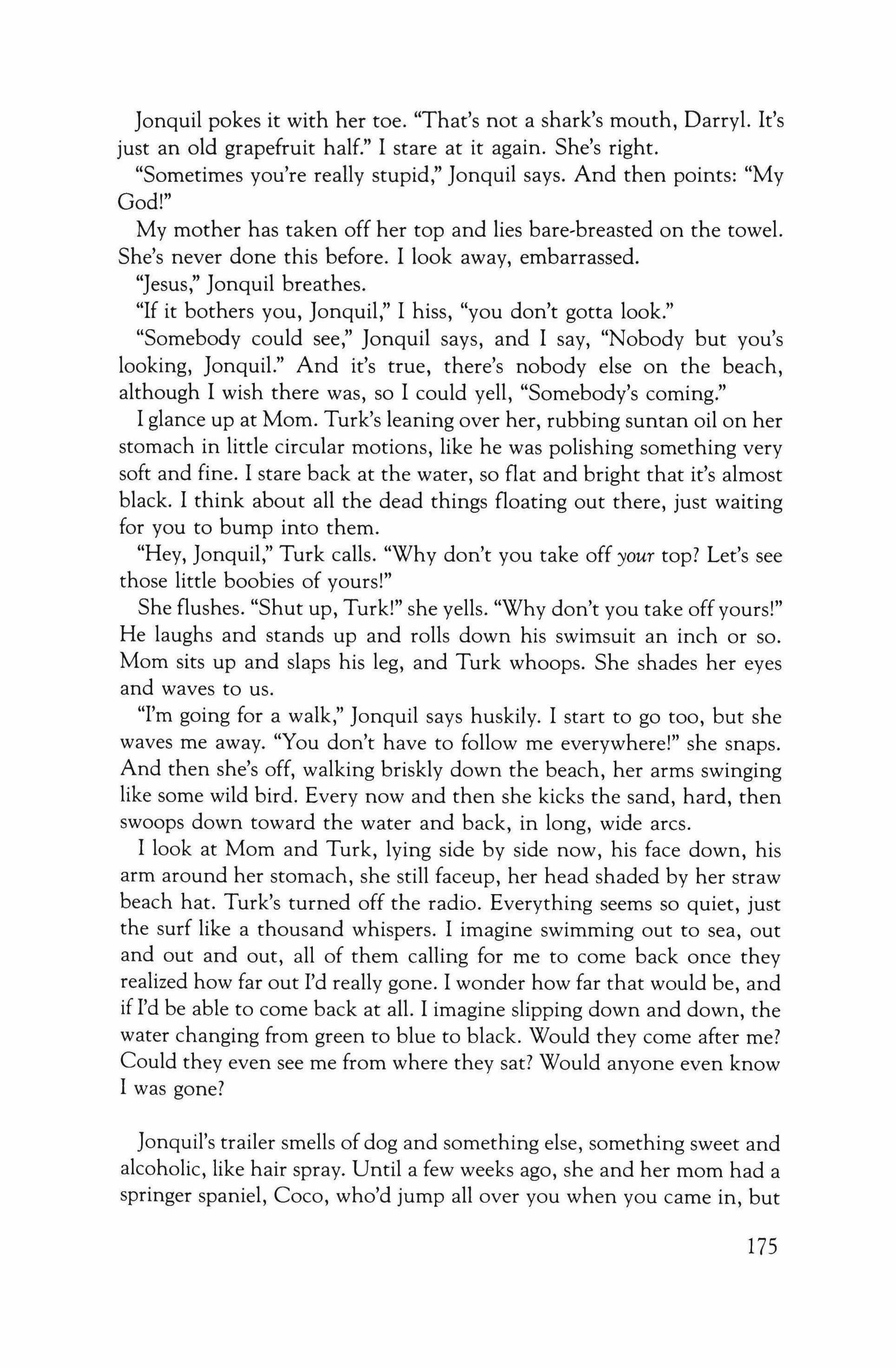
Jonquil pokes it with her toe. "That's not a shark's mouth, Darryl. It's just an old grapefruit half." I stare at it again. She's right.
"Sometimes you're really stupid," Jonquil says. And then points: "My God!"
My mother has taken off her top and lies bare-breasted on the towel. She's never done this before. I look away, embarrassed.
"Jesus:' Jonquil breathes.
"If it bothers you, Jonquil," I hiss, "you don't gotta look."
"Somebody could see," Jonquil says, and I say, "Nobody but you's looking, Jonquil." And it's true, there's nobody else on the beach, although I wish there was, so I could yell, "Somebody's coming."
I glance up at Mom. Turk's leaning over her, rubbing suntan oil on her stomach in little circular motions, like he was polishing something very soft and fine. I stare back at the water, so flat and bright that it's almost black. I think about all the dead things floating out there, just waiting for you to bump into them.
"Hey, Jonquil," Turk calls. "Why don't you take off your top? Let's see those little boobies of yours!"
She flushes. "Shut up, Turk!" she yells. "Why don't you take off yours!" He laughs and stands up and rolls down his swimsuit an inch or so.
Mom sits up and slaps his leg, and Turk whoops. She shades her eyes and waves to us.
"I'm going for a walk," Jonquil says huskily. I start to go too, but she waves me away. "You don't have to follow me everywhere!" she snaps. And then she's off, walking briskly down the beach, her arms swinging like some wild bird. Every now and then she kicks the sand, hard, then swoops down toward the water and back, in long, wide arcs.
I look at Mom and Turk, lying side by side now, his face down, his arm around her stomach, she still faceup, her head shaded by her straw beach hat. Turk's turned off the radio. Everything seems so quiet, just the surf like a thousand whispers. I imagine swimming out to sea, out and out and out, all of them calling for me to come back once they realized how far out I'd really gone. I wonder how far that would be, and ifl'd be able to come back at all. I imagine slipping down and down, the water changing from green to blue to black. Would they come after me? Could they even see me from where they sat? Would anyone even know I was gone?
Jonquil's trailer smells of dog and something else, something sweet and alcoholic, like hair spray. Until a few weeks ago, she and her mom had a springer spaniel, Coco, who'd jump all over you when you came in, but
175
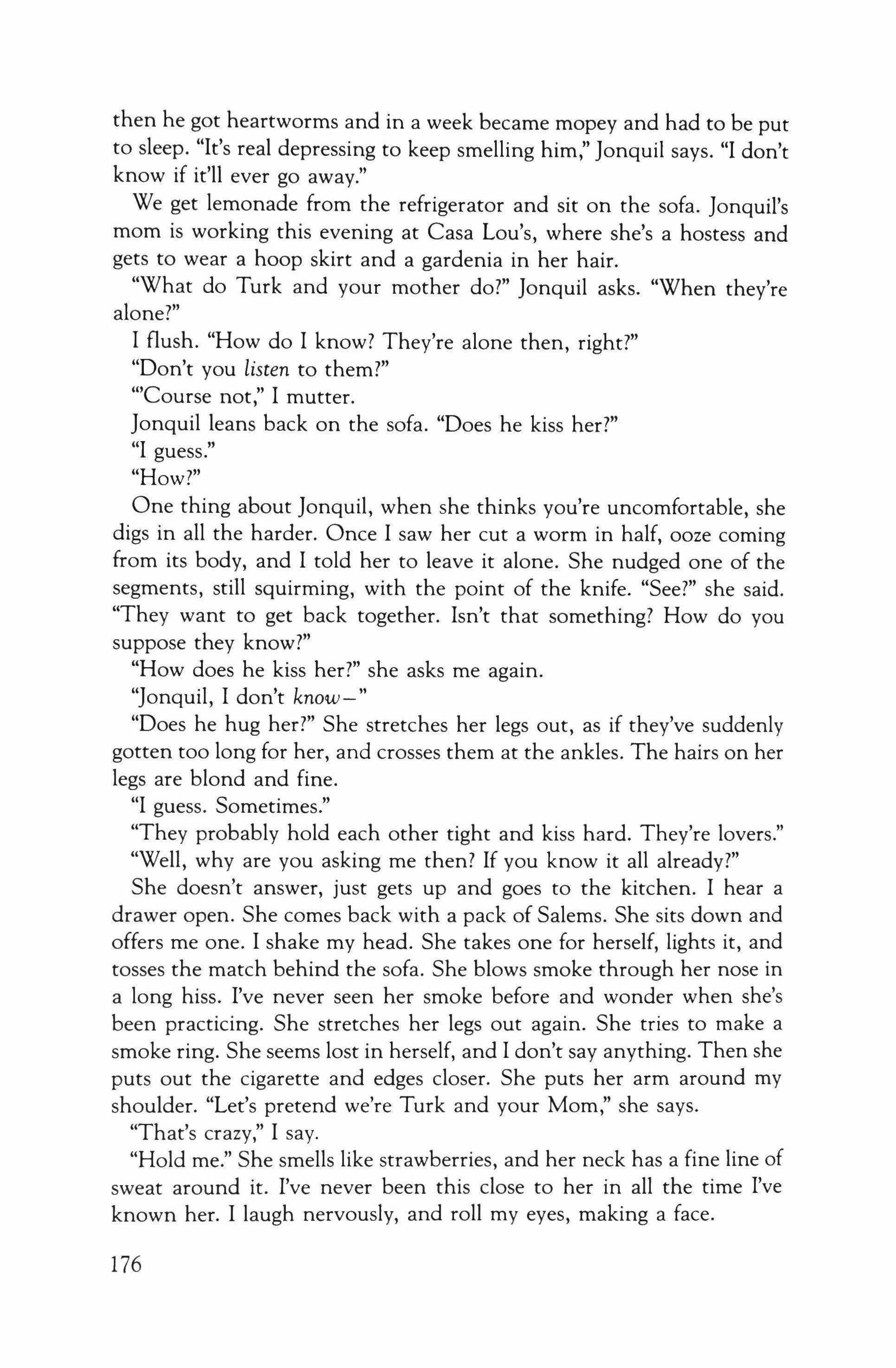
then he got heartworms and in a week became mopey and had to be put to sleep. "It's real depressing to keep smelling him," Jonquil says. "I don't know if it'll ever go away."
We get lemonade from the refrigerator and sit on the sofa. Jonquil's mom is working this evening at Casa Lou's, where she's a hostess and gets to wear a hoop skirt and a gardenia in her hair.
"What do Turk and your mother do?" Jonquil asks. "When they're alone?"
I flush. "How do I know? They're alone then, right?"
"Don't you listen to them?"
"'Course not," I mutter.
Jonquil leans back on the sofa. "Does he kiss her?"
"I guess."
"How?"
One thing about Jonquil, when she thinks you're uncomfortable, she digs in all the harder. Once I saw her cut a worm in half, ooze coming from its body, and I told her to leave it alone. She nudged one of the segments, still squirming, with the point of the knife. "See?" she said. "They want to get back together. Isn't that something? How do you suppose they know?"
"How does he kiss her?" she asks me again.
"Jonquil, I don't know-"
"Does he hug her?" She stretches her legs out, as if they've suddenly gotten too long for her, and crosses them at the ankles. The hairs on her legs are blond and fine.
"I guess. Sometimes."
"They probably hold each other tight and kiss hard. They're lovers."
"Well, why are you asking me then? If you know it all already?"
She doesn't answer, just gets up and goes to the kitchen. I hear a drawer open. She comes back with a pack of Salems. She sits down and offers me one. I shake my head. She takes one for herself, lights it, and tosses the match behind the sofa. She blows smoke through her nose in a long hiss. I've never seen her smoke before and wonder when she's been practicing. She stretches her legs out again. She tries to make a smoke ring. She seems lost in herself, and I don't say anything. Then she puts out the cigarette and edges closer. She puts her arm around my shoulder. "Let's pretend we're Turk and your Mom," she says.
"That's crazy," I say.
"Hold me." She smells like strawberries, and her neck has a fine line of sweat around it. I've never been this close to her in all the time I've known her. I laugh nervously, and roll my eyes, making a face.
176
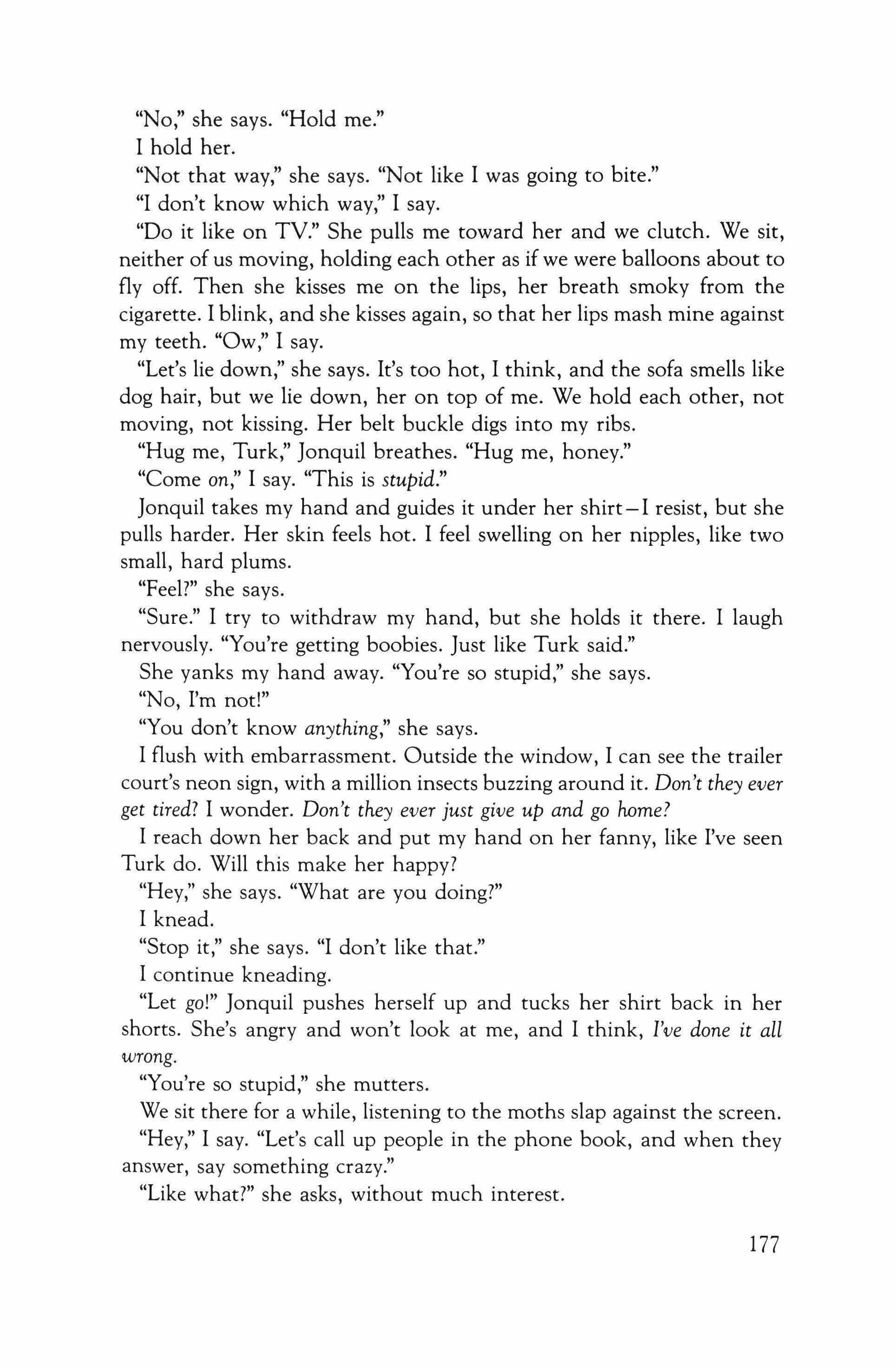
"No," she says. "Hold me."
I hold her.
"Not that way," she says. "Not like I was going to bite."
"I don't know which way," I say.
"Do it like on TV." She pulls me toward her and we clutch. We sit, neither of us moving, holding each other as if we were balloons about to fly off. Then she kisses me on the lips, her breath smoky from the cigarette. I blink, and she kisses again, so that her lips mash mine against my teeth. "Ow:' I say.
"Let's lie down," she says. It's too hot, I think, and the sofa smells like dog hair, but we lie down, her on top of me. We hold each other, not moving, not kissing. Her belt buckle digs into my ribs.
"Hug me, Turk," Jonquil breathes. "Hug me, honey."
"Come on," I say. "This is stupid."
Jonquil takes my hand and guides it under her shirt-I resist, but she pulls harder. Her skin feels hot. I feel swelling on her nipples, like two small, hard plums.
"Feel?" she says.
"Sure." I try to withdraw my hand, but she holds it there. I laugh nervously. "You're getting boobies. Just like Turk said."
She yanks my hand away. "You're so stupid," she says.
"No, I'm not!"
"You don't know anything," she says.
I flush with embarrassment. Outside the window, I can see the trailer court's neon sign, with a million insects buzzing around it. Don't they ever get tired? I wonder. Don't they ever just give up and go home?
I reach down her back and put my hand on her fanny, like I've seen Turk do. Will this make her happy?
"Hey," she says. "What are you doing?"
I knead.
"Stop it," she says. "I don't like that."
I continue kneading.
"Let go!" Jonquil pushes herself up and tucks her shirt back in her shorts. She's angry and won't look at me, and I think, I've done it all wrong.
"You're so stupid," she mutters.
We sit there for a while, listening to the moths slap against the screen.
"Hey," I say. "Let's call up people in the phone book, and when they answer, say something crazy."
"Like what?" she asks, without much interest.
177

"We can ask them if John's there, and when they say 'No,' we'll say, 'Well, where do you go to the bathroom then?' And hang up."
She stares at me. "That's funny?"
"Sure," I say.
"Just hang up?"
"Yeah."
"What's the point," she asks, "if you never get to hear what they say?"
"What're you looking at?" Turk asks Mom. "You're a million miles away." They seem tense around each other again-another argument, I know. We've stopped in a bar on the way to Shakey's for dinner-Mom even asked if I'd like to bring Jonquil along too. "A double date," she said. Turk didn't look too happy about it, but said nothing. Now he and Mom are drinking vodka tonics, Jonquil and me, Cokes. Turk keeps looking around the bar, as if any minute one of the people there might turn into somebody he knows.
"I was just looking at that sign behind the bar," Mom says. Turk squints, and Jonquil and I turn around in the booth and look too. She's pointing to one of those beer signs that make it look like snow's falling or clouds are moving or water's running in a brook. This one shows snow falling in the woods. Two deer are standing over a little rise, looking down on a log cabin, where smoke-it looks like it's moving too-comes out of a chimney.
"Real interesting," Turk says.
"I used to go ice skating in woods like that when I was a little girl," Mom says. "In Pennsylvania. The winters were just like that."
"Where was that?" Jonquil asks.
"In Pennsylvania, Jonquil. I just told you."
"No, I mean-where'd you go skating?"
Turk lights a cigarette.
"Mostly at an old beaver pond," Mom says. "You had to walk through the woods to get there." She smiles. "Oh, it was so much fun! Lord."
"How about that," Turk says.
"That was in Pennsylvania, honey," she says to me. "They had those things there."
"What things?" Jonquil asks.
Mom stares at her. "lee, Jonquil. Snow. Don't you get it?" She looks at me. "Do you remember any of this, honey?"
"How the hell can he remember when you were a little girl?" Turk asks.
"I don't mean that," Mom says. "I mean Pennsylvania. Darryl lived up
178
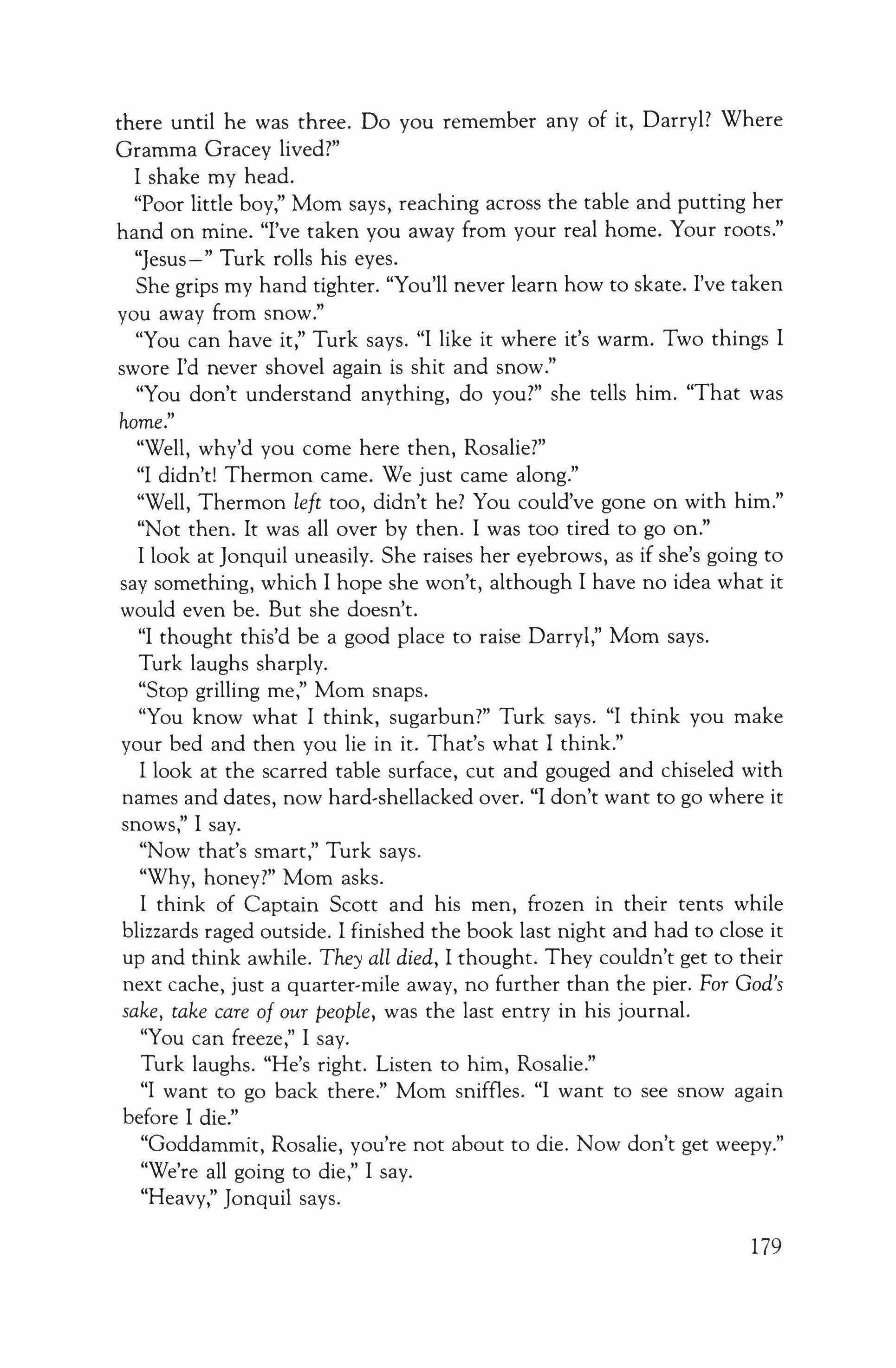
there until he was three. Do you remember any of it, Darryl? Where Gramma Gracey lived?"
I shake my head.
"Poor little boy," Mom says, reaching across the table and putting her hand on mine. "I've taken you away from your real home. Your roots."
"Jesus-" Turk rolls his eyes.
She grips my hand tighter. "You'll never learn how to skate. I've taken you away from snow."
"You can have it," Turk says. "I like it where it's warm. Two things I swore I'd never shovel again is shit and snow."
"You don't understand anything, do you?" she tells him. "That was home."
"Well, why'd you come here then, Rosalie?"
"I didn't! Thermon came. We just came along."
"Well, Thermon left too, didn't he? You could've gone on with him."
"Not then. It was all over by then. I was too tired to go on."
I look at Jonquil uneasily. She raises her eyebrows, as if she's going to say something, which I hope she won't, although I have no idea what it would even be. But she doesn't.
"I thought this'd be a good place to raise Darryl," Mom says.
Turk laughs sharply.
"Stop grilling me," Mom snaps.
"You know what I think, sugarbun?" Turk says. "I think you make your bed and then you lie in it. That's what I think."
I look at the scarred table surface, cut and gouged and chiseled with names and dates, now hard-shellacked over. "I don't want to go where it snows," I say.
"Now that's smart," Turk says.
"Why, honey?" Mom asks.
I think of Captain Scott and his men, frozen in their tents while blizzards raged outside. I finished the book last night and had to close it up and think awhile. They all died, I thought. They couldn't get to their next cache, just a quarter-mile away, no further than the pier. For God's sake, take care of our people, was the last entry in his journal.
"You can freeze," I say.
Turk laughs. "He's right. Listen to him, Rosalie."
"I want to go back there." Mom sniffles. "I want to see snow again before I die."
"Goddammit, Rosalie, you're not about to die. Now don't get weepy."
"We're all going to die," I say.
"H "J '1 eavy, onqui says.
179
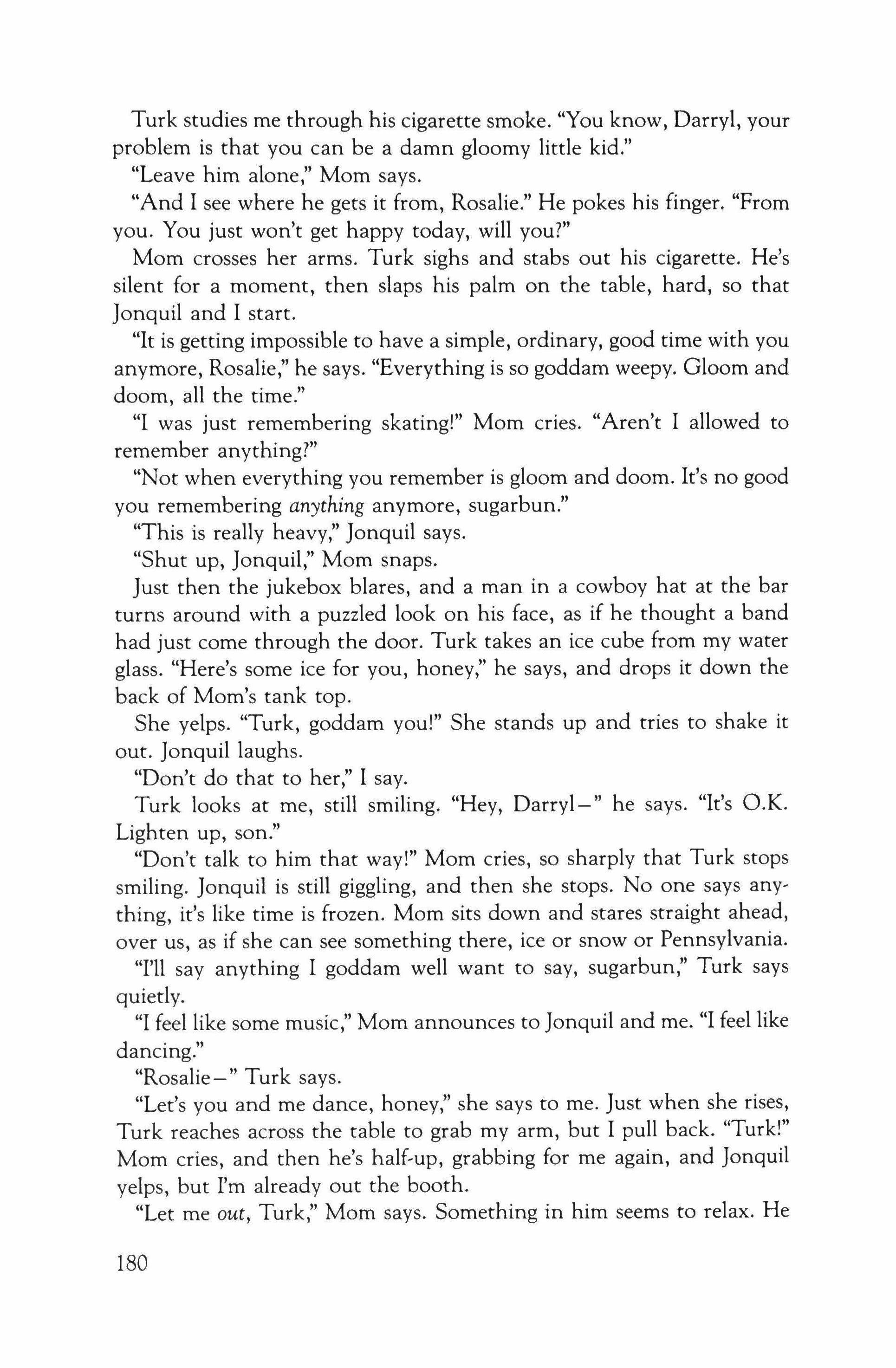
Turk studies me through his cigarette smoke. "You know, Darryl, your problem is that you can be a damn gloomy little kid."
"Leave him alone," Mom says.
"And I see where he gets it from, Rosalie." He pokes his finger. "From you. You just won't get happy today, will you?"
Mom crosses her arms. Turk sighs and stabs out his cigarette. He's silent for a moment, then slaps his palm on the table, hard, so that Jonquil and I start.
"It is getting impossible to have a simple, ordinary, good time with you anymore, Rosalie," he says. "Everything is so goddam weepy. Gloom and doom, all the time."
"I was just remembering skating!" Mom cries. "Aren't I allowed to remember anything?"
"Not when everything you remember is gloom and doom. It's no good you remembering anything anymore, sugarbun."
"This is really heavy," Jonquil says.
"Shut up, Jonquil," Mom snaps.
Just then the jukebox blares, and a man in a cowboy hat at the bar turns around with a puzzled look on his face, as if he thought a band had just come through the door. Turk takes an ice cube from my water glass. "Here's some ice for you, honey," he says, and drops it down the back of Mom's tank top.
She yelps. "Turk, goddam you!" She stands up and tries to shake it out. Jonquil laughs.
"Don't do that to her," I say.
Turk looks at me, still smiling. "Hey, Darryl-" he says. "It's O.K. Lighten up, son."
"Don't talk to him that way!" Mom cries, so sharply that Turk stops smiling. Jonquil is still giggling, and then she stops. No one says anything, it's like time is frozen. Mom sits down and stares straight ahead, over us, as if she can see something there, ice or snow or Pennsylvania.
"I'll say anything I goddam well want to say, sugarbun," Turk says quietly.
"I feel like some music," Mom announces to Jonquil and me. "I feel like dancing."
"Rosalie-" Turk says.
"Let's you and me dance, honey," she says to me. Just when she rises, Turk reaches across the table to grab my arm, but I pull back. "Turk!" Mom cries, and then he's half-up, grabbing for me again, and Jonquil yelps, but I'm already out the booth.
"Let me out, Turk," Mom says. Something in him seems to relax. He
180
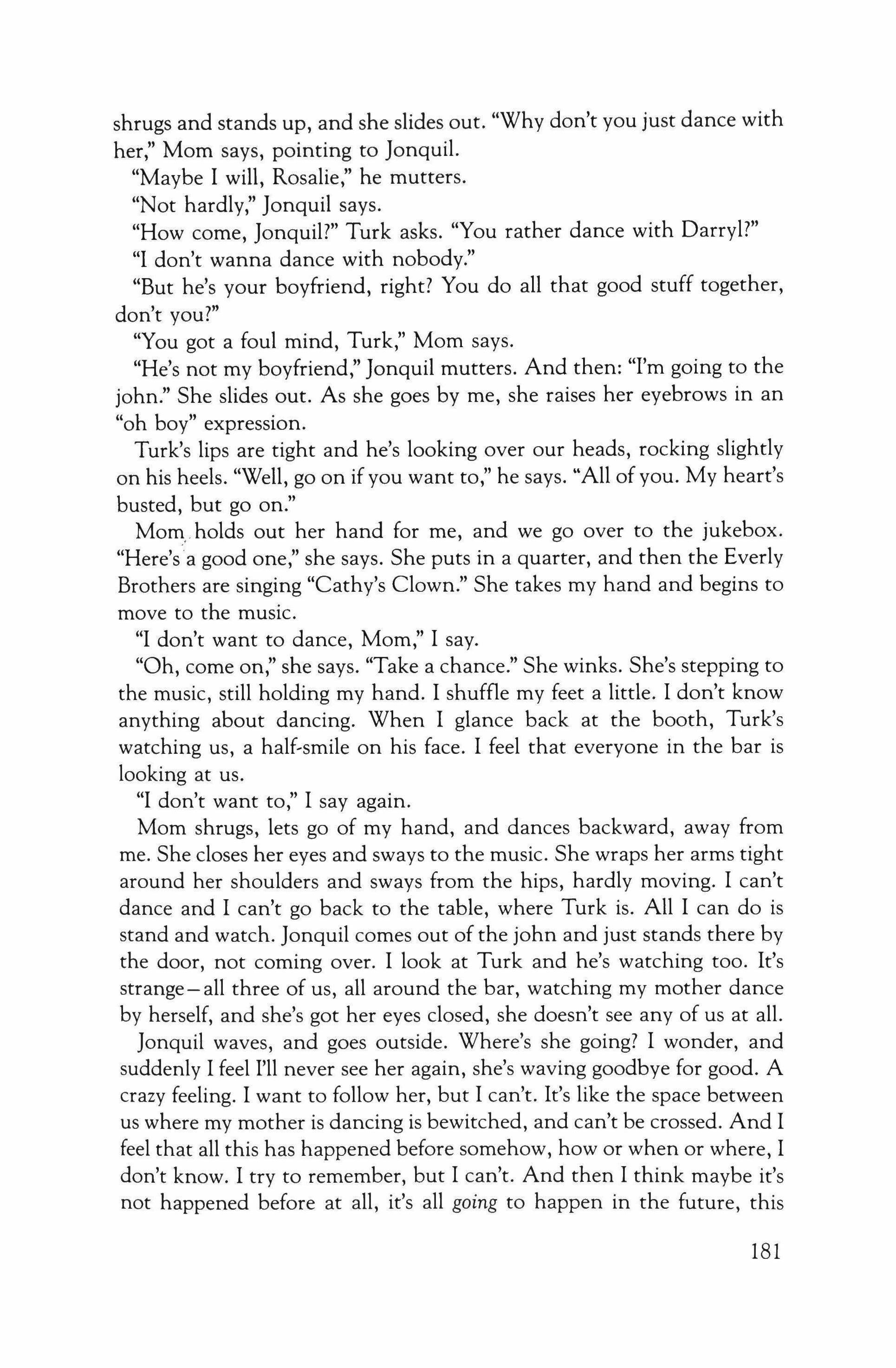
shrugs and stands up, and she slides out. "Why don't you just dance with her," Mom says, pointing to Jonquil.
"Maybe I will, Rosalie," he mutters.
"Not hardly," Jonquil says.
"How come, Jonquil?" Turk asks. "You rather dance with Darryl?"
"I don't wanna dance with nobody."
"But he's your boyfriend, right? You do all that good stuff together, don't you?"
"You got a foul mind, Turk," Mom says.
"He's not my boyfriend," Jonquil mutters. And then: "I'm going to the john." She slides out. As she goes by me, she raises her eyebrows in an "oh boy" expression.
Turk's lips are tight and he's looking over our heads, rocking slightly on his heels. "Well, go on if you want to," he says. "All of you. My heart's busted, but go on."
Mom, holds out her hand for me, and we go over to the jukebox. "Here's a good one," she says. She puts in a quarter, and then the Everly Brothers are singing "Cathy's Clown." She takes my hand and begins to move to the music.
"I don't want to dance, Mom," I say.
"Oh, come on," she says. "Take a chance." She winks. She's stepping to the music, still holding my hand. I shuffle my feet a little. I don't know anything about dancing. When I glance back at the booth, Turk's watching us, a half-smile on his face. I feel that everyone in the bar is looking at us.
"I don't want to," I say again.
Mom shrugs, lets go of my hand, and dances backward, away from me. She closes her eyes and sways to the music. She wraps her arms tight around her shoulders and sways from the hips, hardly moving. I can't dance and I can't go back to the table, where Turk is. All I can do is stand and watch. Jonquil comes out of the john and just stands there by the door, not coming over. I look at Turk and he's watching too. It's strange-all three of us, all around the bar, watching my mother dance by herself, and she's got her eyes closed, she doesn't see any of us at all.
Jonquil waves, and goes outside. Where's she going? I wonder, and suddenly I feel I'll never see her again, she's waving goodbye for good. A crazy feeling. I want to follow her, but I can't. It's like the space between us where my mother is dancing is bewitched, and can't be crossed. And I feel that all this has happened before somehow, how or when or where, I don't know. I try to remember, but I can't. And then I think maybe it's not happened before at all, it's all going to happen in the future, this
181
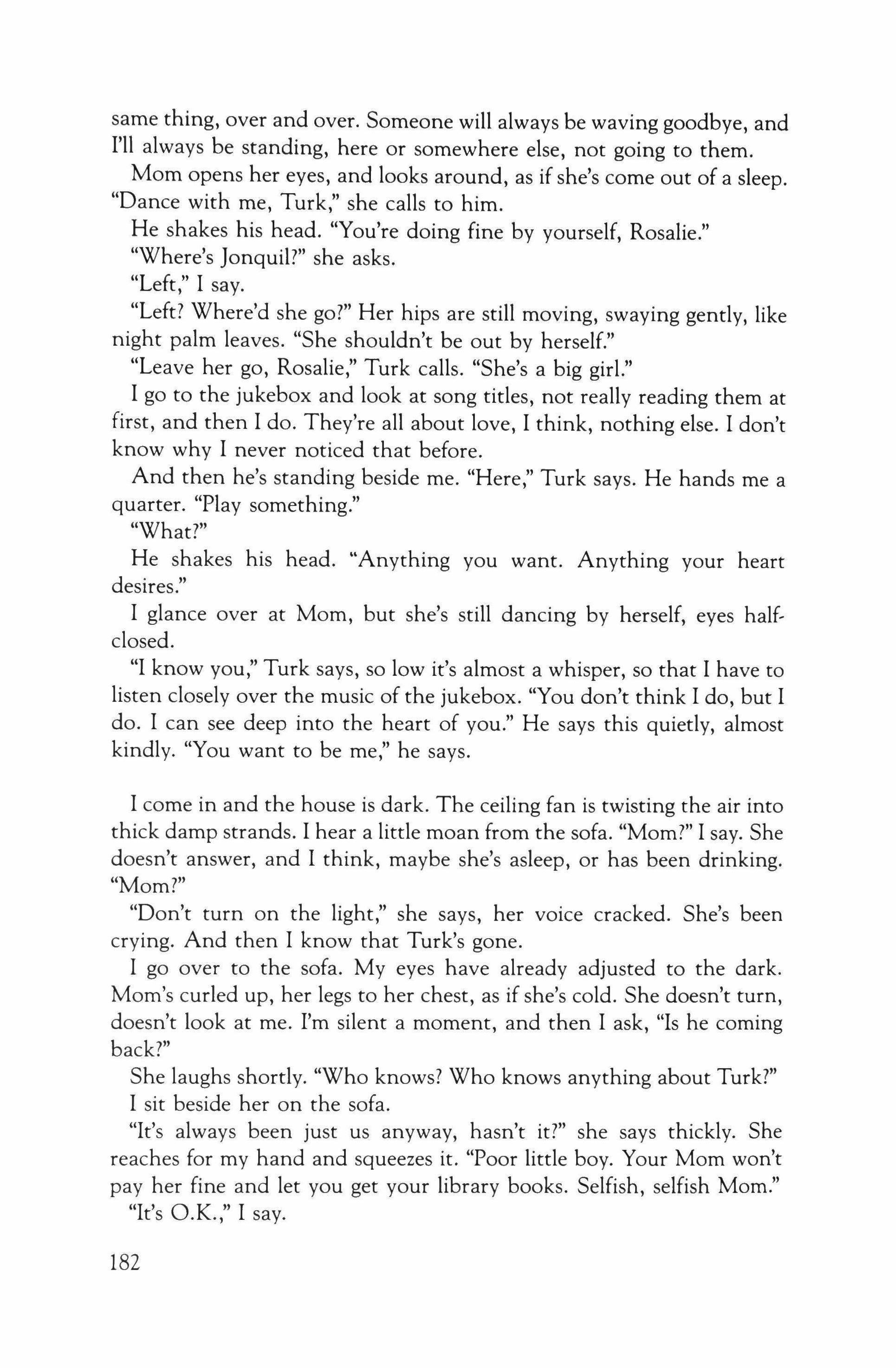
same thing, over and over. Someone will always be waving goodbye, and I'll always be standing, here or somewhere else, not going to them.
Mom opens her eyes, and looks around, as if she's come out of a sleep. "Dance with me, Turk," she calls to him.
He shakes his head. "You're doing fine by yourself, Rosalie."
"Where's Jonquil?" she asks.
"Left," 1 say.
"Left? Where'd she go?" Her hips are still moving, swaying gently, like night palm leaves. "She shouldn't be out by herself."
"Leave her go, Rosalie," Turk calls. "She's a big girl."
1 go to the jukebox and look at song titles, not really reading them at first, and then 1 do. They're all about love, I think, nothing else. 1 don't know why 1 never noticed that before.
And then he's standing beside me. "Here," Turk says. He hands me a quarter. "Play something."
"What?"
He shakes his head. "Anything you want. Anything your heart desires."
1 glance over at Mom, but she's still dancing by herself, eyes halfclosed.
"I know you," Turk says, so low it's almost a whisper, so that 1 have to listen closely over the music of the jukebox. "You don't think 1 do, but 1 do. 1 can see deep into the heart of you." He says this quietly, almost kindly. "You want to be me," he says.
I come in and the house is dark. The ceiling fan is twisting the air into thick damp strands. 1 hear a little moan from the sofa. "Mom?" I say. She doesn't answer, and 1 think, maybe she's asleep, or has been drinking. "Mom?"
"Don't turn on the light," she says, her voice cracked. She's been crying. And then 1 know that Turk's gone.
I go over to the sofa. My eyes have already adjusted to the dark. Mom's curled up, her legs to her chest, as if she's cold. She doesn't turn, doesn't look at me. I'm silent a moment, and then 1 ask, "Is he coming back?"
She laughs shortly. "Who knows? Who knows anything about Turk?"
1 sit beside her on the sofa.
"It's always been just us anyway, hasn't it?" she says thickly. She reaches for my hand and squeezes it. "Poor little boy. Your Mom won't pay her fine and let you get your library books. Selfish, selfish Mom."
"It's O.K.," 1 say.
182
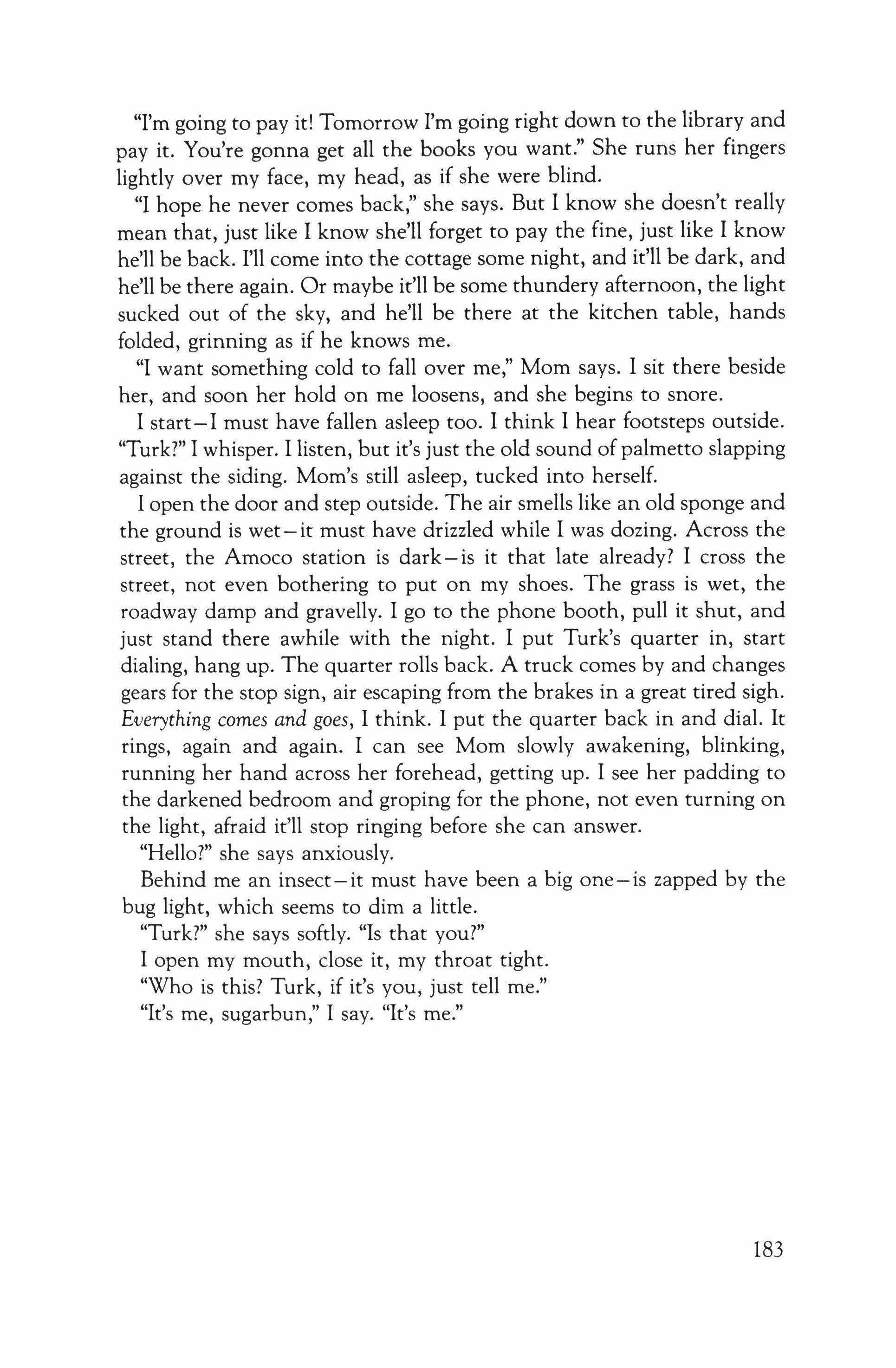
"I'm going to pay it! Tomorrow I'm going right down to the library and pay it. You're gonna get all the books you want." She runs her fingers lightly over my face, my head, as if she were blind.
"I hope he never comes back," she says. But I know she doesn't really mean that, just like I know she'll forget to pay the fine, just like I know he'll be back. I'll come into the cottage some night, and it'll be dark, and he'll be there again. Or maybe it'll be some thundery afternoon, the light sucked out of the sky, and he'll be there at the kitchen table, hands folded, grinning as if he knows me.
"I want something cold to fall over me," Mom says. I sit there beside her, and soon her hold on me loosens, and she begins to snore.
I start - I must have fallen asleep too. I think I hear footsteps outside. 'Turk?" I whisper. I listen, but it's just the old sound ofpalmetto slapping against the siding. Mom's still asleep, tucked into herself.
I open the door and step outside. The air smells like an old sponge and the ground is wet-it must have drizzled while I was dozing. Across the street, the Amoco station is dark - is it that late already? I cross the street, not even bothering to put on my shoes. The grass is wet, the roadway damp and gravelly. I go to the phone booth, pull it shut, and just stand there awhile with the night. I put Turk's quarter in, start dialing, hang up. The quarter rolls back. A truck comes by and changes gears for the stop sign, air escaping from the brakes in a great tired sigh. Everything comes and goes, I think. I put the quarter back in and dial. It rings, again and again. I can see Mom slowly awakening, blinking, running her hand across her forehead, getting up. I see her padding to the darkened bedroom and groping for the phone, not even turning on the light, afraid it'll stop ringing before she can answer.
"Hello?" she says anxiously.
Behind me an insect - it must have been a big one - is zapped by the bug light, which seems to dim a little.
"Turk?" she says softly. "Is that you?"
I open my mouth, close it, my throat tight.
"Who is this? Turk, if it's you, just tell me."
"It's me, sugarbun," I say. "It's me."
183
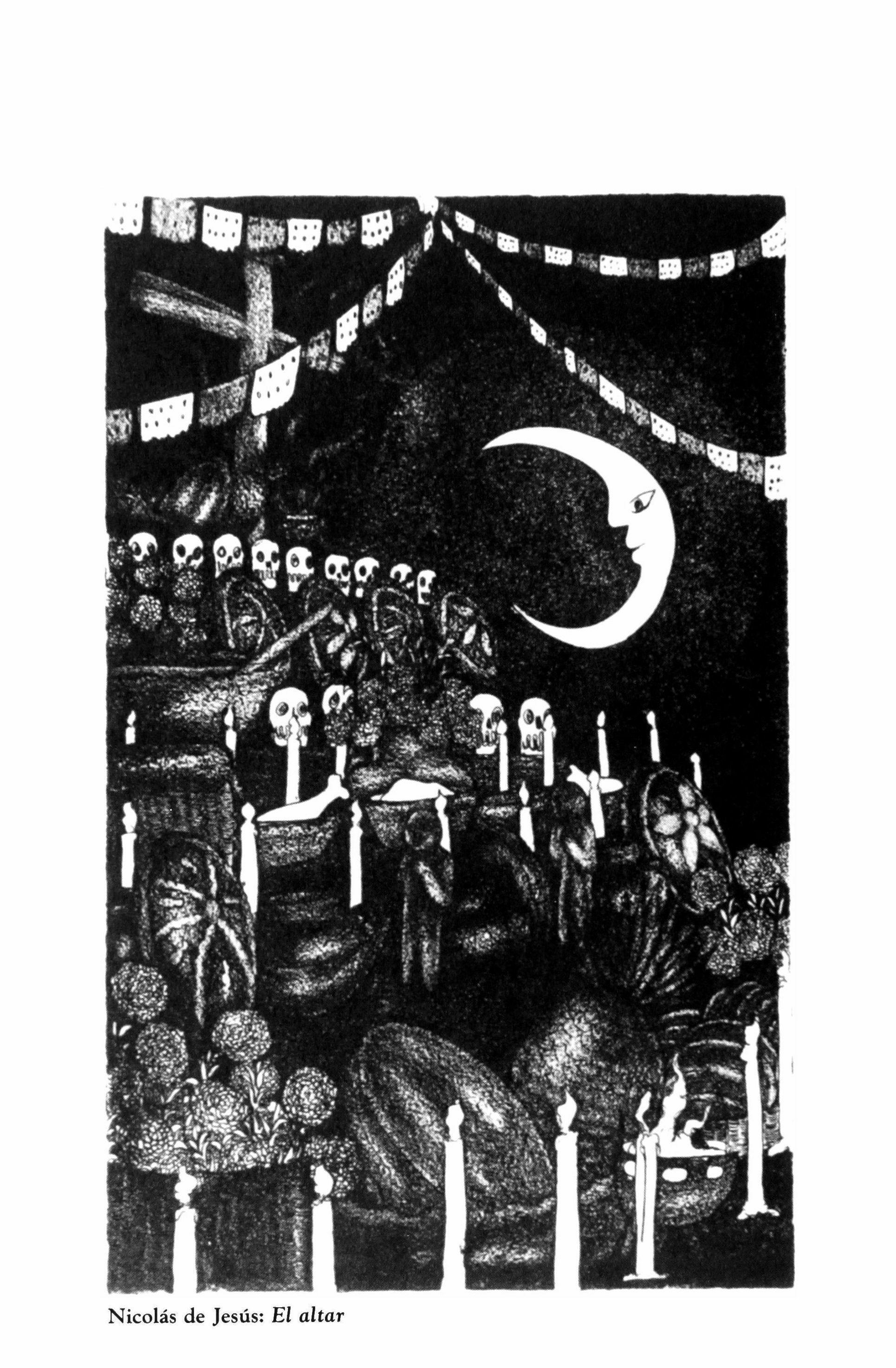 Nicolas de Jesus: El altar
Nicolas de Jesus: El altar
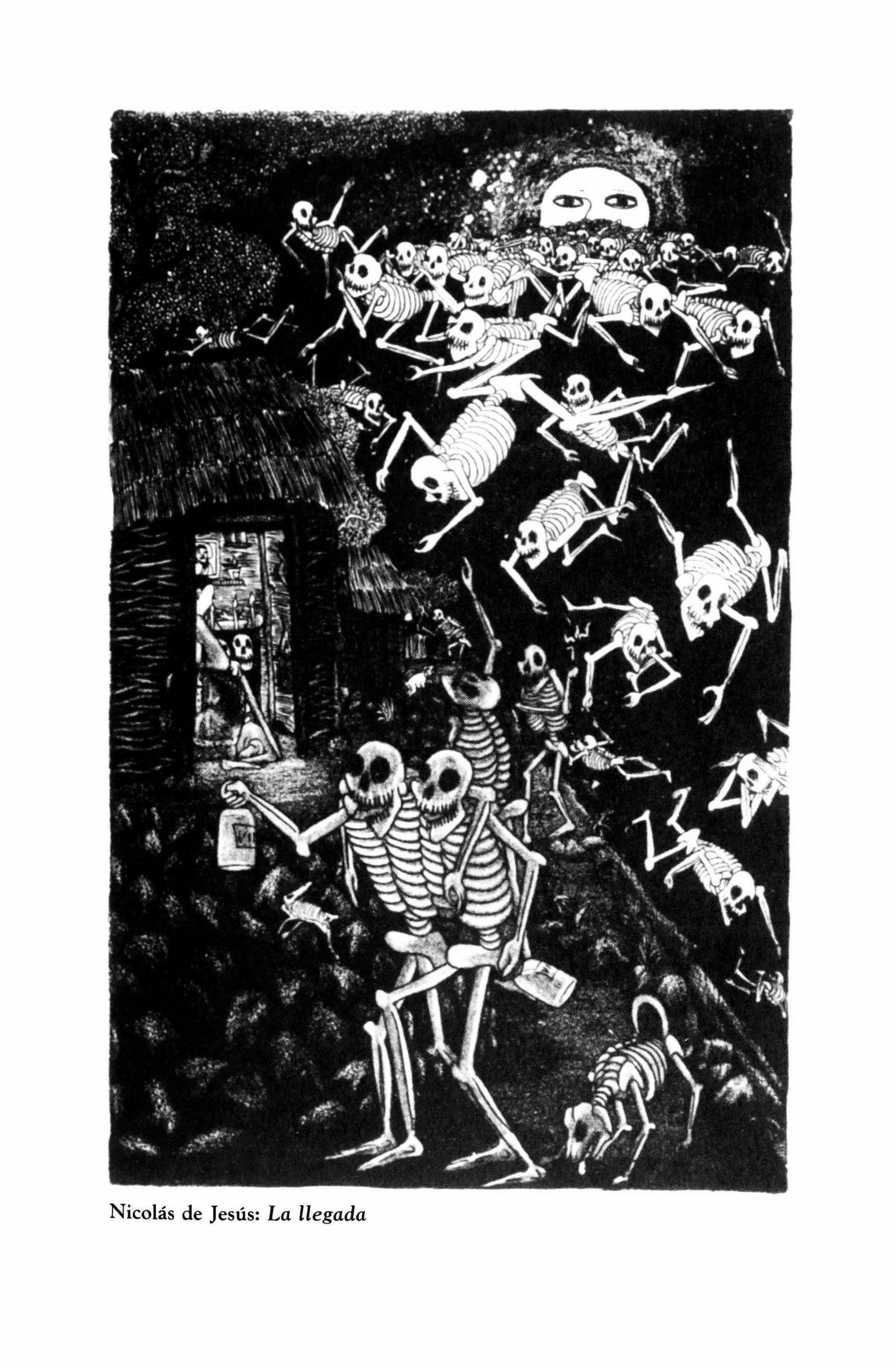 Nicolas de Jesus: La llegada
Nicolas de Jesus: La llegada
Deeds of Light
Reynolds Price
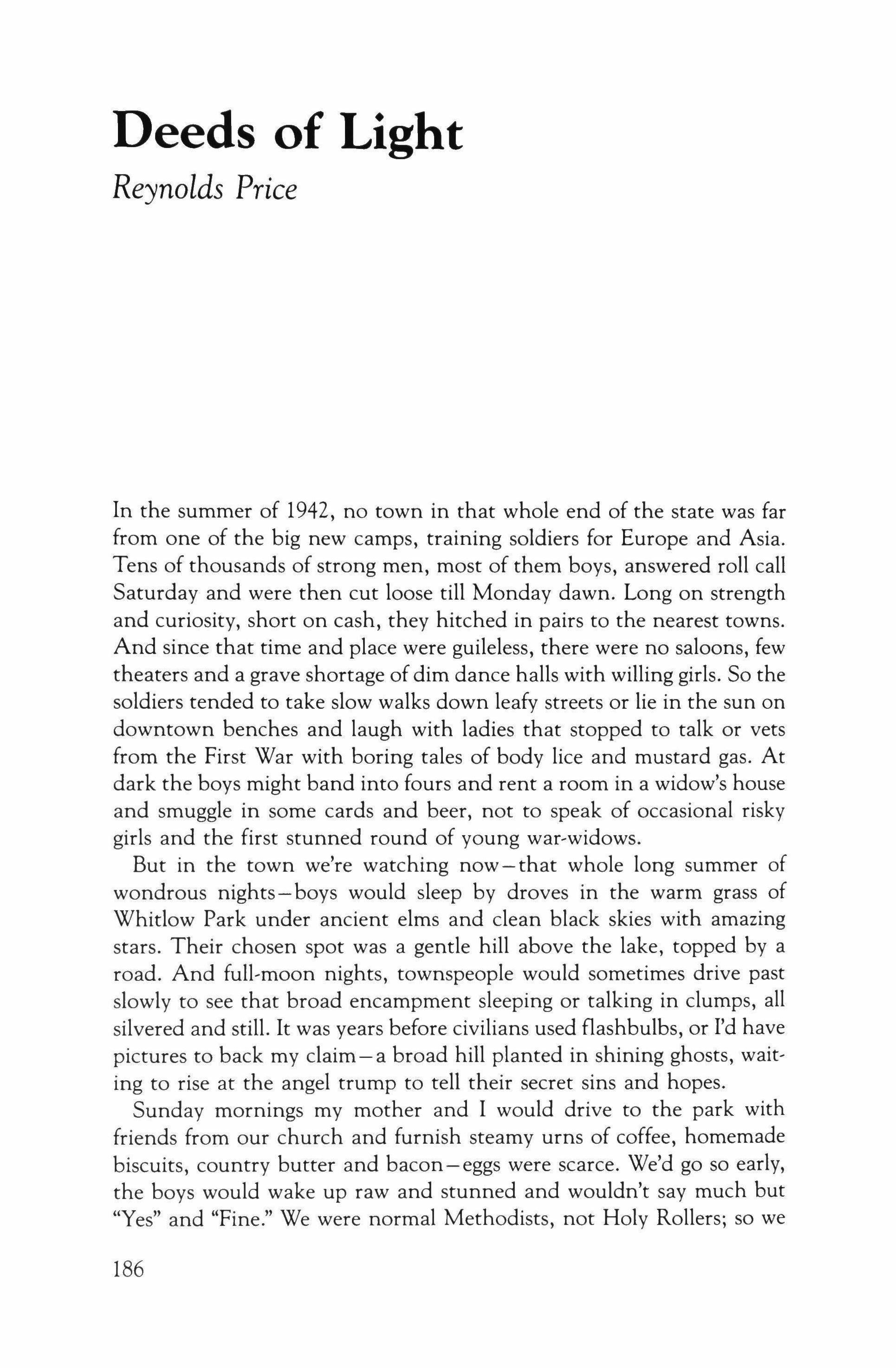
In the summer of 1942, no town in that whole end of the state was far from one of the big new camps, training soldiers for Europe and Asia. Tens of thousands of strong men, most of them boys, answered roll call Saturday and were then cut loose till Monday dawn. Long on strength and curiosity, short on cash, they hitched in pairs to the nearest towns. And since that time and place were guileless, there were no saloons, few theaters and a grave shortage ofdim dance halls with willing girls. So the soldiers tended to take slow walks down leafy streets or lie in the sun on downtown benches and laugh with ladies that stopped to talk or vets from the First War with boring tales of body lice and mustard gas. At dark the boys might band into fours and rent a room in a widow's house and smuggle in some cards and beer, not to speak of occasional risky girls and the first stunned round of young war-widows.
But in the town we're watching now-that whole long summer of wondrous nights-boys would sleep by droves in the warm grass of Whitlow Park under ancient elms and clean black skies with amazing stars. Their chosen spot was a gentle hill above the lake, topped by a road. And full-moon nights, townspeople would sometimes drive past slowly to see that broad encampment sleeping or talking in clumps, all silvered and still. It was years before civilians used flashbulbs, or I'd have pictures to back my claim-a broad hill planted in shining ghosts, waiting to rise at the angel trump to tell their secret sins and hopes.
Sunday mornings my mother and I would drive to the park with friends from our church and furnish steamy urns of coffee, homemade biscuits, country butter and bacon-eggs were scarce. We'd go so early, the boys would wake up raw and stunned and wouldn't say much but "Yes" and "Fine." We were normal Methodists, not Holy Rollers; so we
186
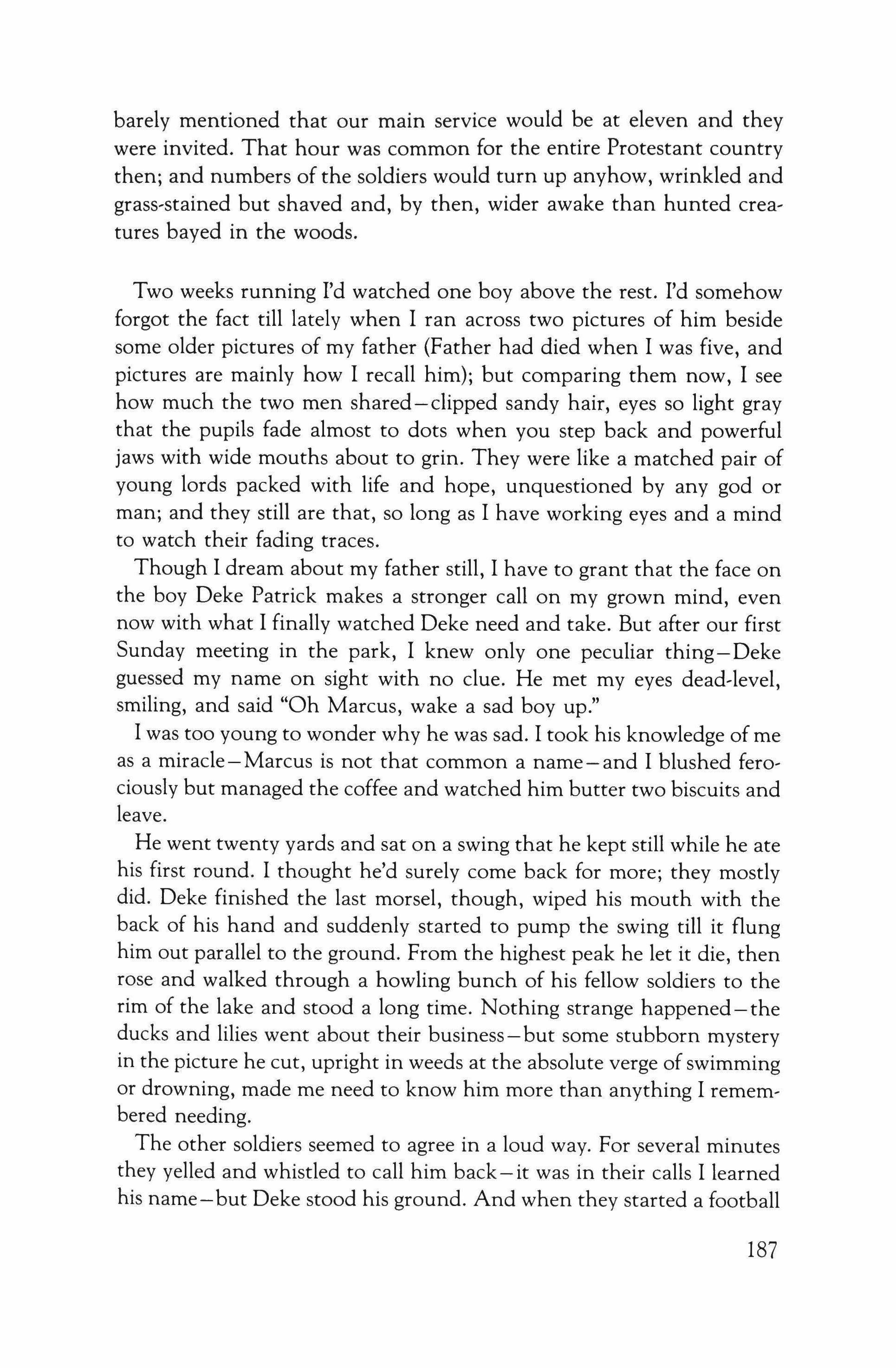
barely mentioned that our main service would be at eleven and they were invited. That hour was common for the entire Protestant country then; and numbers of the soldiers would turn up anyhow, wrinkled and grass-stained but shaved and, by then, wider awake than hunted creatures bayed in the woods.
Two weeks running I'd watched one boy above the rest. I'd somehow forgot the fact till lately when I ran across two pictures of him beside some older pictures of my father (Father had died when I was five, and pictures are mainly how I recall him); but comparing them now, I see how much the two men shared-clipped sandy hair, eyes so light gray that the pupils fade almost to dots when you step back and powerful jaws with wide mouths about to grin. They were like a matched pair of young lords packed with life and hope, unquestioned by any god or man; and they still are that, so long as I have working eyes and a mind to watch their fading traces.
Though I dream about my father still, I have to grant that the face on the boy Deke Patrick makes a stronger call on my grown mind, even now with what I finally watched Deke need and take. But after our first Sunday meeting in the park, I knew only one peculiar thing-Deke guessed my name on sight with no clue. He met my eyes dead-level, smiling, and said "Oh Marcus, wake a sad boy up."
I was too young to wonder why he was sad. I took his knowledge of me as a miracle - Marcus is not that common a name - and I blushed ferociously but managed the coffee and watched him butter two biscuits and leave.
He went twenty yards and sat on a swing that he kept still while he ate his first round. I thought he'd surely come back for more; they mostly did. Deke finished the last morsel, though, wiped his mouth with the back of his hand and suddenly started to pump the swing till it flung him out parallel to the ground. From the highest peak he let it die, then rose and walked through a howling bunch of his fellow soldiers to the rim of the lake and stood a long time. Nothing strange happened-the ducks and lilies went about their business-but some stubborn mystery in the picture he cut, upright in weeds at the absolute verge of swimming or drowning, made me need to know him more than anything I remembered needing.
The other soldiers seemed to agree in a loud way. For several minutes they yelled and whistled to call him back-it was in their calls I learned his name-but Deke stood his ground. And when they started a football
187
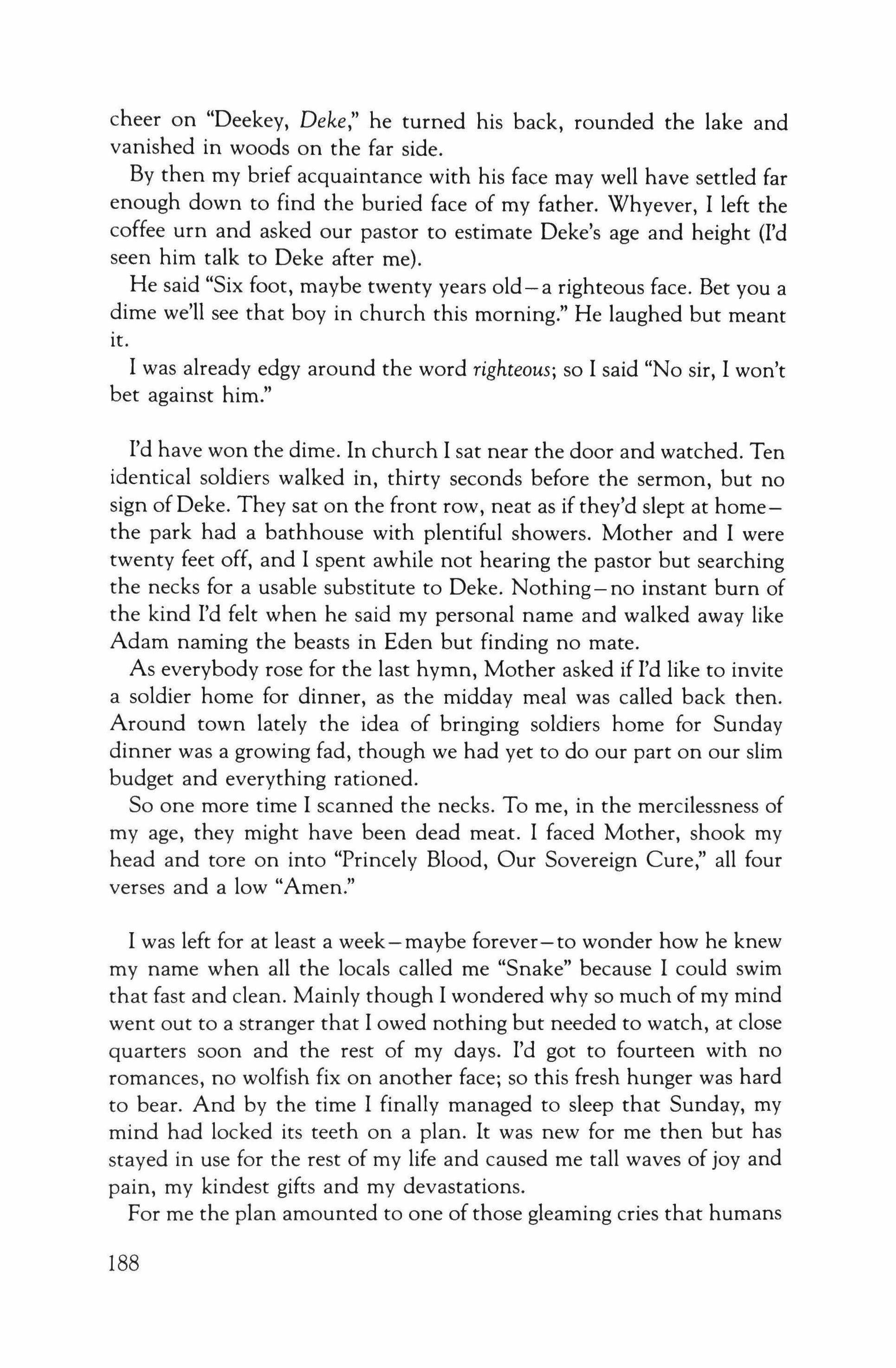
cheer on "Deekey, Deke," he turned his back, rounded the lake and vanished in woods on the far side.
By then my brief acquaintance with his face may well have settled far enough down to find the buried face of my father. Whyever, I left the coffee urn and asked our pastor to estimate Deke's age and height (I'd seen him talk to Deke after me).
He said "Six foot, maybe twenty years old-a righteous face. Bet you a dime we'll see that boy in church this morning." He laughed but meant it.
I was already edgy around the word righteous; so I said "No sir, I won't bet against him."
I'd have won the dime. In church I sat near the door and watched. Ten identical soldiers walked in, thirty seconds before the sermon, but no sign of Deke. They sat on the front row, neat as if they'd slept at homethe park had a bathhouse with plentiful showers. Mother and I were twenty feet off, and I spent awhile not hearing the pastor but searching the necks for a usable substitute to Deke. Nothing-no instant burn of the kind I'd felt when he said my personal name and walked away like Adam naming the beasts in Eden but finding no mate.
As everybody rose for the last hymn, Mother asked if I'd like to invite a soldier home for dinner, as the midday meal was called back then. Around town lately the idea of bringing soldiers home for Sunday dinner was a growing fad, though we had yet to do our part on our slim budget and everything rationed.
So one more time I scanned the necks. To me, in the mercilessness of my age, they might have been dead meat. I faced Mother, shook my head and tore on into "Princely Blood, Our Sovereign Cure," all four verses and a low "Amen."
I was left for at least a week-maybe forever-to wonder how he knew my name when all the locals called me "Snake" because I could swim that fast and clean. Mainly though I wondered why so much of my mind went out to a stranger that lowed nothing but needed to watch, at close quarters soon and the rest of my days. I'd got to fourteen with no romances, no wolfish fix on another face; so this fresh hunger was hard to bear. And by the time I finally managed to sleep that Sunday, my mind had locked its teeth on a plan. It was new for me then but has stayed in use for the rest of my life and caused me tall waves of joy and pain, my kindest gifts and my devastations.
For me the plan amounted to one of those gleaming cries that humans
188
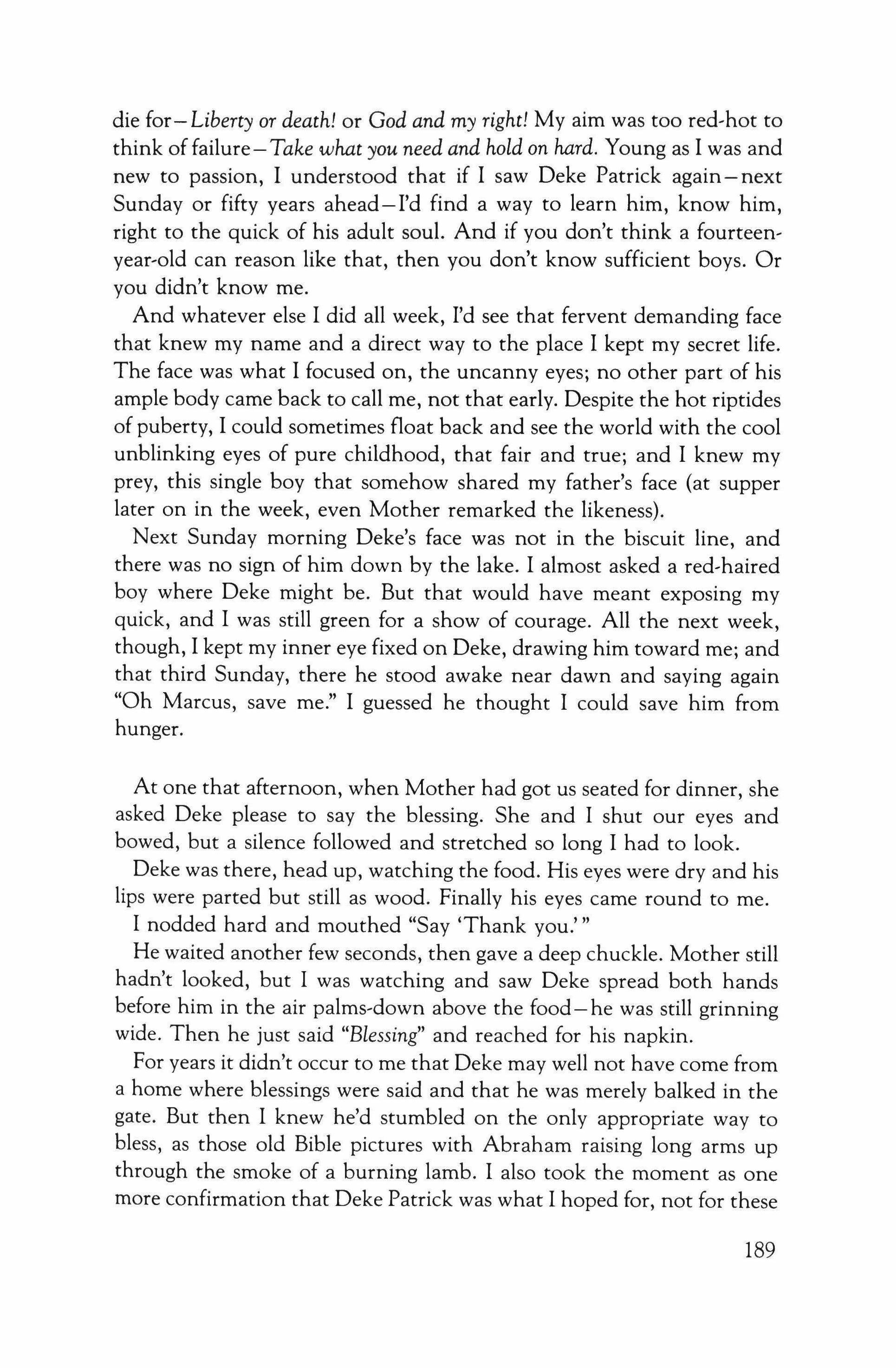
die for-Liberty or death! or God and my right! My aim was too red-hot to think of failure-Take what you need and hold on hard. Young as I was and new to passion, I understood that if I saw Deke Patrick again - next Sunday or fifty years ahead-I'd find a way to learn him, know him, right to the quick of his adult soul. And if you don't think a fourteenyear-old can reason like that, then you don't know sufficient boys. Or you didn't know me.
And whatever else I did all week, I'd see that fervent demanding face that knew my name and a direct way to the place I kept my secret life. The face was what I focused on, the uncanny eyes; no other part of his ample body came back to call me, not that early. Despite the hot riptides of puberty, I could sometimes float back and see the world with the cool unblinking eyes of pure childhood, that fair and true; and I knew my prey, this single boy that somehow shared my father's face {at supper later on in the week, even Mother remarked the likeness}.
Next Sunday morning Deke's face was not in the biscuit line, and there was no sign of him down by the lake. I almost asked a red-haired boy where Deke might be. But that would have meant exposing my quick, and I was still green for a show of courage. All the next week, though, I kept my inner eye fixed on Deke, drawing him toward me; and that third Sunday, there he stood awake near dawn and saying again "Oh Marcus, save me." I guessed he thought I could save him from hunger.
At one that afternoon, when Mother had got us seated for dinner, she asked Deke please to say the blessing. She and I shut our eyes and bowed, but a silence followed and stretched so long I had to look.
Deke was there, head up, watching the food. His eyes were dry and his lips were parted but still as wood. Finally his eyes came round to me.
I nodded hard and mouthed "Say 'Thank you.'''
He waited another few seconds, then gave a deep chuckle. Mother still hadn't looked, but I was watching and saw Deke spread both hands before him in the air palms-down above the food - he was still grinning wide. Then he just said "Blessing" and reached for his napkin.
For years it didn't occur to me that Deke may well not have come from a home where blessings were said and that he was merely balked in the gate. But then I knew he'd stumbled on the only appropriate way to bless, as those old Bible pictures with Abraham raising long arms up through the smoke of a burning lamb. I also took the moment as one more confirmation that Deke Patrick was what I hoped for, not for these
189
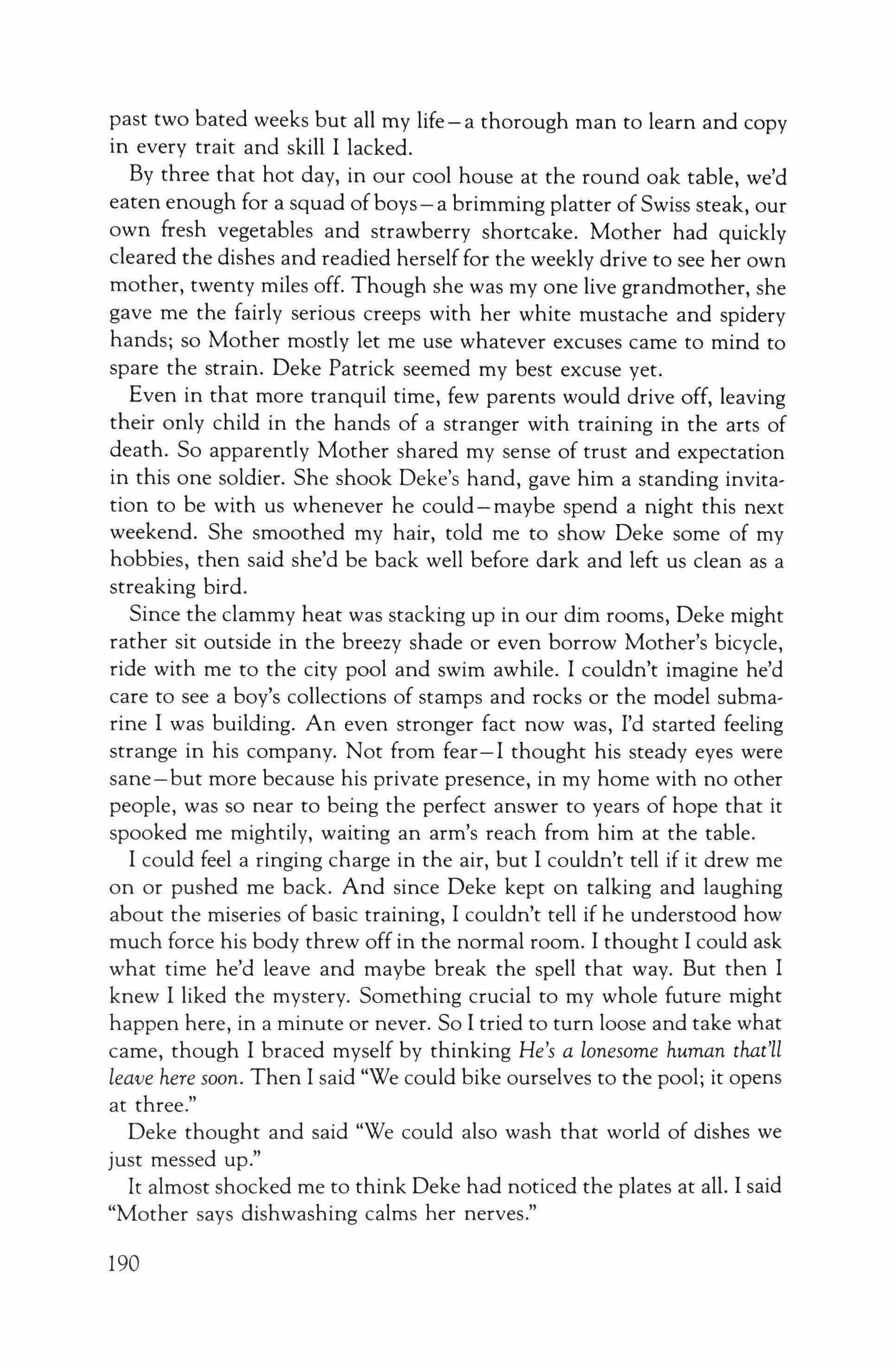
past two bated weeks but all my life-a thorough man to learn and copy in every trait and skill I lacked.
By three that hot day, in our cool house at the round oak table, we'd eaten enough for a squad ofboys - a brimming platter of Swiss steak, our own fresh vegetables and strawberry shortcake. Mother had quickly cleared the dishes and readied herselffor the weekly drive to see her own mother, twenty miles off. Though she was my one live grandmother, she gave me the fairly serious creeps with her white mustache and spidery hands; so Mother mostly let me use whatever excuses came to mind to spare the strain. Deke Patrick seemed my best excuse yet.
Even in that more tranquil time, few parents would drive off, leaving their only child in the hands of a stranger with training in the arts of death. So apparently Mother shared my sense of trust and expectation in this one soldier. She shook Deke's hand, gave him a standing invitation to be with us whenever he could - maybe spend a night this next weekend. She smoothed my hair, told me to show Deke some of my hobbies, then said she'd be back well before dark and left us clean as a streaking bird.
Since the clammy heat was stacking up in our dim rooms, Deke might rather sit outside in the breezy shade or even borrow Mother's bicycle, ride with me to the city pool and swim awhile. I couldn't imagine he'd care to see a boy's collections of stamps and rocks or the model submarine I was building. An even stronger fact now was, I'd started feeling strange in his company. Not from fear-I thought his steady eyes were sane-but more because his private presence, in my home with no other people, was so near to being the perfect answer to years of hope that it spooked me mightily, waiting an arm's reach from him at the table.
I could feel a ringing charge in the air, but I couldn't tell if it drew me on or pushed me back. And since Deke kept on talking and laughing about the miseries of basic training, I couldn't tell if he understood how much force his body threw off in the normal room. I thought I could ask what time he'd leave and maybe break the spell that way. But then I knew I liked the mystery. Something crucial to my whole future might happen here, in a minute or never. So I tried to turn loose and take what came, though I braced myself by thinking He's a lonesome human that'll leave here soon. Then I said "We could bike ourselves to the pool; it opens at three."
Deke thought and said "We could also wash that world of dishes we just messed up."
It almost shocked me to think Deke had noticed the plates at all. I said "Mother says dishwashing calms her nerves."
190
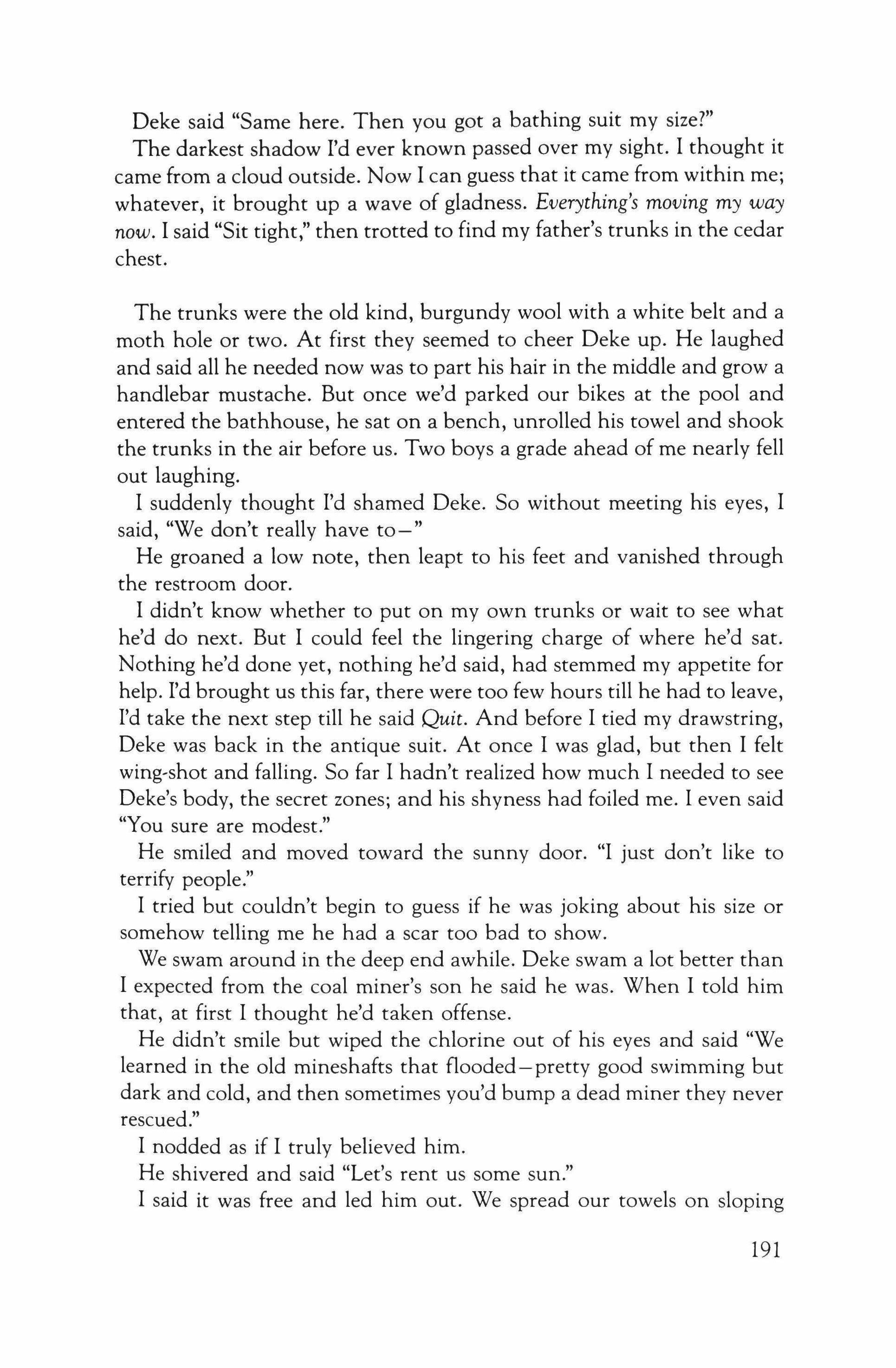
Deke said "Same here. Then you got a bathing suit my size?"
The darkest shadow I'd ever known passed over my sight. 1 thought it came from a cloud outside. Now 1 can guess that it came from within me; whatever, it brought up a wave of gladness. Everything's moving my way now. 1 said "Sit tight," then trotted to find my father's trunks in the cedar chest.
The trunks were the old kind, burgundy wool with a white belt and a moth hole or two. At first they seemed to cheer Deke up. He laughed and said all he needed now was to part his hair in the middle and grow a handlebar mustache. But once we'd parked our bikes at the pool and entered the bathhouse, he sat on a bench, unrolled his towel and shook the trunks in the air before us. Two boys a grade ahead of me nearly fell out laughing.
1 suddenly thought I'd shamed Deke. So without meeting his eyes, 1 said, "We don't really have to-"
He groaned a low note, then leapt to his feet and vanished through the restroom door.
1 didn't know whether to put on my own trunks or wait to see what he'd do next. But 1 could feel the lingering charge of where he'd sat. Nothing he'd done yet, nothing he'd said, had stemmed my appetite for help. I'd brought us this far, there were too few hours till he had to leave, I'd take the next step till he said Quit. And before 1 tied my drawstring, Deke was back in the antique suit. At once 1 was glad, but then 1 felt wing-shot and falling. So far 1 hadn't realized how much 1 needed to see Deke's body, the secret zones; and his shyness had foiled me. 1 even said "You sure are modest."
He smiled and moved toward the sunny door. "I just don't like to terrify people."
1 tried but couldn't begin to guess if he was joking about his size or somehow telling me he had a scar too bad to show.
We swam around in the deep end awhile. Deke swam a lot better than 1 expected from the coal miner's son he said he was. When 1 told him that, at first 1 thought he'd taken offense.
He didn't smile but wiped the chlorine out of his eyes and said "We learned in the old mineshafts that flooded - pretty good swimming but dark and cold, and then sometimes you'd bump a dead miner they never rescued."
1 nodded as if 1 truly believed him.
He shivered and said "Let's rent us some sun."
I said it was free and led him out. We spread our towels on sloping
191
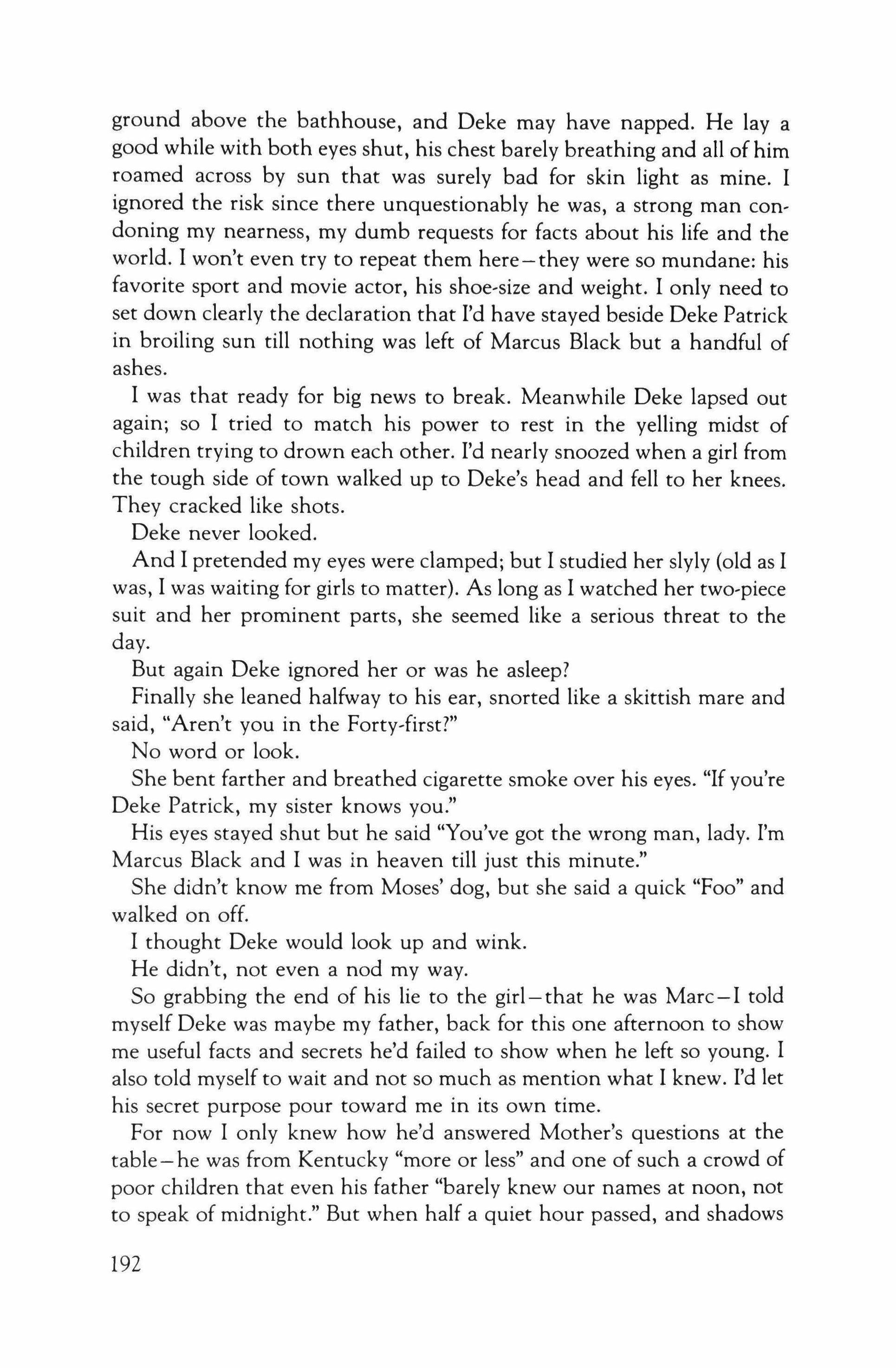
ground above the bathhouse, and Deke may have napped. He lay a good while with both eyes shut, his chest barely breathing and all of him roamed across by sun that was surely bad for skin light as mine. I ignored the risk since there unquestionably he was, a strong man condoning my nearness, my dumb requests for facts about his life and the world. I won't even try to repeat them here-they were so mundane: his favorite sport and movie actor, his shoe-size and weight. I only need to set down clearly the declaration that I'd have stayed beside Deke Patrick in broiling sun till nothing was left of Marcus Black but a handful of ashes.
I was that ready for big news to break. Meanwhile Deke lapsed out again; so I tried to match his power to rest in the yelling midst of children trying to drown each other. I'd nearly snoozed when a girl from the tough side of town walked up to Deke's head and fell to her knees. They cracked like shots.
Deke never looked.
And I pretended my eyes were clamped; but I studied her slyly (old as I was, I was waiting for girls to matter). As long as I watched her two-piece suit and her prominent parts, she seemed like a serious threat to the day.
But again Deke ignored her or was he asleep?
Finally she leaned halfway to his ear, snorted like a skittish mare and said, "Aren't you in the Forty-first?"
No word or look.
She bent farther and breathed cigarette smoke over his eyes. "If you're Deke Patrick, my sister knows you."
His eyes stayed shut but he said "You've got the wrong man, lady. I'm Marcus Black and I was in heaven till just this minute."
She didn't know me from Moses' dog, but she said a quick "Foo" and walked on off.
I thought Deke would look up and wink.
He didn't, not even a nod my way.
So grabbing the end of his lie to the girl-that he was Marc-I told myself Deke was maybe my father, back for this one afternoon to show me useful facts and secrets he'd failed to show when he left so young. I also told myself to wait and not so much as mention what I knew. I'd let his secret purpose pour toward me in its own time.
For now I only knew how he'd answered Mother's questions at the table - he was from Kentucky "more or less" and one of such a crowd of poor children that even his father "barely knew our names at noon, not to speak of midnight." But when half a quiet hour passed, and shadows
192
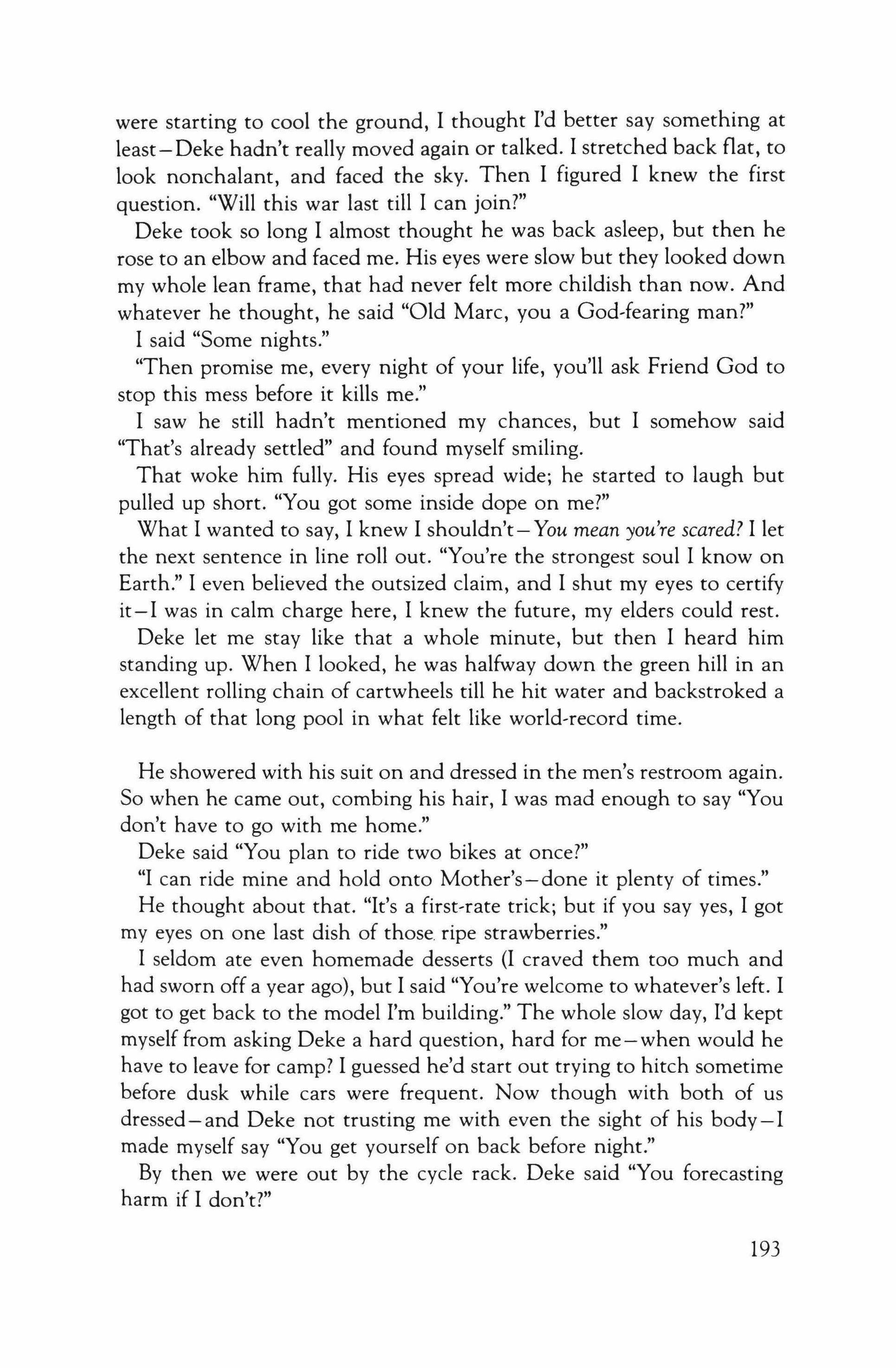
were starting to cool the ground, 1 thought I'd better say something at least-Deke hadn't really moved again or talked. 1 stretched back flat, to look nonchalant, and faced the sky. Then 1 figured 1 knew the first question. "Will this war last till 1 can join?"
Deke took so long 1 almost thought he was back asleep, but then he rose to an elbow and faced me. His eyes were slow but they looked down my whole lean frame, that had never felt more childish than now. And whatever he thought, he said "Old Marc, you a God-fearing man?"
I said "Some nights."
"Then promise me, every night of your life, you'll ask Friend God to stop this mess before it kills me."
1 saw he still hadn't mentioned my chances, but I somehow said "That's already settled" and found myself smiling. That woke him fully. His eyes spread wide; he started to laugh but pulled up short. "You got some inside dope on me?"
What I wanted to say, I knew I shouldn't-You mean you're scared? I let the next sentence in line roll out. "You're the strongest soul I know on Earth." I even believed the outsized claim, and I shut my eyes to certify it-I was in calm charge here, I knew the future, my elders could rest.
Deke let me stay like that a whole minute, but then I heard him standing up. When I looked, he was halfway down the green hill in an excellent rolling chain of cartwheels till he hit water and backstroked a length of that long pool in what felt like world-record time.
He showered with his suit on and dressed in the men's restroom again. So when he came out, combing his hair, I was mad enough to say "You don't have to go with me home."
Deke said "You plan to ride two bikes at once?"
"I can ride mine and hold onto Mother's-done it plenty of times."
He thought about that. "It's a first-rate trick; but if you say yes, I got my eyes on one last dish of those. ripe strawberries."
I seldom ate even homemade desserts (I craved them too much and had sworn off a year ago), but I said "You're welcome to whatever's left. 1 got to get back to the model I'm building." The whole slow day, I'd kept myself from asking Deke a hard question, hard for me - when would he have to leave for camp? I guessed he'd start out trying to hitch sometime before dusk while cars were frequent. Now though with both of us dressed - and Deke not trusting me with even the sight of his body - I made myself say "You get yourself on back before night."
By then we were out by the cycle rack. Deke said "You forecasting harm if I don't?"
193
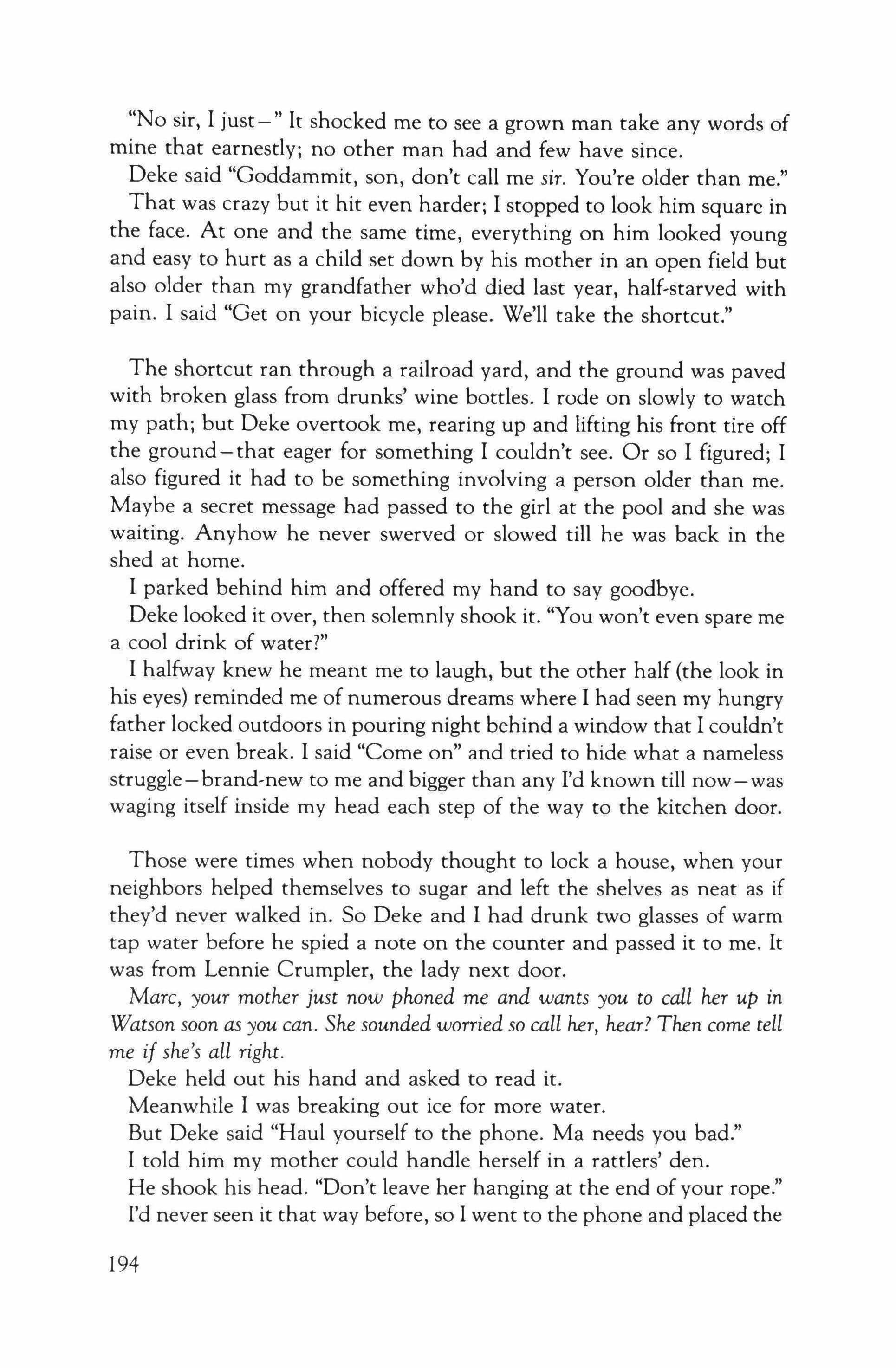
"No sir, I just-" It shocked me to see a grown man take any words of mine that earnestly; no other man had and few have since.
Deke said "Goddamrnit, son, don't call me sir. You're older than me."
That was crazy but it hit even harder; I stopped to look him square in the face. At one and the same time, everything on him looked young and easy to hurt as a child set down by his mother in an open field but also older than my grandfather who'd died last year, half-starved with pain. I said "Get on your bicycle please. We'll take the shortcut."
The shortcut ran through a railroad yard, and the ground was paved with broken glass from drunks' wine bottles. I rode on slowly to watch my path; but Deke overtook me, rearing up and lifting his front tire off the ground - that eager for something I couldn't see. Or so I figured; I also figured it had to be something involving a person older than me. Maybe a secret message had passed to the girl at the pool and she was waiting. Anyhow he never swerved or slowed till he was back in the shed at home.
I parked behind him and offered my hand to say goodbye. Deke looked it over, then solemnly shook it. "You won't even spare me a cool drink of water?"
I halfway knew he meant me to laugh, but the other half (the look in his eyes) reminded me of numerous dreams where I had seen my hungry father locked outdoors in pouring night behind a window that I couldn't raise or even break. I said "Come on" and tried to hide what a nameless struggle-brand-new to me and bigger than any I'd known till now-was waging itself inside my head each step of the way to the kitchen door.
Those were times when nobody thought to lock a house, when your neighbors helped themselves to sugar and left the shelves as neat as if they'd never walked in. So Deke and I had drunk two glasses of warm tap water before he spied a note on the counter and passed it to me. It was from Lennie Crumpler, the lady next door.
Marc, your mother just now phoned me and wants you to call her up in Watson soon as you can. She sounded worried so call her, hear? Then come tell me if she's all right.
Deke held out his hand and asked to read it.
Meanwhile I was breaking out ice for more water.
But Deke said "Haul yourself to the phone. Ma needs you bad."
I told him my mother could handle herself in a rattlers' den. He shook his head. "Don't leave her hanging at the end of your rope."
I'd never seen it that way before, so I went to the phone and placed the
194
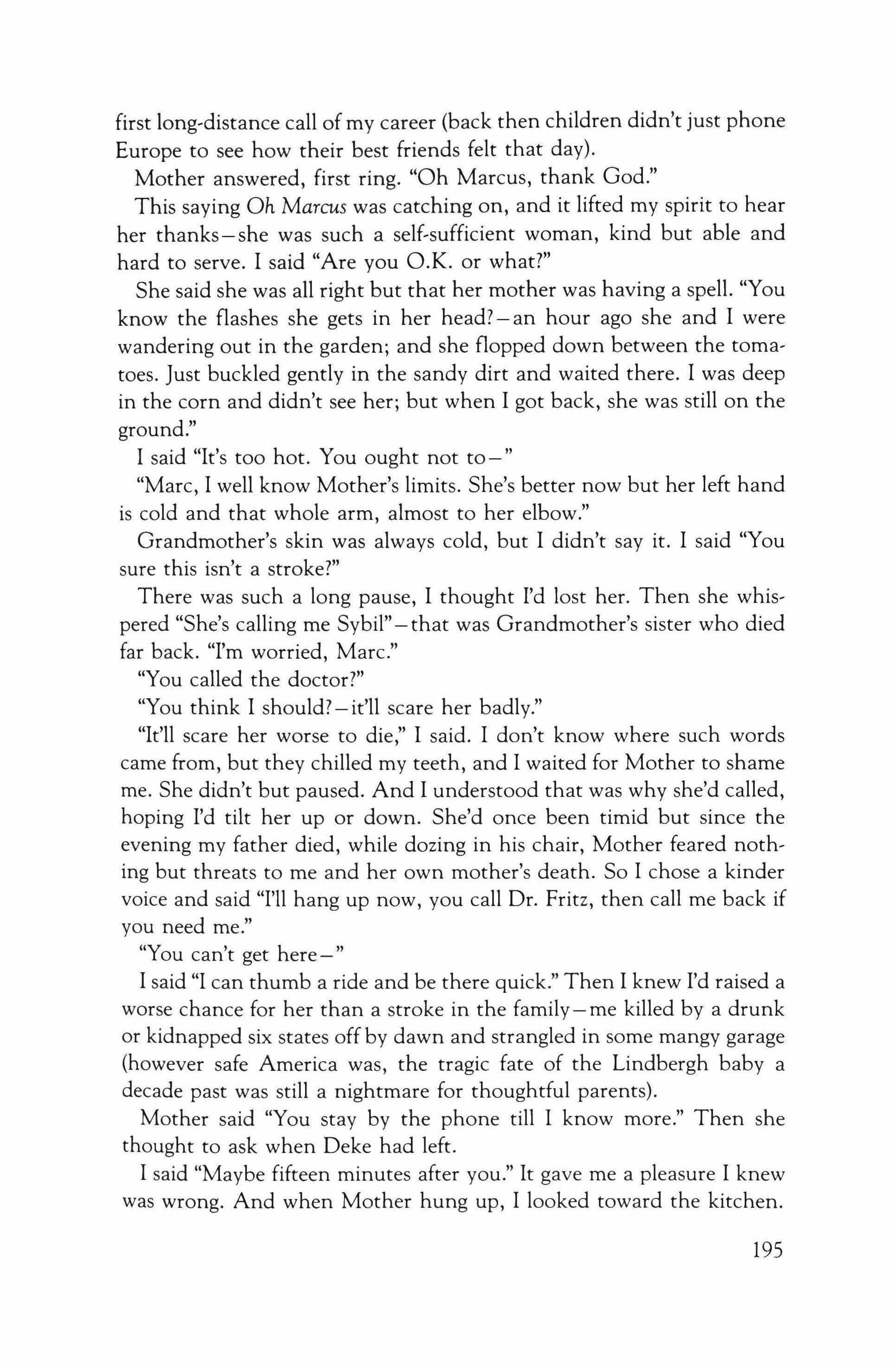
first long-distance call of my career (back then children didn't just phone Europe to see how their best friends felt that day).
Mother answered, first ring. "Oh Marcus, thank God."
This saying Oh Marcus was catching on, and it lifted my spirit to hear her thanks-she was such a self-sufficient woman, kind but able and hard to serve. I said "Are you O.K. or what?"
She said she was all right but that her mother was having a spell. "You know the flashes she gets in her head? - an hour ago she and I were wandering out in the garden; and she flopped down between the tomatoes. Just buckled gently in the sandy dirt and waited there. I was deep in the corn and didn't see her; but when I got back, she was still on the ground."
I said "It's too hot. You ought not to-"
"Marc, I well know Mother's limits. She's better now but her left hand is cold and that whole arm, almost to her elbow."
Grandmother's skin was always cold, but I didn't say it. I said "You sure this isn't a stroke?"
There was such a long pause, I thought I'd lost her. Then she whispered "She's calling me Sybil"-that was Grandmother's sister who died far back. "I'm worried, Marc."
"You called the doctor?"
"You think I should?-it'll scare her badly."
"It'll scare her worse to die," I said. I don't know where such words came from, but they chilled my teeth, and I waited for Mother to shame me. She didn't but paused. And I understood that was why she'd called, hoping I'd tilt her up or down. She'd once been timid but since the evening my father died, while dozing in his chair, Mother feared nothing but threats to me and her own mother's death. So I chose a kinder voice and said "I'll hang up now, you call Dr. Fritz, then call me back if you need me."
"You can't get here -"
I said "I can thumb a ride and be there quick." Then I knew I'd raised a worse chance for her than a stroke in the family-me killed by a drunk or kidnapped six states offby dawn and strangled in some mangy garage (however safe America was, the tragic fate of the Lindbergh baby a decade past was still a nightmare for thoughtful parents).
Mother said "You stay by the phone till I know more." Then she thought to ask when Deke had left.
I said "Maybe fifteen minutes after you." It gave me a pleasure I knew was wrong. And when Mother hung up, I looked toward the kitchen.
195
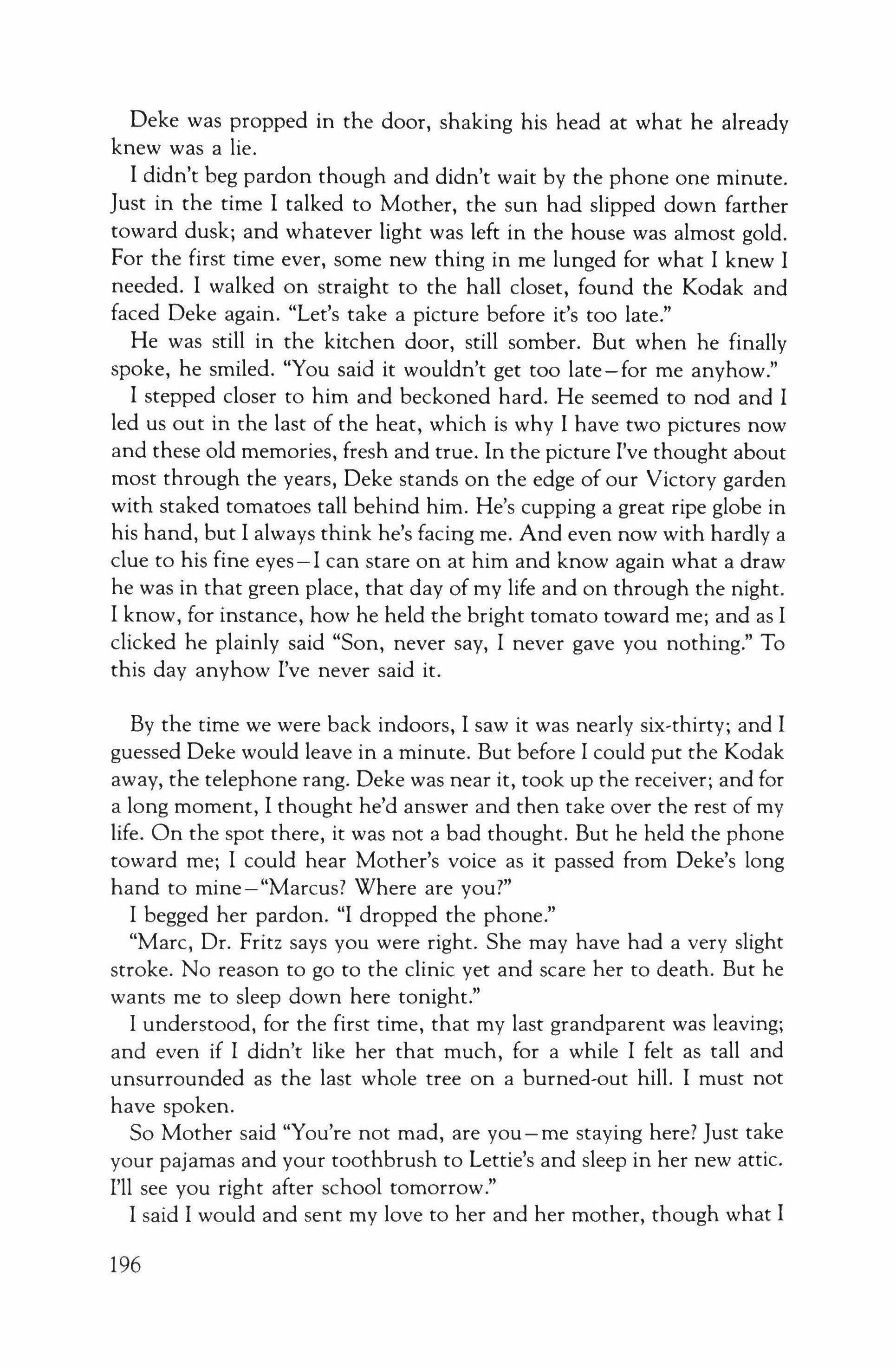
Deke was propped in the door, shaking his head at what he already knew was a lie.
I didn't beg pardon though and didn't wait by the phone one minute. Just in the time I talked to Mother, the sun had slipped down farther toward dusk; and whatever light was left in the house was almost gold. For the first time ever, some new thing in me lunged for what I knew I needed. I walked on straight to the hall closet, found the Kodak and faced Deke again. "Let's take a picture before it's too late."
He was still in the kitchen door, still somber. But when he finally spoke, he smiled. "You said it wouldn't get too late-for me anyhow."
1 stepped closer to him and beckoned hard. He seemed to nod and 1 led us out in the last of the heat, which is why 1 have two pictures now and these old memories, fresh and true. In the picture I've thought about most through the years, Deke stands on the edge of our Victory garden with staked tomatoes tall behind him. He's cupping a great ripe globe in his hand, but 1 always think he's facing me. And even now with hardly a clue to his fine eyes-I can stare on at him and know again what a draw he was in that green place, that day of my life and on through the night. I know, for instance, how he held the bright tomato toward me; and as I clicked he plainly said "Son, never say, I never gave you nothing." To this day anyhow I've never said it.
By the time we were back indoors, I saw it was nearly six-thirty; and I guessed Deke would leave in a minute. But before I could put the Kodak away, the telephone rang. Deke was near it, took up the receiver; and for a long moment, I thought he'd answer and then take over the rest of my life. On the spot there, it was not a bad thought. But he held the phone toward me; I could hear Mother's voice as it passed from Deke's long hand to mine- "Marcus? Where are you?"
I begged her pardon. "I dropped the phone."
"Marc, Dr. Fritz says you were right. She may have had a very slight stroke. No reason to go to the clinic yet and scare her to death. But he wants me to sleep down here tonight."
1 understood, for the first time, that my last grandparent was leaving; and even if I didn't like her that much, for a while I felt as tall and unsurrounded as the last whole tree on a burned-out hill. I must not have spoken.
So Mother said "You're not mad, are you-me staying here? Just take your pajamas and your toothbrush to Lettie's and sleep in her new attic. I'll see you right after school tomorrow."
I said I would and sent my love to her and her mother, though what 1
196
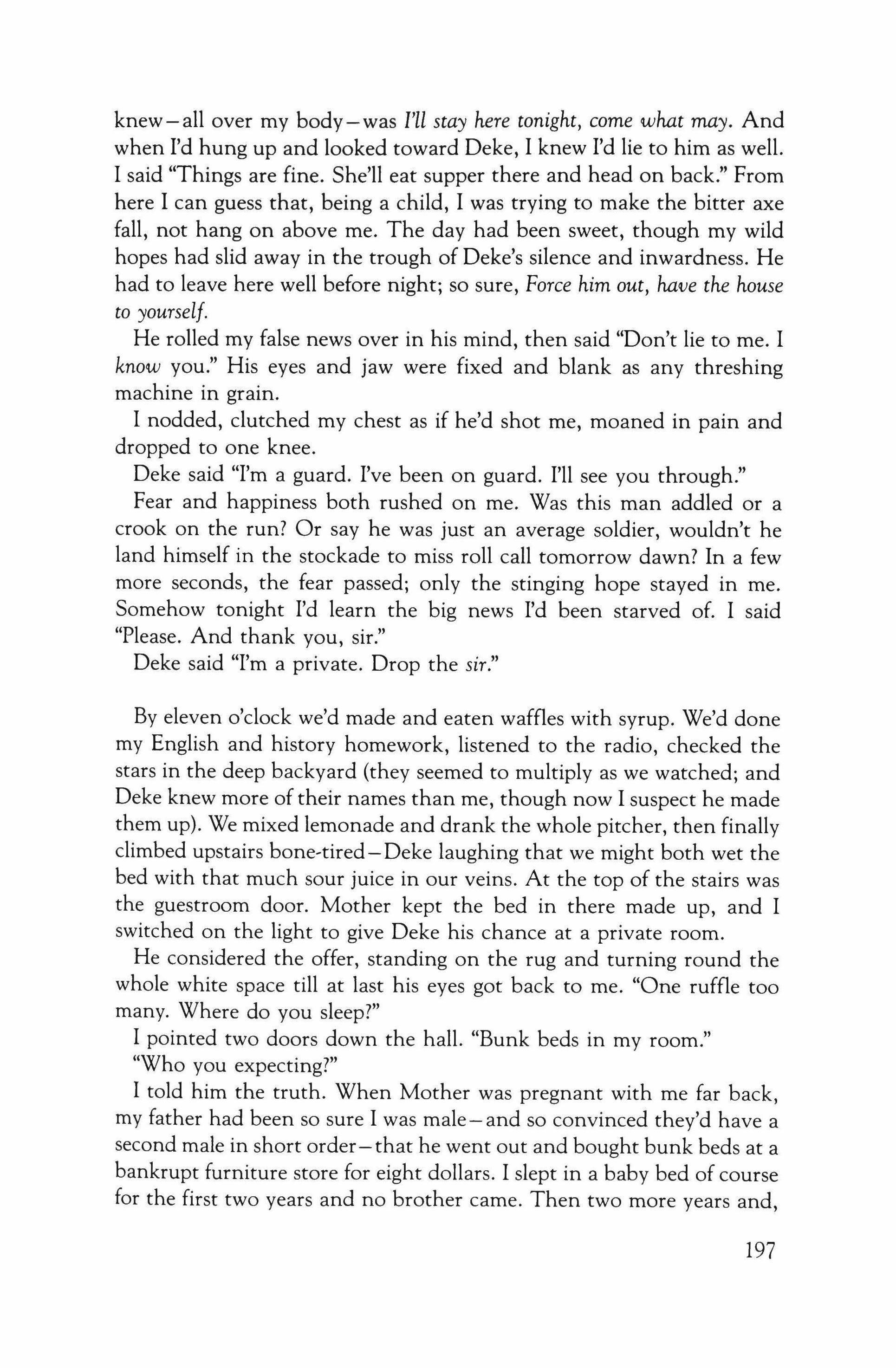
knew-all over my body-was I'll stay here tonight, come what may. And when I'd hung up and looked toward Deke, I knew I'd lie to him as well. I said "Things are fine. She'll eat supper there and head on back." From here I can guess that, being a child, I was trying to make the bitter axe fall, not hang on above me. The day had been sweet, though my wild hopes had slid away in the trough of Deke's silence and inwardness. He had to leave here well before night; so sure, Force him out, have the house to yourself.
He rolled my false news over in his mind, then said "Don't lie to me. I know you." His eyes and jaw were fixed and blank as any threshing machine in grain.
I nodded, clutched my chest as if he'd shot me, moaned in pain and dropped to one knee.
Deke said "I'm a guard. I've been on guard. I'll see you through."
Fear and happiness both rushed on me. Was this man addled or a crook on the run? Or say he was just an average soldier, wouldn't he land himself in the stockade to miss roll call tomorrow dawn? In a few more seconds, the fear passed; only the stinging hope stayed in me. Somehow tonight I'd learn the big news I'd been starved of. I said "Please. And thank you, sir."
Deke said "I'm a private. Drop the sir."
By eleven o'clock we'd made and eaten waffles with syrup. We'd done my English and history homework, listened to the radio, checked the stars in the deep backyard (they seemed to multiply as we watched; and Deke knew more of their names than me, though now I suspect he made them up). We mixed lemonade and drank the whole pitcher, then finally climbed upstairs bone-tired - Deke laughing that we might both wet the bed with that much sour juice in our veins. At the top of the stairs was the guestroom door. Mother kept the bed in there made up, and I switched on the light to give Deke his chance at a private room.
He considered the offer, standing on the rug and turning round the whole white space till at last his eyes got back to me. "One ruffle too many. Where do you sleep?"
I pointed two doors down the hall. "Bunk beds in my room."
"Who you expecting?"
I told him the truth. When Mother was pregnant with me far back, my father had been so sure I was male- and so convinced they'd have a second male in short order-that he went out and bought bunk beds at a bankrupt furniture store for eight dollars. I slept in a baby bed of course for the first two years and no brother came. Then two more years and,
197
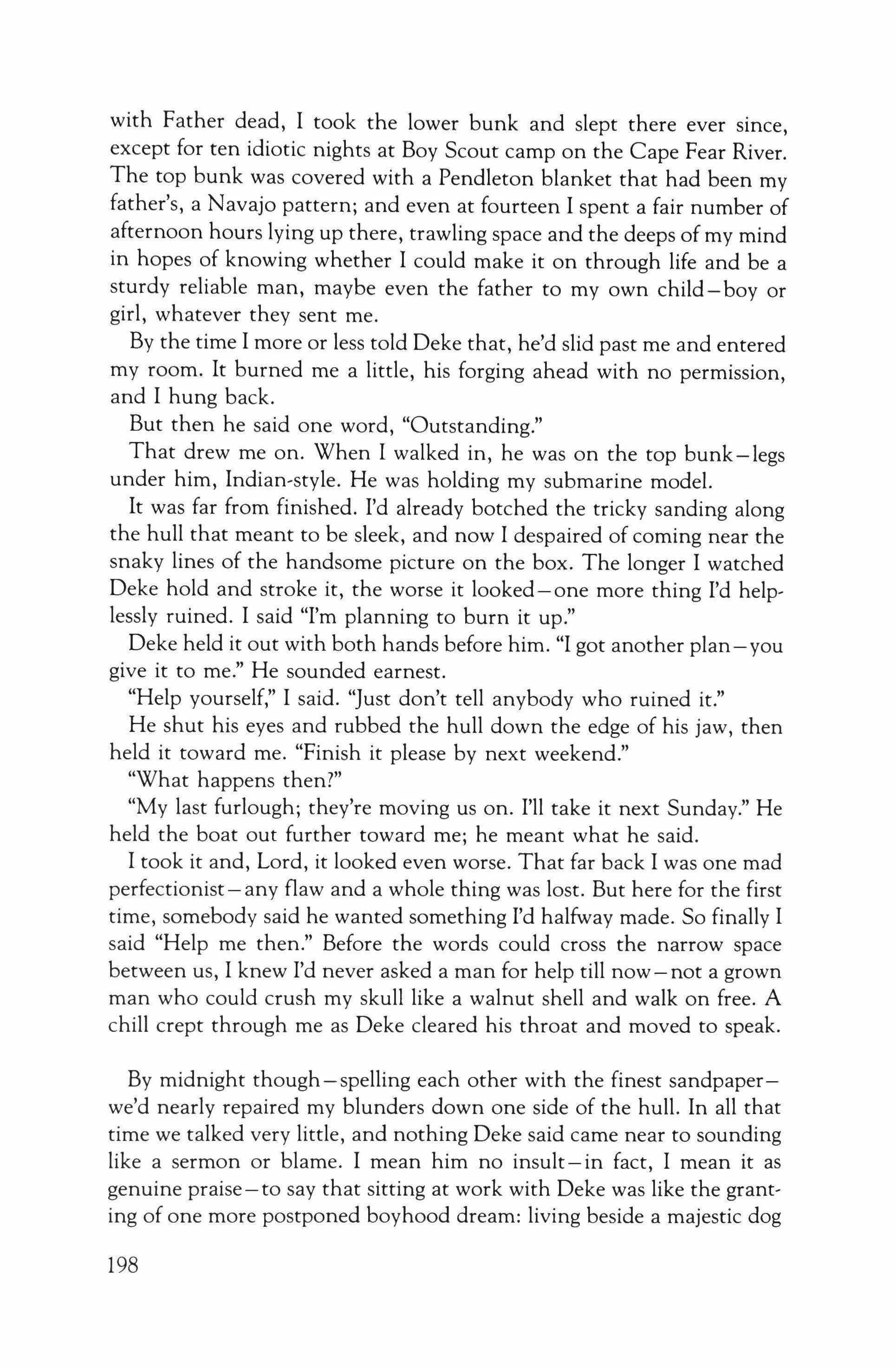
with Father dead, I took the lower bunk and slept there ever since, except for ten idiotic nights at Boy Scout camp on the Cape Fear River. The top bunk was covered with a Pendleton blanket that had been my father's, a Navajo pattern; and even at fourteen I spent a fair number of afternoon hours lying up there, trawling space and the deeps of my mind in hopes of knowing whether I could make it on through life and be a sturdy reliable man, maybe even the father to my own child - boy or girl, whatever they sent me.
By the time I more or less told Deke that, he'd slid past me and entered my room. It burned me a little, his forging ahead with no permission, and I hung back.
But then he said one word, "Outstanding."
That drew me on. When I walked in, he was on the top bunk-legs under him, Indian-style. He was holding my submarine model.
It was far from finished. I'd already botched the tricky sanding along the hull that meant to be sleek, and now I despaired of coming near the snaky lines of the handsome picture on the box. The longer I watched Deke hold and stroke it, the worse it looked-one more thing I'd helplessly ruined. I said "I'm planning to burn it up."
Deke held it out with both hands before him. "I got another plan-you give it to me." He sounded earnest.
"Help yourself," I said. "Just don't tell anybody who ruined it."
He shut his eyes and rubbed the hull down the edge of his jaw, then held it toward me. "Finish it please by next weekend."
"What happens then?"
"My last furlough; they're moving us on. I'll take it next Sunday." He held the boat out further toward me; he meant what he said.
I took it and, Lord, it looked even worse. That far back I was one mad perfectionistany flaw and a whole thing was lost. But here for the first time, somebody said he wanted something I'd halfway made. So finally I said "Help me then." Before the words could cross the narrow space between us, I knew I'd never asked a man for help till now-not a grown man who could crush my skull like a walnut shell and walk on free. A chill crept through me as Deke cleared his throat and moved to speak.
By midnight though-spelling each other with the finest sandpaperwe'd nearly repaired my blunders down one side of the hull. In all that time we talked very little, and nothing Deke said came near to sounding like a sermon or blame. I mean him no insult-in fact, I mean it as genuine praise-to say that sitting at work with Deke was like the granting of one more postponed boyhood dream: living beside a majestic dog
198
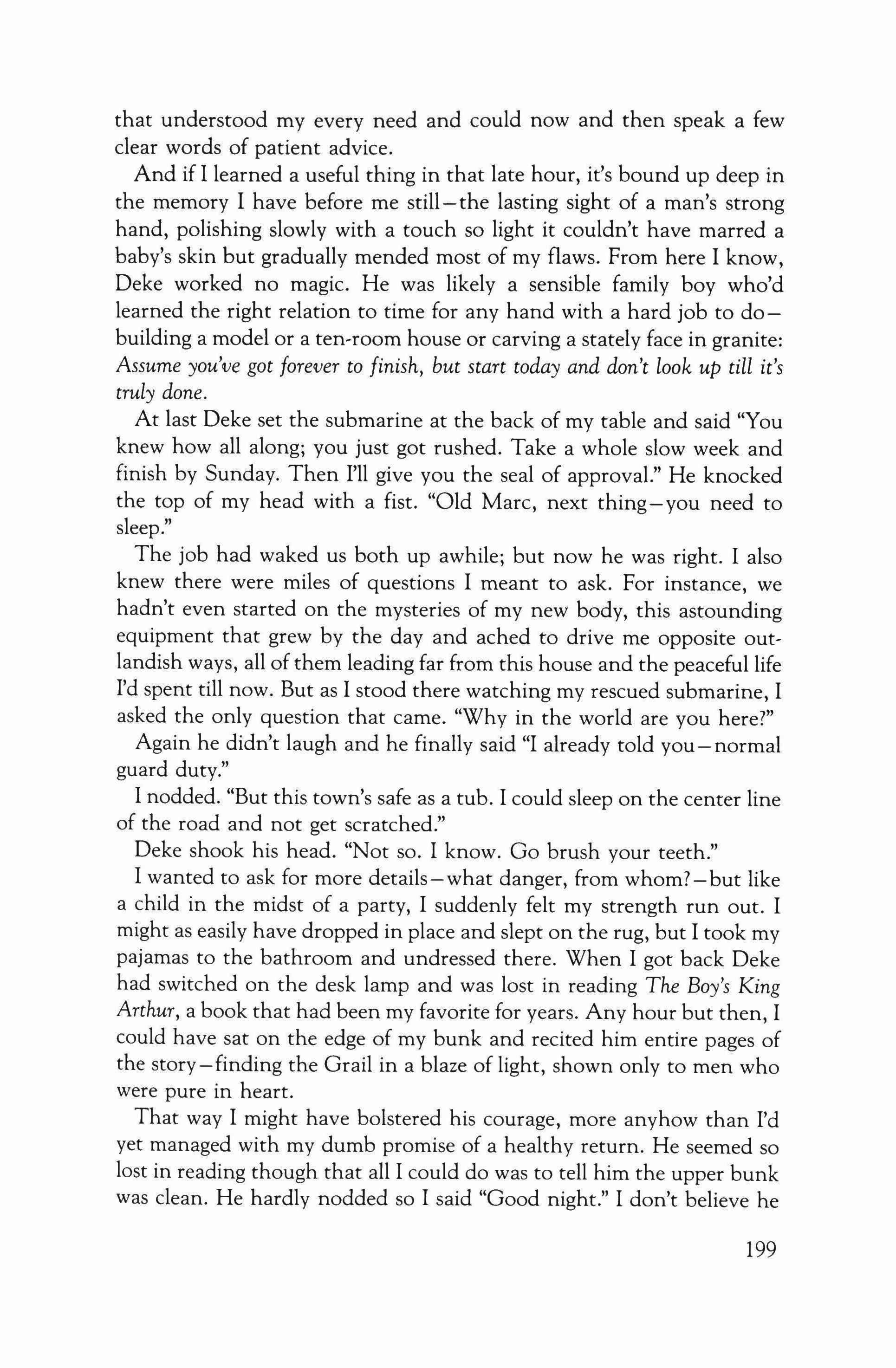
that understood my every need and could now and then speak a few clear words of patient advice.
And if I learned a useful thing in that late hour, it's bound up deep in the memory I have before me still-the lasting sight of a man's strong hand, polishing slowly with a touch so light it couldn't have marred a baby's skin but gradually mended most of my flaws. From here I know, Deke worked no magic. He was likely a sensible family boy who'd learned the right relation to time for any hand with a hard job to dobuilding a model or a ten-room house or carving a stately face in granite: Assume you've got forever to finish, but start today and don't look up till it's truly done.
At last Deke set the submarine at the back of my table and said "You knew how all along; you just got rushed. Take a whole slow week and finish by Sunday. Then I'll give you the seal of approval." He knocked the top of my head with a fist. "Old Marc, next thing-you need to sleep."
The job had waked us both up awhile; but now he was right. I also knew there were miles of questions I meant to ask. For instance, we hadn't even started on the mysteries of my new body, this astounding equipment that grew by the day and ached to drive me opposite outlandish ways, all of them leading far from this house and the peaceful life I'd spent till now. But as I stood there watching my rescued submarine, I asked the only question that came. "Why in the world are you here?"
Again he didn't laugh and he finally said "I already told you-normal guard duty."
I nodded. "But this town's safe as a tub. I could sleep on the center line of the road and not get scratched."
Deke shook his head. "Not so. I know. Go brush your teeth."
I wanted to ask for more details-what danger, from whom?-but like a child in the midst of a party, I suddenly felt my strength run out. I might as easily have dropped in place and slept on the rug, but I took my pajamas to the bathroom and undressed there. When I got back Deke had switched on the desk lamp and was lost in reading The Boy's King Arthur, a book that had been my favorite for years. Any hour but then, I could have sat on the edge of my bunk and recited him entire pages of the story-finding the Grail in a blaze of light, shown only to men who were pure in heart.
That way I might have bolstered his courage, more anyhow than I'd yet managed with my dumb promise of a healthy return. He seemed so lost in reading though that all I could do was to tell him the upper bunk was clean. He hardly nodded so I said "Good night." I don't believe he
199
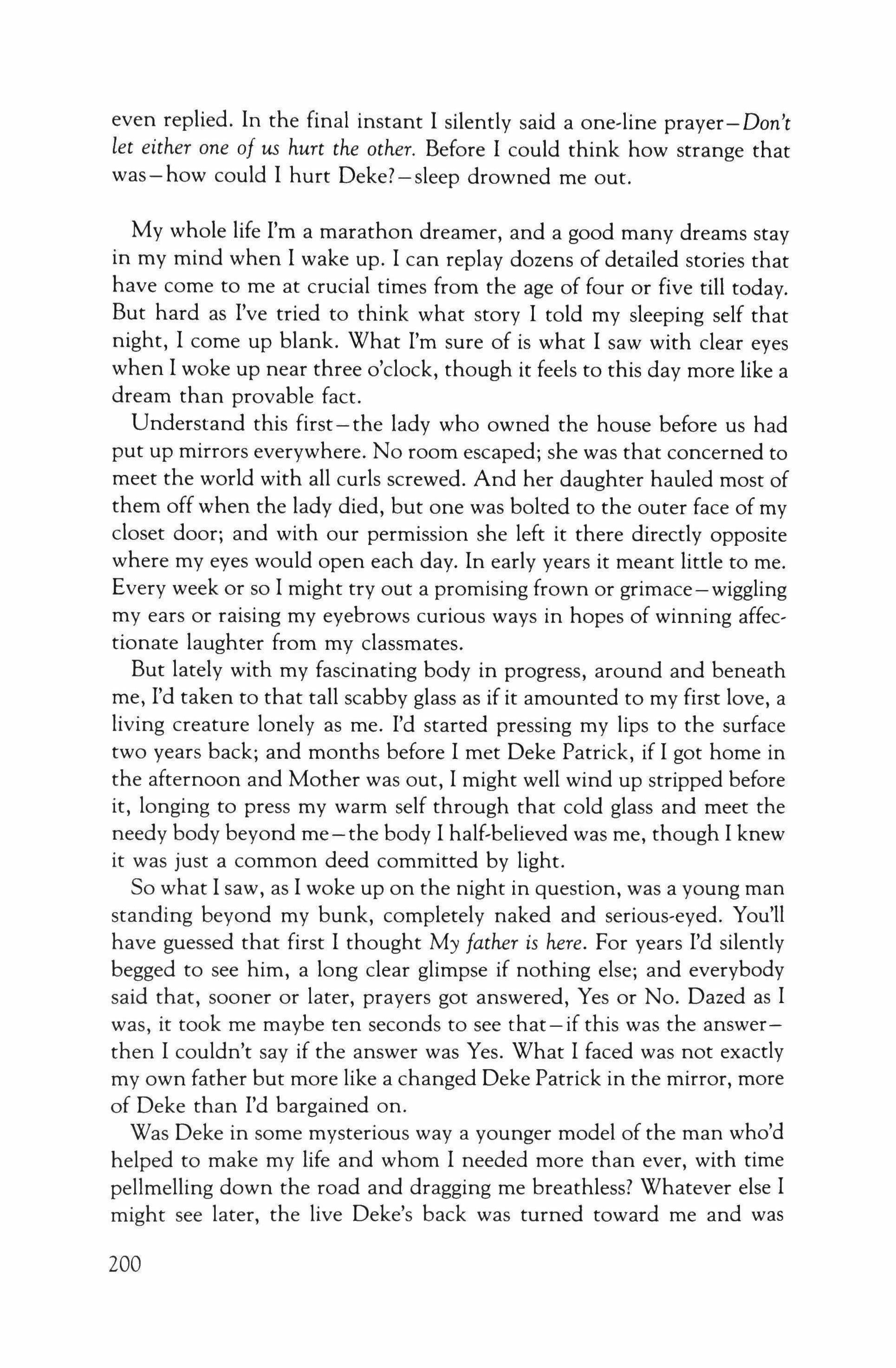
even replied. In the final instant I silently said a one-line prayer- Don't let either one of us hurt the other. Before I could think how strange that was-how could I hurt Deke?-sleep drowned me out.
My whole life I'm a marathon dreamer, and a good many dreams stay in my mind when I wake up. I can replay dozens of detailed stories that have come to me at crucial times from the age of four or five till today. But hard as I've tried to think what story I told my sleeping self that night, I come up blank. What I'm sure of is what I saw with clear eyes when I woke up near three o'clock, though it feels to this day more like a dream than provable fact.
Understand this first-the lady who owned the house before us had put up mirrors everywhere. No room escaped; she was that concerned to meet the world with all curls screwed. And her daughter hauled most of them off when the lady died, but one was bolted to the outer face of my closet door; and with our permission she left it there directly opposite where my eyes would open each day. In early years it meant little to me. Every week or so I might tryout a promising frown or grimace-wiggling my ears or raising my eyebrows curious ways in hopes of winning affectionate laughter from my classmates.
But lately with my fascinating body in progress, around and beneath me, I'd taken to that tall scabby glass as if it amounted to my first love, a living creature lonely as me. I'd started pressing my lips to the surface two years back; and months before I met Deke Patrick, if I got home in the afternoon and Mother was out, I might well wind up stripped before it, longing to press my warm self through that cold glass and meet the needy body beyond me-the body I half-believed was me, though I knew it was just a common deed committed by light.
So what I saw, as I woke up on the night in question, was a young man standing beyond my bunk, completely naked and serious-eyed. You'll have guessed that first I thought My father is here. For years I'd silently begged to see him, a long clear glimpse if nothing else; and everybody said that, sooner or later, prayers got answered, Yes or No. Dazed as I was, it took me maybe ten seconds to see that-if this was the answerthen I couldn't say if the answer was Yes. What I faced was not exactly my own father but more like a changed Deke Patrick in the mirror, more of Deke than I'd bargained on.
Was Deke in some mysterious way a younger model of the man who'd helped to make my life and whom I needed more than ever, with time pellmelling down the road and dragging me breathless? Whatever else I might see later, the live Deke's back was turned toward me and was 200
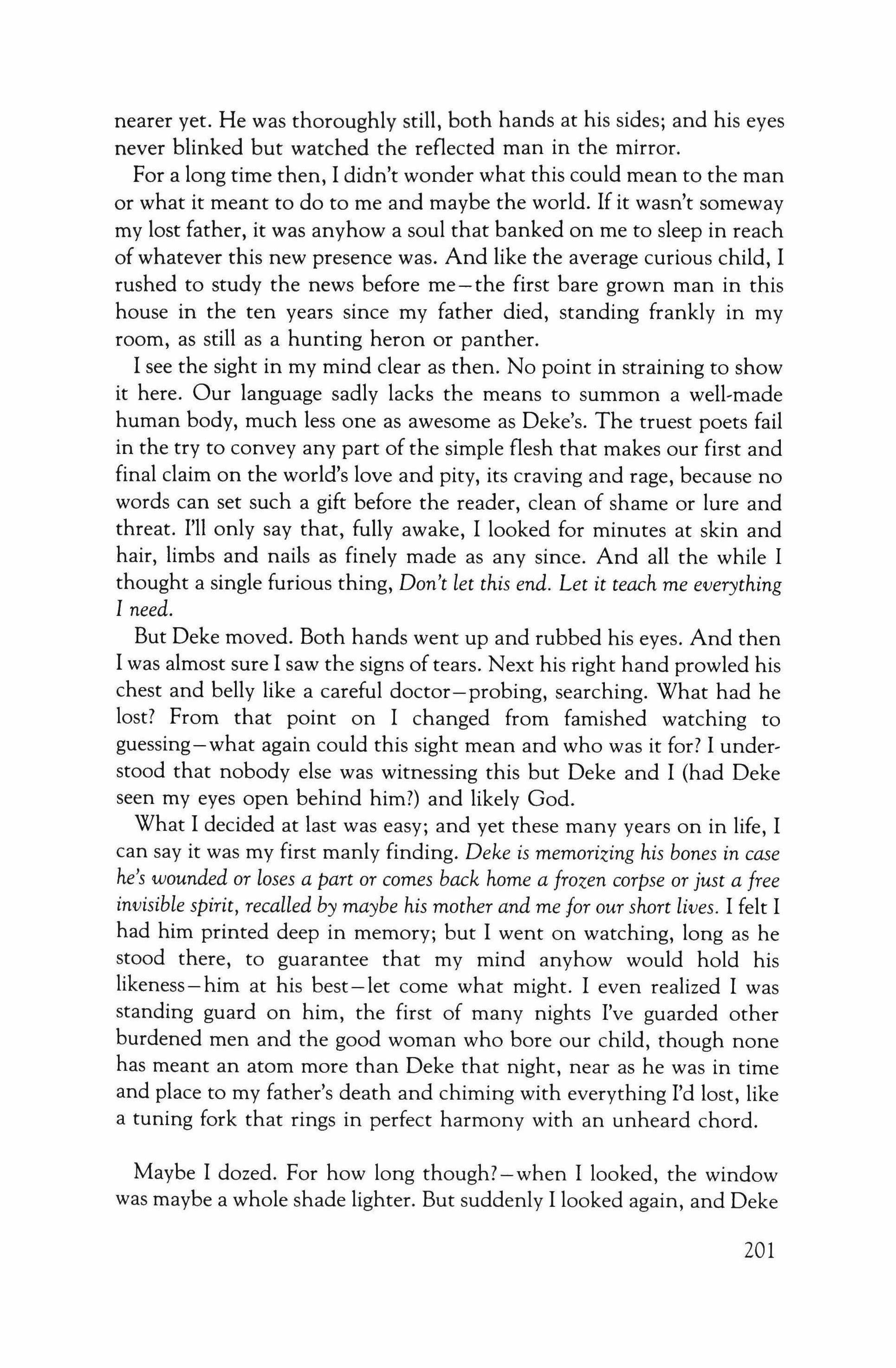
nearer yet. He was thoroughly still, both hands at his sides; and his eyes never blinked but watched the reflected man in the mirror.
For a long time then, 1 didn't wonder what this could mean to the man or what it meant to do to me and maybe the world. If it wasn't someway my lost father, it was anyhow a soul that banked on me to sleep in reach of whatever this new presence was. And like the average curious child, I rushed to study the news before me - the first bare grown man in this house in the ten years since my father died, standing frankly in my room, as still as a hunting heron or panther.
I see the sight in my mind clear as then. No point in straining to show it here. Our language sadly lacks the means to summon a well-made human body, much less one as awesome as Deke's. The truest poets fail in the try to convey any part of the simple flesh that makes our first and final claim on the world's love and pity, its craving and rage, because no words can set such a gift before the reader, clean of shame or lure and threat. I'll only say that, fully awake, I looked for minutes at skin and hair, limbs and nails as finely made as any since. And all the while I thought a single furious thing, Don't let this end. Let it teach me everything I need.
But Deke moved. Both hands went up and rubbed his eyes. And then I was almost sure I saw the signs of tears. Next his right hand prowled his chest and belly like a careful doctor-probing, searching. What had he lost? From that point on I changed from famished watching to guessing-what again could this sight mean and who was it for? I understood that nobody else was witnessing this but Deke and I (had Deke seen my eyes open behind him?) and likely God.
What I decided at last was easy; and yet these many years on in life, I can say it was my first manly finding. Deke is memorizing his bones in case he's wounded or loses a part or comes back home a frozen corpse or just a free invisible spirit, recalled by maybe his mother and me for our short lives. I felt I had him printed deep in memory; but I went on watching, long as he stood there, to guarantee that my mind anyhow would hold his likeness - him at his best-let come what might. I even realized I was standing guard on him, the first of many nights I've guarded other burdened men and the good woman who bore our child, though none has meant an atom more than Deke that night, near as he was in time and place to my father's death and chiming with everything I'd lost, like a tuning fork that rings in perfect harmony with an unheard chord.
Maybe I dozed. For how long though? - when I looked, the window was maybe a whole shade lighter. But suddenly I looked again, and Deke
201
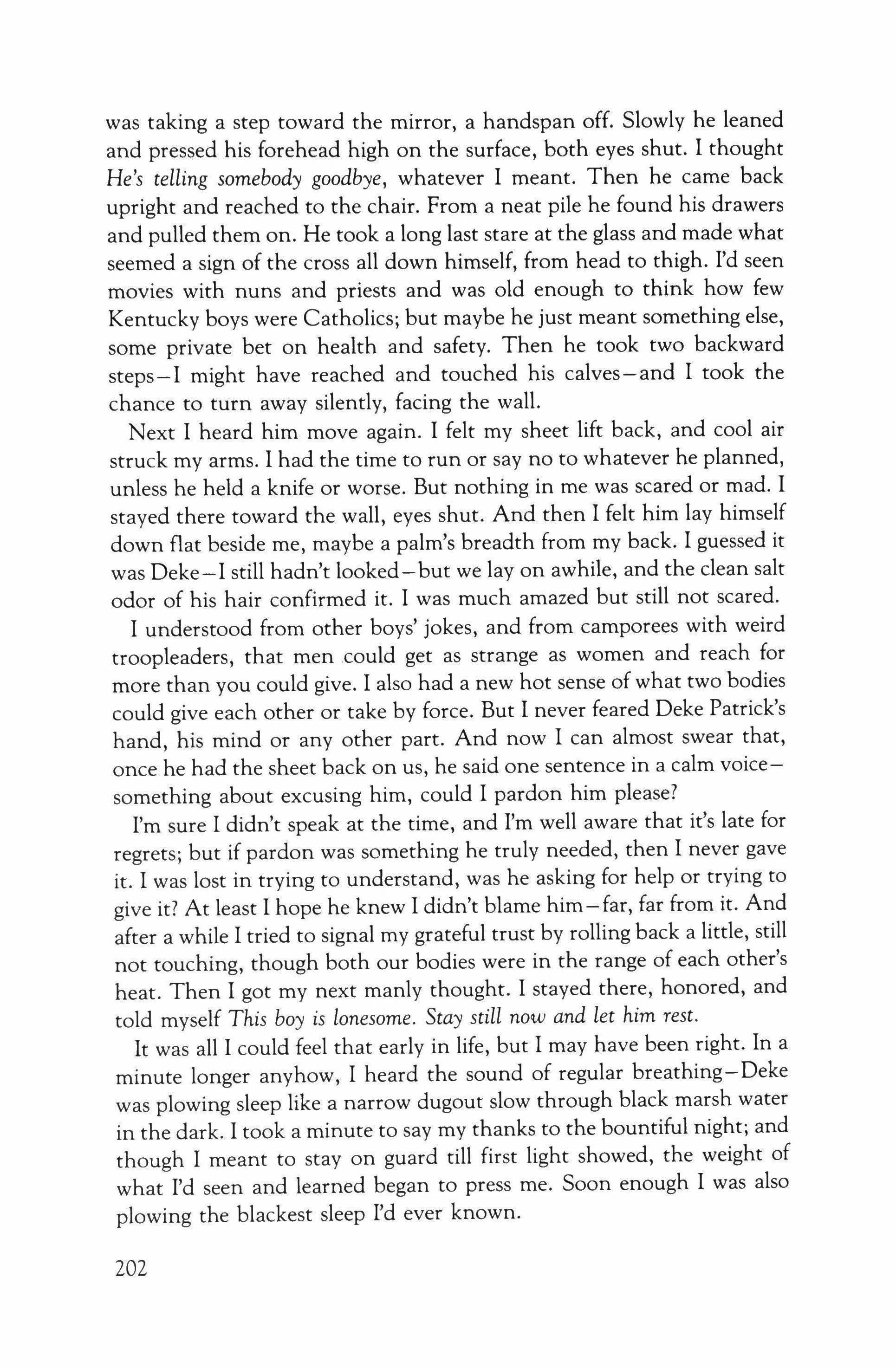
was taking a step toward the mirror, a handspan off. Slowly he leaned and pressed his forehead high on the surface, both eyes shut. I thought He's telling somebody goodbye, whatever I meant. Then he came back upright and reached to the chair. From a neat pile he found his drawers and pulled them on. He took a long last stare at the glass and made what seemed a sign of the cross all down himself, from head to thigh. I'd seen movies with nuns and priests and was old enough to think how few Kentucky boys were Catholics; but maybe he just meant something else, some private bet on health and safety. Then he took two backward steps-I might have reached and touched his calves-and I took the chance to turn away silently, facing the wall.
Next I heard him move again. I felt my sheet lift back, and cool air struck my arms. I had the time to run or say no to whatever he planned, unless he held a knife or worse. But nothing in me was scared or mad. I stayed there toward the wall, eyes shut. And then I felt him lay himself down flat beside me, maybe a palm's breadth from my back. I guessed it was Deke-l still hadn't looked-but we lay on awhile, and the clean salt odor of his hair confirmed it. I was much amazed but still not scared. I understood from other boys' jokes, and from camporees with weird troopleaders, that men .could get as strange as women and reach for more than you could give. I also had a new hot sense of what two bodies could give each other or take by force. But I never feared Deke Patrick's hand, his mind or any other part. And now I can almost swear that, once he had the sheet back on us, he said one sentence in a calm voicesomething about excusing him, could I pardon him please?
I'm sure I didn't speak at the time, and I'm well aware that it's late for regrets; but if pardon was something he truly needed, then I never gave it. I was lost in trying to understand, was he asking for help or trying to give it? At least I hope he knew I didn't blame him-far, far from it. And after a while I tried to signal my grateful trust by rolling back a little, still not touching, though both our bodies were in the range of each other's heat. Then I got my next manly thought. I stayed there, honored, and told myself This boy is lonesome. Stay still now and let him rest.
It was alII could feel that early in life, but I may have been right. In a minute longer anyhow, I heard the sound of regular breathing-Deke was plowing sleep like a narrow dugout slow through black marsh water in the dark. I took a minute to say my thanks to the bountiful night; and though I meant to stay on guard till first light showed, the weight of what I'd seen and learned began to press me. Soon enough I was also plowing the blackest sleep I'd ever known.
202
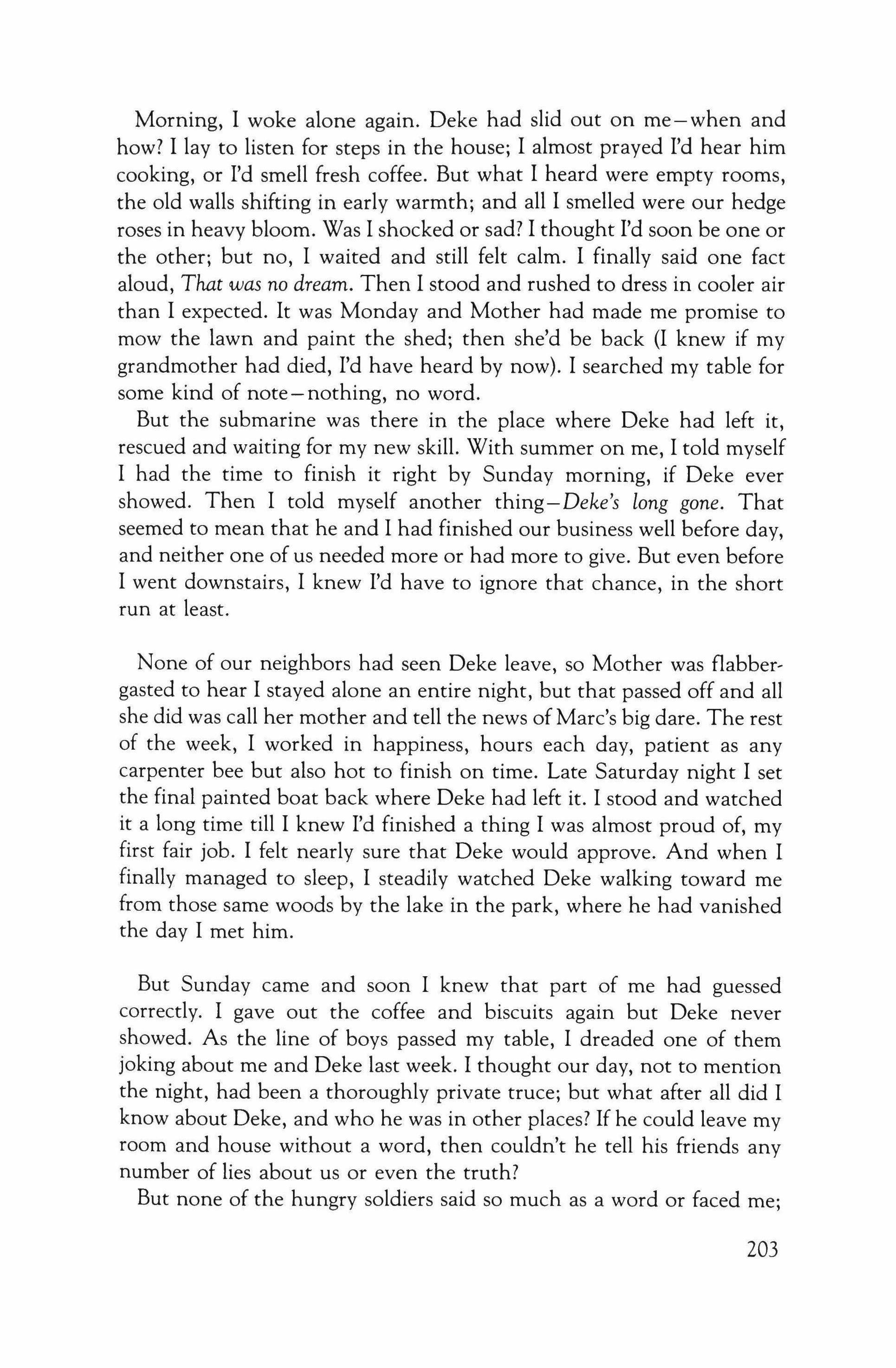
Morning, I woke alone again. Deke had slid out on me-when and how? I lay to listen for steps in the house; I almost prayed I'd hear him cooking, or I'd smell fresh coffee. But what I heard were empty rooms, the old walls shifting in early warmth; and all I smelled were our hedge roses in heavy bloom. Was I shocked or sad? I thought I'd soon be one or the other; but no, I waited and still felt calm. I finally said one fact aloud, That was no dream. Then I stood and rushed to dress in cooler air than I expected. It was Monday and Mother had made me promise to mow the lawn and paint the shed; then she'd be back (I knew if my grandmother had died, I'd have heard by now). I searched my table for some kind of note - nothing, no word.
But the submarine was there in the place where Deke had left it, rescued and waiting for my new skill. With summer on me, I told myself I had the time to finish it right by Sunday morning, if Deke ever showed. Then I told myself another thing-Deke's long gone. That seemed to mean that he and I had finished our business well before day, and neither one of us needed more or had more to give. But even before I went downstairs, I knew I'd have to ignore that chance, in the short run at least.
None of our neighbors had seen Deke leave, so Mother was flabbergasted to hear I stayed alone an entire night, but that passed off and all she did was call her mother and tell the news of Marc's big dare. The rest of the week, I worked in happiness, hours each day, patient as any carpenter bee but also hot to finish on time. Late Saturday night I set the final painted boat back where Deke had left it. I stood and watched it a long time till I knew I'd finished a thing I was almost proud of, my first fair job. I felt nearly sure that Deke would approve. And when I finally managed to sleep, I steadily watched Deke walking toward me from those same woods by the lake in the park, where he had vanished the day I met him.
But Sunday came and soon I knew that part of me had guessed correctly. I gave out the coffee and biscuits again but Deke never showed. As the line of boys passed my table, I dreaded one of them joking about me and Deke last week. I thought our day, not to mention the night, had been a thoroughly private truce; but what after all did I know about Deke, and who he was in other places? If he could leave my room and house without a word, then couldn't he tell his friends any number of lies about us or even the truth?
But none of the hungry soldiers said so much as a word or faced me;
203
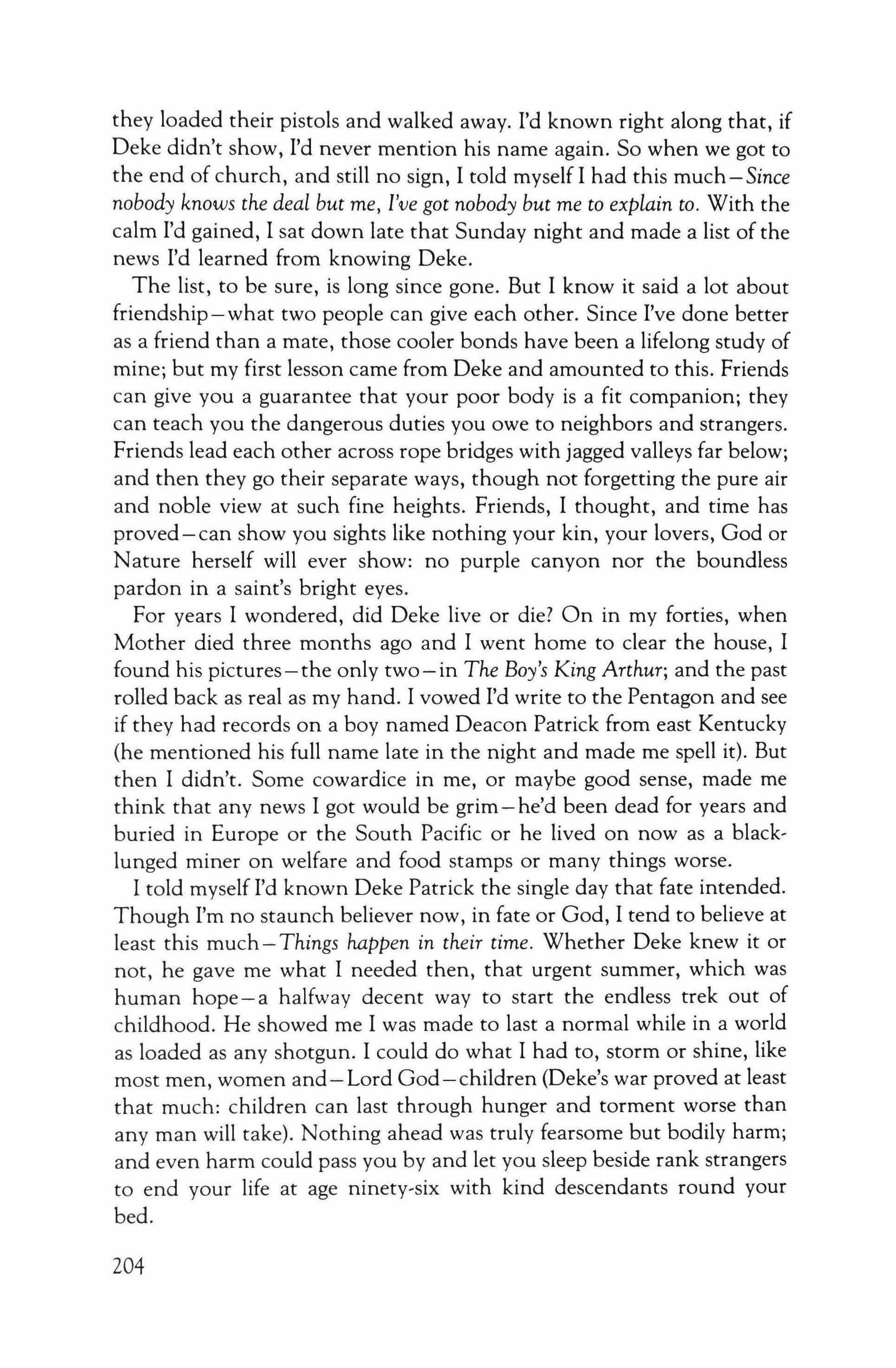
they loaded their pistols and walked away. I'd known right along that, if Deke didn't show, I'd never mention his name again. So when we got to the end of church, and still no sign, I told myself I had this much-Since nobody knows the deal but me, J've got nobody but me to explain to. With the calm I'd gained, I sat down late that Sunday night and made a list of the news I'd learned from knowing Deke.
The list, to be sure, is long since gone. But I know it said a lot about friendship-what two people can give each other. Since I've done better as a friend than a mate, those cooler bonds have been a lifelong study of mine; but my first lesson came from Deke and amounted to this. Friends can give you a guarantee that your poor body is a fit companion; they can teach you the dangerous duties you owe to neighbors and strangers. Friends lead each other across rope bridges with jagged valleys far below; and then they go their separate ways, though not forgetting the pure air and noble view at such fine heights. Friends, I thought, and time has proved - can show you sights like nothing your kin, your lovers, God or Nature herself will ever show: no purple canyon nor the boundless pardon in a saint's bright eyes.
For years I wondered, did Deke live or die? On in my forties, when Mother died three months ago and I went home to clear the house, I found his pictures-the only two-in The Boy's King Arthur; and the past rolled back as real as my hand. I vowed I'd write to the Pentagon and see if they had records on a boy named Deacon Patrick from east Kentucky (he mentioned his full name late in the night and made me spell it). But then I didn't. Some cowardice in me, or maybe good sense, made me think that any news I got would be grim-he'd been dead for years and buried in Europe or the South Pacific or he lived on now as a blacklunged miner on welfare and food stamps or many things worse.
I told myself I'd known Deke Patrick the single day that fate intended. Though I'm no staunch believer now, in fate or God, I tend to believe at least this much-Things happen in their time. Whether Deke knew it or not, he gave me what I needed then, that urgent summer, which was human hope-a halfway decent way to start the endless trek out of childhood. He showed me I was made to last a normal while in a world as loaded as any shotgun. I could do what I had to, storm or shine, like most men, women and - Lord God - children (Deke's war proved at least that much: children can last through hunger and torment worse than any man will take). Nothing ahead was truly fearsome but bodily harm; and even harm could pass you by and let you sleep beside rank strangers to end your life at age ninety-six with kind descendants round your bed.
204
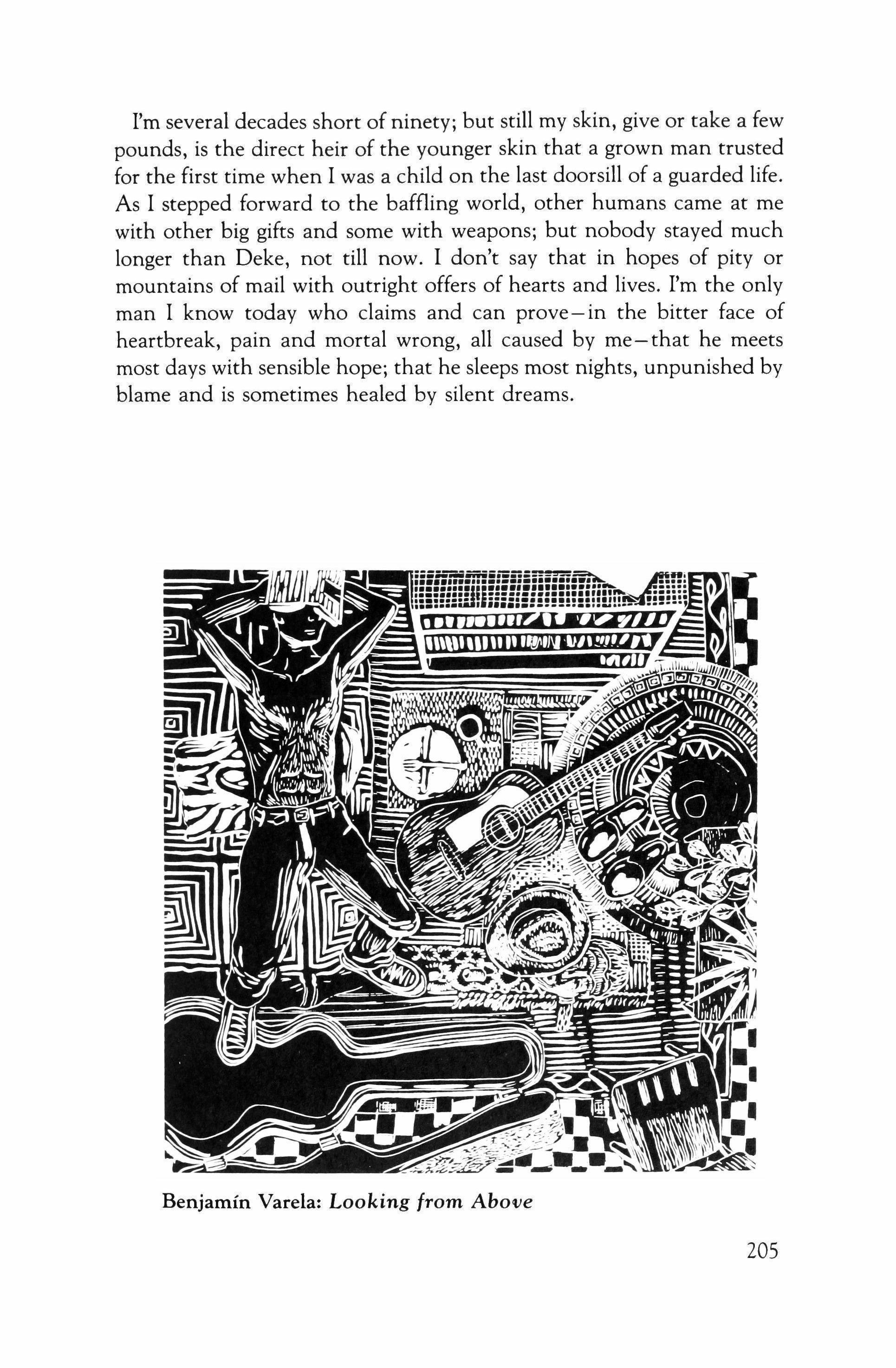
I'm several decades short of ninety; but still my skin, give or take a few pounds, is the direct heir of the younger skin that a grown man trusted for the first time when I was a child on the last doorsill of a guarded life. As I stepped forward to the baffling world, other humans came at me with other big gifts and some with weapons; but nobody stayed much longer than Deke, not till now. I don't say that in hopes of pity or mountains of mail with outright offers of hearts and lives. I'm the only man I know today who claims and can prove - in the bitter face of heartbreak, pain and mortal wrong, all caused by me-that he meets most days with sensible hope; that he sleeps most nights, unpunished by blame and is sometimes healed by silent dreams.
205
Benjamin Varela: Looking from Above

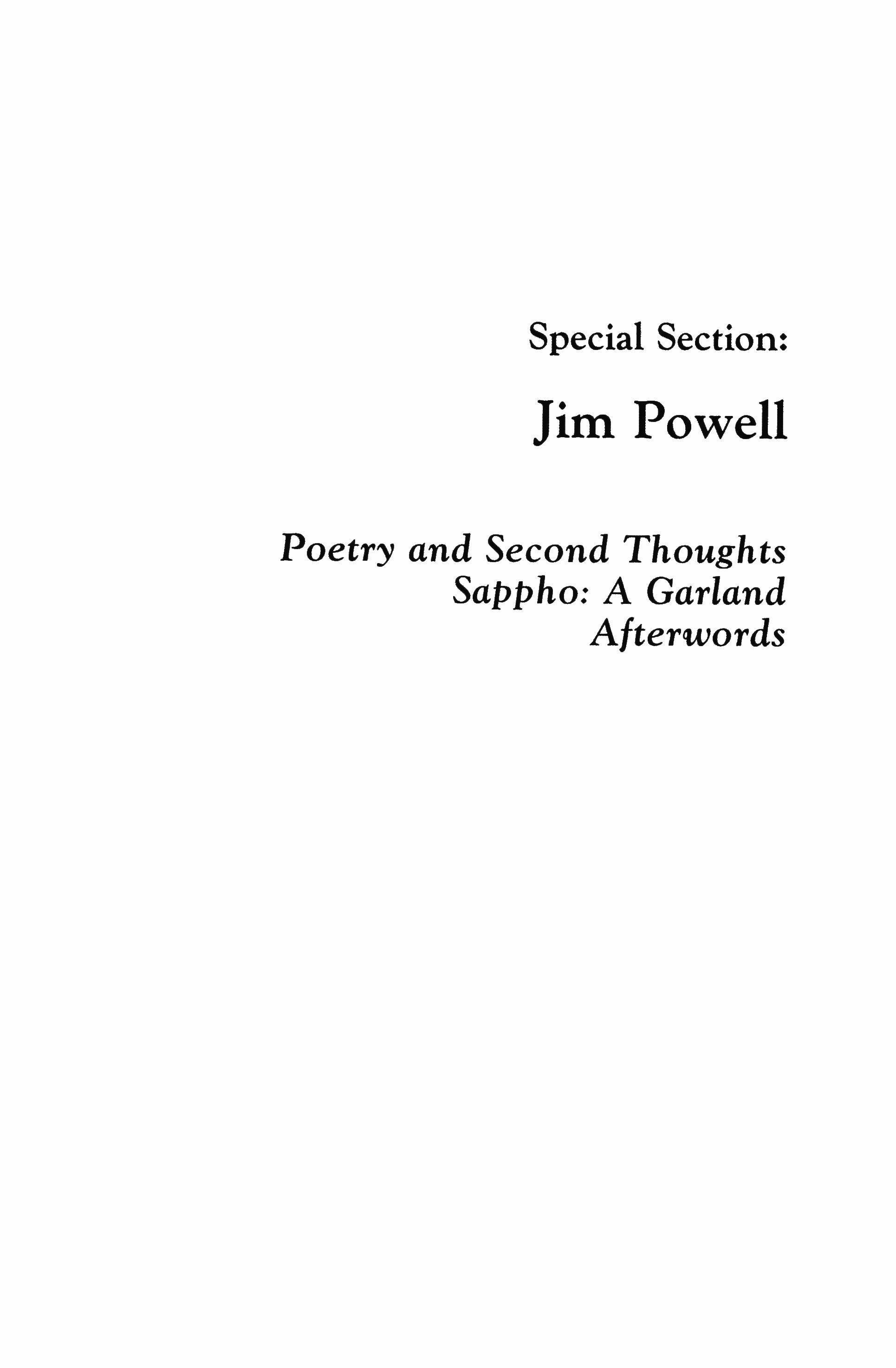
Special Section:
Jim Powell
Poetry and Second Thoughts
Sappho: A Garland Afterwords

Poetry and Second Thoughts
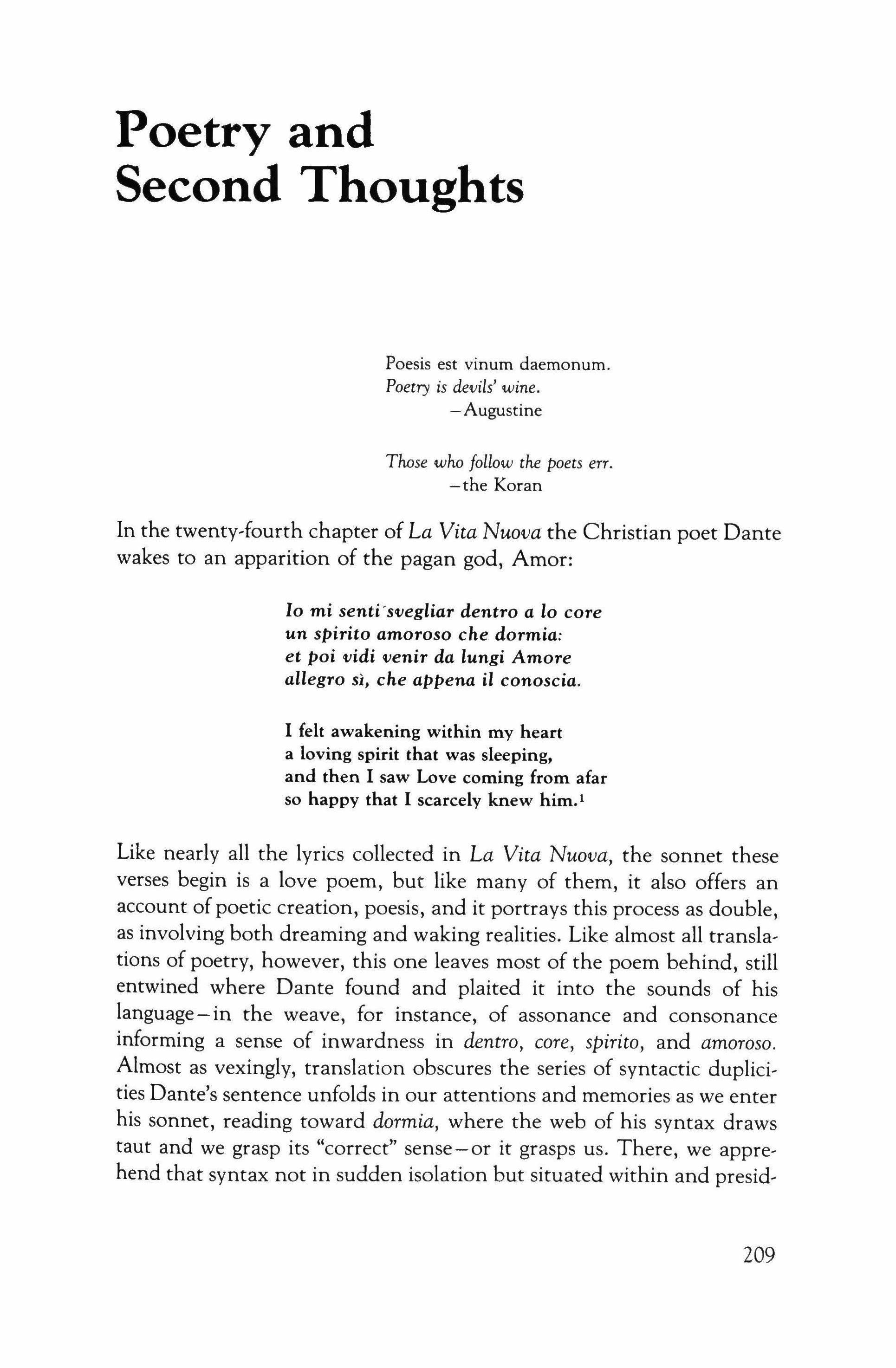
Poesis est vinum daemonum. Poetry is devils' wine.
-Augustine
Those who follow the poets err. -the Koran
In the twenty-fourth chapter of La Vita Nuova the Christian poet Dante wakes to an apparition of the pagan god, Amor:
10 mi senti-svegliar dentro a 10 core un spirito amoroso che dormia: et poi vidi venir da lungi Amore allegro sl, che appena iI conoscia.
I felt awakening within my heart a loving spirit that was sleeping, and then I saw Love coming from afar so happy that I scarcely knew him.!
Like nearly all the lyrics collected in La Vita Nuova, the sonnet these verses begin is a love poem, but like many of them, it also offers an account of poetic creation, poesis, and it portrays this process as double, as involving both dreaming and waking realities. Like almost all translations of poetry, however, this one leaves most of the poem behind, still entwined where Dante found and plaited it into the sounds of his language-in the weave, for instance, of assonance and consonance informing a sense of inwardness in dentro, core, spitito, and amoroso. Almost as vexingly, translation obscures the series of syntactic duplicities Dante's sentence unfolds in our attentions and memories as we enter his sonnet, reading toward dormia, where the web of his syntax draws taut and we grasp its "correct" sense-or it grasps us. There, we apprehend that syntax not in sudden isolation but situated within and presid-
209
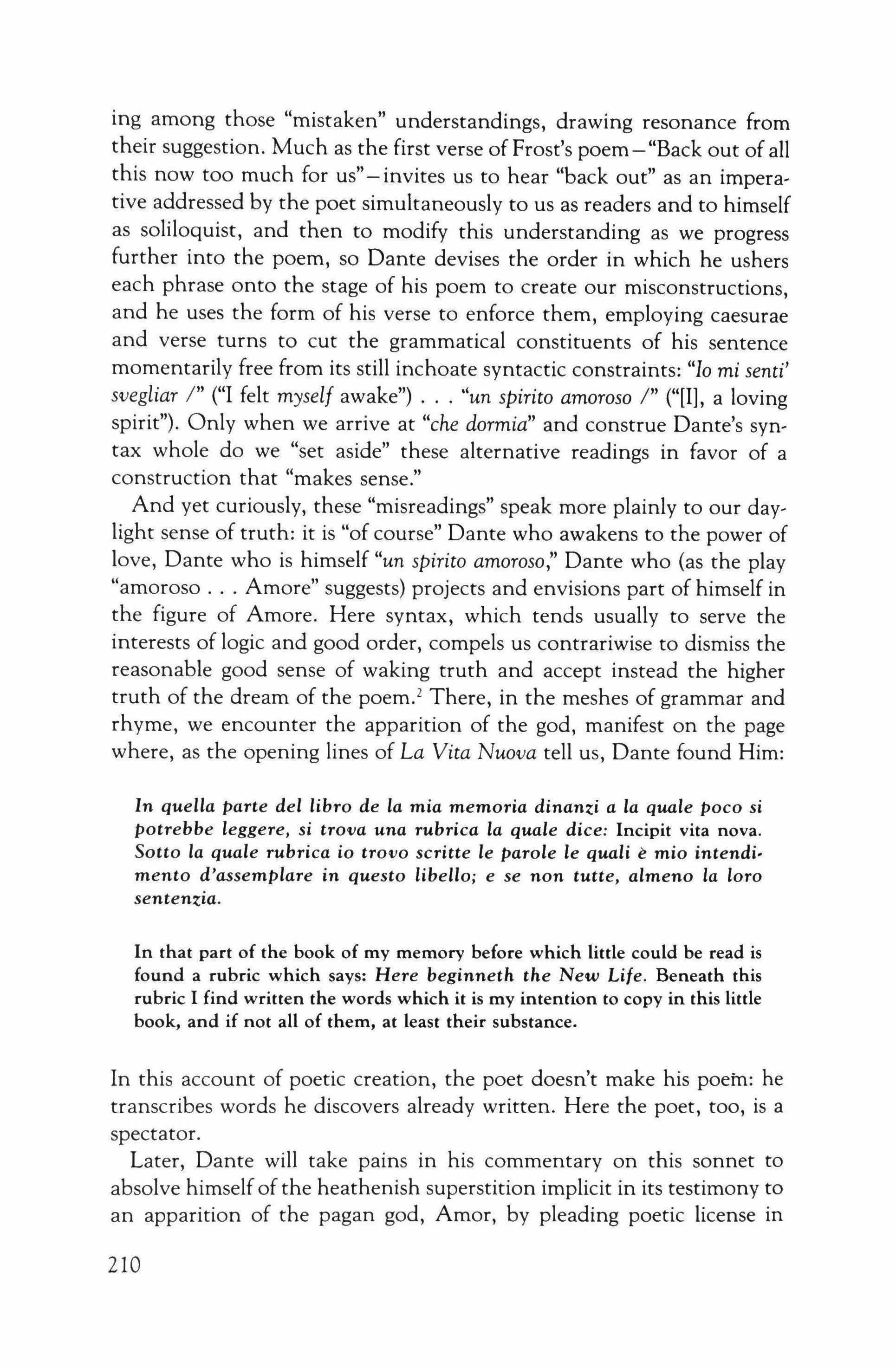
ing among those "mistaken" understandings, drawing resonance from their suggestion. Much as the first verse of Frost's poem - "Back out of all this now too much for us" - invites us to hear "back out" as an imperative addressed by the poet simultaneously to us as readers and to himself as soliloquist, and then to modify this understanding as we progress further into the poem, so Dante devises the order in which he ushers each phrase onto the stage of his poem to create our misconstructions, and he uses the form of his verse to enforce them, employing caesurae and verse turns to cut the grammatical constituents of his sentence momentarily free from its still inchoate syntactic constraints: "10 mi senti' svegliar I" ("I felt myself awake") "un spirito amoroso I" ("[I], a loving spirit"). Only when we arrive at "che dormia" and construe Dante's syntax whole do we "set aside" these alternative readings in favor of a construction that "makes sense."
And yet curiously, these "misreadings" speak more plainly to our daylight sense of truth: it is "of course" Dante who awakens to the power of love, Dante who is himself "un spitito amoroso," Dante who (as the play "arnoroso Amore" suggests) projects and envisions part of himself in the figure of Amore. Here syntax, which tends usually to serve the interests of logic and good order, compels us contrariwise to dismiss the reasonable good sense of waking truth and accept instead the higher truth of the dream of the poern.! There, in the meshes of grammar and rhyme, we encounter the apparition of the god, manifest on the page where, as the opening lines of La Vita Nuova tell us, Dante found Him:
In quella parte del libro de la mia memoria dinanzi a la quale poco si potrebbe leggere, si trova una rubrica la quale dice: Incipit vita nova.
Sotto la quale rubrica io trovo scritte Ie parole Ie quali e mio intendimento d'assemplare in questo libello; e se non tutte, almeno la loro senrenzic;
In that part of the book of my memory before which little could be read is found a rubric which says: Here beginneth the New Life. Beneath this rubric I find written the words which it is my intention to copy in this little book, and if not all of them, at least their substance.
In this account of poetic creation, the poet doesn't make his poem: he transcribes words he discovers already written. Here the poet, too, is a spectator.
Later, Dante will take pains in his commentary on this sonnet to absolve himself of the heathenish superstition implicit in its testimony to an apparition of the pagan god, Amor, by pleading poetic license in
210
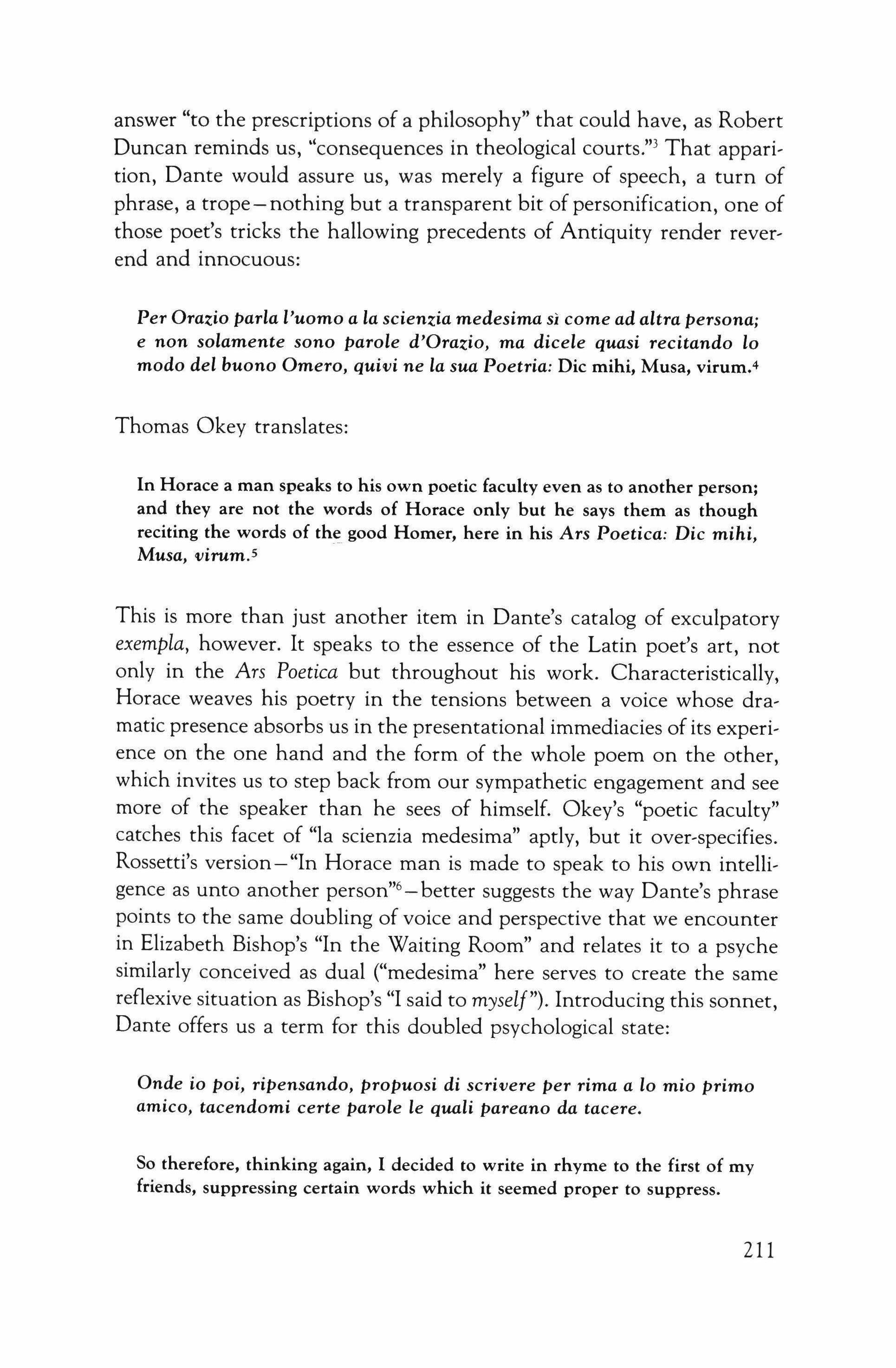
answer "to the prescriptions of a philosophy" that could have, as Robert Duncan reminds us, "consequences in theological courts."} That apparition, Dante would assure us, was merely a figure of speech, a turn of phrase, a trope - nothing but a transparent bit of personification, one of those poet's tricks the hallowing precedents of Antiquity render reverend and innocuous:
Per Orazio parla l'uomo a la scienziu medesima Sl come ad altra persona; e non solamente sono parole d'Orazio, ma dicele quasi recitando lo modo del buono Omero, quivi ne la sua Poetria: Die mihi, Musa, virum.r
Thomas Okey translates:
In Horace a man speaks to his own poetic faculty even as to another person; and they are not the words of Horace only but he says them as though reciting the words of the good Homer, here in his Ars Poetica: Die mihi, Musa, virum.5
This is more than just another item in Dante's catalog of exculpatory exempla, however. It speaks to the essence of the Latin poet's art, not only in the Ars Poetica but throughout his work. Characteristically, Horace weaves his poetry in the tensions between a voice whose dramatic presence absorbs us in the presentational immediacies of its experience on the one hand and the form of the whole poem on the other, which invites us to step back from our sympathetic engagement and see more of the speaker than he sees of himself. Okey's "poetic faculty" catches this facet of "la scienzia medesima" aptly, but it over-specifies. Rossetti's version - "In Horace man is made to speak to his own intelligence as unto another person"6- better suggests the way Dante's phrase points to the same doubling of voice and perspective that we encounter in Elizabeth Bishop's "In the Waiting Room" and relates it to a psyche similarly conceived as dual ("medesima" here serves to create the same reflexive situation as Bishop's "I said to myself"). Introducing this sonnet, Dante offers us a term for this doubled psychological state:
Onde io poi, ripensando, propuosi di scrivere per rima a lo mio primo amico, tacendomi certe parole le quali pareano da tacere.
So therefore, thinking again, I decided to write in rhyme to the first of my friends, suppressing certain words which it seemed proper to suppress.
211
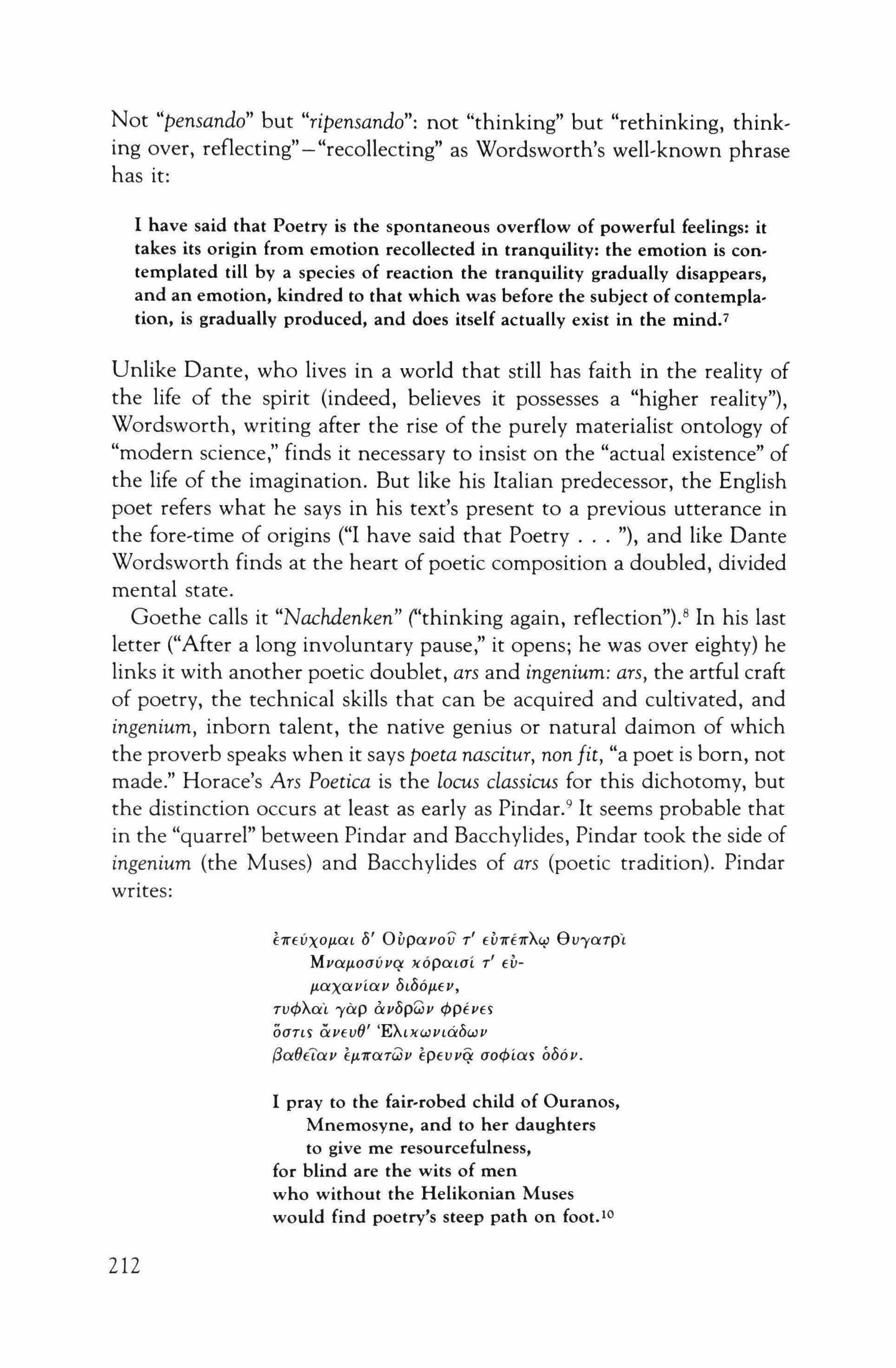
Not "pensando" but "ripensando": not "thinking" but "rethinking, thinking over, reflecting" - "recollecting" as Wordsworth's well-known phrase has it:
I have said that Poetry is the spontaneous overflow of powerful feelings: it takes its origin from emotion recollected in tranquility: the emotion is contemplated till by a species of reaction the tranquility gradually disappears, and an emotion, kindred to that which was before the subject of contemplation, is gradually produced, and does itself actually exist in the mind.?
Unlike Dante, who lives in a world that still has faith in the reality of the life of the spirit (indeed, believes it possesses a "higher reality"), Wordsworth, writing after the rise of the purely materialist ontology of "modern science," finds it necessary to insist on the "actual existence" of the life of the imagination. But like his Italian predecessor, the English poet refers what he says in his text's present to a previous utterance in the fore-time of origins ("I have said that Poetry "), and like Dante Wordsworth finds at the heart of poetic composition a doubled, divided mental state.
Goethe calls it "Nachdenken" ("thinking again, reflection")." In his last letter ("After a long involuntary pause," it opens; he was over eighty) he links it with another poetic doublet, ars and ingenium: ats, the artful craft of poetry, the technical skills that can be acquired and cultivated, and ingenium, inborn talent, the native genius or natural daimon of which the proverb speaks when it says poeta tiascitur, non fit, "a poet is born, not made." Horace's Ars Poetica is the locus classicus for this dichotomy, but the distinction occurs at least as early as Pindar.? It seems probable that in the "quarrel" between Pindar and Bacchylides, Pindar took the side of ingenium (the Muses) and Bacchvlides of ars (poetic tradition). Pindar writes:
hf:VX0p,oa 0' Ovpapoil r' f:V7rE7rAI.¥ 8u'Yarp't Mpap,oavPQr xopoaai r' f:Vp,axapiap Ot06p,f:p, rucjJAai 'Yap &popwp cjJPEPH oans &pwfJ' 'EALXWPU)(OWP {3afJli:ap fp,7rarWp epf:uP<tY aocjJias o06p.
I pray to the fair-robed child of Ouranos, Mnemosyne, and to her daughters to give me resourcefulness, for blind are the wits of men who without the Helikonian Muses would find poetry's steep path on foot.IO
212
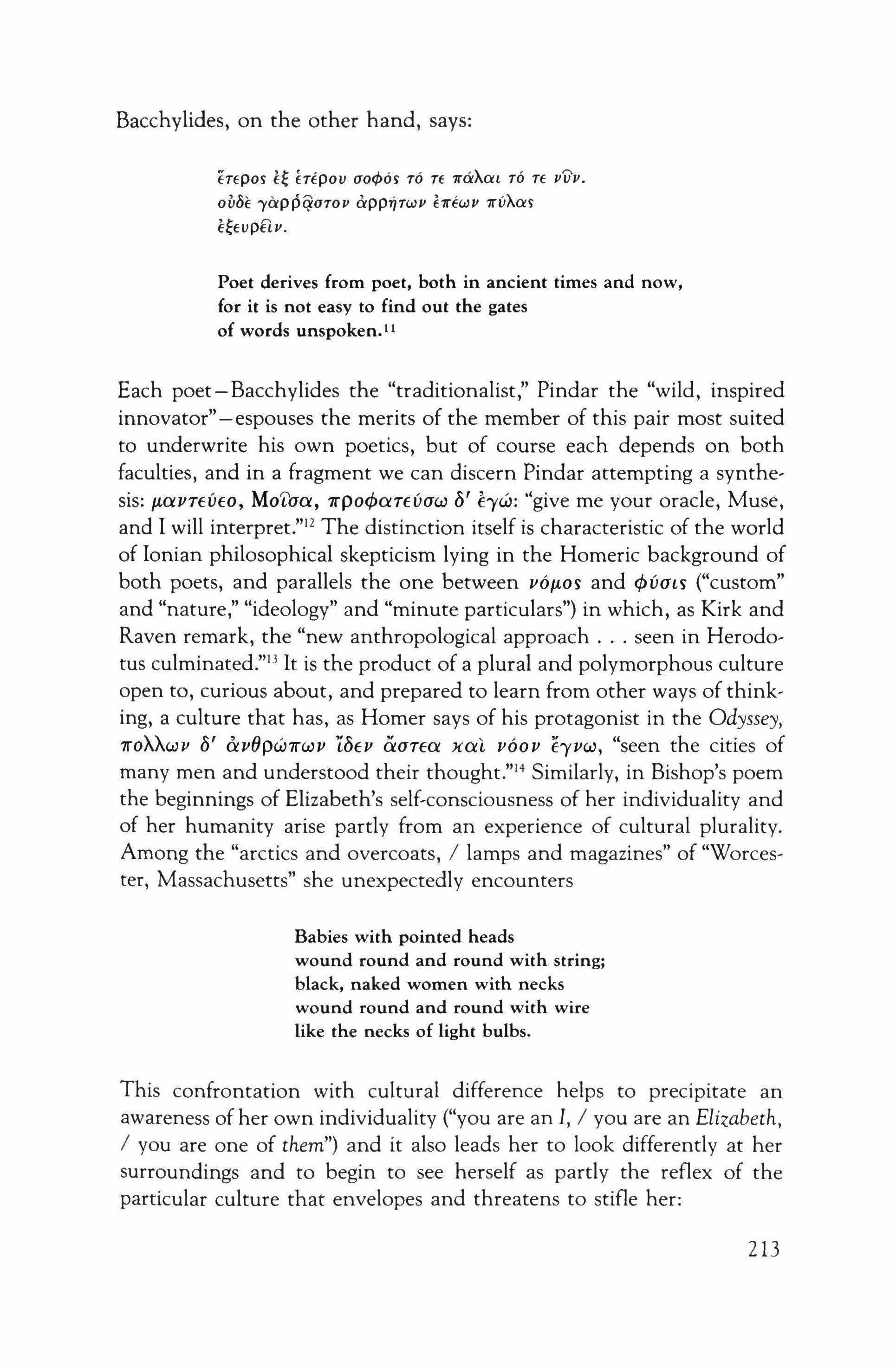
Bacchylides, on the other hand, says:
ETfPOS U frfPOU (JOq,OS TO TE 7r£xAw TO TE VVV.
OUOE 'YaPPCY(JTOV &pP7/TWV brfWV 7n:;AGYS UEupfiv.
Poet derives from poet, both in ancient times and now, for it is not easy to find out the gates of words unspoken. I I
Each poet-Bacchylides the "traditionalist," Pindar the "wild, inspired innovator"-espouses the merits of the member of this pair most suited to underwrite his own poetics, but of course each depends on both faculties, and in a fragment we can discern Pindar attempting a synthesis: uavteveo, Mo'i'aa, 7rpoc/>aT€UaW 0' €')'w: "give me your oracle, Muse, and 1 will interpret."! The distinction itself is characteristic of the world of Ionian philosophical skepticism lying in the Homeric background of both poets, and parallels the one between vouos and c/>uaL'i ("custom" and "nature," "ideology" and "minute particulars") in which, as Kirk and Raven remark, the "new anthropological approach seen in Herodotus culminated,"!' It is the product of a plural and polymorphous culture open to, curious about, and prepared to learn from other ways of thinking, a culture that has, as Homer says of his protagonist in the Odyssey, 7ro)..)..wv 0' av{}pw7rWV rO€V aaT€a }(aL VOOV E')'VW, "seen the cities of many men and understood their thought.?" Similarly, in Bishop's poem the beginnings of Elizabeth's self-consciousness of her individuality and of her humanity arise partly from an experience of cultural plurality. Among the "arctics and overcoats, / lamps and magazines" of "Worcester, Massachusetts" she unexpectedly encounters
Babies with pointed heads wound round and round with string; black, naked women with necks wound round and round with wire like the necks of light bulbs.
This confrontation with cultural difference helps to precipitate an awareness of her own individuality ("you are an I, / you are an Elizabeth, / you are one of them") and it also leads her to look differently at her surroundings and to begin to see herself as partly the reflex of the particular culture that envelopes and threatens to stifle her:
213
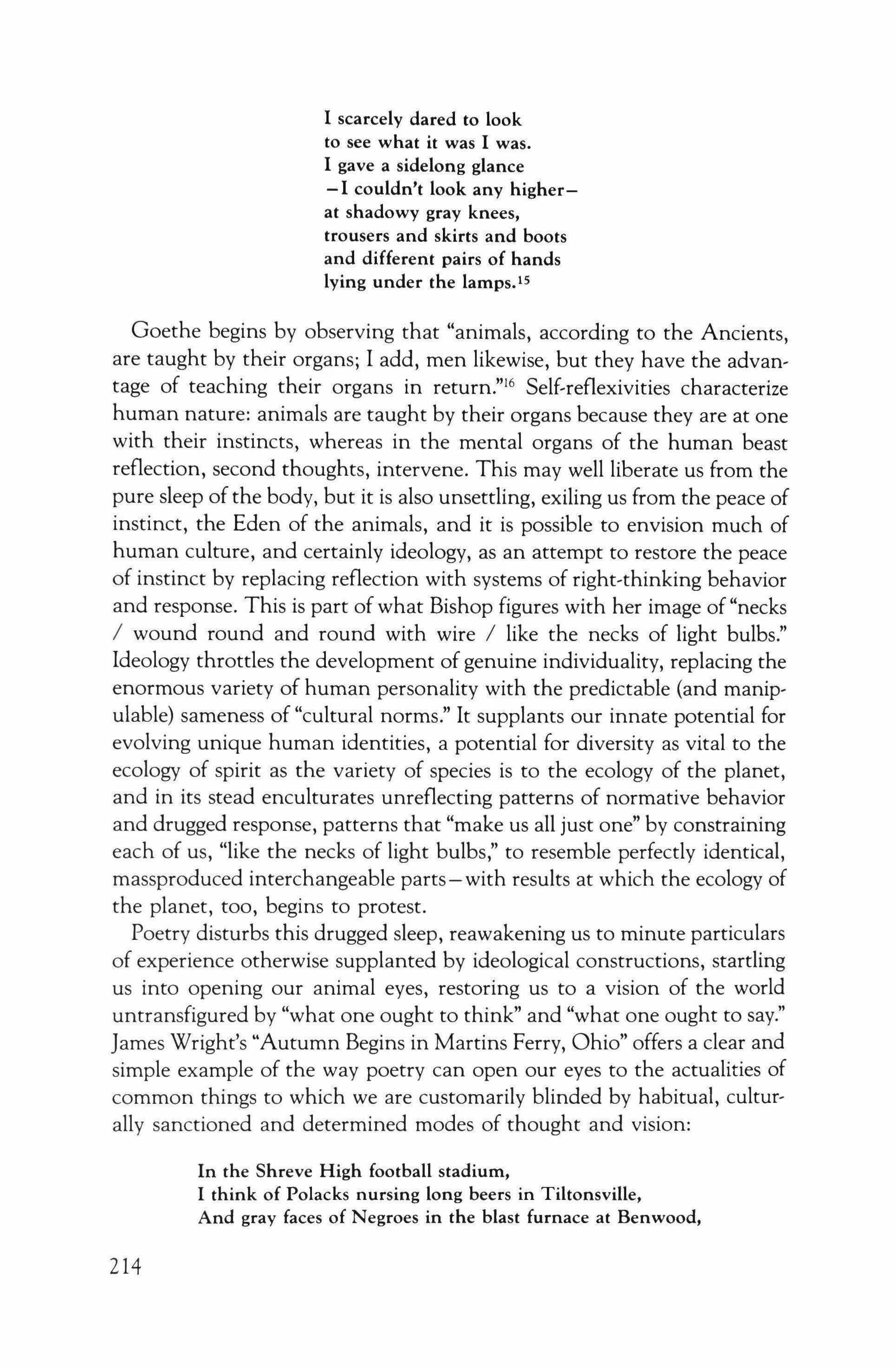
I scarcely dared to look to see what it was I was. I gave a sidelong glance - I couldn't look any higherat shadowy gray knees, trousers and skirts and boots and different pairs of hands lying under the lamps. IS
Goethe begins by observing that "animals, according to the Ancients, are taught by their organs; I add, men likewise, but they have the advantage of teaching their organs in return.?" Self-reflexivities characterize human nature: animals are taught by their organs because they are at one with their instincts, whereas in the mental organs of the human beast reflection, second thoughts, intervene. This may well liberate us from the pure sleep of the body, but it is also unsettling, exiling us from the peace of instinct, the Eden of the animals, and it is possible to envision much of human culture, and certainly ideology, as an attempt to restore the peace of instinct by replacing reflection with systems of right-thinking behavior and response. This is part of what Bishop figures with her image of "necks / wound round and round with wire / like the necks of light bulbs." Ideology throttles the development of genuine individuality, replacing the enormous variety of human personality with the predictable (and manipulable) sameness of "cultural norms." It supplants our innate potential for evolving unique human identities, a potential for diversity as vital to the ecology of spirit as the variety of species is to the ecology of the planet, and in its stead enculturates unreflecting patterns of normative behavior and drugged response, patterns that "make us all just one" by constraining each of us, "like the necks of light bulbs," to resemble perfectly identical, massproduced interchangeable parts-with results at which the ecology of the planet, too, begins to protest.
Poetry disturbs this drugged sleep, reawakening us to minute particulars of experience otherwise supplanted by ideological constructions, startling us into opening our animal eyes, restoring us to a vision of the world untransfigured by "what one ought to think" and "what one ought to say." James Wright's "Autumn Begins in Martins Ferry, Ohio" offers a clear and simple example of the way poetry can open our eyes to the actualities of common things to which we are customarily blinded by habitual, culturally sanctioned and determined modes of thought and vision:
In the Shreve High football stadium, I think of Polacks nursing long beers in Tiltonsville, And gray faces of Negroes in the blast furnace at Benwood,
214
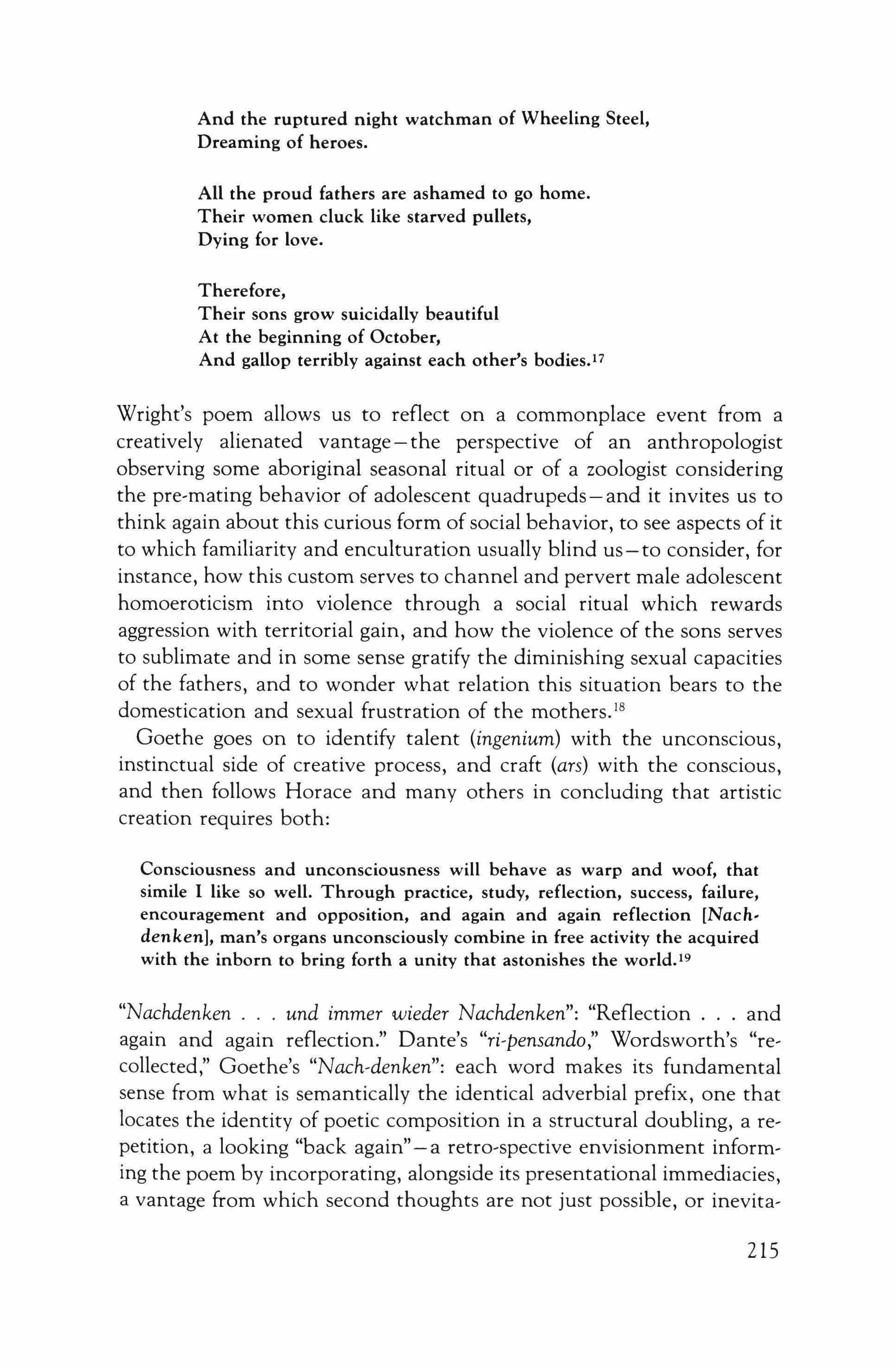
And the ruptured night watchman of Wheeling Steel, Dreaming of heroes.
All the proud fathers are ashamed to go home. Their women cluck like starved pullets, Dying for love.
Therefore,
Their sons grow suicidally beautiful At the beginning of October, And gallop terribly against each other's bodies.t?
Wright's poem allows us to reflect on a commonplace event from a creatively alienated vantage-the perspective of an anthropologist observing some aboriginal seasonal ritual or of a zoologist considering the pre-mating behavior of adolescent quadrupeds - and it invites us to think again about this curious form of social behavior, to see aspects of it to which familiarity and enculturation usually blind us-to consider, for instance, how this custom serves to channel and pervert male adolescent homoeroticism into violence through a social ritual which rewards aggression with territorial gain, and how the violence of the sons serves to sublimate and in some sense gratify the diminishing sexual capacities of the fathers, and to wonder what relation this situation bears to the domestication and sexual frustration of the mothers. 18
Goethe goes on to identify talent (ingenium) with the unconscious, instinctual side of creative process, and craft (ars) with the conscious, and then follows Horace and many others in concluding that artistic creation requires both:
Consciousness and unconsciousness will behave as warp and woof, that simile I like so well. Through practice, study, reflection, success, failure, encouragement and opposition, and again and again reflection [Nachdenken], man's organs unconsciously combine in free activity the acquired with the inborn to bring forth a unity that astonishes the world.t?
"Nachdenken und immer wieder Nachdenken": "Reflection and again and again reflection." Dante's "ri-pensando," Wordsworth's "recollected," Goethe's "Nach-denken": each word makes its fundamental sense from what is semantically the identical adverbial prefix, one that locates the identity of poetic composition in a structural doubling, a repetition, a looking "back again" -a retro-spective envisionment informing the poem by incorporating, alongside its presentational immediacies, a vantage from which second thoughts are not just possible, or inevita-
215
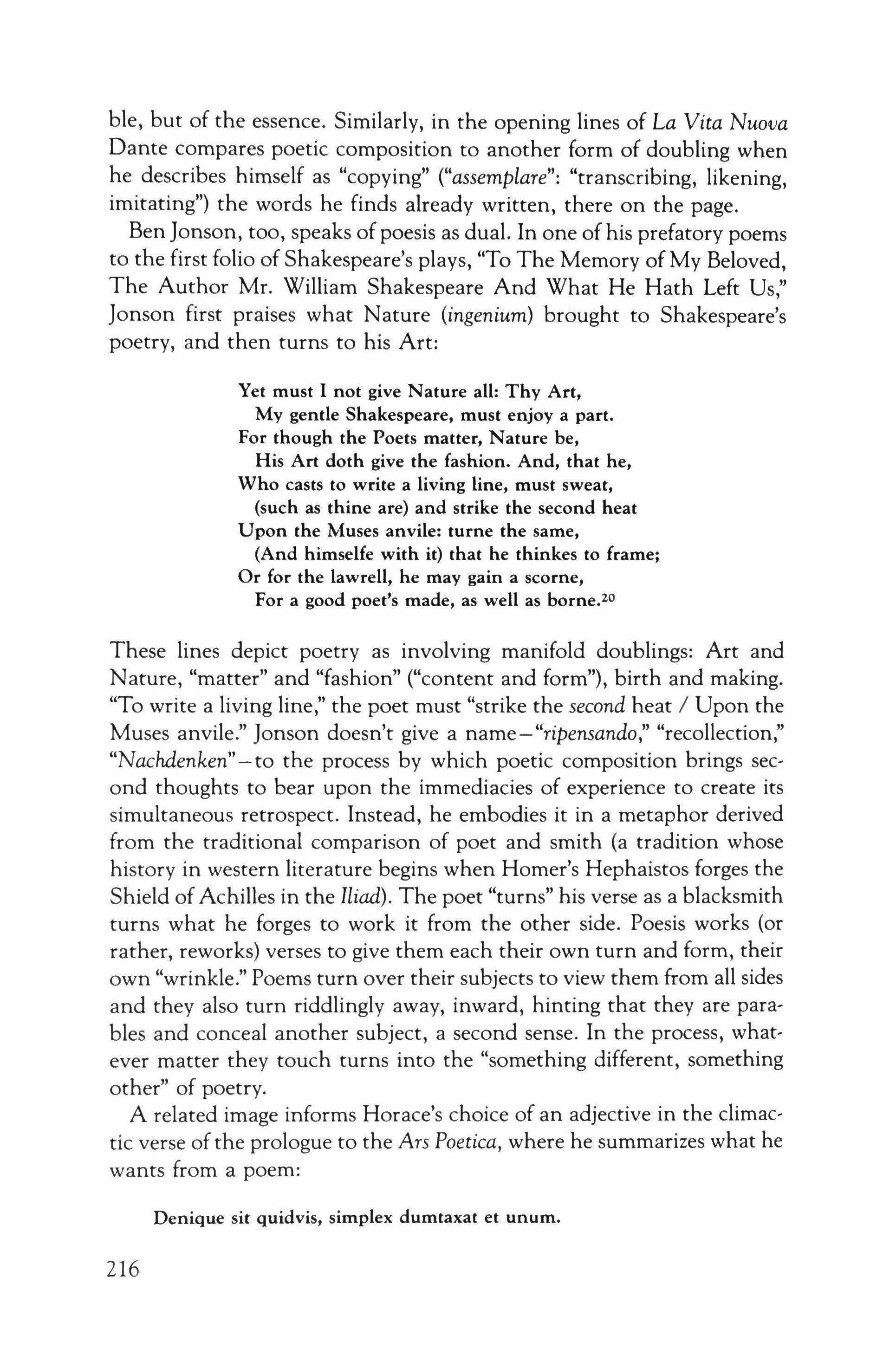
ble, but of the essence. Similarly, in the opening lines of La Vita Nuova Dante compares poetic composition to another form of doubling when he describes himself as "copying" ("assemplare": "transcribing, likening, imitating") the words he finds already written, there on the page.
Ben Jonson, too, speaks of poesis as dual. In one of his prefatory poems to the first folio of Shakespeare's plays, "To The Memory of My Beloved, The Author Mr. William Shakespeare And What He Hath Left Us," Jonson first praises what Nature (ingenium) brought to Shakespeare's poetry, and then turns to his Art:
Yet must I not give Nature all: Thy Art, My gentle Shakespeare, must enjoy a part. For though the Poets matter, Nature be, His Art doth give the fashion. And, that he, Who casts to write a living line, must sweat, (such as thine are) and strike the second heat Upon the Muses anvile: turne the same, (And himselfe with it) that he thinkes to frame; Or for the lawrell, he may gain a scorne, For a good poet's made, as well as borne.s?
These lines depict poetry as involving manifold doublings: Art and Nature, "matter" and "fashion" ("content and form"), birth and making. "To write a living line," the poet must "strike the second heat / Upon the Muses anvile." Jonson doesn't give a name - "ripensando," "recollection:' "Nachdenken" -to the process by which poetic composition brings second thoughts to bear upon the immediacies of experience to create its simultaneous retrospect. Instead, he embodies it in a metaphor derived from the traditional comparison of poet and smith (a tradition whose history in western literature begins when Homer's Hephaistos forges the Shield of Achilles in the Iliad). The poet "turns" his verse as a blacksmith turns what he forges to work it from the other side. Poesis works (or rather, reworks) verses to give them each their own turn and form, their own "wrinkle." Poems turn over their subjects to view them from all sides and they also turn riddlingly away, inward, hinting that they are parables and conceal another subject, a second sense. In the process, whatever matter they touch turns into the "something different, something other" of poetry.
A related image informs Horace's choice of an adjective in the climactic verse of the prologue to the Ars Poetica, where he summarizes what he wants from a poem:
Denique sit quidvis, simplex dumtaxat et unum.
216
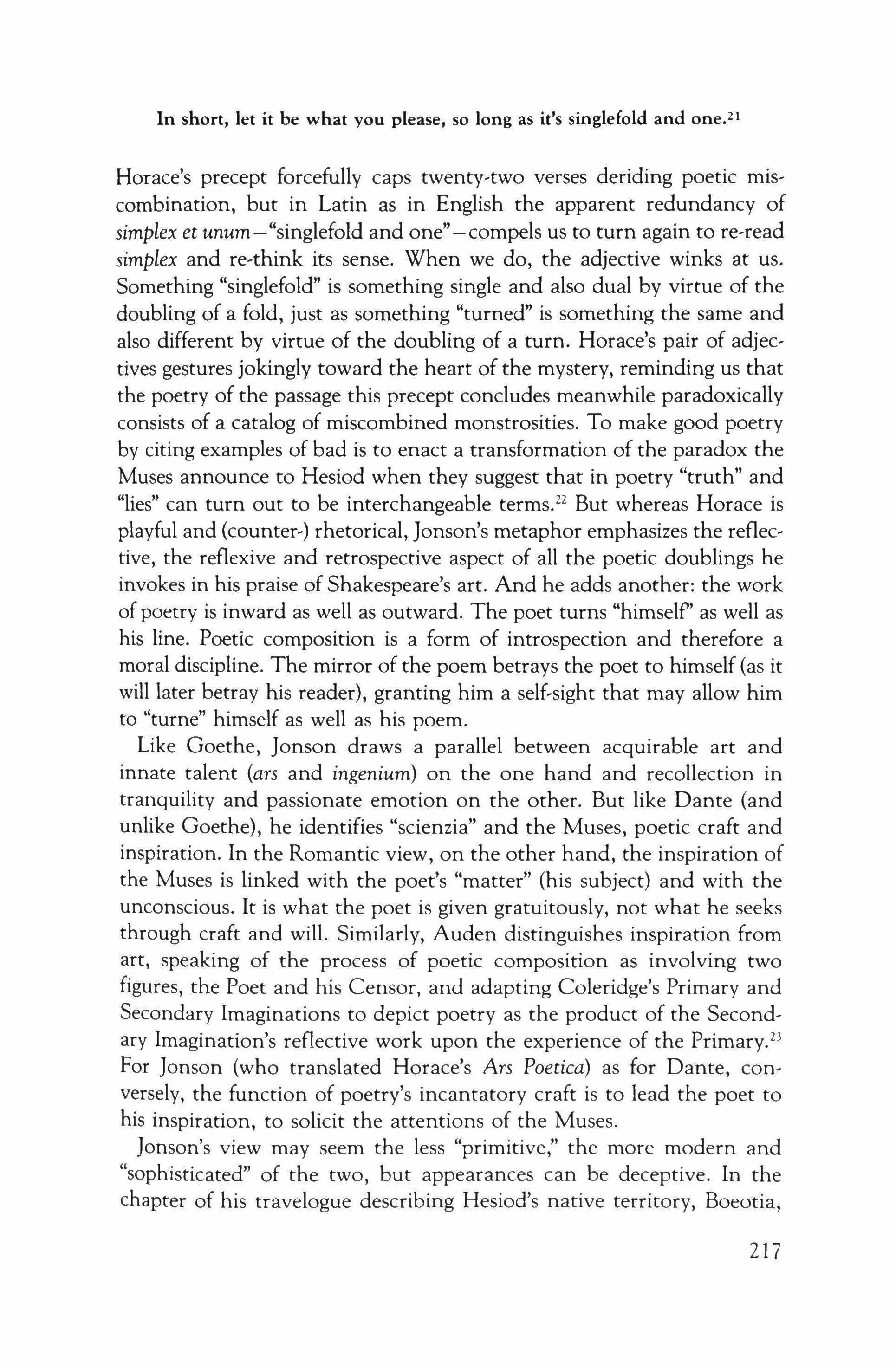
In short, let it be what you please, so long as it's singlefold and one.s!
Horace's precept forcefully caps twenty-two verses deriding poetic miscombination, but in Latin as in English the apparent redundancy of simplex et unum - "singlefold and one" - compels us to turn again to re-read simplex and re-think its sense. When we do, the adjective winks at us. Something "singlefold" is something single and also dual by virtue of the doubling of a fold, just as something "turned" is something the same and also different by virtue of the doubling of a turn. Horace's pair of adjectives gestures jokingly toward the heart of the mystery, reminding us that the poetry of the passage this precept concludes meanwhile paradoxically consists of a catalog of miscombined monstrosities. To make good poetry by citing examples of bad is to enact a transformation of the paradox the Muses announce to Hesiod when they suggest that in poetry "truth" and "lies" can turn out to be interchangeable terms." But whereas Horace is playful and (counter-) rhetorical, Jonson's metaphor emphasizes the reflective, the reflexive and retrospective aspect of all the poetic doublings he invokes in his praise of Shakespeare's art. And he adds another: the work of poetry is inward as well as outward. The poet turns "himself" as well as his line. Poetic composition is a form of introspection and therefore a moral discipline. The mirror of the poem betrays the poet to himself (as it will later betray his reader), granting him a self-sight that may allow him to "turne" himself as well as his poem.
Like Goethe, Jonson draws a parallel between acquirable art and innate talent (ars and ingenium) on the one hand and recollection in tranquility and passionate emotion on the other. But like Dante (and unlike Goethe), he identifies "scienzia" and the Muses, poetic craft and inspiration. In the Romantic view, on the other hand, the inspiration of the Muses is linked with the poet's "matter" (his subject) and with the unconscious. It is what the poet is given gratuitously, not what he seeks through craft and will. Similarly, Auden distinguishes inspiration from art, speaking of the process of poetic composition as involving two figures, the Poet and his Censor, and adapting Coleridge's Primary and Secondary Imaginations to depict poetry as the product of the Secondary Imagination's reflective work upon the experience of the Primary." For Jonson (who translated Horace's Ars Poetica) as for Dante, conversely, the function of poetry's incantatory craft is to lead the poet to his inspiration, to solicit the attentions of the Muses.
Jonson's view may seem the less "primitive," the more modern and "sophisticated" of the two, but appearances can be deceptive. In the chapter of his travelogue describing Hesiod's native territory, Boeotia,
217
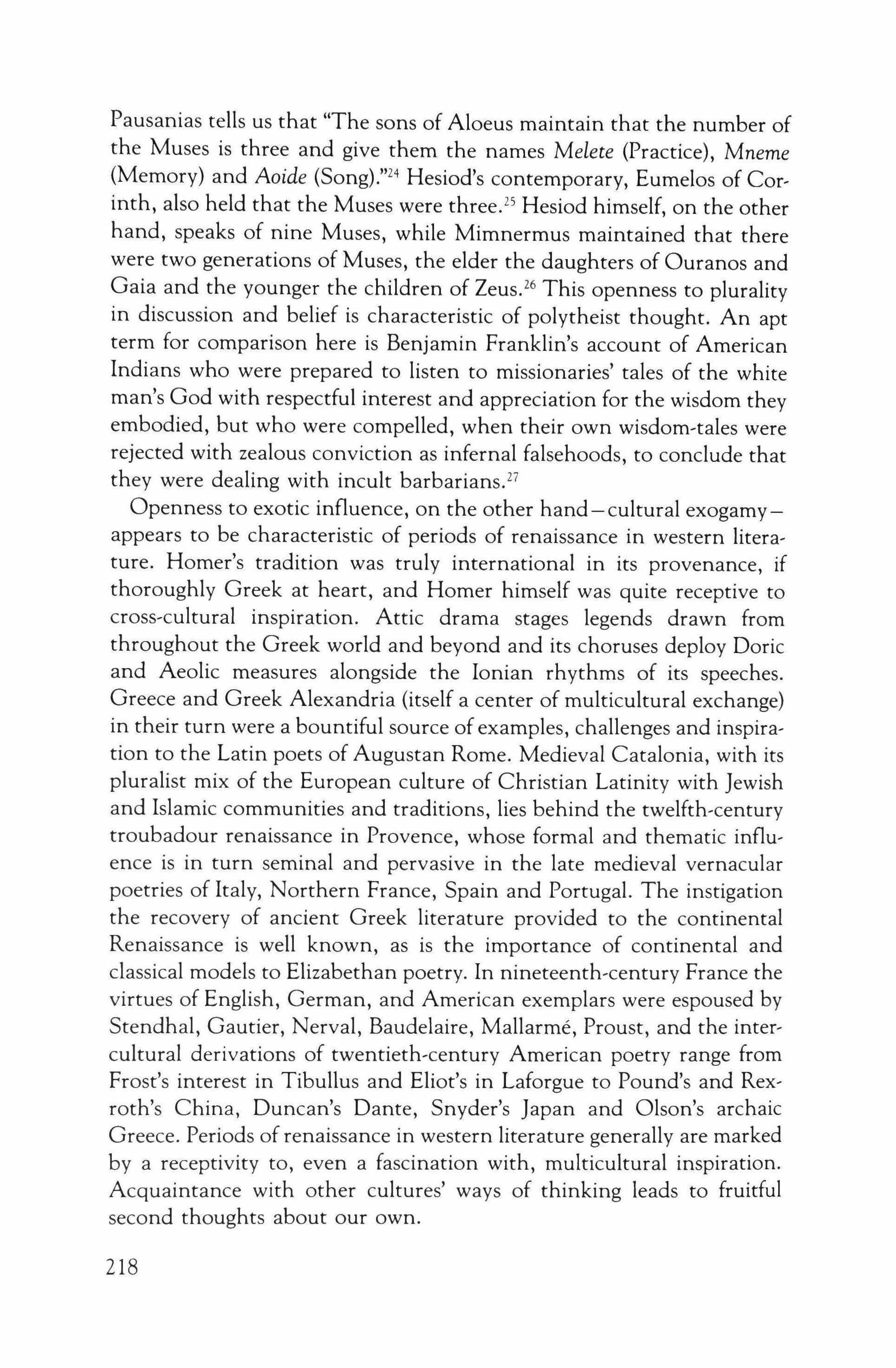
Pausanias tells us that "The sons of Aloeus maintain that the number of the Muses is three and give them the names Melete (Practice), Mneme (Memory) and Aoide (Songj.'?' Hesiod's contemporary, Eumelos of Corinth, also held that the Muses were three." Hesiod himself, on the other hand, speaks of nine Muses, while Mimnermus maintained that there were two generations of Muses, the elder the daughters of Ouranos and Gaia and the younger the children of Zeus. 26 This openness to plurality in discussion and belief is characteristic of polytheist thought. An apt term for comparison here is Benjamin Franklin's account of American Indians who were prepared to listen to missionaries' tales of the white man's God with respectful interest and appreciation for the wisdom they embodied, but who were compelled, when their own wisdom-tales were rejected with zealous conviction as infernal falsehoods, to conclude that they were dealing with incult barbarians."
Openness to exotic influence, on the other hand-cultural exogamyappears to be characteristic of periods of renaissance in western literature. Homer's tradition was truly international in its provenance, if thoroughly Greek at heart, and Homer himself was quite receptive to cross-cultural inspiration. Attic drama stages legends drawn from throughout the Greek world and beyond and its choruses deploy Doric and Aeolic measures alongside the Ionian rhythms of its speeches. Greece and Greek Alexandria (itself a center of multicultural exchange) in their turn were a bountiful source ofexamples, challenges and inspiration to the Latin poets of Augustan Rome. Medieval Catalonia, with its pluralist mix of the European culture of Christian Latinity with Jewish and Islamic communities and traditions, lies behind the twelfth-century troubadour renaissance in Provence, whose formal and thematic influence is in turn seminal and pervasive in the late medieval vernacular poetries of Italy, Northern France, Spain and Portugal. The instigation the recovery of ancient Greek literature provided to the continental Renaissance is well known, as is the importance of continental and classical models to Elizabethan poetry. In nineteenth-century France the virtues of English, German, and American exemplars were espoused by Stendhal, Gautier, Nerval, Baudelaire, Mallarrne, Proust, and the intercultural derivations of twentieth-century American poetry range from Frost's interest in Tibullus and Eliot's in Laforgue to Pound's and Rexroth's China, Duncan's Dante, Snyder's Japan and Olson's archaic Greece. Periods of renaissance in western literature generally are marked by a receptivity to, even a fascination with, multicultural inspiration. Acquaintance with other cultures' ways of thinking leads to fruitful second thoughts about our own.
218
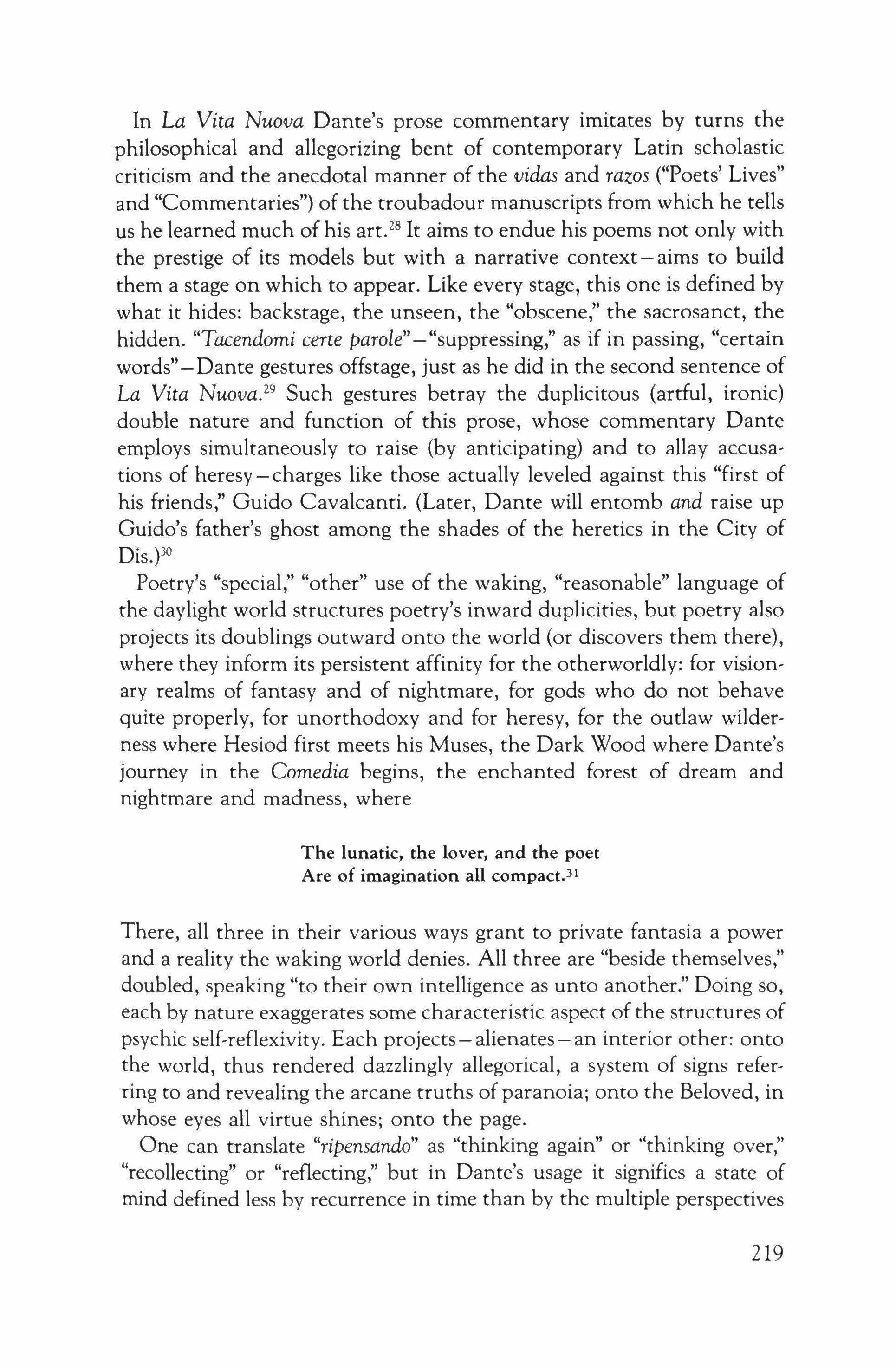
In La Vita Nuova Dante's prose commentary imitates by turns the philosophical and allegorizing bent of contemporary Latin scholastic criticism and the anecdotal manner of the vidas and razes ("Poets' Lives" and "Commentaries") of the troubadour manuscripts from which he tells us he learned much of his art." It aims to endue his poems not only with the prestige of its models but with a narrative context - aims to build them a stage on which to appear. Like every stage, this one is defined by what it hides: backstage, the unseen, the "obscene," the sacrosanct, the hidden. "Tacendomi certe parole" - "suppressing," as if in passing, "certain words" - Dante gestures offstage, just as he did in the second sentence of La Vita Nuova.29 Such gestures betray the duplicitous (artful, ironic) double nature and function of this prose, whose commentary Dante employs simultaneously to raise (by anticipating) and to allay accusations of heresy-charges like those actually leveled against this "first of his friends," Guido Cavalcanti. (Later, Dante will entomb and raise up Guido's father's ghost among the shades of the heretics in the City of Dis.po
Poetry's "special," "other" use of the waking, "reasonable" language of the daylight world structures poetry's inward duplicities, but poetry also projects its doublings outward onto the world (or discovers them there), where they inform its persistent affinity for the otherworldly: for visionary realms of fantasy and of nightmare, for gods who do not behave quite properly, for unorthodoxy and for heresy, for the outlaw wilderness where Hesiod first meets his Muses, the Dark Wood where Dante's journey in the Comedia begins, the enchanted forest of dream and nightmare and madness, where
The lunatic, the lover, and the poet Are of imagination all compact.t!
There, all three in their various ways grant to private fantasia a power and a reality the waking world denies. All three are "beside themselves," doubled, speaking "to their own intelligence as unto another." Doing so, each by nature exaggerates some characteristic aspect of the structures of psychic self-reflexivity. Each projects- alienates- an interior other: onto the world, thus rendered dazzlingly allegorical, a system of signs referring to and revealing the arcane truths of paranoia; onto the Beloved, in whose eyes all virtue shines; onto the page.
One can translate "ripensando" as "thinking again" or "thinking over," "recollecting" or "reflecting," but in Dante's usage it signifies a state of mind defined less by recurrence in time than by the multiple perspectives
219
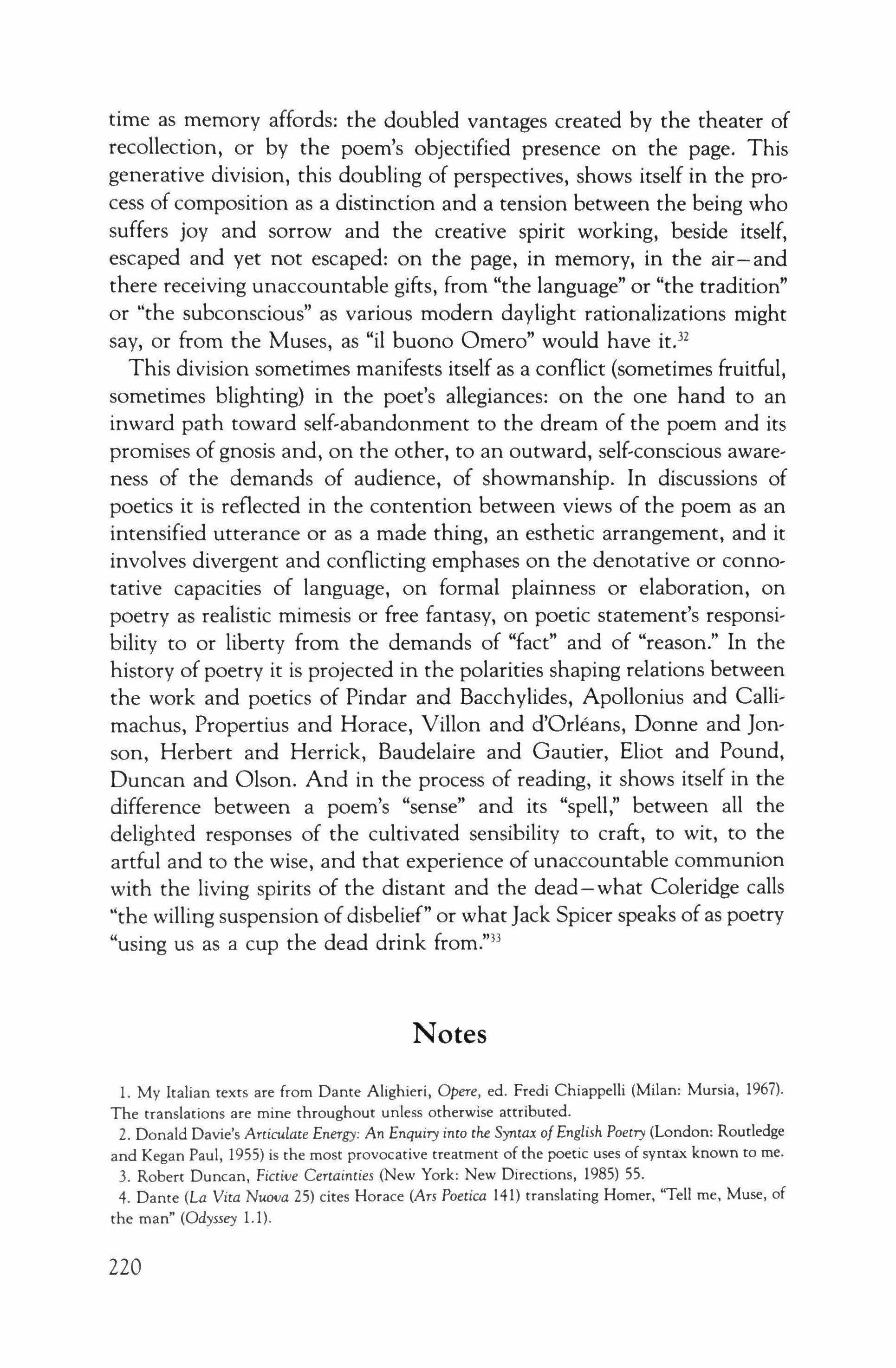
time as memory affords: the doubled vantages created by the theater of recollection, or by the poem's objectified presence on the page. This generative division, this doubling of perspectives, shows itself in the process of composition as a distinction and a tension between the being who suffers joy and sorrow and the creative spirit working, beside itself, escaped and yet not escaped: on the page, in memory, in the air-and there receiving unaccountable gifts, from "the language" or "the tradition" or "the subconscious" as various modern daylight rationalizations might say, or from the Muses, as "il buono Omero" would have it.32
This division sometimes manifests itself as a conflict (sometimes fruitful, sometimes blighting) in the poet's allegiances: on the one hand to an inward path toward self-abandonment to the dream of the poem and its promises of gnosis and, on the other, to an outward, self-conscious awareness of the demands of audience, of showmanship. In discussions of poetics it is reflected in the contention between views of the poem as an intensified utterance or as a made thing, an esthetic arrangement, and it involves divergent and conflicting emphases on the denotative or connotative capacities of language, on formal plainness or elaboration, on poetry as realistic mimesis or free fantasy, on poetic statement's responsibility to or liberty from the demands of "fact" and of "reason." In the history of poetry it is projected in the polarities shaping relations between the work and poetics of Pindar and Bacchvlides, Apollonius and Callimachus, Propertius and Horace, Villon and d'Orleans, Donne and Jonson, Herbert and Herrick, Baudelaire and Gautier, Eliot and Pound, Duncan and Olson. And in the process of reading, it shows itself in the difference between a poem's "sense" and its "spell," between all the delighted responses of the cultivated sensibility to craft, to wit, to the artful and to the wise, and that experience of unaccountable communion with the living spirits of the distant and the dead - what Coleridge calls "the willing suspension ofdisbelief" or what Jack Spicer speaks of as poetry "using us as a cup the dead drink from.?"
Notes
1. My Italian texts are from Dante Alighieri, Opere, ed. Fredi Chiappelli (Milan: Mursia, 1967). The translations are mine throughout unless otherwise attributed.
2. Donald Davie's Articulate Energy: An Enquiry into the Syntax ofEnglish Poetry (London: Routledge and Kegan Paul, 1955) is the most provocative treatment of the poetic uses of syntax known to me.
3. Robert Duncan, Fictive Certainties (New York: New Directions, 1985) 55.
4. Dante (La Vita Nuova 25) cites Horace (Ars Poetica 141) translating Homer, "Tell me, Muse, of the man" (Odyssey 1.1).
220
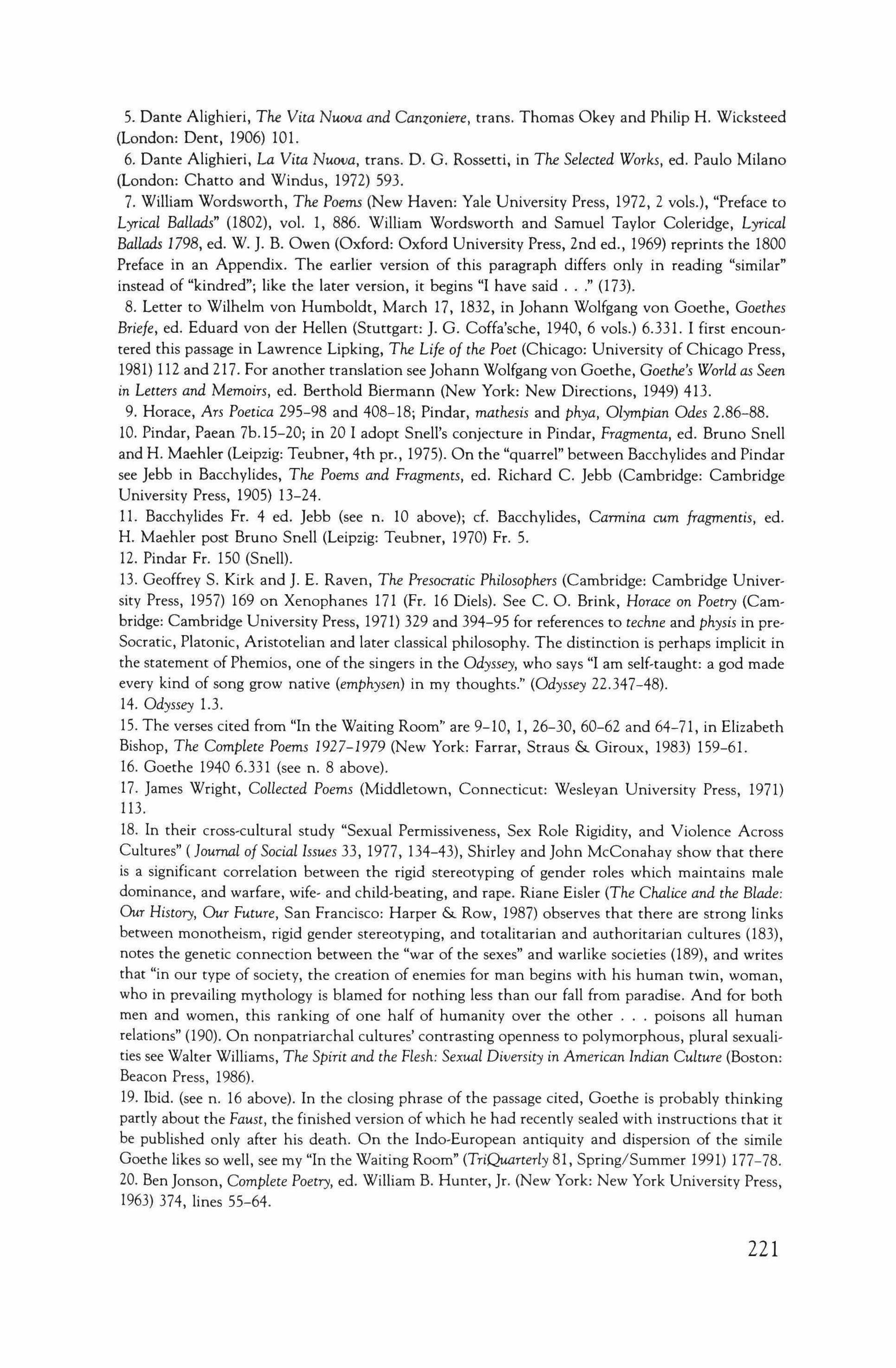
5. Dante Alighieri, The Vita Nuova and Canzoniere, trans. Thomas Okey and Philip H. Wicksteed (London: Dent, 1906) 101.
6. Dante Alighieri, La Vita Nuooa, trans. D. G. Rossetti, in The Selected Works, ed. Paulo Milano (London: Chatto and Windus, 1972) 593.
7. William Wordsworth, The Poems (New Haven: Yale University Press, 1972, 2 vols.), "Preface to Lyrical Ballads" (1802), vol. 1, 886. William Wordsworth and Samuel Taylor Coleridge, Lyrical Ballads 1798, ed. W. J. B. Owen (Oxford: Oxford University Press, 2nd ed., 1969) reprints the 1800 Preface in an Appendix. The earlier version of this paragraph differs only in reading "similar" instead of "kindred"; like the later version, it begins "I have said (173).
8. Letter to Wilhelm von Humboldt, March 17, 1832, in Johann Wolfgang von Goethe, Goethes Briefe, ed. Eduard von der Hellen (Stuttgart: J. G. Coffa'sche, 1940,6 vols.) 6.331. 1 first encountered this passage in Lawrence Lipking, The Life of the Poet (Chicago: University of Chicago Press, 1981) 112 and 217. For another translation see Johann Wolfgang von Goethe, Goethe's World as Seen in Letters and Memoirs, ed. Berthold Biermann (New York: New Directions, 1949) 413.
9. Horace, Ars Poetica 295-98 and 408-18; Pindar, mathesis and phya, Olympian Odes 2.86-88.
10. Pindar, Paean 7b.15-20; in 20 I adopt Snell's conjecture in Pindar, Fragmenta, ed. Bruno Snell and H. Maehler (Leipzig: Teubner, 4th pr., 1975). On the "quarrel" between Bacchylides and Pindar see Jebb in Bacchvlides, The Poems and Fragments, ed. Richard C. jebb (Cambridge: Cambridge University Press, 1905) 13-24.
11. Bacchylides Fr. 4 ed. Jebb (see n. 10 above); d. Bacchylides, Carmina cum fragmentis, ed. H. Maehler post Bruno Snell (Leipzig: Teubner, 1970) Fr. 5.
12. Pindar Fr. 150 (Snell).
13. Geoffrey S. Kirk and J. E. Raven, The Presocratic Philosophers (Cambridge: Cambridge University Press, 1957) 169 on Xenophanes 171 (Fr. 16 Diels). See C. O. Brink, Horace on Poetry (Cambridge: Cambridge University Press, 1971) 329 and 394-95 for references to techne and physis in preSocratic, Platonic, Aristotelian and later classical philosophy. The distinction is perhaps implicit in the statement of Phemios, one of the singers in the Odyssey, who says "1 am self-taught: a god made every kind of song grow native (emphysen) in my thoughts." (Odyssey 22.347-48).
14. Odyssey 1.3.
15. The verses cited from "In the Waiting Room" are 9-10, 1,26-30,60-62 and 64-71, in Elizabeth Bishop, The Complete Poems 1927-1979 (New York: Farrar, Straus & Giroux, 1983) 159-61.
16. Goethe 19406.331 (see n. 8 above).
17. James Wright, Collected Poems (Middletown, Connecticut: Wesleyan University Press, 1971) 113.
18. In their cross-cultural study "Sexual Permissiveness, Sex Role Rigidity, and Violence Across Cultures" (Journal of Social Issues 33, 1977, 134-43), Shirley and John McConahay show that there is a significant correlation between the rigid stereotyping of gender roles which maintains male dominance, and warfare, wife- and child-beating, and rape. Riane Eisler (The Chalice and the Blade: Our History, Our Future, San Francisco: Harper & Row, 1987) observes that there are strong links between monotheism, rigid gender stereotyping, and totalitarian and authoritarian cultures (183), notes the genetic connection between the "war of the sexes" and warlike societies (189), and writes that "in our type of society, the creation of enemies for man begins with his human twin, woman, who in prevailing mythology is blamed for nothing less than our fall from paradise. And for both men and women, this ranking of one half of humanity over the other poisons all human relations" (190). On nonpatriarchal cultures' contrasting openness to polymorphous, plural sexualities see Walter Williams, The Spirit and the Flesh: Sexual Diversity in American Indian Culture (Boston: Beacon Press, 1986).
19. Ibid. (see n. 16 above). In the closing phrase of the passage cited, Goethe is probably thinking partly about the Faust, the finished version of which he had recently sealed with instructions that it be published only after his death. On the Indo-European antiquity and dispersion of the simile Goethe likes so well, see my "In the Waiting Room" (TriQuarterly 81, Spring/Summer 1991) 177-78.
20. Ben Jonson, Complete Poetry, ed. William B. Hunter, Jr. (New York: New York University Press, 1963) 374, lines 55-64.
221
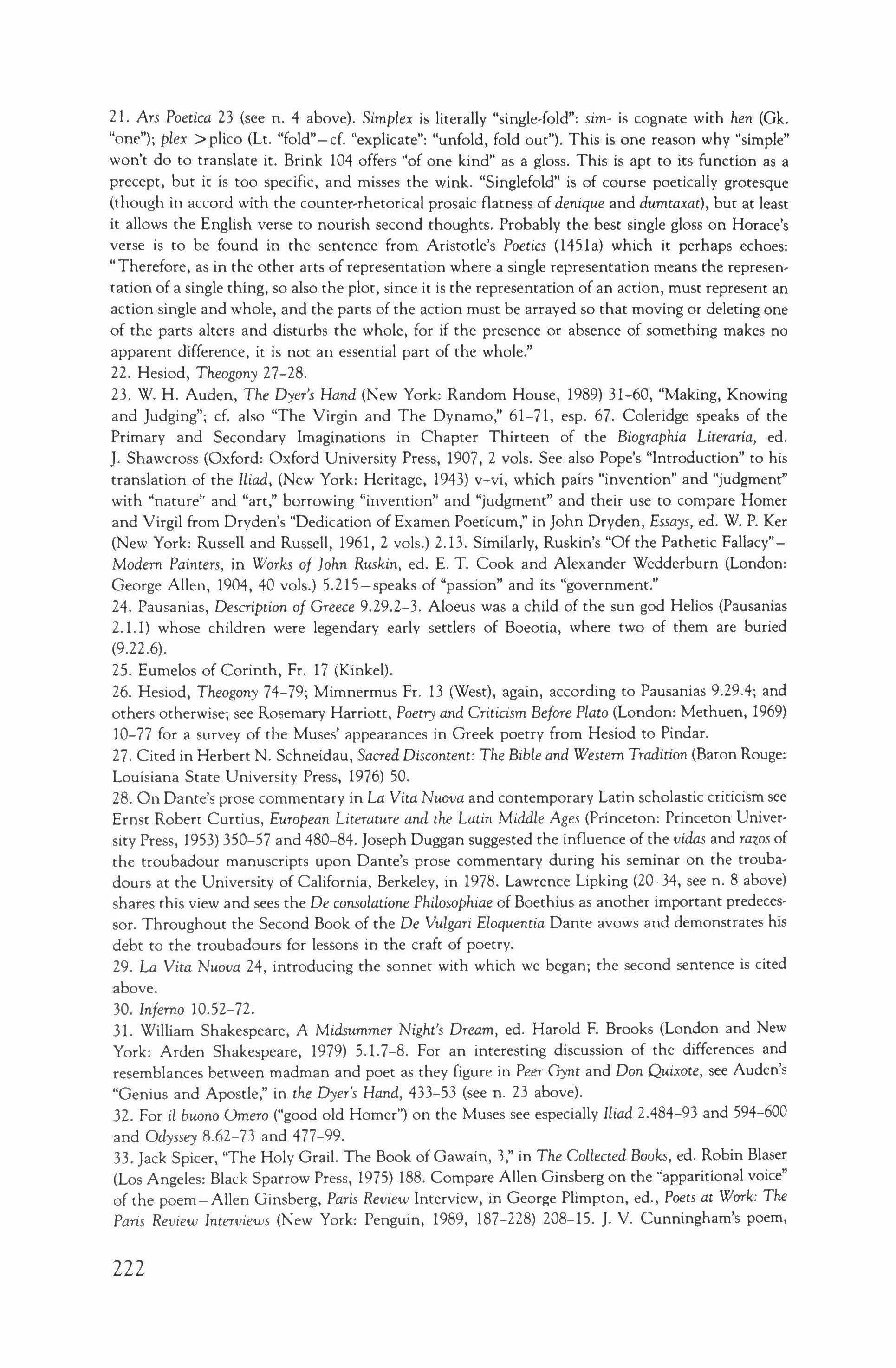
21. Ars Poetica 23 (see n. 4 above). Simplex is literally "single-fold": sim- is cognate with hen (Gk. "one"); plex > plico (Lt. "fold" - cf. "explicate": "unfold, fold out"). This is one reason why "simple" won't do to translate it. Brink 104 offers "of one kind" as a gloss. This is apt to its function as a precept, but it is too specific, and misses the wink. "Singlefold" is of course poetically grotesque (though in accord with the counter-rhetorical prosaic flatness of denique and dumtaxat), but at least it allows the English verse to nourish second thoughts. Probably the best single gloss on Horace's verse is to be found in the sentence from Aristotle's Poetics (1451a) which it perhaps echoes: "Therefore, as in the other arts of representation where a single representation means the representation of a single thing, so also the plot, since it is the representation of an action, must represent an action single and whole, and the parts of the action must be arrayed so that moving or deleting one of the parts alters and disturbs the whole, for if the presence or absence of something makes no apparent difference, it is not an essential part of the whole."
22. Hesiod, Theogony 27-28.
23. W. H. Auden, The Dyer's Hand (New York: Random House, 1989) 31-60, "Making, Knowing and Judging"; cf. also "The Virgin and The Dynamo," 61-71, esp. 67. Coleridge speaks of the Primary and Secondary Imaginations in Chapter Thirteen of the Biographia Literasia, ed. J. Shawcross (Oxford: Oxford University Press, 1907,2 vols. See also Pope's "Introduction" to his translation of the Iliad, (New York: Heritage, 1943) v-vi, which pairs "invention" and "judgment" with "nature" and "art," borrowing "invention" and "judgment" and their use to compare Homer and Virgil from Dryden's "Dedication of Examen Poeticurn," in John Dryden, Essays, ed. W. P. Ker (New York: Russell and Russell, 1961, 2 vols.) 2.13. Similarly, Ruskin's "Of the Pathetic Fallacy"Modern Painters, in Works of John Ruskin, ed. E. T. Cook and Alexander Wedderburn (London: George Allen, 1904,40 vols.) 5.215-speaks of "passion" and its "government."
24. Pausanias, Description of Greece 9.29.2-3. Aloeus was a child of the sun god Helios (Pausanias 2.1.1) whose children were legendary early settlers of Boeotia, where two of them are buried (9.22.6).
25. Eumelos of Corinth, Fr. 17 (Kinkel).
26. Hesiod, Theogony 74-79; Mimnermus Fr. 13 (West), again, according to Pausanias 9.29.4; and others otherwise; see Rosemary Harriott, Poetry and Criticism Before Plato (London: Methuen, 1969) 10-77 for a survey of the Muses' appearances in Greek poetry from Hesiod to Pindar, 27. Cited in Herbert N. Schneidau, Sacred Discontent: The Bible and Western Tradition (Baton Rouge: Louisiana State University Press, 1976) SO.
28. On Dante's prose commentary in La Vita Nuova and contemporary Latin scholastic criticism see Ernst Robert Curtius, European Literature and the Latin Middle Ages (Princeton: Princeton University Press, 1953) 350-57 and 480-84. Joseph Duggan suggested the influence of the vidas and razos of the troubadour manuscripts upon Dante's prose commentary during his seminar on the troubadours at the University of California, Berkeley, in 1978. Lawrence Lipking (20-34, see n. 8 above) shares this view and sees the De consolatione Philosophiae of Boethius as another important predecessor. Throughout the Second Book of the De Vulgari Eloquentia Dante avows and demonstrates his debt to the troubadours for lessons in the craft of poetry.
29. La Vita Nuova 24, introducing the sonnet with which we began; the second sentence is cited above.
30. Inferno 10.52-72.
31. William Shakespeare, A Midsummer Night's Dream, ed. Harold F. Brooks (London and New York: Arden Shakespeare, 1979) 5.1.7-8. For an interesting discussion of the differences and resemblances between madman and poet as they figure in Peer Gynt and Don Quixote, see Auden's "Genius and Apostle," in the Dyer's Hand, 433-53 (see n, 23 above).
32. For il buono Omero ("good old Homer") on the Muses see especially Iliad 2.484-93 and 594-600 and Odyssey 8.62-73 and 477-99.
33. Jack Spicer, "The Holy Grail. The Book of Gawain, 3," in The Collected Books, ed. Robin Blaser (Los Angeles: Black Sparrow Press, 1975) 188. Compare Allen Ginsberg on the "apparitional voice" of the poem-Allen Ginsberg, Paris Review Interview, in George Plimpton, ed., Poets at Work: The Paris Review Interviews (New York: Penguin, 1989, 187-228) 208-15. J. V. Cunningham's poem,
222

"Lector Aere Perennior," encounters the same mystery from a slightly different vantage-). V. Cunningham, The Collected Poems and Epigrams (Chicago: Swallow, 1971) 16. George Steiner's Real Presences (London: Faber and Faber, 1989) offers a theoretical exploration, one anticipated in Augustine's De Magistro.
223
Sappho:AGarland*
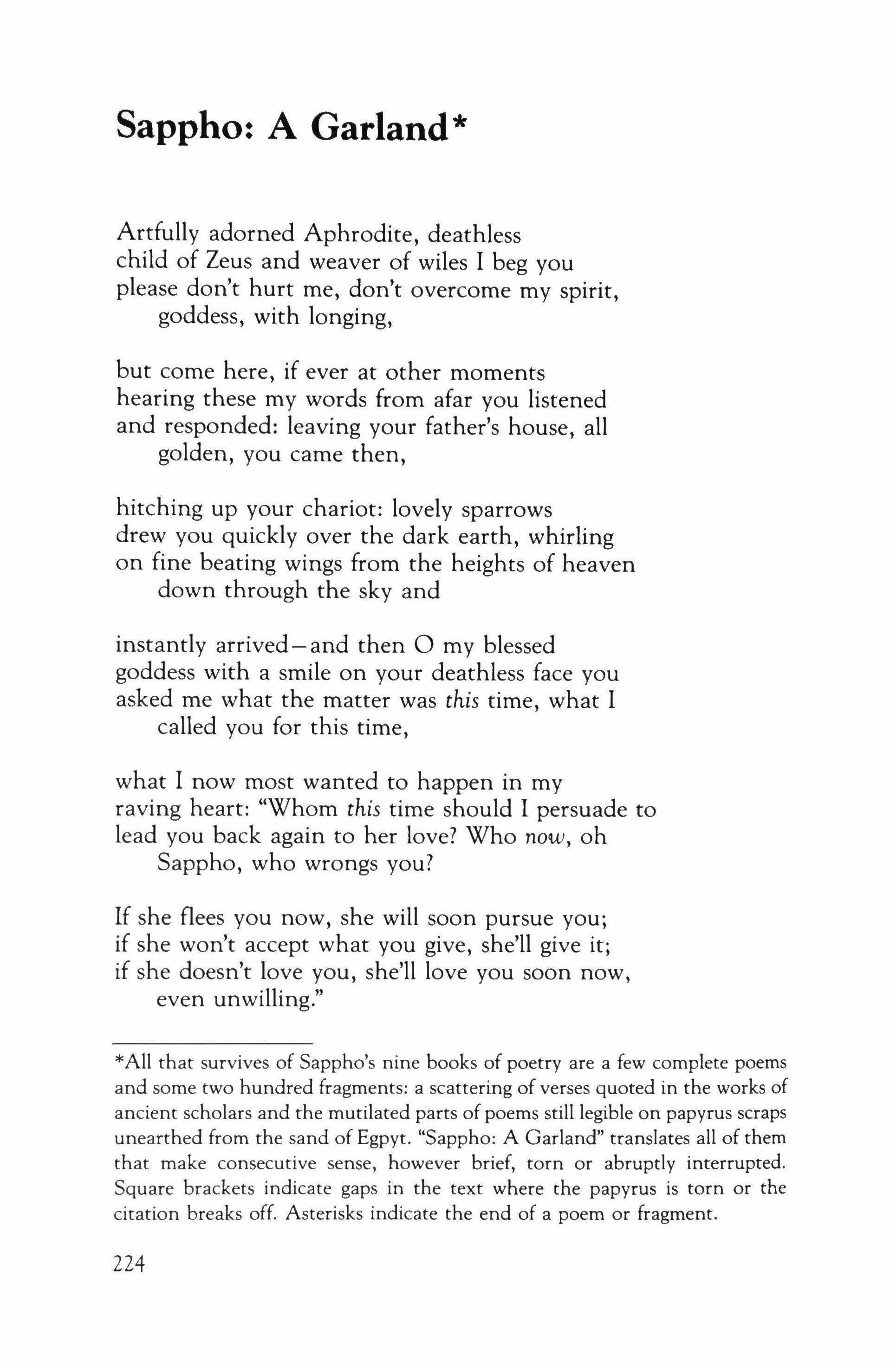
Artfully adorned Aphrodite, deathless child of Zeus and weaver of wiles I beg you please don't hurt me, don't overcome my spirit, goddess, with longing, but come here, if ever at other moments hearing these my words from afar you listened and responded: leaving your father's house, all golden, you came then,
hitching up your chariot: lovely sparrows drew you quickly over the dark earth, whirling on fine beating wings from the heights of heaven down through the sky and instantly arrived-and then 0 my blessed goddess with a smile on your deathless face you asked me what the matter was this time, what I called you for this time,
what I now most wanted to happen in my raving heart: "Whom this time should I persuade to lead you back again to her love? Who now, oh Sappho, who wrongs you?
If she flees you now, she will soon pursue you; if she won't accept what you give, she'll give it; if she doesn't love you, she'll love you soon now, even unwilling."
*All that survives of Sappho's nine books of poetry are a few complete poems and some two hundred fragments: a scattering of verses quoted in the works of ancient scholars and the mutilated parts of poems still legible on papyrus scraps unearthed from the sand of Egpyt. "Sappho: A Garland" translates all of them that make consecutive sense, however brief, torn or abruptly interrupted. Square brackets indicate gaps in the text where the papyrus is torn or the citation breaks off. Asterisks indicate the end of a poem or fragment.
224
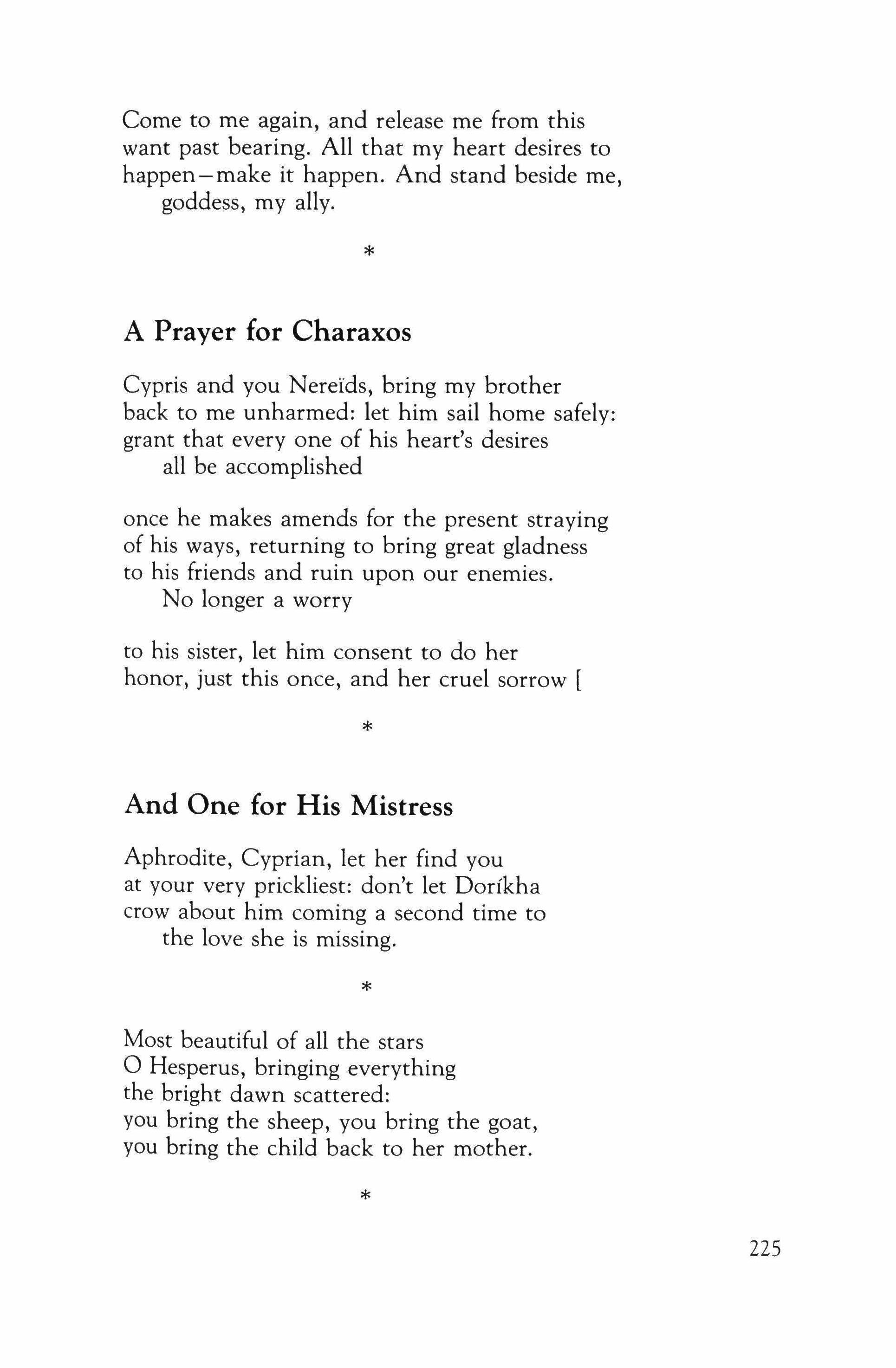
Come to me again, and release me from this want past bearing. All that my heart desires to happen-make it happen. And stand beside me, goddess, my ally.
*
A Prayer for Charaxos
Cypris and you Nereids, bring my brother back to me unharmed: let him sail home safely: grant that everyone of his heart's desires all be accomplished
once he makes amends for the present straying of his ways, returning to bring great gladness to his friends and ruin upon our enemies. No longer a worry
to his sister, let him consent to do her honor, just this once, and her cruel sorrow [ *
And One for His Mistress
Aphrodite, Cyprian, let her find you at your very prickliest: don't let Dorikha crow about him coming a second time to the love she is missing.
*
Most beautiful of all the stars
o Hesperus, bringing everything the bright dawn scattered: you bring the sheep, you bring the goat, you bring the child back to her mother.
*
225
I have a beautiful little girl: the golden flowers are no match for her loveliness, my darling Kleis -for her, I wouldn't take all Lydia or sweet [
*
] for my mother said that when she was a girl if you bound the locks of your hair in back, gathered there in a circlet of plaited purple, that was truly a fine adornment, but for blonds with hair yellower than a torch it is better to fasten it with fresh garlands of flowers in bloom, and more recently there were headbands decorated in Sardis, elaborately embroidered [ ] Ionian cities [
But for you, dearest Kleis, I have no intricate headband and nowhere that I can get one: the Mytilenean
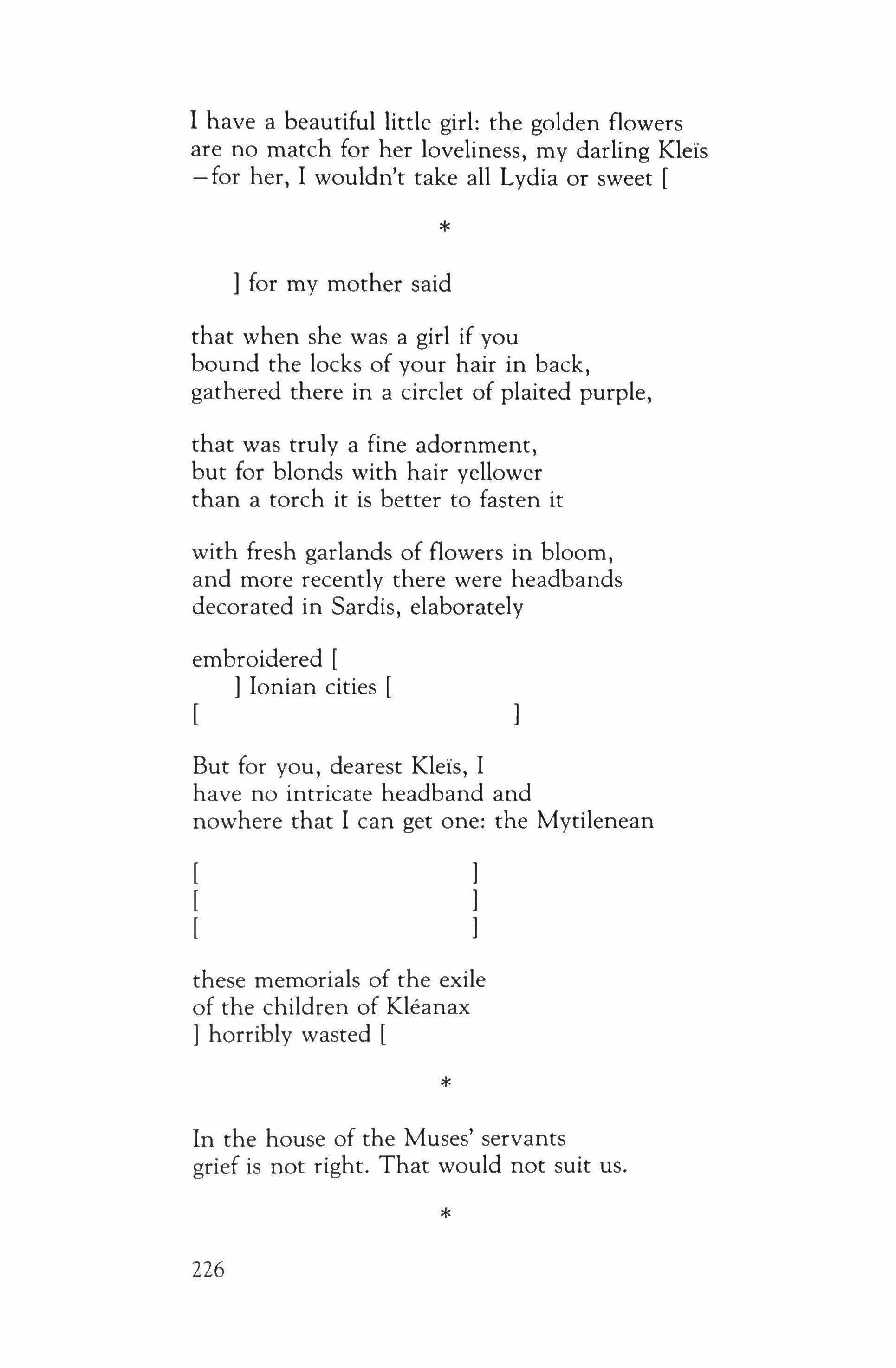
these memorials of the exile of the children of Kleanax ] horribly wasted [ * In the house of the Muses' servants grief is not right. That would not suit us.
*
226
Wealth without virtue is no harmless neighbor. *
When anger spreads inside your breast keep watch against an idly barking tongue.
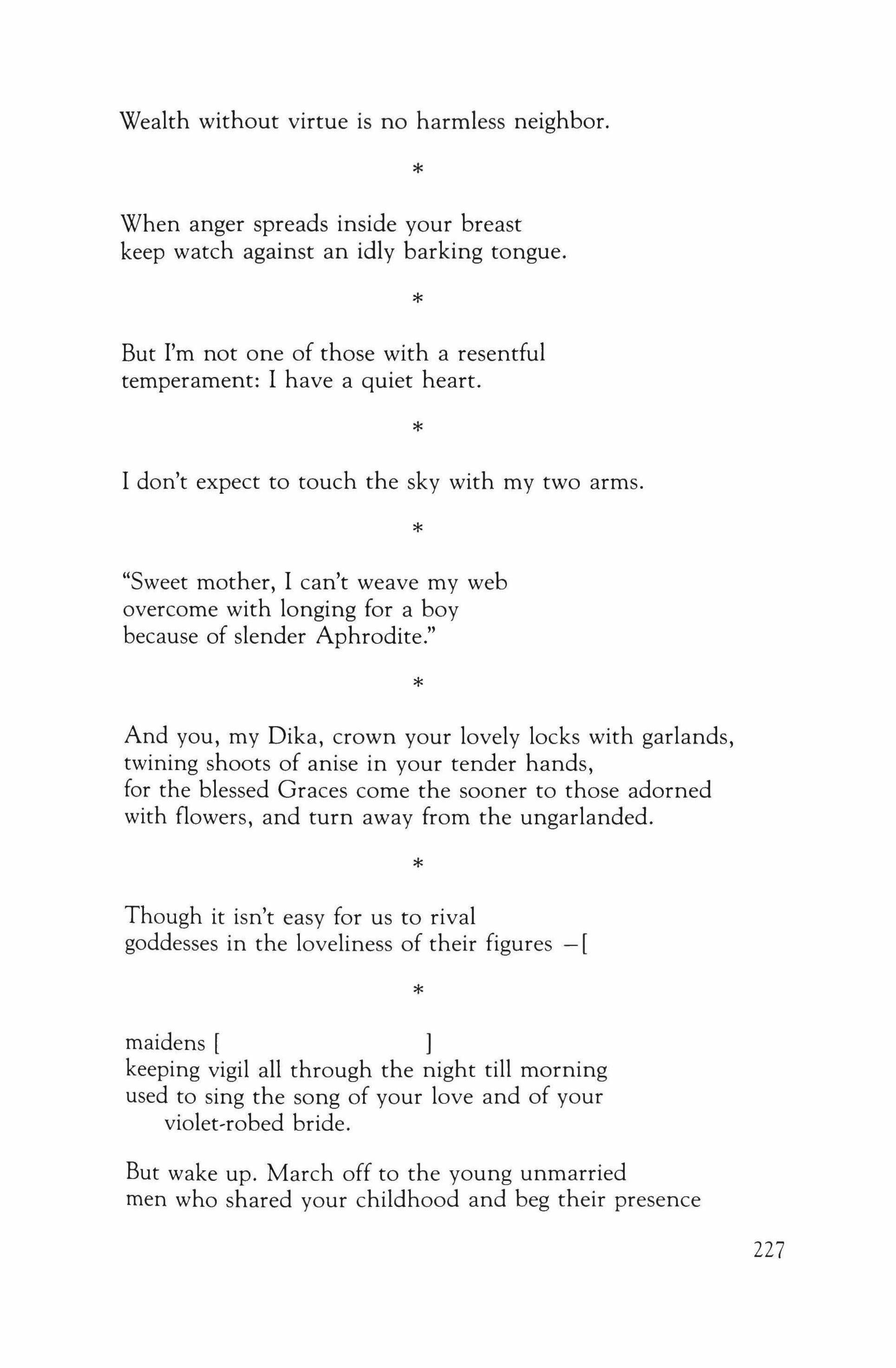
But I'm not one of those with a resentful temperament: I have a quiet heart.
I don't expect to touch the sky with my two arms.
"Sweet mother, I can't weave my web overcome with longing for a boy because of slender Aphrodite." *
And you, my Dika, crown your lovely locks with garlands, twining shoots of anise in your tender hands, for the blessed Graces come the sooner to those adorned with flowers, and turn away from the ungarlanded.
Though it isn't easy for us to rival goddesses in the loveliness of their figures - [
maidens [ ] keeping vigil all through the night till morning used to sing the song of your love and of your violet-robed bride.
But wake up. March off to the young unmarried men who shared your childhood and beg their presence
*
*
*
*
*
227
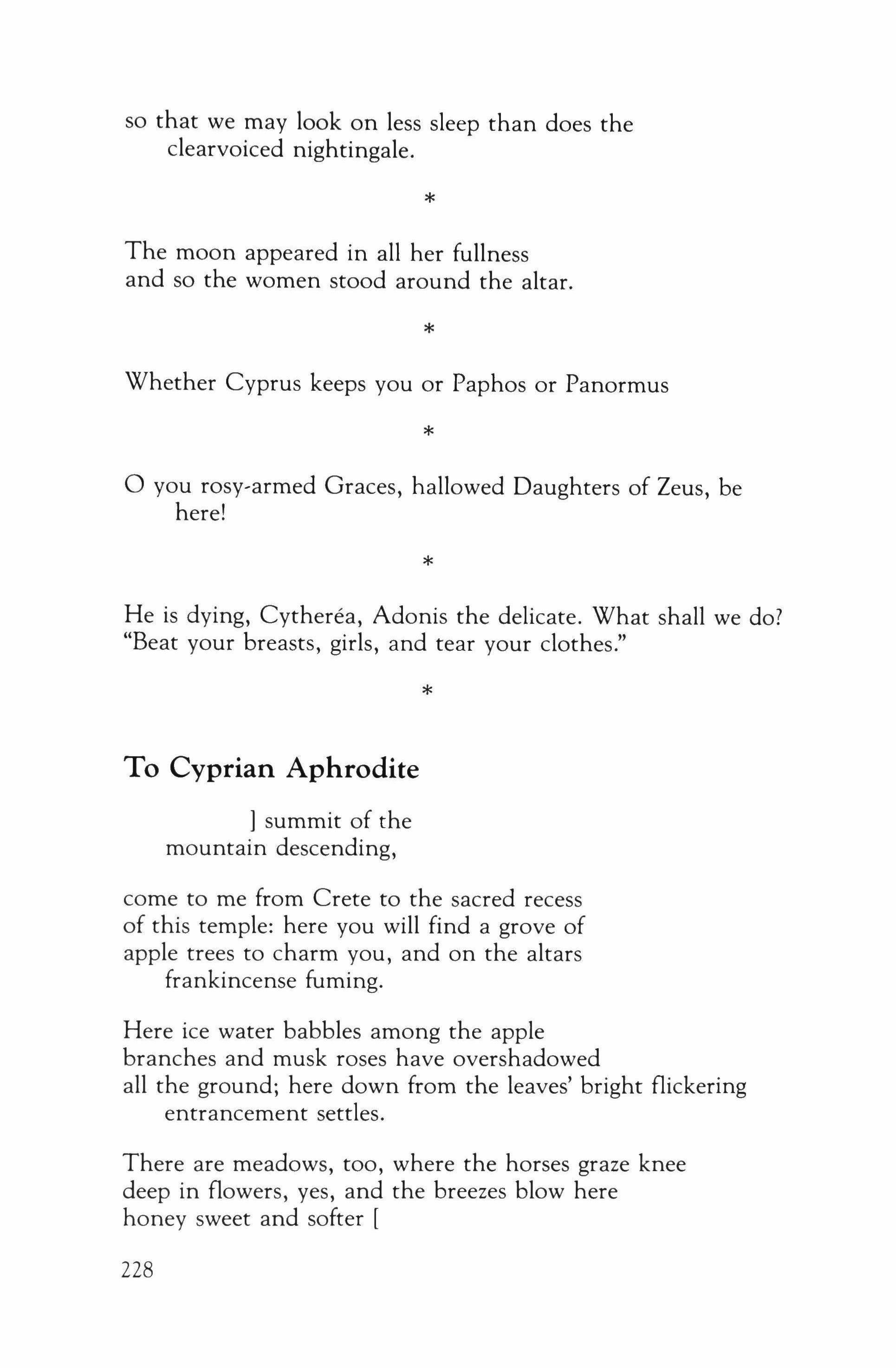
so that we may look on less sleep than does the clearvoiced nightingale.
*
The moon appeared in all her fullness and so the women stood around the altar.
* Whether Cyprus keeps you or Paphos or Panormus *
o you rosy-armed Graces, hallowed Daughters of Zeus, be here! *
He is dying, Cytherea, Adonis the delicate. What shall we do? "Beat your breasts, girls, and tear your clothes." *
To Cyprian Aphrodite
] summit of the mountain descending,
come to me from Crete to the sacred recess of this temple: here you will find a grove of apple trees to charm you, and on the altars frankincense fuming.
Here ice water babbles among the apple branches and musk roses have overshadowed all the ground; here down from the leaves' bright flickering entrancement settles.
There are meadows, too, where the horses graze knee deep in flowers, yes, and the breezes blow here honey sweet and softer [
228
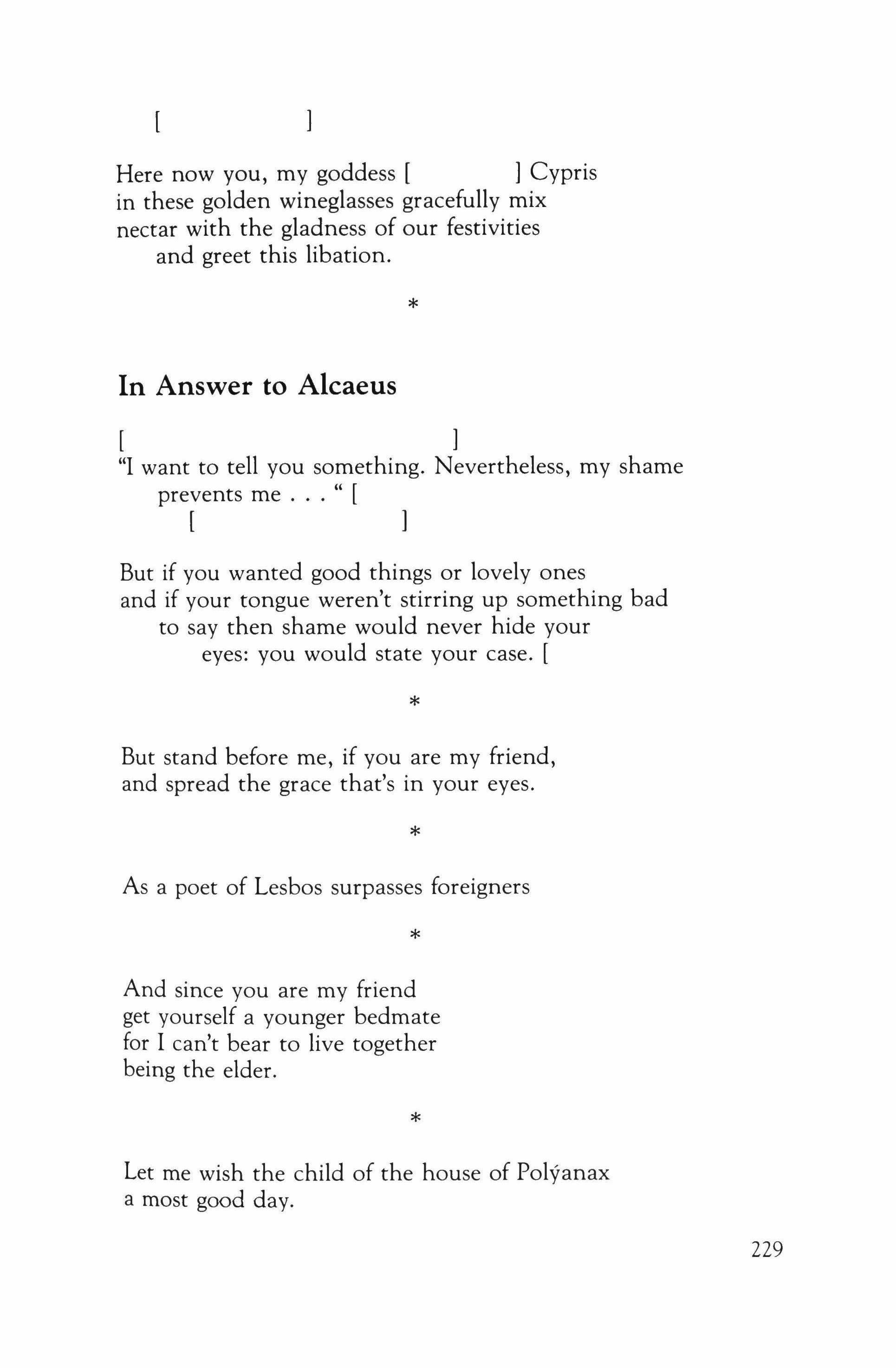
Here now you, my goddess [ ] Cypris in these golden wineglasses gracefully mix nectar with the gladness of our festivities and greet this libation.
*
In Answer to Alcaeus
[ ] "I want to tell you something. Nevertheless, my shame [ prevents me [
But if you wanted good things or lovely ones and if your tongue weren't stirring up something bad to say then shame would never hide your eyes: you would state your case. [ *
But stand before me, if you are my friend, and spread the grace that's in your eyes.
*
As a poet of Lesbos surpasses foreigners *
And since you are my friend get yourself a younger bedmate for I can't bear to live together being the elder.
*
Let me wish the child of the house of Polyanax a most good day.
229
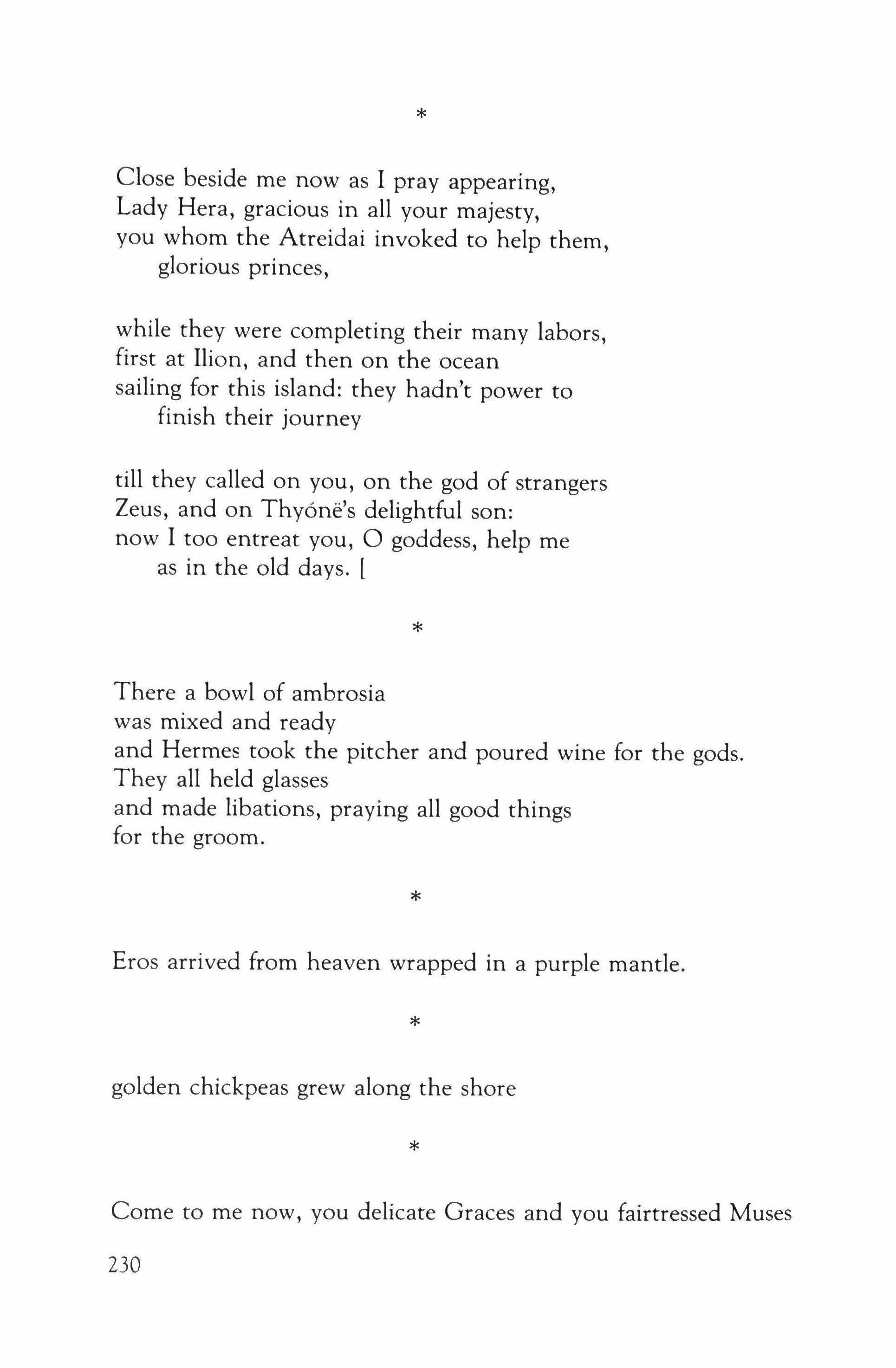
Close beside me now as I pray appearing, Lady Hera, gracious in all your majesty, you whom the Atreidai invoked to help them, glorious princes,
while they were completing their many labors, first at Ilion, and then on the ocean sailing for this island: they hadn't power to finish their journey
till they called on you, on the god of strangers Zeus, and on Thyone's delightful son: now I too entreat you, 0 goddess, help me as in the old days. [
*
There a bowl of ambrosia was mixed and ready and Hermes took the pitcher and poured wine for the gods. They all held glasses and made libations, praying all good things for the groom.
* Eros arrived from heaven wrapped in a purple mantle.
* golden chickpeas grew along the shore
* Come to me now, you delicate Graces and you fairtressed Muses
*
230
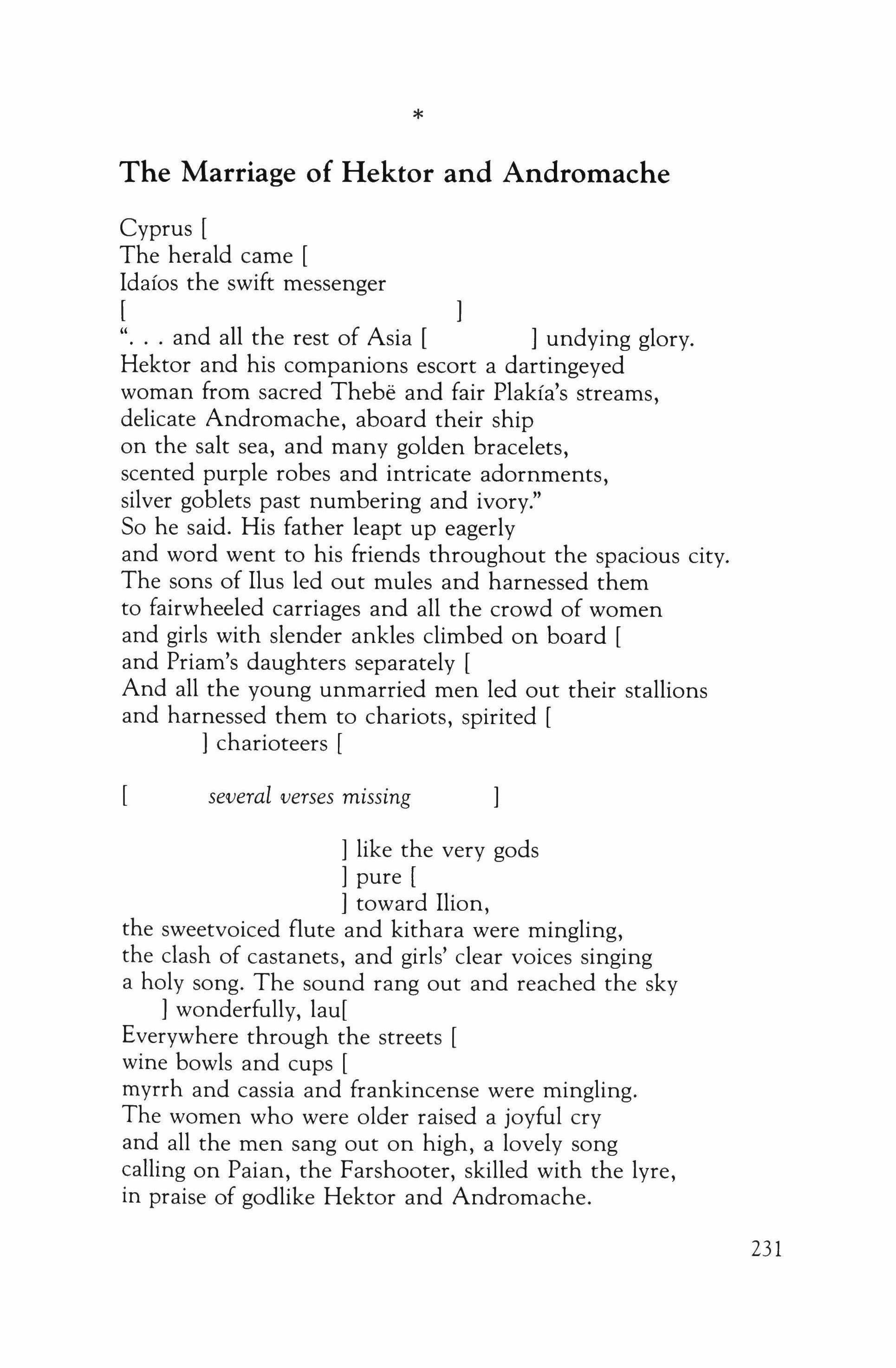
The Marriage of Hektor and Andromache
Cyprus [
The herald came [ Idafos the swift messenger [ and all the rest of Asia [ ] undying glory. Hektor and his companions escort a dartingeyed woman from sacred Thebe and fair Plakfa's streams, delicate Andromache, aboard their ship on the salt sea, and many golden bracelets, scented purple robes and intricate adornments, silver goblets past numbering and ivory." So he said. His father leapt up eagerly and word went to his friends throughout the spacious city. The sons of Ilus led out mules and harnessed them to fairwheeled carriages and all the crowd of women and girls with slender ankles climbed on board [ and Priam's daughters separately [ And all the young unmarried men led out their stallions and harnessed them to chariots, spirited [ ] charioteers [
several verses missing
] like the very gods ] pure [ ] toward Ilion, the sweetvoiced flute and kithara were mingling, the clash of castanets, and girls' clear voices singing a holy song. The sound rang out and reached the sky ] wonderfully, lau] Everywhere through the streets [ wine bowls and cups [ myrrh and cassia and frankincense were mingling. The women who were older raised a joyful cry and all the men sang out on high, a lovely song calling on Paian, the Farshooter, skilled with the lyre, in praise of godlike Hektor and Andromache.
*
231
To what shall I best liken you, dear bridegroom? Most of all to a slender sapling I liken you.
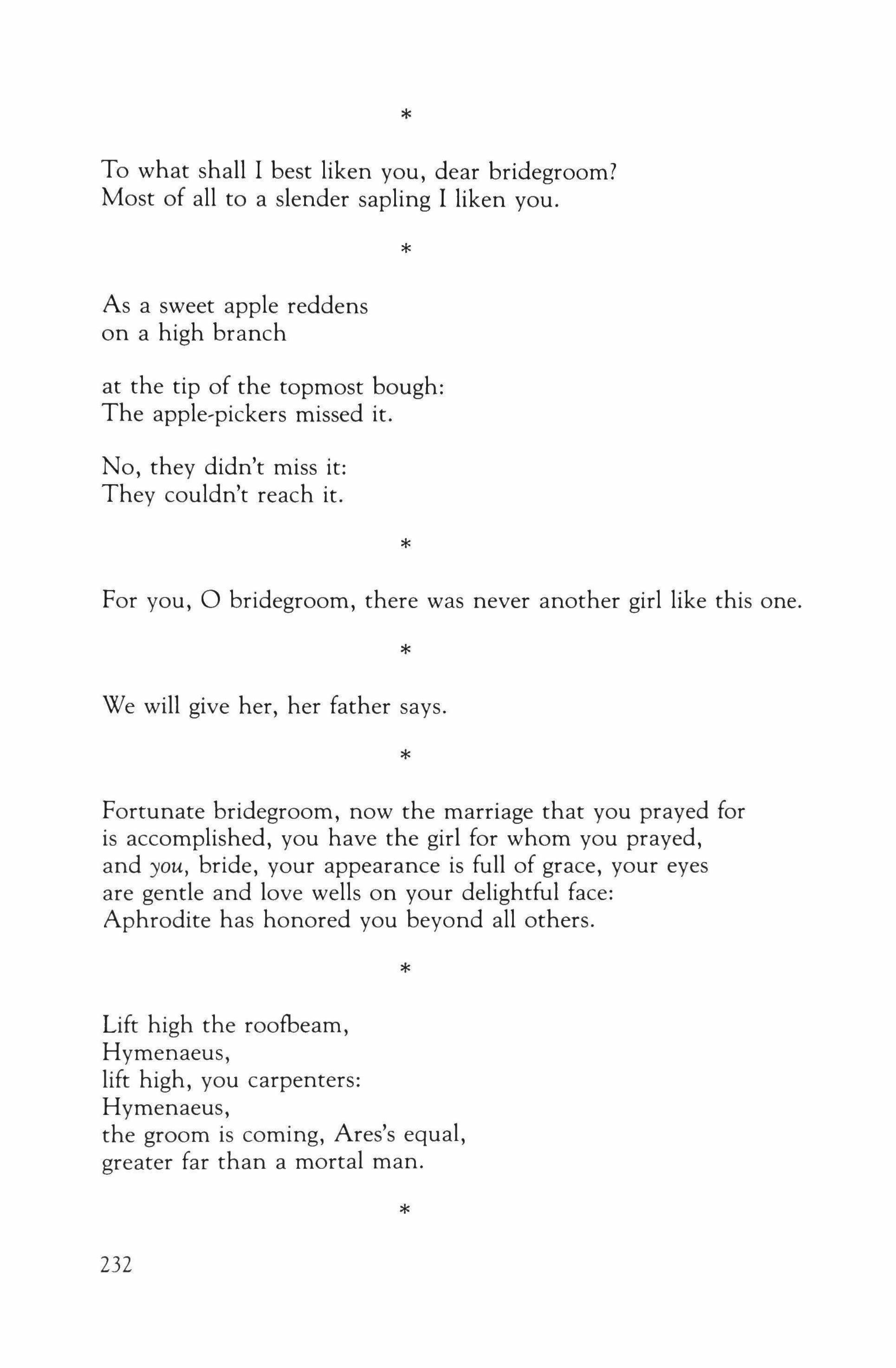
As a sweet apple reddens on a high branch
at the tip of the topmost bough: The apple-pickers missed it.
No, they didn't miss it: They couldn't reach it.
For you, 0 bridegroom, there was never another girl like this one.
We will give her, her father says.
Fortunate bridegroom, now the marriage that you prayed for is accomplished, you have the girl for whom you prayed, and you, bride, your appearance is full of grace, your eyes are gentle and love wells on your delightful face: Aphrodite has honored you beyond all others.
Lift high the roofbeam, Hymenaeus, lift high, you carpenters: Hymenaeus, the groom is coming, Ares's equal, greater far than a mortal man.
232
*
*
*
*
*
*
*
The feet of the doorkeeper are seven fathoms long, his sandals are of five oxhides, ten shoemakers worked to stitch them.
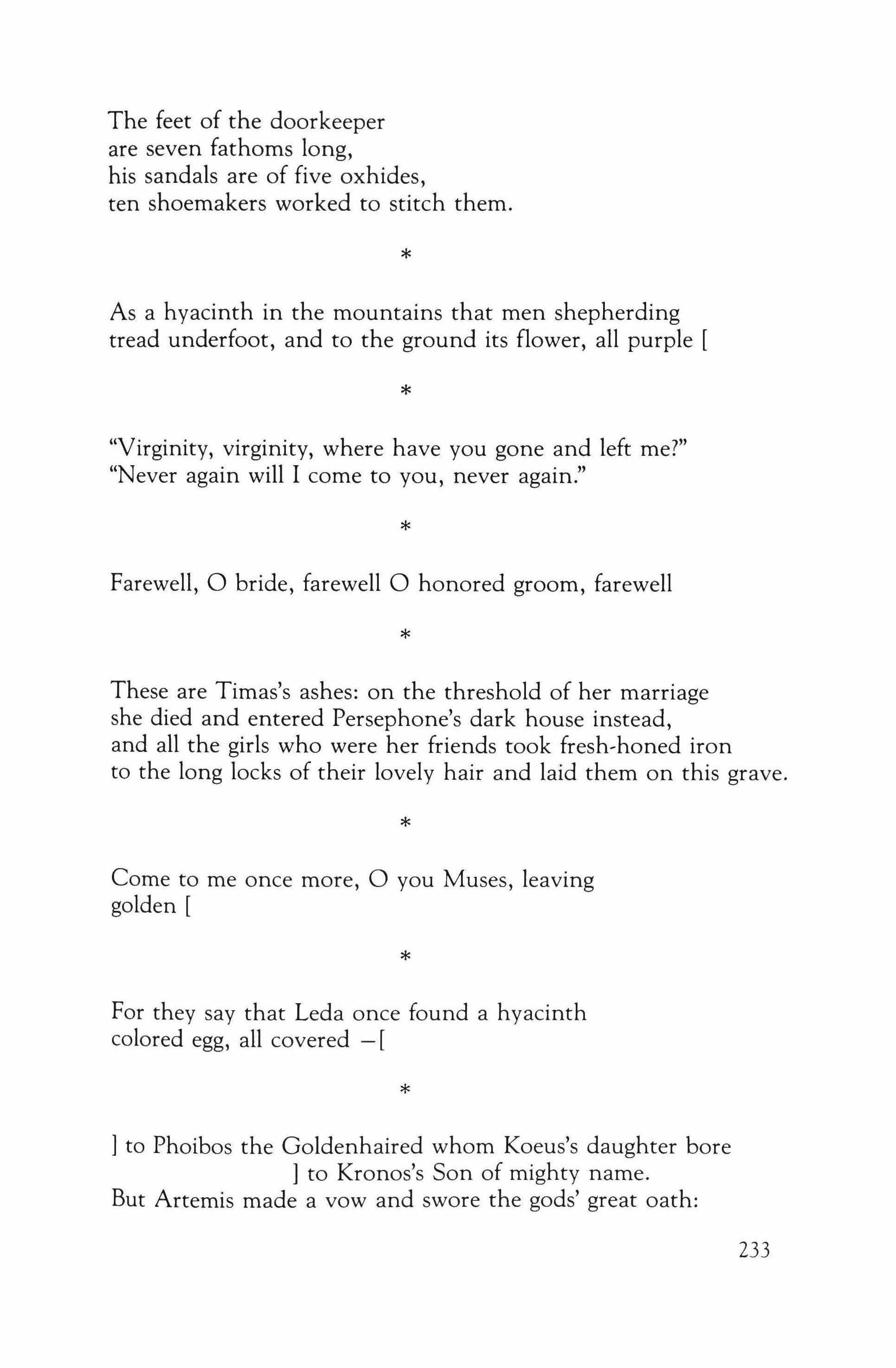
As a hyacinth in the mountains that men shepherding tread underfoot, and to the ground its flower, all purple [
"Virginity, virginity, where have you gone and left me?" "Never again will I come to you, never again."
Farewell, 0 bride, farewell 0 honored groom, farewell
These are Timas's ashes: on the threshold of her marriage she died and entered Persephone's dark house instead, and all the girls who were her friends took fresh,honed iron to the long locks of their lovely hair and laid them on this grave.
Come to me once more, 0 you Muses, leaving golden [
For they say that Leda once found a hyacinth colored egg, all covered - [
] to Phoibos the Goldenhaired whom Koeus's daughter bore ] to Kronos's Son of mighty name. But Artemis made a vow and swore the gods' great oath:
*
*
*
*
*
*
*
233
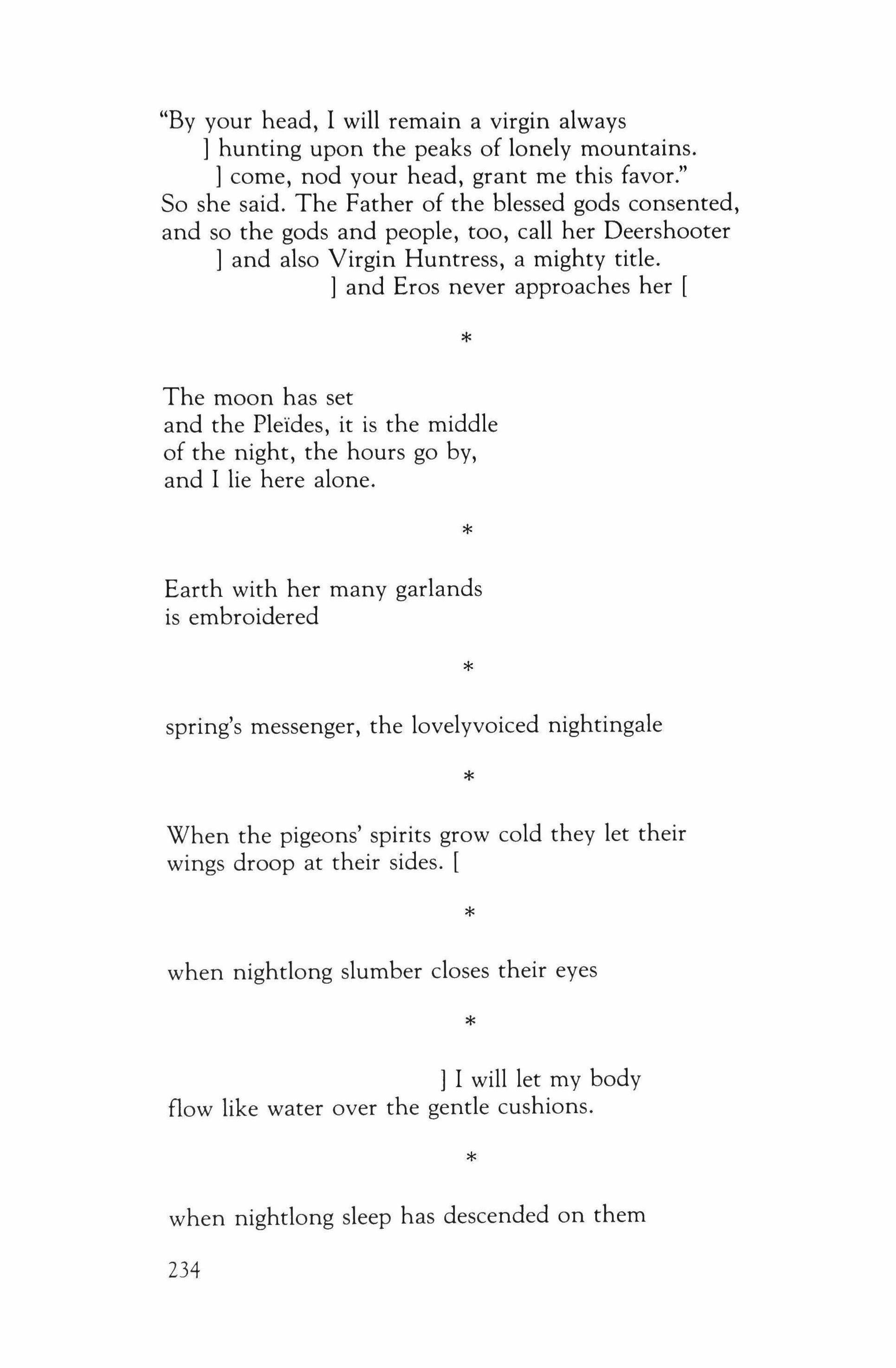
"By your head, 1 will remain a virgin always ] hunting upon the peaks of lonely mountains. ] come, nod your head, grant me this favor." So she said. The Father of the blessed gods consented, and so the gods and people, too, call her Deershooter ] and also Virgin Huntress, a mighty title. 1 and Eros never approaches her [ *
The moon has set and the Pleides, it is the middle of the night, the hours go by, and I lie here alone.
*
Earth with her many garlands is embroidered
* spring's messenger, the lovelyvoiced nightingale
*
When the pigeons' spirits grow cold they let their wings droop at their sides. [
* when nightlong slumber closes their eyes
* ] I will let my body flow like water over the gentle cushions.
* when nightlong sleep has descended on them
234
o beautiful, 0 graceful girl
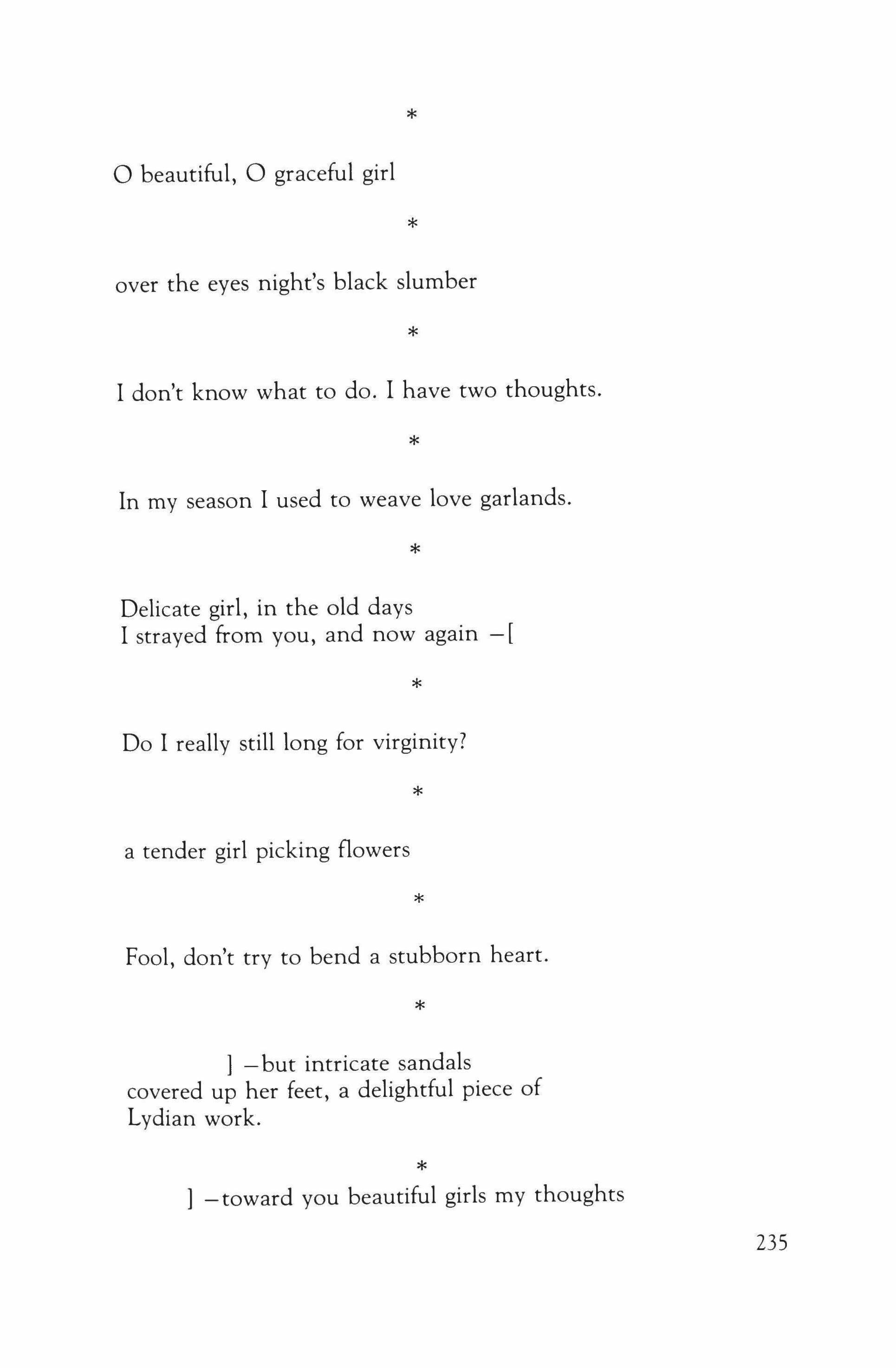
over the eyes night's black slumber
I don't know what to do. I have two thoughts.
In my season I used to weave love garlands.
Delicate girl, in the old days I strayed from you, and now again - [
Do I really still long for virginity?
a tender girl picking flowers
Fool, don't try to bend a stubborn heart.
J - but intricate sandals covered up her feet, a delightful piece of Lydian work.
- toward you beautiful girls my thoughts
*
*
*
*
*
*
*
*
*
*
235
never alter
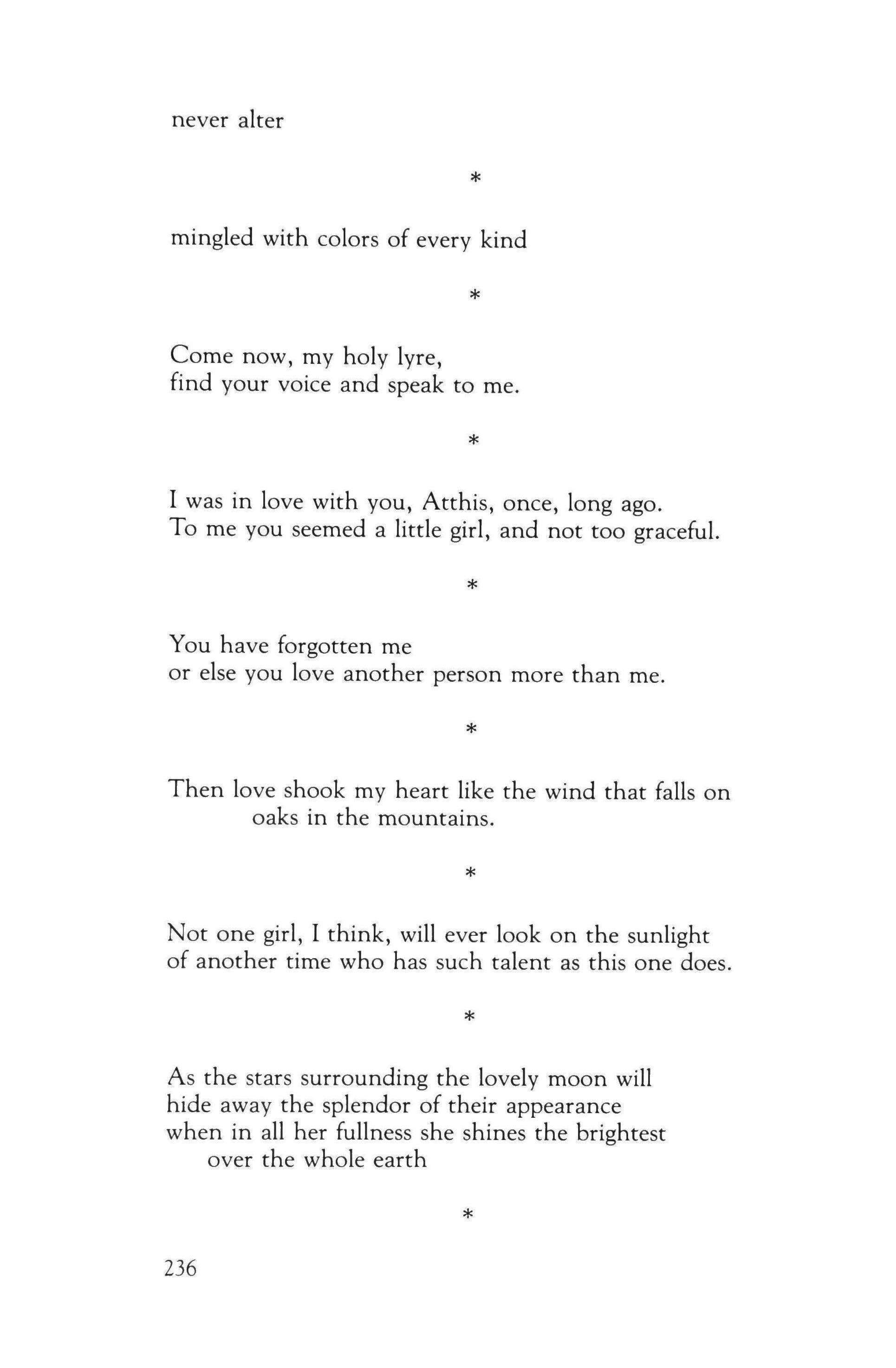
* mingled with colors of every kind
*
Come now, my holy lyre, find your voice and speak to me.
*
I was in love with you, Atthis, once, long ago. To me you seemed a little girl, and not too graceful.
* You have forgotten me or else you love another person more than me.
* Then love shook my heart like the wind that falls on oaks in the mountains.
* Not one girl, I think, will ever look on the sunlight of another time who has such talent as this one does.
* As the stars surrounding the lovely moon will hide away the splendor of their appearance when in all her fullness she shines the brightest over the whole earth
*
236
1 You came, and I was mad to have you: your breath cooled my heart that was burning with desire.
*
Like a child to her mother I have flown to you. *
Eros the Limb-loosener shakes me again, that sweet, bitter, impossible creature.
*
But Atthis, to you the thought of me grows hateful, and you fly off to Andromeda. *
Why, 0 Irana, does Pandion's daughter the swallow wake me? *
Just now Dawn in her golden sandals [ *
For me neither the honey nor the bee. *
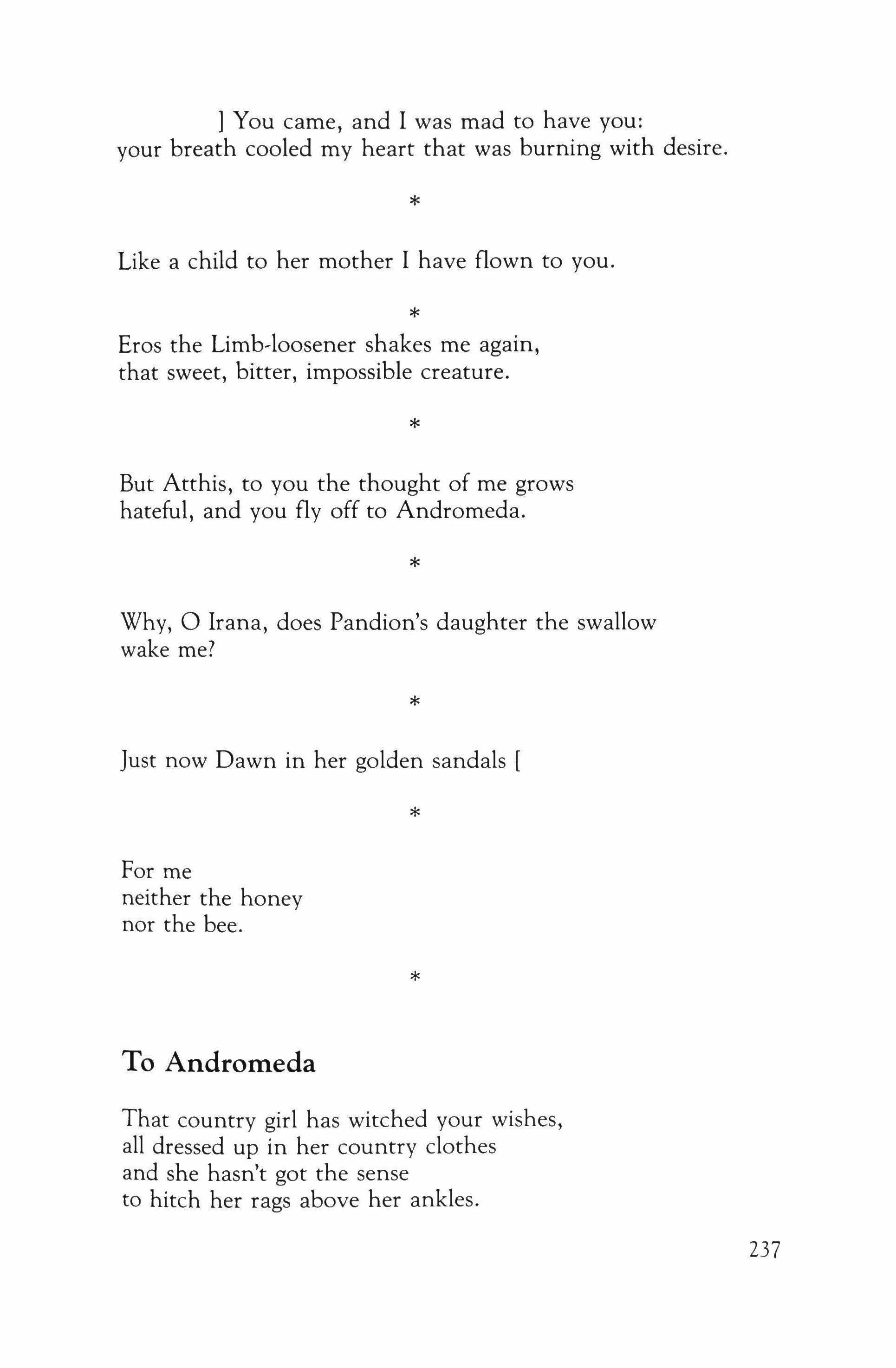
To Andromeda
That country girl has witched your wishes, all dressed up in her country clothes and she hasn't got the sense to hitch her rags above her ankles.
237
Another
When you lie dead there will be no memory of you, no one missing you afterward, for you have no part in the roses of Pieria. Unnoticed in the house of Hades, too, you'll wander, flittering after faded corpses. *
May the winds and worries bear off the one who blames me in my anguish - [ * ] - for whomever
I do well by, they are the very ones who injure me most of all.
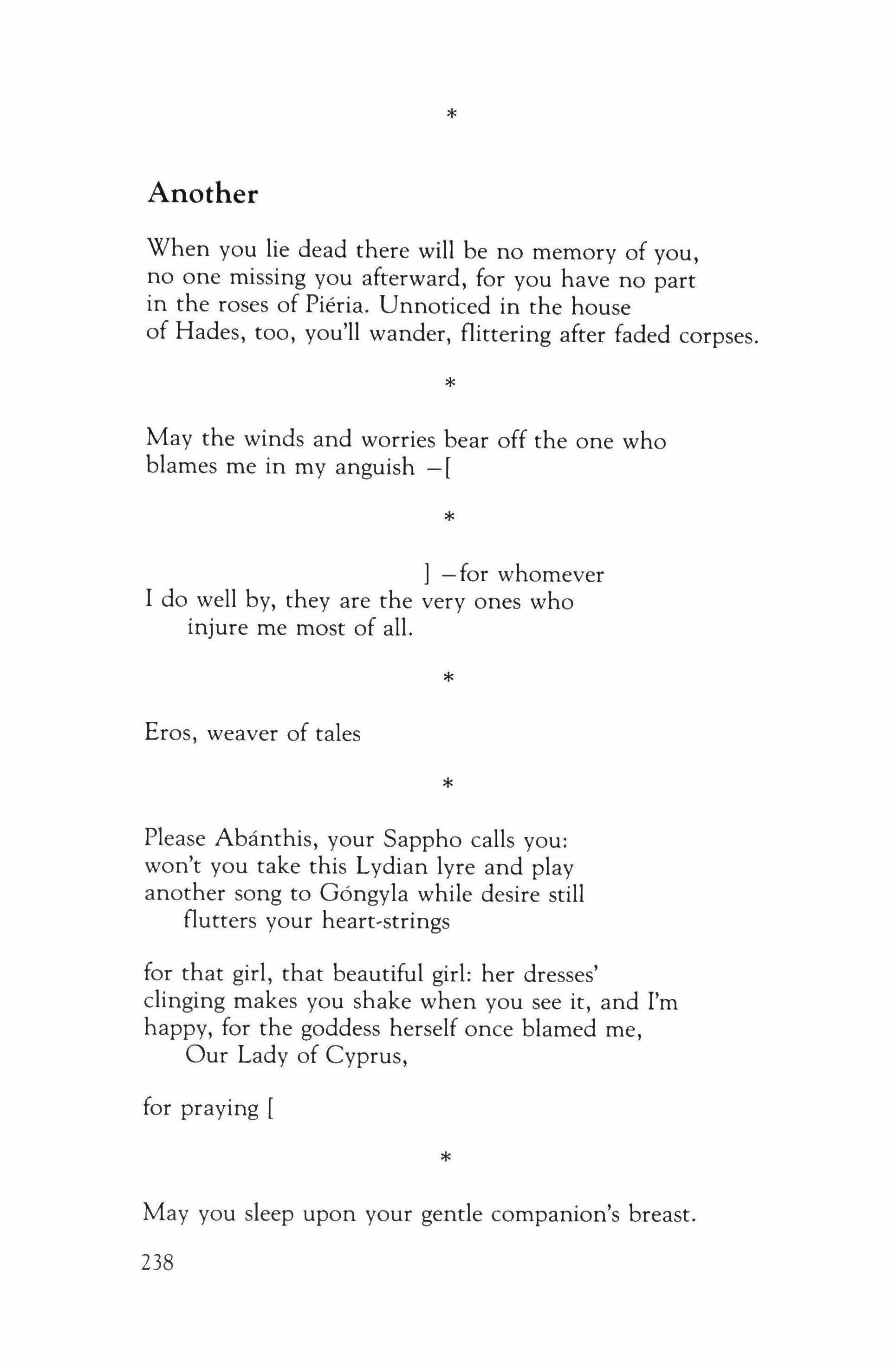
Eros, weaver of tales
Please Abanthis, your Sappho calls you: won't you take this Lydian lyre and play another song to Gongyla while desire still flutters your heart-strings
for that girl, that beautiful girl: her dresses' clinging makes you shake when you see it, and I'm happy, for the goddess herself once blamed me, Our Lady of Cyprus, for praying [
May you sleep upon your gentle companion's breast. 238
*
*
*
*
Please, my goddess, goldencrowned Aphrodite, let this very lot fall to me.
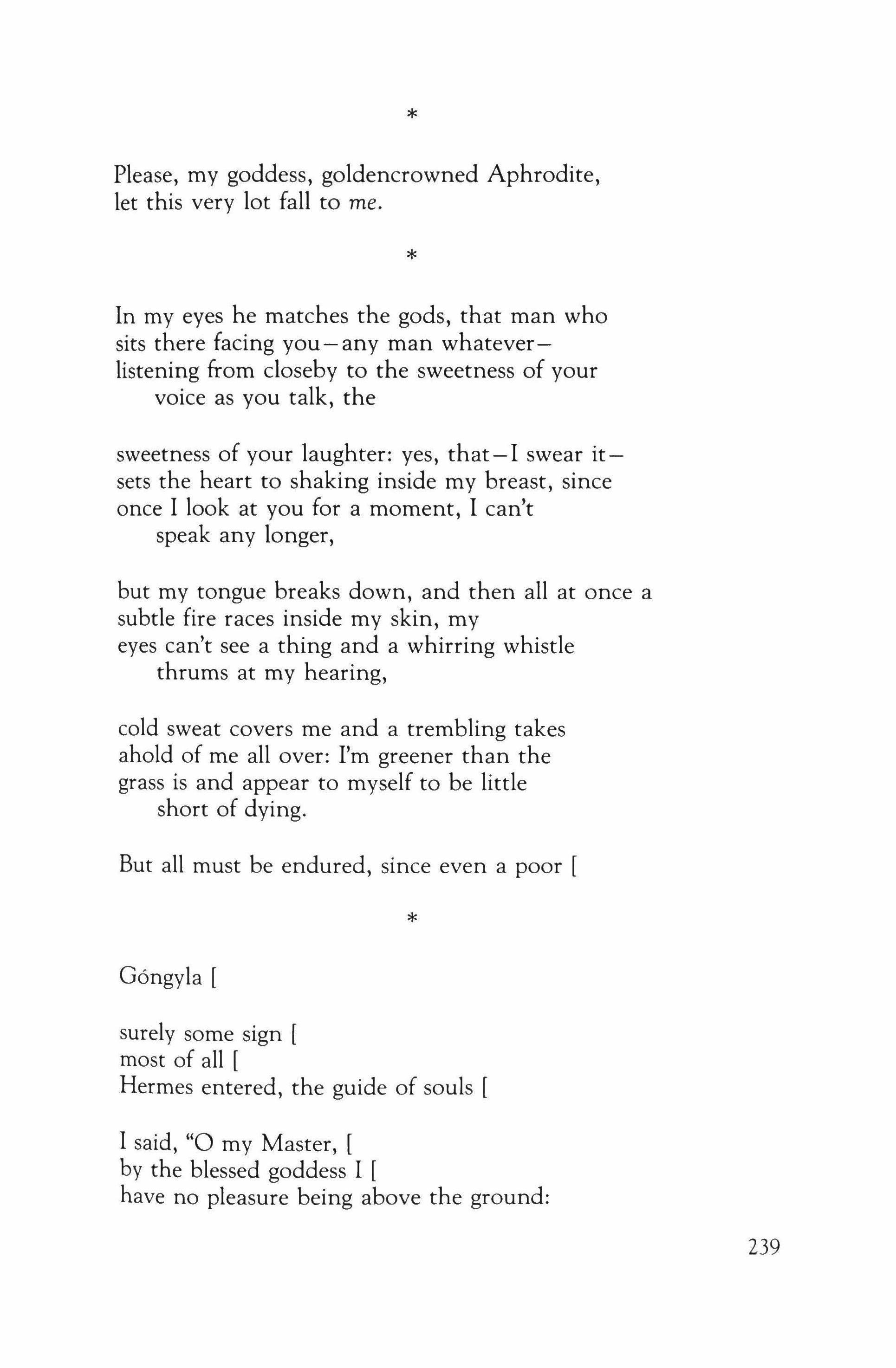
In my eyes he matches the gods, that man who sits there facing you-any man whateverlistening from closeby to the sweetness of your voice as you talk, the
sweetness of your laughter: yes, that-I swear itsets the heart to shaking inside my breast, since once I look at you for a moment, I can't speak any longer,
but my tongue breaks down, and then all at once a subtle fire races inside my skin, my eyes can't see a thing and a whirring whistle thrums at my hearing,
cold sweat covers me and a trembling takes ahold of me all over: I'm greener than the grass is and appear to myself to be little short of dying.
But all must be endured, since even a poor [
Gongyla [ surely some sign [ most of all [ Hermes entered, the guide of souls [
I said, "0 my Master, [ by the blessed goddess I [ have no pleasure being above the ground:
*
*
*
239
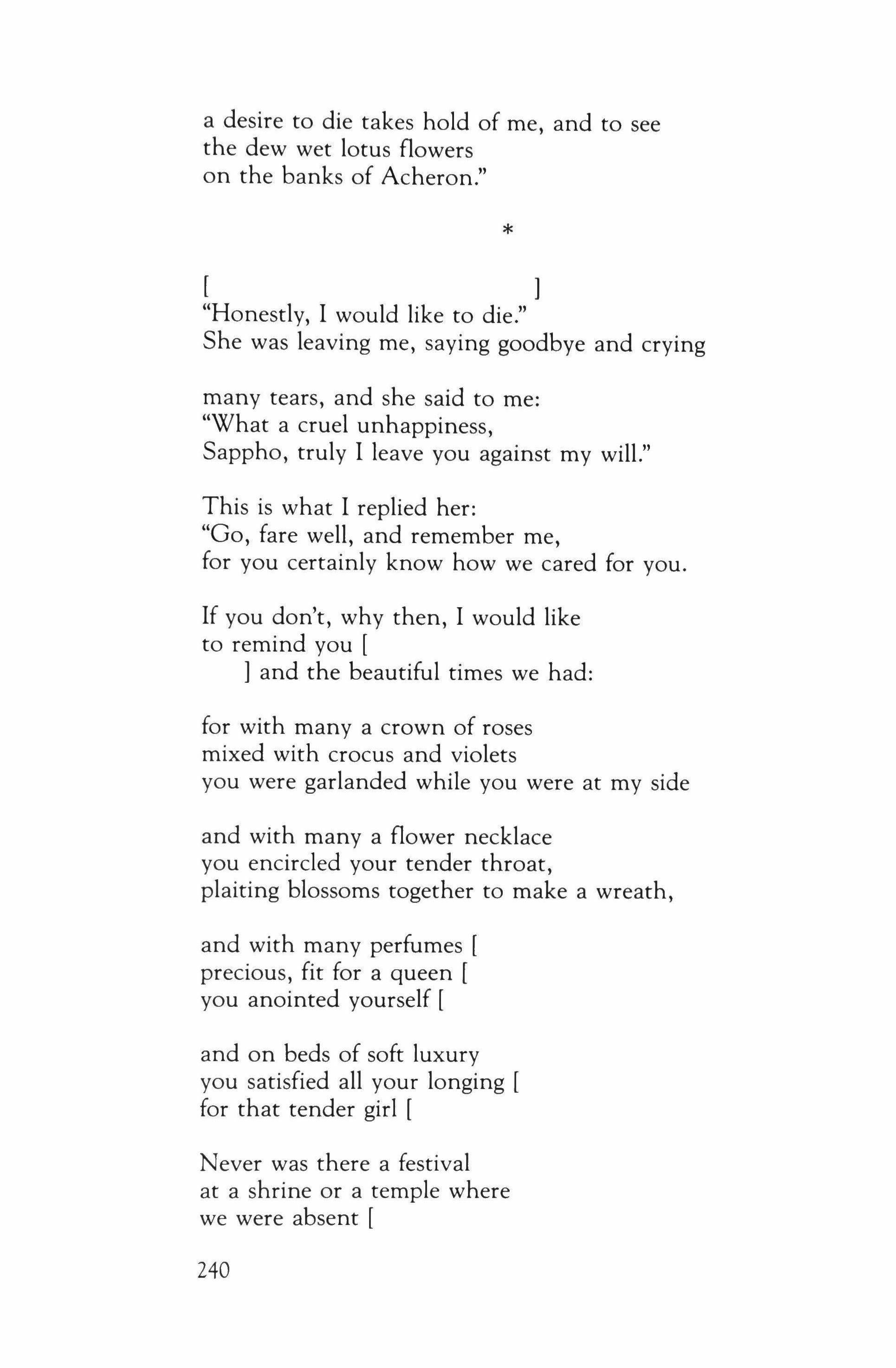
a desire to die takes hold of me, and to see the dew wet lotus flowers on the banks of Acheron."
* ]
"Honestly, I would like to die." She was leaving me, saying goodbye and crying
many tears, and she said to me: "What a cruel unhappiness, Sappho, truly I leave you against my will."
This is what I replied her: "Go, fare well, and remember me, for you certainly know how we cared for you.
If you don't, why then, I would like to remind you [ ] and the beautiful times we had:
for with many a crown of roses mixed with crocus and violets you were garlanded while you were at my side and with many a flower necklace you encircled your tender throat, plaiting blossoms together to make a wreath, and with many perfumes [ precious, fit for a queen [ you anointed yourself [ and on beds of soft luxury you satisfied all your longing [ for that tender girl [
Never was there a festival at a shrine or a temple where we were absent [
240
nor a grove or a dance [
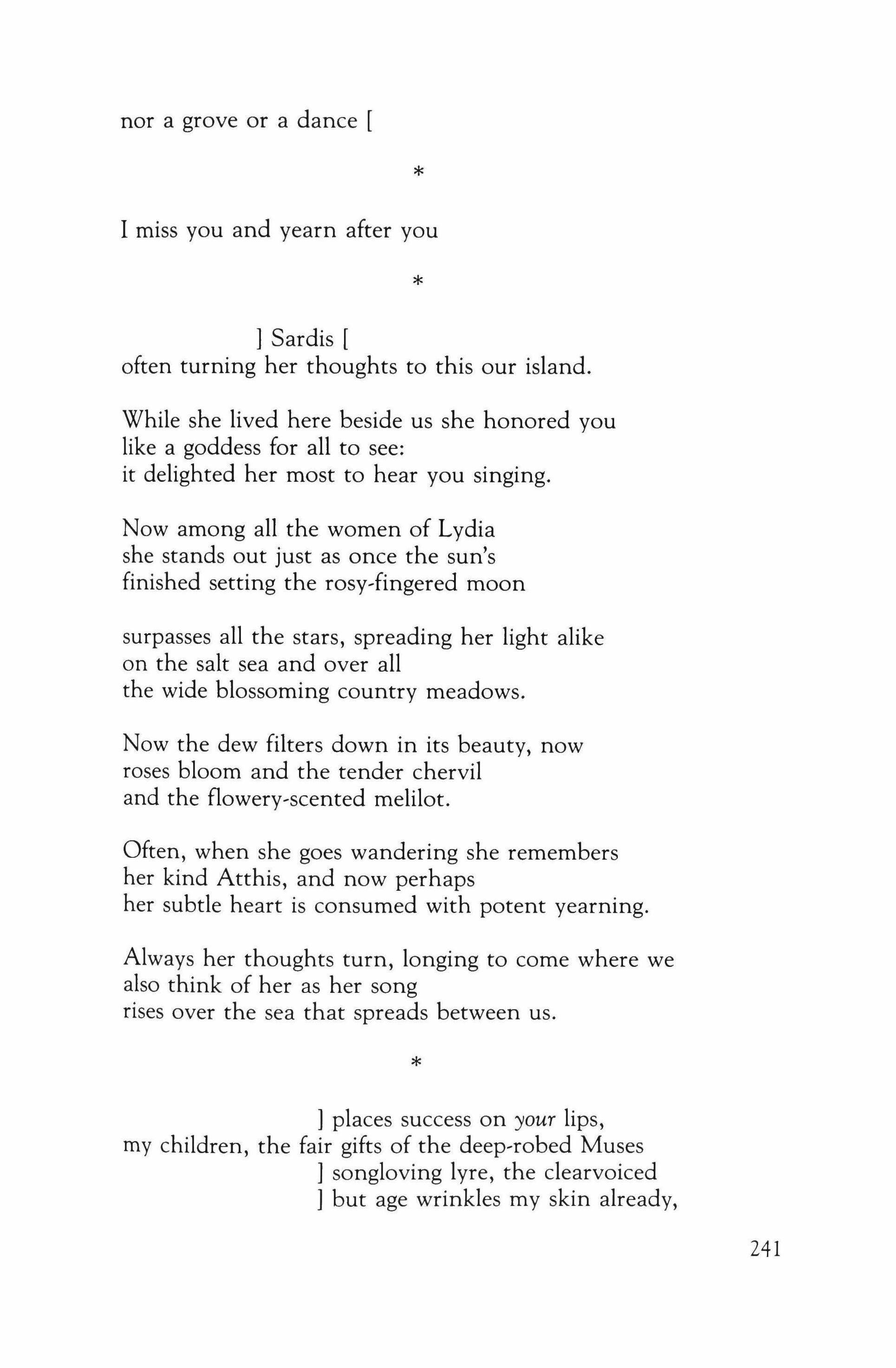
I miss you and yearn after you
] Sardis [ often turning her thoughts to this our island.
While she lived here beside us she honored you like a goddess for all to see: it delighted her most to hear you singing.
Now among all the women of Lydia she stands out just as once the sun's finished setting the rosy-fingered moon surpasses all the stars, spreading her light alike on the salt sea and over all the wide blossoming country meadows.
Now the dew filters down in its beauty, now roses bloom and the tender chervil and the flowery-scented melilor.
Often, when she goes wandering she remembers her kind Atthis, and now perhaps her subtle heart is consumed with potent yearning.
Always her thoughts turn, longing to come where we also think of her as her song rises over the sea that spreads between us.
] places success on your lips, my children, the fair gifts of the deep-robed Muses ] songloving lyre, the clearvoiced ] but age wrinkles my skin already,
*
*
*
241
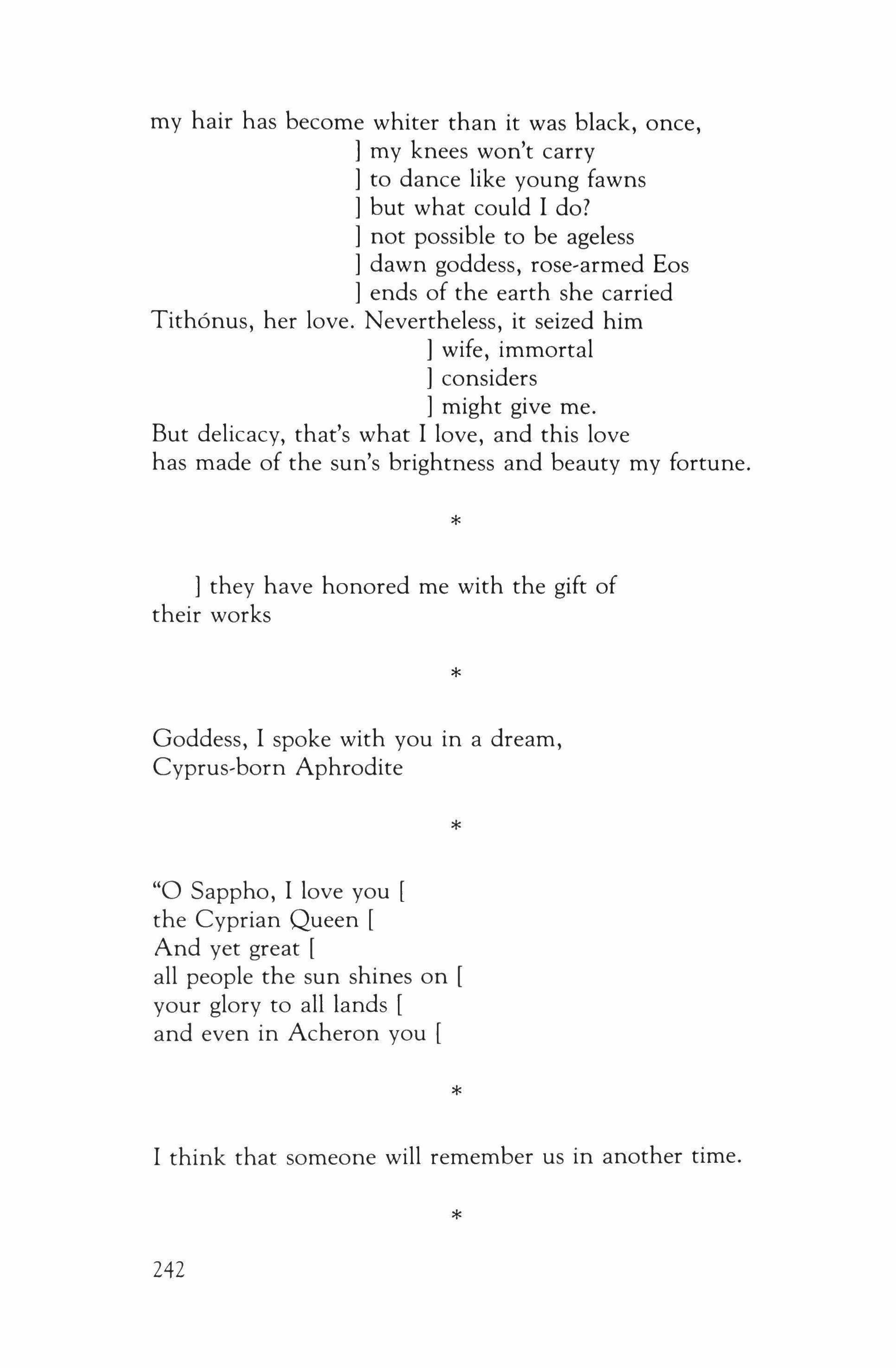
my hair has become whiter than it was black, once, ] my knees won't carry
] to dance like young fawns
] but what could I do?
] not possible to be ageless ] dawn goddess, rose-armed Eos ] ends of the earth she carried Tirhonus, her love. Nevertheless, it seized him ] wife, immortal ] considers ] might give me. But delicacy, that's what I love, and this love has made of the sun's brightness and beauty my fortune.
*
] they have honored me with the gift of their works
* Goddess, I spoke with you in a dream, Cyprus-born Aphrodite
* "0 Sappho, I love you [ the Cyprian Queen [ And yet great [ all people the sun shines on [ your glory to all lands [ and even in Acheron you [
* I think that someone will remember us in another time.
*
242
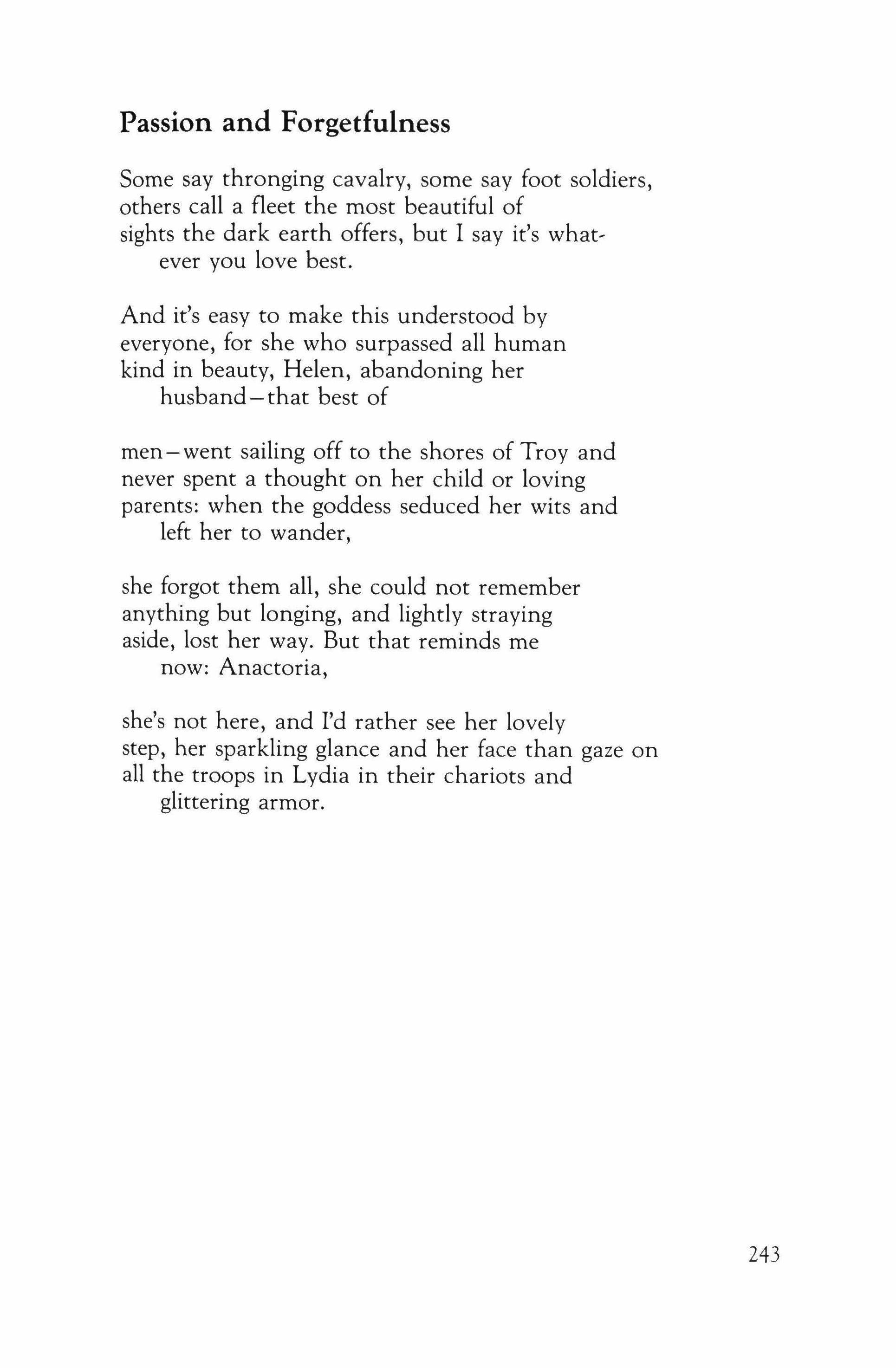
Passion and Forgetfulness
Some say thronging cavalry, some say foot soldiers, others call a fleet the most beautiful of sights the dark earth offers, but I say it's what, ever you love best.
And it's easy to make this understood by everyone, for she who surpassed all human kind in beauty, Helen, abandoning her husband-that best of
men - went sailing off to the shores of Troy and never spent a thought on her child or loving parents: when the goddess seduced her wits and left her to wander,
she forgot them all, she could not remember anything but longing, and lightly straying aside, lost her way. But that reminds me now: Anactoria,
she's not here, and I'd rather see her lovely step, her sparkling glance and her face than gaze on all the troops in Lydia in their chariots and glittering armor.
243
Afterwords
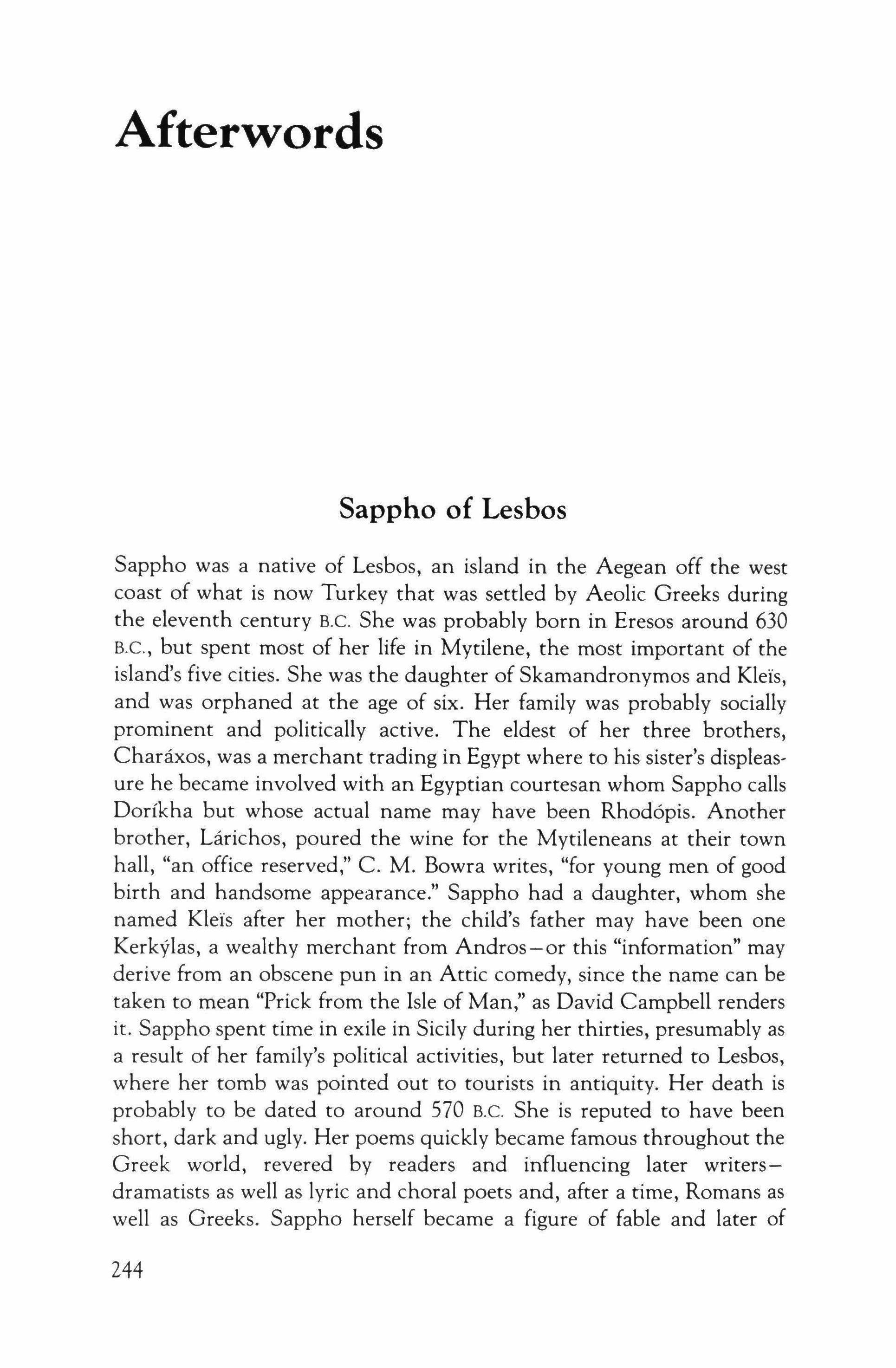
Sappho of Lesbos
Sappho was a native of Lesbos, an island in the Aegean off the west coast of what is now Turkey that was settled by Aeolic Greeks during the eleventh century B.C. She was probably born in Eresos around 630 B.C., but spent most of her life in Mytilene, the most important of the island's five cities. She was the daughter of Skamandronymos and Kleis, and was orphaned at the age of six. Her family was probably socially prominent and politically active. The eldest of her three brothers, Charaxos, was a merchant trading in Egypt where to his sister's displeasure he became involved with an Egyptian courtesan whom Sappho calls Dorfkha but whose actual name may have been Rhodopis. Another brother, Larichos, poured the wine for the Mytileneans at their town hall, "an office reserved," C. M. Bowra writes, "for young men of good birth and handsome appearance." Sappho had a daughter, whom she named KleIS after her mother; the child's father may have been one Kerkvlas, a wealthy merchant from Andros-or this "information" may derive from an obscene pun in an Attic comedy, since the name can be taken to mean "Prick from the Isle of Man," as David Campbell renders it. Sappho spent time in exile in Sicily during her thirties, presumably as a result of her family's political activities, but later returned to Lesbos, where her tomb was pointed out to tourists in antiquity. Her death is probably to be dated to around 570 B.C. She is reputed to have been short, dark and ugly. Her poems quickly became famous throughout the Greek world, revered by readers and influencing later writersdramatists as well as lyric and choral poets and, after a time, Romans as well as Greeks. Sappho herself became a figure of fable and later of
244
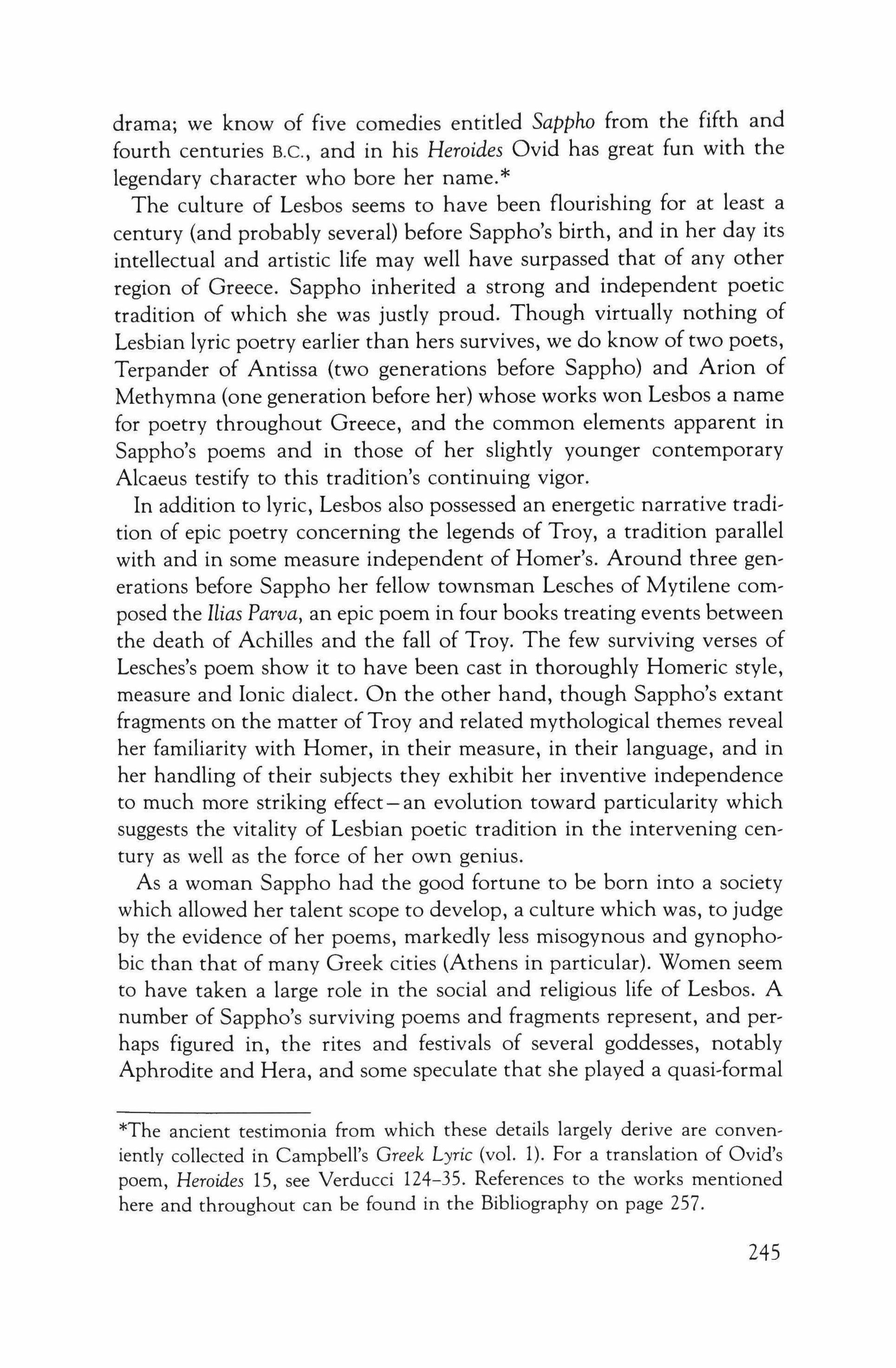
drama; we know of five comedies entitled Sappho from the fifth and fourth centuries B.C., and in his Heroides Ovid has great fun with the legendary character who bore her name.*
The culture of Lesbos seems to have been flourishing for at least a century (and probably several) before Sappho's birth, and in her day its intellectual and artistic life may well have surpassed that of any other region of Greece. Sappho inherited a strong and independent poetic tradition of which she was justly proud. Though virtually nothing of Lesbian lyric poetry earlier than hers survives, we do know of two poets, Terpander of Antissa (two generations before Sappho) and Arion of Methymna (one generation before her) whose works won Lesbos a name for poetry throughout Greece, and the common elements apparent in Sappho's poems and in those of her slightly younger contemporary Alcaeus testify to this tradition's continuing vigor.
In addition to lyric, Lesbos also possessed an energetic narrative tradition of epic poetry concerning the legends of Troy, a tradition parallel with and in some measure independent of Homer's. Around three generations before Sappho her fellow townsman Lesches of Mytilene composed the Ilias Parva, an epic poem in four books treating events between the death of Achilles and the fall of Troy. The few surviving verses of Lesches's poem show it to have been cast in thoroughly Homeric style, measure and Ionic dialect. On the other hand, though Sappho's extant fragments on the matter of Troy and related mythological themes reveal her familiarity with Homer, in their measure, in their language, and in her handling of their subjects they exhibit her inventive independence to much more striking effect-an evolution toward particularity which suggests the vitality of Lesbian poetic tradition in the intervening century as well as the force of her own genius.
As a woman Sappho had the good fortune to be born into a society which allowed her talent scope to develop, a culture which was, to judge by the evidence of her poems, markedly less misogynous and gynophobic than that of many Greek cities (Athens in particular). Women seem to have taken a large role in the social and religious life of Lesbos. A number of Sappho's surviving poems and fragments represent, and perhaps figured in, the rites and festivals of several goddesses, notably Aphrodite and Hera, and some speculate that she played a quasi-formal
*The ancient testimonia from which these details largely derive are conveniently collected in Campbell's Greek Lyric (vol. 1). For a translation of Ovid's poem, Heroides 15, see Verducci 124-35. References to the works mentioned here and throughout can be found in the Bibliography on page 257.
245
role as an initiatrix or teacher of poetry, music, dance and the other civilized arts to young women preparing to take their part in these social rituals and religious festivities. She also wrote epithalamia, almost certainly for performance as part of marriage ceremonies. Nevertheless, the ideology and ostensible values of Lesbian society must still have been largely aristocratic, dominance-oriented, androcratic, and somewhat militarist (one Lesbian family powerful during her lifetime, the Penthilidai, claimed descent from the Achaian generalissimo at Troy, Agamemnon). Sappho's independence of mind appears not only in her explicit rejection of such values but in the concern with persons and the personal evident in almost all her extant work. To judge by the surviving fragments of her poetry (seconded by the legends and opinion of antiquity) her passional life centered on women.
Sappho's Measures
The surest sign of the strength and articulation of the Aeolic poetic traditions Sappho inherited sounds in her measures, and this aspect of her art has exerted a marked influence on later poetry. Aeolic metrics envisions the poetic line not as a composite entity formed by the repetition of a given number of identical "feet" but as an integrated whole. Nearly all Aeolic lyric verse forms have at least one choriamb ( _vv - ) at their cores; they differ in the ways that they begin and conclude. The measure Sappho employed most frequently (e.g. "Artfully adorned Aphrodite"), and which bears her name, the sapphic stanza, can be graphed:
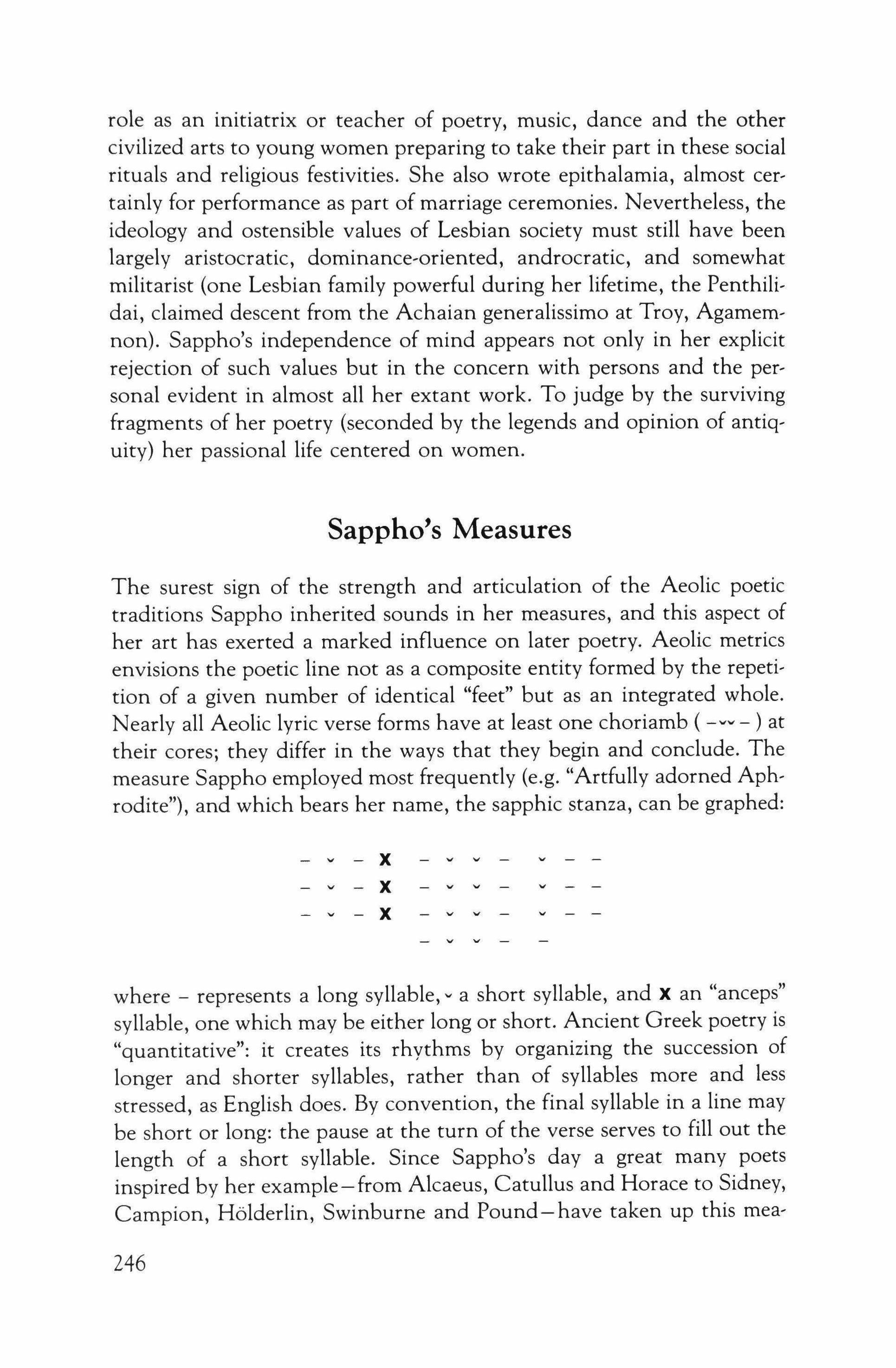
where - represents a long syllable, a short syllable, and X an "anceps" syllable, one which may be either long or short. Ancient Greek poetry is "quantitative": it creates its rhythms by organizing the succession of longer and shorter syllables, rather than of syllables more and less stressed, as English does. By convention, the final syllable in a line may be short or long: the pause at the turn of the verse serves to fill out the length of a short syllable. Since Sappho's day a great many poets inspired by her example-from Alcaeus, Catullus and Horace to Sidney, Campion, Holderlin, Swinburne and Pound-have taken up this mea-
x - v- Xv- X - v v -
246
sure, but none succeed in matching her fluidity, ease, grace and melodic variety. Sappho's secret consists largely in keeping her caesura moving: in her sapphics the caesura (a pause in mid-verse) seldom falls in the same place in two consecutive lines.
Another among the better known Aeolic lyric measures is named for her poetic compatriot, the alcaic stanza (see In Answer to Alcaeus):
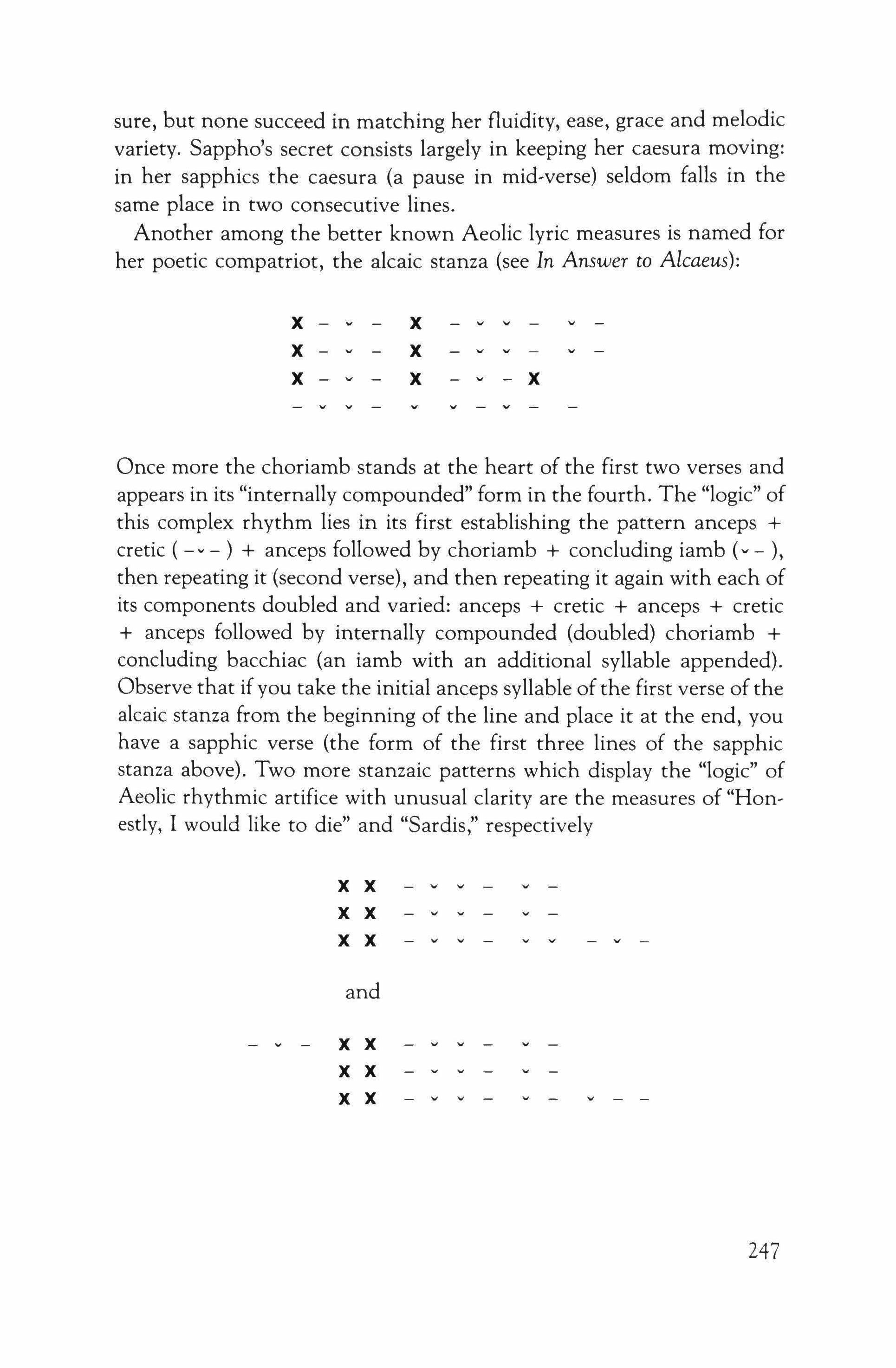
Once more the choriamb stands at the heart of the first two verses and appears in its "internally compounded" form in the fourth. The "logic" of this complex rhythm lies in its first establishing the pattern anceps + cretic ( _v - ) + anceps followed by choriamb + concluding iamb (v - ), then repeating it (second verse), and then repeating it again with each of its components doubled and varied: anceps + cretic + anceps + cretic + anceps followed by internally compounded (doubled) choriamb + concluding bacchiac (an iamb with an additional syllable appended). Observe that if you take the initial anceps syllable of the first verse of the alcaic stanza from the beginning of the line and place it at the end, you have a sapphic verse (the form of the first three lines of the sapphic stanza above). Two more stanzaic patterns which display the "logic" of Aeolic rhythmic artifice with unusual clarity are the measures of "Honestly, I would like to die" and "Sardis," respectively
x - X -X - X - v vX - X X
X X - v vX X - v vX X - v vand X X -X X -X X - v v247
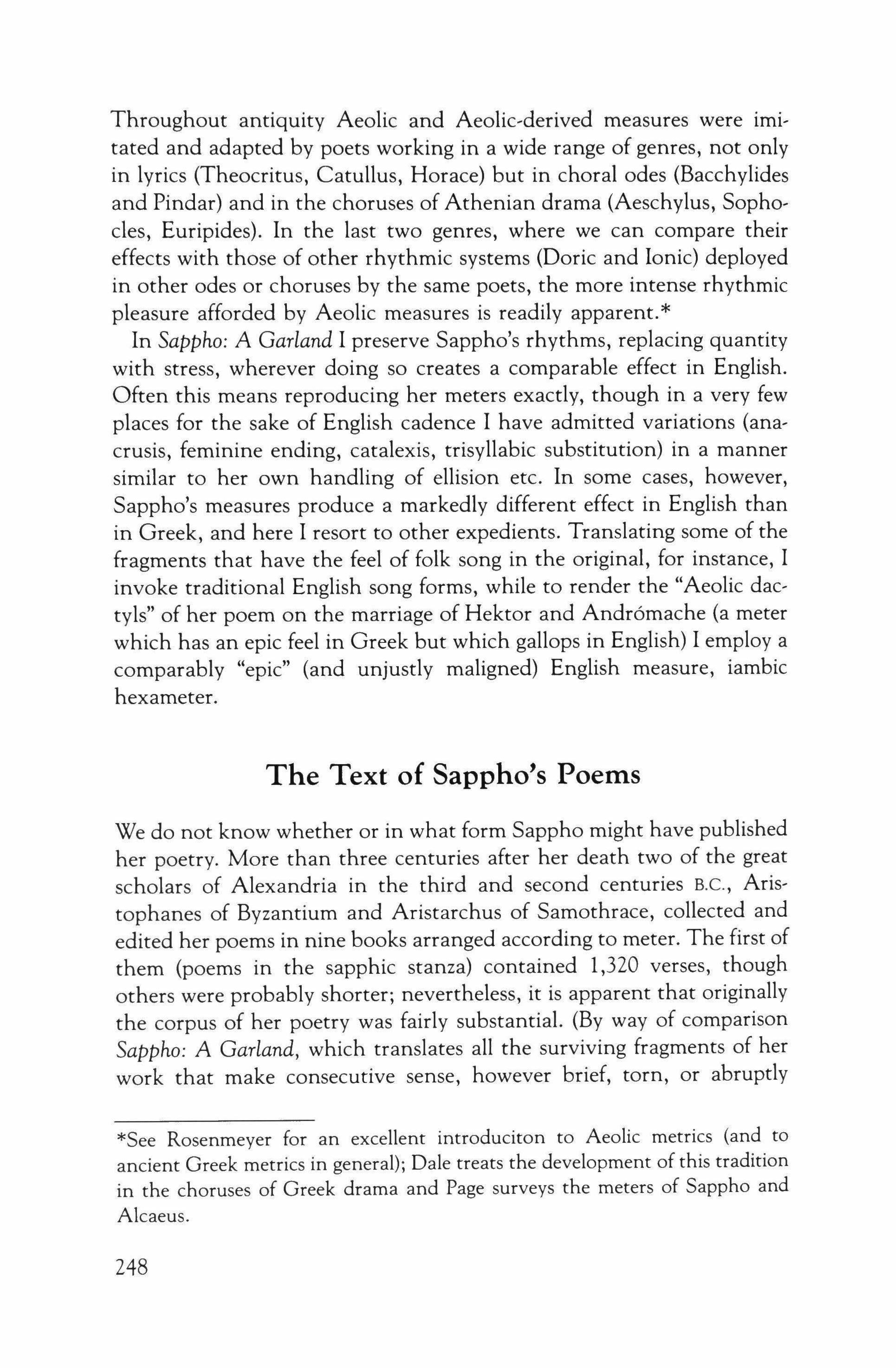
Throughout antiquity
Aeolic and Aeolic-derived measures were imitated and adapted by poets working in a wide range of genres, not only in lyrics (Theocritus, Catullus, Horace) but in choral odes (Bacchvlides and Pindar) and in the choruses of Athenian drama (Aeschylus, Sophocles, Euripides). In the last two genres, where we can compare their effects with those of other rhythmic systems (Doric and Ionic) deployed in other odes or choruses by the same poets, the more intense rhythmic pleasure afforded by Aeolic measures is readily apparent. *
In Sappho: A Garland I preserve Sappho's rhythms, replacing quantity with stress, wherever doing so creates a comparable effect in English. Often this means reproducing her meters exactly, though in a very few places for the sake of English cadence I have admitted variations (anacrusis, feminine ending, catalexis, trisyllabic substitution) in a manner similar to her own handling of ellision etc. In some cases, however, Sappho's measures produce a markedly different effect in English than in Greek, and here I resort to other expedients. Translating some of the fragments that have the feel of folk song in the original, for instance, I invoke traditional English song forms, while to render the "Aeolic dactyls" of her poem on the marriage of Hektor and Andromache (a meter which has an epic feel in Greek but which gallops in English) I employ a comparably "epic" (and unjustly maligned) English measure, iambic hexameter.
The Text of Sappho's Poems
We do not know whether or in what form Sappho might have published her poetry. More than three centuries after her death two of the great scholars of Alexandria in the third and second centuries B.C., Aristophanes of Byzantium and Aristarchus of Samothrace, collected and edited her poems in nine books arranged according to meter. The first of them (poems in the sapphic stanza) contained 1,320 verses, though others were probably shorter; nevertheless, it is apparent that originally the corpus of her poetry was fairly substantial. (By way of comparison Sappho: A Garland, which translates all the surviving fragments of her work that make consecutive sense, however brief, torn, or abruptly
*See Rosenmeyer for an excellent introduciton to Aeolic metrics (and to ancient Greek metrics in general); Dale treats the development of this tradition in the choruses of Greek drama and Page surveys the meters of Sappho and Alcaeus.
248
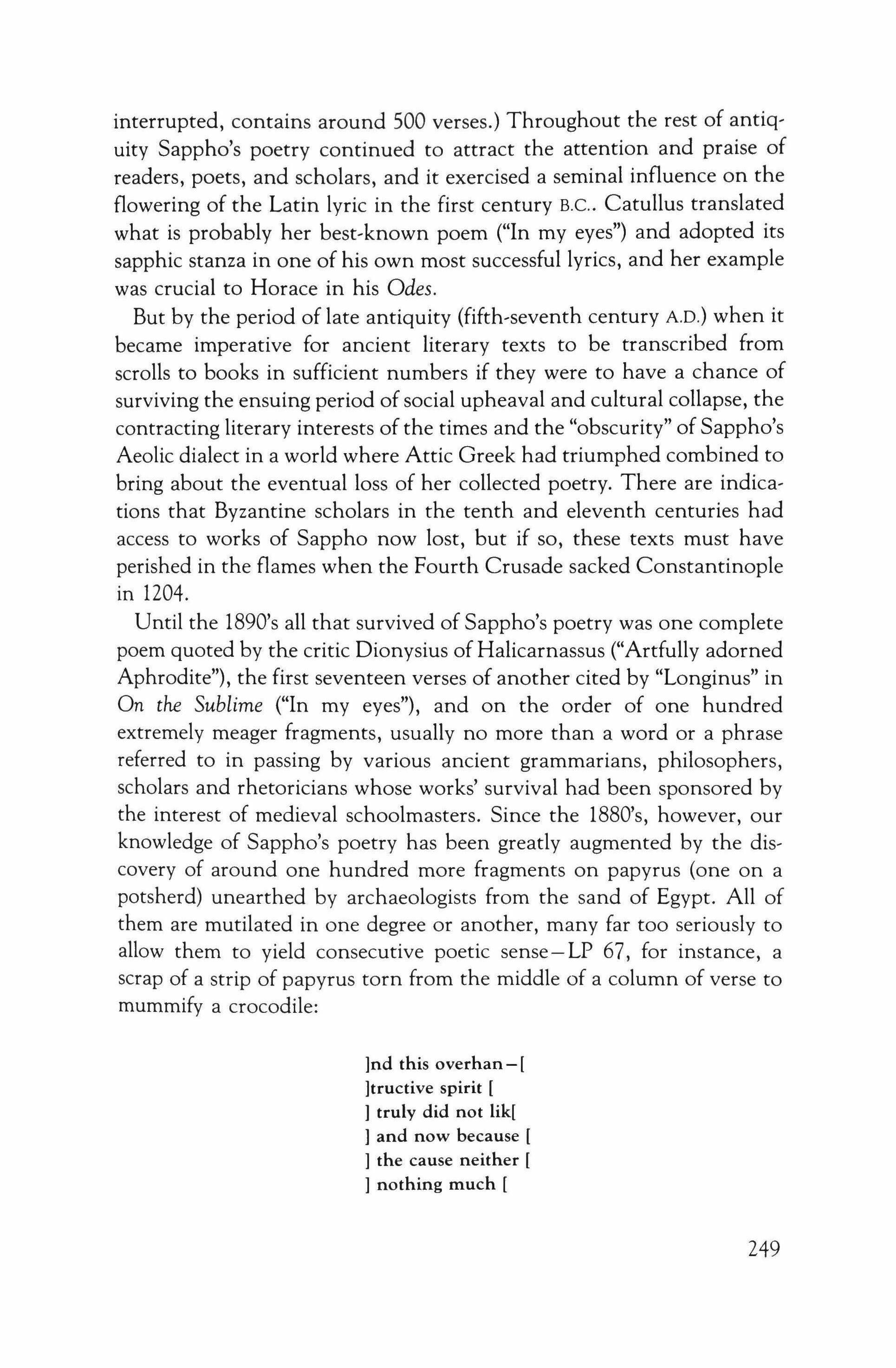
interrupted, contains around 500 verses.) Throughout the rest of antiquity Sappho's poetry continued to attract the attention and praise of readers, poets, and scholars, and it exercised a seminal influence on the flowering of the Latin lyric in the first century B.C.. Catullus translated what is probably her best-known poem ("In my eyes") and adopted its sapphic stanza in one of his own most successful lyrics, and her example was crucial to Horace in his Odes.
But by the period of late antiquity (fifth-seventh century A.D.) when it became imperative for ancient literary texts to be transcribed from scrolls to books in sufficient numbers if they were to have a chance of surviving the ensuing period of social upheaval and cultural collapse, the contracting literary interests of the times and the "obscurity" of Sappho's Aeolic dialect in a world where Attic Greek had triumphed combined to bring about the eventual loss of her collected poetry. There are indications that Byzantine scholars in the tenth and eleventh centuries had access to works of Sappho now lost, but if so, these texts must have perished in the flames when the Fourth Crusade sacked Constantinople in 1204.
Until the 1890's all that survived of Sappho's poetry was one complete poem quoted by the critic Dionysius of Halicarnassus ("Artfully adorned Aphrodite"), the first seventeen verses of another cited by "Longinus" in On the Sublime ("In my eyes"), and on the order of one hundred extremely meager fragments, usually no more than a word or a phrase referred to in passing by various ancient grammarians, philosophers, scholars and rhetoricians whose works' survival had been sponsored by the interest of medieval schoolmasters. Since the 1880's, however, our knowledge of Sappho's poetry has been greatly augmented by the discovery of around one hundred more fragments on papyrus (one on a potsherd) unearthed by archaeologists from the sand of Egypt. All of them are mutilated in one degree or another, many far too seriously to allow them to yield consecutive poetic sense - LP 67, for instance, a scrap of a strip of papyrus torn from the middle of a column of verse to mummify a crocodile:
[nd this overhan - I [tructive spirit I 1 truly did not tikI 1 and now because I
1 the cause neither I
1 nothing much I
249
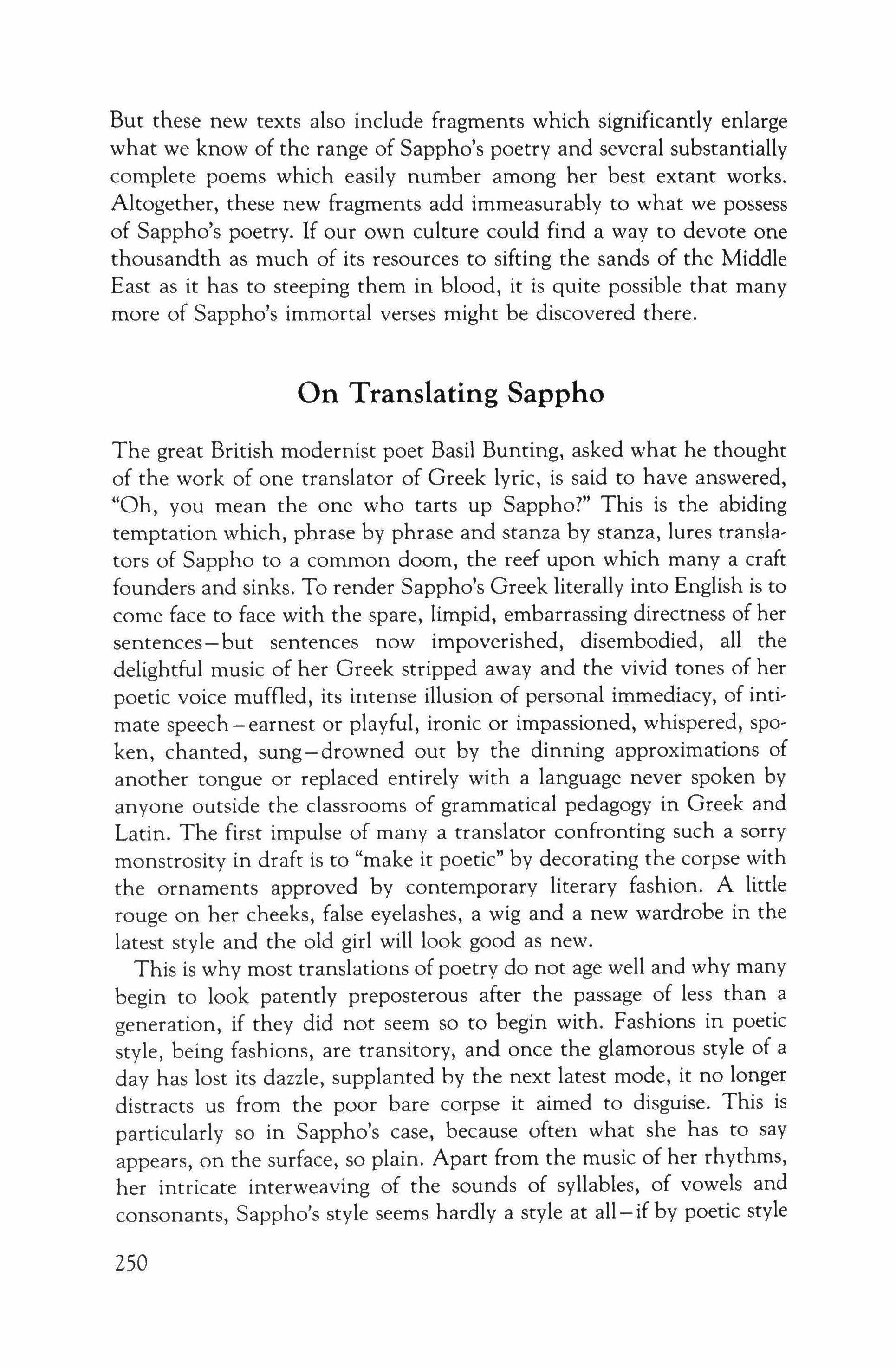
But these new texts also include fragments which significantly enlarge what we know of the range of Sappho's poetry and several substantially complete poems which easily number among her best extant works. Altogether, these new fragments add immeasurably to what we possess of Sappho's poetry. If our own culture could find a way to devote one thousandth as much of its resources to sifting the sands of the Middle East as it has to steeping them in blood, it is quite possible that many more of Sappho's immortal verses might be discovered there.
On Translating Sappho
The great British modernist poet Basil Bunting, asked what he thought of the work of one translator of Greek lyric, is said to have answered, "Oh, you mean the one who tarts up Sappho?" This is the abiding temptation which, phrase by phrase and stanza by stanza, lures translators of Sappho to a common doom, the reef upon which many a craft founders and sinks. To render Sappho's Greek literally into English is to come face to face with the spare, limpid, embarrassing directness of her sentences- but sentences now impoverished, disembodied, all the delightful music of her Greek stripped away and the vivid tones of her poetic voice muffled, its intense illusion of personal immediacy, of intimate speech-earnest or playful, ironic or impassioned, whispered, spoken, chanted, sung-drowned out by the dinning approximations of another tongue or replaced entirely with a language never spoken by anyone outside the classrooms of grammatical pedagogy in Greek and Latin. The first impulse of many a translator confronting such a sorry monstrosity in draft is to "make it poetic" by decorating the corpse with the ornaments approved by contemporary literary fashion. A little rouge on her cheeks, false eyelashes, a wig and a new wardrobe in the latest style and the old girl will look good as new.
This is why most translations of poetry do not age well and why many begin to look patently preposterous after the passage of less than a generation, if they did not seem so to begin with. Fashions in poetic style, being fashions, are transitory, and once the glamorous style of a day has lost its dazzle, supplanted by the next latest mode, it no longer distracts us from the poor bare corpse it aimed to disguise. This is particularly so in Sappho's case, because often what she has to say appears, on the surface, so plain. Apart from the music of her rhythms, her intricate interweaving of the sounds of syllables, of vowels and consonants, Sappho's style seems hardly a style at all-if by poetic style
250
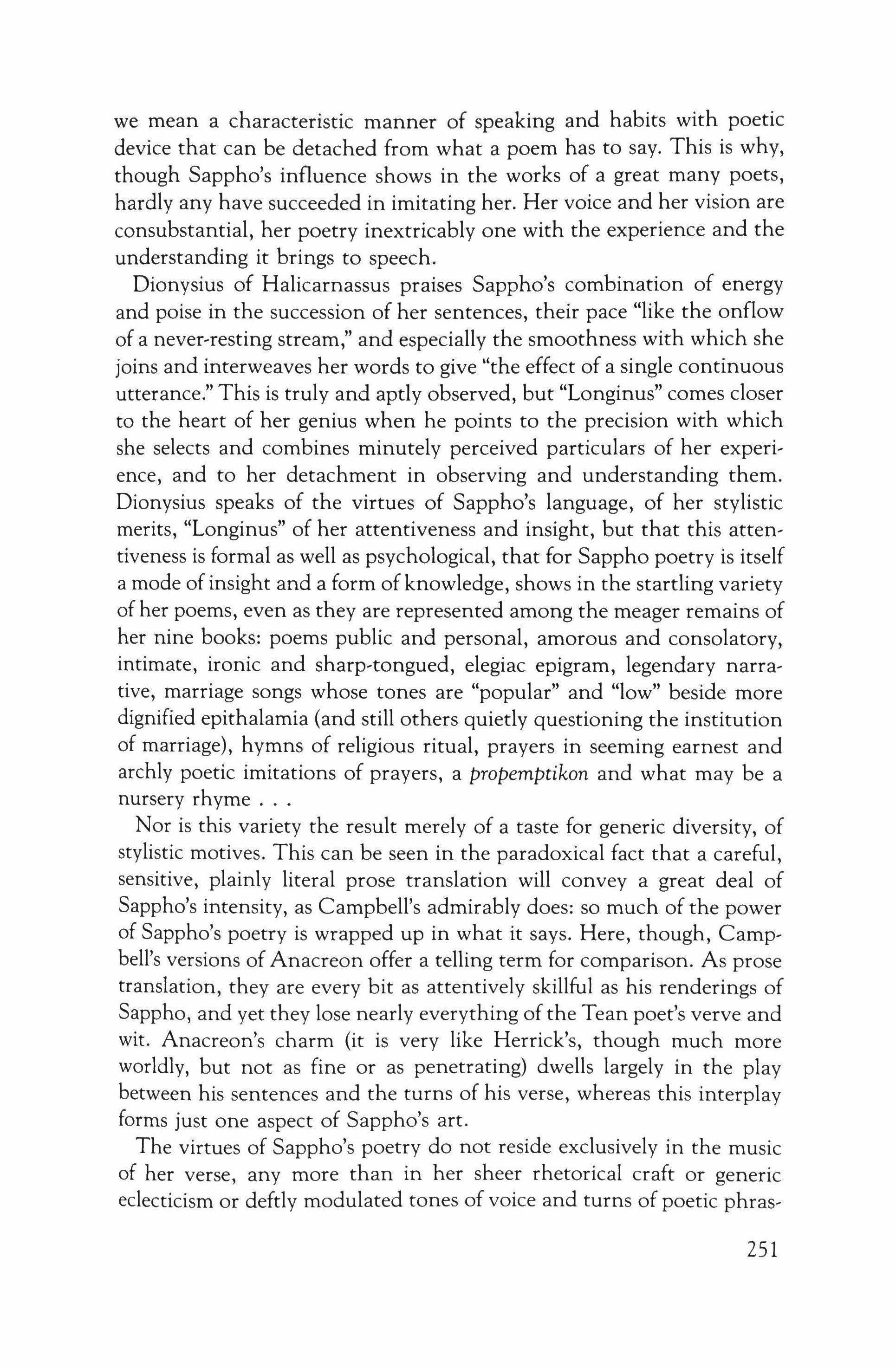
we mean a characteristic manner of speaking and habits with poetic device that can be detached from what a poem has to say. This is why, though Sappho's influence shows in the works of a great many poets, hardly any have succeeded in imitating her. Her voice and her vision are consubstantial, her poetry inextricably one with the experience and the understanding it brings to speech.
Dionysius of Halicarnassus praises Sappho's combination of energy and poise in the succession of her sentences, their pace "like the onflow of a never-resting stream," and especially the smoothness with which she joins and interweaves her words to give "the effect of a single continuous utterance." This is truly and aptly observed, but "Longinus" comes closer to the heart of her genius when he points to the precision with which she selects and combines minutely perceived particulars of her experience, and to her detachment in observing and understanding them. Dionysius speaks of the virtues of Sappho's language, of her stylistic merits, "Longinus" of her attentiveness and insight, but that this attentiveness is formal as well as psychological, that for Sappho poetry is itself a mode of insight and a form of knowledge, shows in the startling variety of her poems, even as they are represented among the meager remains of her nine books: poems public and personal, amorous and consolatory, intimate, ironic and sharp-tongued, elegiac epigram, legendary narrative, marriage songs whose tones are "popular" and "low" beside more dignified epithalamia (and still others quietly questioning the institution of marriage), hymns of religious ritual, prayers in seeming earnest and archly poetic imitations of prayers, a propemptikon and what may be a nursery rhyme
Nor is this variety the result merely of a taste for generic diversity, of stylistic motives. This can be seen in the paradoxical fact that a careful, sensitive, plainly literal prose translation will convey a great deal of Sappho's intensity, as Campbell's admirably does: so much of the power of Sappho's poetry is wrapped up in what it says. Here, though, Campbell's versions of Anacreon offer a telling term for comparison. As prose translation, they are every bit as attentively skillful as his renderings of Sappho, and yet they lose nearly everything ofthe Tean poet's verve and wit. Anacreon's charm (it is very like Herrick's, though much more worldly, but not as fine or as penetrating) dwells largely in the play between his sentences and the turns of his verse, whereas this interplay forms just one aspect of Sappho's art.
The virtues of Sappho's poetry do not reside exclusively in the music of her verse, any more than in her sheer rhetorical craft or generic eclecticism or deftly modulated tones of voice and turns of poetic phras-
251
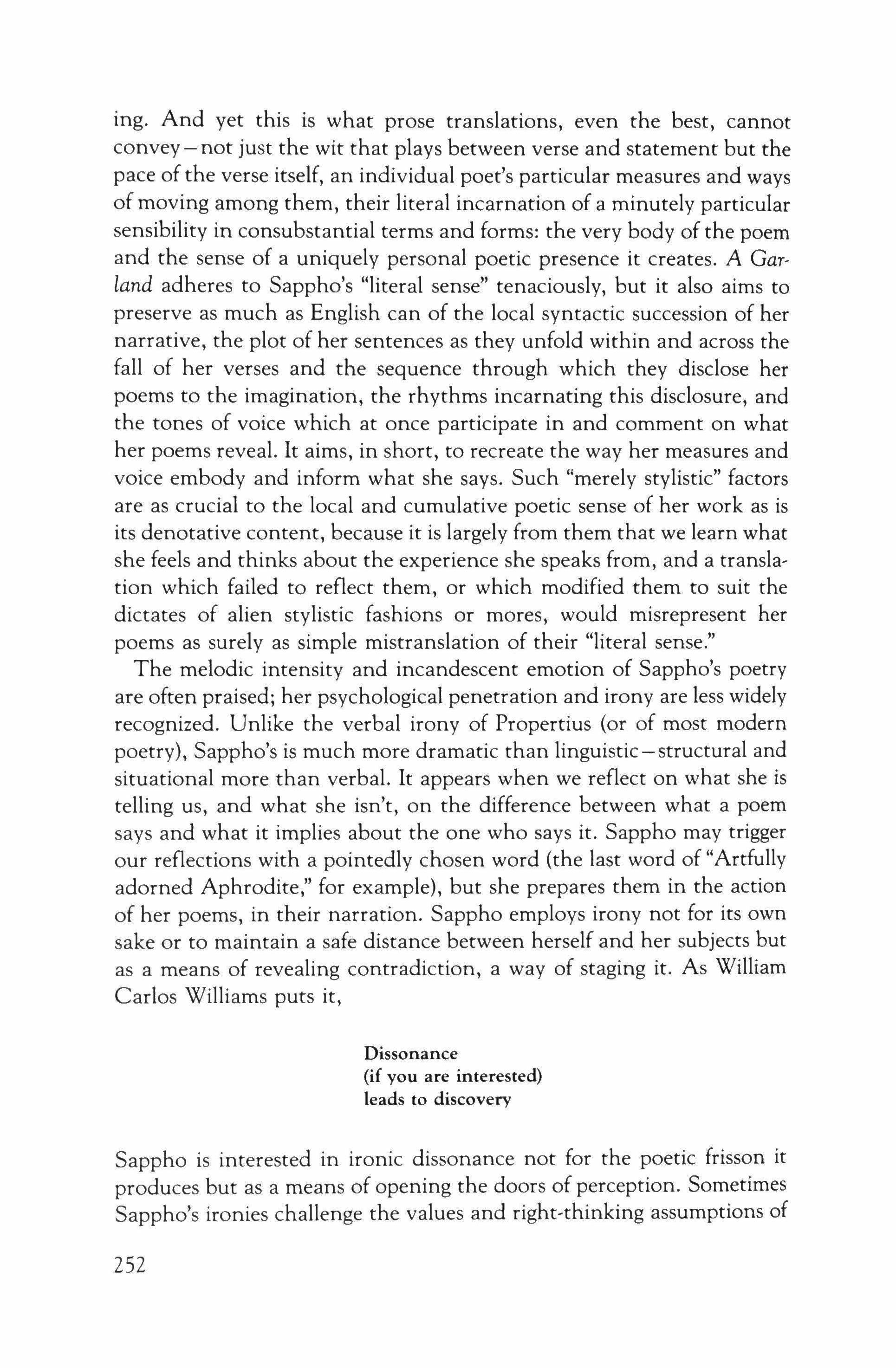
ing. And yet this is what prose translations, even the best, cannot convey-not just the wit that plays between verse and statement but the pace of the verse itself, an individual poet's particular measures and ways of moving among them, their literal incarnation of a minutely particular sensibility in consubstantial terms and forms: the very body of the poem and the sense of a uniquely personal poetic presence it creates. A Garland adheres to Sappho's "literal sense" tenaciously, but it also aims to preserve as much as English can of the local syntactic succession of her narrative, the plot of her sentences as they unfold within and across the fall of her verses and the sequence through which they disclose her poems to the imagination, the rhythms incarnating this disclosure, and the tones of voice which at once participate in and comment on what her poems reveal. It aims, in short, to recreate the way her measures and voice embody and inform what she says. Such "merely stylistic" factors are as crucial to the local and cumulative poetic sense of her work as is its denotative content, because it is largely from them that we learn what she feels and thinks about the experience she speaks from, and a translation which failed to reflect them, or which modified them to suit the dictates of alien stylistic fashions or mores, would misrepresent her poems as surely as simple mistranslation of their "literal sense."
The melodic intensity and incandescent emotion of Sappho's poetry are often praised; her psychological penetration and irony are less widely recognized. Unlike the verbal irony of Propertius (or of most modern poetry), Sappho's is much more dramatic than linguistic-structural and situational more than verbal. It appears when we reflect on what she is telling us, and what she isn't, on the difference between what a poem says and what it implies about the one who says it. Sappho may trigger our reflections with a pointedly chosen word (the last word of "Artfully adorned Aphrodite," for example), but she prepares them in the action of her poems, in their narration. Sappho employs irony not for its own sake or to maintain a safe distance between herself and her subjects but as a means of revealing contradiction, a way of staging it. As William Carlos Williams puts it,
Dissonance
(if you are interested) leads to discovery
Sappho is interested in ironic dissonance not for the poetic frisson it produces but as a means of opening the doors of perception. Sometimes Sappho's ironies challenge the values and right-thinking assumptions of
252
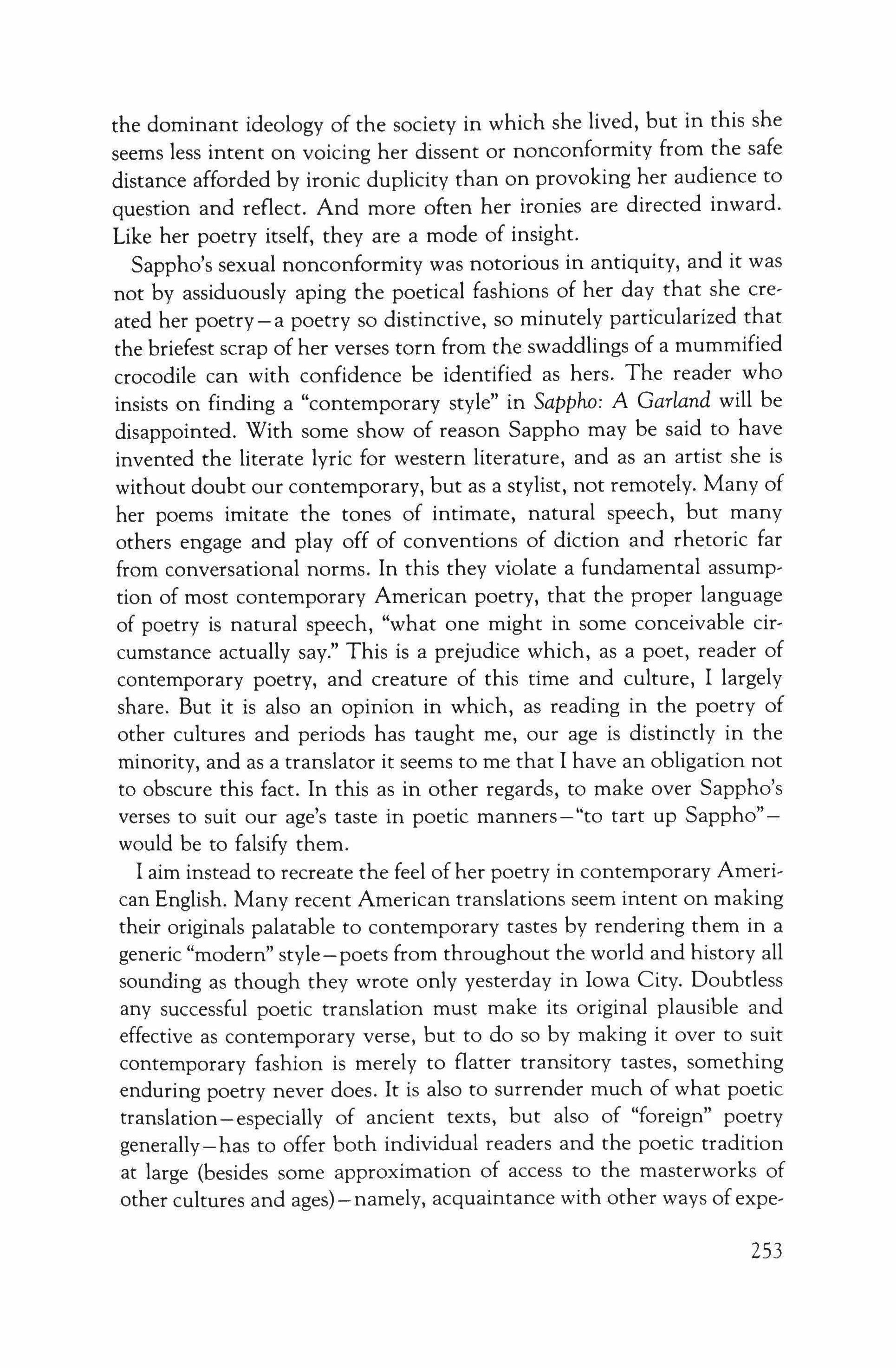
the dominant ideology of the society in which she lived, but in this she seems less intent on voicing her dissent or nonconformity from the safe distance afforded by ironic duplicity than on provoking her audience to question and reflect. And more often her ironies are directed inward. Like her poetry itself, they are a mode of insight.
Sappho's sexual nonconformity was notorious in antiquity, and it was not by assiduously aping the poetical fashions of her day that she created her poetry-a poetry so distinctive, so minutely particularized that the briefest scrap of her verses torn from the swaddlings of a mummified crocodile can with confidence be identified as hers. The reader who insists on finding a "contemporary style" in Sappho: A Garland will be disappointed. With some show of reason Sappho may be said to have invented the literate lyric for western literature, and as an artist she is without doubt our contemporary, but as a stylist, not remotely. Many of her poems imitate the tones of intimate, natural speech, but many others engage and playoff of conventions of diction and rhetoric far from conversational norms. In this they violate a fundamental assumption of most contemporary American poetry, that the proper language of poetry is natural speech, "what one might in some conceivable circumstance actually say." This is a prejudice which, as a poet, reader of contemporary poetry, and creature of this time and culture, I largely share. But it is also an opinion in which, as reading in the poetry of other cultures and periods has taught me, our age is distinctly in the minority, and as a translator it seems to me that I have an obligation not to obscure this fact. In this as in other regards, to make over Sappho's verses to suit our age's taste in poetic manners - "to tart up Sappho"would be to falsify them.
I aim instead to recreate the feel of her poetry in contemporary American English. Many recent American translations seem intent on making their originals palatable to contemporary tastes by rendering them in a generic "modern" style-poets from throughout the world and history all sounding as though they wrote only yesterday in Iowa City. Doubtless any successful poetic translation must make its original plausible and effective as contemporary verse, but to do so by making it over to suit contemporary fashion is merely to flatter transitory tastes, something enduring poetry never does. It is also to surrender much of what poetic translation-especially of ancient texts, but also of "foreign" poetry generally - has to offer both individual readers and the poetic tradition at large (besides some approximation of access to the masterworks of other cultures and ages)-namely, acquaintance with other ways of expe-
253
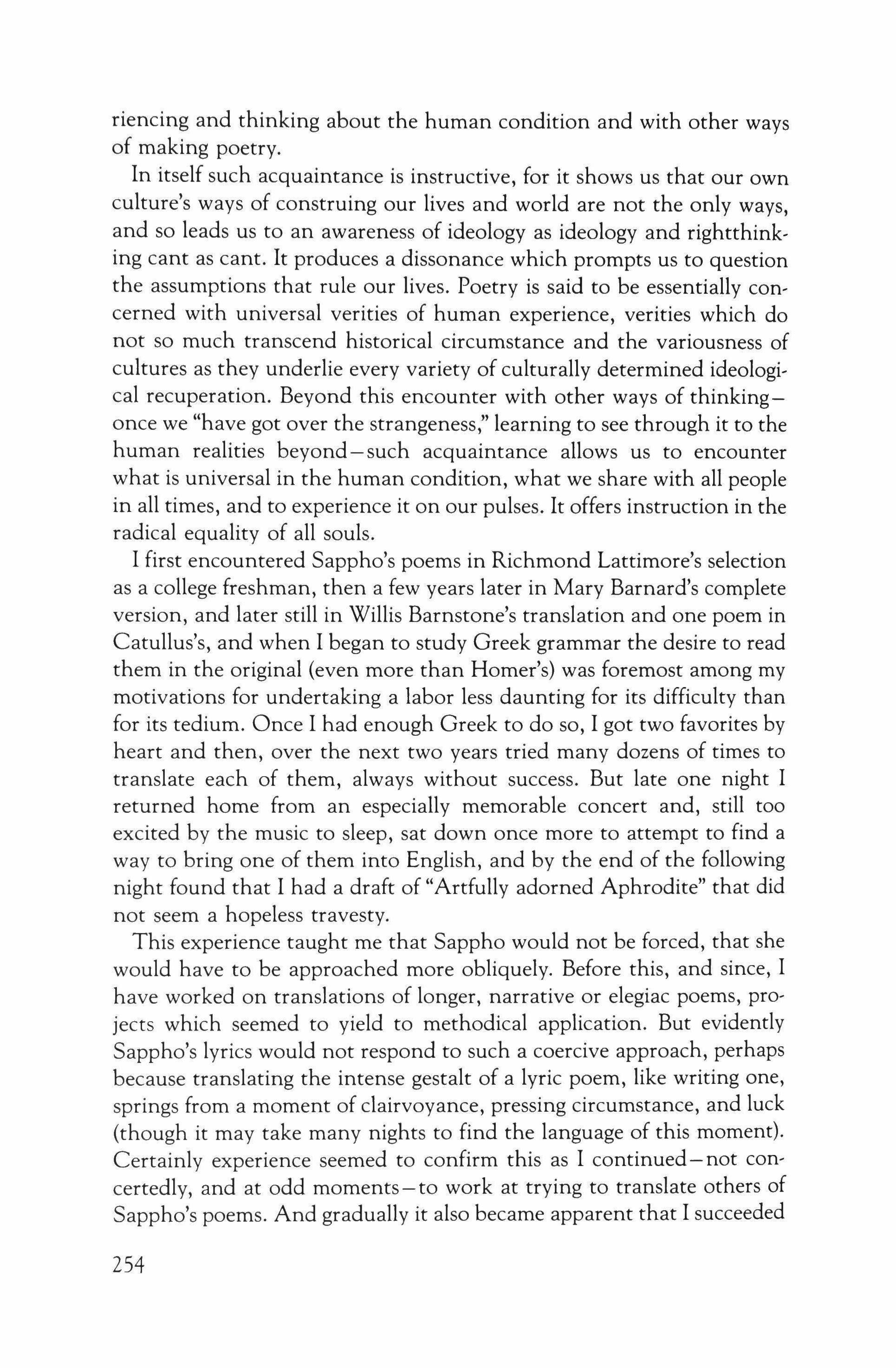
riencing and thinking about the human condition and with other ways of making poetry.
In itself such acquaintance is instructive, for it shows us that our own culture's ways of construing our lives and world are not the only ways, and so leads us to an awareness of ideology as ideology and rightrhinking cant as cant. It produces a dissonance which prompts us to question the assumptions that rule our lives. Poetry is said to be essentially concerned with universal verities of human experience, verities which do not so much transcend historical circumstance and the variousness of cultures as they underlie every variety of culturally determined ideological recuperation. Beyond this encounter with other ways of thinkingonce we "have got over the strangeness," learning to see through it to the human realities beyond-such acquaintance allows us to encounter what is universal in the human condition, what we share with all people in all times, and to experience it on our pulses. It offers instruction in the radical equality of all souls.
I first encountered Sappho's poems in Richmond Lattimore's selection as a college freshman, then a few years later in Mary Barnard's complete version, and later still in Willis Barnstone's translation and one poem in Catullus's, and when I began to study Greek grammar the desire to read them in the original (even more than Homer's) was foremost among my motivations for undertaking a labor less daunting for its difficulty than for its tedium. Once I had enough Greek to do so, I got two favorites by heart and then, over the next two years tried many dozens of times to translate each of them, always without success. But late one night I returned home from an especially memorable concert and, still too excited by the music to sleep, sat down once more to attempt to find a way to bring one of them into English, and by the end of the following night found that I had a draft of "Artfully adorned Aphrodite" that did not seem a hopeless travesty.
This experience taught me that Sappho would not be forced, that she would have to be approached more obliquely. Before this, and since, I have worked on translations of longer, narrative or elegiac poems, projects which seemed to yield to methodical application. But evidently Sappho's lyrics would not respond to such a coercive approach, perhaps because translating the intense gestalt of a lyric poem, like writing one, springs from a moment of clairvoyance, pressing circumstance, and luck (though it may take many nights to find the language of this moment). Certainly experience seemed to confirm this as I continued - not concertedly, and at odd moments-to work at trying to translate others of Sappho's poems. And gradually it also became apparent that I succeeded
254
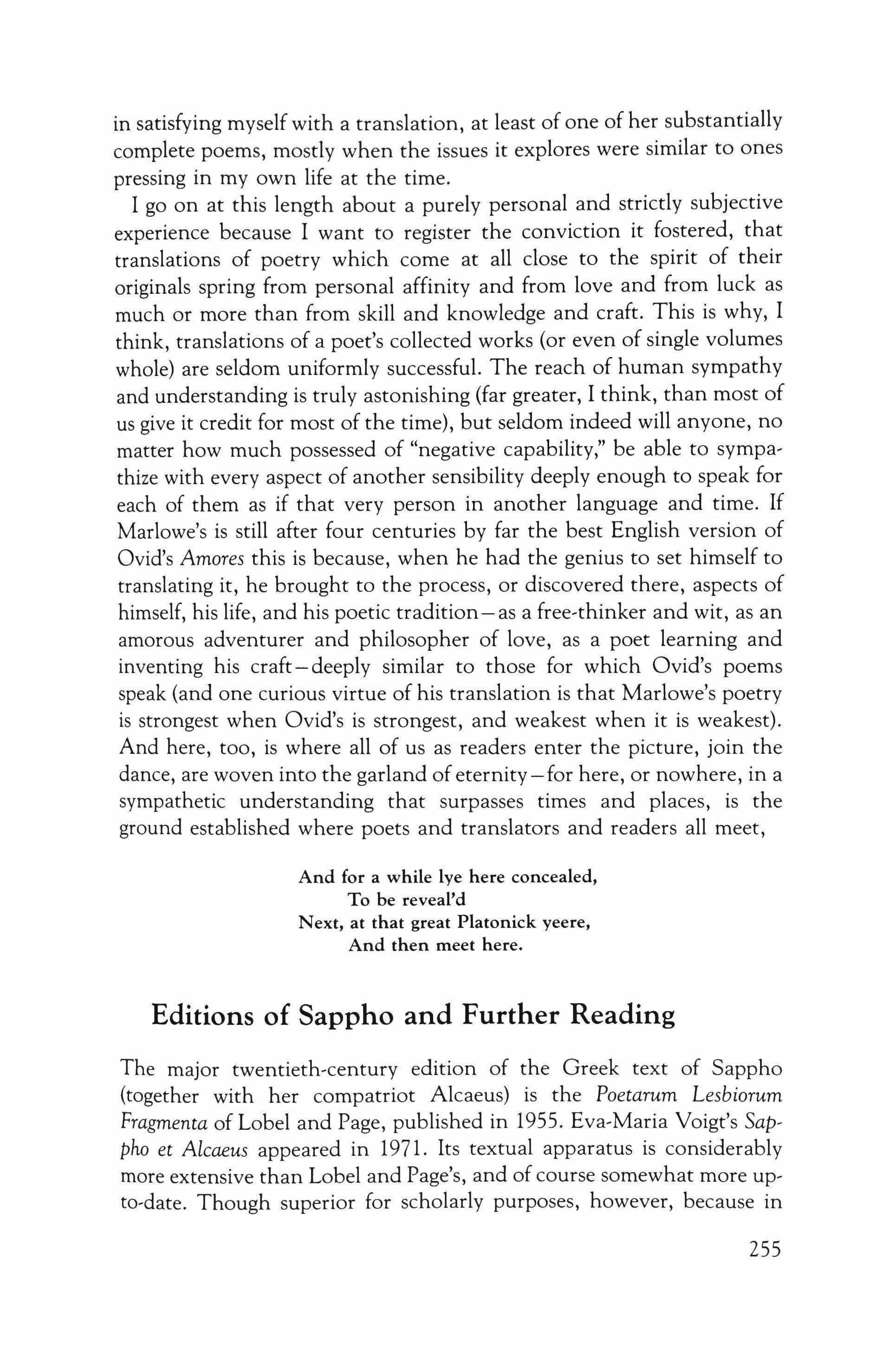
in satisfying myself with a translation, at least of one of her substantially complete poems, mostly when the issues it explores were similar to ones pressing in my own life at the time.
I go on at this length about a purely personal and strictly subjective experience because I want to register the conviction it fostered, that translations of poetry which come at all close to the spirit of their originals spring from personal affinity and from love and from luck as much or more than from skill and knowledge and craft. This is why, I think, translations of a poet's collected works (or even of single volumes whole) are seldom uniformly successful. The reach of human sympathy and understanding is truly astonishing (far greater, I think, than most of us give it credit for most of the time), but seldom indeed will anyone, no matter how much possessed of "negative capability," be able to sympathize with every aspect of another sensibility deeply enough to speak for each of them as if that very person in another language and time. If Marlowe's is still after four centuries by far the best English version of Ovid's Amores this is because, when he had the genius to set himself to translating it, he brought to the process, or discovered there, aspects of himself, his life, and his poetic tradition - as a free-thinker and wit, as an amorous adventurer and philosopher of love, as a poet learning and inventing his craft-deeply similar to those for which Ovid's poems speak (and one curious virtue of his translation is that Marlowe's poetry is strongest when Ovid's is strongest, and weakest when it is weakest). And here, too, is where all of us as readers enter the picture, join the dance, are woven into the garland ofeternity-for here, or nowhere, in a sympathetic understanding that surpasses times and places, is the ground established where poets and translators and readers all meet,
And for a while lye here concealed, To be reveal'd
Next, at that great Platonick yeere, And then meet here.
Editions of Sappho and Further Reading
The major twentieth-century edition of the Greek text of Sappho (together with her compatriot Alcaeus) is the Poetarum Lesbiorum Fragmenta of Lobel and Page, published in 1955. Eva-Maria Voigt's Sappho et Alcaeus appeared in 1971. Its textual apparatus is considerably more extensive than Lobel and Page's, and of course somewhat more upto-date. Though superior for scholarly purposes, however, because in
255
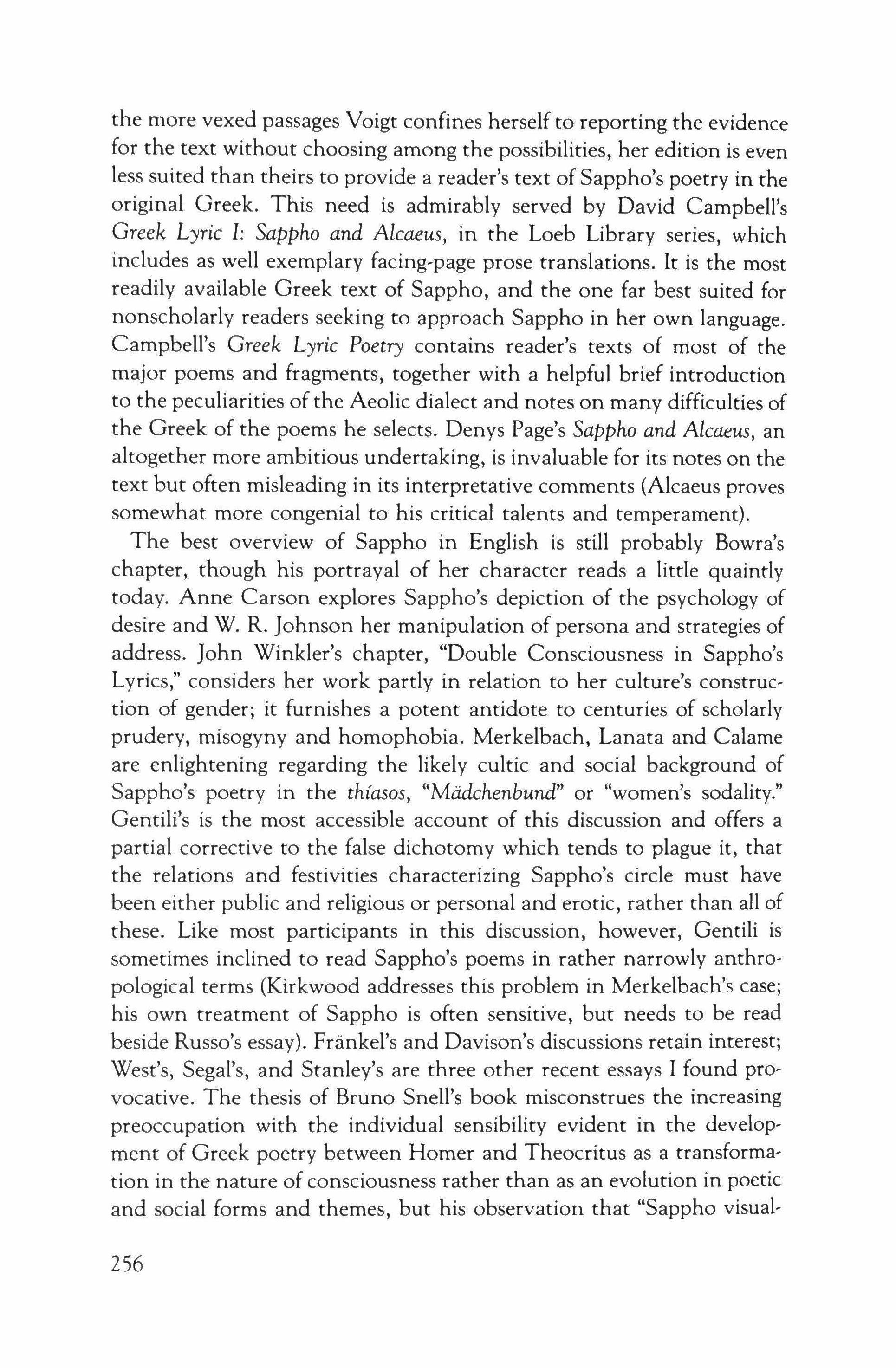
the more vexed passages Voigt confines herself to reporting the evidence for the text without choosing among the possibilities, her edition is even less suited than theirs to provide a reader's text of Sappho's poetry in the original Greek. This need is admirably served by David Campbell's Greek Lyric I: Sappho and Alcaeus, in the Loeb Library series, which includes as well exemplary facing-page prose translations. It is the most readily available Greek text of Sappho, and the one far best suited for nonscholarly readers seeking to approach Sappho in her own language. Campbell's Greek Lyric Poetry contains reader's texts of most of the major poems and fragments, together with a helpful brief introduction to the peculiarities of the Aeolic dialect and notes on many difficulties of the Greek of the poems he selects. Denys Page's Sappho and Alcaeus, an altogether more ambitious undertaking, is invaluable for its notes on the text but often misleading in its interpretative comments (Alcaeus proves somewhat more congenial to his critical talents and temperament).
The best overview of Sappho in English is still probably Bowra's chapter, though his portrayal of her character reads a little quaintly today. Anne Carson explores Sappho's depiction of the psychology of desire and W. R. Johnson her manipulation of persona and strategies of address. John Winkler's chapter, "Double Consciousness in Sappho's Lyrics," considers her work partly in relation to her culture's construetion of gender; it furnishes a potent antidote to centuries of scholarly prudery, misogyny and homophobia. Merkelbach, Lanata and Calame are enlightening regarding the likely cultic and social background of Sappho's poetry in the thiasos, "Miidchenbund" or "women's sodality." Gentili's is the most accessible account of this discussion and offers a partial corrective to the false dichotomy which tends to plague it, that the relations and festivities characterizing Sappho's circle must have been either public and religious or personal and erotic, rather than all of these. Like most participants in this discussion, however, Gentili is sometimes inclined to read Sappho's poems in rather narrowly anthropological terms (Kirkwood addresses this problem in Merkelbach's case; his own treatment of Sappho is often sensitive, but needs to be read beside Russo's essay). Frankel's and Davison's discussions retain interest; West's, Segal's, and Stanley's are three other recent essays 1 found provocative. The thesis of Bruno Snell's book misconstrues the increasing preoccupation with the individual sensibility evident in the development of Greek poetry between Homer and Theocritus as a transforrnation in the nature of consciousness rather than as an evolution in poetic and social forms and themes, but his observation that "Sappho visual-
256
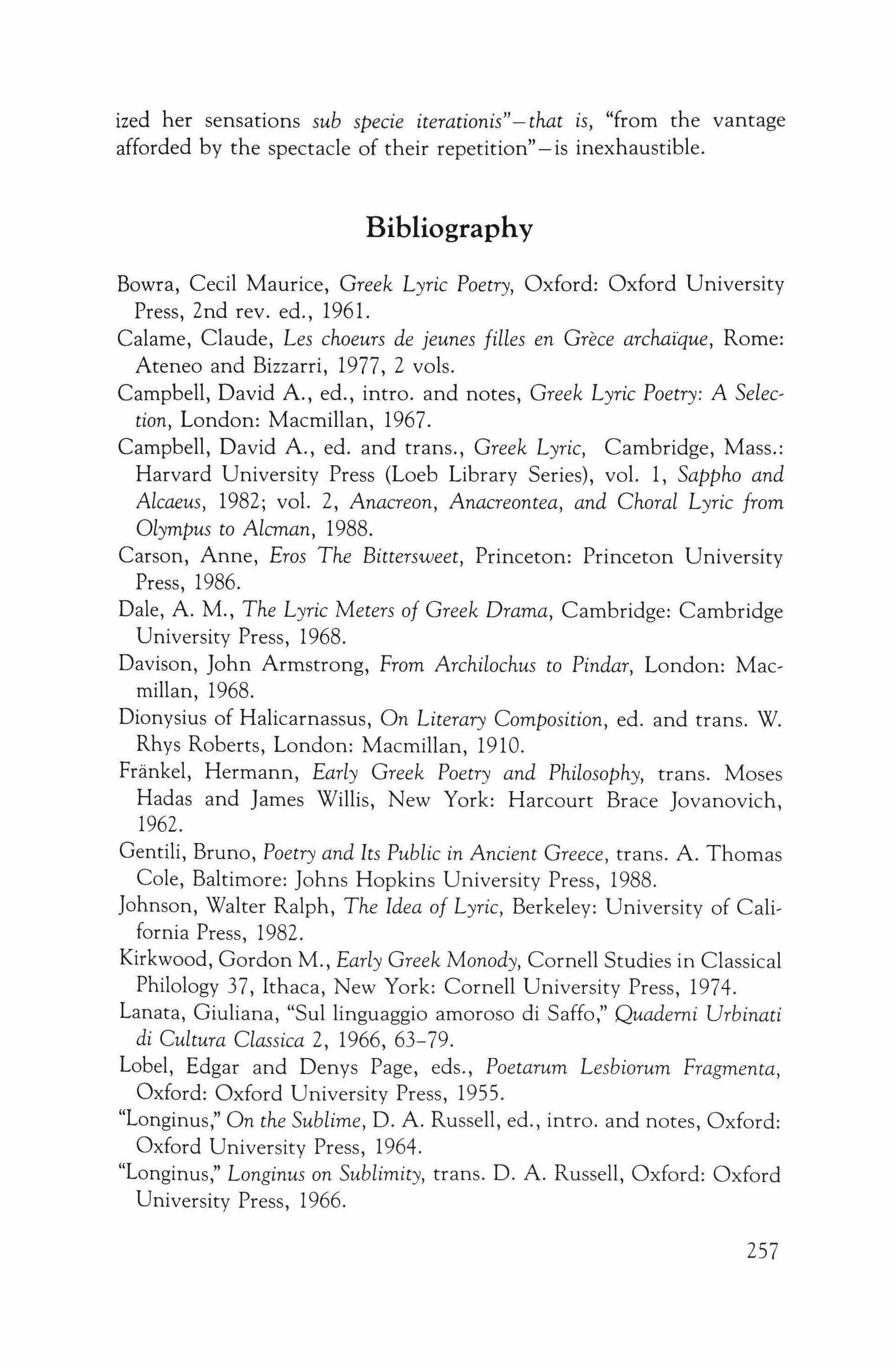
ized her sensations sub specie iterationis" - that is, "from the vantage afforded by the spectacle of their repetition" - is inexhaustible.
Bibliography
Bowra, Cecil Maurice, Greek Lyric Poetry, Oxford: Oxford University Press, 2nd rev. ed., 1961.
Calame, Claude, Les choeurs de jeunes filles en Grece archai"que, Rome: Ateneo and Bizzarri, 1977, 2 vols.
Campbell, David A., ed., intro. and notes, Greek Lyric Poetry: A Selection, London: Macmillan, 1967.
Campbell, David A., ed. and trans., Greek Lyric, Cambridge, Mass.: Harvard University Press (Loeb Library Series), vol. 1, Sappho and Alcaeus, 1982; vol. 2, Anacreon, Anacreontea, and Choral Lyric from Olympus to Aleman, 1988.
Carson, Anne, Eros The Bittersweet, Princeton: Princeton University Press, 1986.
Dale, A. M., The Lyric Meters of Greek Drama, Cambridge: Cambridge University Press, 1968.
Davison, John Armstrong, From Archilochus to Pindar, London: Macmillan, 1968.
Dionysius of Halicarnassus, On Literary Composition, ed. and trans. W. Rhys Roberts, London: Macmillan, 1910.
Frankel, Hermann, Early Greek Poetry and Philosophy, trans. Moses Hadas and James Willis, New York: Harcourt Brace Jovanovich, 1962.
Gentili, Bruno, Poetry and Its Public in Ancient Greece, trans. A. Thomas Cole, Baltimore: Johns Hopkins University Press, 1988.
Johnson, Walter Ralph, The Idea of Lyric, Berkeley: University of California Press, 1982.
Kirkwood, Gordon M., Early Greek Monody, Cornell Studies in Classical Philology 37, Ithaca, New York: Cornell University Press, 1974.
Lanata, Giuliana, "Sui linguaggio amoroso di Saffo," Quademi Urbinati di Cultura Classica 2, 1966, 63-79.
Lobel, Edgar and Denys Page, eds., Poetarum Lesbiorum Fragmenta, Oxford: Oxford University Press, 1955.
"Longinus," On the Sublime, D. A. Russell, ed., intro. and notes, Oxford: Oxford University Press, 1964.
"Longinus," Longinus on Sublimity, trans. D. A. Russell, Oxford: Oxford University Press, 1966.
257
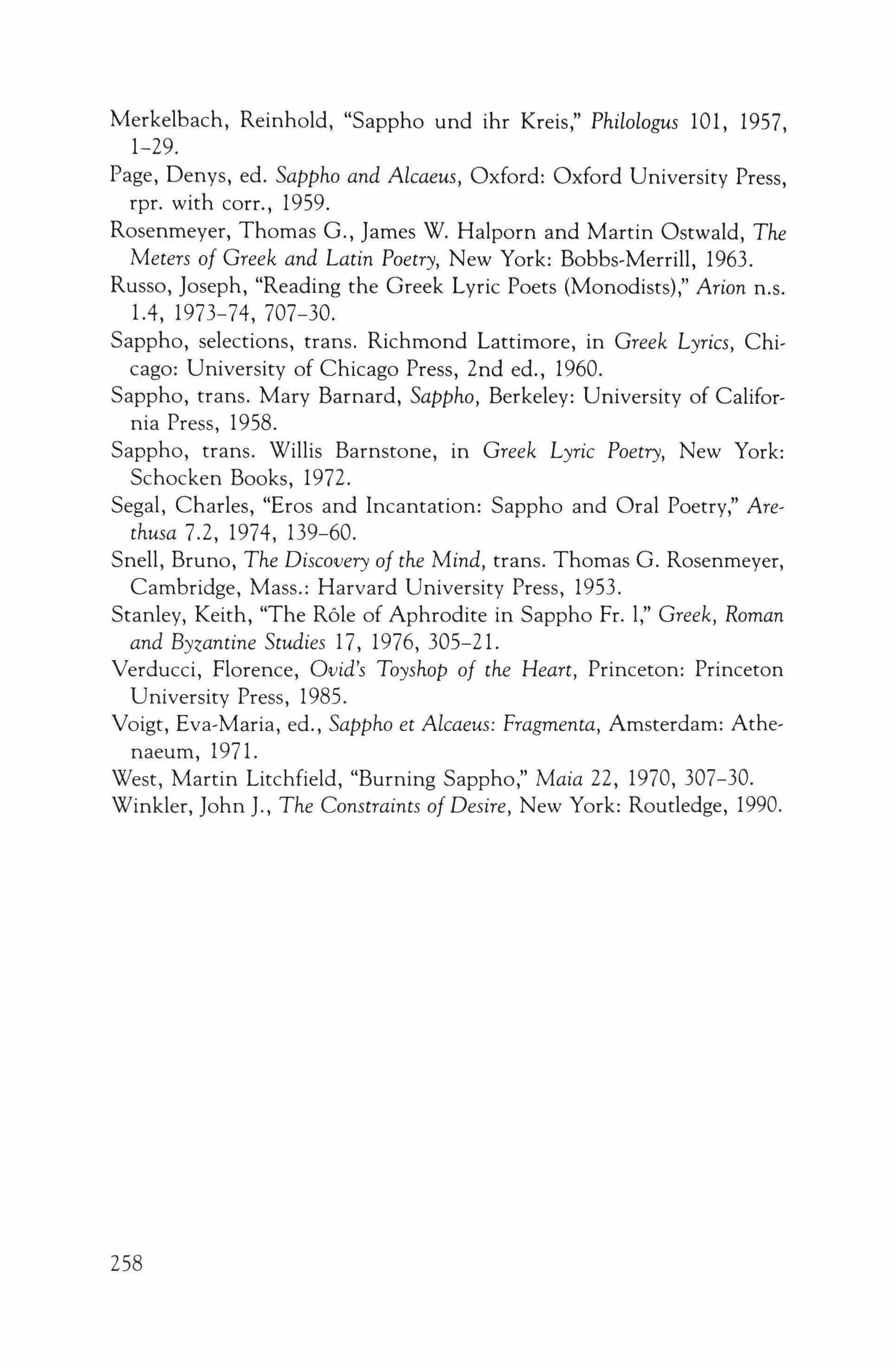
Merkelbach, Reinhold, "Sappho und ihr Kreis," Philologus 101, 1957, 1-29.
Page, Denys, ed. Sappho and Alcaeus, Oxford: Oxford University Press, rpr. with corr., 1959.
Rosenmeyer, Thomas G., James W. Halporn and Martin Ostwald, The Meters of Greek and Latin Poetry, New York: Bobbs-Merrill, 1963.
Russo, Joseph, "Reading the Greek Lyric Poets (Monodists}," Arion n.s. 1.4, 1973-74, 707-30.
Sappho, selections, trans. Richmond Lattimore, in Greek Lyrics, Chicago: University of Chicago Press, 2nd ed., 1960.
Sappho, trans. Mary Barnard, Sappho, Berkeley: University of California Press, 1958.
Sappho, trans. Willis Barnstone, in Greek Lyric Poetry, New York: Schocken Books, 1972.
Segal, Charles, "Eros and Incantation: Sappho and Oral Poetry," Arethusa 7.2, 1974, 139-60.
Snell, Bruno, The Discovery of the Mind, trans. Thomas G. Rosenmeyer, Cambridge, Mass.: Harvard University Press, 1953.
Stanley, Keith, "The Role of Aphrodite in Sappho Fr. 1," Greek, Roman and Byzantine Studies 17, 1976, 305-21.
Verducci, Florence, Ovid's Toyshop of the Heart, Princeton: Princeton University Press, 1985.
Voigt, Eva-Maria, ed., Sappho et Alcaeus: Fragmenta, Amsterdam: Athenaeum, 1971.
West, Martin Litchfield, "Burning Sappho," Maia 22, 1970, 307-30.
Winkler, John J., The Constraints of Desire, New York: Routledge, 1990.
258
From Always Running
Luis ]. Rodriguez
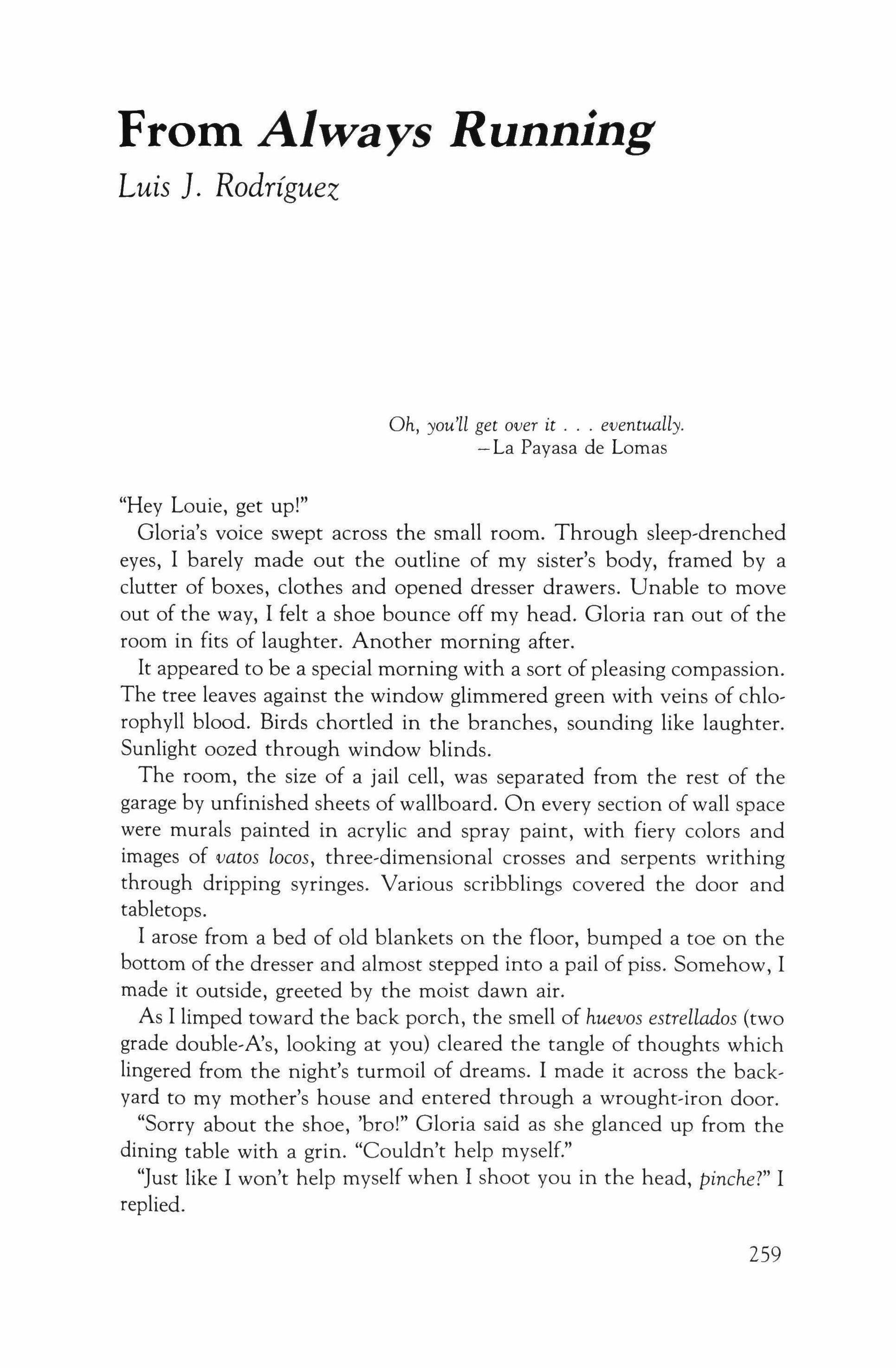
Oh, you'll get over it eventually. - La Payasa de Lomas
"Hey Louie, get up!"
Gloria's voice swept across the small room. Through sleep-drenched eyes, I barely made out the outline of my sister's body, framed by a clutter of boxes, clothes and opened dresser drawers. Unable to move out of the way, I felt a shoe bounce off my head. Gloria ran out of the room in fits of laughter. Another morning after.
It appeared to be a special morning with a sort of pleasing compassion. The tree leaves against the window glimmered green with veins of chlorophyll blood. Birds chortled in the branches, sounding like laughter. Sunlight oozed through window blinds.
The room, the size of a jail cell, was separated from the rest of the garage by unfinished sheets of wallboard. On every section of wall space were murals painted in acrylic and spray paint, with fiery colors and images of vatos locos, three-dimensional crosses and serpents writhing through dripping syringes. Various scribblings covered the door and tabletops.
I arose from a bed of old blankets on the floor, bumped a toe on the bottom of the dresser and almost stepped into a pail of piss. Somehow, I made it outside, greeted by the moist dawn air.
As I limped toward the back porch, the smell of huevos estrellados (two grade double-A's, looking at you) cleared the tangle of thoughts which lingered from the night's turmoil of dreams. I made it across the back, yard to my mother's house and entered through a wrought-iron door.
"Sorry about the shoe, 'bro!" Gloria said as she glanced up from the dining table with a grin. "Couldn't help myself."
"Just like I won't help myself when I shoot you in the head, pinche?" I replied.
259
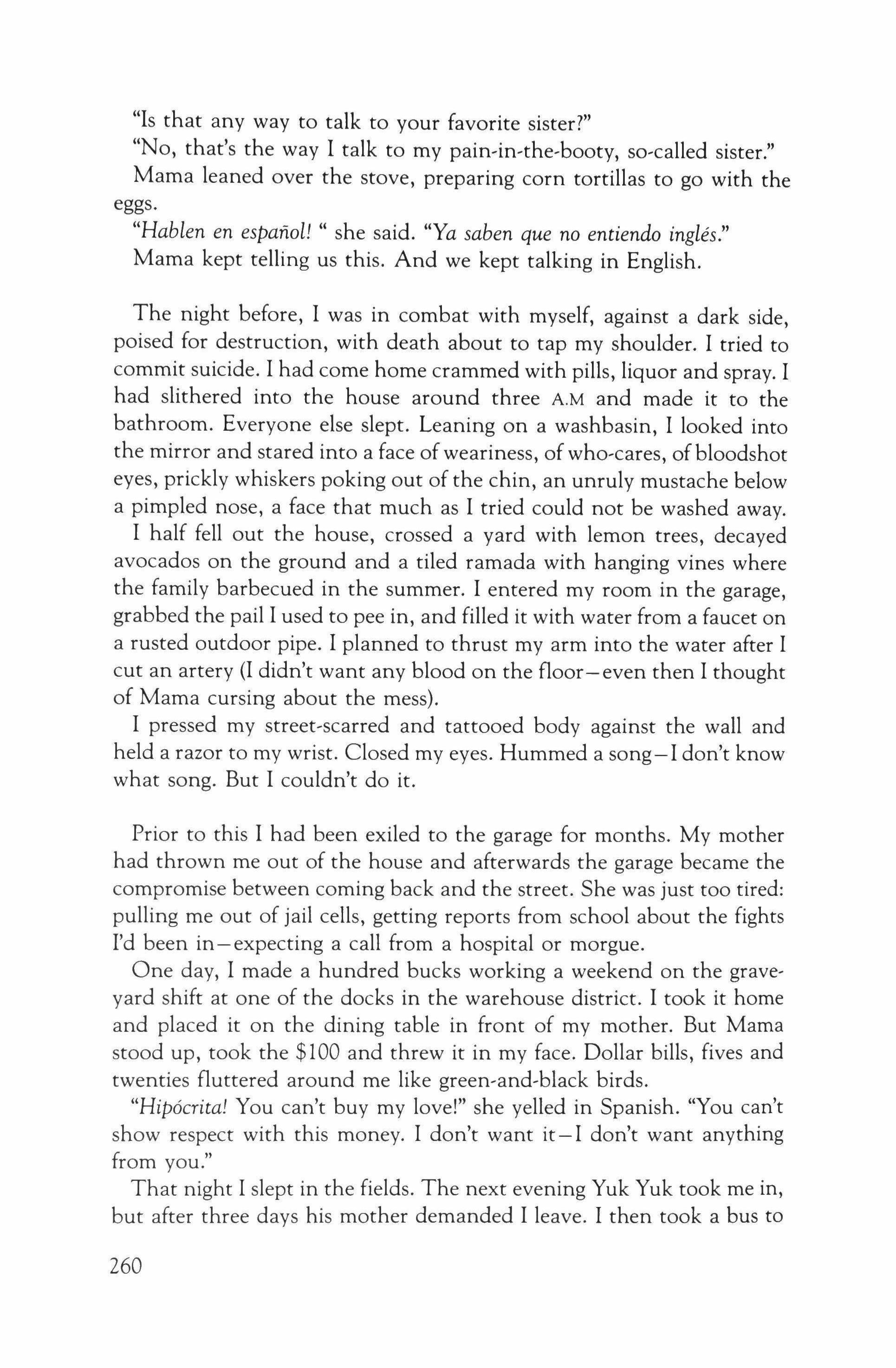
"Is that any way to talk to your favorite sister?"
"No, that's the way I talk to my pain-in-the-booty, so-called sister."
Mama leaned over the stove, preparing corn tortillas to go with the eggs.
"Hablen en espanol! " she said. "Ya saben que no entiendo ingles."
Mama kept telling us this. And we kept talking in English.
The night before, I was in combat with myself, against a dark side, poised for destruction, with death about to tap my shoulder. I tried to commit suicide. I had come home crammed with pills, liquor and spray. I had slithered into the house around three A.M and made it to the bathroom. Everyone else slept. Leaning on a washbasin, I looked into the mirror and stared into a face of weariness, of who-cares, of bloodshot eyes, prickly whiskers poking out of the chin, an unruly mustache below a pimpled nose, a face that much as I tried could not be washed away. I half fell out the house, crossed a yard with lemon trees, decayed avocados on the ground and a tiled ramada with hanging vines where the family barbecued in the summer. I entered my room in the garage, grabbed the pail I used to pee in, and filled it with water from a faucet on a rusted outdoor pipe. I planned to thrust my arm into the water after I cut an artery (I didn't want any blood on the floor-even then I thought of Mama cursing about the mess).
I pressed my street-scarred and tattooed body against the wall and held a razor to my wrist. Closed my eyes. Hummed a song-I don't know what song. But I couldn't do it.
Prior to this I had been exiled to the garage for months. My mother had thrown me out of the house and afterwards the garage became the compromise between coming back and the street. She was just too tired: pulling me out of jail cells, getting reports from school about the fights I'd been in-expecting a call from a hospital or morgue.
One day, I made a hundred bucks working a weekend on the graveyard shift at one of the docks in the warehouse district. I took it home and placed it on the dining table in front of my mother. But Mama stood up, took the $100 and threw it in my face. Dollar bills, fives and twenties fluttered around me like green-and-black birds.
"Hip6crita! You can't buy my love!" she yelled in Spanish. "You can't show respect with this money. I don't want it - I don't want anything from you."
That night I slept in the fields. The next evening Yuk Yuk took me in, but after three days his mother demanded I leave. I then took a bus to
260
downtown L.A. and walked the streets of Spanish Broadway-what the Mexicans called El Centro-defined by the lights of the movie marquees, the sleaze bars and liquor stores. I spent about seventy-five cents or so for an all-night movie house, which featured continuous showings of three or four movies. There I slept with the winos and other homeless, and woke up to ushers throwing us out at daybreak.
The sunlight invaded my eyes, forcing me to squint. Office girls whisked by on their way to work, their scent filling my lungs, and then my loins. Iron enclosures were thrown up as brick-and-stone stores opened, selling clothes freshly sewed from the nearby garment district, appliances, and food items from all over Mexico. The traffic up my nose.
This part of Broadway, from First Street to Olympic Boulevard, was a hemispheric dumping-ground. This is where the Latino people shopped, roamed, explored. Norteiios and salsas blared out of stereo shops and open-air fruit stands clamored with the breakneck bargaining and accompanying hand gestures of the Spanish tongue. On weekends, that stretch of Broadway must have had a million people or so.
I also stayed with homegirls, crawling through slightly-opened bedroom windows. In abandoned cars. By the railroad tracks. Finally, I came home and negotiated an arrangement with Mama.
She laid down the rules: I couldn't set foot in the house unless I had her permission. And I could stay in the garage room, which barely held blankets, some drawers and a card table. It had no toilet, no closet space, no heating. At night, when the desert temperatures fell to almost freezing, I could use a small electric heating device which would only keep me from becoming a block of ice.
I accepted.
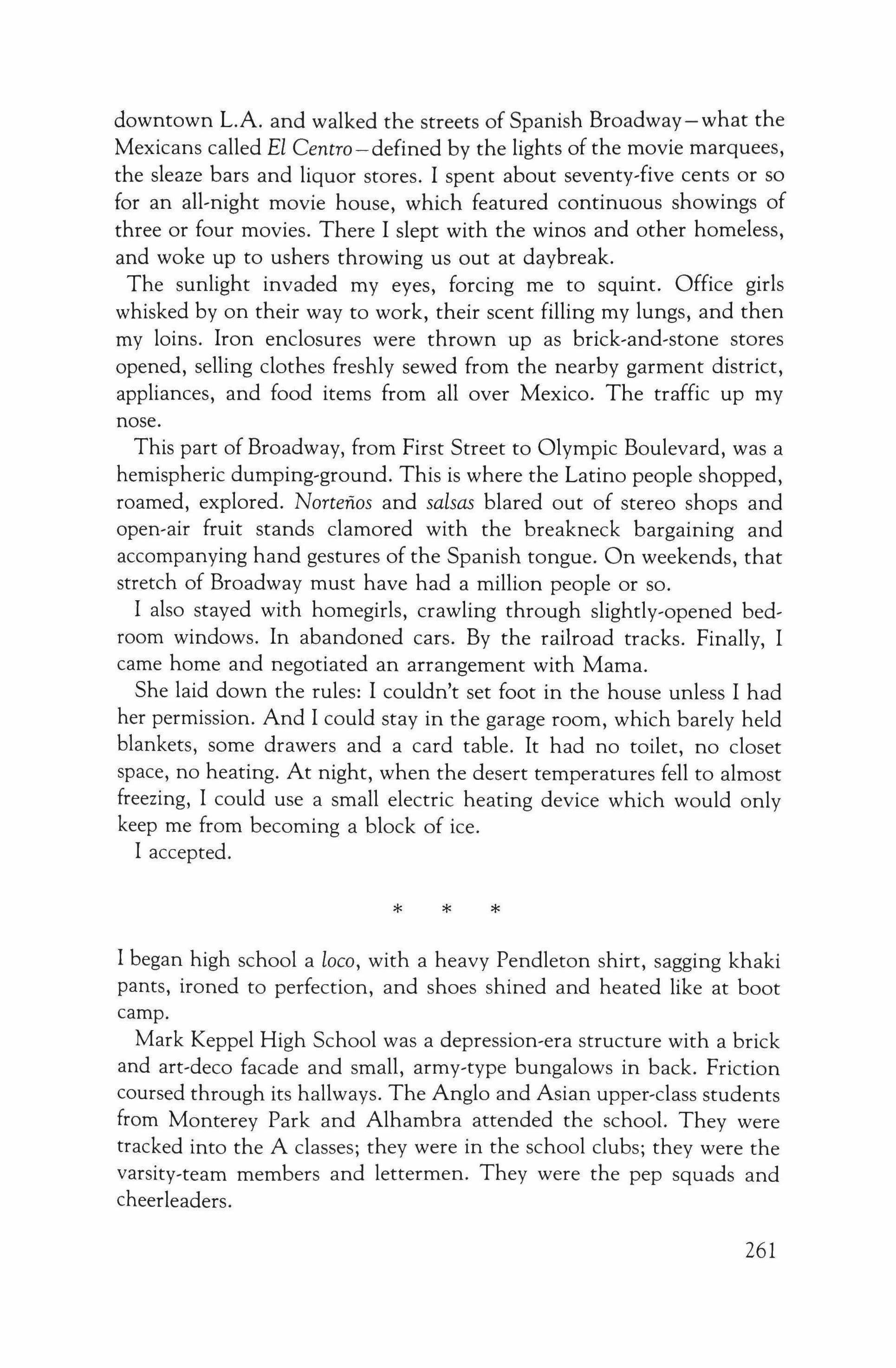
I began high school a loco, with a heavy Pendleton shirt, sagging khaki pants, ironed to perfection, and shoes shined and heated like at boot camp.
Mark Keppel High School was a depression-era structure with a brick and art-deco facade and small, army-type bungalows in back. Friction coursed through its hallways. The Anglo and Asian upper-class students from Monterey Park and Alhambra attended the school. They were tracked into the A classes; they were in the school clubs; they were the varsity-team members and lettermen. They were the pep squads and cheerleaders.
* * *
261
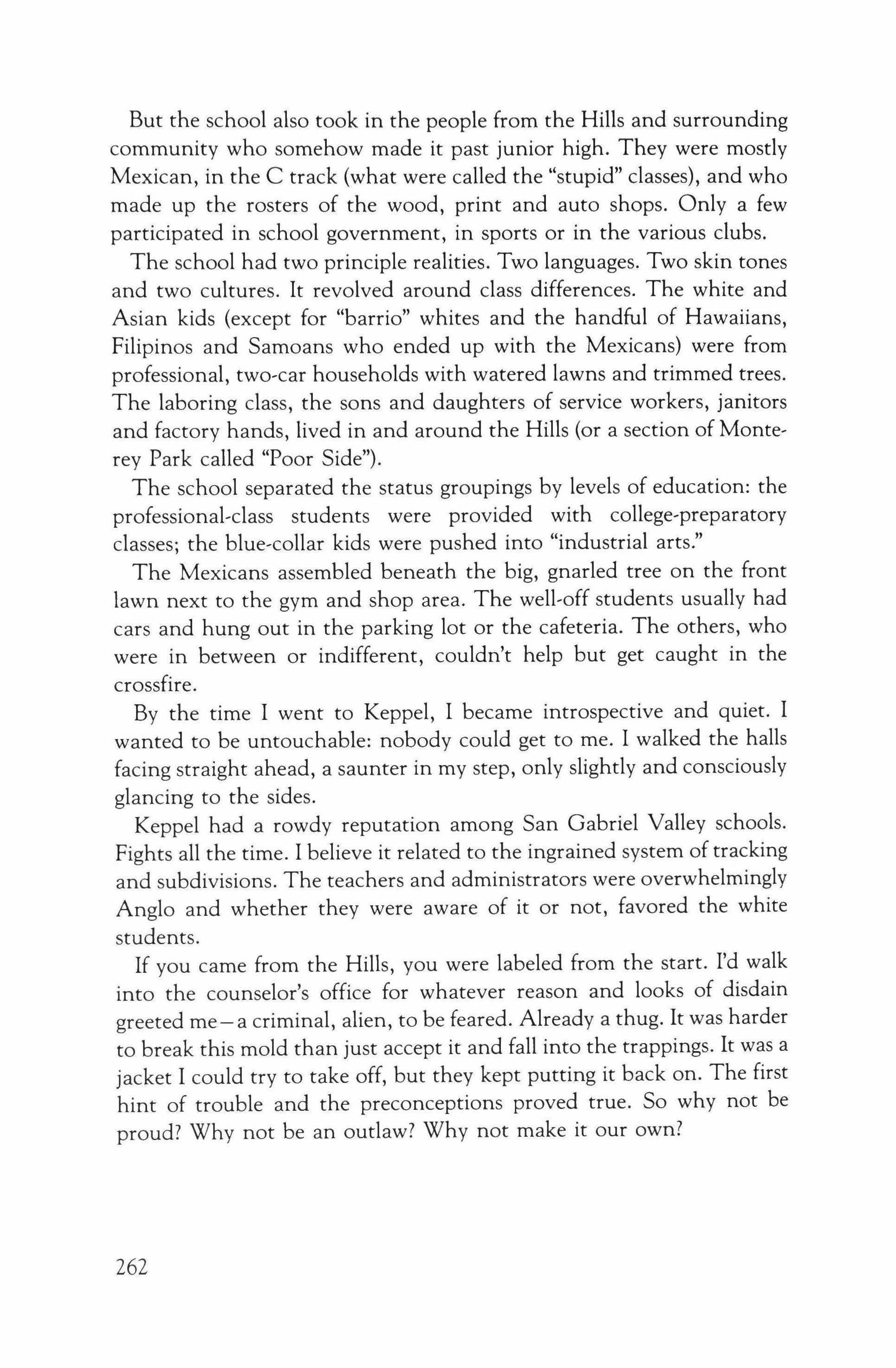
But the school also took in the people from the Hills and surrounding community who somehow made it past junior high. They were mostly Mexican, in the C track (what were called the "stupid" classes), and who made up the rosters of the wood, print and auto shops. Only a few participated in school government, in sports or in the various clubs.
The school had two principle realities. Two languages. Two skin tones and two cultures. It revolved around class differences. The white and Asian kids (except for "barrio" whites and the handful of Hawaiians, Filipinos and Samoans who ended up with the Mexicans) were from professional, two-car households with watered lawns and trimmed trees. The laboring class, the sons and daughters of service workers, janitors and factory hands, lived in and around the Hills (or a section of Monterey Park called "Poor Side").
The school separated the status groupings by levels of education: the professional-class students were provided with college-preparatory classes; the blue-collar kids were pushed into "industrial arts."
The Mexicans assembled beneath the big, gnarled tree on the front lawn next to the gym and shop area. The well-off students usually had cars and hung out in the parking lot or the cafeteria. The others, who were in between or indifferent, couldn't help but get caught in the crossfire.
By the time I went to Keppel, I became introspective and quiet. I wanted to be untouchable: nobody could get to me. I walked the halls facing straight ahead, a saunter in my step, only slightly and consciously glancing to the sides.
Keppel had a rowdy reputation among San Gabriel Valley schools. Fights all the time. I believe it related to the ingrained system of tracking and subdivisions. The teachers and administrators were overwhelmingly Anglo and whether they were aware of it or not, favored the white students.
If you came from the Hills, you were labeled from the start. I'd walk into the counselor's office for whatever reason and looks of disdain greeted me-a criminal, alien, to be feared. Already a thug. It was harder to break this mold than just accept it and fall into the trappings. It was a jacket I could try to take off, but they kept putting it back on. The first hint of trouble and the preconceptions proved true. So why not be proud? Why not be an outlaw? Why not make it our own?
262
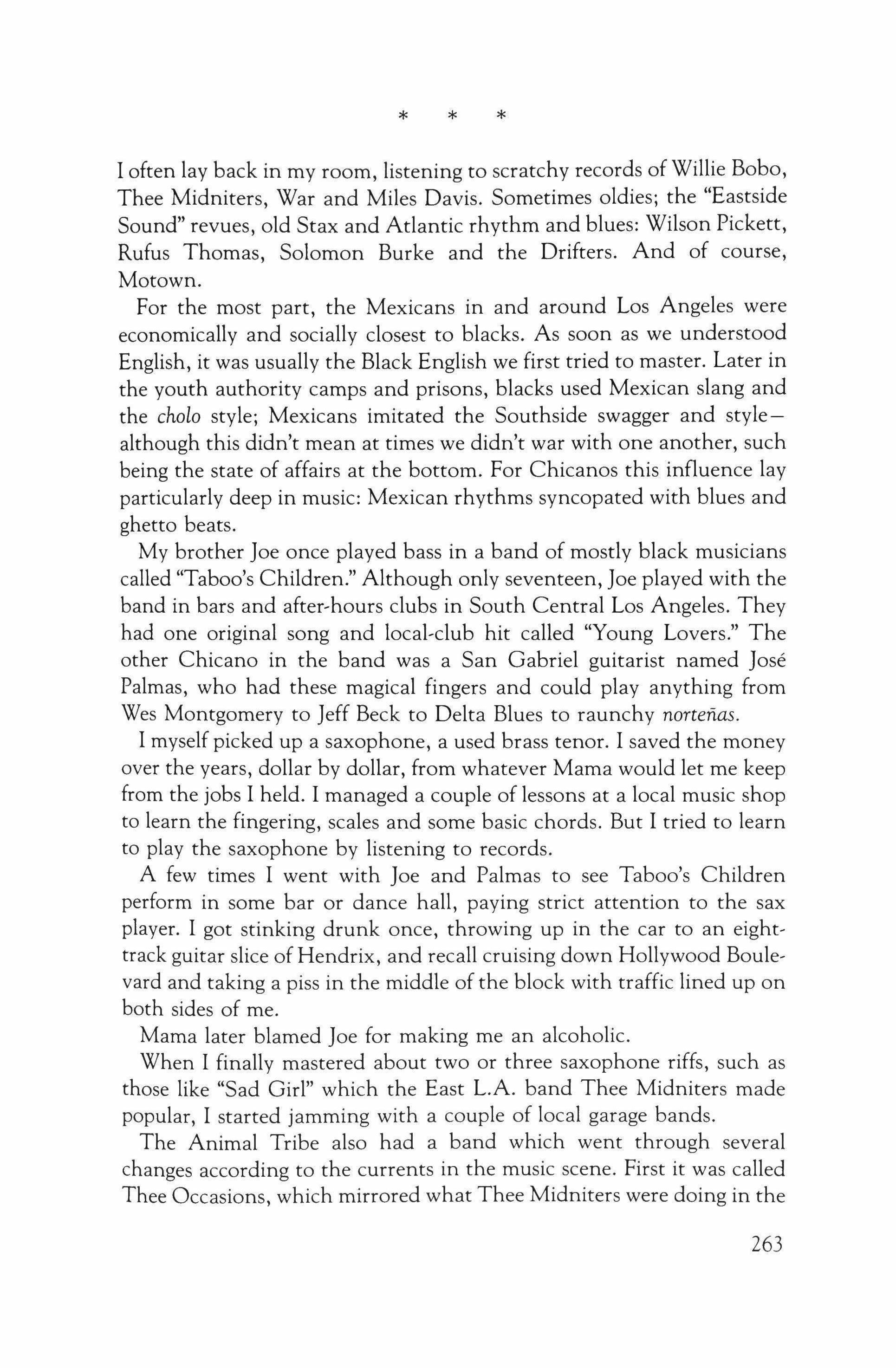
I often lay back in my room, listening to scratchy records of Willie Bobo, Thee Midniters, War and Miles Davis. Sometimes oldies; the "Eastside Sound" revues, old Stax and Atlantic rhythm and blues: Wilson Pickett, Rufus Thomas, Solomon Burke and the Drifters. And of course, Motown.
For the most part, the Mexicans in and around Los Angeles were economically and socially closest to blacks. As soon as we understood English, it was usually the Black English we first tried to master. Later in the youth authority camps and prisons, blacks used Mexican slang and the cholo style; Mexicans imitated the Southside swagger and stylealthough this didn't mean at times we didn't war with one another, such being the state of affairs at the bottom. For Chicanos this influence lay particularly deep in music: Mexican rhythms syncopated with blues and ghetto beats.
My brother Joe once played bass in a band of mostly black musicians called "Taboo's Children." Although only seventeen, Joe played with the band in bars and after-hours clubs in South Central Los Angeles. They had one original song and local-club hit called "Young Lovers." The other Chicano in the band was a San Gabriel guitarist named Jose Palmas, who had these magical fingers and could play anything from Wes Montgomery to Jeff Beck to Delta Blues to raunchy norteiias.
I myselfpicked up a saxophone, a used brass tenor. I saved the money over the years, dollar by dollar, from whatever Mama would let me keep from the jobs I held. I managed a couple of lessons at a local music shop to learn the fingering, scales and some basic chords. But I tried to learn to play the saxophone by listening to records.
A few times I went with Joe and Palmas to see Taboo's Children perform in some bar or dance hall, paying strict attention to the sax player. I got stinking drunk once, throwing up in the car to an eight, track guitar slice of Hendrix, and recall cruising down Hollywood Boule, vard and taking a piss in the middle of the block with traffic lined up on both sides of me.
Mama later blamed Joe for making me an alcoholic.
When I finally mastered about two or three saxophone riffs, such as those like "Sad Girl" which the East L.A. band Thee Midniters made popular, I started jamming with a couple of local garage bands.
The Animal Tribe also had a band which went through several changes according to the currents in the music scene. First it was called Thee Occasions, which mirrored what Thee Midniters were doing in the
* * *
263
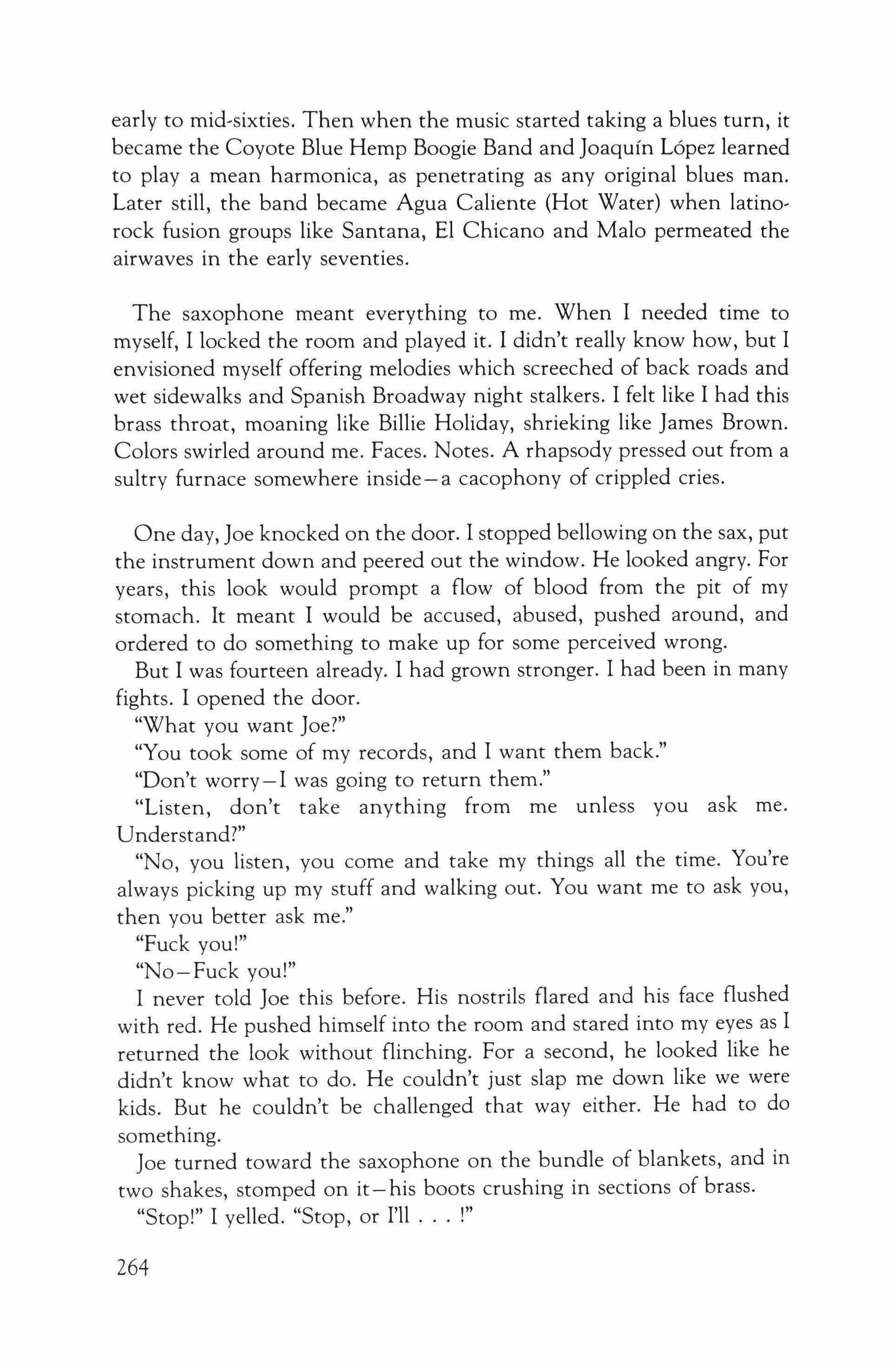
early to mid-sixties. Then when the music started taking a blues turn, it became the Coyote Blue Hemp Boogie Band and Joaquin Lopez learned to play a mean harmonica, as penetrating as any original blues man. Later still, the band became Agua Caliente (Hot Water) when latinorock fusion groups like Santana, EI Chicano and Malo permeated the airwaves in the early seventies.
The saxophone meant everything to me. When I needed time to myself, I locked the room and played it. I didn't really know how, but I envisioned myself offering melodies which screeched of back roads and wet sidewalks and Spanish Broadway night stalkers. I felt like I had this brass throat, moaning like Billie Holiday, shrieking like James Brown. Colors swirled around me. Faces. Notes. A rhapsody pressed out from a sultry furnace somewhere inside-a cacophony of crippled cries.
One day, Joe knocked on the door. I stopped bellowing on the sax, put the instrument down and peered out the window. He looked angry. For years, this look would prompt a flow of blood from the pit of my stomach. It meant I would be accused, abused, pushed around, and ordered to do something to make up for some perceived wrong.
But I was fourteen already. I had grown stronger. I had been in many fights. I opened the door.
"What you want Joe?"
"You took some of my records, and I want them back."
"Don't worry-I was going to return them."
"Listen, don't take anything from me unless you ask me. Understand?"
"No, you listen, you come and take my things all the time. You're always picking up my stuff and walking out. You want me to ask you, then you better ask me."
"Fuck you!"
"No-Fuck you!"
I never told Joe this before. His nostrils flared and his face flushed with red. He pushed himself into the room and stared into my eyes as I returned the look without flinching. For a second, he looked like he didn't know what to do. He couldn't just slap me down like we were kids. But he couldn't be challenged that way either. He had to do something.
Joe turned toward the saxophone on the bundle of blankets, and in two shakes, stomped on it - his boots crushing in sections of brass.
"Stop!" I yelled. "Stop, or I'll !"
264
Joe stopped.
"You'll what?"
I looked at the saxophone as it lay beaten, bent. Then this fury quivered through every vein, flamed through the skin, stormed out my eyes. Everything became a flash of lights. I pounced on Joe, swinging away, punching and gouging. Years of rage erupted out of me. Joe fought back, but I kept at him, like a panther. He was getting the better of me, but I wouldn't let up-flailing away at his head and body.
My sister Ana heard the bodies slammed into the wall, the dull thuds of fists on a face, and rushed to get Mom and Dad.
When our parents came in, Joe was on top of me, mostly trying to protect himself. My dad held Joe by the chest and pulled him off. I jumped to my feet, balled fists ready to continue firing. Joe looked exhausted and shamed. I'm sure he never expected this of me-or perhaps he always wondered about that dreaded day when I would stand up to him.
Dad let go of his grip. Joe shoved him aside, almost knocking him down, and ran out the room. He didn't return home for three days.
All I could think about was my saxophone; I couldn't afford to fix or replace it. All I could think about were the lost melodies.
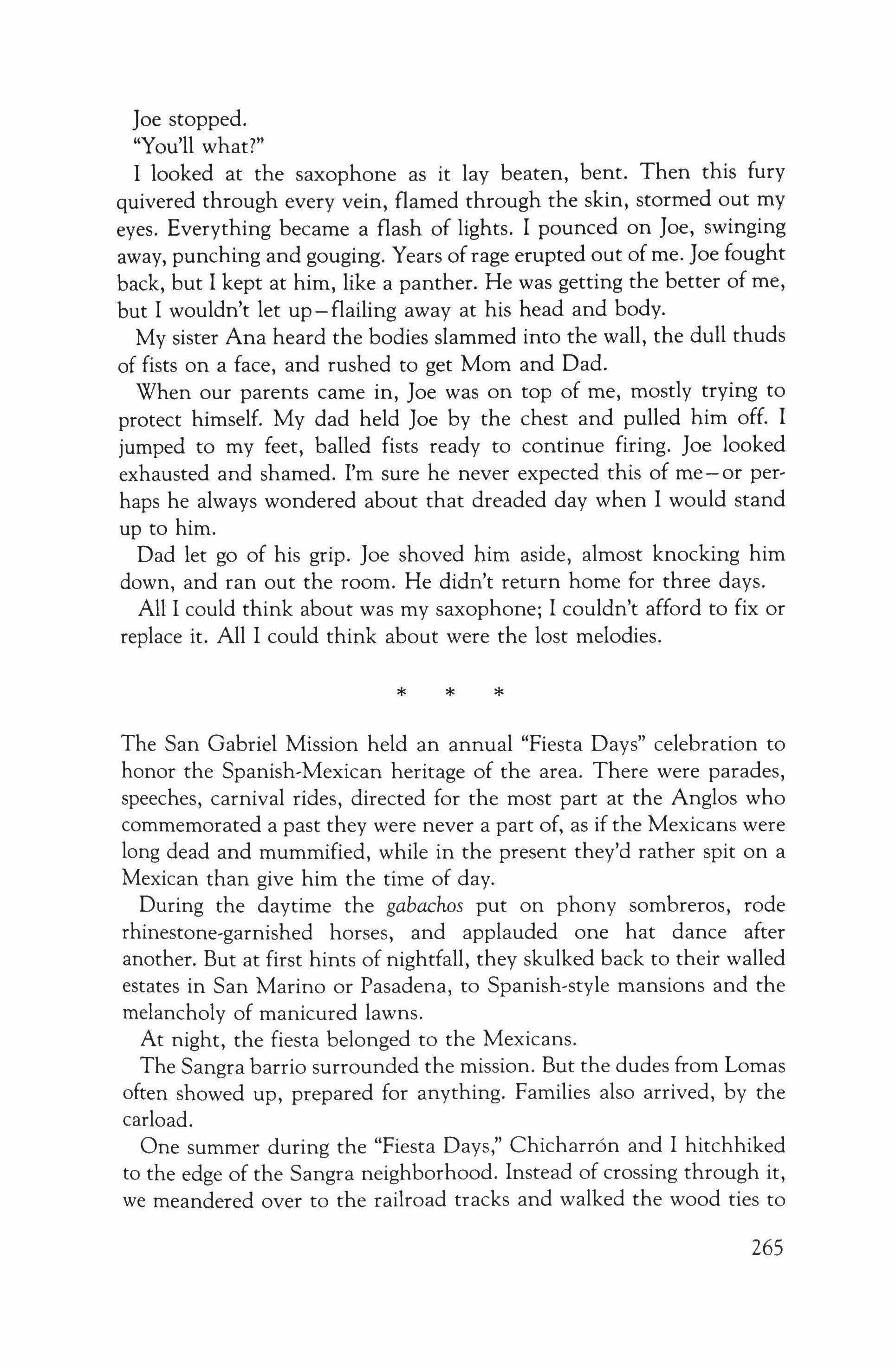
The San Gabriel Mission held an annual "Fiesta Days" celebration to honor the Spanish-Mexican heritage of the area. There were parades, speeches, carnival rides, directed for the most part at the Anglos who commemorated a past they were never a part of, as if the Mexicans were long dead and mummified, while in the present they'd rather spit on a Mexican than give him the time of day.
During the daytime the gabachos put on phony sombreros, rode rhinestone-garnished horses, and applauded one hat dance after another. But at first hints of nightfall, they skulked back to their walled estates in San Marino or Pasadena, to Spanish-style mansions and the melancholy of manicured lawns.
At night, the fiesta belonged to the Mexicans.
The Sangra barrio surrounded the mission. But the dudes from Lomas often showed up, prepared for anything. Families also arrived, by the carload.
One summer during the "Fiesta Days," Chicharr6n and I hitchhiked to the edge of the Sangra neighborhood. Instead of crossing through it, we meandered over to the railroad tracks and walked the wood ties to
* * *
265
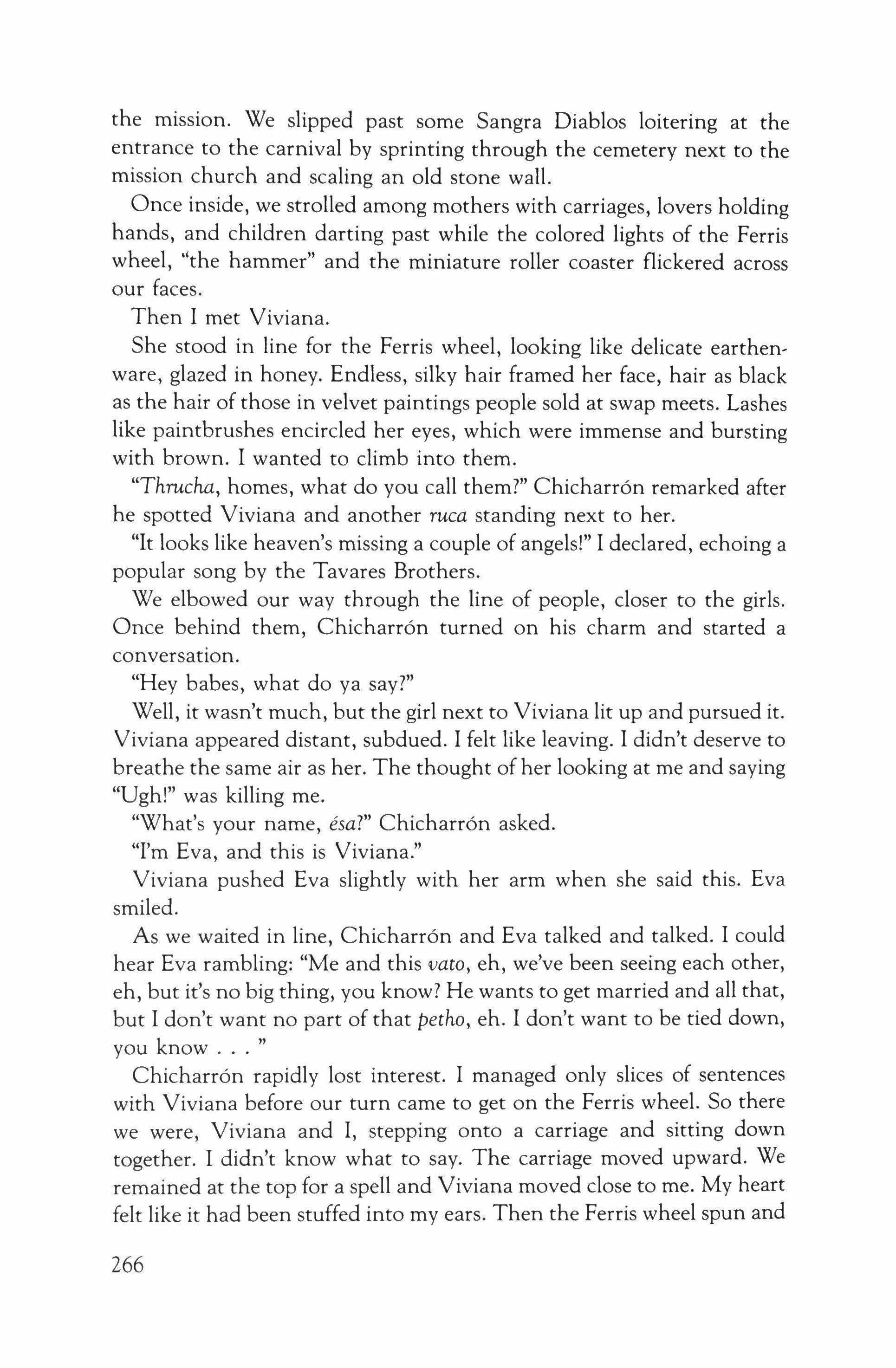
the mISSIon. We slipped past some Sangra Diablos loitering at the entrance to the carnival by sprinting through the cemetery next to the mission church and scaling an old stone wall.
Once inside, we strolled among mothers with carriages, lovers holding hands, and children darting past while the colored lights of the Ferris wheel, "the hammer" and the miniature roller coaster flickered across our faces.
Then I met Viviana.
She stood in line for the Ferris wheel, looking like delicate earthenware, glazed in honey. Endless, silky hair framed her face, hair as black as the hair of those in velvet paintings people sold at swap meets. Lashes like paintbrushes encircled her eyes, which were immense and bursting with brown. I wanted to climb into them.
"Thrueha, homes, what do you call them?" Chicharr6n remarked after he spotted Viviana and another ruea standing next to her.
"It looks like heaven's missing a couple of angels!" I declared, echoing a popular song by the Tavares Brothers.
We elbowed our way through the line of people, closer to the girls. Once behind them, Chicharr6n turned on his charm and started a conversation.
"Hey babes, what do ya say?"
Well, it wasn't much, but the girl next to Viviana lit up and pursued it. Viviana appeared distant, subdued. I felt like leaving. I didn't deserve to breathe the same air as her. The thought of her looking at me and saying "Ugh!" was killing me.
"What's your name, esal" Chicharr6n asked.
"I'm Eva, and this is Viviana."
Viviana pushed Eva slightly with her arm when she said this. Eva smiled.
As we waited in line, Chicharr6n and Eva talked and talked. I could hear Eva rambling: "Me and this vato, eh, we've been seeing each other, eh, but it's no big thing, you know? He wants to get married and all that, but I don't want no part of that petho, eh. I don't want to be tied down, you know
Chicharr6n rapidly lost interest. I managed only slices of sentences with Viviana before our turn came to get on the Ferris wheel. So there we were, Viviana and I, stepping onto a carriage and sitting down together. I didn't know what to say. The carriage moved upward. We remained at the top for a spell and Viviana moved close to me. My heart felt like it had been stuffed into my ears. Then the Ferris wheel spun and
266
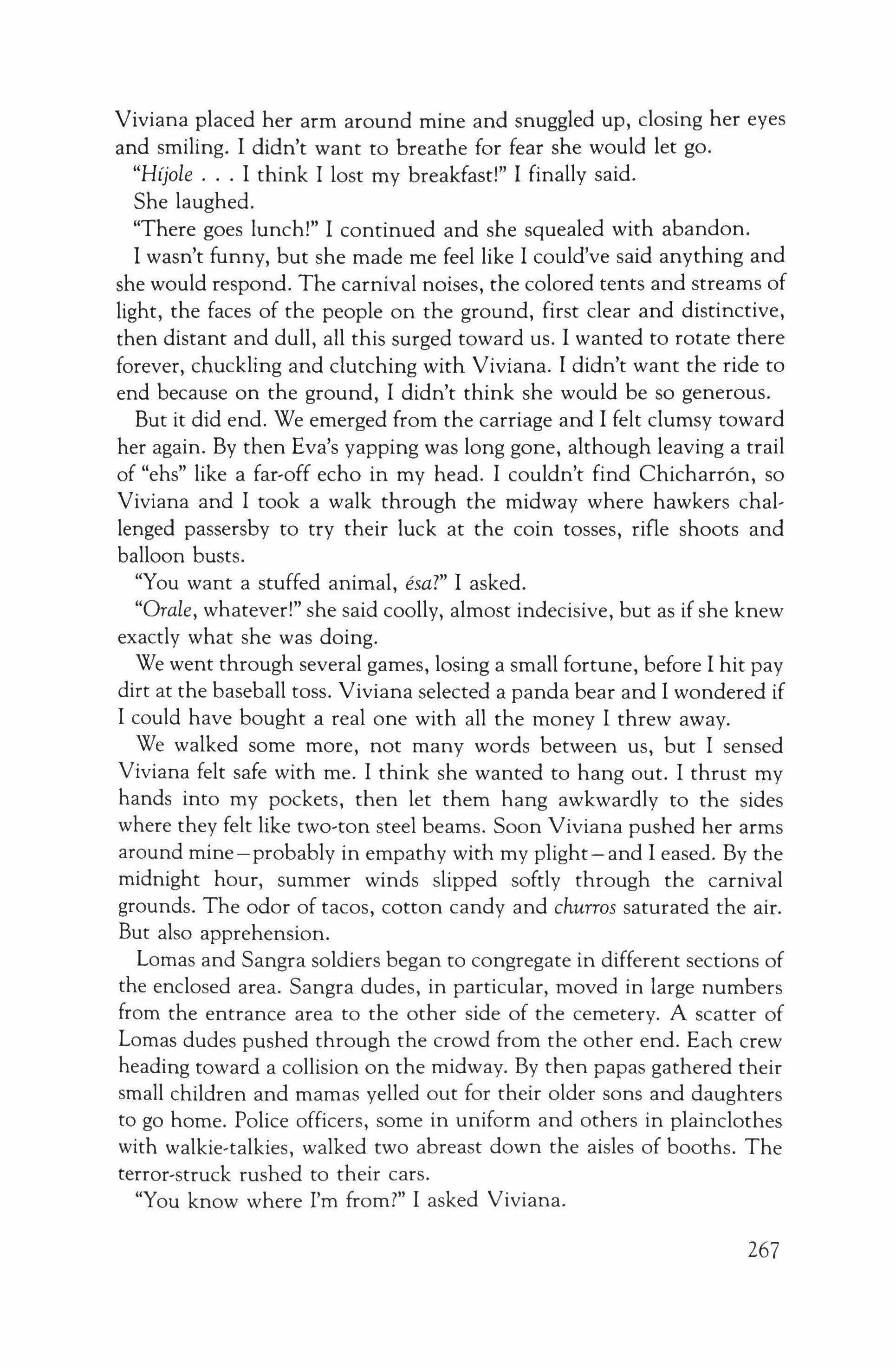
Viviana placed her arm around mine and snuggled up, closing her eyes and smiling. I didn't want to breathe for fear she would let go.
"Hijole I think I lost my breakfast!" I finally said. She laughed.
"There goes lunch!" I continued and she squealed with abandon. I wasn't funny, but she made me feel like I could've said anything and she would respond. The carnival noises, the colored tents and streams of light, the faces of the people on the ground, first clear and distinctive, then distant and dull, all this surged toward us. I wanted to rotate there forever, chuckling and clutching with Viviana. I didn't want the ride to end because on the ground, I didn't think she would be so generous.
But it did end. We emerged from the carriage and I felt clumsy toward her again. By then Eva's yapping was long gone, although leaving a trail of "ehs" like a far-off echo in my head. I couldn't find Chicharron, so
Viviana and I took a walk through the midway where hawkers challenged passersby to try their luck at the coin tosses, rifle shoots and balloon busts.
"You want a stuffed animal, esal" I asked.
"Orale, whatever!" she said coolly, almost indecisive, but as if she knew exactly what she was doing.
We went through several games, losing a small fortune, before I hit pay dirt at the baseball toss. Viviana selected a panda bear and I wondered if I could have bought a real one with all the money I threw away.
We walked some more, not many words between us, but I sensed Viviana felt safe with me. I think she wanted to hang out. 1 thrust my hands into my pockets, then let them hang awkwardly to the sides where they felt like two-ton steel beams. Soon Viviana pushed her arms around mine-probably in empathy with my plight-and I eased. By the midnight hour, summer winds slipped softly through the carnival grounds. The odor of tacos, cotton candy and churros saturated the air. But also apprehension.
Lomas and Sangra soldiers began to congregate in different sections of the enclosed area. Sangra dudes, in particular, moved in large numbers from the entrance area to the other side of the cemetery. A scatter of Lomas dudes pushed through the crowd from the other end. Each crew heading toward a collision on the midway. By then papas gathered their small children and mamas yelled out for their older sons and daughters to go home. Police officers, some in uniform and others in plainclothes with walkie-talkies, walked two abreast down the aisles of booths. The terror-struck rushed to their cars.
"You know where I'm from?" I asked Viviana.
267
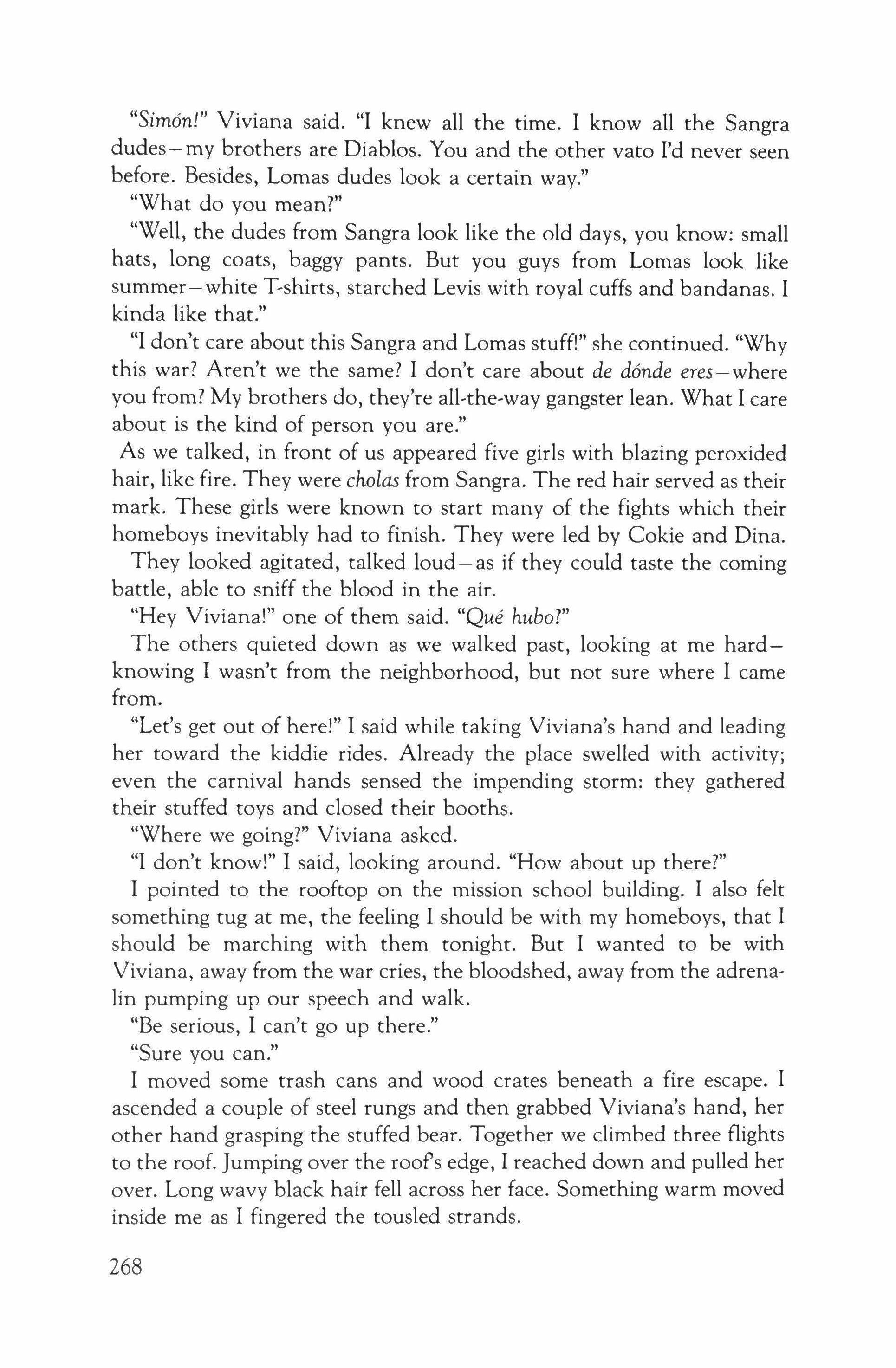
"Simon!" Viviana said. "I knew all the time. I know all the Sangra dudes-my brothers are Diablos. You and the other vato I'd never seen before. Besides, Lomas dudes look a certain way."
"What do you mean?"
"Well, the dudes from Sangra look like the old days, you know: small hats, long coats, baggy pants. But you guys from Lomas look like summer-white T,shirts, starched Levis with royal cuffs and bandanas. I kinda like that."
"I don't care about this Sangra and Lomas stuff!" she continued. "Why this war? Aren't we the same? I don't care about de donde eres-where you from? My brothers do, they're all-the-way gangster lean. What I care about is the kind of person you are."
As we talked, in front of us appeared five girls with blazing peroxided hair, like fire. They were cholas from Sangra. The red hair served as their mark. These girls were known to start many of the fights which their homeboys inevitably had to finish. They were led by Cokie and Dina.
They looked agitated, talked loud - as if they could taste the coming battle, able to sniff the blood in the air.
"Hey Viviana!" one of them said. "Que hubo?"
The others quieted down as we walked past, looking at me hardknowing I wasn't from the neighborhood, but not sure where I came from.
"Let's get out of here!" I said while taking Viviana's hand and leading her toward the kiddie rides. Already the place swelled with activity; even the carnival hands sensed the impending storm: they gathered their stuffed toys and closed their booths.
"Where we going?" Viviana asked.
"I don't know!" I said, looking around. "How about up there?"
I pointed to the rooftop on the mission school building. I also felt something tug at me, the feeling I should be with my homeboys, that I should be marching with them tonight. But I wanted to be with Viviana, away from the war cries, the bloodshed, away from the adrenalin pumping up our speech and walk.
"Be serious, I can't go up there."
"Sure you can."
I moved some trash cans and wood crates beneath a fire escape. I ascended a couple of steel rungs and then grabbed Viviana's hand, her other hand grasping the stuffed bear. Together we climbed three flights to the roof. Jumping over the roofs edge, I reached down and pulled her over. Long wavy black hair fell across her face. Something warm moved inside me as I fingered the tousled strands.
268
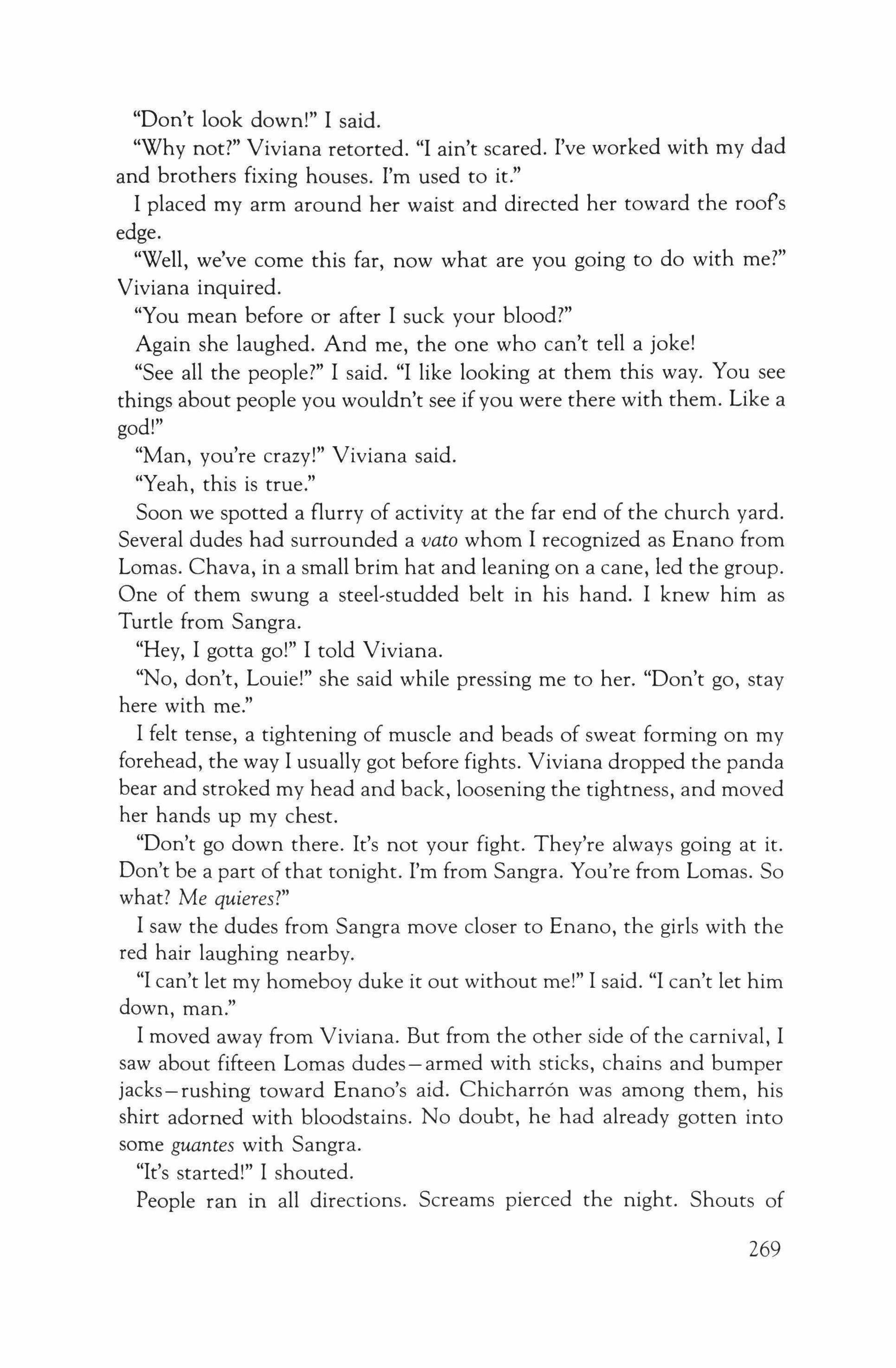
"Don't look down!" I said.
"Why not?" Viviana retorted. "I ain't scared. I've worked with my dad and brothers fixing houses. I'm used to it."
I placed my arm around her waist and directed her toward the roofs edge.
"Well, we've come this far, now what are you going to do with me?" Viviana inquired.
"You mean before or after I suck your blood?"
Again she laughed. And me, the one who can't tell a joke!
"See all the people?" I said. "I like looking at them this way. You see things about people you wouldn't see if you were there with them. Like a god!"
"Man, you're crazy!" Viviana said.
"Yeah, this is true."
Soon we spotted a flurry of activity at the far end of the church yard. Several dudes had surrounded a vato whom I recognized as Enano from Lomas. Chava, in a small brim hat and leaning on a cane, led the group. One of them swung a steel-studded belt in his hand. I knew him as Turtle from Sangra.
"Hey, I gotta go!" I told Viviana.
"No, don't, Louie!" she said while pressing me to her. "Don't go, stay here with me."
I felt tense, a tightening of muscle and beads of sweat forming on my forehead, the way I usually got before fights. Viviana dropped the panda bear and stroked my head and back, loosening the tightness, and moved her hands up my chest.
"Don't go down there. It's not your fight. They're always going at it. Don't be a part of that tonight. I'm from Sangra. You're from Lomas. So what? Me quietest'
I saw the dudes from Sangra move closer to Enano, the girls with the red hair laughing nearby.
"I can't let my homeboy duke it out without me!" I said. "I can't let him down, man."
I moved away from Viviana. But from the other side of the carnival, I saw about fifteen Lomas dudes-armed with sticks, chains and bumper jacks-rushing toward Enano's aid. Chicharr6n was among them, his shirt adorned with bloodstains. No doubt, he had already gotten into some guantes with Sangra.
"It's started!" I shouted.
People ran in all directions. Screams pierced the night. Shouts of
269
"Lomas Rifa" and "Sangra Controla" bellowed as vatos clashed in senseless fury.
"Don't go, prieto!" Viviana repeated as she turned my head toward her. "Stay with me."
I felt torn. There I was, a vato from Lomas staring into the eyes of a Sangra girl. This made me a traitor. But at the same time, all I could think about was her touch, her scent-those eyes.
Viviana stroked my face with a fingertip. Voices heightened below. Footsteps cracked on cement. I nuzzled my face against Viviana's; her lips parted and her eyes closed. Bottles crashed. Trash cans tumbled over.
Viviana breathed into my mouth and I licked her lips lightly with my tongue. Sounds of shooting. Strained shouts. She placed her hand against the back of my head as we kissed, and reached deep inside my mouth as a sweet burning crawled over me. Sirens wailed in the distance. A child cried.
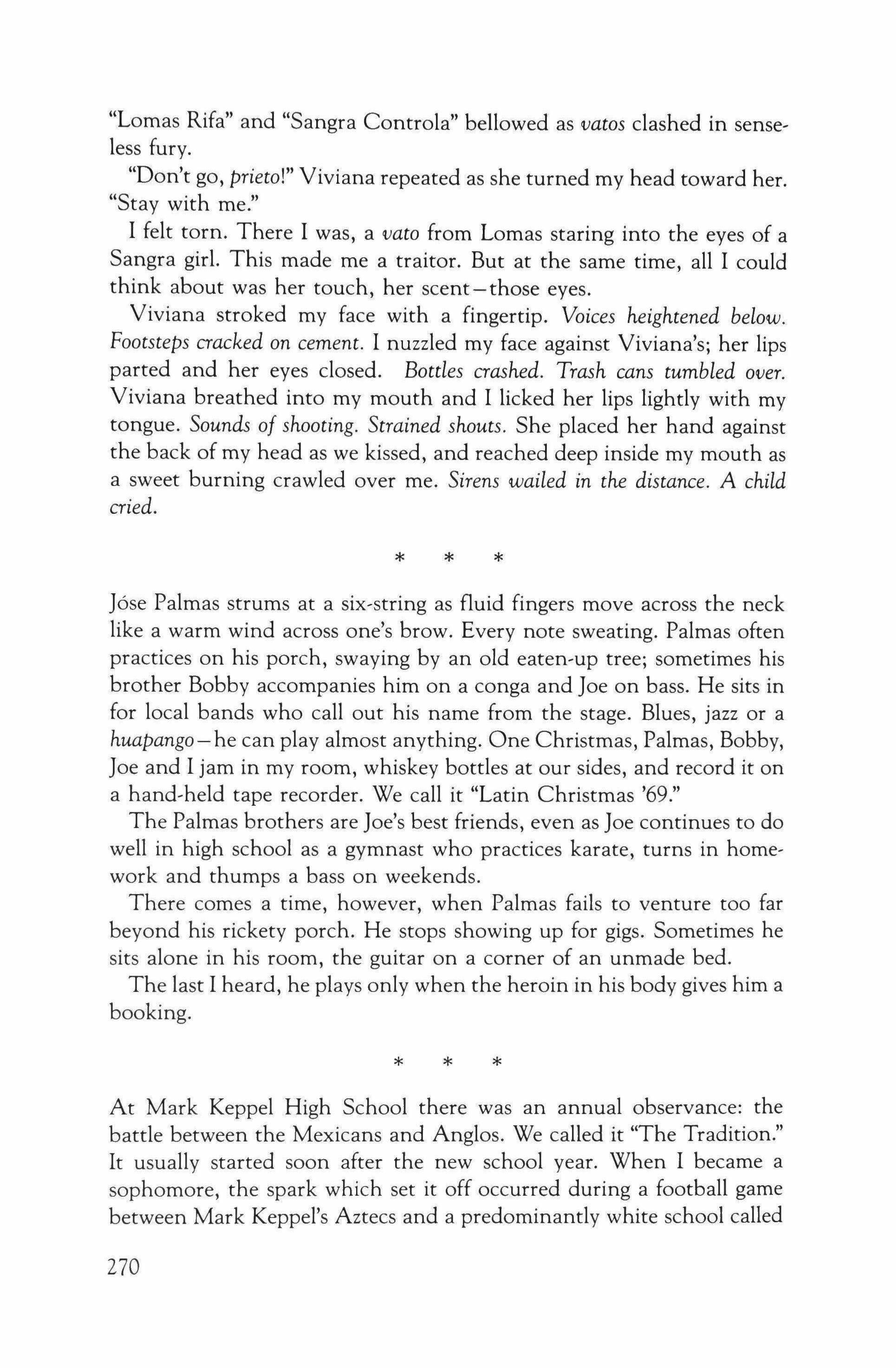
[ose Palmas strums at a six-string as fluid fingers move across the neck like a warm wind across one's brow. Every note sweating. Palmas often practices on his porch, swaying by an old eaten-up tree; sometimes his brother Bobby accompanies him on a conga and Joe on bass. He sits in for local bands who call out his name from the stage. Blues, jazz or a huapango-he can play almost anything. One Christmas, Palmas, Bobby, Joe and I jam in my room, whiskey bottles at our sides, and record it on a hand-held tape recorder. We call it "Latin Christmas '69."
The Palmas brothers are Joe's best friends, even as Joe continues to do well in high school as a gymnast who practices karate, turns in hornework and thumps a bass on weekends.
There comes a time, however, when Palmas fails to venture too far beyond his rickety porch. He stops showing up for gigs. Sometimes he sits alone in his room, the guitar on a corner of an unmade bed.
The last I heard, he plays only when the heroin in his body gives him a booking.
At Mark Keppel High School there was an annual observance: the battle between the Mexicans and Anglos. We called it "The Tradition." It usually started soon after the new school year. When I became a sophomore, the spark which set it off occurred during a football game between Mark Keppel's Aztecs and a predominantly white school called
* * *
* * *
270
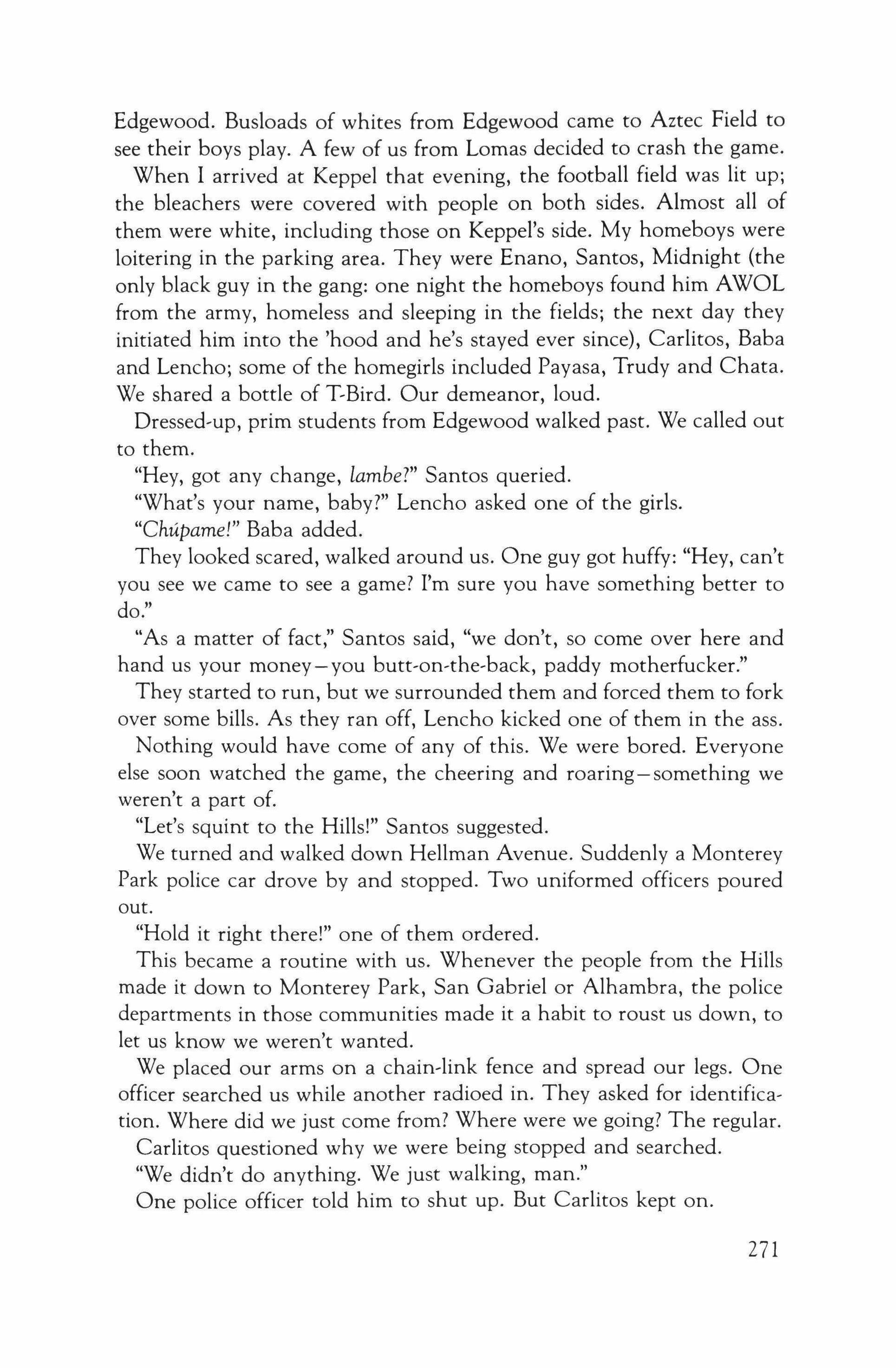
Edgewood. Busloads of whites from Edgewood came to Aztec Field to see their boys play. A few of us from Lomas decided to crash the game.
When I arrived at Keppel that evening, the football field was lit up; the bleachers were covered with people on both sides. Almost all of them were white, including those on Keppel's side. My homeboys were loitering in the parking area. They were Enano, Santos, Midnight (the only black guy in the gang: one night the homeboys found him AWOL from the army, homeless and sleeping in the fields; the next day they initiated him into the 'hood and he's stayed ever since), Carlitos, Baba and Lencho; some of the homegirls included Payasa, Trudy and Chata. We shared a bottle of T-Bird. Our demeanor, loud.
Dressed-up, prim students from Edgewood walked past. We called out to them.
"Hey, got any change, Lambe?" Santos queried.
"What's your name, baby?" Lencho asked one of the girls. "Chtipame!" Baba added.
They looked scared, walked around us. One guy got huffy: "Hey, can't you see we came to see a game? I'm sure you have something better to do."
"As a matter of fact," Santos said, "we don't, so come over here and hand us your money-you butt-on-the-back, paddy motherfucker."
They started to run, but we surrounded them and forced them to fork over some bills. As they ran off, Lencho kicked one of them in the ass.
Nothing would have come of any of this. We were bored. Everyone else soon watched the game, the cheering and roaring-something we weren't a part of.
"Let's squint to the Hills!" Santos suggested.
We turned and walked down Hellman Avenue. Suddenly a Monterey Park police car drove by and stopped. Two uniformed officers poured out.
"Hold it right there!" one of them ordered.
This became a routine with us. Whenever the people from the Hills made it down to Monterey Park, San Gabriel or Alhambra, the police departments in those communities made it a habit to roust us down, to let us know we weren't wanted.
We placed our arms on a chain-link fence and spread our legs. One officer searched us while another radioed in. They asked for identification. Where did we just come from? Where were we going? The regular.
Carlitos questioned why we were being stopped and searched.
"We didn't do anything. We just walking, man."
One police officer told him to shut up. But Carlitos kept on.
271
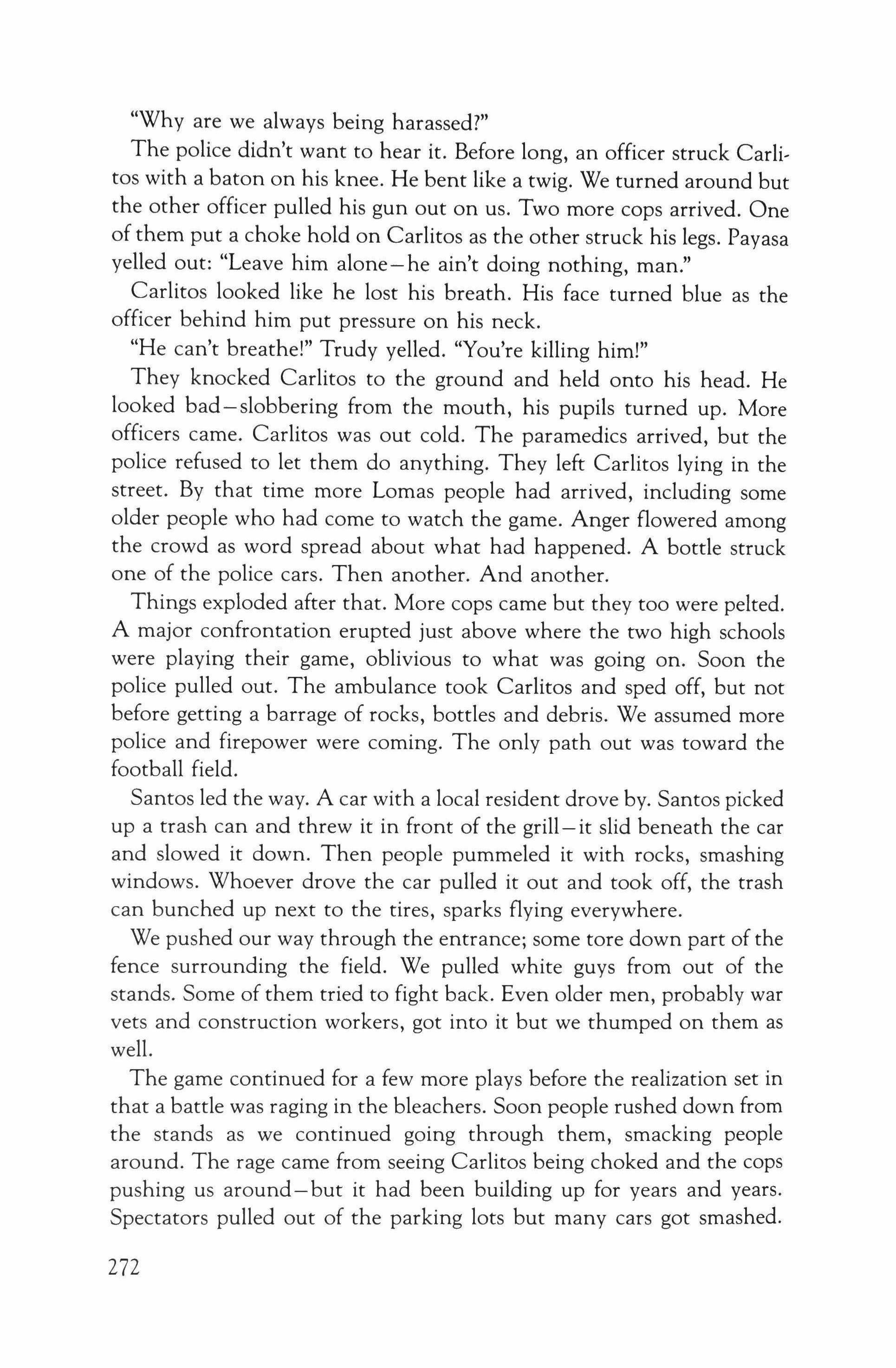
"Why are we always being harassed?"
The police didn't want to hear it. Before long, an officer struck Carlitos with a baton on his knee. He bent like a twig. We turned around but the other officer pulled his gun out on us. Two more cops arrived. One of them put a choke hold on Carlitos as the other struck his legs. Payasa yelled out: "Leave him alone-he ain't doing nothing, man."
Carlitos looked like he lost his breath. His face turned blue as the officer behind him put pressure on his neck.
"He can't breathe!" Trudy yelled. "You're killing him!"
They knocked Carlitos to the ground and held onto his head. He looked bad-slobbering from the mouth, his pupils turned up. More officers came. Carlitos was out cold. The paramedics arrived, but the police refused to let them do anything. They left Carlitos lying in the street. By that time more Lomas people had arrived, including some older people who had come to watch the game. Anger flowered among the crowd as word spread about what had happened. A bottle struck one of the police cars. Then another. And another.
Things exploded after that. More cops came but they too were pelted. A major confrontation erupted just above where the two high schools were playing their game, oblivious to what was going on. Soon the police pulled out. The ambulance took Carlitos and sped off, but not before getting a barrage of rocks, bottles and debris. We assumed more police and firepower were coming. The only path out was toward the football field.
Santos led the way. A car with a local resident drove by. Santos picked up a trash can and threw it in front of the grill- it slid beneath the car and slowed it down. Then people pummeled it with rocks, smashing windows. Whoever drove the car pulled it out and took off, the trash can bunched up next to the tires, sparks flying everywhere.
We pushed our way through the entrance; some tore down part of the fence surrounding the field. We pulled white guys from out of the stands. Some of them tried to fight back. Even older men, probably war vets and construction workers, got into it but we thumped on them as well.
The game continued for a few more plays before the realization set in that a battle was raging in the bleachers. Soon people rushed down from the stands as we continued going through them, smacking people around. The rage came from seeing Carlitos being choked and the cops pushing us around-but it had been building up for years and years. Spectators pulled out of the parking lots but many cars got smashed.
272
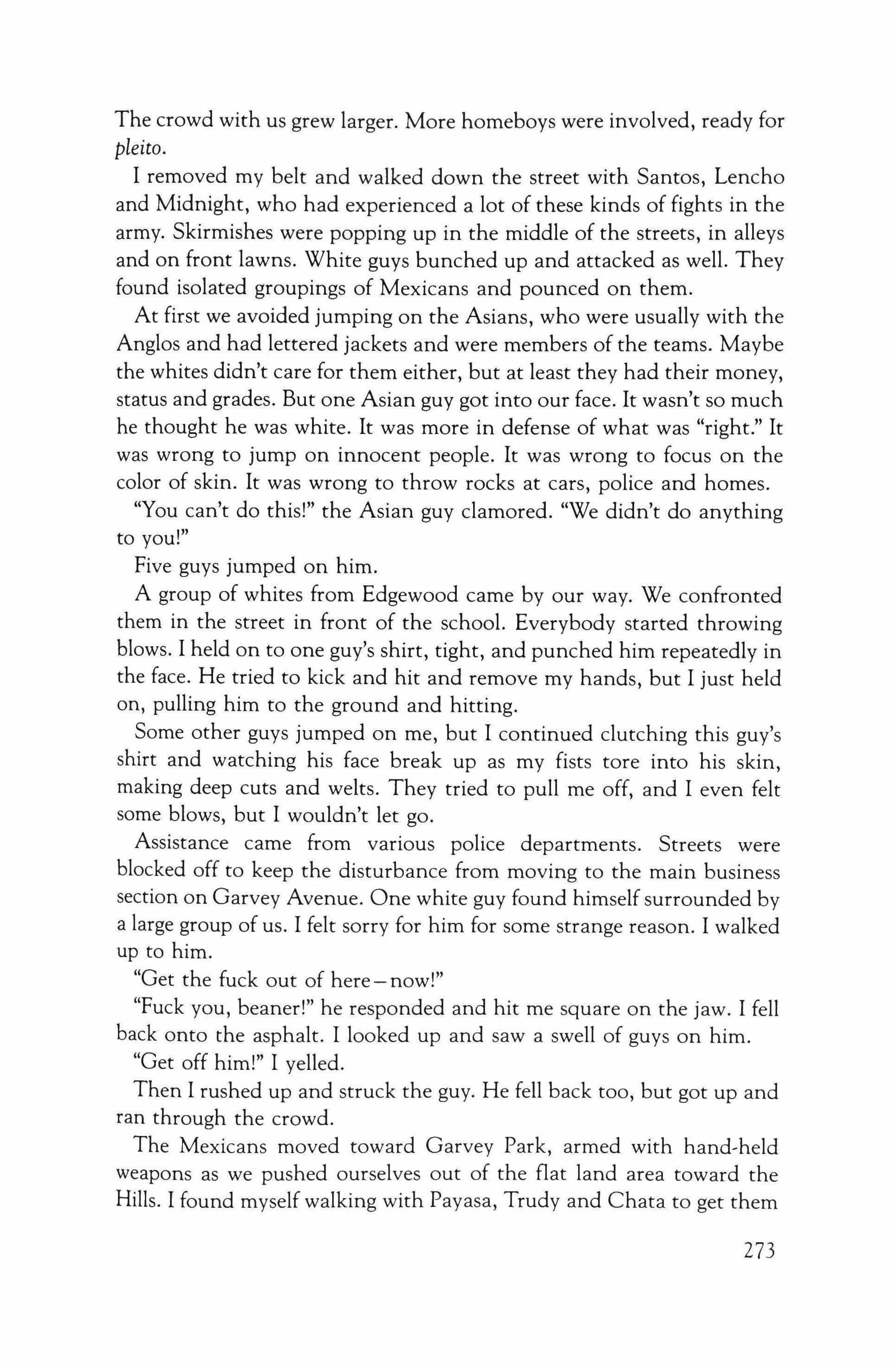
The crowd with us grew larger. More homeboys were involved, ready for pleito.
I removed my belt and walked down the street with Santos, Lencho and Midnight, who had experienced a lot of these kinds of fights in the army. Skirmishes were popping up in the middle of the streets, in alleys and on front lawns. White guys bunched up and attacked as well. They found isolated groupings of Mexicans and pounced on them.
At first we avoided jumping on the Asians, who were usually with the Anglos and had lettered jackets and were members of the teams. Maybe the whites didn't care for them either, but at least they had their money, status and grades. But one Asian guy got into our face. It wasn't so much he thought he was white. It was more in defense of what was "right." It was wrong to jump on innocent people. It was wrong to focus on the color of skin. It was wrong to throw rocks at cars, police and homes.
"You can't do this!" the Asian guy clamored. "We didn't do anything to you!"
Five guys jumped on him.
A group of whites from Edgewood came by our way. We confronted them in the street in front of the school. Everybody started throwing blows. I held on to one guy's shirt, tight, and punched him repeatedly in the face. He tried to kick and hit and remove my hands, but I just held on, pulling him to the ground and hitting.
Some other guys jumped on me, but I continued clutching this guy's shirt and watching his face break up as my fists tore into his skin, making deep cuts and welts. They tried to pull me off, and I even felt some blows, but I wouldn't let go.
Assistance came from various police departments. Streets were blocked off to keep the disturbance from moving to the main business section on Garvey Avenue. One white guy found himself surrounded by a large group of us. I felt sorry for him for some strange reason. I walked up to him.
"Get the fuck out of here-now!"
"Fuck you, beaner!" he responded and hit me square on the jaw. I fell back onto the asphalt. I looked up and saw a swell of guys on him.
"Get off him!" I yelled.
Then I rushed up and struck the guy. He fell back too, but got up and ran through the crowd.
The Mexicans moved toward Garvey Park, armed with hand-held weapons as we pushed ourselves out of the flat land area toward the Hills. I found myself walking with Payasa, Trudy and Chata to get them
273
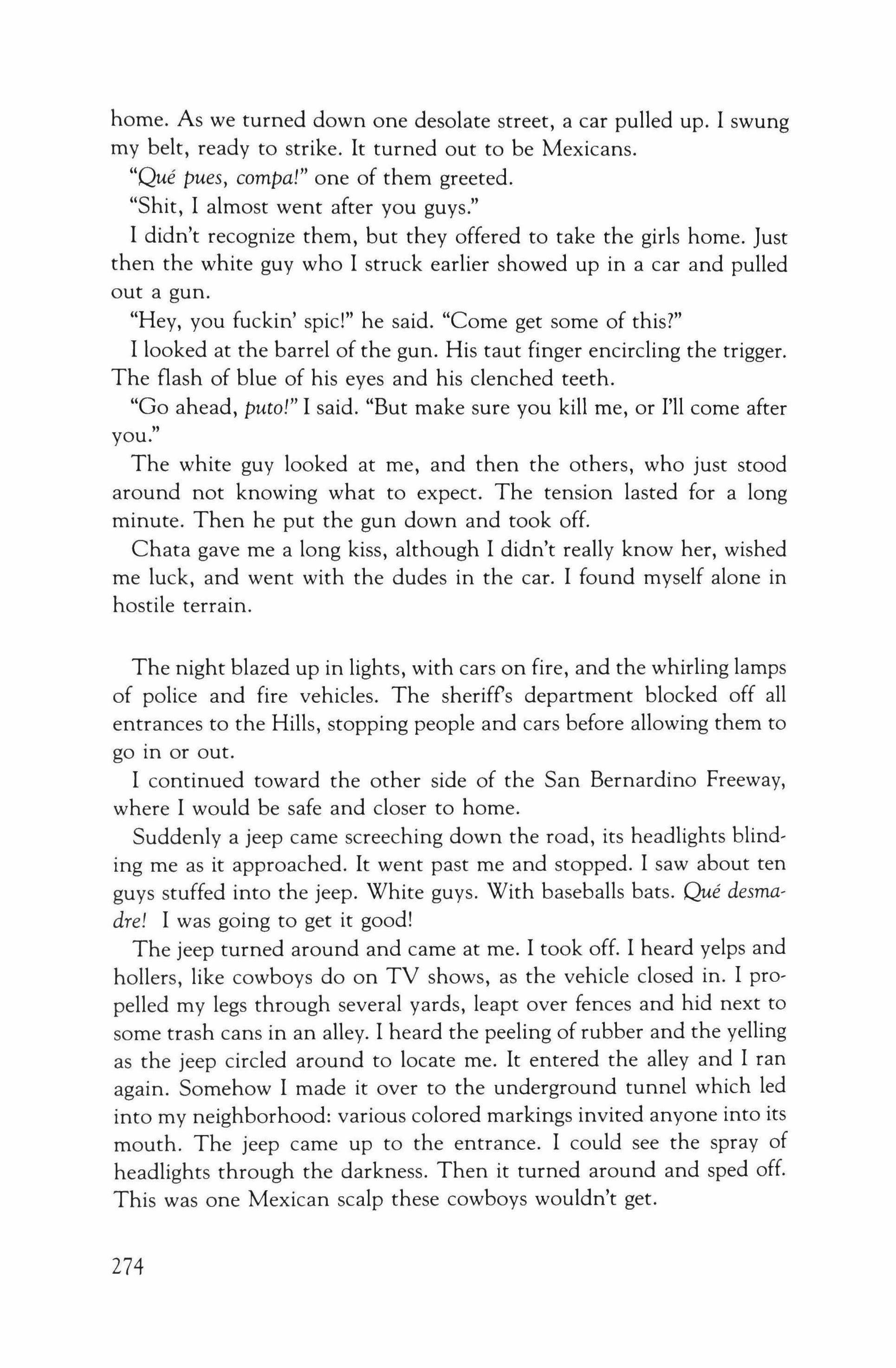
home. As we turned down one desolate street, a car pulled up. I swung my belt, ready to strike. It turned out to be Mexicans.
"Que pues, campa!" one of them greeted.
"Shit, I almost went after you guys."
I didn't recognize them, but they offered to take the girls home. Just then the white guy who I struck earlier showed up in a car and pulled out a gun.
"Hey, you fuckin' spic!" he said. "Come get some of this?"
I looked at the barrel of the gun. His taut finger encircling the trigger. The flash of blue of his eyes and his clenched teeth.
"Go ahead, puta!" I said. "But make sure you kill me, or I'll come after you."
The white guy looked at me, and then the others, who just stood around not knowing what to expect. The tension lasted for a long minute. Then he put the gun down and took off.
Chata gave me a long kiss, although I didn't really know her, wished me luck, and went with the dudes in the car. I found myself alone in hostile terrain.
The night blazed up in lights, with cars on fire, and the whirling lamps of police and fire vehicles. The sheriffs department blocked off all entrances to the Hills, stopping people and cars before allowing them to go in or out.
I continued toward the other side of the San Bernardino Freeway, where I would be safe and closer to home.
Suddenly a jeep came screeching down the road, its headlights blinding me as it approached. It went past me and stopped. I saw about ten guys stuffed into the jeep. White guys. With baseballs bats. Que desmadre! I was going to get it good!
The jeep turned around and came at me. I took off. I heard yelps and hollers, like cowboys do on TV shows, as the vehicle closed in. I propelled my legs through several yards, leapt over fences and hid next to some trash cans in an alley. I heard the peeling of rubber and the yelling as the jeep circled around to locate me. It entered the alley and I ran again. Somehow I made it over to the underground tunnel which led into my neighborhood: various colored markings invited anyone into its mouth. The jeep came up to the entrance. I could see the spray of headlights through the darkness. Then it turned around and sped off. This was one Mexican scalp these cowboys wouldn't get.
274
The next Monday at school the fights continued. The Tradition for that year had started. Mexicans roamed the hallways, beating on any white guy they could see. Girls got into it too, ripping off the blouses of the prim and proper "society" girls and wreaking havoc in the gym area. Parents came to pull their kids out of school.
Some whites gathered in the parking lot and began an offensive. The fights would last for two or three weeks, tapering off with fights here and there, and then holding on for the rest of the year with only isolated incidents. But during the heat of the Tradition, classes had to be closed. Police brought in. Ambulances summoned. It was intense.
The whites in school brought in dudes from out of the area. They were tall, wide with long blond hair. Two carloads cruised by where the Mexicans assembled by the gnarled tree. Santos, Chicharron and Tiburon were there to challenge them. The white dudes got out of their cars, armed with bats. But it didn't stop the homeboys from Lomas. I saw them attack the dudes while I looked out the window of a classroom. I rushed out with a few others, even though the class was still in session.
As one white guy swung his bat to strike Santos, Chicharron came from behind and hit him over the head with a tire iron. Lencho and Wilo also showed up and went blow to blow with the others. I jumped on one guy. Soon the police came. As usual, they went after the Mexicans. The white dudes got into their cars and split without any trouble. But the rest of us were pulled to the ground, hands forced behind our backs. Guns pointed at our heads.
School officials had the police take us to the office. The police left after they had resumed some order. All of us still in the school (Santos and Tiburon were dropouts already, and were dragged to the police station) were expelled. This was fine with me. I hated school. And I loved fighting. And they weren't going well together.
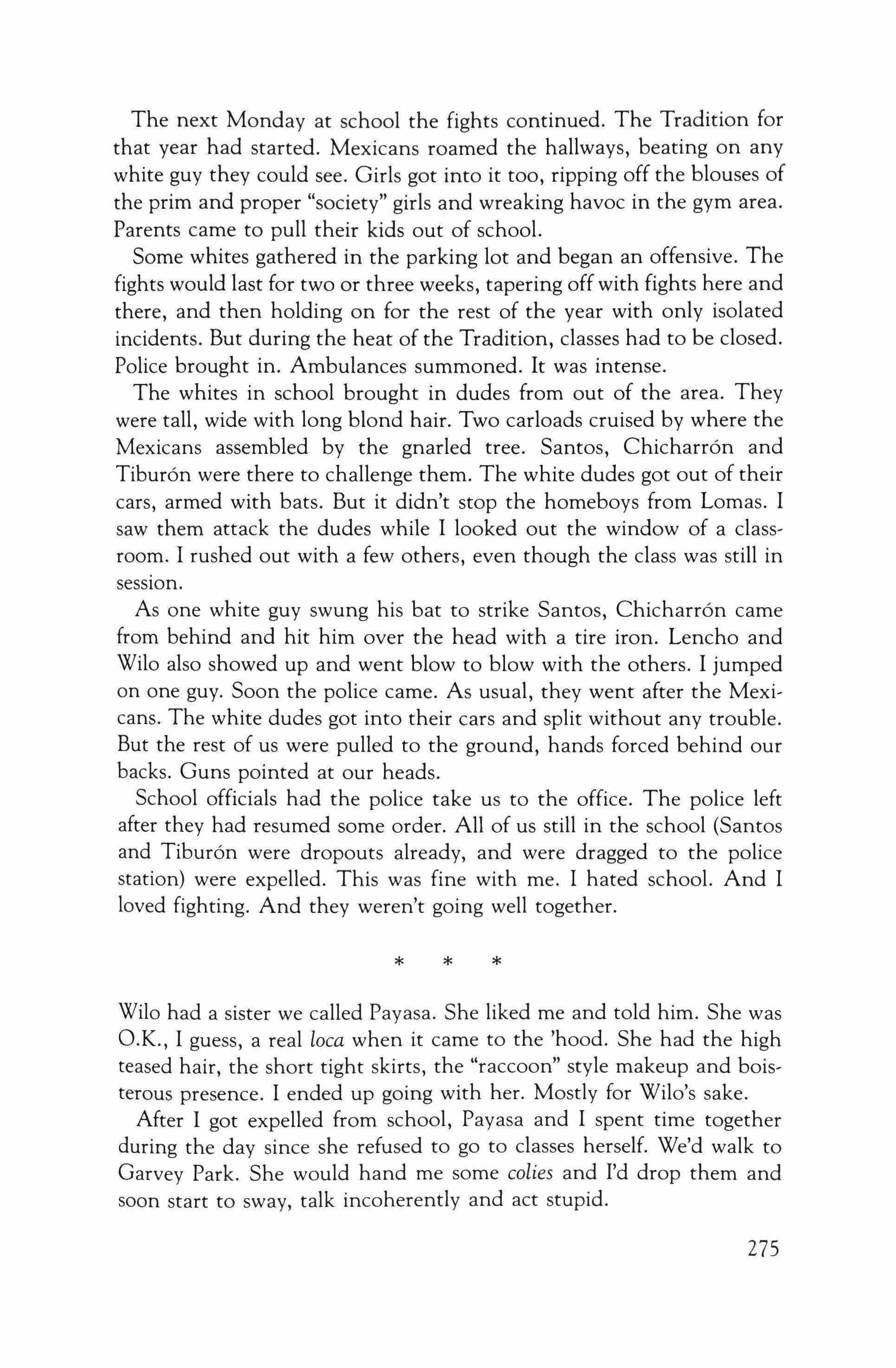
Wilo had a sister we called Payasa. She liked me and told him. She was O.K., I guess, a reallaca when it came to the 'hood. She had the high teased hair, the short tight skirts, the "raccoon" style makeup and boisterous presence. I ended up going with her. Mostly for Wilo's sake.
After I got expelled from school, Payasa and I spent time together during the day since she refused to go to classes herself. We'd walk to Garvey Park. She would hand me some coiies and I'd drop them and soon start to sway, talk incoherently and act stupid.
* * *
275
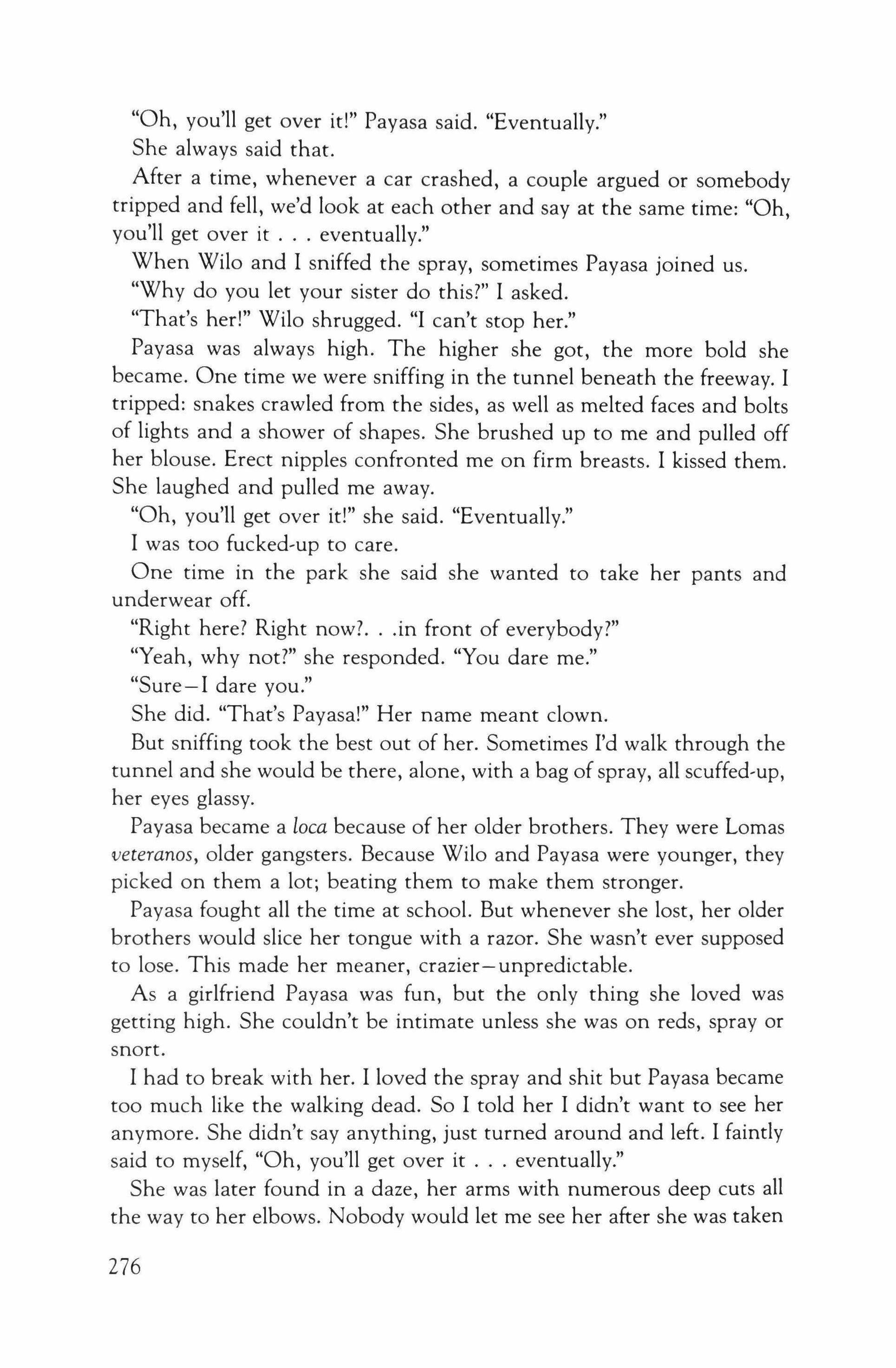
"Oh, you'll get over it!" Payasa said. "Eventually." She always said that.
After a time, whenever a car crashed, a couple argued or somebody tripped and fell, we'd look at each other and say at the same time: "Oh, you'll get over it eventually."
When Wilo and I sniffed the spray, sometimes Payasa joined us.
"Why do you let your sister do this?" I asked.
"That's her!" Wilo shrugged. "I can't stop her."
Payasa was always high. The higher she got, the more bold she became. One time we were sniffing in the tunnel beneath the freeway. I tripped: snakes crawled from the sides, as well as melted faces and bolts of lights and a shower of shapes. She brushed up to me and pulled off her blouse. Erect nipples confronted me on firm breasts. I kissed them. She laughed and pulled me away.
"Oh, you'll get over it!" she said. "Eventually."
I was too fucked-up to care.
One time in the park she said she wanted to take her pants and underwear off.
"Right here? Right now? in front of everybody?"
"Yeah, why not?" she responded. "You dare me."
"Sure-I dare you."
She did. "That's Payasa!" Her name meant clown.
But sniffing took the best out of her. Sometimes I'd walk through the tunnel and she would be there, alone, with a bag of spray, all scuffed-up, her eyes glassy.
Payasa became a loca because of her older brothers. They were Lomas veteranos, older gangsters. Because Wilo and Payasa were younger, they picked on them a lot; beating them to make them stronger.
Payasa fought all the time at school. But whenever she lost, her older brothers would slice her tongue with a razor. She wasn't ever supposed to lose. This made her meaner, crazier-unpredictable.
As a girlfriend Payasa was fun, but the only thing she loved was getting high. She couldn't be intimate unless she was on reds, spray or snort.
I had to break with her. I loved the spray and shit but Payasa became too much like the walking dead. So I told her I didn't want to see her anymore. She didn't say anything, just turned around and left. I faintly said to myself, "Oh, you'll get over it eventually."
She was later found in a daze, her arms with numerous deep cuts all the way to her elbows. Nobody would let me see her after she was taken
276
to a rehabilitation hospital for teenage addicts. Wilo suggested I let it go.
"That's Payasa, man!" Wilo said, and shrugged his shoulders.
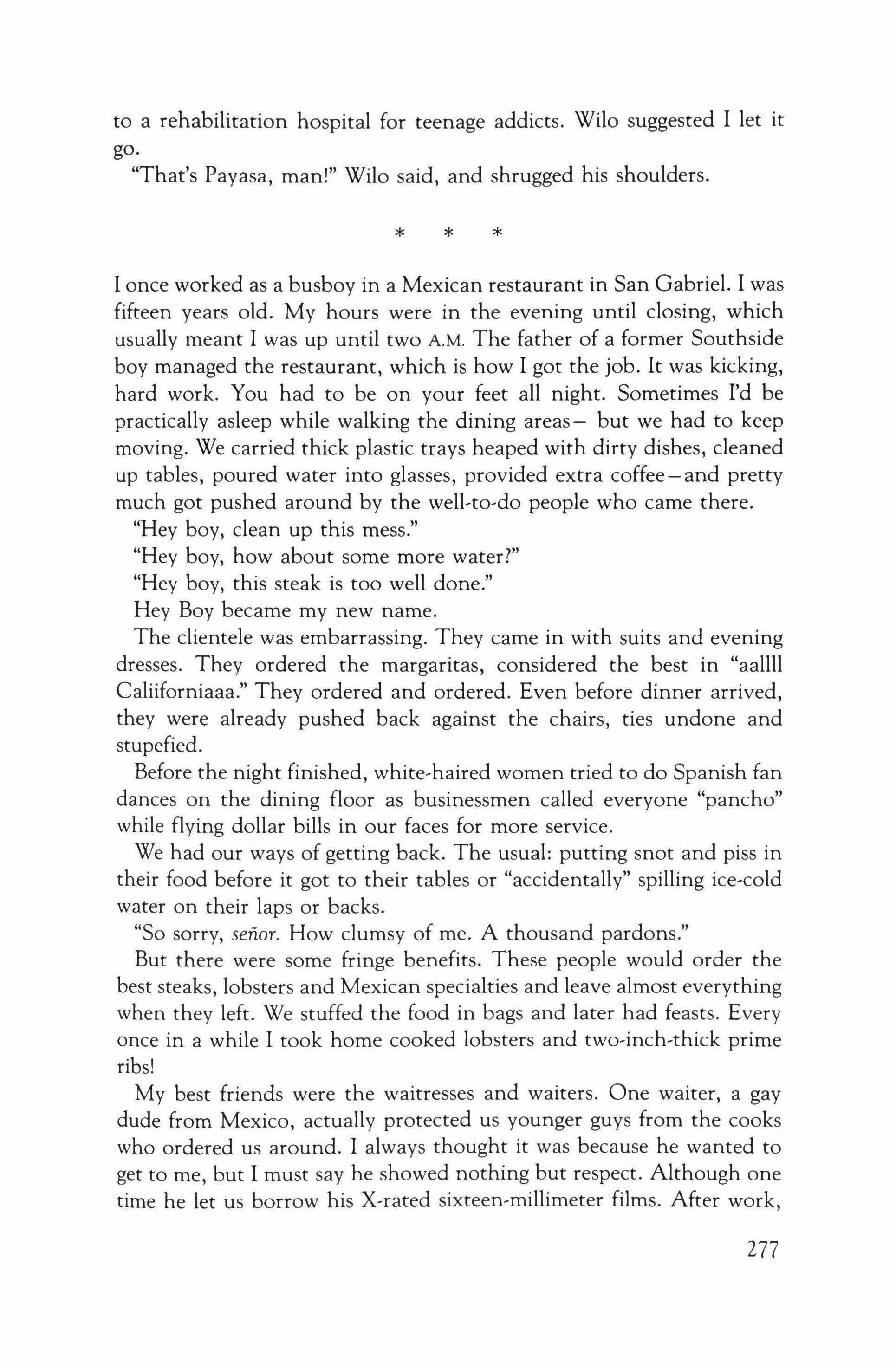
I once worked as a busboy in a Mexican restaurant in San Gabriel. I was fifteen years old. My hours were in the evening until closing, which usually meant I was up until two A.M. The father of a former Southside boy managed the restaurant, which is how I got the job. It was kicking, hard work. You had to be on your feet all night. Sometimes I'd be practically asleep while walking the dining areas - but we had to keep moving. We carried thick plastic trays heaped with dirty dishes, cleaned up tables, poured water into glasses, provided extra coffee - and pretty much got pushed around by the well-to-do people who came there.
"Hey boy, clean up this mess."
"Hey boy, how about some more water?"
"Hey boy, this steak is too well done."
Hey Boy became my new name.
The clientele was embarrassing. They came in with suits and evening dresses. They ordered the margaritas, considered the best in "aallll Caliiforniaaa." They ordered and ordered. Even before dinner arrived, they were already pushed back against the chairs, ties undone and stupefied.
Before the night finished, white-haired women tried to do Spanish fan dances on the dining floor as businessmen called everyone "pancho" while flying dollar bills in our faces for more service.
We had our ways of getting back. The usual: putting snot and piss in their food before it got to their tables or "accidentally" spilling ice-cold water on their laps or backs.
"So sorry, senor. How clumsy of me. A thousand pardons."
But there were some fringe benefits. These people would order the best steaks, lobsters and Mexican specialties and leave almost everything when they left. We stuffed the food in bags and later had feasts. Every once in a while I took home cooked lobsters and two-inch-thick prime ribs!
My best friends were the waitresses and waiters. One waiter, a gay dude from Mexico, actually protected us younger guys from the cooks who ordered us around. I always thought it was because he wanted to get to me, but I must say he showed nothing but respect. Although one time he let us borrow his X-rated sixteen-millimeter films. After work,
* * *
277
the busboys got together for a marathon viewing of his films while dropping pills and chasing them with tequila.
The waitresses were also cool and understanding, considering they had to endure even more abuse since they were women-dressed in peasant blouses, which had been plunged down to reveal their shoulders, and short poblana skirts with ruffles. They helped make sure I didn't get cheated on the tips, something the waiters weren't too inclined to do.
But the most interesting part of the job involved the raids. Almost all of us who worked in the restaurant were undocumented immigrants. Every so often, the immigration authorities assaulted the place. They would close doors. Pull out badges.
"This is the United States Border Patrol!" they'd yell. "Nobody move nadie se mueve."
Cooks flew out of kitchen windows.
They tried to pull me into their detention vans, but I carried a foodstained and slightly torn copy of my birth certificate in my pocket. It saved me from being deported, although there were times I thought it wouldn't matter and I'd have to call home from Tijuana.
After about a week, the ones they threw across the border were back at work.
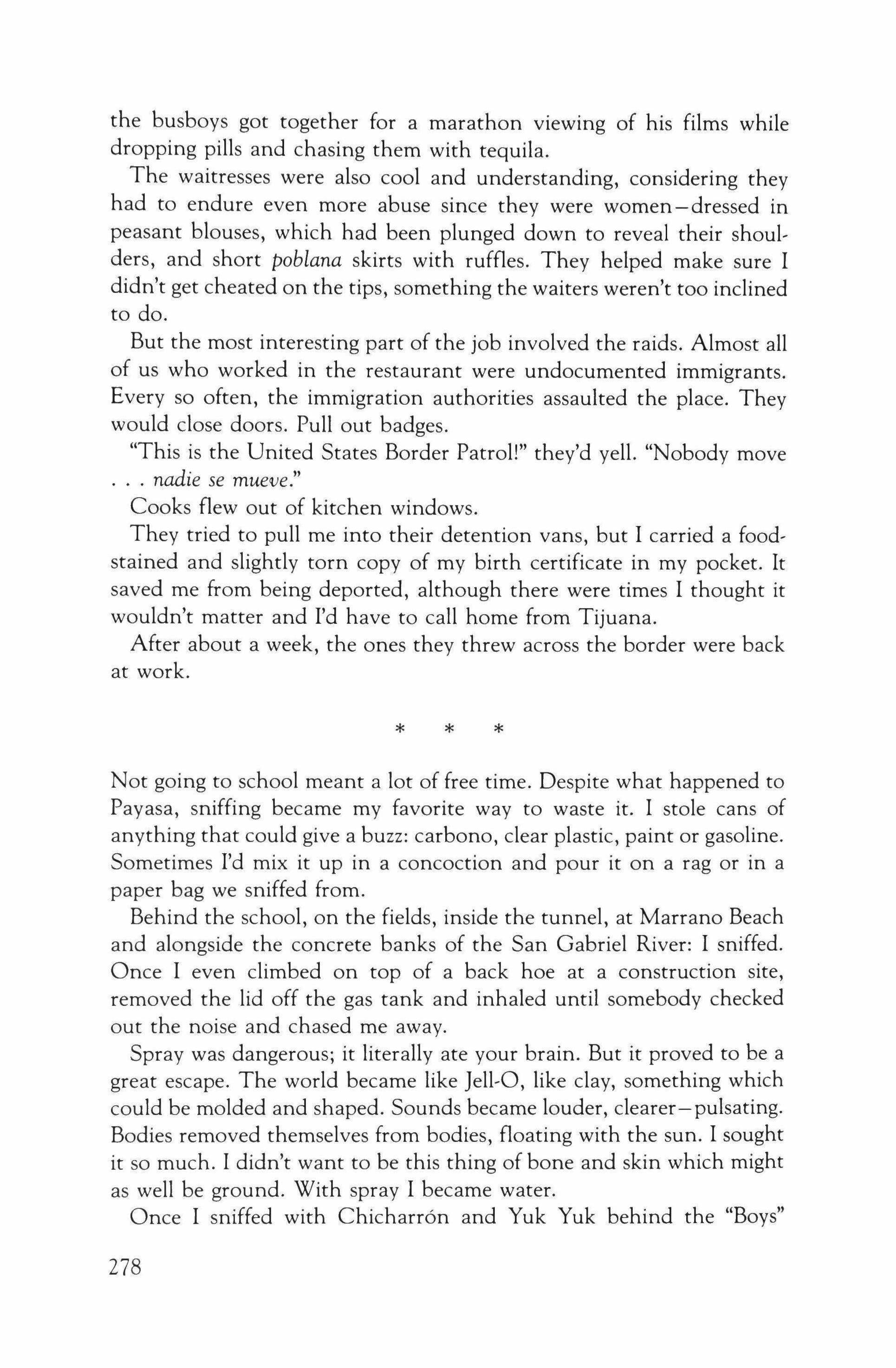
Not going to school meant a lot of free time. Despite what happened to Payasa, sniffing became my favorite way to waste it. I stole cans of anything that could give a buzz: carbono, clear plastic, paint or gasoline. Sometimes I'd mix it up in a concoction and pour it on a rag or in a paper bag we sniffed from.
Behind the school, on the fields, inside the tunnel, at Marrano Beach and alongside the concrete banks of the San Gabriel River: I sniffed. Once I even climbed on top of a back hoe at a construction site, removed the lid off the gas tank and inhaled until somebody checked out the noise and chased me away.
Spray was dangerous; it literally ate your brain. But it proved to be a great escape. The world became like jell-O, like clay, something which could be molded and shaped. Sounds became louder, clearer-pulsating. Bodies removed themselves from bodies, floating with the sun. I sought it so much. I didn't want to be this thing of bone and skin which might as well be ground. With spray I became water.
Once I sniffed with Chicharr6n and Yuk Yuk behind the "Boys"
* * *
278
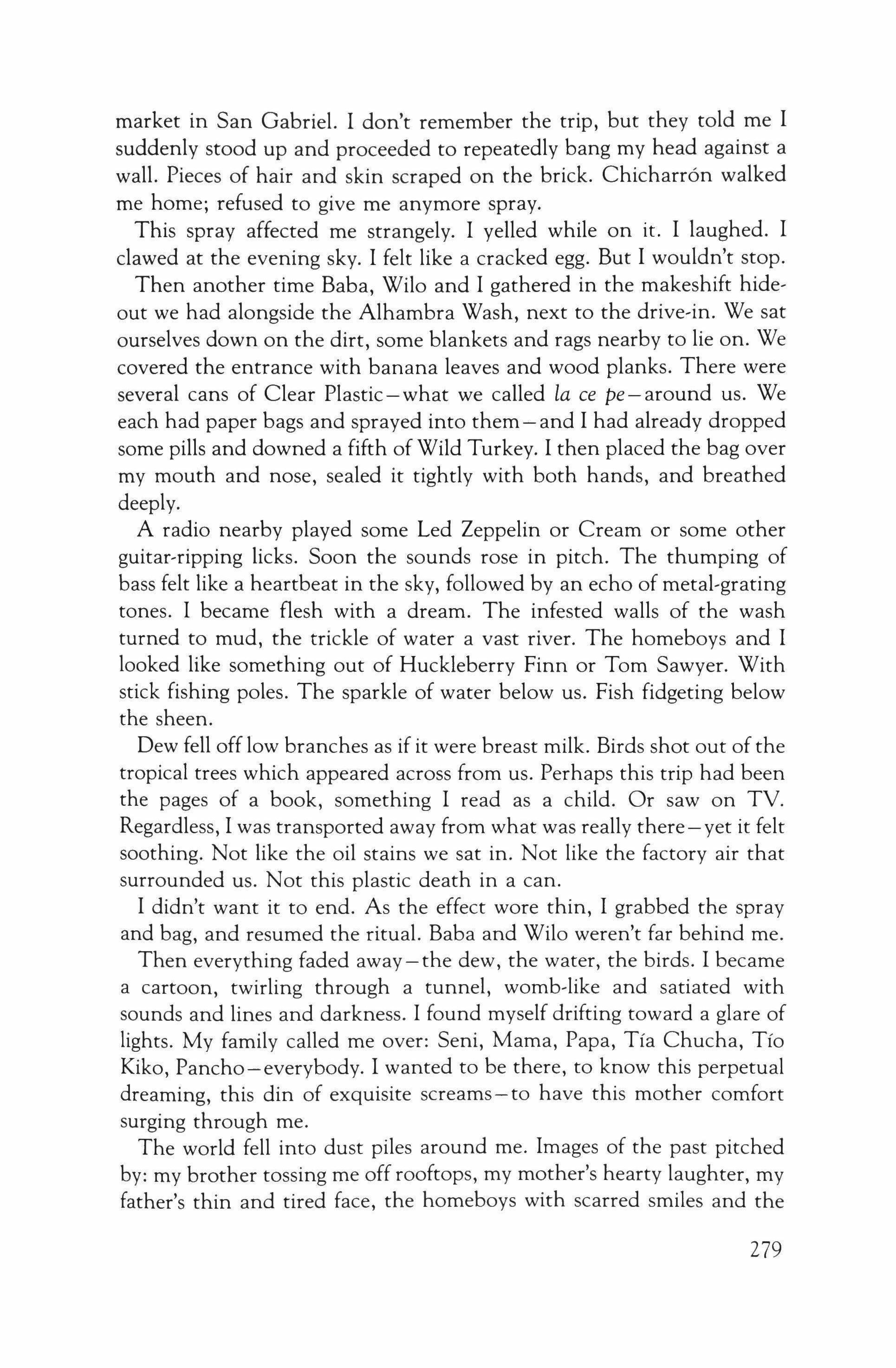
market in San Gabriel. 1 don't remember the trip, but they told me I suddenly stood up and proceeded to repeatedly bang my head against a wall. Pieces of hair and skin scraped on the brick. Chicharr6n walked me home; refused to give me anymore spray.
This spray affected me strangely. I yelled while on it. I laughed. I clawed at the evening sky. 1 felt like a cracked egg. But I wouldn't stop.
Then another time Baba, Wilo and I gathered in the makeshift hideout we had alongside the Alhambra Wash, next to the drive-in. We sat ourselves down on the dirt, some blankets and rags nearby to lie on. We covered the entrance with banana leaves and wood planks. There were several cans of Clear Plastic-what we called la ce pe-around us. We each had paper bags and sprayed into them - and I had already dropped some pills and downed a fifth of Wild Turkey. I then placed the bag over my mouth and nose, sealed it tightly with both hands, and breathed deeply.
A radio nearby played some Led Zeppelin or Cream or some other guitar-ripping licks. Soon the sounds rose in pitch. The thumping of bass felt like a heartbeat in the sky, followed by an echo of metal-grating tones. I became flesh with a dream. The infested walls of the wash turned to mud, the trickle of water a vast river. The homeboys and I looked like something out of Huckleberry Finn or Tom Sawyer. With stick fishing poles. The sparkle of water below us. Fish fidgeting below the sheen.
Dew fell off low branches as if it were breast milk. Birds shot out of the tropical trees which appeared across from us. Perhaps this trip had been the pages of a book, something I read as a child. Or saw on TV. Regardless, 1 was transported away from what was really there-yet it felt soothing. Not like the oil stains we sat in. Not like the factory air that surrounded us. Not this plastic death in a can.
I didn't want it to end. As the effect wore thin, I grabbed the spray and bag, and resumed the ritual. Baba and Wilo weren't far behind me.
Then everything faded away-the dew, the water, the birds. 1 became a cartoon, twirling through a tunnel, womb-like and satiated with sounds and lines and darkness. I found myself drifting toward a glare of lights. My family called me over: Seni, Mama, Papa, Tia Chucha, Tio Kiko, Pancho-everybody. 1 wanted to be there, to know this perpetual dreaming, this din of exquisite screams-to have this mother comfort surging through me.
The world fell into dust piles around me. Images of the past pitched by: my brother tossing me off rooftops, my mother's hearty laughter, my father's thin and tired face, the homeboys with scarred smiles and the
279
women with exotic eyes and cunts which were the churches I worshipped in. Everything crashed. Everything throbbed. I only knew: I had to get to the light, that wondrous beacon stuffed with sweet promise: Of peace. Untroubled. The end of fear. Don't close the door, Mama. I'm scared. It's O.K., mi'jo. There's no monsters. We'll be here. Don't be scared.
No more monsters. Come to the light. I felt I would be safe therefinally. To the light. The light. Suddenly everything around me exploded. An intense blackness enveloped me. A deep stillness. Nothing. Absolute. No thinking. No feeling. A hole.
Then an electrified hum sunk its teeth into my brain. Hands surrounded me, pulled at me, back to the dust of our makeshift hideaway. A face appeared above me. It leaned down and breathed into me. Images of leaves, crates, stained blankets came into view. Wilo pulled back and looked into my eyes. A haze covered everything. I felt dizzy. And pissed off.
"Give me the bag, man."
"No way!" Baba said. "You died, Chin-you stopped breathing and died."
I tried to get up, but fell back to the ground. A kind of grief overwhelmed me. I was no longer this dream. I was me again. I wished I did die.
"You don't understand!" I yelled to the homeboys. "I have to go back." I crept toward a paper bag but Baba kicked it out of my reach. Later I found myself stepping down a street. Baba and Wilo had pointed me in the direction of home and I kept going. I hated being there. I didn't know what to do. God, I wanted that light, this whore of a sun to blind me, to entice me to burn-to be sculptured marble in craftier hands. Somehow I had to go back.

I sank against the wall, my naked back splattered with grit. The razor glistened in my hand. The pail of water next to me. The room stuffed to the top with junk I had accumulated, including stolen stereos and car radios which Yuk Yuk had stashed there for safekeeping.
The blade touched the skin and each time this song became louder in my head, a song which wouldn't let up, as the melody reverberated through me and the emptiness inside compressed into itself. Soon I filled up with a sense of being, of worth, with a clarity that I belonged here on
* * *
280
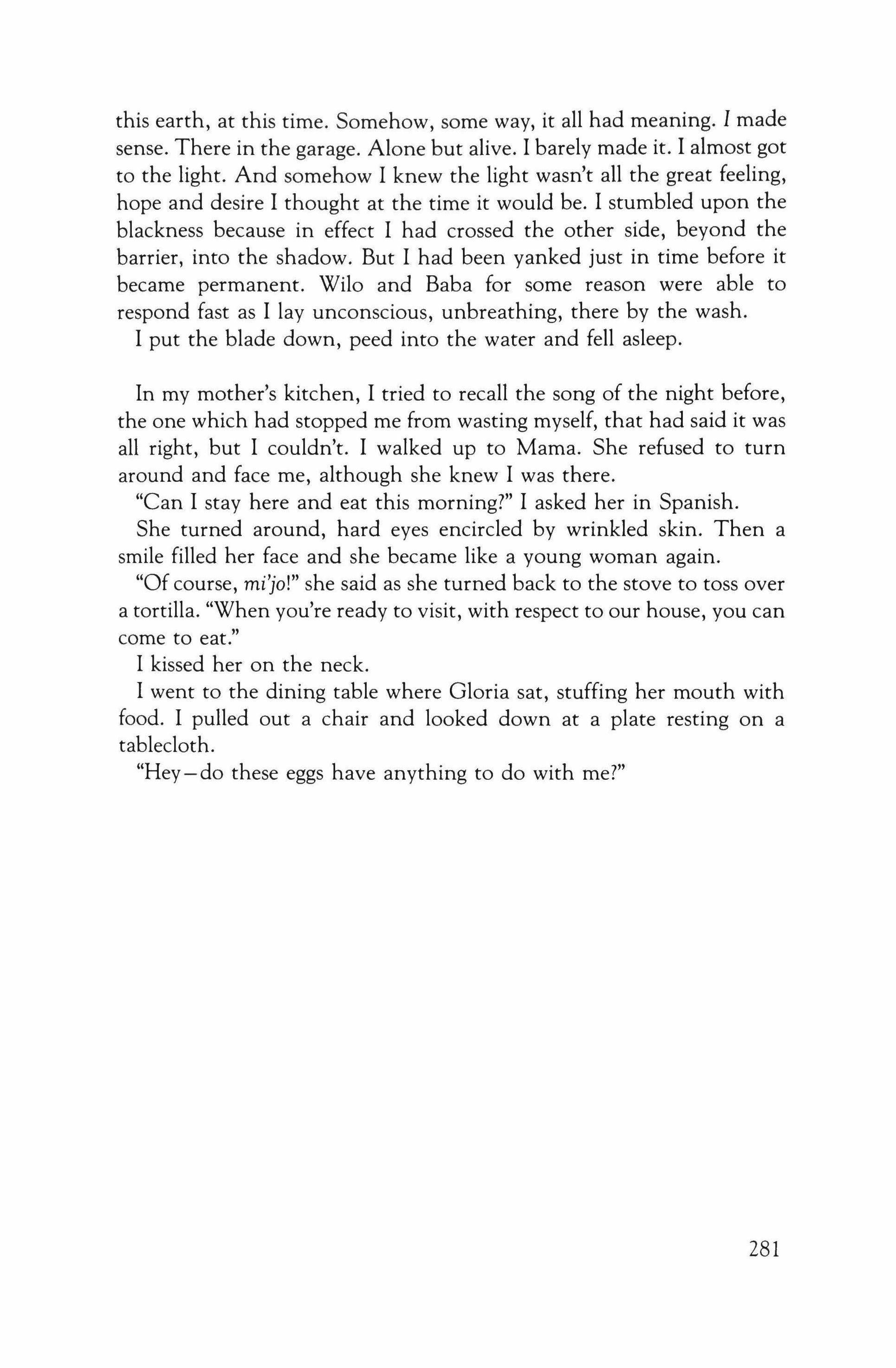
this earth, at this time. Somehow, some way, it all had meaning. I made sense. There in the garage. Alone but alive. I barely made it. I almost got to the light. And somehow I knew the light wasn't all the great feeling, hope and desire I thought at the time it would be. I stumbled upon the blackness because in effect I had crossed the other side, beyond the barrier, into the shadow. But I had been yanked just in time before it became permanent. Wilo and Baba for some reason were able to respond fast as I lay unconscious, unbreathing, there by the wash.
I put the blade down, peed into the water and fell asleep.
In my mother's kitchen, I tried to recall the song of the night before, the one which had stopped me from wasting myself, that had said it was all right, but I couldn't. I walked up to Mama. She refused to turn around and face me, although she knew I was there.
"Can I stay here and eat this morning?" I asked her in Spanish. She turned around, hard eyes encircled by wrinkled skin. Then a smile filled her face and she became like a young woman again.
"Of course, mi'jo!" she said as she turned back to the stove to toss over a tortilla. "When you're ready to visit, with respect to our house, you can come to eat."
I kissed her on the neck.
I went to the dining table where Gloria sat, stuffing her mouth with food. I pulled out a chair and looked down at a plate resting on a tablecloth.
"Hey-do these eggs have anything to do with me?"
281
Perfect Strangers
Laurie Stone
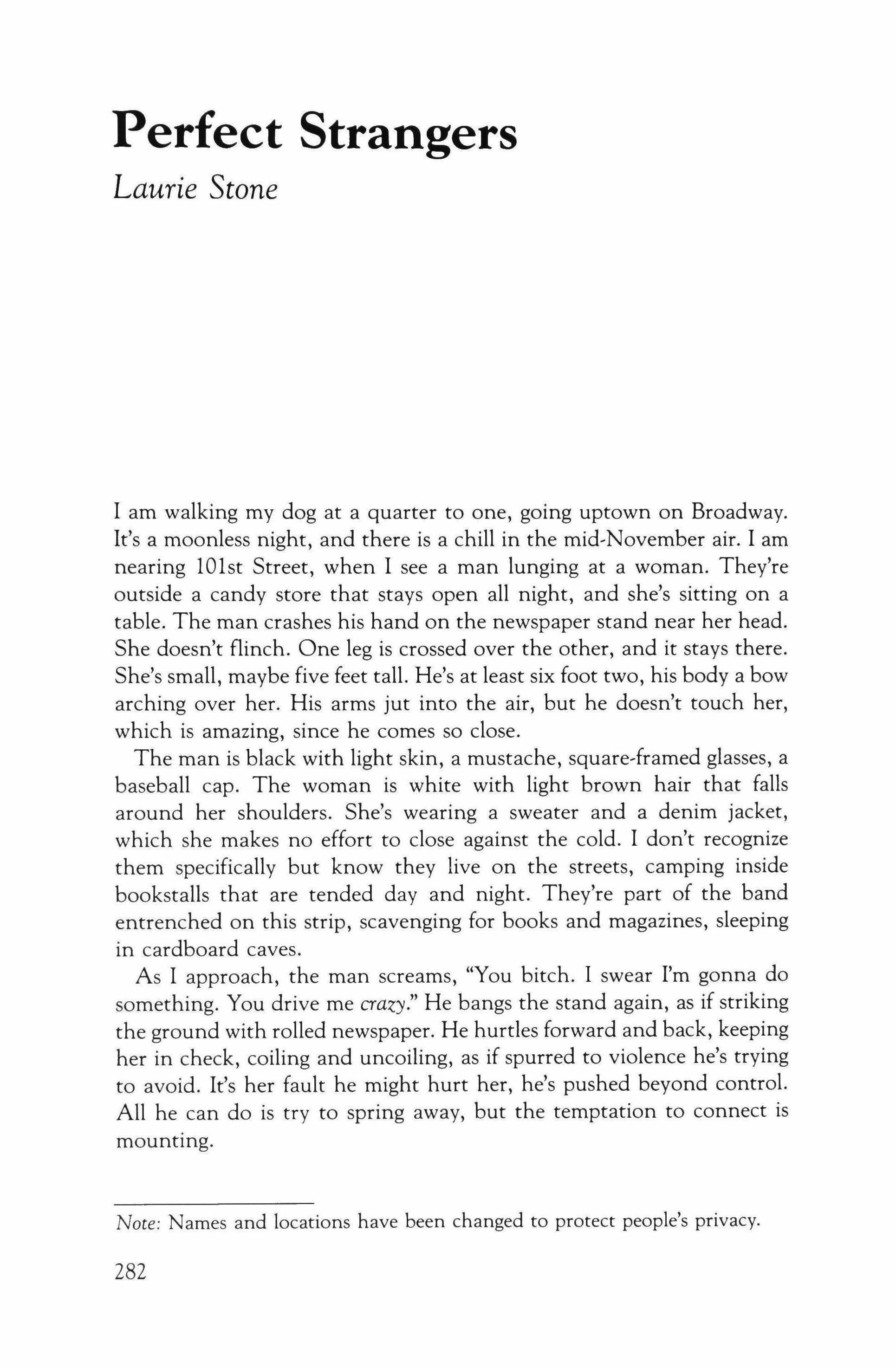
I am walking my dog at a quarter to one, going uptown on Broadway. It's a moonless night, and there is a chill in the mid-November air. I am nearing 10Ist Street, when I see a man lunging at a woman. They're outside a candy store that stays open all night, and she's sitting on a table. The man crashes his hand on the newspaper stand near her head. She doesn't flinch. One leg is crossed over the other, and it stays there. She's small, maybe five feet tall. He's at least six foot two, his body a bow arching over her. His arms jut into the air, but he doesn't touch her, which is amazing, since he comes so close.
The man is black with light skin, a mustache, square-framed glasses, a baseball cap. The woman is white with light brown hair that falls around her shoulders. She's wearing a sweater and a denim jacket, which she makes no effort to close against the cold. I don't recognize them specifically but know they live on the streets, camping inside bookstalls that are tended day and night. They're part of the band entrenched on this strip, scavenging for books and magazines, sleeping in cardboard caves.
As I approach, the man screams, "You bitch. I swear I'm gonna do something. You drive me crazy." He bangs the stand again, as if striking the ground with rolled newspaper. He hurtles forward and back, keeping her in check, coiling and uncoiling, as if spurred to violence he's trying to avoid. It's her fault he might hurt her, he's pushed beyond control. All he can do is try to spring away, but the temptation to connect is mounting.
Note: Names and locations have been changed to protect people's privacy.
282
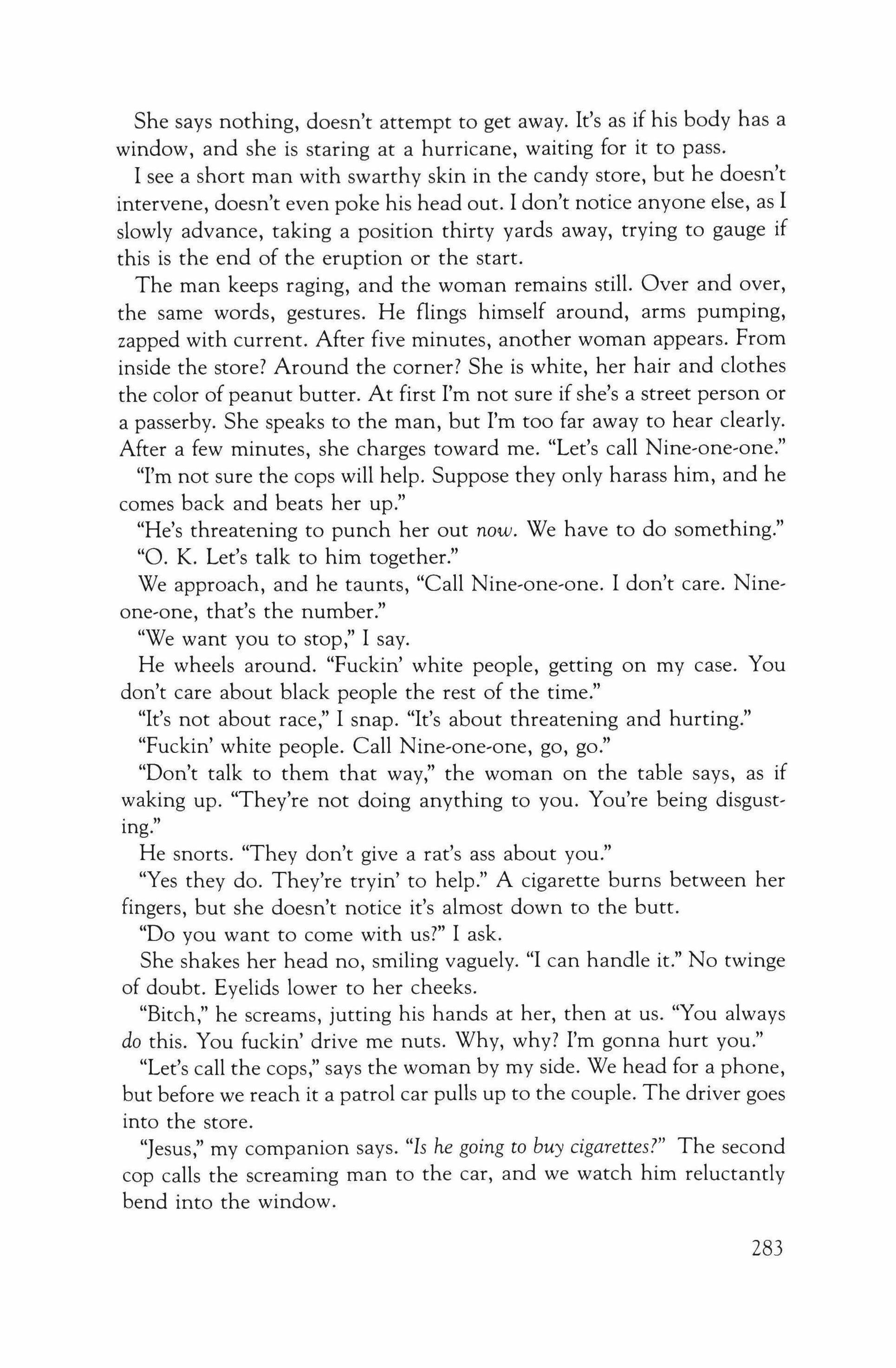
She says nothing, doesn't attempt to get away. It's as if his body has a window, and she is staring at a hurricane, waiting for it to pass.
I see a short man with swarthy skin in the candy store, but he doesn't intervene, doesn't even poke his head out. I don't notice anyone else, as I slowly advance, taking a position thirty yards away, trying to gauge if this is the end of the eruption or the start.
The man keeps raging, and the woman remains still. Over and over, the same words, gestures. He flings himself around, arms pumping, zapped with current. After five minutes, another woman appears. From inside the store? Around the corner? She is white, her hair and clothes the color of peanut butter. At first I'm not sure if she's a street person or a passerby. She speaks to the man, but I'm too far away to hear clearly. After a few minutes, she charges toward me. "Let's call Nine-one-one."
"I'm not sure the cops will help. Suppose they only harass him, and he comes back and beats her up."
"He's threatening to punch her out now. We have to do something."
"0. K. Let's talk to him together."
We approach, and he taunts, "Call Nine-one-one. I don't care. Nineone-one, that's the number."
"We want you to stop," I say.
He wheels around. "Fuckin' white people, getting on my case. You don't care about black people the rest of the time."
"It's not about race," I snap. "It's about threatening and hurting."
"Fuckin' white people. Call Nine-one-one, go, go."
"Don't talk to them that way," the woman on the table says, as if waking up. "They're not doing anything to you. You're being disgusting."
He snorts. "They don't give a rat's ass about you."
"Yes they do. They're tryin' to help." A cigarette burns between her fingers, but she doesn't notice it's almost down to the butt.
"Do you want to come with us?" I ask.
She shakes her head no, smiling vaguely. "I can handle it." No twinge of doubt. Eyelids lower to her cheeks.
"Bitch," he screams, jutting his hands at her, then at us. "You always do this. You fuckin' drive me nuts. Why, why? I'm gonna hurt you."
"Let's call the cops," says the woman by my side. We head for a phone, but before we reach it a patrol car pulls up to the couple. The driver goes into the store.
"Jesus," my companion says. "Is he going to buy cigarettes?" The second cop calls the screaming man to the car, and we watch him reluctantly bend into the window.
283
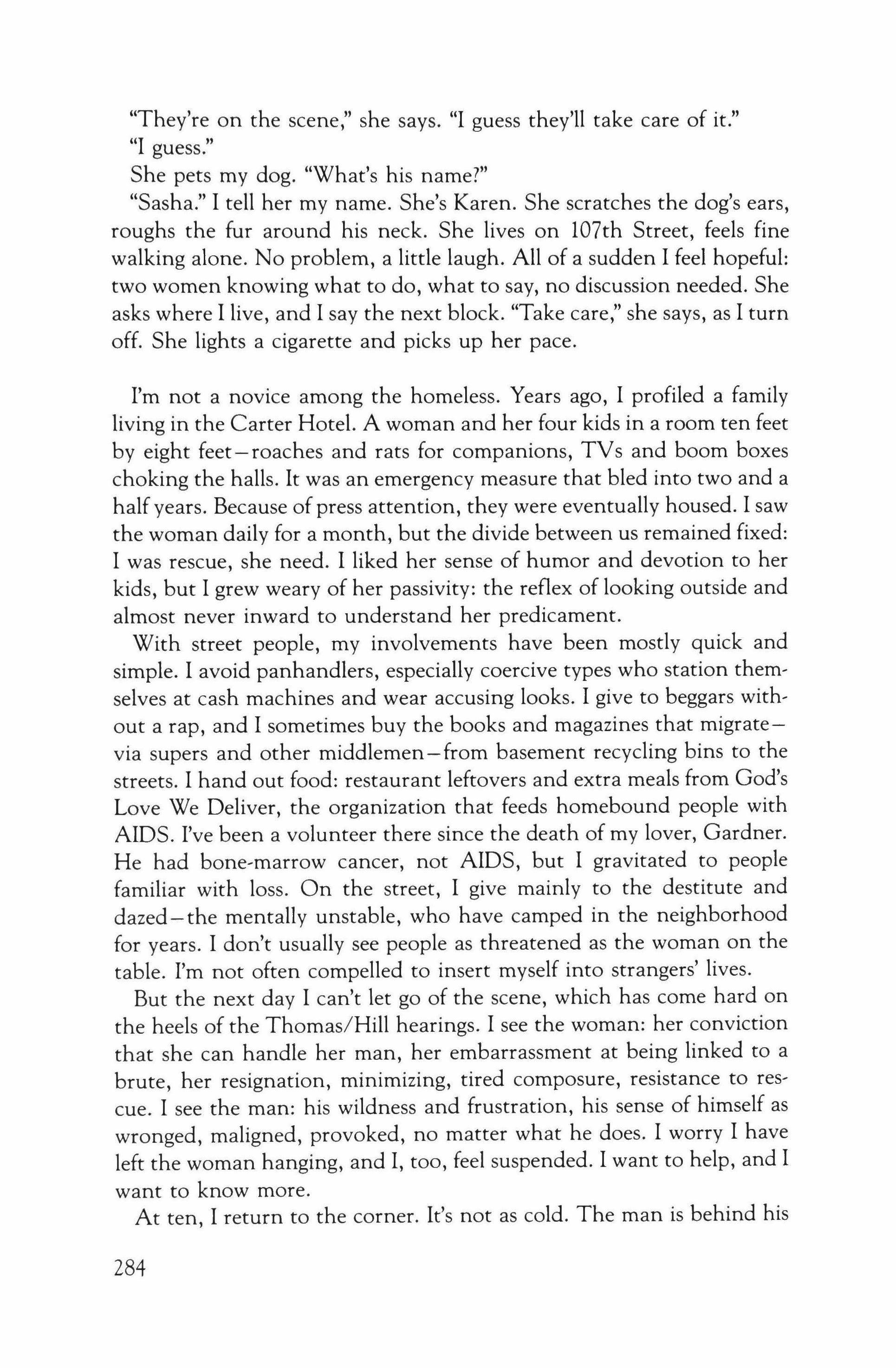
"They're on the scene," she says. "I guess they'll take care of it." "I guess."
She pets my dog. "What's his name?" "Sasha." I tell her my name. She's Karen. She scratches the dog's ears, roughs the fur around his neck. She lives on 107th Street, feels fine walking alone. No problem, a little laugh. All of a sudden I feel hopeful: two women knowing what to do, what to say, no discussion needed. She asks where I live, and I say the next block. "Take care," she says, as I turn off. She lights a cigarette and picks up her pace.
I'm not a novice among the homeless. Years ago, I profiled a family living in the Carter Hotel. A woman and her four kids in a room ten feet by eight feet - roaches and rats for companions, TVs and boom boxes choking the halls. It was an emergency measure that bled into two and a half years. Because of press attention, they were eventually housed. I saw the woman daily for a month, but the divide between us remained fixed: I was rescue, she need. I liked her sense of humor and devotion to her kids, but I grew weary of her passivity: the reflex of looking outside and almost never inward to understand her predicament.
With street people, my involvements have been mostly quick and simple. I avoid panhandlers, especially coercive types who station themselves at cash machines and wear accusing looks. I give to beggars without a rap, and I sometimes buy the books and magazines that migratevia supers and other middlemen - from basement recycling bins to the streets. I hand out food: restaurant leftovers and extra meals from God's Love We Deliver, the organization that feeds homebound people with AIDS. I've been a volunteer there since the death of my lover, Gardner. He had bone-marrow cancer, not AIDS, but I gravitated to people familiar with loss. On the street, I give mainly to the destitute and dazed-the mentally unstable, who have camped in the neighborhood for years. I don't usually see people as threatened as the woman on the table. I'm not often compelled to insert myself into strangers' lives.
But the next day I can't let go of the scene, which has come hard on the heels of the Thomas/Hill hearings. I see the woman: her conviction that she can handle her man, her embarrassment at being linked to a brute, her resignation, minimizing, tired composure, resistance to rescue. I see the man: his wildness and frustration, his sense of himself as wronged, maligned, provoked, no matter what he does. I worry I have left the woman hanging, and I, too, feel suspended. I want to help, and I want to know more.
At ten, I return to the corner. It's not as cold. The man is behind his
284
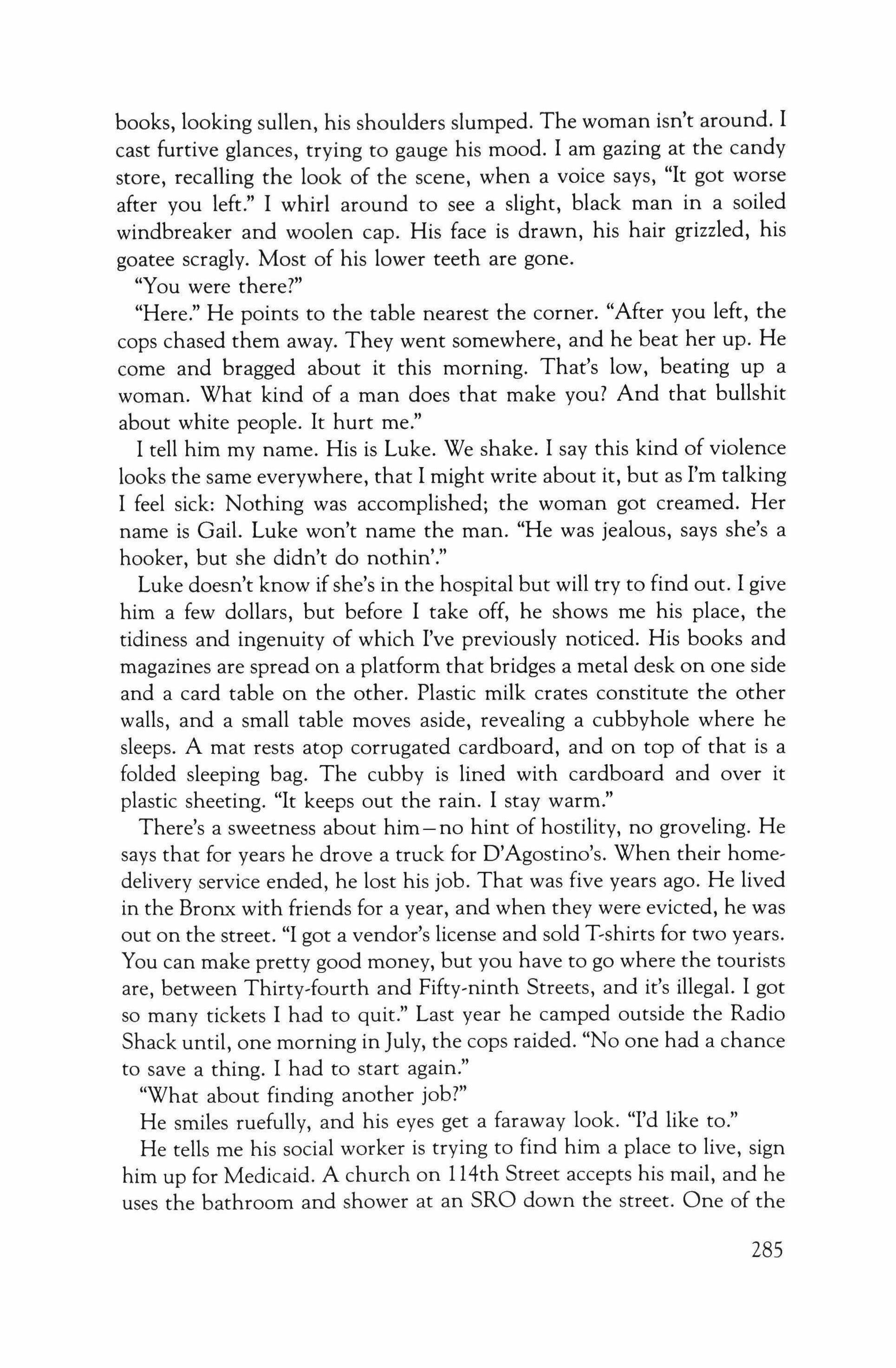
books, looking sullen, his shoulders slumped. The woman isn't around. I cast furtive glances, trying to gauge his mood. I am gazing at the candy store, recalling the look of the scene, when a voice says, "It got worse after you left." I whirl around to see a slight, black man in a soiled windbreaker and woolen cap. His face is drawn, his hair grizzled, his goatee scragly. Most of his lower teeth are gone.
"You were there?"
"Here." He points to the table nearest the corner. "After you left, the cops chased them away. They went somewhere, and he beat her up. He come and bragged about it this morning. That's low, beating up a woman. What kind of a man does that make you? And that bullshit about white people. It hurt me."
I tell him my name. His is Luke. We shake. I say this kind of violence looks the same everywhere, that I might write about it, but as I'm talking I feel sick: Nothing was accomplished; the woman got creamed. Her name is Gail. Luke won't name the man. "He was jealous, says she's a hooker, but she didn't do nothin',"
Luke doesn't know if she's in the hospital but will try to find out. I give him a few dollars, but before I take off, he shows me his place, the tidiness and ingenuity of which I've previously noticed. His books and magazines are spread on a platform that bridges a metal desk on one side and a card table on the other. Plastic milk crates constitute the other walls, and a small table moves aside, revealing a cubbyhole where he sleeps. A mat rests atop corrugated cardboard, and on top of that is a folded sleeping bag. The cubby is lined with cardboard and over it plastic sheeting. "It keeps out the rain. I stay warm."
There's a sweetness about him - no hint of hostility, no groveling. He says that for years he drove a truck for D'Agostino's. When their homedelivery service ended, he lost his job. That was five years ago. He lived in the Bronx with friends for a year, and when they were evicted, he was out on the street. "I got a vendor's license and sold T-shirts for two years. You can make pretty good money, but you have to go where the tourists are, between Thirty-fourth and Fifty-ninth Streets, and it's illegal. I got so many tickets I had to quit." Last year he camped outside the Radio Shack until, one morning in July, the cops raided. "No one had a chance to save a thing. I had to start again."
"What about finding another job?"
He smiles ruefully, and his eyes get a faraway look. "I'd like to."
He tells me his social worker is trying to find him a place to live, sign him up for Medicaid. A church on 114th Street accepts his mail, and he uses the bathroom and shower at an SRO down the street. One of the
285
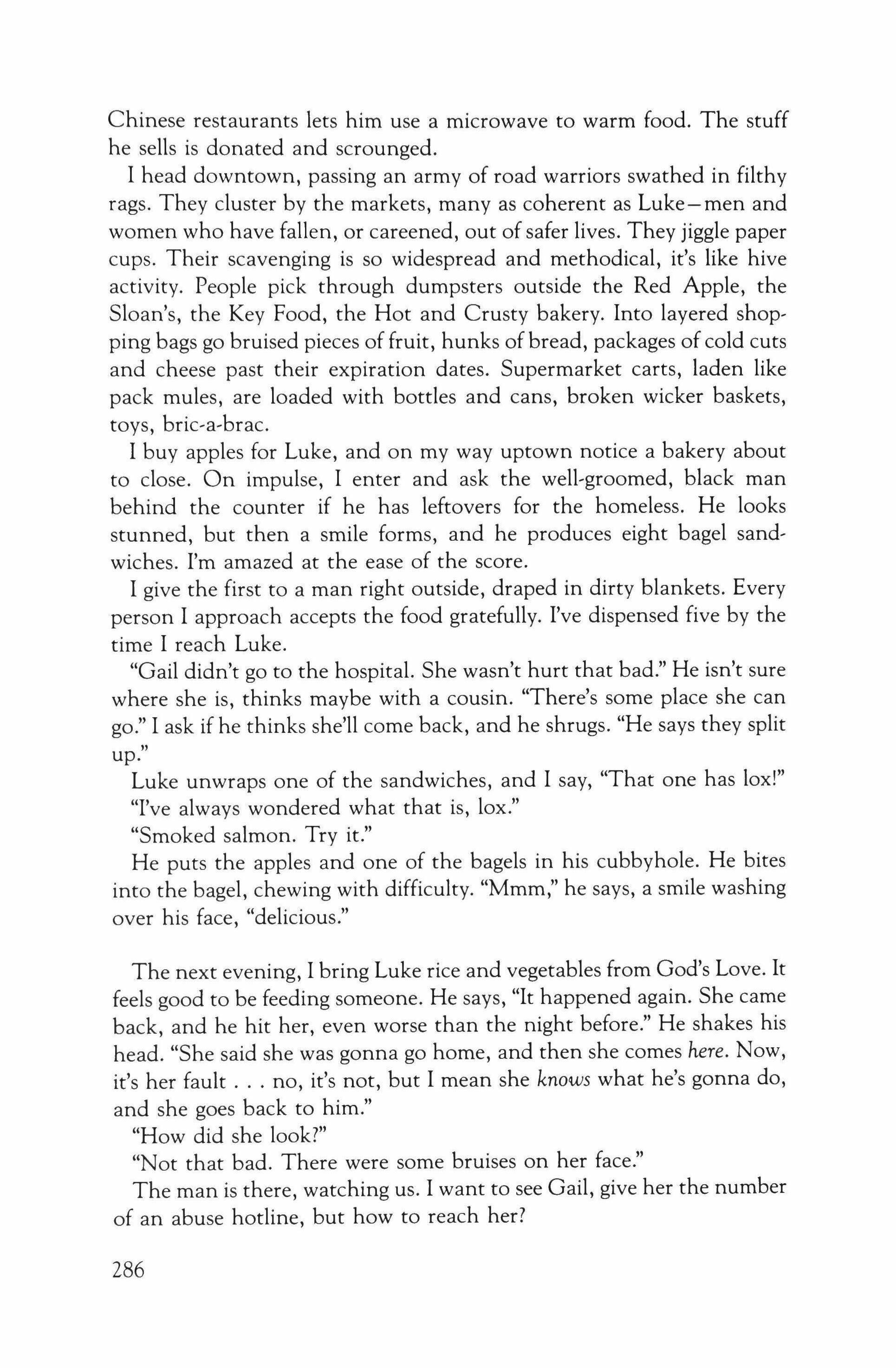
Chinese restaurants lets him use a microwave to warm food. The stuff he sells is donated and scrounged.
I head downtown, passing an army of road warriors swathed in filthy rags. They cluster by the markets, many as coherent as Luke-men and women who have fallen, or careened, out of safer lives. They jiggle paper cups. Their scavenging is so widespread and methodical, it's like hive activity. People pick through dumpsters outside the Red Apple, the Sloan's, the Key Food, the Hot and Crusty bakery. Into layered shopping bags go bruised pieces of fruit, hunks of bread, packages of cold cuts and cheese past their expiration dates. Supermarket carts, laden like pack mules, are loaded with bottles and cans, broken wicker baskets, toys, bric-a-brac.
I buy apples for Luke, and on my way uptown notice a bakery about to close. On impulse, I enter and ask the well-groomed, black man behind the counter if he has leftovers for the homeless. He looks stunned, but then a smile forms, and he produces eight bagel sandwiches. I'm amazed at the ease of the score.
I give the first to a man right outside, draped in dirty blankets. Every person I approach accepts the food gratefully. I've dispensed five by the time I reach Luke.
"Gail didn't go to the hospital. She wasn't hurt that bad." He isn't sure where she is, thinks maybe with a cousin. "There's some place she can go." I ask if he thinks she'll come back, and he shrugs. "He says they split up."
Luke unwraps one of the sandwiches, and I say, "That one has lox!"
"I've always wondered what that is, lox."
"Smoked salmon. Try it."
He puts the apples and one of the bagels in his cubbyhole. He bites into the bagel, chewing with difficulty. "Mmm," he says, a smile washing over his face, "delicious."
The next evening, I bring Luke rice and vegetables from God's Love. It feels good to be feeding someone. He says, "It happened again. She came back, and he hit her, even worse than the night before." He shakes his head. "She said she was gonna go home, and then she comes here. Now, it's her fault no, it's not, but I mean she knows what he's gonna do, and she goes back to him."
"How did she look?"
"Not that bad. There were some bruises on her face."
The man is there, watching us. I want to see Gail, give her the number of an abuse hotline, but how to reach her?
286
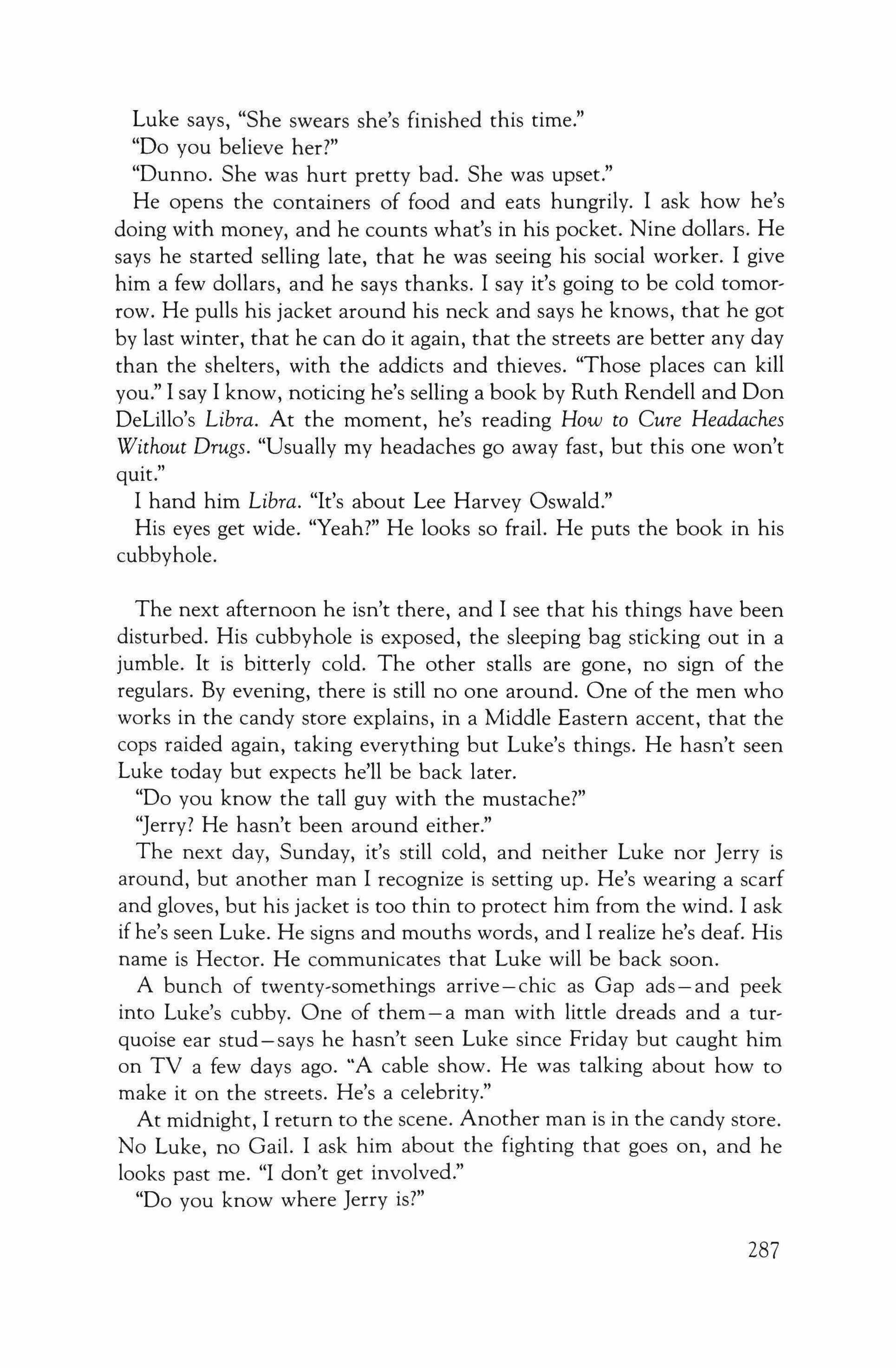
luke says, "She swears she's finished this time."
"Do you believe her?"
"Dunno. She was hurt pretty bad. She was upset."
He opens the containers of food and eats hungrily. I ask how he's doing with money, and he counts what's in his pocket. Nine dollars. He says he started selling late, that he was seeing his social worker. I give him a few dollars, and he says thanks. I say it's going to be cold tomorrow. He pulls his jacket around his neck and says he knows, that he got by last winter, that he can do it again, that the streets are better any day than the shelters, with the addicts and thieves. "Those places can kill you." I say I know, noticing he's selling a book by Ruth Rendell and Don Delillo's Libra. At the moment, he's reading How to Cure Headaches Without Drugs. "Usually my headaches go away fast, but this one won't quit."
I hand him Libra. "It's about lee Harvey Oswald."
His eyes get wide. "Yeah?" He looks so frail. He puts the book in his cubbyhole.
The next afternoon he isn't there, and I see that his things have been disturbed. His cubbyhole is exposed, the sleeping bag sticking out in a jumble. It is bitterly cold. The other stalls are gone, no sign of the regulars. By evening, there is still no one around. One of the men who works in the candy store explains, in a Middle Eastern accent, that the cops raided again, taking everything but luke's things. He hasn't seen Luke today but expects he'll be back later.
"Do you know the tall guy with the mustache?"
"Jerry? He hasn't been around either."
The next day, Sunday, it's still cold, and neither Luke nor Jerry is around, but another man I recognize is setting up. He's wearing a scarf and gloves, but his jacket is too thin to protect him from the wind. I ask if he's seen Luke. He signs and mouths words, and 1 realize he's deaf. His name is Hector. He communicates that Luke will be back soon.
A bunch of twenty-sornethings arrive-chic as Gap ads-and peek into Luke's cubby. One of them-a man with little dreads and a turquoise ear stud-says he hasn't seen Luke since Friday but caught him on TV a few days ago. "A cable show. He was talking about how to make it on the streets. He's a celebrity."
At midnight, 1 return to the scene. Another man is in the candy store. No Luke, no Gail. 1 ask him about the fighting that goes on, and he looks past me. "1 don't get involved."
"Do you know where Jerry is?"
287
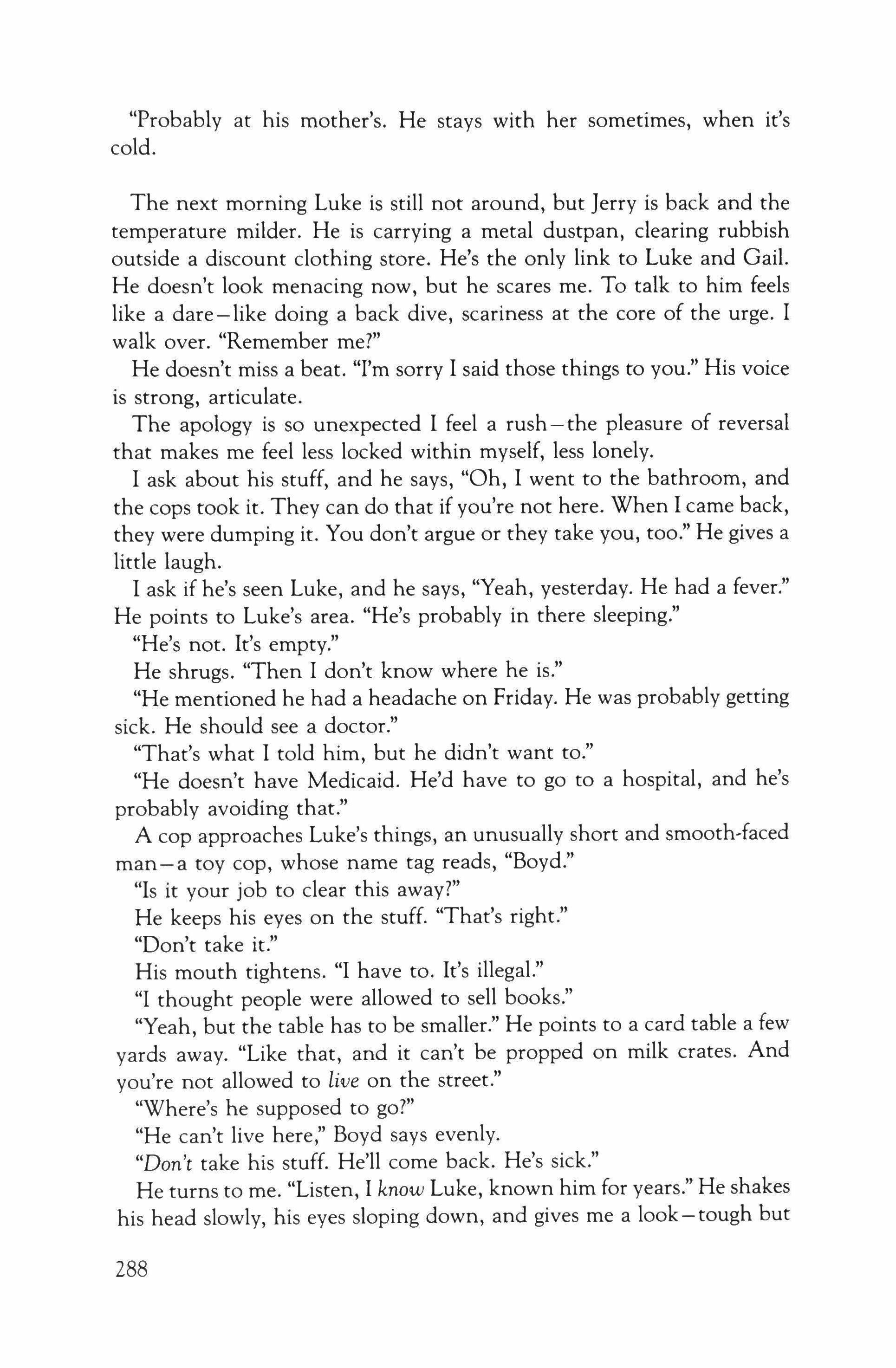
"Probably at his mother's. He stays with her sometimes, when it's cold.
The next morning Luke is still not around, but Jerry is back and the temperature milder. He is carrying a metal dustpan, clearing rubbish outside a discount clothing store. He's the only link to Luke and Gail. He doesn't look menacing now, but he scares me. To talk to him feels like a dare-like doing a back dive, scariness at the core of the urge. I walk over. "Remember me?"
He doesn't miss a beat. "I'm sorry I said those things to you." His voice is strong, articulate.
The apology is so unexpected I feel a rush - the pleasure of reversal that makes me feel less locked within myself, less lonely.
I ask about his stuff, and he says, "Oh, I went to the bathroom, and the cops took it. They can do that if you're not here. When I came back, they were dumping it. You don't argue or they take you, too." He gives a little laugh.
I ask if he's seen Luke, and he says, "Yeah, yesterday. He had a fever." He points to Luke's area. "He's probably in there sleeping."
"He's not. It's empty."
He shrugs. "Then I don't know where he is."
"He mentioned he had a headache on Friday. He was probably getting sick. He should see a doctor."
"That's what I told him, but he didn't want to."
"He doesn't have Medicaid. He'd have to go to a hospital, and he's probably avoiding that."
A cop approaches Luke's things, an unusually short and smooth-faced man - a toy cop, whose name tag reads, "Boyd."
"Is it your job to clear this away?"
He keeps his eyes on the stuff. "That's right."
"Don't take it."
His mouth tightens. "I have to. It's illegal."
"I thought people were allowed to sell books."
"Yeah, but the table has to be smaller." He points to a card table a few yards away. "Like that, and it can't be propped on milk crates. And you're not allowed to live on the street."
"Where's he supposed to go?"
"He can't live here," Boyd says evenly.
"Don't take his stuff. He'll come back. He's sick."
He turns to me. "Listen, I know Luke, known him for years." He shakes his head slowly, his eyes sloping down, and gives me a look-tough but
288
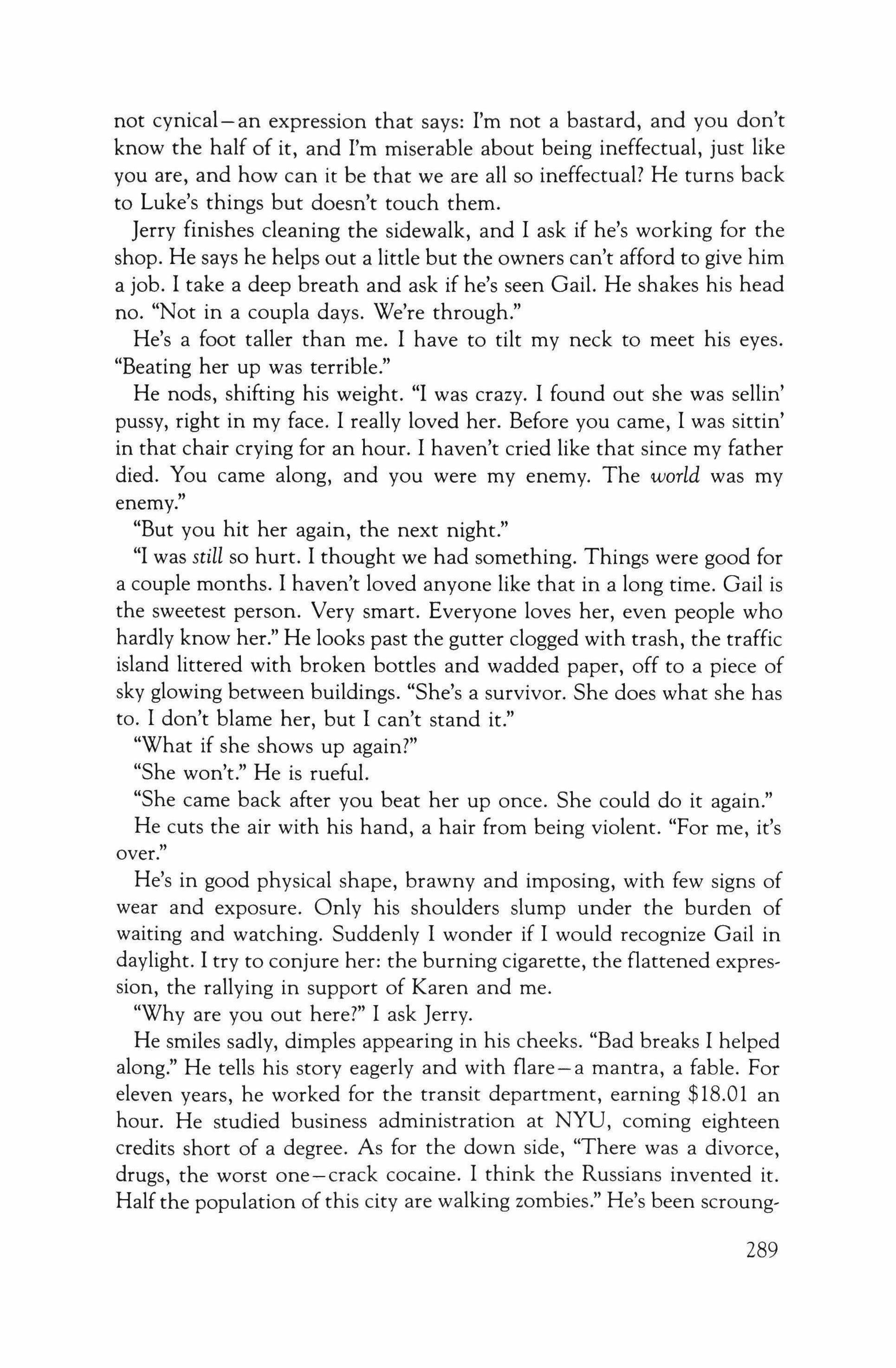
not cynical- an expression that says: I'm not a bastard, and you don't know the half of it, and I'm miserable about being ineffectual, just like you are, and how can it be that we are all so ineffectual? He turns back to Luke's things but doesn't touch them.
Jerry finishes cleaning the sidewalk, and I ask if he's working for the shop. He says he helps out a little but the owners can't afford to give him a job. I take a deep breath and ask if he's seen Gail. He shakes his head no. "Not in a coupla days. We're through."
He's a foot taller than me. I have to tilt my neck to meet his eyes. "Beating her up was terrible."
He nods, shifting his weight. "I was crazy. I found out she was sellin' pussy, right in my face. I really loved her. Before you came, I was sittin' in that chair crying for an hour. I haven't cried like that since my father died. You came along, and you were my enemy. The world was my enemy."
"But you hit her again, the next night."
"I was still so hurt. I thought we had something. Things were good for a couple months. I haven't loved anyone like that in a long time. Gail is the sweetest person. Very smart. Everyone loves her, even people who hardly know her." He looks past the gutter clogged with trash, the traffic island littered with broken bottles and wadded paper, off to a piece of sky glowing between buildings. "She's a survivor. She does what she has to. I don't blame her, but I can't stand it."
"What if she shows up again?"
"She won't." He is rueful.
"She came back after you beat her up once. She could do it again."
He cuts the air with his hand, a hair from being violent. "For me, it's over."
He's in good physical shape, brawny and imposing, with few signs of wear and exposure. Only his shoulders slump under the burden of waiting and watching. Suddenly I wonder if I would recognize Gail in daylight. I try to conjure her: the burning cigarette, the flattened expression, the rallying in support of Karen and me.
"Why are you out here?" I ask Jerry.
He smiles sadly, dimples appearing in his cheeks. "Bad breaks I helped along." He tells his story eagerly and with flare - a mantra, a fable. For eleven years, he worked for the transit department, earning $18.01 an hour. He studied business administration at NYU, coming eighteen credits short of a degree. As for the down side, "There was a divorce, drugs, the worst one-crack cocaine. I think the Russians invented it. Half the population of this city are walking zombies." He's been scroung-
289
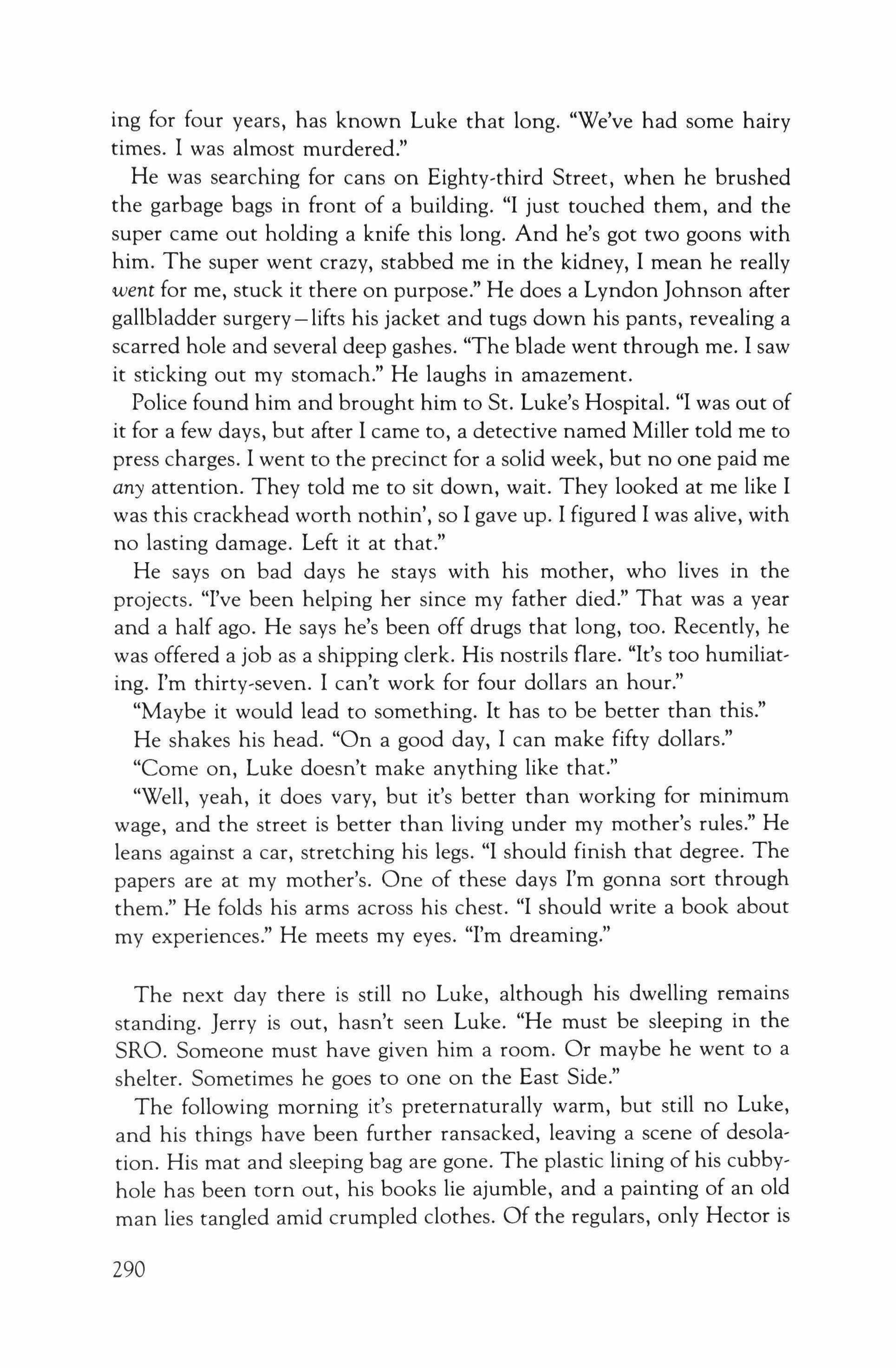
ing for four years, has known Luke that long. "We've had some hairy times. I was almost murdered."
He was searching for cans on Eighty-third Street, when he brushed the garbage bags in front of a building. "I just touched them, and the super came out holding a knife this long. And he's got two goons with him. The super went crazy, stabbed me in the kidney, I mean he really went for me, stuck it there on purpose." He does a Lyndon Johnson after gallbladder surgery-lifts his jacket and tugs down his pants, revealing a scarred hole and several deep gashes. "The blade went through me. I saw it sticking out my stomach." He laughs in amazement.
Police found him and brought him to St. Luke's Hospital. "I was out of it for a few days, but after I came to, a detective named Miller told me to press charges. I went to the precinct for a solid week, but no one paid me any attention. They told me to sit down, wait. They looked at me like I was this crackhead worth nothin', so I gave up. I figured I was alive, with no lasting damage. Left it at that."
He says on bad days he stays with his mother, who lives in the projects. "I've been helping her since my father died." That was a year and a half ago. He says he's been off drugs that long, too. Recently, he was offered a job as a shipping clerk. His nostrils flare. "It's too humiliating. I'm thirty-seven. I can't work for four dollars an hour."
"Maybe it would lead to something. It has to be better than this."
He shakes his head. "On a good day, I can make fifty dollars."
"Come on, Luke doesn't make anything like that."
"Well, yeah, it does vary, but it's better than working for minimum wage, and the street is better than living under my mother's rules." He leans against a car, stretching his legs. "I should finish that degree. The papers are at my mother's. One of these days I'm gonna sort through them." He folds his arms across his chest. "I should write a book about my experiences." He meets my eyes. "I'm dreaming."
The next day there is still no Luke, although his dwelling remains standing. Jerry is out, hasn't seen Luke. "He must be sleeping in the SRO. Someone must have given him a room. Or maybe he went to a shelter. Sometimes he goes to one on the East Side."
The following morning it's preternaturally warm, but still no Luke, and his things have been further ransacked, leaving a scene of desolation. His mat and sleeping bag are gone. The plastic lining of his cubbyhole has been torn out, his books lie ajumble, and a painting of an old man lies tangled amid crumpled clothes. Of the regulars, only Hector is 290
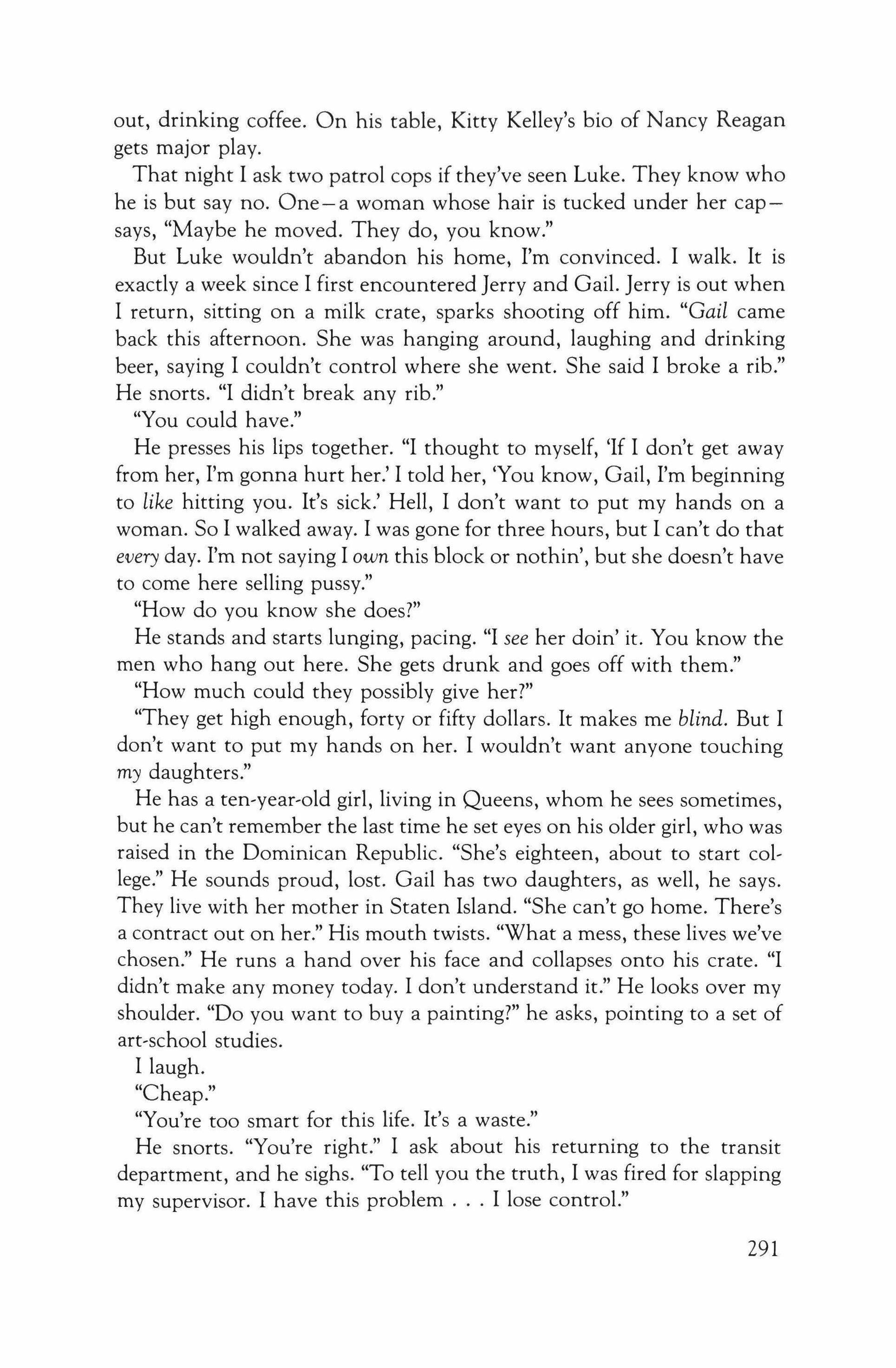
out, drinking coffee. On his table, Kitty Kelley's bio of Nancy Reagan gets major play.
That night 1 ask two patrol cops if they've seen Luke. They know who he is but say no. One-a woman whose hair is tucked under her capsays, "Maybe he moved. They do, you know."
But Luke wouldn't abandon his home, I'm convinced. 1 walk. It is exactly a week since 1 first encountered Jerry and Gail. Jerry is out when 1 return, sitting on a milk crate, sparks shooting off him. "Gail came back this afternoon. She was hanging around, laughing and drinking beer, saying 1 couldn't control where she went. She said 1 broke a rib." He snorts. "1 didn't break any rib."
"You could have."
He presses his lips together. "1 thought to myself, 'If 1 don't get away from her, I'm gonna hurt her.' 1 told her, 'You know, Gail, I'm beginning to like hitting you. It's sick.' Hell, 1 don't want to put my hands on a woman. So 1 walked away. 1 was gone for three hours, but 1 can't do that every day. I'm not saying 1 own this block or nothin', but she doesn't have to come here selling pussy."
"How do you know she does?"
He stands and starts lunging, pacing. "1 see her doin' it. You know the men who hang out here. She gets drunk and goes off with them."
"How much could they possibly give her?"
"They get high enough, forty or fifty dollars. It makes me blind. But 1 don't want to put my hands on her. 1 wouldn't want anyone touching my daughters."
He has a ten-year-old girl, living in Queens, whom he sees sometimes, but he can't remember the last time he set eyes on his older girl, who was raised in the Dominican Republic. "She's eighteen, about to start college." He sounds proud, lost. Gail has two daughters, as well, he says. They live with her mother in Staten Island. "She can't go home. There's a contract out on her." His mouth twists. "What a mess, these lives we've chosen." He runs a hand over his face and collapses onto his crate. "I didn't make any money today. I don't understand it." He looks over my shoulder. "Do you want to buy a painting?" he asks, pointing to a set of art-school studies.
1 laugh.
"Cheap."
"You're too smart for this life. It's a waste."
He snorts. "You're right." 1 ask about his returning to the transit department, and he sighs. "To tell you the truth, 1 was fired for slapping my supervisor. I have this problem I lose control."
291
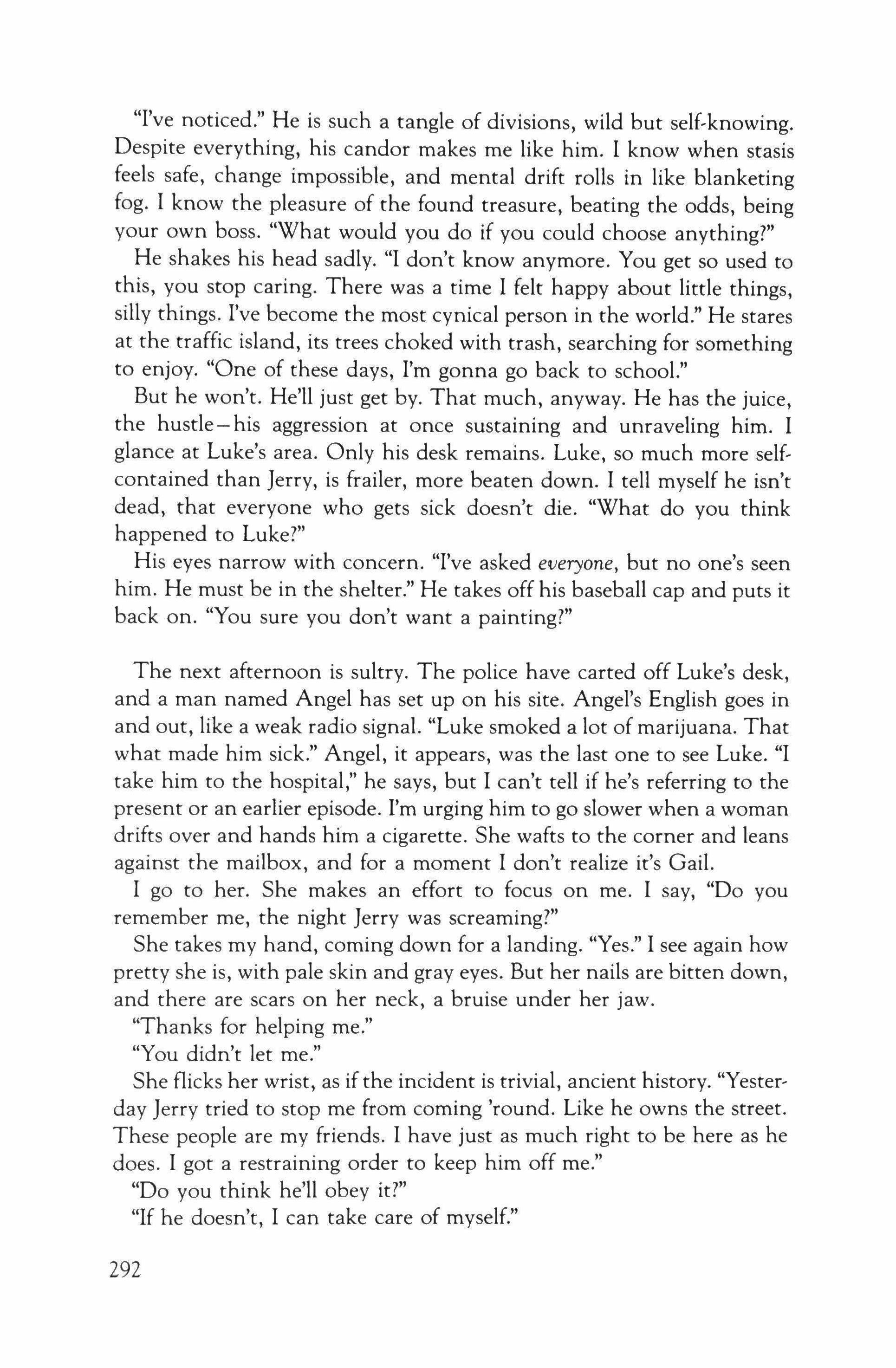
"I've noticed." He is such a tangle of divisions, wild but self-knowing. Despite everything, his candor makes me like him. I know when stasis feels safe, change impossible, and mental drift rolls in like blanketing fog. I know the pleasure of the found treasure, beating the odds, being your own boss. "What would you do if you could choose anything?"
He shakes his head sadly. "I don't know anymore. You get so used to this, you stop caring. There was a time I felt happy about little things, silly things. I've become the most cynical person in the world." He stares at the traffic island, its trees choked with trash, searching for something to enjoy. "One of these days, I'm gonna go back to school."
But he won't. He'll just get by. That much, anyway. He has the juice, the hustle - his aggression at once sustaining and unraveling him. I glance at Luke's area. Only his desk remains. Luke, so much more selfcontained than Jerry, is frailer, more beaten down. I tell myself he isn't dead, that everyone who gets sick doesn't die. "What do you think happened to Luke?"
His eyes narrow with concern. "I've asked everyone, but no one's seen him. He must be in the shelter." He takes off his baseball cap and puts it back on. "You sure you don't want a painting?"
The next afternoon is sultry. The police have carted off Luke's desk, and a man named Angel has set up on his site. Angel's English goes in and out, like a weak radio signal. "Luke smoked a lot of marijuana. That what made him sick." Angel, it appears, was the last one to see Luke. "I take him to the hospital," he says, but I can't tell if he's referring to the present or an earlier episode. I'm urging him to go slower when a woman drifts over and hands him a cigarette. She wafts to the corner and leans against the mailbox, and for a moment I don't realize it's Gail.
I go to her. She makes an effort to focus on me. I say, "Do you remember me, the night Jerry was screaming?"
She takes my hand, coming down for a landing. "Yes." I see again how pretty she is, with pale skin and gray eyes. But her nails are bitten down, and there are scars on her neck, a bruise under her jaw.
"Thanks for helping me."
"You didn't let me."
She flicks her wrist, as if the incident is trivial, ancient history. "Yesterday Jerry tried to stop me from coming 'round. Like he owns the street. These people are my friends. I have just as much right to be here as he does. I got a restraining order to keep him off me."
"Do you think he'll obey it?"
"If he doesn't, I can take care of myself."
292
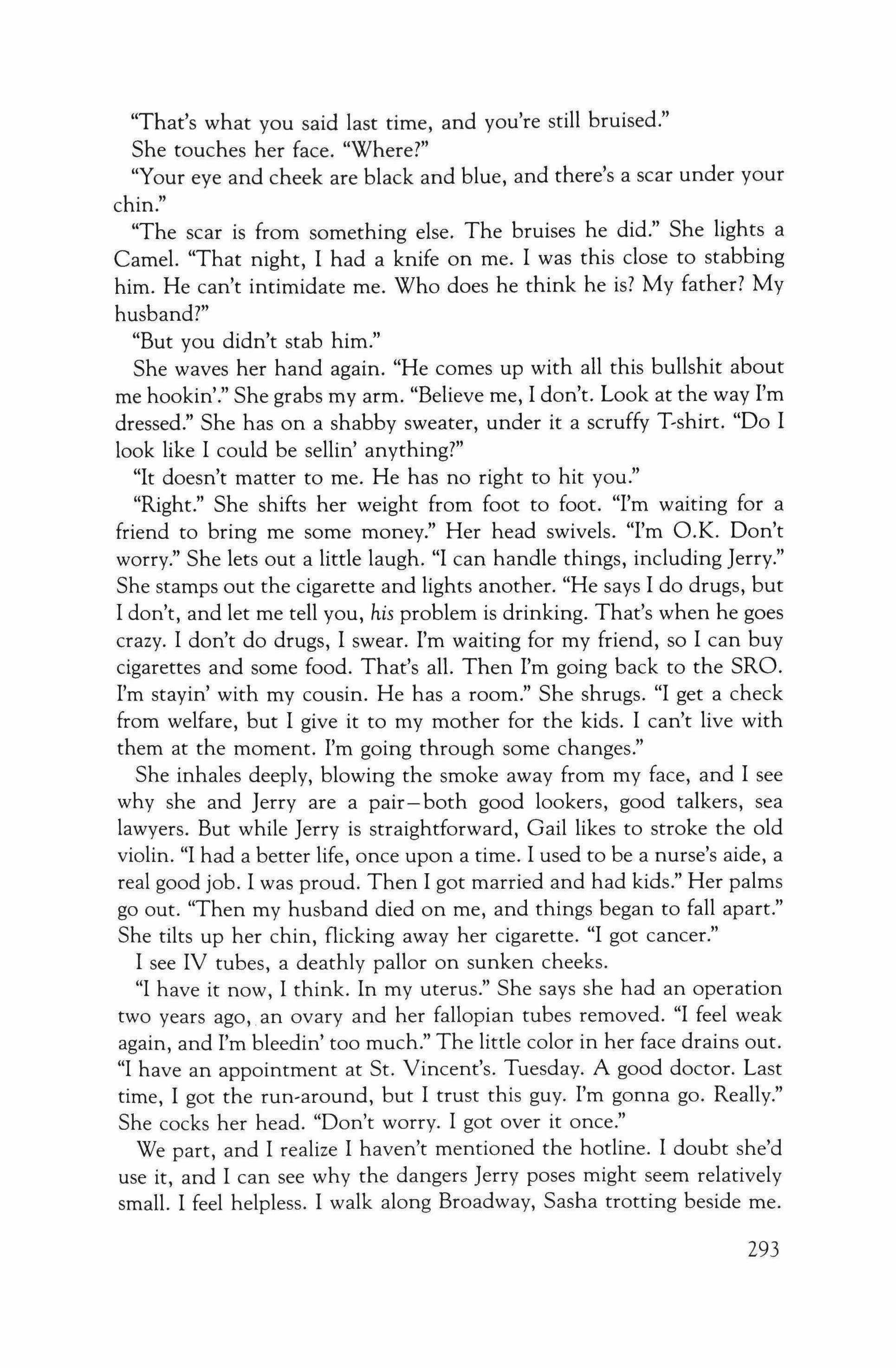
"That's what you said last time, and you're still bruised."
She touches her face. "Where?"
"Your eye and cheek are black and blue, and there's a scar under your chin."
"The scar is from something else. The bruises he did." She lights a Camel. "That night, I had a knife on me. I was this close to stabbing him. He can't intimidate me. Who does he think he is? My father? My husband?"
"But you didn't stab him."
She waves her hand again. "He comes up with all this bullshit about me hookin'." She grabs my arm. "Believe me, I don't. Look at the way I'm dressed." She has on a shabby sweater, under it a scruffy T-shirt. "Do I look like I could be sellin' anything?"
"It doesn't matter to me. He has no right to hit you."
"Right." She shifts her weight from foot to foot. "I'm waiting for a friend to bring me some money." Her head swivels. "I'm O.K. Don't worry." She lets out a little laugh. "I can handle things, including Jerry." She stamps out the cigarette and lights another. "He says I do drugs, but I don't, and let me tell you, his problem is drinking. That's when he goes crazy. I don't do drugs, I swear. I'm waiting for my friend, so I can buy cigarettes and some food. That's all. Then I'm going back to the SRO. I'm stayin' with my cousin. He has a room." She shrugs. "I get a check from welfare, but I give it to my mother for the kids. I can't live with them at the moment. I'm going through some changes."
She inhales deeply, blowing the smoke away from my face, and I see why she and Jerry are a pair-both good lookers, good talkers, sea lawyers. But while Jerry is straightforward, Gail likes to stroke the old violin. "I had a better life, once upon a time. I used to be a nurse's aide, a real good job. I was proud. Then I got married and had kids." Her palms go out. "Then my husband died on me, and things began to fall apart." She tilts up her chin, flicking away her cigarette. "I got cancer."
I see IV tubes, a deathly pallor on sunken cheeks.
"I have it now, I think. In my uterus." She says she had an operation two years ago.. an ovary and her fallopian tubes removed. "I feel weak again, and I'm bleedin' too much." The little color in her face drains out. "I have an appointment at St. Vincent's. Tuesday. A good doctor. Last time, I got the run-around, but I trust this guy. I'm gonna go. Really." She cocks her head. "Don't worry. I got over it once."
We part, and I realize I haven't mentioned the hotline. I doubt she'd use it, and I can see why the dangers Jerry poses might seem relatively small. I feel helpless. I walk along Broadway, Sasha trotting beside me.
293
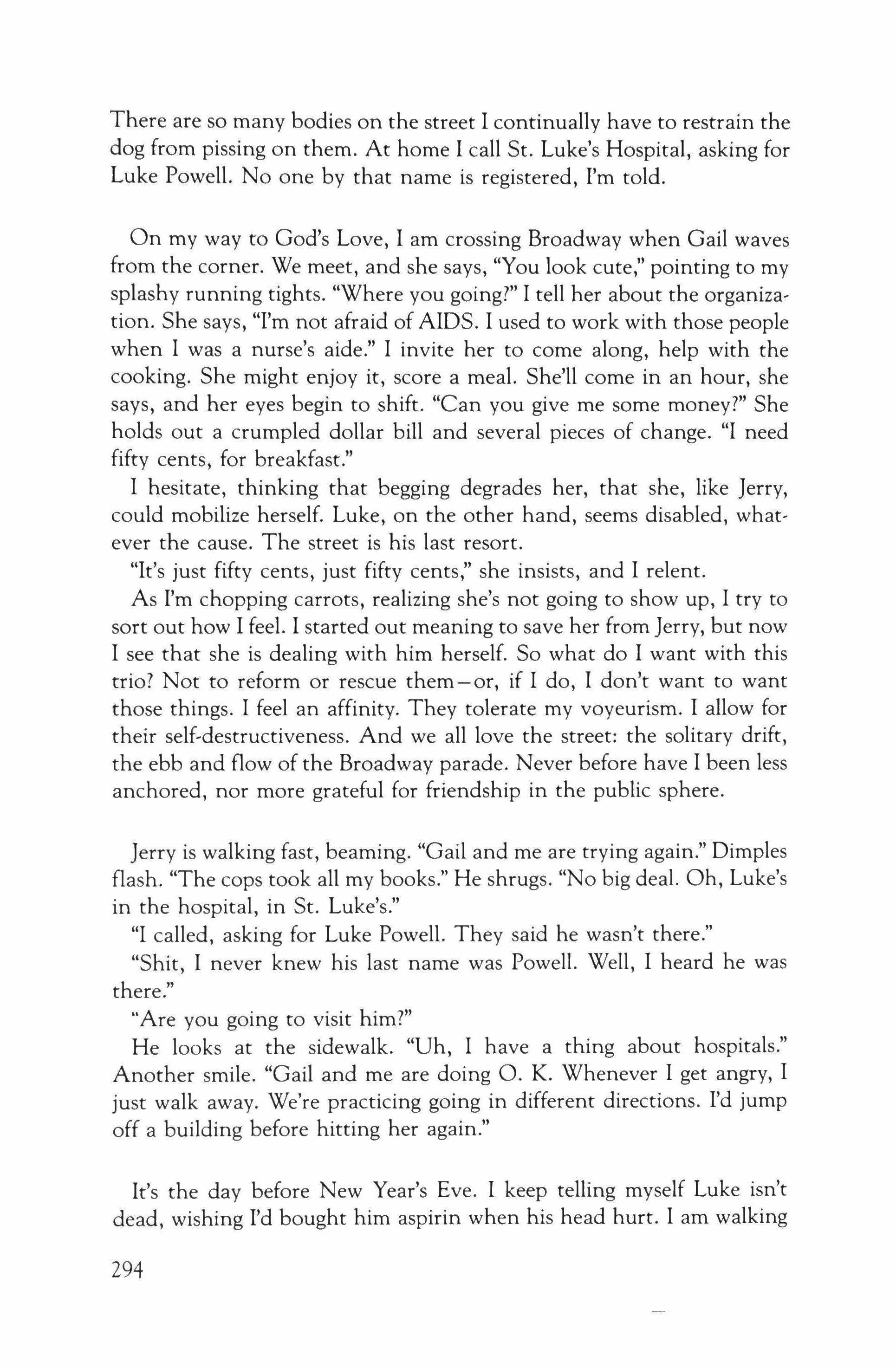
There are so many bodies on the street I continually have to restrain the dog from pissing on them. At home I call St. Luke's Hospital, asking for Luke Powell. No one by that name is registered, I'm told.
On my way to God's Love, I am crossing Broadway when Gail waves from the corner. We meet, and she says, "You look cute," pointing to my splashy running tights. "Where you going?" I tell her about the organization. She says, "I'm not afraid of AIDS. I used to work with those people when I was a nurse's aide." I invite her to come along, help with the cooking. She might enjoy it, score a meal. She'll come in an hour, she says, and her eyes begin to shift. "Can you give me some money?" She holds out a crumpled dollar bill and several pieces of change. "I need fifty cents, for breakfast."
I hesitate, thinking that begging degrades her, that she, like Jerry, could mobilize herself. Luke, on the other hand, seems disabled, whatever the cause. The street is his last resort.
"It's just fifty cents, just fifty cents," she insists, and I relent.
As I'm chopping carrots, realizing she's not going to show up, I try to sort out how I feel. I started out meaning to save her from Jerry, but now I see that she is dealing with him herself. So what do I want with this trio? Not to reform or rescue them-or, if I do, I don't want to want those things. I feel an affinity. They tolerate my voyeurism. I allow for their self-destructiveness. And we all love the street: the solitary drift, the ebb and flow of the Broadway parade. Never before have I been less anchored, nor more grateful for friendship in the public sphere.
Jerry is walking fast, beaming. "Gail and me are trying again." Dimples flash. "The cops took all my books." He shrugs. "No big deal. Oh, Luke's in the hospital, in St. Luke's."
"I called, asking for Luke Powell. They said he wasn't there."
"Shit, I never knew his last name was Powell. Well, I heard he was there."
"Are you going to visit him?"
He looks at the sidewalk. "Uh, I have a thing about hospitals." Another smile. "Gail and me are doing O. K. Whenever I get angry, I just walk away. We're practicing going in different directions. I'd jump off a building before hitting her again."
It's the day before New Year's Eve. I keep telling myself Luke isn't dead, wishing I'd bought him aspirin when his head hurt. I am walking
294
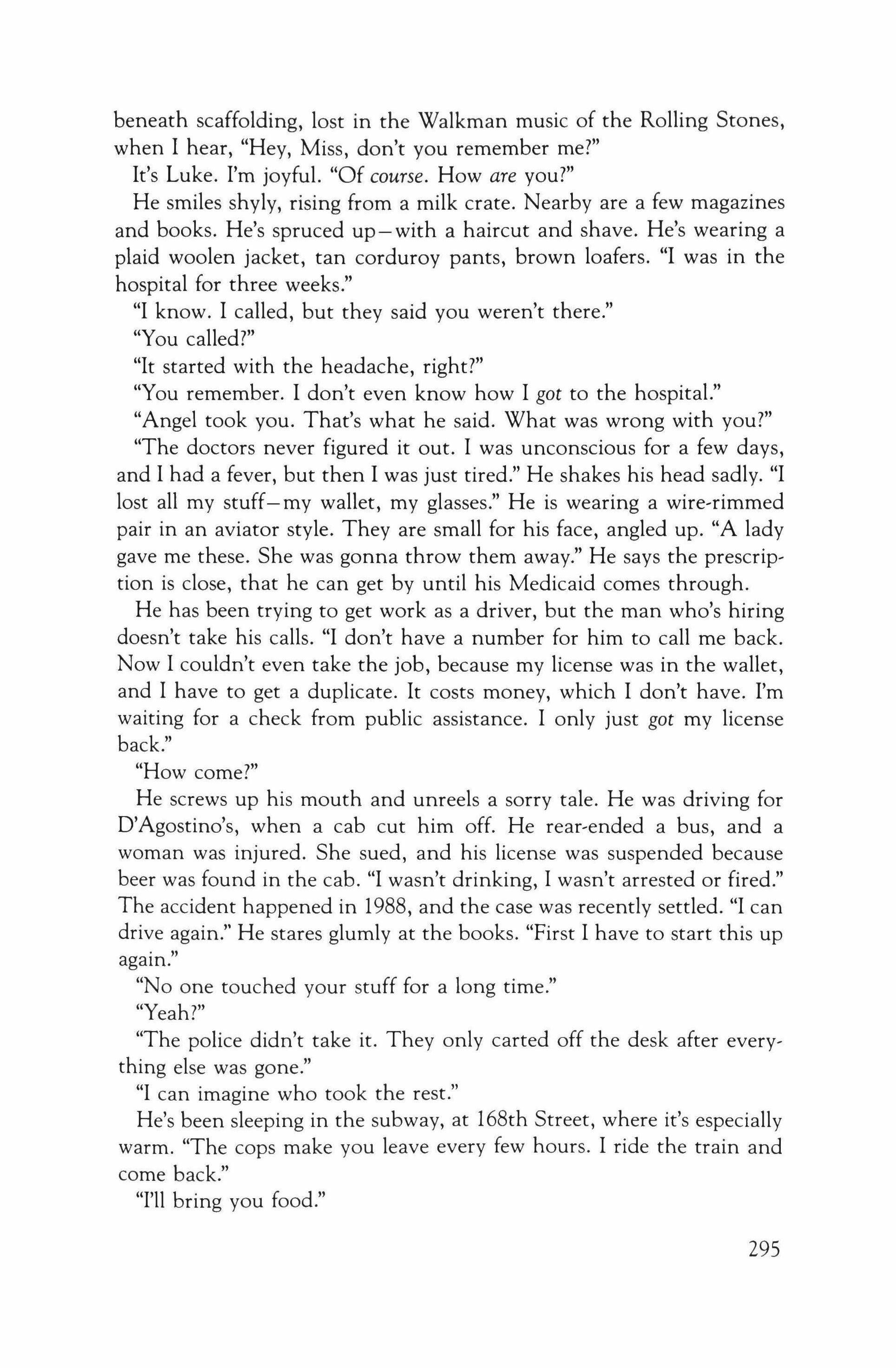
beneath scaffolding, lost in the Walkman music of the Rolling Stones, when I hear, "Hey, Miss, don't you remember me?"
It's Luke. I'm joyful. "Of course. How are you?"
He smiles shyly, rising from a milk crate. Nearby are a few magazines and books. He's spruced up-with a haircut and shave. He's wearing a plaid woolen jacket, tan corduroy pants, brown loafers. "I was in the hospital for three weeks."
"I know. I called, but they said you weren't there."
"You called?"
"It started with the headache, right?"
"You remember. I don't even know how I got to the hospital."
"Angel took you. That's what he said. What was wrong with you?"
"The doctors never figured it out. I was unconscious for a few days, and I had a fever, but then I was just tired." He shakes his head sadly. "I lost all my stuff-my wallet, my glasses." He is wearing a wire-rimmed pair in an aviator style. They are small for his face, angled up. "A lady gave me these. She was gonna throw them away." He says the prescription is close, that he can get by until his Medicaid comes through.
He has been trying to get work as a driver, but the man who's hiring doesn't take his calls. "I don't have a number for him to call me back. Now I couldn't even take the job, because my license was in the wallet, and I have to get a duplicate. It costs money, which I don't have. I'm waiting for a check from public assistance. I only just got my license back."
"How come?"
He screws up his mouth and unreels a sorry tale. He was driving for D'Agostino's, when a cab cut him off. He rear-ended a bus, and a woman was injured. She sued, and his license was suspended because beer was found in the cab. "I wasn't drinking, I wasn't arrested or fired." The accident happened in 1988, and the case was recently settled. "I can drive again." He stares glumly at the books. "First I have to start this up again."
"No one touched your stuff for a long time."
"Yeah?"
"The police didn't take it. They only carted off the desk after everything else was gone."
"I can imagine who took the rest."
He's been sleeping in the subway, at 168th Street, where it's especially warm. "The cops make you leave every few hours. I ride the train and come back."
"I'll bring you food."
295
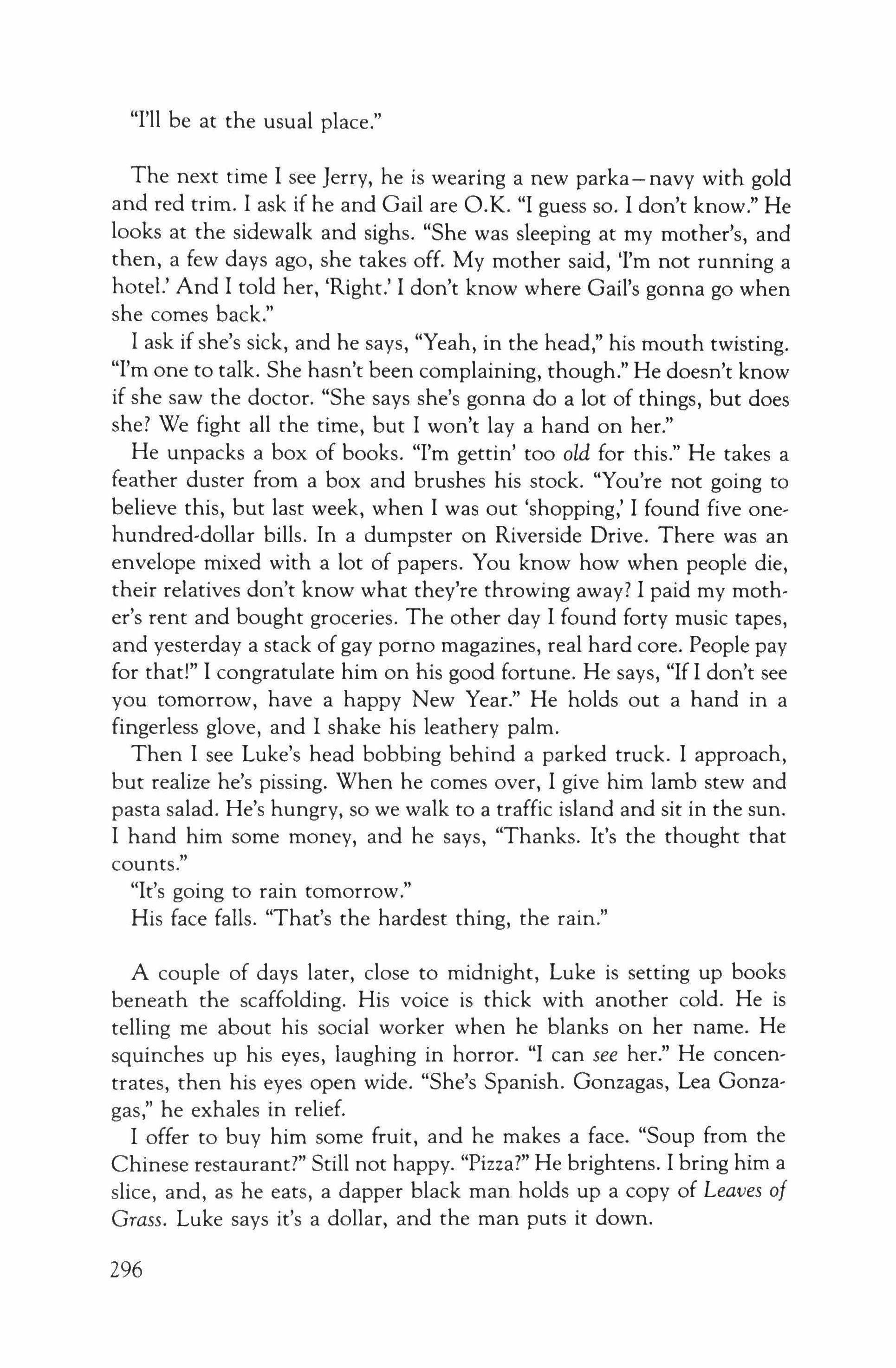
"I'll be at the usual place."
The next time I see Jerry, he is wearing a new parka-navy with gold and red trim. I ask if he and Gail are O.K. "I guess so. I don't know." He looks at the sidewalk and sighs. "She was sleeping at my mother's, and then, a few days ago, she takes off. My mother said, 'I'm not running a hotel.' And I told her, 'Right.' I don't know where Gail's gonna go when she comes back."
I ask if she's sick, and he says, "Yeah, in the head," his mouth twisting. "I'm one to talk. She hasn't been complaining, though." He doesn't know if she saw the doctor. "She says she's gonna do a lot of things, but does she? We fight all the time, but I won't lay a hand on her."
He unpacks a box of books. "I'm gettin' too old for this." He takes a feather duster from a box and brushes his stock. "You're not going to believe this, but last week, when I was out 'shopping,' I found five onehundred-dollar bills. In a dumpster on Riverside Drive. There was an envelope mixed with a lot of papers. You know how when people die, their relatives don't know what they're throwing away? I paid my mother's rent and bought groceries. The other day I found forty music tapes, and yesterday a stack of gay porno magazines, real hard core. People pay for that!" I congratulate him on his good fortune. He says, "If I don't see you tomorrow, have a happy New Year." He holds out a hand in a fingerless glove, and I shake his leathery palm.
Then I see Luke's head bobbing behind a parked truck. I approach, but realize he's pissing. When he comes over, I give him lamb stew and pasta salad. He's hungry, so we walk to a traffic island and sit in the sun. I hand him some money, and he says, "Thanks. It's the thought that counts."
"It's going to rain tomorrow."
His face falls. "That's the hardest thing, the rain."
A couple of days later, close to midnight, Luke is setting up books beneath the scaffolding. His voice is thick with another cold. He is telling me about his social worker when he blanks on her name. He squinches up his eyes, laughing in horror. "I can see her." He concentrates, then his eyes open wide. "She's Spanish. Gonzagas, Lea Gonzagas," he exhales in relief.
I offer to buy him some fruit, and he makes a face. "Soup from the Chinese restaurant?" Still not happy. "Pizza?" He brightens. I bring him a slice, and, as he eats, a dapper black man holds up a copy of Leaves of Grass. Luke says it's a dollar, and the man puts it down.
296
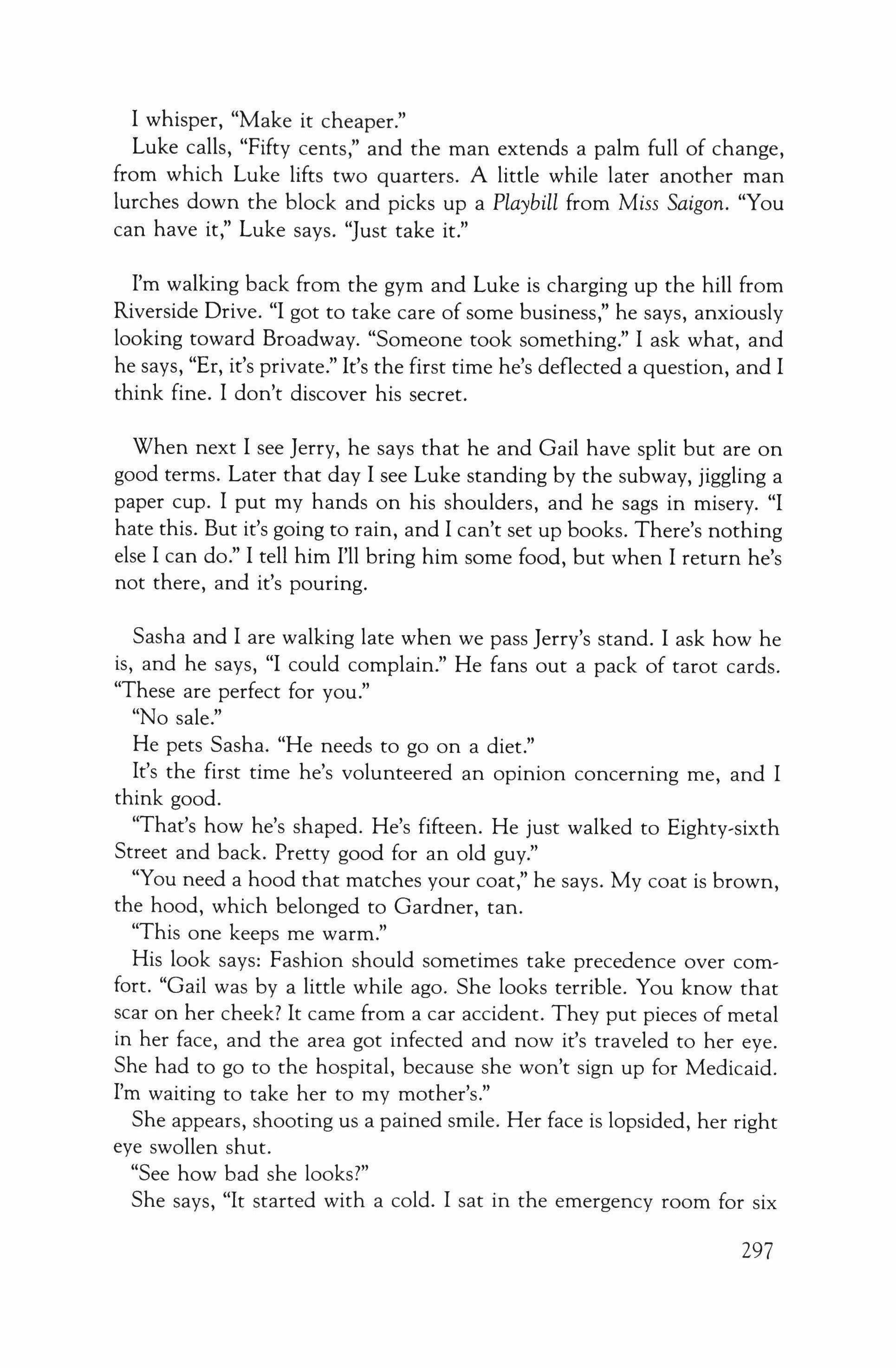
I whisper, "Make it cheaper."
Luke calls, "Fifty cents," and the man extends a palm full of change, from which Luke lifts two quarters. A little while later another man lurches down the block and picks up a Playbill from Miss Saigon. "You can have it," Luke says. "Just take it."
I'm walking back from the gym and Luke is charging up the hill from Riverside Drive. "I got to take care of some business," he says, anxiously looking toward Broadway. "Someone took something." I ask what, and he says, "Er, it's private." It's the first time he's deflected a question, and I think fine. I don't discover his secret.
When next I see Jerry, he says that he and Gail have split but are on good terms. Later that day I see Luke standing by the subway, jiggling a paper cup. I put my hands on his shoulders, and he sags in misery. "I hate this. But it's going to rain, and I can't set up books. There's nothing else I can do." I tell him I'll bring him some food, but when I return he's not there, and it's pouring.
Sasha and I are walking late when we pass Jerry's stand. I ask how he is, and he says, "I could complain." He fans out a pack of tarot cards. "These are perfect for you."
"No sale."
He pets Sasha. "He needs to go on a diet."
It's the first time he's volunteered an opinion concerning me, and I think good.
"That's how he's shaped. He's fifteen. He just walked to Eighty-sixth Street and back. Pretty good for an old guy."
"You need a hood that matches your coat," he says. My coat is brown, the hood, which belonged to Gardner, tan.
"This one keeps me warm."
His look says: Fashion should sometimes take precedence over comfort. "Gail was by a little while ago. She looks terrible. You know that scar on her cheek? It came from a car accident. They put pieces of metal in her face, and the area got infected and now it's traveled to her eye. She had to go to the hospital, because she won't sign up for Medicaid. I'm waiting to take her to my mother's."
She appears, shooting us a pained smile. Her face is lopsided, her right eye swollen shut.
"See how bad she looks?"
She says, "It started with a cold. I sat in the emergency room for six
297
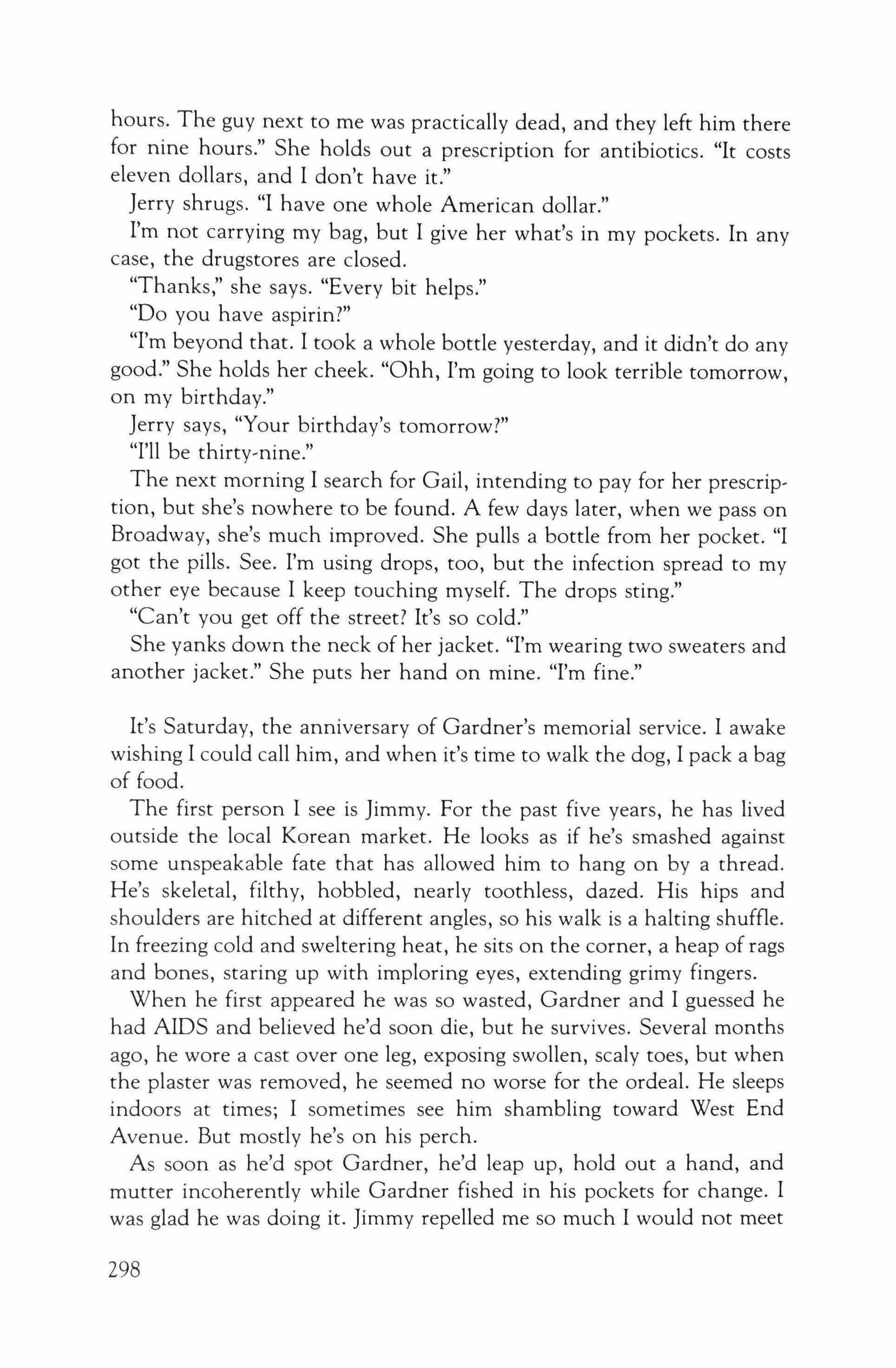
hours. The guy next to me was practically dead, and they left him there for nine hours." She holds out a prescription for antibiotics. "It costs eleven dollars, and I don't have it."
Jerry shrugs. "I have one whole American dollar."
I'm not carrying my bag, but I give her what's in my pockets. In any case, the drugstores are closed.
"Thanks," she says. "Every bit helps."
"Do you have aspirin?"
"I'm beyond that. I took a whole bottle yesterday, and it didn't do any good." She holds her cheek. "Ohh, I'm going to look terrible tomorrow, on my birthday."
Jerry says, "Your birthday's tomorrow?"
"I'll be thirty-nine."
The next morning I search for Gail, intending to pay for her prescription, but she's nowhere to be found. A few days later, when we pass on Broadway, she's much improved. She pulls a bottle from her pocket. "I got the pills. See. I'm using drops, too, but the infection spread to my other eye because I keep touching myself. The drops sting."
"Can't you get off the street? It's so cold."
She yanks down the neck of her jacket. "I'm wearing two sweaters and another jacket." She puts her hand on mine. "I'm fine."
It's Saturday, the anniversary of Gardner's memorial service. I awake wishing I could call him, and when it's time to walk the dog, I pack a bag of food.
The first person I see is Jimmy. For the past five years, he has lived outside the local Korean market. He looks as if he's smashed against some unspeakable fate that has allowed him to hang on by a thread. He's skeletal, filthy, hobbled, nearly toothless, dazed. His hips and shoulders are hitched at different angles, so his walk is a halting shuffle. In freezing cold and sweltering heat, he sits on the corner, a heap of rags and bones, staring up with imploring eyes, extending grimy fingers. When he first appeared he was so wasted, Gardner and I guessed he had AIDS and believed he'd soon die, but he survives. Several months ago, he wore a cast over one leg, exposing swollen, scaly toes, but when the plaster was removed, he seemed no worse for the ordeal. He sleeps indoors at times; I sometimes see him shambling toward West End Avenue. But mostly he's on his perch.
As soon as he'd spot Gardner, he'd leap up, hold out a hand, and mutter incoherently while Gardner fished in his pockets for change. I was glad he was doing it. Jimmy repelled me so much I would not meet
298
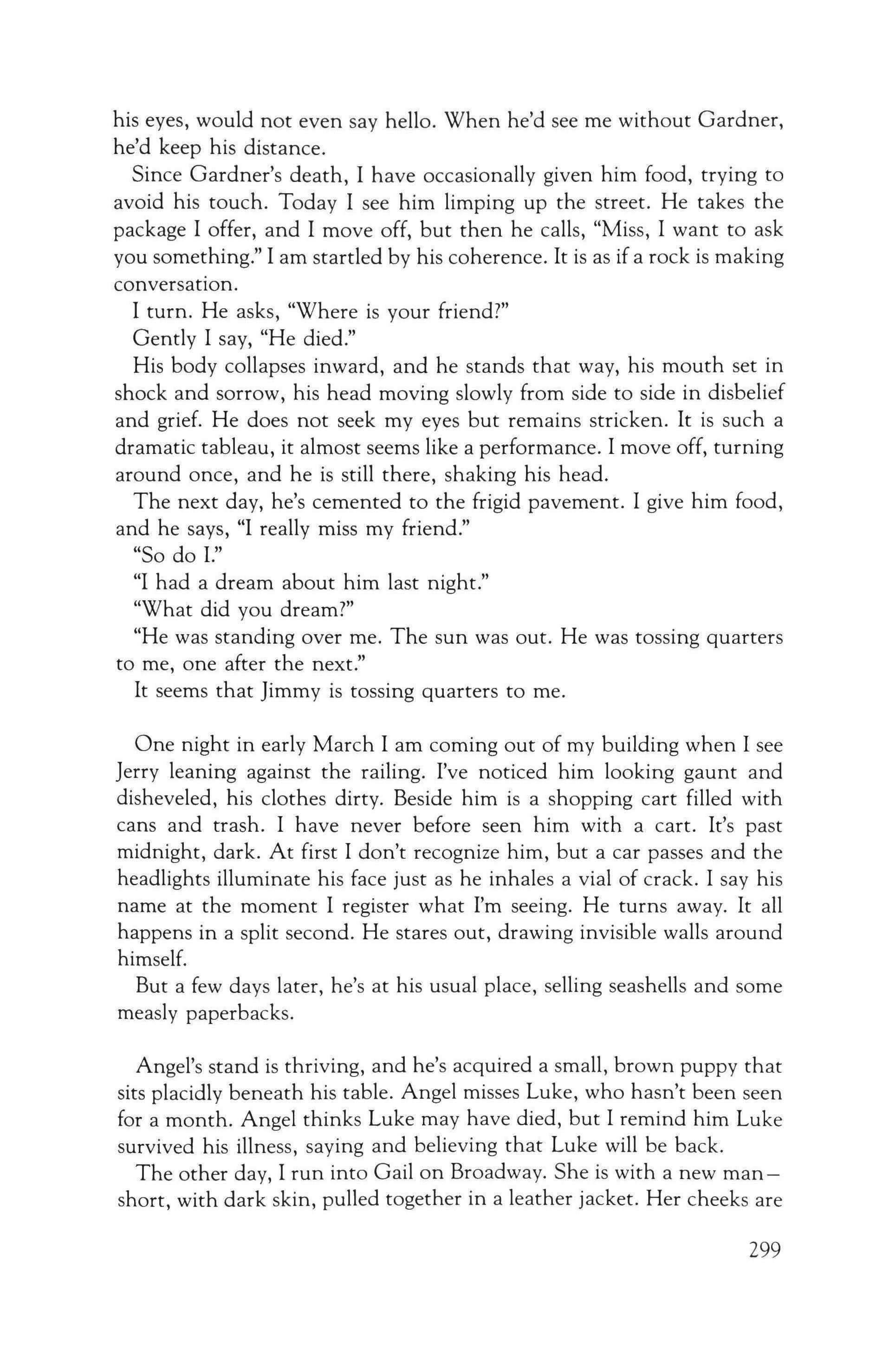
his eyes, would not even say hello. When he'd see me without Gardner, he'd keep his distance.
Since Gardner's death, I have occasionally given him food, trying to avoid his touch. Today I see him limping up the street. He takes the package I offer, and I move off, but then he calls, "Miss, I want to ask you something." I am startled by his coherence. It is as if a rock is making conversation.
I turn. He asks, "Where is your friend?"
Gently I say, "He died."
His body collapses inward, and he stands that way, his mouth set in shock and sorrow, his head moving slowly from side to side in disbelief and grief. He does not seek my eyes but remains stricken. It is such a dramatic tableau, it almost seems like a performance. I move off, turning around once, and he is still there, shaking his head.
The next day, he's cemented to the frigid pavement. I give him food, and he says, "I really miss my friend."
"So do I."
"I had a dream about him last night."
"What did you dream?"
"He was standing over me. The sun was out. He was tossing quarters to me, one after the next."
It seems that Jimmy is tossing quarters to me.
One night in early March I am coming out of my building when I see Jerry leaning against the railing. I've noticed him looking gaunt and disheveled, his clothes dirty. Beside him is a shopping cart filled with cans and trash. I have never before seen him with a cart. It's past midnight, dark. At first I don't recognize him, but a car passes and the headlights illuminate his face just as he inhales a vial of crack. I say his name at the moment I register what I'm seeing. He turns away. It all happens in a split second. He stares out, drawing invisible walls around himself.
But a few days later, he's at his usual place, selling seashells and some measly paperbacks.
Angel's stand is thriving, and he's acquired a small, brown puppy that sits placidly beneath his table. Angel misses Luke, who hasn't been seen for a month. Angel thinks Luke may have died, but I remind him Luke survived his illness, saying and believing that Luke will be back.
The other day, I run into Gail on Broadway. She is with a new manshort, with dark skin, pulled together in a leather jacket. Her cheeks are
299
rouged, her eyes made up. I am on my way to a party, out of my dogwalking sweats. She takes my hand, looking me up and down. Simultaneously we say, "You look good."
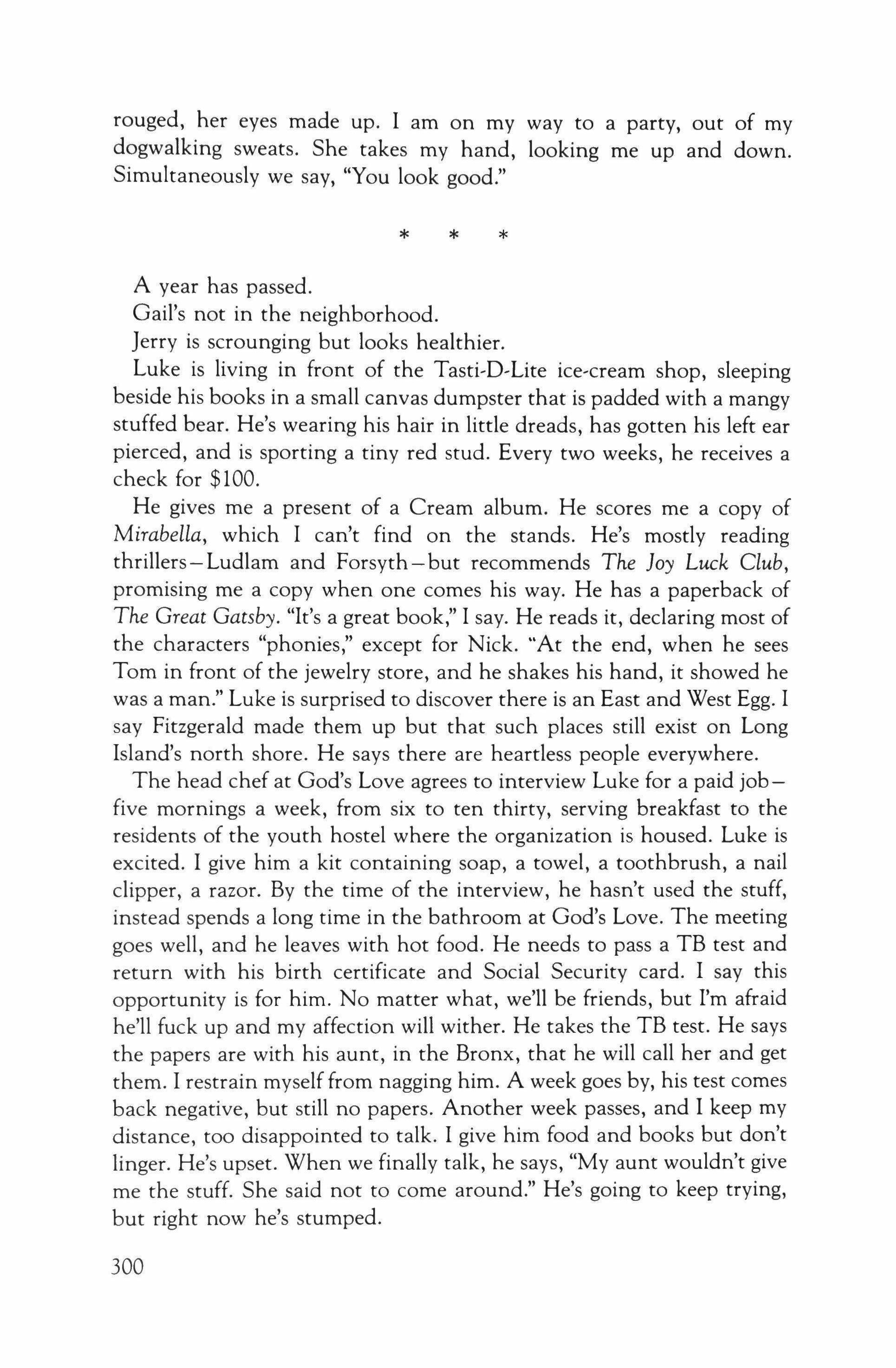
A year has passed.
Gail's not in the neighborhood. Jerry is scrounging but looks healthier. Luke is living in front of the Tasti-D-Lite ice-cream shop, sleeping beside his books in a small canvas dumpster that is padded with a mangy stuffed bear. He's wearing his hair in little dreads, has gotten his left ear pierced, and is sporting a tiny red stud. Every two weeks, he receives a check for $100.
He gives me a present of a Cream album. He scores me a copy of Mirabella, which I can't find on the stands. He's mostly reading thrillers-Ludlam and Forsyth-but recommends The Joy Luck Club, promising me a copy when one comes his way. He has a paperback of The Great Gatsby. "It's a great book," I say. He reads it, declaring most of the characters "phonies," except for Nick. "At the end, when he sees Tom in front of the jewelry store, and he shakes his hand, it showed he was a man." Luke is surprised to discover there is an East and West Egg. I say Fitzgerald made them up but that such places still exist on Long Island's north shore. He says there are heartless people everywhere.
The head chef at God's Love agrees to interview Luke for a paid jobfive mornings a week, from six to ten thirty, serving breakfast to the residents of the youth hostel where the organization is housed. Luke is excited. I give him a kit containing soap, a towel, a toothbrush, a nail clipper, a razor. By the time of the interview, he hasn't used the stuff, instead spends a long time in the bathroom at God's Love. The meeting goes well, and he leaves with hot food. He needs to pass a TB test and return with his birth certificate and Social Security card. I say this opportunity is for him. No matter what, we'll be friends, but I'm afraid he'll fuck up and my affection will wither. He takes the TB test. He says the papers are with his aunt, in the Bronx, that he will call her and get them. I restrain myself from nagging him. A week goes by, his test comes back negative, but still no papers. Another week passes, and I keep my distance, too disappointed to talk. I give him food and books but don't linger. He's upset. When we finally talk, he says, "My aunt wouldn't give me the stuff. She said not to come around." He's going to keep trying, but right now he's stumped. 300
* * *
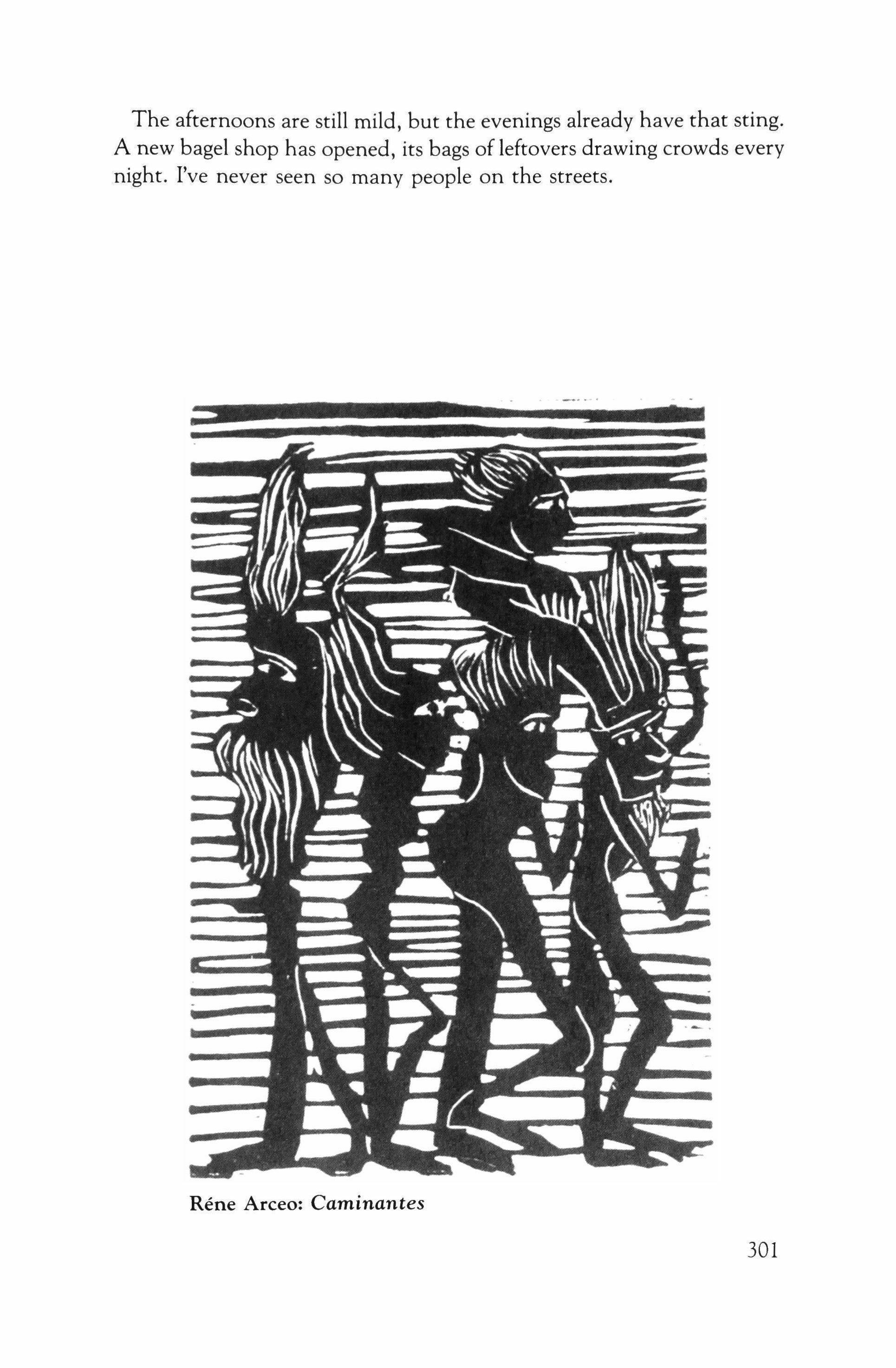
The afternoons are still mild, but the evenings already have that sting. A new bagel shop has opened, its bags of leftovers drawing crowds every night. I've never seen so many people on the streets.
301
Rene Arceo: Caminantes
Reviews: Research in the Absolute
Anne Winters
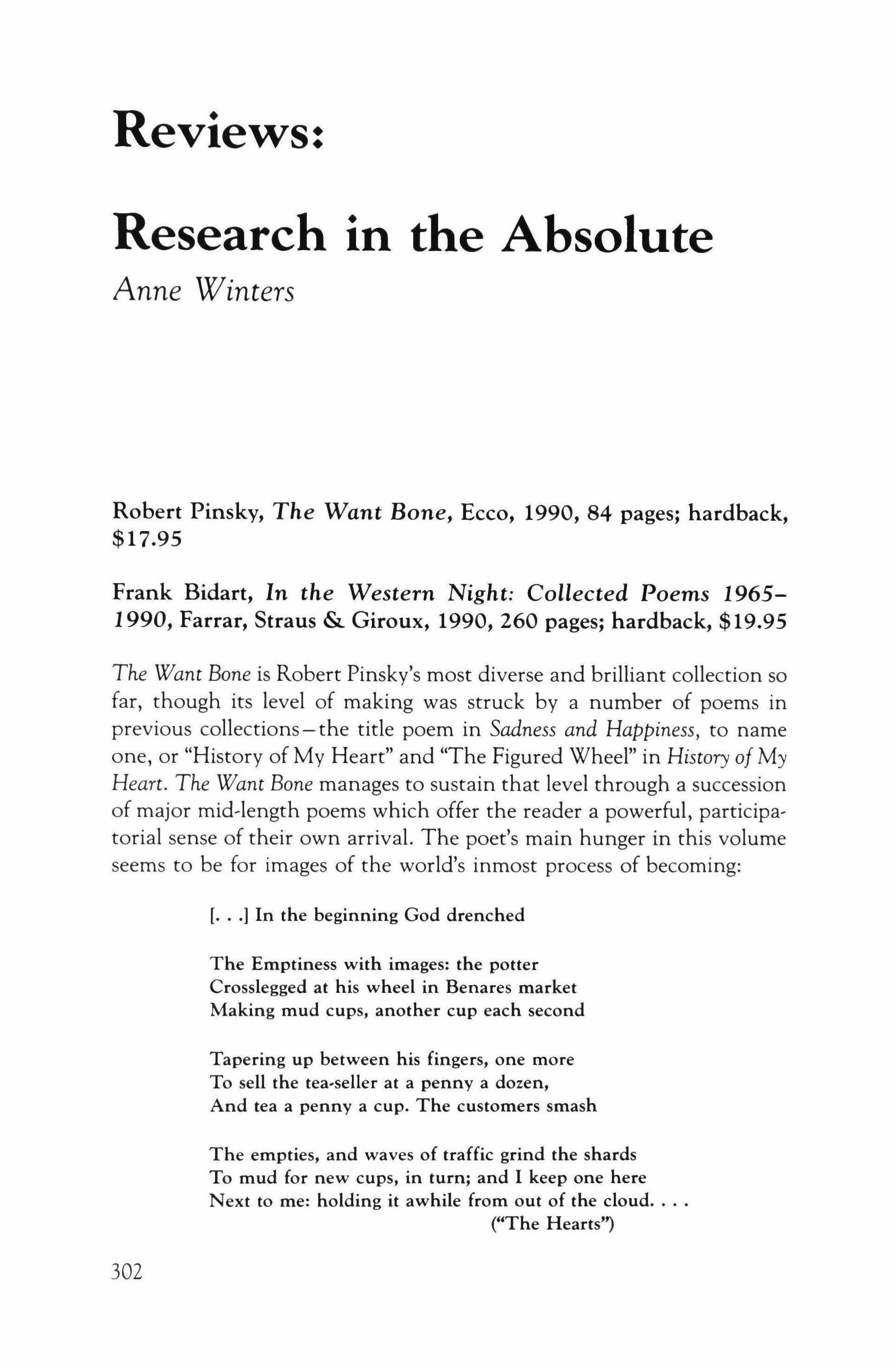
Robert Pinsky, The Want Bone, Ecco, 1990, 84 pages; hardback, $17.95
Frank Bidart, In the Western Night: Collected Poems 19651990, Farrar, Straus & Giroux, 1990,260 pages; hardback, $19.95
The Want Bone is Robert Pinsky's most diverse and brilliant collection so far, though its level of making was struck by a number of poems in previous collections-the title poem in Sadness and Happiness, to name one, or "History of My Heart" and "The Figured Wheel" in History of My Heart. The Want Bone manages to sustain that level through a succession of major mid-length poems which offer the reader a powerful, participatorial sense of their own arrival. The poet's main hunger in this volume seems to be for images of the world's inmost process of becoming:
[ J In the beginning God drenched
The Emptiness with images: the potter Crosslegged at his wheel in Benares market Making mud cups, another cup each second
Tapering up between his fingers, one more
To sell the tea-seller at a penny a dozen, And tea a penny a cup. The customers smash
The empties, and waves of traffic grind the shards To mud for new cups, in turn; and I keep one here Next to me: holding it awhile from out of the cloud ("The Hearts'')
302
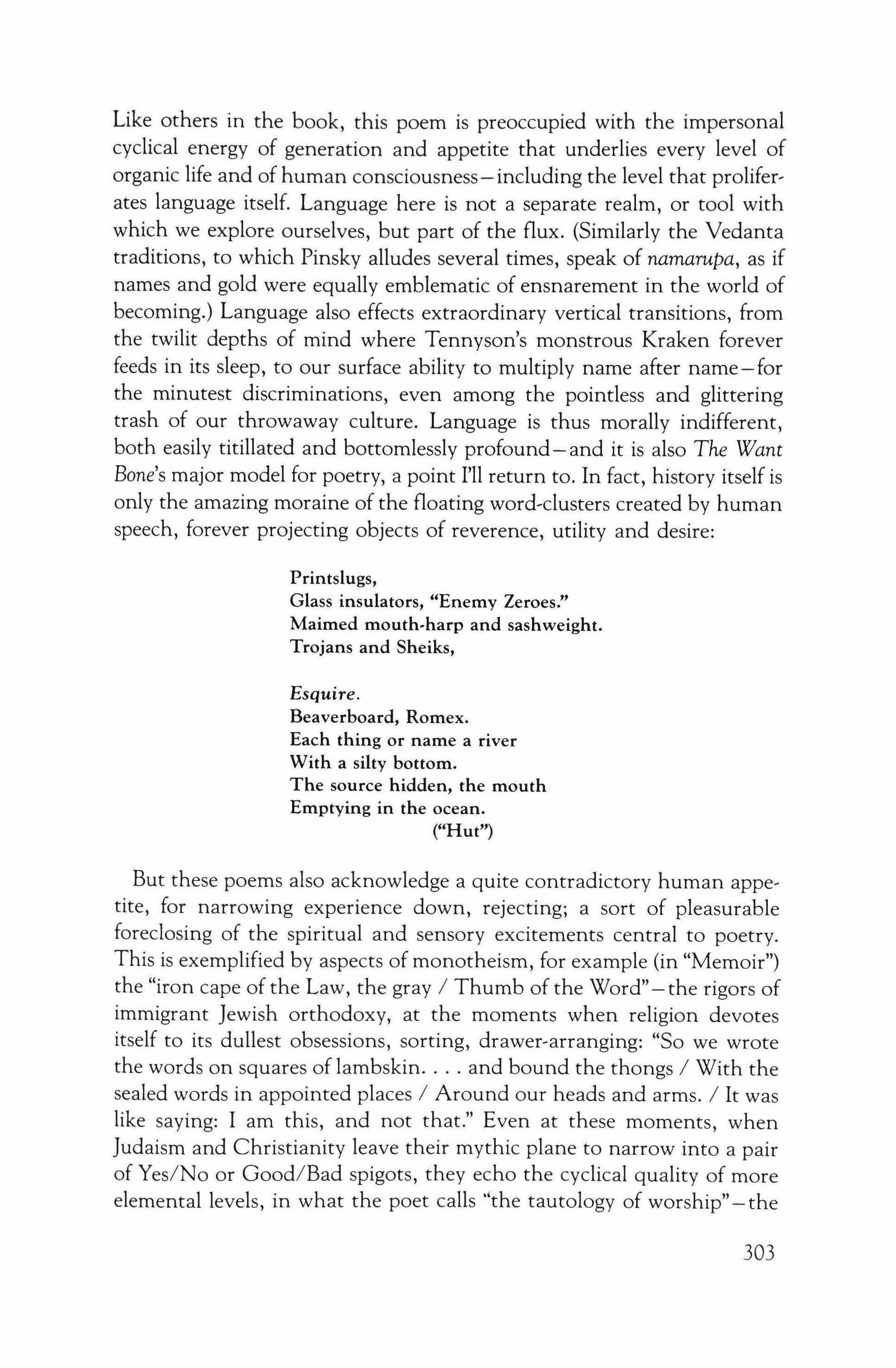
Like others in the book, this poem is preoccupied with the impersonal cyclical energy of generation and appetite that underlies every level of organic life and of human consciousness-including the level that proliferates language itself. Language here is not a separate realm, or tool with which we explore ourselves, but part of the flux. (Similarly the Vedanta traditions, to which Pinsky alludes several times, speak of namarupa, as if names and gold were equally emblematic of ensnarement in the world of becorning.) Language also effects extraordinary vertical transitions, from the twilit depths of mind where Tennyson's monstrous Kraken forever feeds in its sleep, to our surface ability to multiply name after name-for the minutest discriminations, even among the pointless and glittering trash of our throwaway culture. Language is thus morally indifferent, both easily titillated and bottomlessly profound-and it is also The Want Bone's major model for poetry, a point I'll return to. In fact, history itself is only the amazing moraine of the floating word-clusters created by human speech, forever projecting objects of reverence, utility and desire:
Printslugs, Glass insulators, "Enemy Zeroes." Maimed mouth-harp and sashweight.
Trojans and Sheiks,
Esquire.
Beaverboard, Romex.
Each thing or name a river With a silty bottom. The source hidden, the mouth Emptying in the ocean.
("Hut")
But these poems also acknowledge a quite contradictory human appetite, for narrowing experience down, rejecting; a sort of pleasurable foreclosing of the spiritual and sensory excitements central to poetry. This is exemplified by aspects of monotheism, for example (in "Memoir") the "iron cape of the Law, the gray / Thumb of the Word" -the rigors of immigrant Jewish orthodoxy, at the moments when religion devotes itself to its dullest obsessions, sorting, drawer-arranging: "So we wrote the words on squares of lambskin and bound the thongs / With the sealed words in appointed places / Around our heads and arms. / It was like saying: I am this, and not that." Even at these moments, when Judaism and Christianity leave their mythic plane to narrow into a pair of Yes/No or Good/Bad spigots, they echo the cyclical quality of more elemental levels, in what the poet calls "the tautology of worship"-the
303
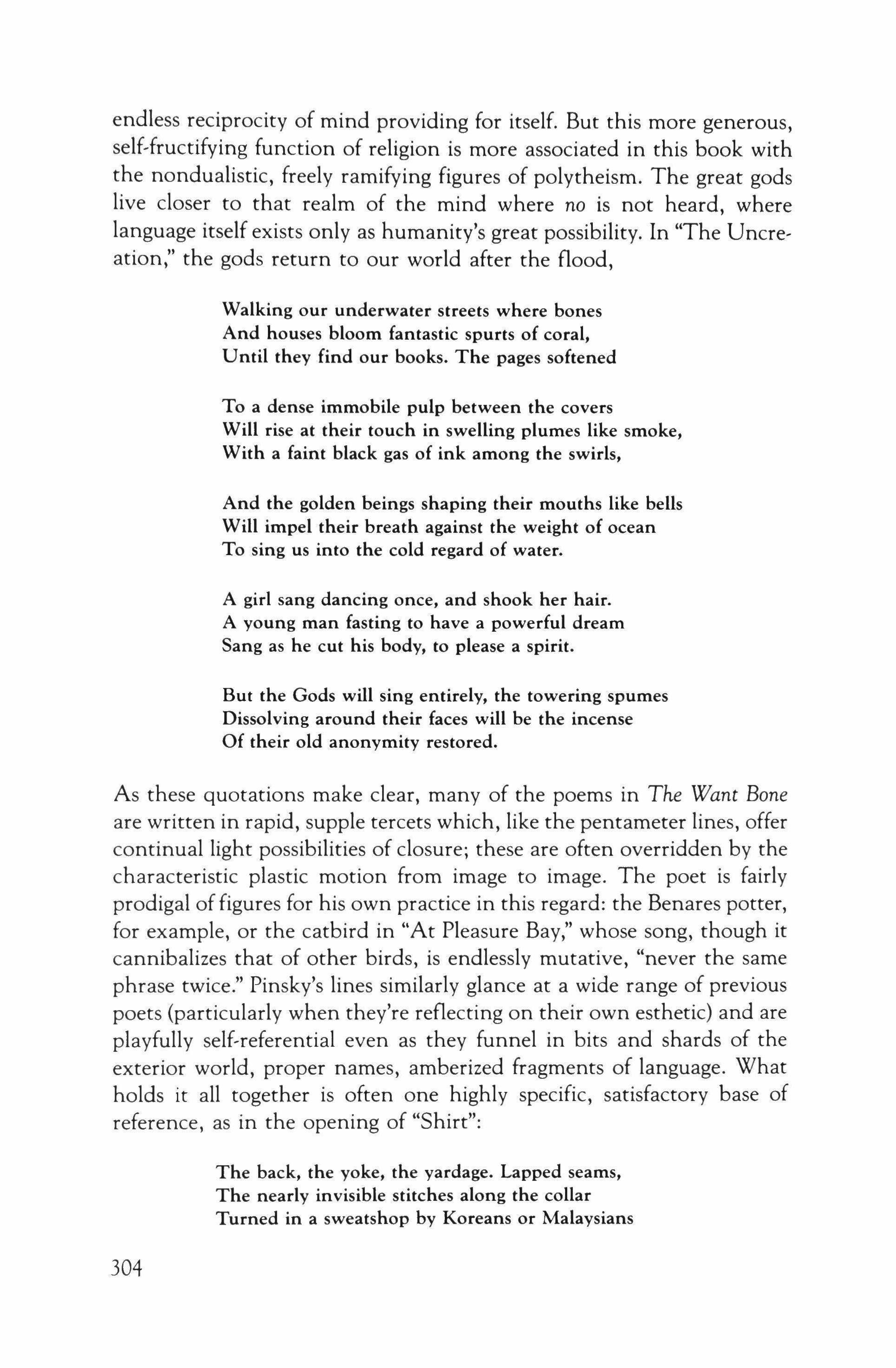
endless reciprocity of mind providing for itself. But this more generous, self-fructifying function of religion is more associated in this book with the nondualistic, freely ramifying figures of polytheism. The great gods live closer to that realm of the mind where no is not heard, where language itself exists only as humanity's great possibility. In "The Uncreation," the gods return to our world after the flood,
Walking our underwater streets where bones And houses bloom fantastic spurts of coral, Until they find our books. The pages softened
To a dense immobile pulp between the covers Will rise at their touch in swelling plumes like smoke, With a faint black gas of ink among the swirls,
And the golden beings shaping their mouths like bells Will impel their breath against the weight of ocean To sing us into the cold regard of water.
A girl sang dancing once, and shook her hair. A young man fasting to have a powerful dream Sang as he cut his body, to please a spirit.
But the Gods will sing entirely, the towering spumes Dissolving around their faces will be the incense Of their old anonymity restored.
As these quotations make clear, many of the poems in The Want Bone are written in rapid, supple tercets which, like the pentameter lines, offer continual light possibilities of closure; these are often overridden by the characteristic plastic motion from image to image. The poet is fairly prodigal offigures for his own practice in this regard: the Benares potter, for example, or the catbird in "At Pleasure Bay," whose song, though it cannibalizes that of other birds, is endlessly mutative, "never the same phrase twice." Pinsky's lines similarly glance at a wide range of previous poets {particularly when they're reflecting on their own esthetic} and are playfully self-referential even as they funnel in bits and shards of the exterior world, proper names, amberized fragments of language. What holds it all together is often one highly specific, satisfactory base of reference, as in the opening of "Shirt":
The back, the yoke, the yardage. Lapped seams, The nearly invisible stitches along the collar Turned in a sweatshop by Koreans or Malaysians
304
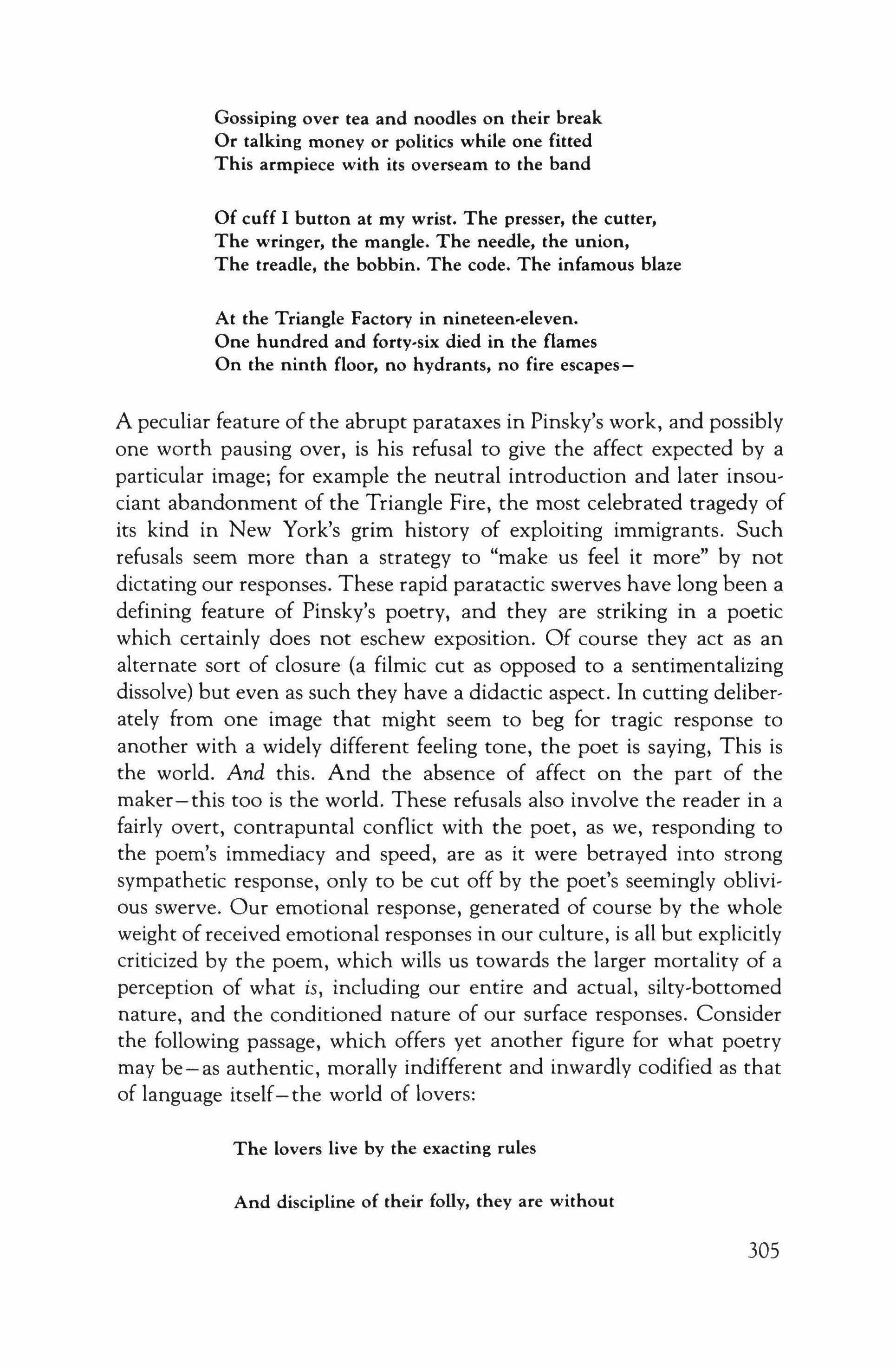
Gossiping over tea and noodles on their break Or talking money or politics while one fitted This armpiece with its overseam to the band
Of cuff I button at my wrist. The presser, the cutter, The wringer, the mangle. The needle, the union, The treadle, the bobbin. The code. The infamous blaze
At the Triangle Factory in nineteen-eleven. One hundred and forty-six died in the flames On the ninth floor, no hydrants, no fire escapes-
A peculiar feature of the abrupt parataxes in Pinsky's work, and possibly one worth pausing over, is his refusal to give the affect expected by a particular image; for example the neutral introduction and later insouciant abandonment of the Triangle Fire, the most celebrated tragedy of its kind in New York's grim history of exploiting immigrants. Such refusals seem more than a strategy to "make us feel it more" by not dictating our responses. These rapid paratactic swerves have long been a defining feature of Pinsky's poetry, and they are striking in a poetic which certainly does not eschew exposition. Of course they act as an alternate sort of closure (a filmic cut as opposed to a sentimentalizing dissolve) but even as such they have a didactic aspect. In cutting deliberately from one image that might seem to beg for tragic response to another with a widely different feeling tone, the poet is saying, This is the world. And this. And the absence of affect on the part of the maker-this too is the world. These refusals also involve the reader in a fairly overt, contrapuntal conflict with the poet, as we, responding to the poem's immediacy and speed, are as it were betrayed into strong sympathetic response, only to be cut off by the poet's seemingly oblivious swerve. Our emotional response, generated of course by the whole weight of received emotional responses in our culture, is all but explicitly criticized by the poem, which wills us towards the larger mortality of a perception of what is, including our entire and actual, silty-bottomed nature, and the conditioned nature of our surface responses. Consider the following passage, which offers yet another figure for what poetry may be-as authentic, morally indifferent and inwardly codified as that of language itself-the world of lovers:
The lovers live by the exacting rules
And discipline of their folly, they are without
305
Earnestness or hypocrisy, they are useless. They don't say anything about the poor,
Or exchange scorn for the President, they are like The dying poet who could not fix his attention On approaching World War II, because he felt
Distracted by a girl. They cannot pay attention To their food, whole centuries of suffering children Are as nothing to them, and even while they speak
They barely listen, but trembling scribble an image Of one another inside, stanzas or cartoons.
("What Why When How Who'')
At times the swerves from affect seem overstressed in the poems, as if the poet too pointedly snubbed the Good/Bad spigot. But mainly the poems succeed in moving with mastery among their implications. One result of this aspect of Pinsky's poetic is a sometimes ruffled reader, who has been denied what feels like necessary nourishment: the poems are criticizing the kind of nourishment a poem should offer. Paradoxically, with all this, few poems I know have more to offer the reader, largely because of this poet's deep fascination with the extraordinariness of the manifest world. "What if I told you the truth?" he inquires (in "Lament for the Makers"), "What if I could?" No poem, he implies, could stretch its boundaries as far as this world ofbecoming, which can also so oddly funnel its archipelagized energies into one finite, accomplished thing: "The docker, the navvy. The planter, the picker, the sorter
The buttonholes, the sizing, the facing, the characters Printed in black on neckband and tail. The shape, The label, the labor, the color, the shade. The shirt. ("Shirt'')
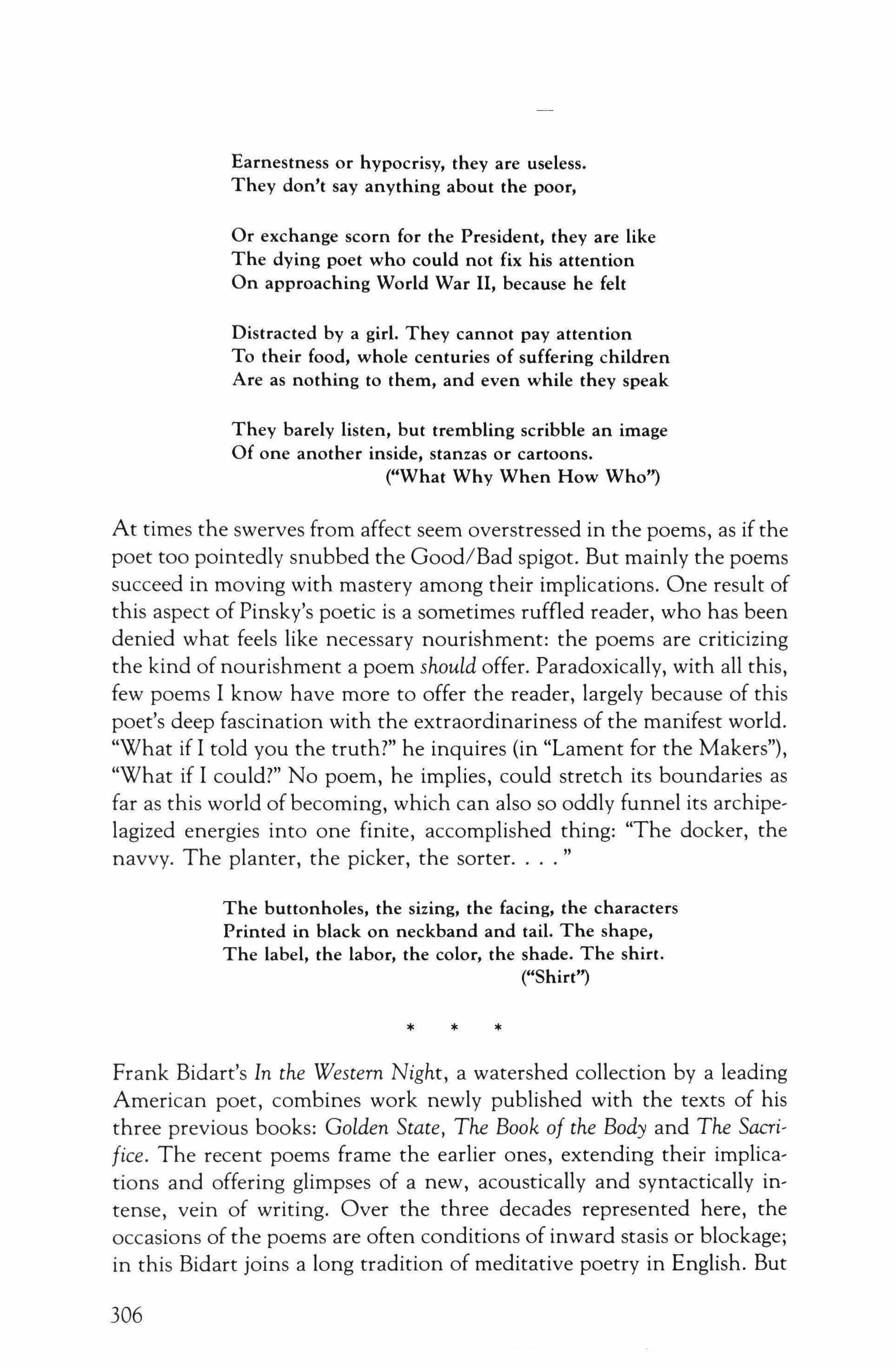
Frank Bidart's In the Western Night, a watershed collection by a leading American poet, combines work newly published with the texts of his three previous books: Golden State, The Book of the Body and The Sacrifice. The recent poems frame the earlier ones, extending their implications and offering glimpses of a new, acoustically and syntactically intense, vein of writing. Over the three decades represented here, the occasions of the poems are often conditions of inward stasis or blockage; in this Bidart joins a long tradition of meditative poetry in English. But
*
306
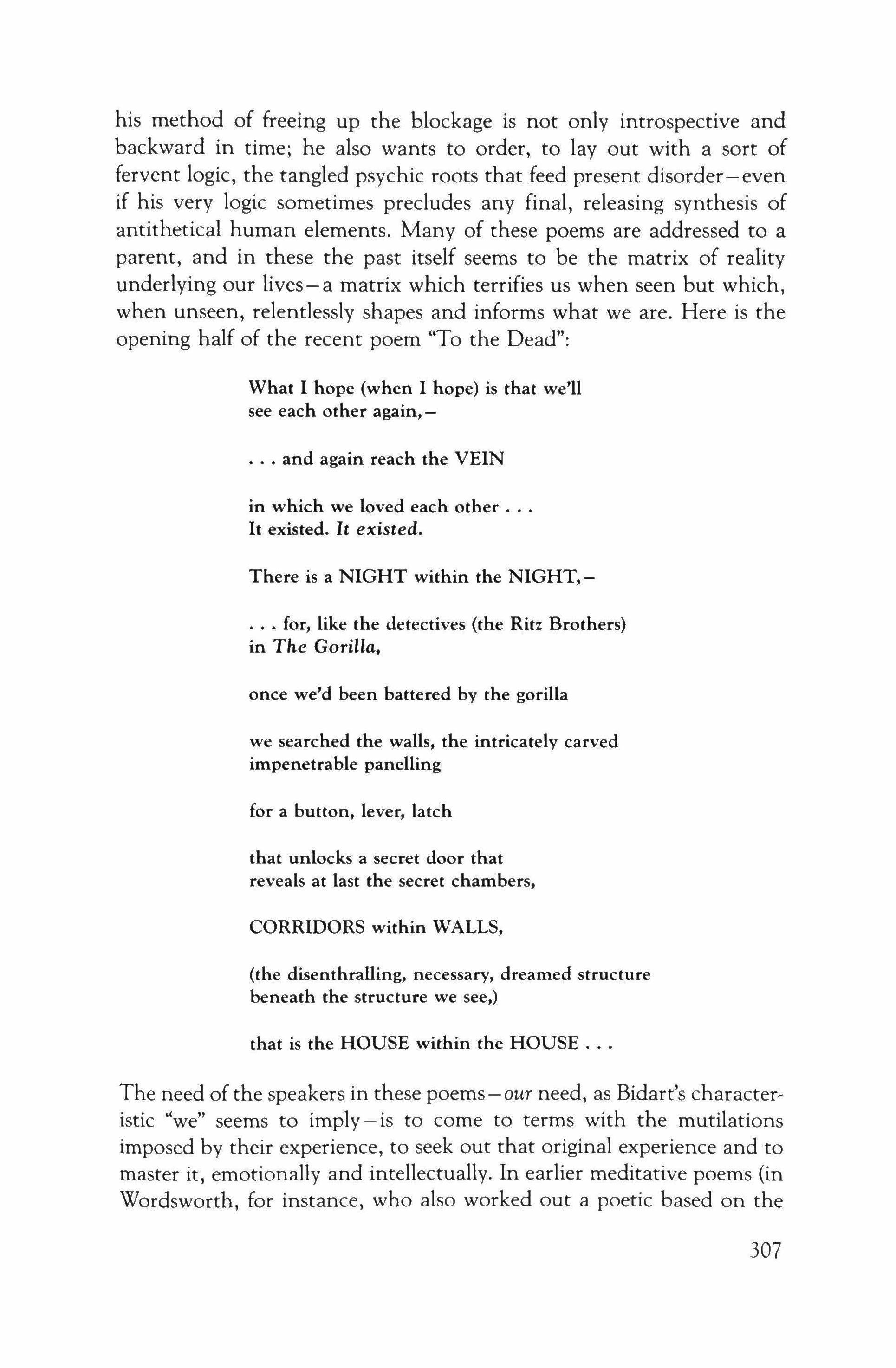
his method of freeing up the blockage is not only introspective and backward in time; he also wants to order, to layout with a sort of fervent logic, the tangled psychic roots that feed present disorder-even if his very logic sometimes precludes any final, releasing synthesis of antithetical human elements. Many of these poems are addressed to a parent, and in these the past itself seems to be the matrix of reality underlying our lives-a matrix which terrifies us when seen but which, when unseen, relentlessly shapes and informs what we are. Here is the opening half of the recent poem "To the Dead":
What I hope (when I hope) is that we'll see each other again,and again reach the VEIN in which we loved each other It existed. It existed.
There is a NIGHT within the NIGHT,for, like the detectives (the Ritz Brothers) in The Gorilla, once we'd been battered by the gorilla we searched the walls, the intricately carved impenetrable panelling for a button, lever, latch that unlocks a secret door that reveals at last the secret chambers, CORRIDORS within WALLS, (the disenthralling, necessary, dreamed structure beneath the structure we see.)
that is the HOUSE within the HOUSE
The need of the speakers in these poems-our need, as Bidart's characteristic "we" seems to imply - is to come to terms with the mutilations imposed by their experience, to seek out that original experience and to master it, emotionally and intellectually. In earlier meditative poems {in Wordsworth, for instance, who also worked out a poetic based on the
307
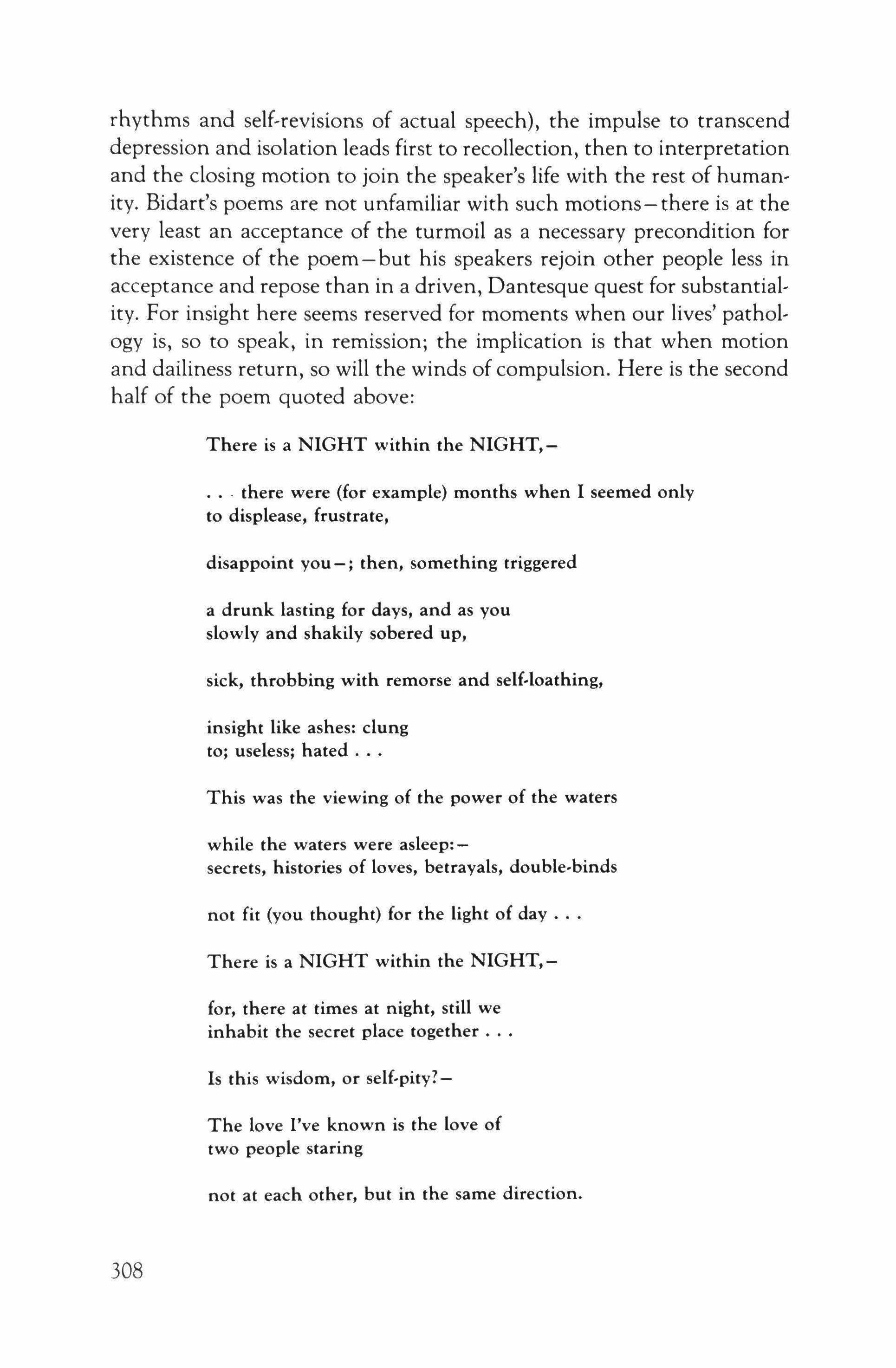
rhythms and self-revisions of actual speech), the impulse to transcend depression and isolation leads first to recollection, then to interpretation and the closing motion to join the speaker's life with the rest of humanity. Bidart's poems are not unfamiliar with such motions-there is at the very least an acceptance of the turmoil as a necessary precondition for the existence of the poem - but his speakers rejoin other people less in acceptance and repose than in a driven, Dantesque quest for substantiality. For insight here seems reserved for moments when our lives' pathology is, so to speak, in remission; the implication is that when motion and dailiness return, so will the winds of compulsion. Here is the second half of the poem quoted above:
There is a NIGHT within the NIGHT,- there were (for example) months when I seemed only to displease, frustrate, disappoint you -; then, something triggered a drunk lasting for days, and as you slowly and shakily sobered up,
sick, throbbing with remorse and self-loathing, insight like ashes: clung to; useless; hated
This was the viewing of the power of the waters while the waters were asleep:secrets, histories of loves, betrayals, double-binds not fit (you thought) for the light of day
There is a NIGHT within the NIGHT,for, there at times at night, still we inhabit the secret place together
Is this wisdom, or self-pitvi=-
The love I've known is the love of two people staring not at each other, but in the same direction.
308
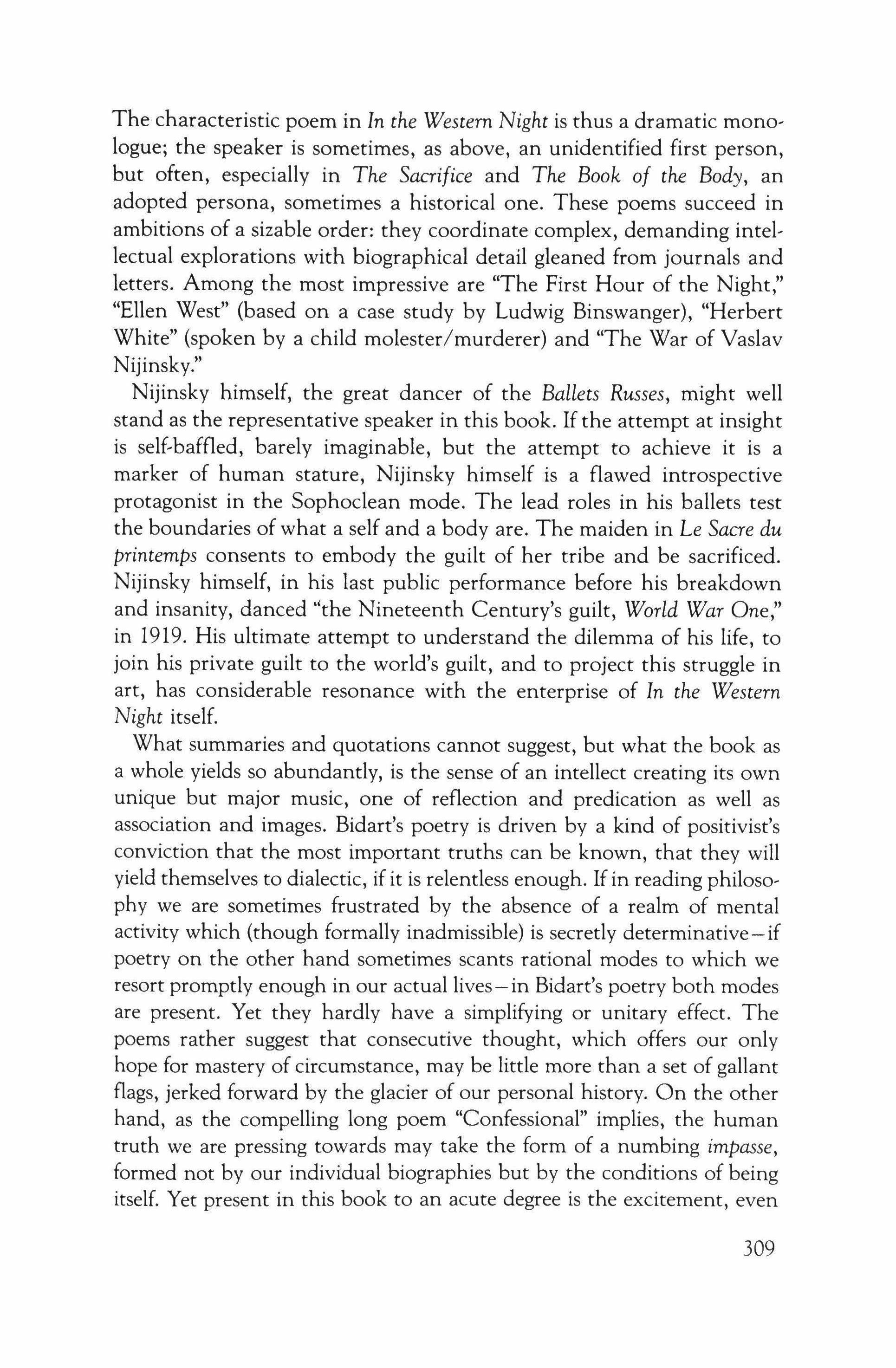
The characteristic poem in In the Western Night is thus a dramatic monologue; the speaker is sometimes, as above, an unidentified first person, but often, especially in The Sacrifice and The Book of the Body, an adopted persona, sometimes a historical one. These poems succeed in ambitions of a sizable order: they coordinate complex, demanding intellectual explorations with biographical detail gleaned from journals and letters. Among the most impressive are "The First Hour of the Night," "Ellen West" (based on a case study by Ludwig Binswanger), "Herbert White" (spoken by a child molester/murderer) and "The War of Vaslav Nijinsky."
Nijinsky himself, the great dancer of the Ballets Russes, might well stand as the representative speaker in this book. If the attempt at insight is self-baffled, barely imaginable, but the attempt to achieve it is a marker of human stature, Nijinsky himself is a flawed introspective protagonist in the Sophoclean mode. The lead roles in his ballets test the boundaries of what a self and a body are. The maiden in Le Sacre du printemps consents to embody the guilt of her tribe and be sacrificed. Nijinsky himself, in his last public performance before his breakdown and insanity, danced "the Nineteenth Century's guilt, World War One," in 1919. His ultimate attempt to understand the dilemma of his life, to join his private guilt to the world's guilt, and to project this struggle in art, has considerable resonance with the enterprise of In the Western Night itself.
What summaries and quotations cannot suggest, but what the book as a whole yields so abundantly, is the sense of an intellect creating its own unique but major music, one of reflection and predication as well as association and images. Bidart's poetry is driven by a kind of positivist's conviction that the most important truths can be known, that they will yield themselves to dialectic, if it is relentless enough. If in reading philosophy we are sometimes frustrated by the absence of a realm of mental activity which (though formally inadmissible) is secretly determinative-if poetry on the other hand sometimes scants rational modes to which we resort promptly enough in our actual lives-in Bidart's poetry both modes are present. Yet they hardly have a simplifying or unitary effect. The poems rather suggest that consecutive thought, which offers our only hope for mastery of circumstance, may be little more than a set of gallant flags, jerked forward by the glacier of our personal history. On the other hand, as the compelling long poem "Confessional" implies, the human truth we are pressing towards may take the form of a numbing impasse, formed not by our individual biographies but by the conditions of being itself. Yet present in this book to an acute degree is the excitement, even
309
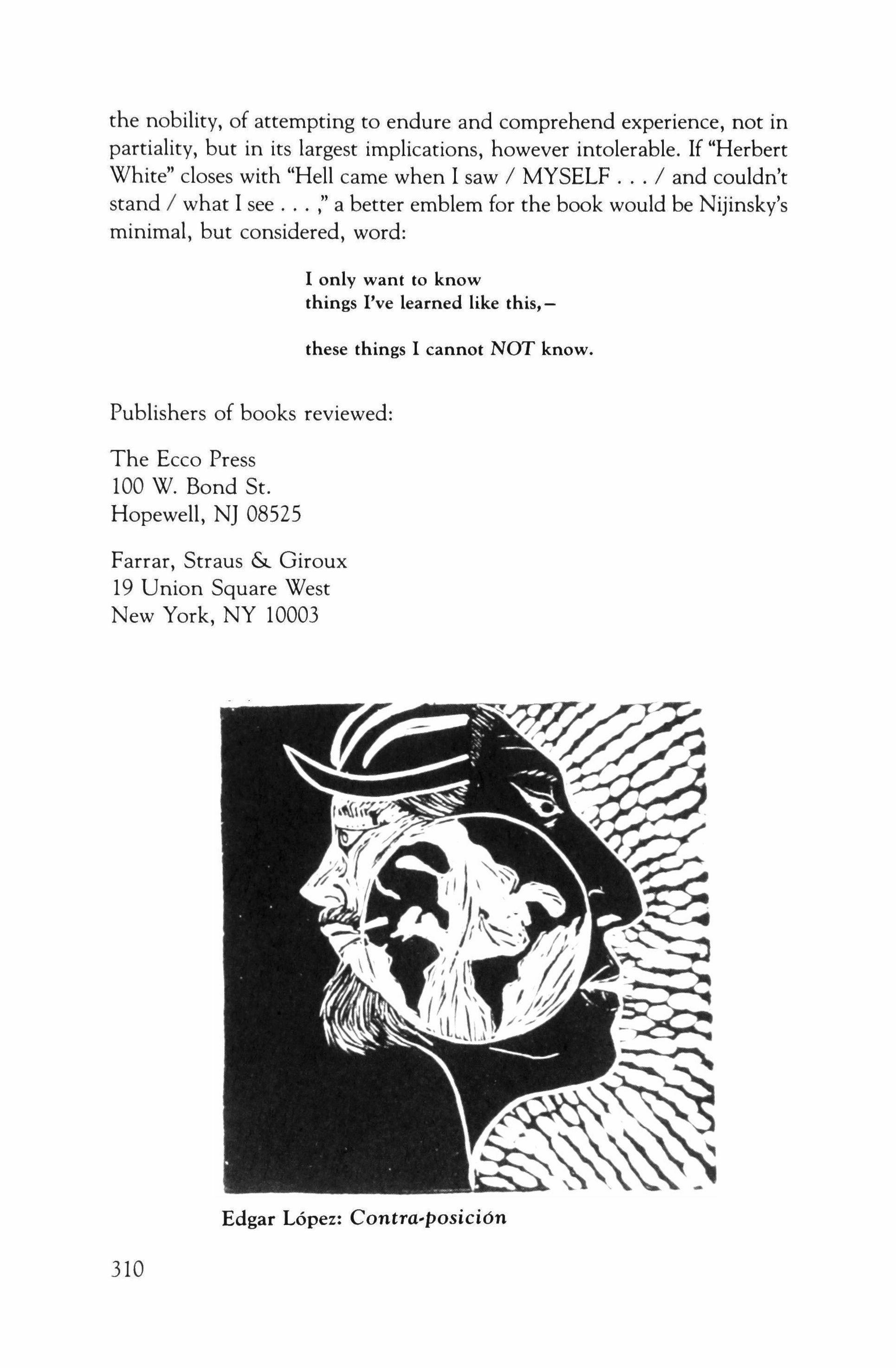
the nobility, of attempting to endure and comprehend experience, not in partiality, but in its largest implications, however intolerable. If "Herbert White" closes with "Hell came when I saw / MYSELF / and couldn't stand / what I see ," a better emblem for the book would be Nijinskv's minimal, but considered, word:
I only want to know things I've learned like this,these things I cannot NOT know.
Publishers of books reviewed:
The Ecco Press
100 W. Bond St. Hopewell, N] 08525
Farrar, Straus & Giroux
19 Union Square West
New York, NY 10003
310
Edgar Lopez: Contra-posicion
Contributors
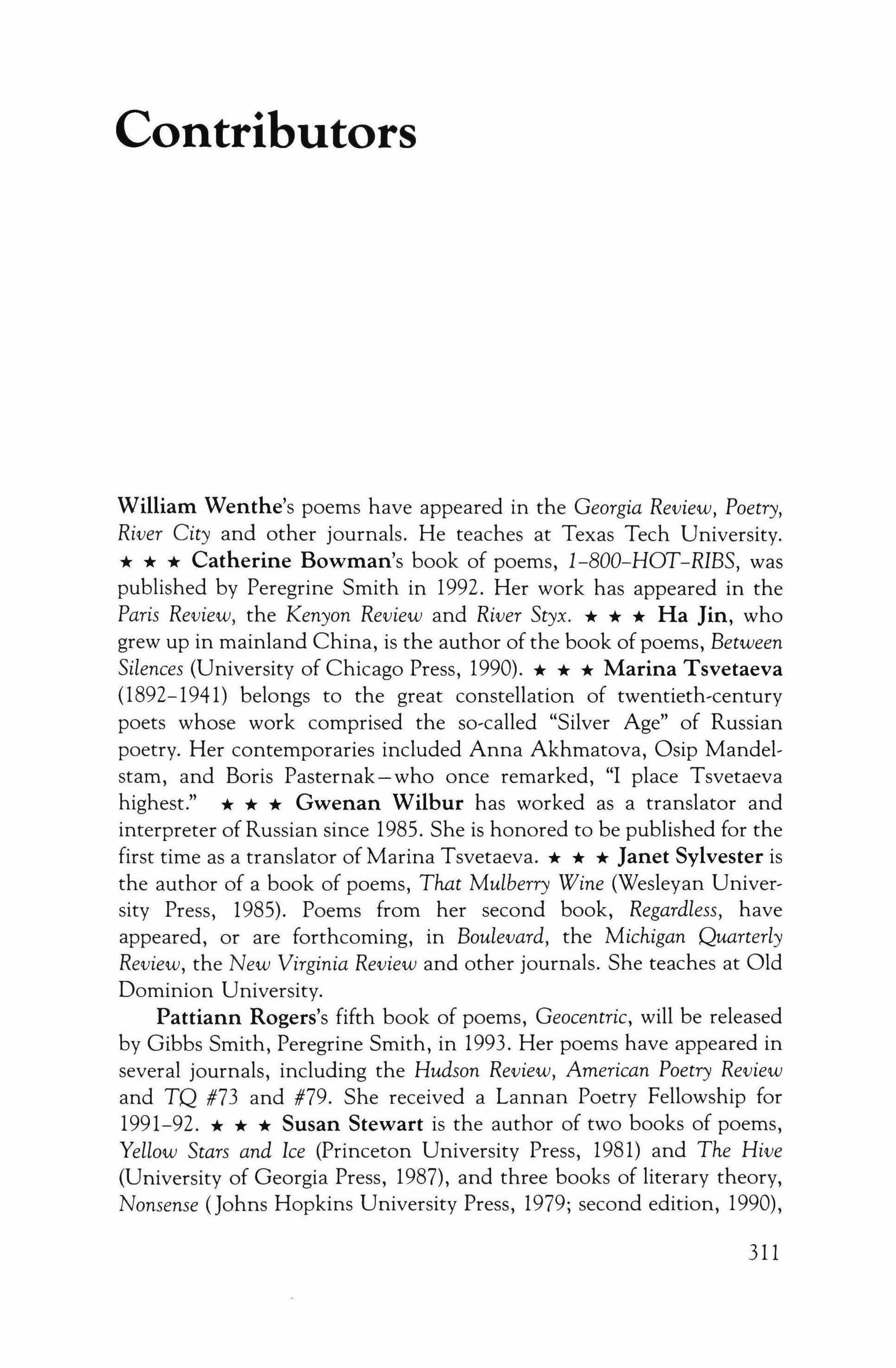
William Wenthe's poems have appeared in the Georgia Review, Poetry, River City and other journals. He teaches at Texas Tech University.
* * * Catherine Bowman's book of poems, I-800-HOT-RIBS, was published by Peregrine Smith in 1992. Her work has appeared in the Paris Review, the Kenyon Review and River Styx. * * * Ha Jin, who grew up in mainland China, is the author of the book of poems, Between Silences (University of Chicago Press, 1990). * * * Marina Tsvetaeva (1892-1941) belongs to the great constellation of twentieth-century poets whose work comprised the so-called "Silver Age" of Russian poetry. Her contemporaries included Anna Akhmatova, Osip Mandelstam, and Boris Pasternak-who once remarked, "I place Tsvetaeva highest."
* * * Gwenan Wilbur has worked as a translator and interpreter of Russian since 1985. She is honored to be published for the first time as a translator of Marina Tsvetaeva. * * * Janet Sylvester is the author of a book of poems, That Mulberry Wine (Wesleyan University Press, 1985). Poems from her second book, Regardless, have appeared, or are forthcoming, in Boulevard, the Michigan Quarterly Review, the New Virginia Review and other journals. She teaches at Old Dominion University.
Pattiann Rogers's fifth book of poems, Geocentric, will be released by Gibbs Smith, Peregrine Smith, in 1993. Her poems have appeared in several journals, including the Hudson Review, American Poetry Review and TQ #73 and #79. She received a Lannan Poetry Fellowship for 1991-92. * * * Susan Stewart is the author of two books of poems, Yellow Stars and Ice (Princeton University Press, 1981) and The Hive (University of Georgia Press, 1987), and three books of literary theory, Nonsense (Johns Hopkins University Press, 1979; second edition, 1990),
311
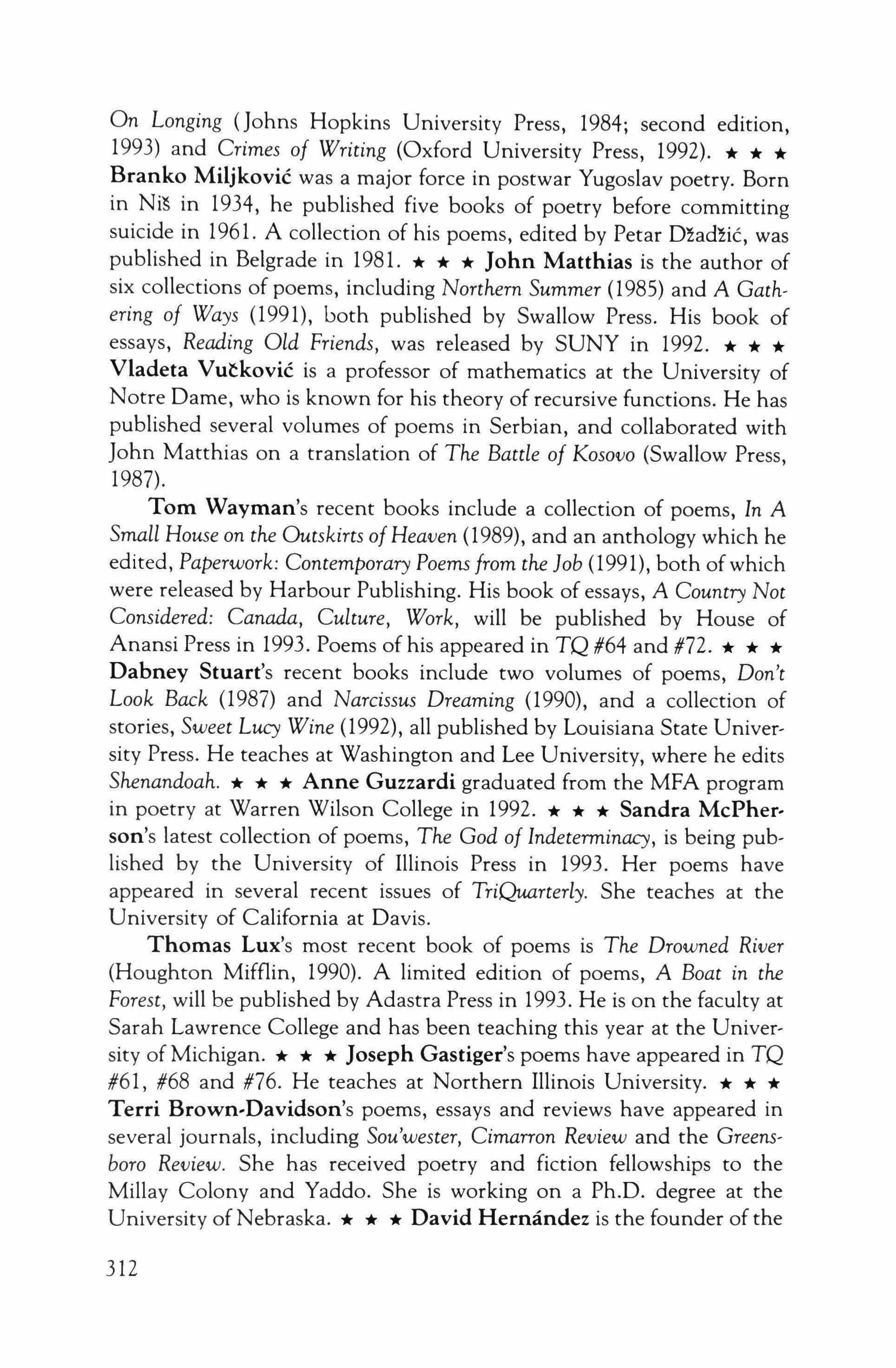
On Longing (Johns Hopkins University Press, 1984; second edition, 1993) and Crimes of Writing (Oxford University Press, 1992). * * *
Branko Miljkovic was a major force in postwar Yugoslav poetry. Born in Nis in 1934, he published five books of poetry before committing suicide in 1961. A collection of his poems, edited by Petar D�ad�iC, was published in Belgrade in 1981. * * * John Matthias is the author of six collections of poems, including Northern Summer (1985) and A Gathering of Ways (1991), both published by Swallow Press. His book of essays, Reading Old Friends, was released by SUNY in 1992. * * * Vladeta Vuckovic is a professor of mathematics at the University of Notre Dame, who is known for his theory of recursive functions. He has published several volumes of poems in Serbian, and collaborated with John Matthias on a translation of The Battle of Kosovo (Swallow Press, 1987).
Tom Wayman's recent books include a collection of poems, In A Small House on the Outskirts of Heaven (1989), and an anthology which he edited, Paperwork: Contemporary Poems from the Job (1991), both of which were released by Harbour Publishing. His book of essays, A Country Not Considered: Canada, Culture, Work, will be published by House of Anansi Press in 1993. Poems of his appeared in TQ #64 and #72. * * * Dabney Stuart's recent books include two volumes of poems, Don't Look Back (1987) and Narcissus Dreaming (1990), and a collection of stories, Sweet Lucy Wine (1992), all published by Louisiana State University Press. He teaches at Washington and Lee University, where he edits Shenandoah. * * * Anne Guzzardi graduated from the MFA program in poetry at Warren Wilson College in 1992. * * * Sandra McPherson's latest collection of poems, The God of Indeterminacy, is being published by the University of Illinois Press in 1993. Her poems have appeared in several recent issues of TriQuarterly. She teaches at the University of California at Davis.
Thomas Lux's most recent book of poems is The Drowned River (Houghton Mifflin, 1990). A limited edition of poems, A Boat in the Forest, will be published by Adastra Press in 1993. He is on the faculty at Sarah Lawrence College and has been teaching this year at the University of Michigan. * * * Joseph Gastiger's poems have appeared in TQ #61, #68 and #76. He teaches at Northern Illinois University. * * * Terri Brown-Davidson's poems, essays and reviews have appeared in several journals, including Sou'wester, Cimarron Review and the Greensboro Review. She has received poetry and fiction fellowships to the Millay Colony and Yaddo. She is working on a Ph.D. degree at the University of Nebraska. * * * David Hernandez is the founder of the
312
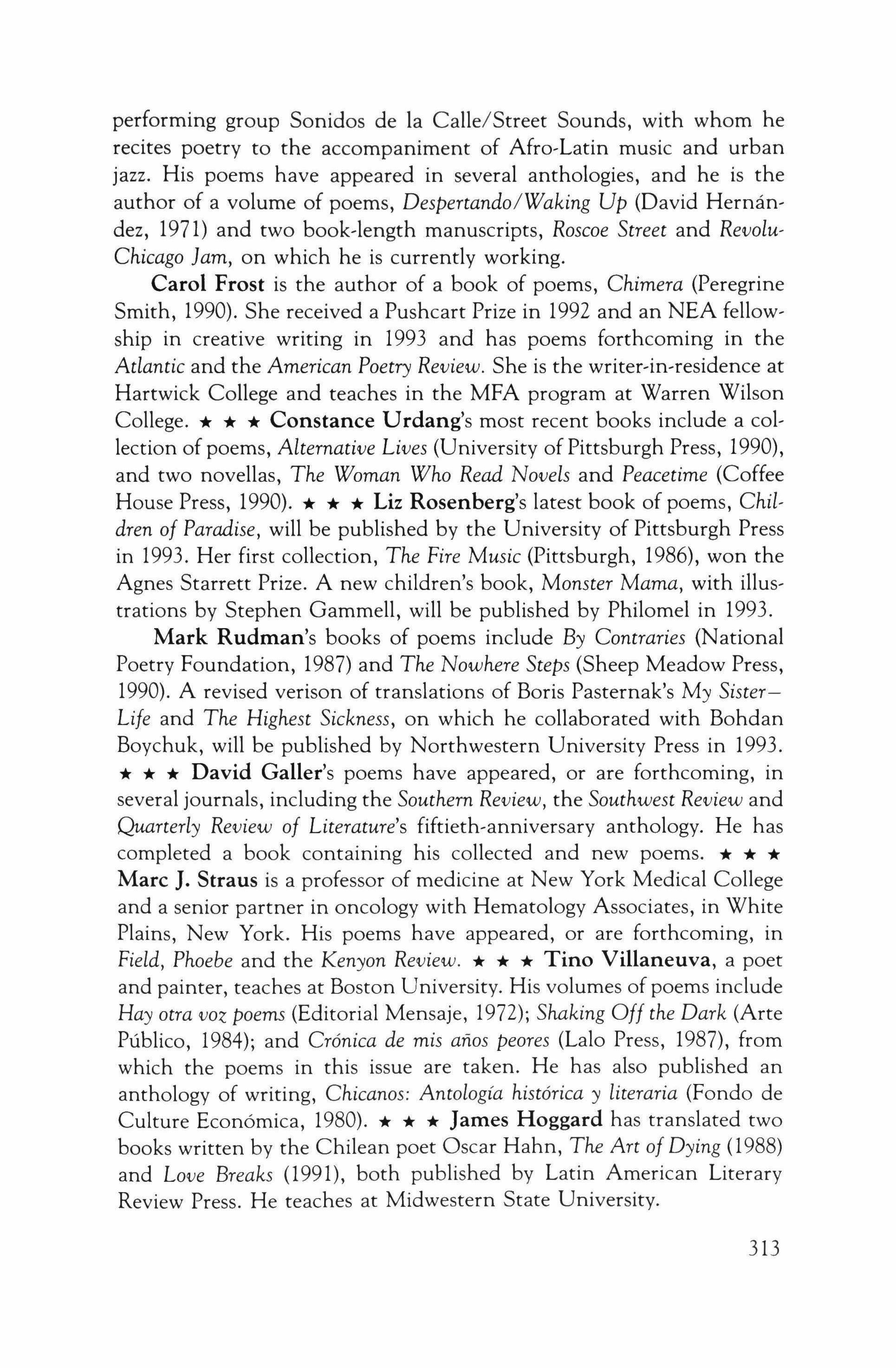
performing group Sonidos de la Calle/Street Sounds, with whom he recites poetry to the accompaniment of Afro-Latin music and urban jazz. His poems have appeared in several anthologies, and he is the author of a volume of poems, Despertando/Waking Up (David Hernandez, 1971) and two book-length manuscripts, Roscoe Street and RevoluChicago Jam, on which he is currently working.
Carol Frost is the author of a book of poems, Chimera (Peregrine Smith, 1990). She received a Pushcart Prize in 1992 and an NEA fellowship in creative writing in 1993 and has poems forthcoming in the Atlantic and the American Poetry Review. She is the writer-in-residence at Hartwick College and teaches in the MFA program at Warren Wilson College. * * * Constance Urdang's most recent books include a collection of poems, Alternative Lives (University of Pittsburgh Press, 1990), and two novellas, The Woman Who Read Novels and Peacetime (Coffee House Press, 1990). * * * Liz Rosenberg's latest book of poems, Children of Paradise, will be published by the University of Pittsburgh Press in 1993. Her first collection, The Fire Music (Pittsburgh, 1986), won the Agnes Starrett Prize. A new children's book, Monster Mama, with illustrations by Stephen Gammell, will be published by Philomel in 1993.
Mark Rudman's books of poems include By Contraries (National Poetry Foundation, 1987) and The Nowhere Steps (Sheep Meadow Press, 1990). A revised verison of translations of Boris Pasternak's My SisterLife and The Highest Sickness, on which he collaborated with Bohdan Boychuk, will be published by Northwestern University Press in 1993. * * * David Galler's poems have appeared, or are forthcoming, in several journals, including the Southern Review, the Southwest Review and Quarterly Review of Literature's fiftieth-anniversary anthology. He has completed a book containing his collected and new poems. * * * Marc J. Straus is a professor of medicine at New York Medical College and a senior partner in oncology with Hematology Associates, in White Plains, New York. His poems have appeared, or are forthcoming, in Field, Phoebe and the Kenyon Review. * * * Tino Villaneuva, a poet and painter, teaches at Boston University. His volumes of poems include Hay otra voz poems (Editorial Mensaje, 1972); Shaking Off the Dark (Arte Publico, 1984); and Cr6nica de mis afios peores (Lalo Press, 1987), from which the poems in this issue are taken. He has also published an anthology of writing, Chicanos: Antologia hist6rica y literaria (Fondo de Culture Econ6mica, 1980). * * * James Hoggard has translated two books written by the Chilean poet Oscar Hahn, The Art ofDying (1988) and Love Breaks (1991), both published by Latin American Literary Review Press. He teaches at Midwestern State University.
313
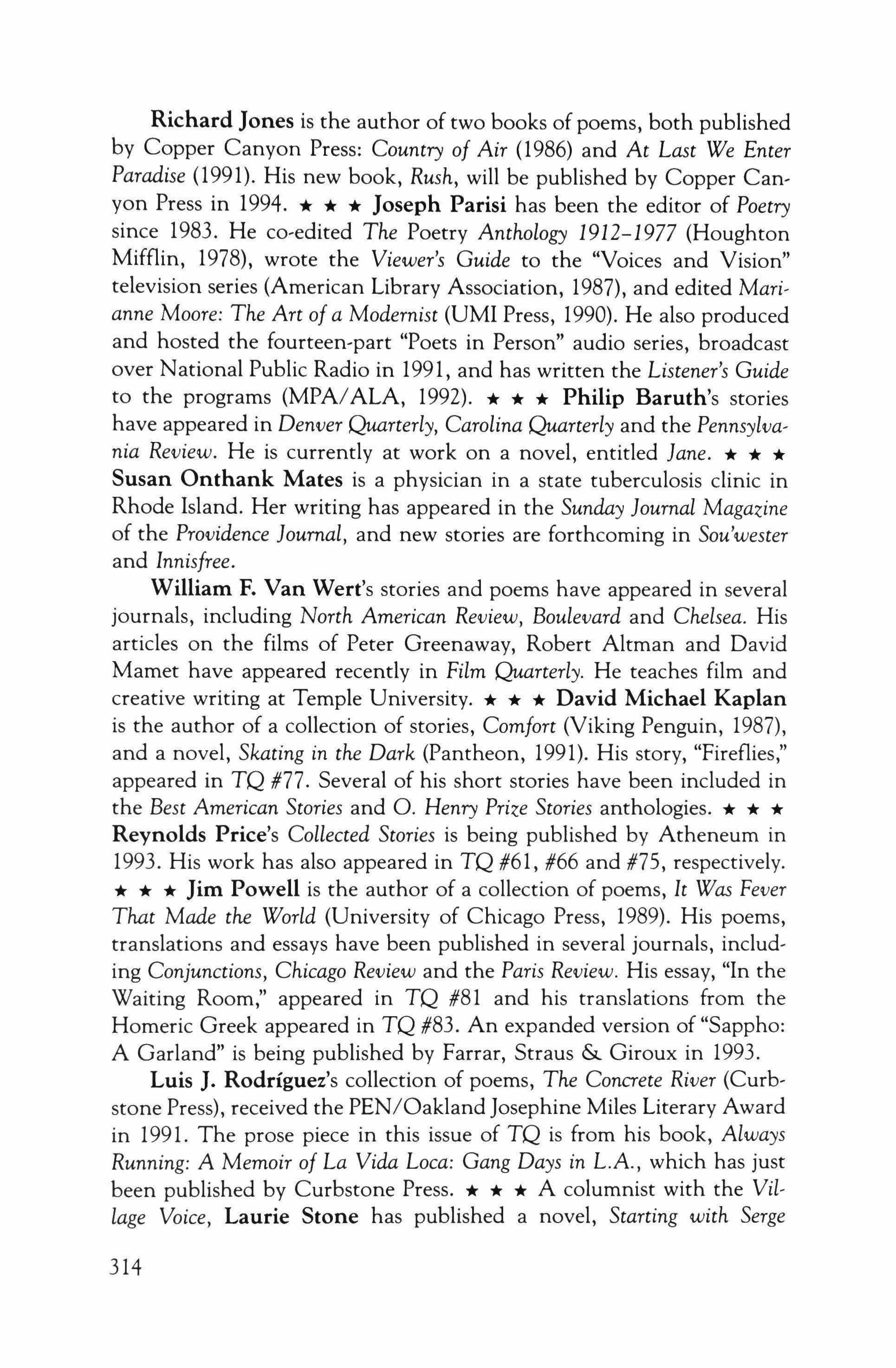
Richard Jones is the author of two books of poems, both published by Copper Canyon Press: Country of Air (1986) and At Last We Enter Paradise (1991). His new book, Rush, will be published by Copper Canyon Press in 1994. * * * Joseph Parisi has been the editor of Poetry since 1983. He co-edited The Poetry Anthology 1912-1977 (Houghton Mifflin, 1978), wrote the Viewer's Guide to the "Voices and Vision" television series (American Library Association, 1987), and edited Marianne Moore: The Art of a Modernist (UMI Press, 1990). He also produced and hosted the fourteen-part "Poets in Person" audio series, broadcast over National Public Radio in 1991, and has written the Listener's Guide to the programs (MPA/ALA, 1992). * * * Philip Baruth's stories have appeared in Denver Quarterly, Carolina Quarterly and the Pennsylvania Review. He is currently at work on a novel, entitled Jane. * * *
Susan Onthank Mates is a physician in a state tuberculosis clinic in Rhode Island. Her writing has appeared in the Sunday Journal Magazine of the Providence Journal, and new stories are forthcoming in Sou'wester and Innisfree.
William F. Van Wert's stories and poems have appeared in several journals, including North American Review, Boulevard and Chelsea. His articles on the films of Peter Greenaway, Robert Altman and David Mamet have appeared recently in Film Quarterly. He teaches film and creative writing at Temple University.
* * * David Michael Kaplan is the author of a collection of stories, Comfort (Viking Penguin, 1987), and a novel, Skating in the Dark (Pantheon, 1991). His story, "Fireflies," appeared in TQ #77. Several of his short stories have been included in the Best American Stories and o. Henry Prize Stories anthologies. * * * Reynolds Price's Collected Stories is being published by Atheneum in 1993. His work has also appeared in TQ #61, #66 and #75, respectively.
* * * Jim Powell is the author of a collection of poems, It Was Fever That Made the World (University of Chicago Press, 1989). His poems, translations and essays have been published in several journals, including Conjunctions, Chicago Review and the Paris Review. His essay, "In the Waiting Room," appeared in TQ #81 and his translations from the Homeric Greek appeared in TQ #83. An expanded version of "Sappho: A Garland" is being published by Farrar, Straus & Giroux in 1993.
Luis J. Rodriguez's collection of poems, The Concrete River (Curbstone Press), received the PEN/Oakland Josephine Miles Literary Award in 1991. The prose piece in this issue of TQ is from his book, Always Running: A Memoir of La Vida Loca: Gang Days in L.A., which has just been published by Curbstone Press. * * * A columnist with the Village Voice, Laurie Stone has published a novel, Starting with Serge
314
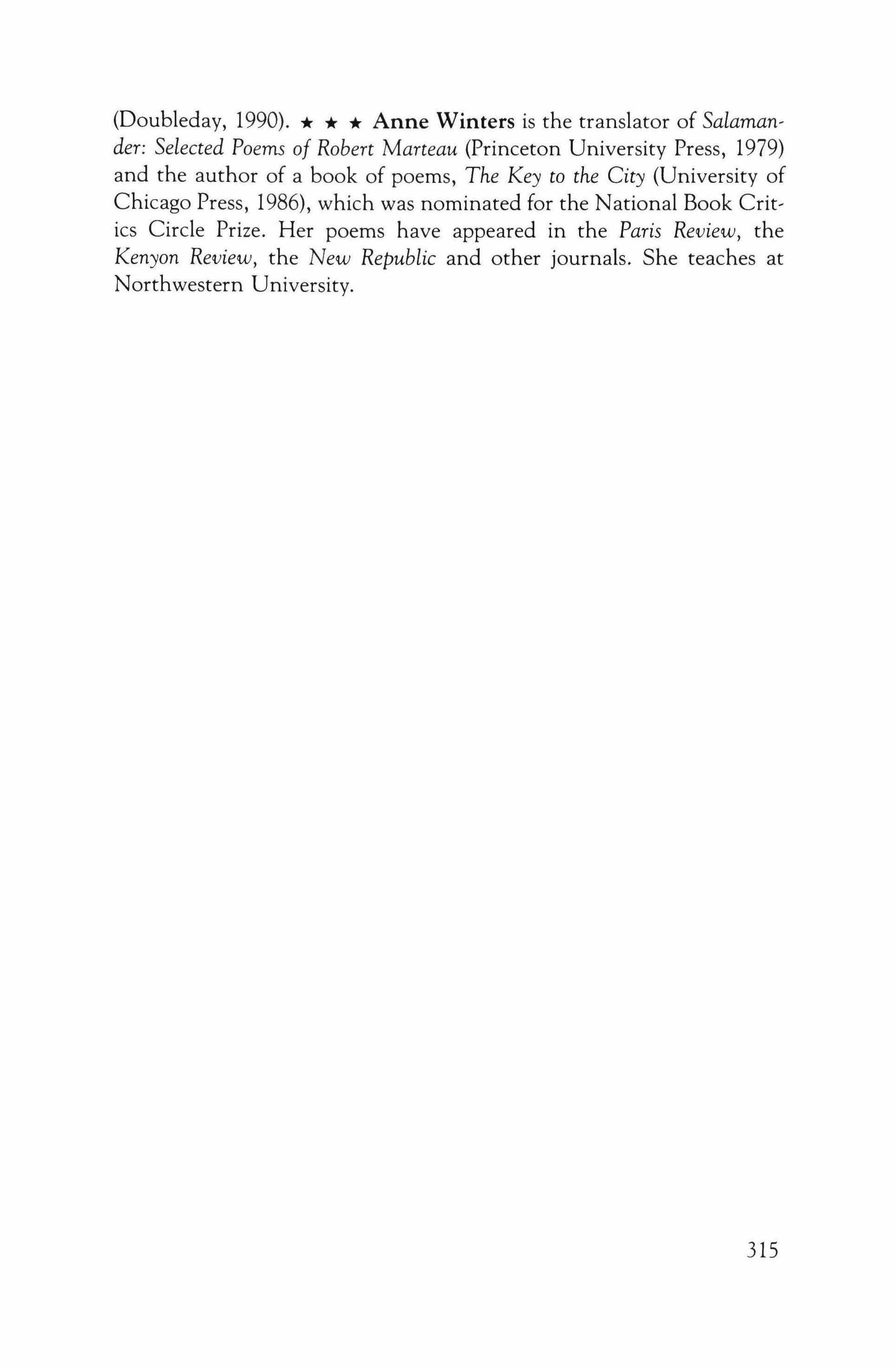
(Doubleday, 1990).
* * * Anne Winters is the translator of Salamander: Selected Poems of Robert Marteau (Princeton University Press, 1979) and the author of a book of poems, The Key to the City (University of Chicago Press, 1986), which was nominated for the National Book Critics Circle Prize. Her poems have appeared in the Paris Review, the Kenyon Review, the New Republic and other journals. She teaches at Northwestern University.
315
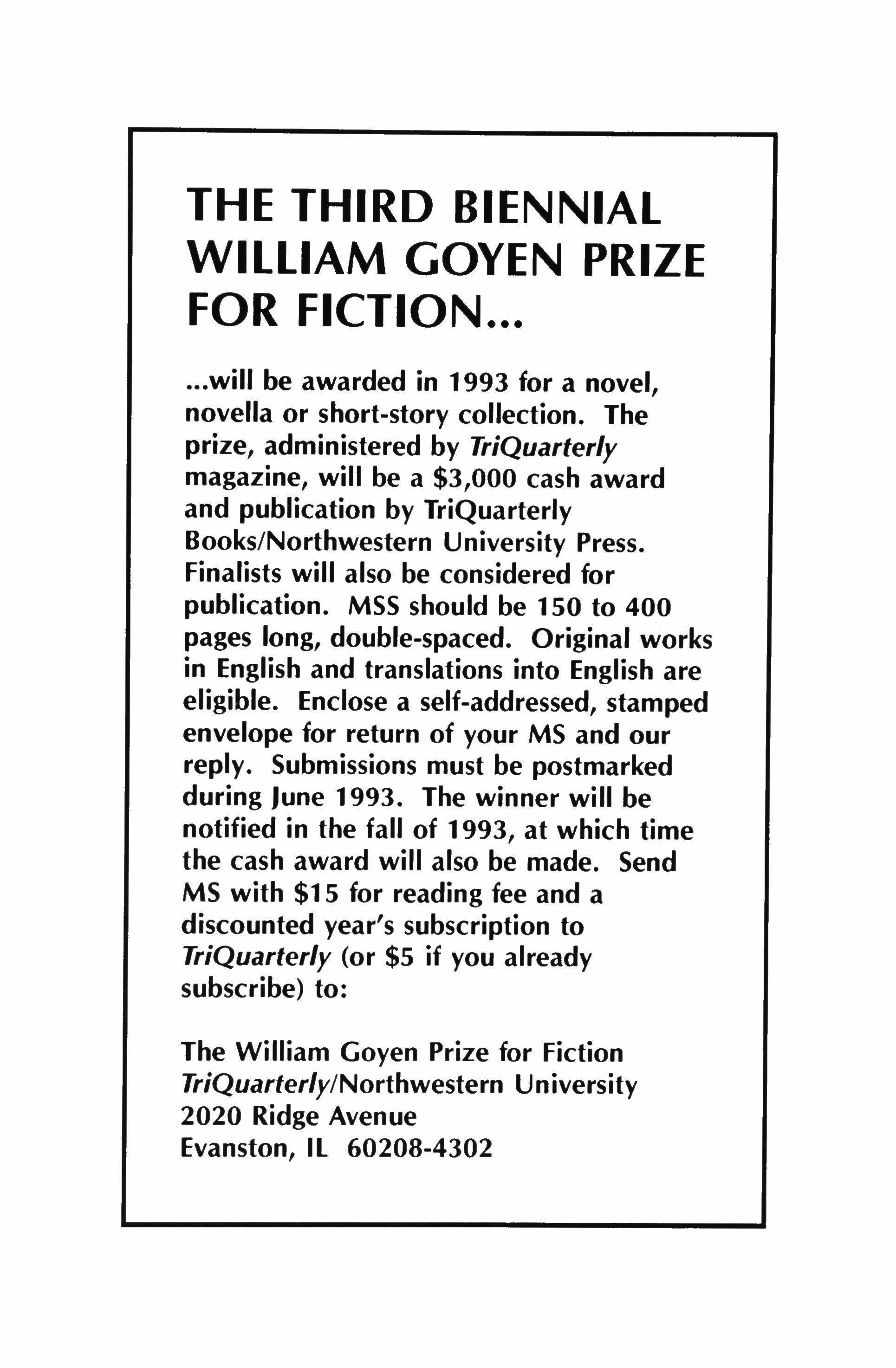
THE THIRD BIENNIAL WILLIAM GOVEN PRIZE FOR FICTION
will be awarded in 1993 for a novel, novella or short-story collection. The prize, administered by TriQuarterly magazine, will be a $3,000 cash award and publication by TriQuarterly Books/Northwestern University Press. Finalists will also be considered for publication. MSS should be 150 to 400 pages long, double-spaced. Original works in English and translations into English are eligible. Enclose a self-addressed, stamped envelope for return of your MS and our reply. Submissions must be postmarked during June 1993. The winner will be notified in the fall of 1993, at which time the cash award will also be made. Send MS with $15 for reading fee and a discounted year's subscription to TriQuarterly (or $5 if you already subscribe) to:
The William Goyen Prize for Fiction
TriQuarterly/Northwestern University 2020 Ridge Avenue Evanston, IL 60208-4302
THE HISTORIAN
Six Fantasies of the American Experience
by Eugene K. Garber
Winner of TriQuarterly's William Goyen Prize
for Fiction
A rollicking metaphysical adventure tale that captures and dissects the essence of the American character and experience. The Historian is a battle within the soul of history between myth and fact, and a search for the American woman, whose vitality has been all but written out of history by puritan consciousness.
"Eugene Garber, casting himself as both Herodotus and Ned Buntline, has elevated American history in the second half of the 19th century to the grandeur of a legend about a mighty civilization of thousands of years ago."
-Kurt Vonnegut
"The Historian is an extraordinary work of the imagination. A wonderful book. Eugene Garber is quietly emerging as one of the most gifted and original of the metafictionists."
-Robert Coover
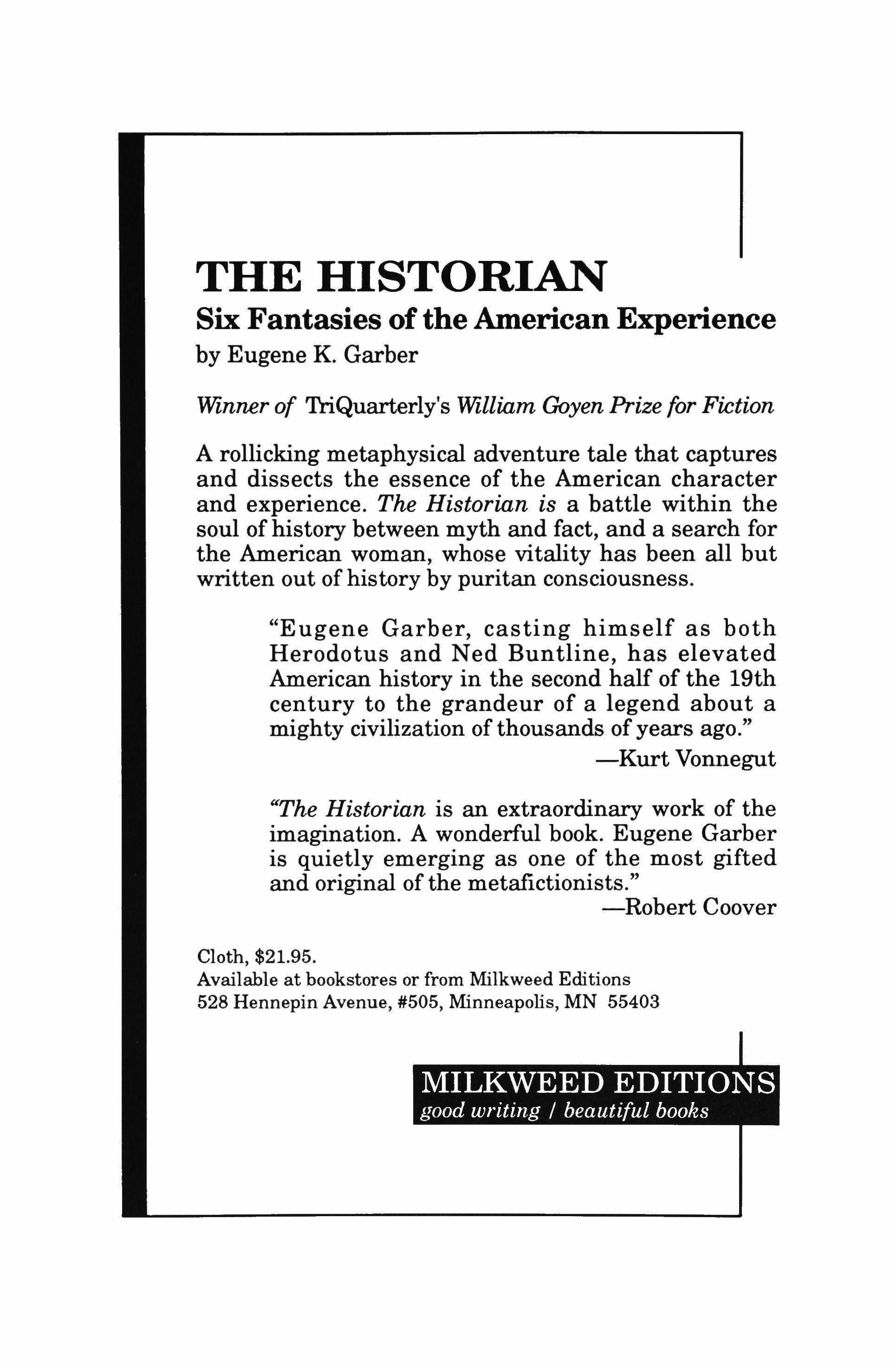
Cloth, $21.95.
Available at bookstores or from Milkweed Editions 528 Hennepin Avenue, #505, Minneapolis, MN 55403
MILKWEED EDITIONS good writing / beautiful books
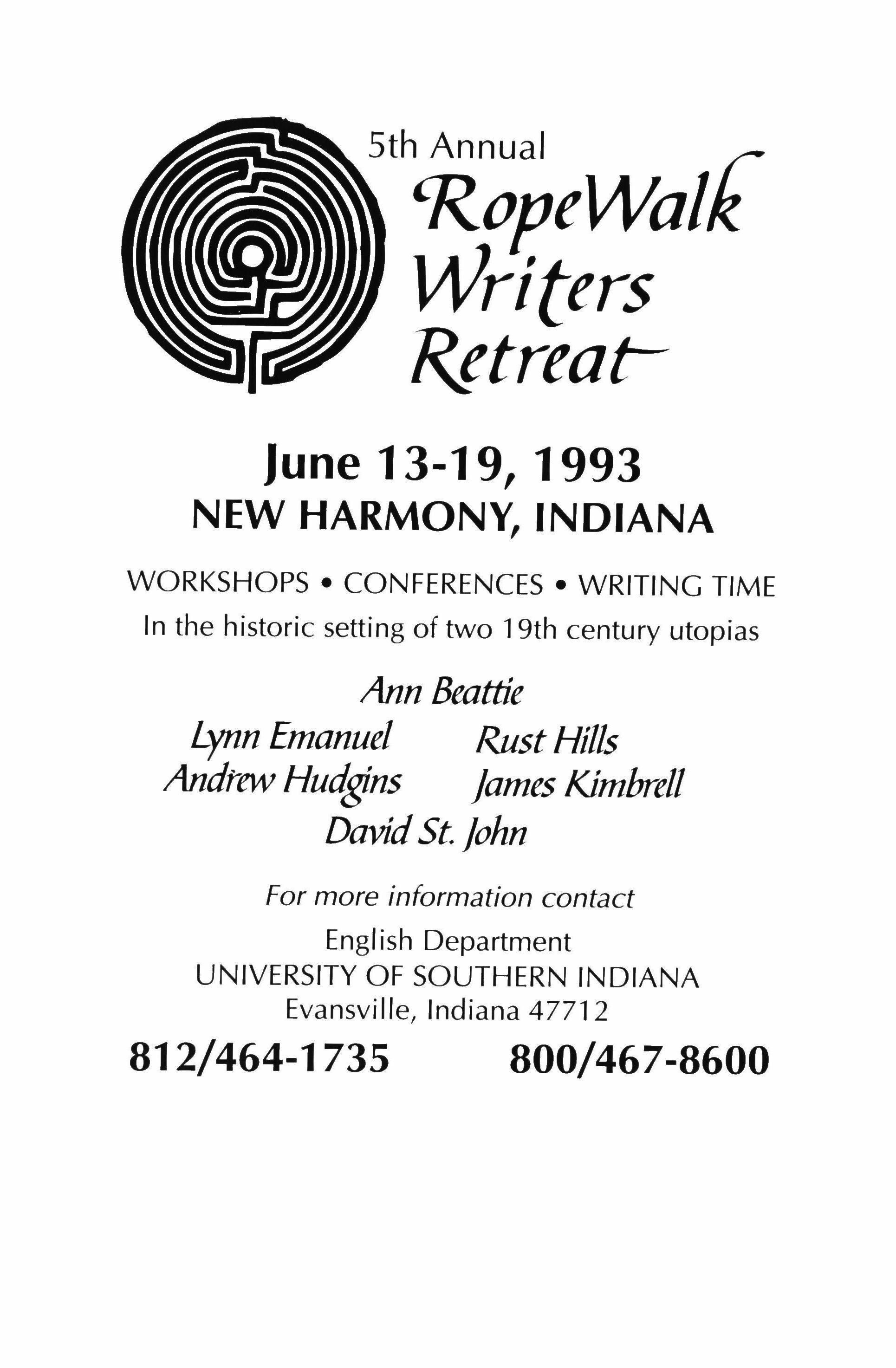
5th!R�;'eWal[ Writers Ritreat= June 13-19,1993 NEW HARMONY, INDIANA WORKSHOPS • CONFERENCES WRITING TIME In the historic setting of two 19th century utopias Ann Beattie Lynn Emanuel Rust Hills Andrew Hud�ns James Kimbrell DavidSt John For more information contact Engl ish Department UNIVERSITY OF SOUTHERN INDIANA Evansville, Indiana 47712 812/464-1735 800/467-8600
Harriet Rubin's Mother's Wooden Hand
Susan Hahn
Harriet Rubin s Mothers Wooden
Hand is a superb book, passionate and moving, yet put together with considerable elegance and control. found it gripping and consistently involving. A very remarkable first book."-Frank Bidort
Paper $8.95 9b pages
Cloth $22.00
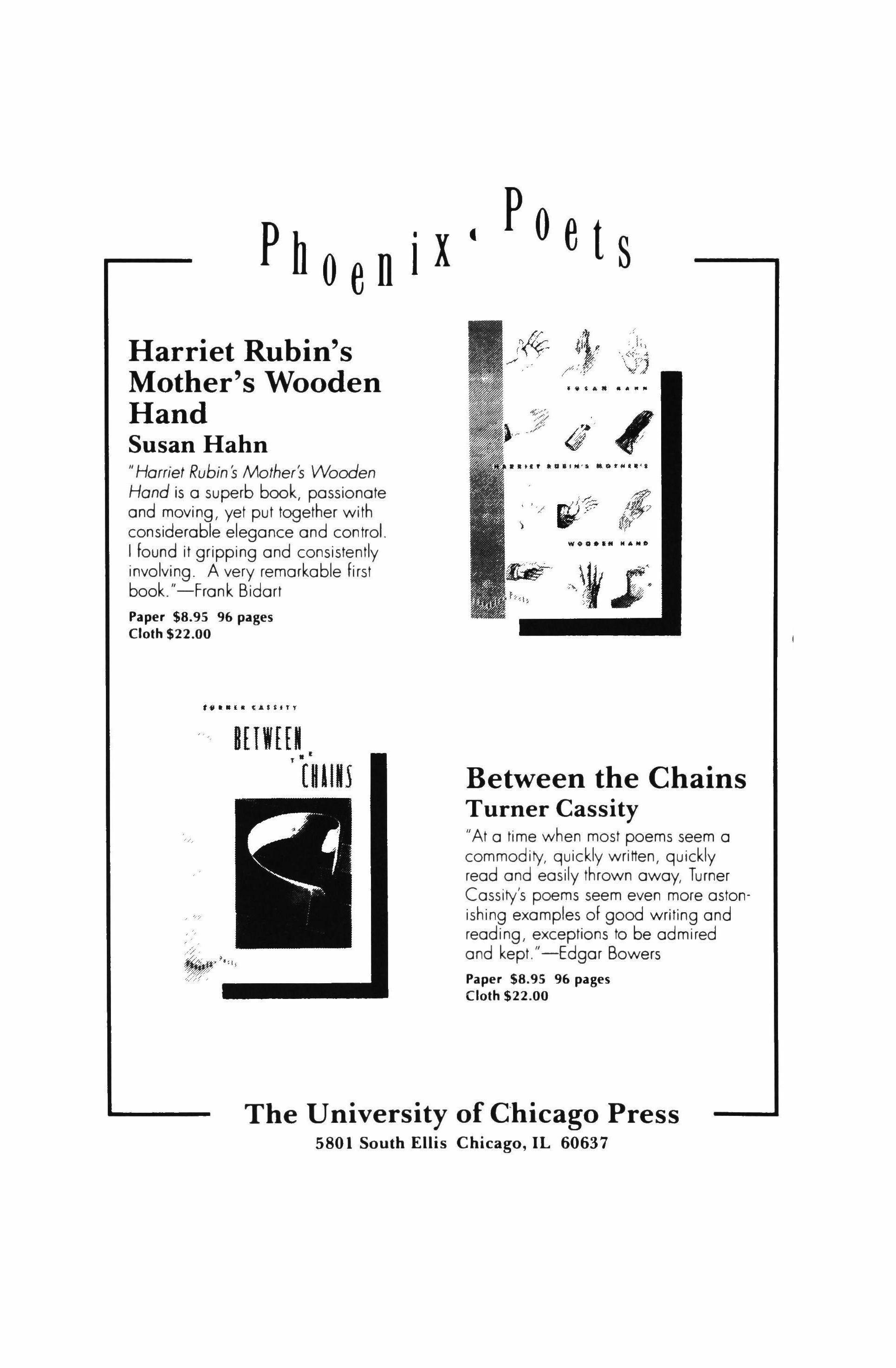
Between the Chains Turner Cassity
"At a time when most poems seem a commodity, quickly written, quickly read and easily thrown away, Turner Cassity's poems seem even more aston' ishing examples of good writing and reading, exceptions to be admired and kept."-Edgar Bowers
Paper $8.9S 96 pages
Cloth $22.00
RUIHI 'fuIIIS
The University of Chicago Press 5801 South Ellis Chicago,IL 60637
MID-AMERICAN REV lEW
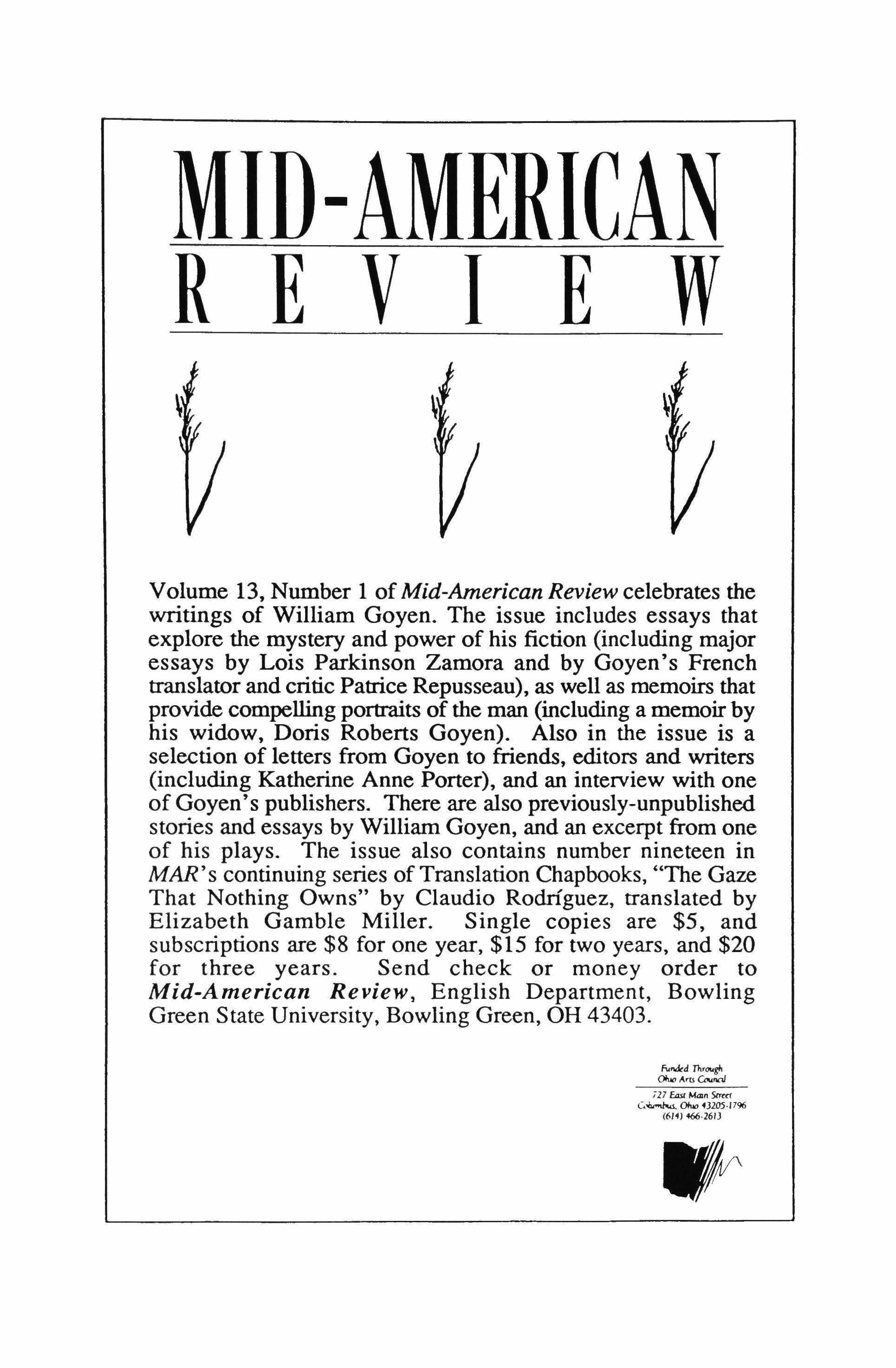
Volume 13, Number 1 of Mid-American Review celebrates the writings of William Goyen. The issue includes essays that explore the mystery and power of his fiction (including major essays by Lois Parkinson Zamora and by Goyen's French translator and critic Patrice Repusseau), as well as memoirs that provide compelling portraits of the man (including a memoir by his widow, Doris Roberts Goyen). Also in the issue is a selection of letters from Goyen to friends, editors and writers (including Katherine Anne Porter), and an interview with one of Goyen' s publishers. There are also previously-unpublished stories and essays by William Goyen, and an excerpt from one of his plays. The issue also contains number nineteen in MAR's continuing series of Translation Chapbooks, "The Gaze That Nothing Owns" by Claudio Rodriguez, translated by Elizabeth Gamble Miller. Single copies are $5, and subscriptions are $8 for one year, $15 for two years, and $20 for three years. Send check or money order to Mid-American Review, English Department, Bowling Green State University, Bowling Green, OR 43403.
Fvodtd Th, gIo OfuoArts� i17 Eml MaIn 5mct c.� Ofuo 0205·1796 (611,466·26IJ
PRAISE FOR THE NATIONAL BESTSELLER BY NORMAN MACLEAN
YOUNG MEN
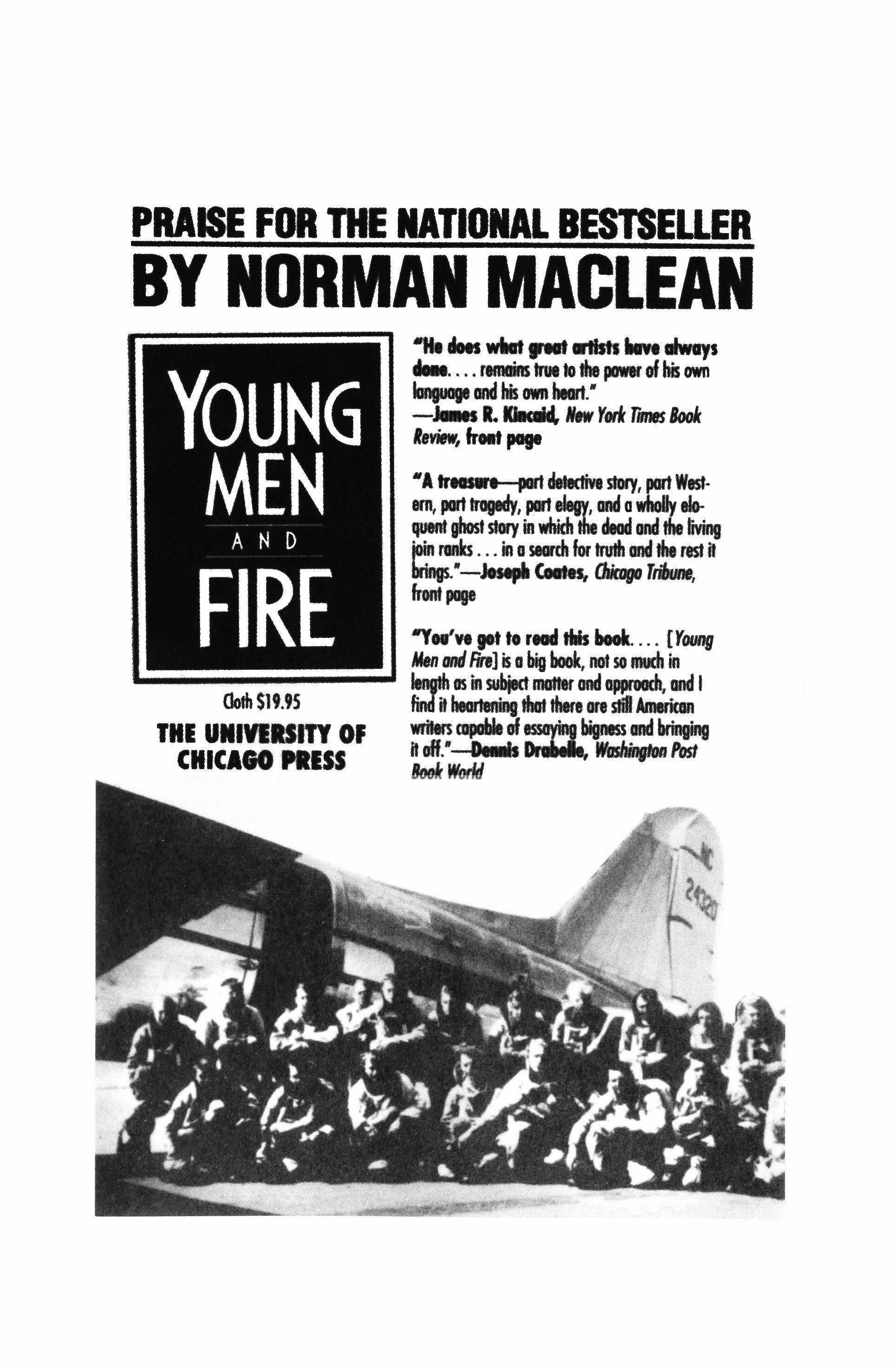
....... ..., always remains lnIe to the power ofhis own languageand lis OWR heart. - R. ....... IItw Y«k ftmflS BooIr fe� tpage
A Ir.... partdeIedive stoIy, partWest· ern, part1rOgedy, partefeay, and Q wholly e1oquent ghoststory in wmcftLedeadandtheliving joinranks in a 5IGrthfor truth ancIthe rest it brings. -Joseph c.tu, l1iaJgo r"""', front page
..,,,'" get to r_ tills W [Young MIn omJfire] is a bigbook, not so much in ------... Ienath as in SU.b;ectma1t8r.anti.appraadl.ODd. I
Cloth S19.9S WitIteammiDgthatthere are stiliAmeriam THE U.IRISIn OF ::!"-::.�=.,�� CHICAGO PlESS w w
AND
FIRE
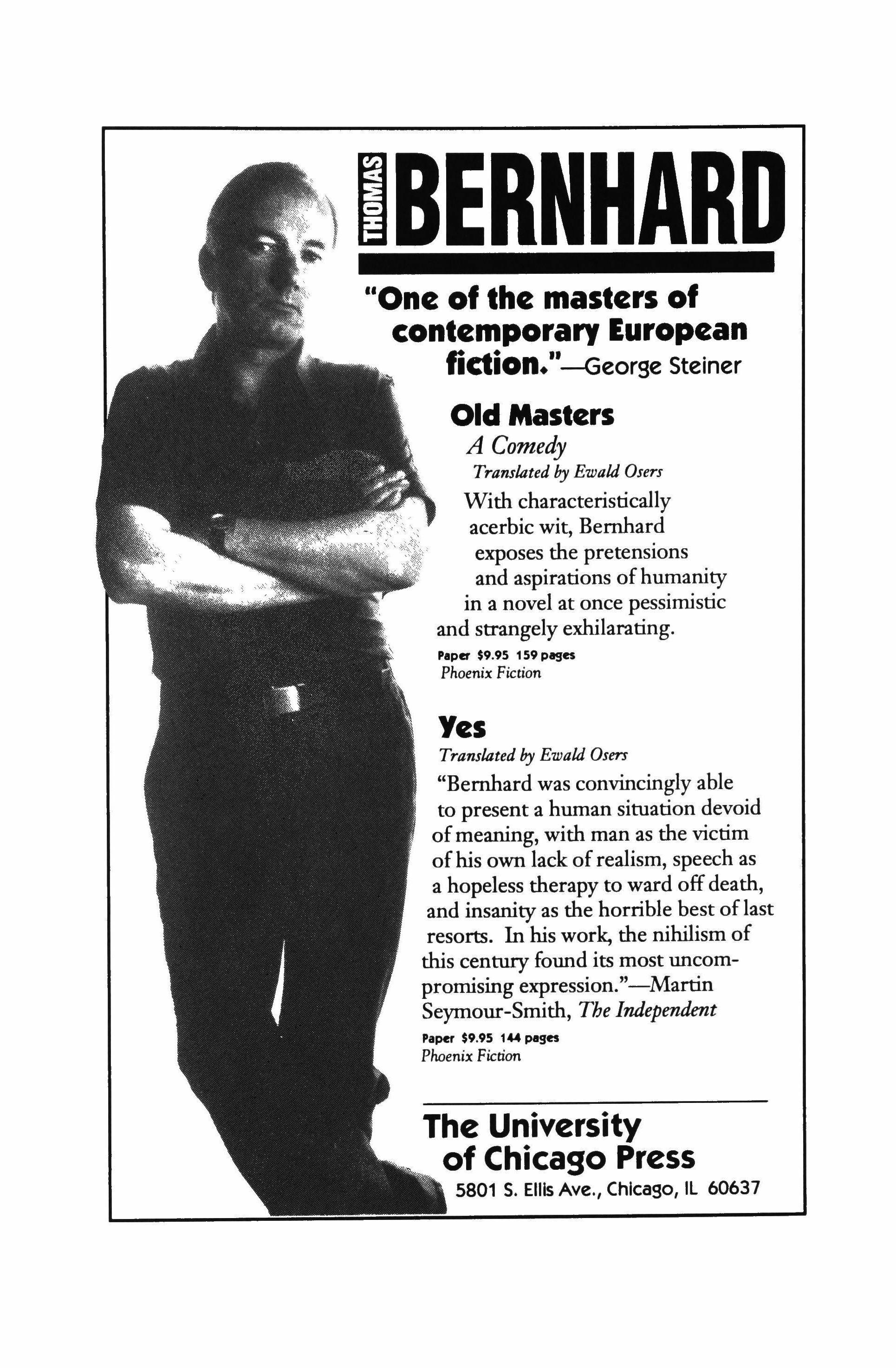
') IBERNHARD
"One of the masters of contemporary European fid· II Ion. -George Steiner
Old Masters
A Comedy
Translated by Ewald Osers
With characteristically acerbic wit, Bernhard exposes the pretensions and aspirations ofhumanity in a novel at once pessimistic and strangely exhilarating.
Paper $9.95 159 pages
Phoenix Fiction
Yes
Translated by Ewald Osers
"Bernhard was convincingly able to present a human situation devoid ofmeaning, with man as the victim ofhis own lack ofrealism, speech as a hopeless therapy to ward offdeath, and insanity as the horrible best of last resorts. In his work, the nihilism of this century found its most uncompromising expression."-Martin Seymour-Smith, The Independent
Paper $9.95 144 pages
Phoenix Fiction
of Chicago Press 5801 S. Ellis Ave., Chicago, IL 60637
The University
The 'Boston ,%l'iC!u' is pleased to announce its first annual
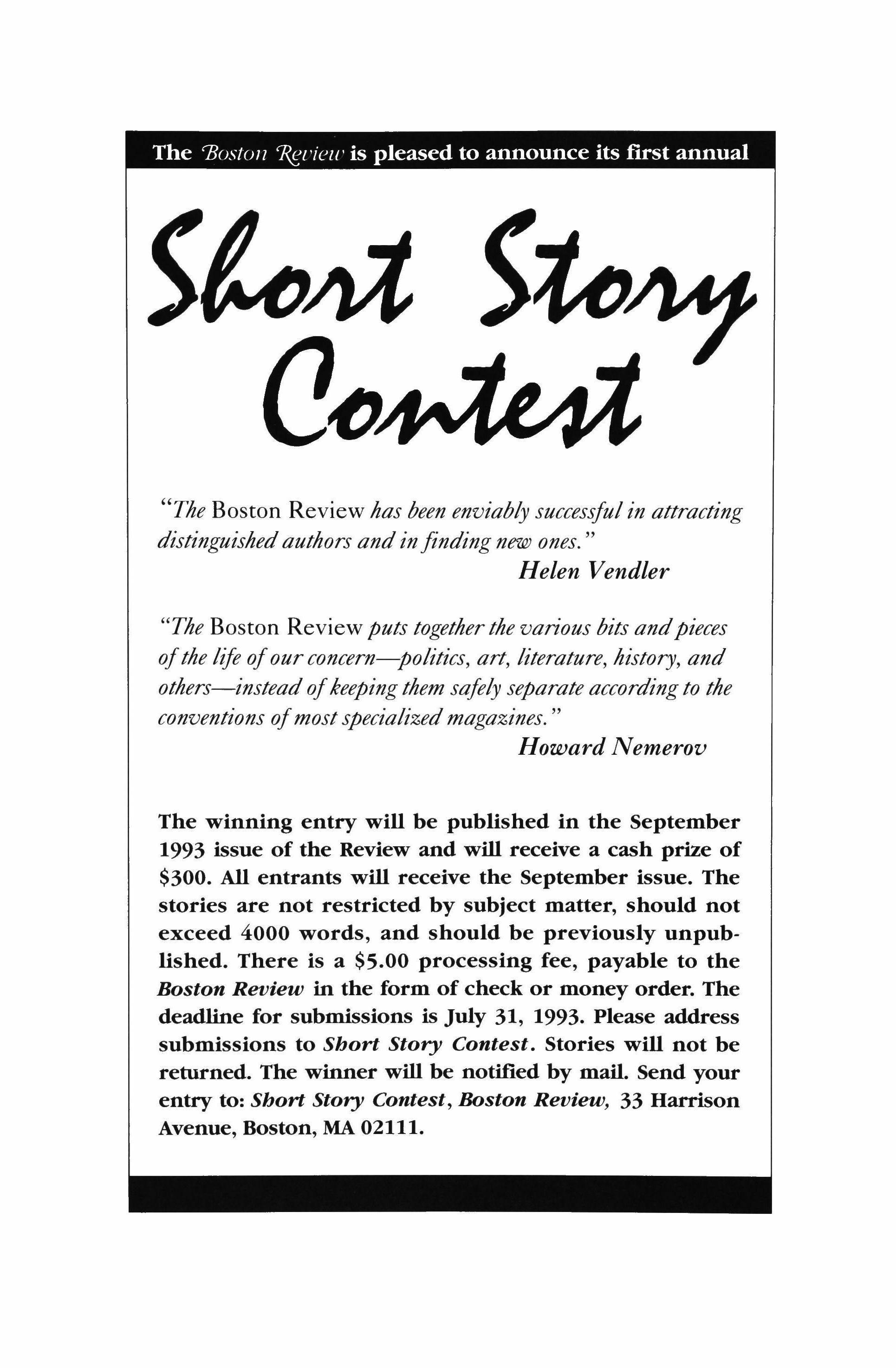
"The Boston Review has been enviably successful in attracting distinguishedauthors and infinding new ones.
Helen Vendler
"The Boston Review puts togetherthe various bits andpieces ofthe life of our concern-politics, art, literature, history, and others-instead ofkeeping them safely separate according to the conventions ofmost specializedmagazines.
Howard Nemerov
The winning entry will be published in the September 1993 issue of the Review and will receive a cash prize of $300. All entrants will receive the September issue. The stories are not restricted by subject matter, should not exceed 4000 words, and should be previously unpublished. There is a $5.00 processing fee, payable to the Boston Review in the form of check or money order. The deadline for submissions is July 31, 1993. Please address submissions to Short Story Contest. Stories will not be returned. The winner will be notified by mail. Send your entry to: Short Story Contest, Boston Review, 33 Harrison Avenue, Boston, MA 02111.
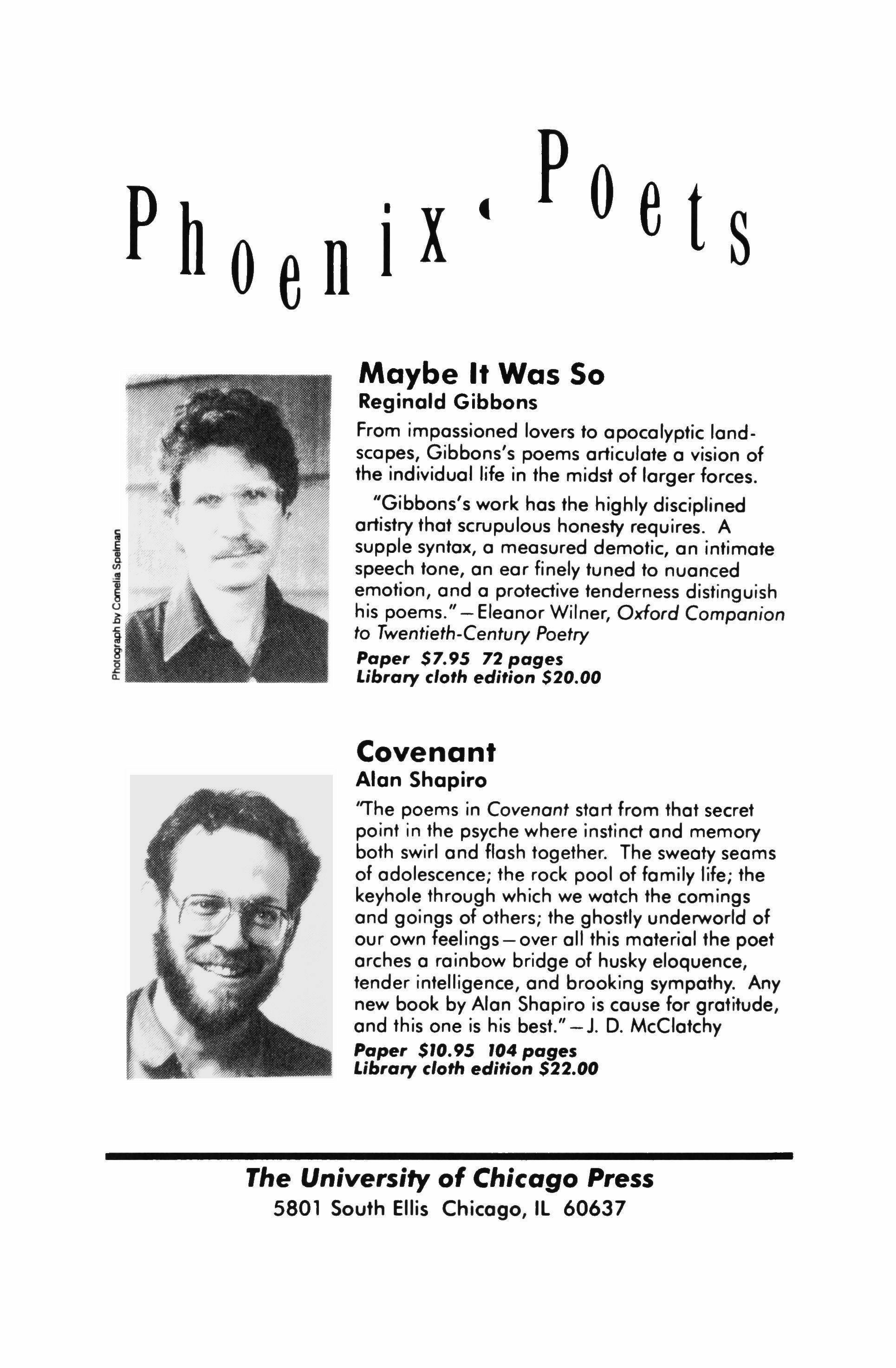
Maybe It Was So Reginald Gibbons
From impassioned lovers to apocalyptic landscapes, Gibbons's poems articulate a vision of the individual life in the midst of larger forces.
"Gibbons's work has the highly disciplined artistry that scrupulous honesty requires. A supple syntax, a measured demotic, an intimate speech tone, an ear finely tuned to nuanced emotion, and a protective tenderness distinguish his poems." - Eleanor Wilner, Oxford Companion to Twentieth-Century Poetry
Paper 57.95 72 pages
Library doth edition 520.00
Covenant
Alan Shapiro
''The poems in Covenant start from that secret point in the psyche where instinct and memory both swirl and flash together. The sweaty seams of adolescence; the rock pool of family life; the keyhole through which we watch the comings and goings of others; the ghostly underworld of our own feelings-over all this material the poet arches a rainbow bridge of husky eloquence, tender intelligence, and brooking sympathy. Any new book by Alan Shapiro is cause for gratitude, and this one is his best." -J. D. McClatchy
Paper 5'0.95 '04 pages
Library doth edition 522.00
f
The University of Chicago Press 5801 South Ellis Chicago,IL 60637
Louisiana Literature
is a interesting and attractive journal featuring fiction and poetry, as well as essays, book reviews, and interviews, covering the categories of art, history, and culture. The magazine is published twice a year, spring and fall. For a year's subscription, rates are $10 for individuals and $12.50 for institutions. Fill in the form below or send your address to:
Louisiana Literature Box 792
Southeastern Louisiana University Hammond, LA 70402

Name:
Address:
Recently published in Louisiana Literature:
Catharine Savage Brosman
Maxine Cassin
Kelly Cherry
Kate Daniels
Louis Gallo
Lee Meitzen Grue
Rodger Kamenetz
Supported
Pinkie Gordon Lane
Jo McDougall
Sue Owen
Kalamu ya Salaam
Lewis P. Simpson
Katherine Soniat
Diane Wakoski
grants from the Louisiana Endowment for the Humanities, the Louisiana State Arts Counci! and the National Endowment for the Arts.
by
Ad Blasts from the Past An American Scrapbook
Over 210 treasures from the golden-olden age of American print advertising (1788-1925), 198 pages, compiled by Bob Perlongo, $14 (includes postage), from: Fat Angel Press, 820 Reba Pl., Evanston, IL 60202.
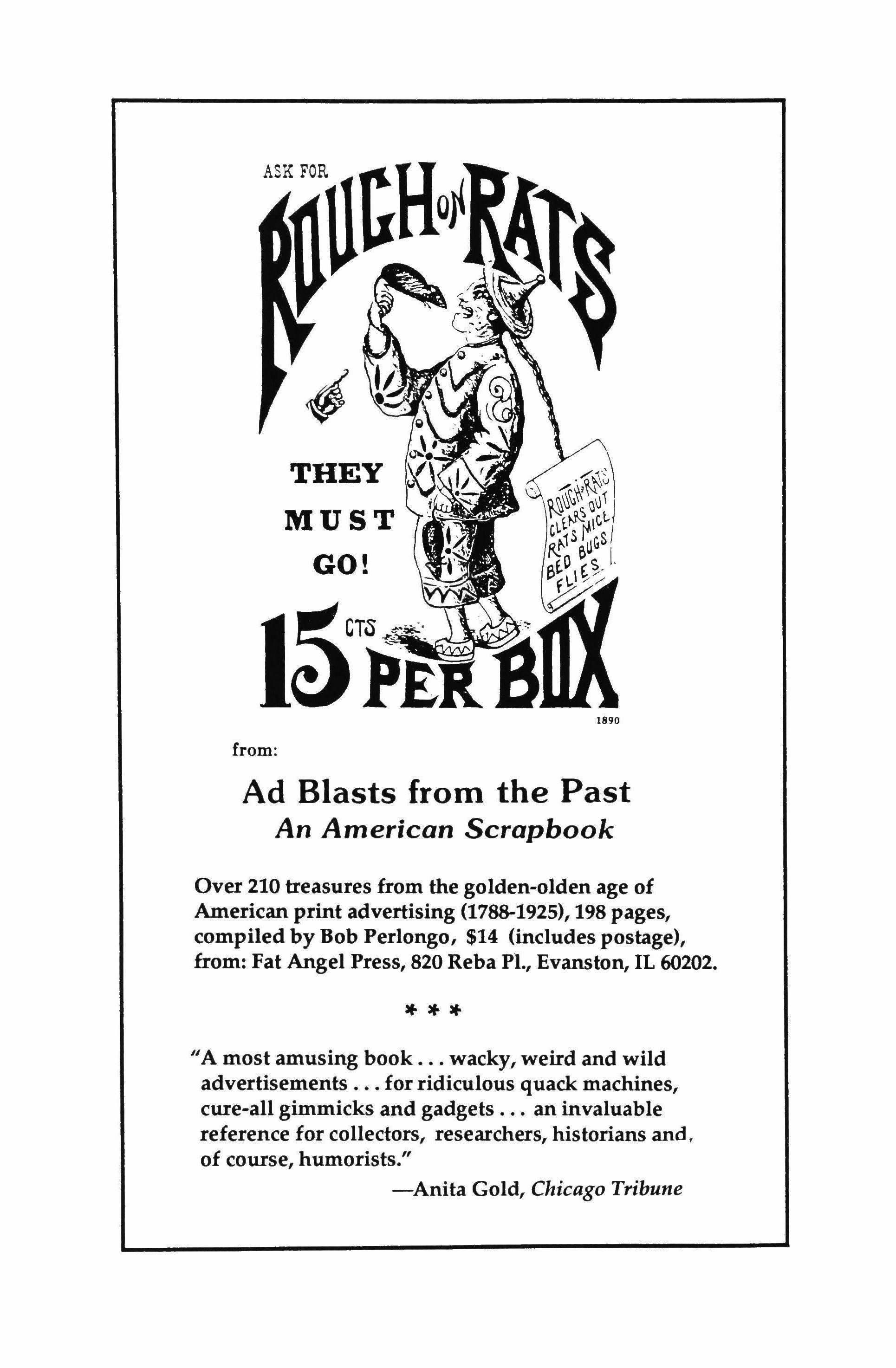
"A most amusing book wacky, weird and wild advertisements .•. for ridiculous quack machines, cure-all gimmicks and gadgets an invaluable reference for collectors, researchers, historians and, of course, humorists."
-Anita
Gold, Chicago Tribune
THEY
1890 from:
MUST GO!
***
COLUMBIA A
Magazine of Poetry & Prose
Poetry· Fiction· Essays Interviews
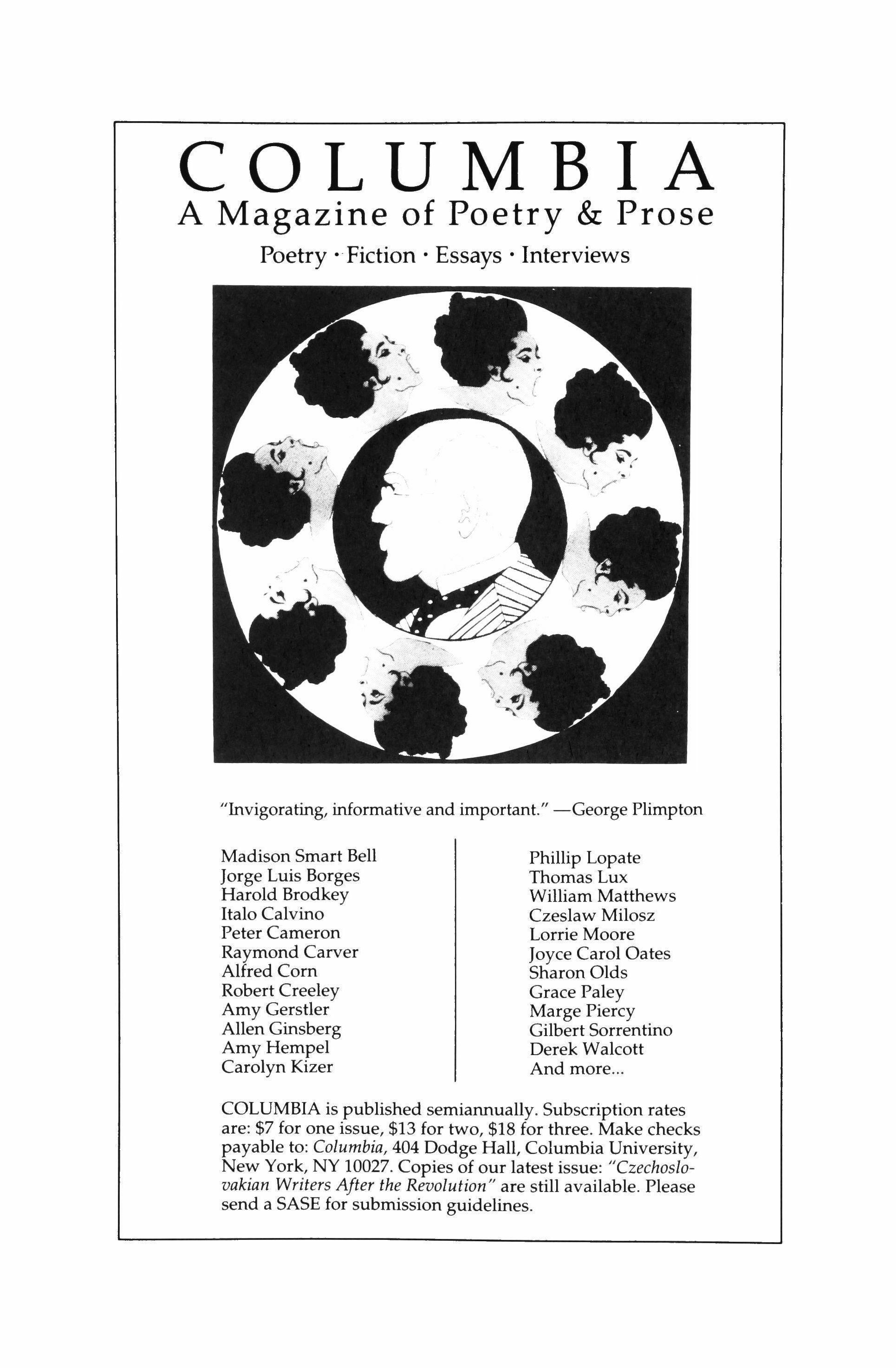
"Invigorating, informative and important." -George Plimpton
Madison Smart Bell
Jorge Luis Borges
Harold Brodkey
Italo Calvino
Peter Cameron
Raymond Carver
Alfred Corn
Robert Creeley
Amy Gerstler
Allen Ginsberg
Amy Hempel
Carolyn Kizer
Phillip Lopate
Thomas Lux
William Matthews
Czeslaw Milosz
Lorrie Moore
Joyce Carol Oates
Sharon Olds
Grace Paley
Marge Piercy
Gilbert Sorrentino
Derek Walcott
And more
COLUMBIA is published semiannually. Subscription rates are: $7 for one issue, $13 for two, $18 for three. Make checks payable to: Columbia, 404 Dodge Hall, Columbia University, New York, NY 10027. Copies of our latest issue: "Czechoslovakian Writers After the Revolution" are still available. Please send a SASE for submission guidelines.
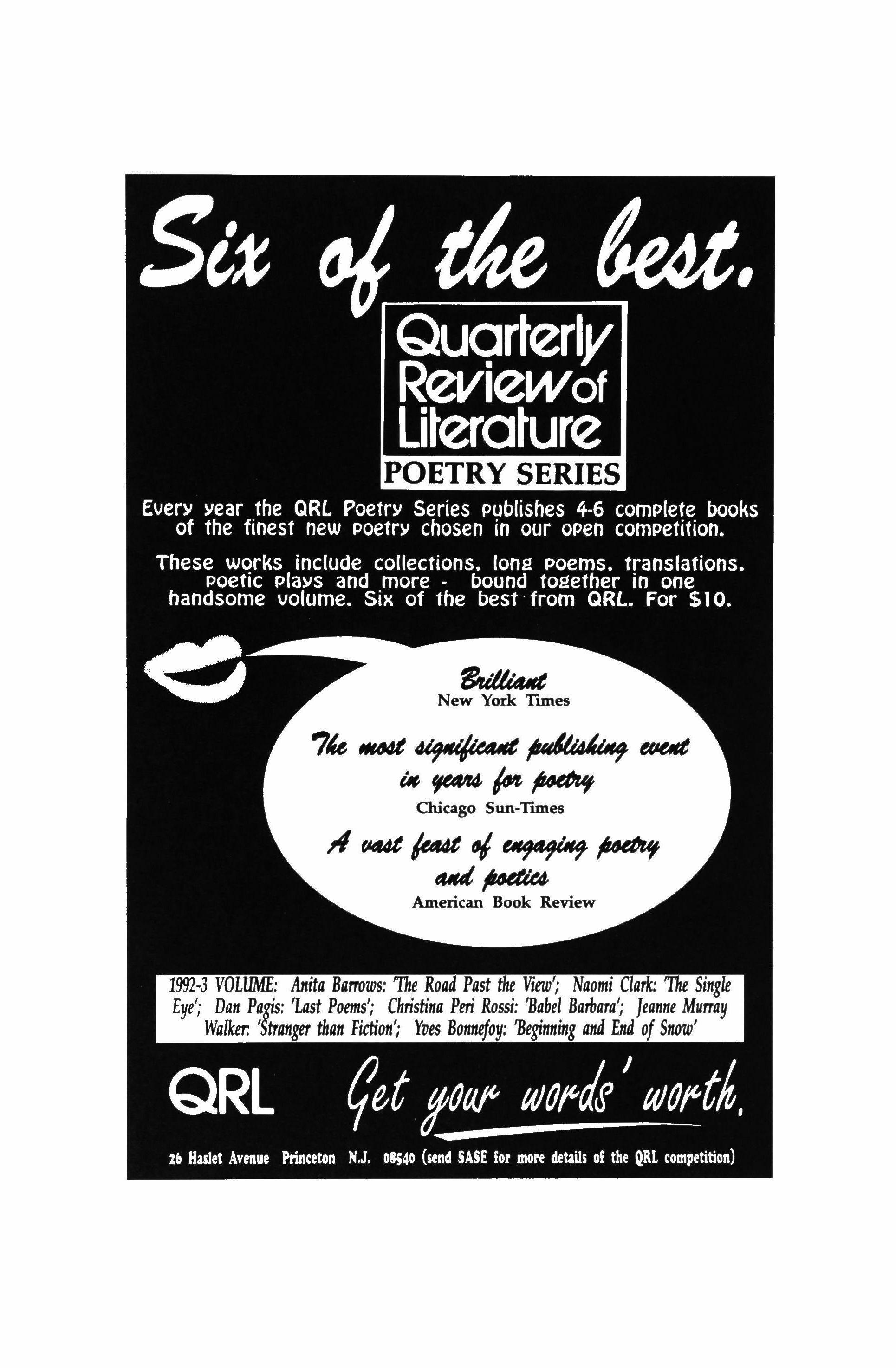
New York
71e III44t '�'" pJ/I4"", tNeItt III � /14 fl4dvf Chicago Sun-Times A fI44t /eMt " "'�9'''' fl4dvf � �etle4 American Book Review
Times
SHENANDOAH
THE WASHINGTON AND LEE UNIVERSITY REVIEW
"Full of fictional, critical, poetic and biographical splendor." - The New York Times Book Review
"The best literary magazines have always endeavored to discover, accommodate, and sustain good writing Shenandoah does all three." - Booklist
"A showcase for exceptional writing." - The Washington Post
AMONG OUR PAST CONTRIBUTORS:
Alice Adams
W. H. Auden
John Berryman
Philip Dacey
James Dickey
William Faulkner
Jorie Graham
Seamus Heaney
John Hersey
Conrad Hilberry
Daniel Hoffman
William Hoffman
Maxine Kumin
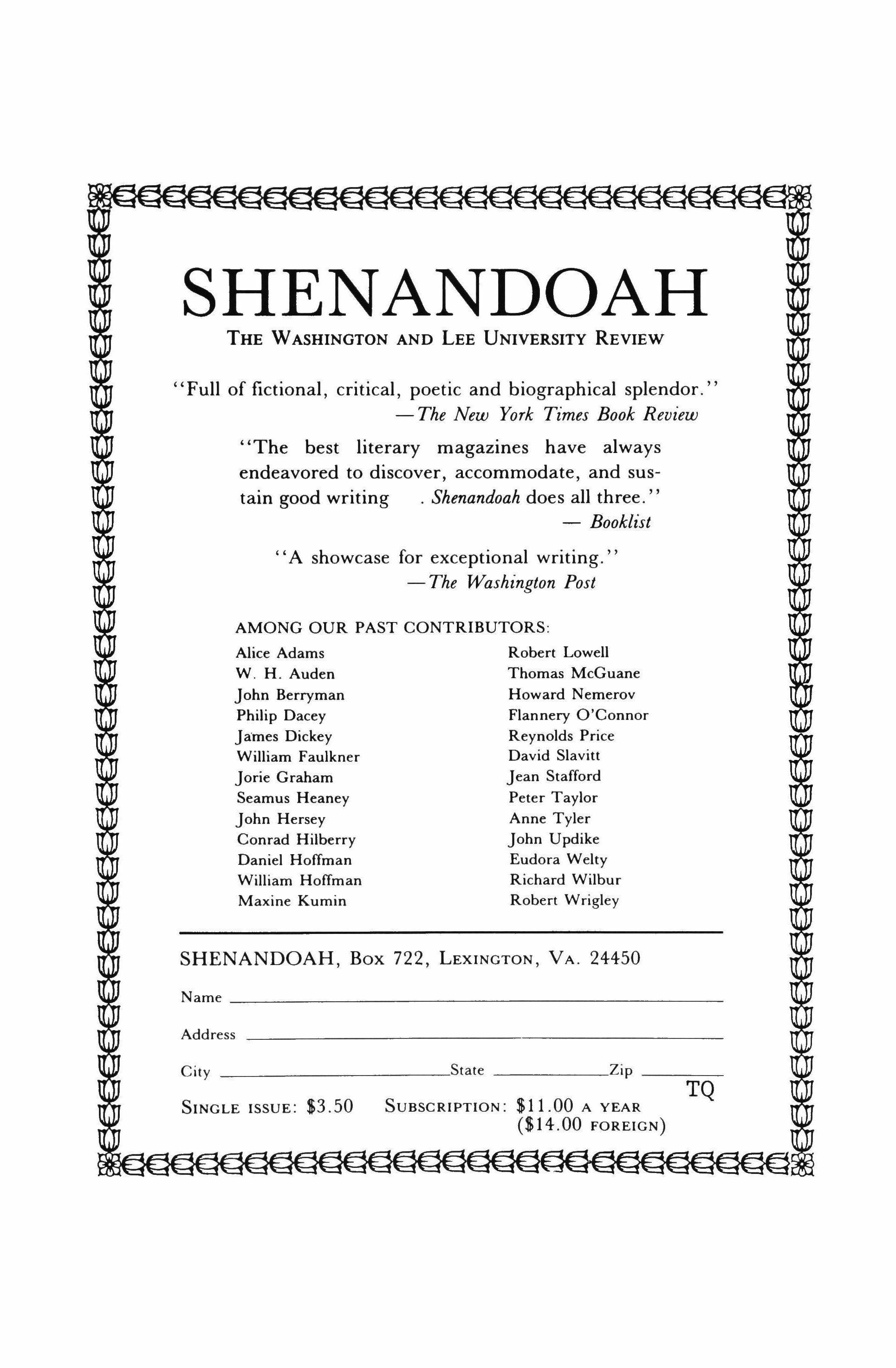
Robert Lowell
Thomas McGuane
Howard Nemerov
Flannery O'Connor
Reynolds Price
David Slavitt
Jean Stafford
Peter Taylor
Anne Tyler
John Updike
Eudora Welty
Richard Wilbur
Robert Wrigley
SHENANDOAH, Box 722, LEXINGTON VA. 24450
Name
Address
City State Zip
SINGLE ISSUE: $3.50 SUBSCRIPTION: $11.00 A YEAR ($14.00 FOREIGN) TQ
the modern writer as witness
IIlallill
Autobiography
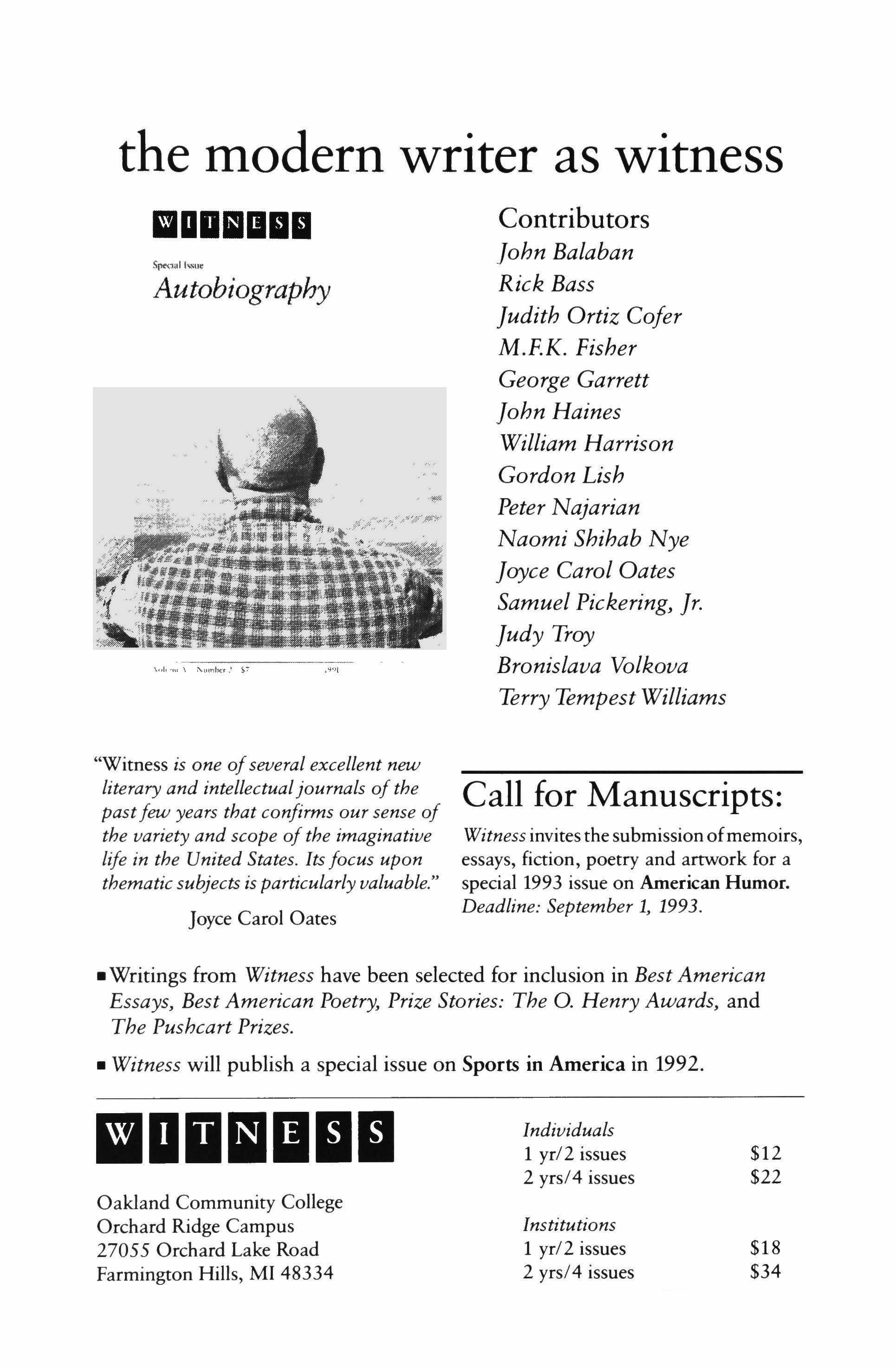
"Witness is one ofseveral excellent new literary and intellectualjournals of the pastfew years that confirms our sense of the variety and scope of the imaginative life in the United States. Its focus upon thematic subjects is particularly valuable."
Joyce Carol Oates
Contributors
John Balaban
Rick Bass
Judith Ortiz Cofer
M.F.K. Fisher
George Garrett
John Haines
William Harrison
Gordon Lish
Peter Najarian
Naomi Shihab Nye
Joyce Carol Oates
Samuel Pickering, Jr.
Judy Troy
Bronislava Volkova
Terry Tempest Williams
Call for Manuscripts:
Witness invites the submission ofmemoirs, essays, fiction, poetry and artwork for a special 1993 issue on American Humor. Deadline: September 1, 1993.
Writings from Witness have been selected for inclusion in Best American Essays, Best American Poetry, Prize Stories: The 0. Henry Awards, and The Pushcart Prizes
• Witness will publish a special issue on Sports in America in 1992.
1111111111 Oakland Community College Orchard Ridge Campus 27055 Orchard Lake Road Farmington Hills, MI 48334 Individuals 1 yr/2 issues 2 yrs/4 issues $12 $22 Institutions 1 yrl2 issues 2 yrs/4 issues $18 $34
STORIES by
Melissa Boyce
Phil Condon
Maria Amparo
Escandon
Yasunari Kawabata
John Keeble
Margot Livesey
Stephen Peters

$6.45 current issue
$20 one year
$35 two years
$46 three years
Prairie Schooner
POEMS by Karen Alkalay-Gut
Carol Frost
Brendan Galvin
Linda Hasselstrom
Mark Jarman
Dabney Stuart
EXCERPT from Ursula Hegi's new novel
The Salt Dancers
AN ESSAY by Sydney Lea
SPECIAL ISSUES
Czech & Slovak writing ('92)
Canadian women writers ('93)
201 Andrews Hall U. of Nebraska Po. Box 880334 Lincoln, NE 68588 (402) 472-3191 and much morecall or write for your subscription
IT WAS FEVER THAT MADE THE WORLD
Jim Powell
"His title burns away everywhere in the volume, in the fevers of eros, divination, memory, destruction, and grief. Page for page, there is more sheer fine, clear, yet syntactically subtle and metaphorically gorgeous writing in Powell than I
have seen in some time."
- Mary Kinzie
Paper S8.95 88 pages Cloth S20.00
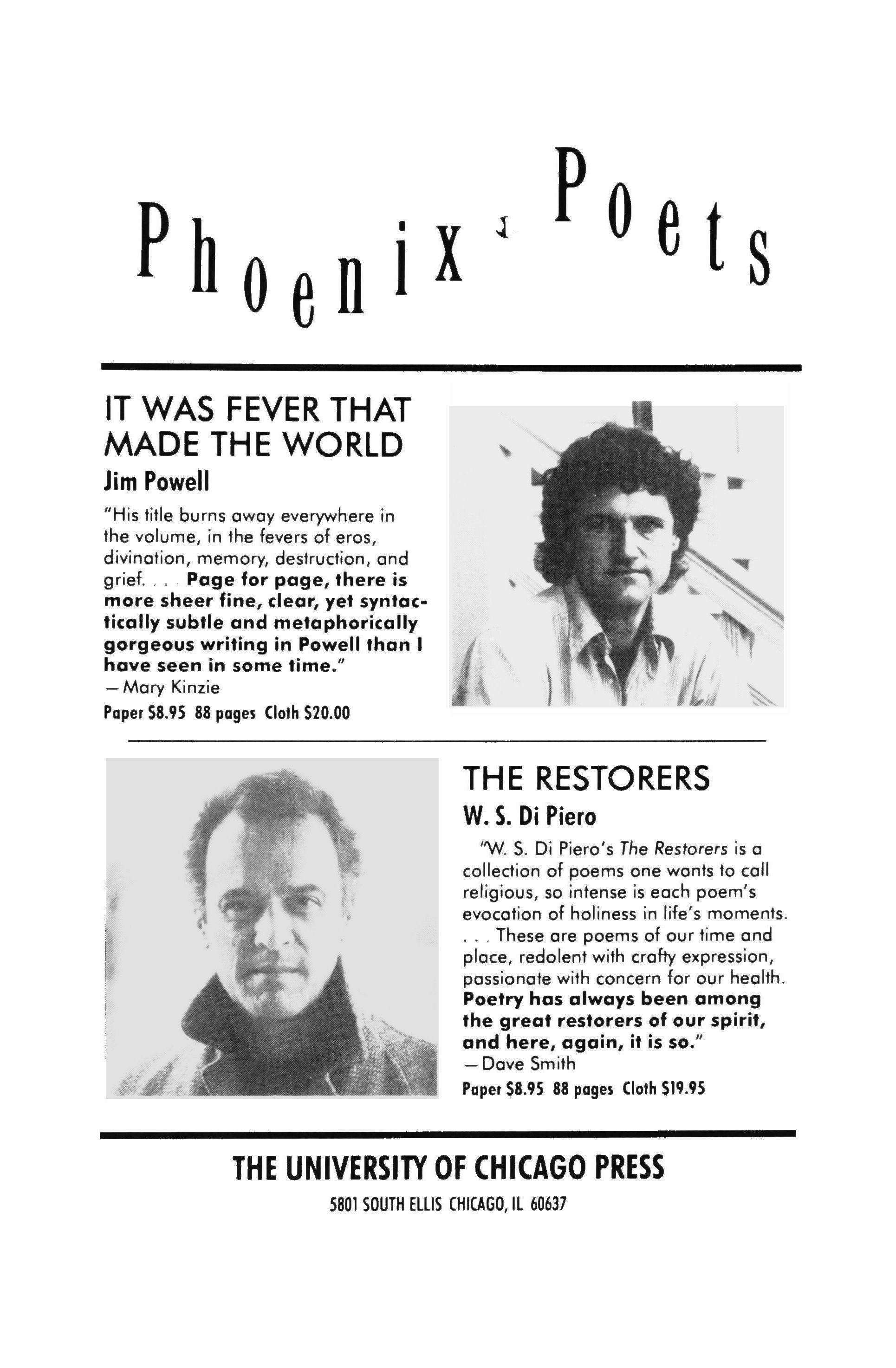
THE RESTORERS
W. S. Di Piero
''W. S. Di Piero's The Restorers is a collection of poems one wants to call religious, so intense is each poem's evocation of holiness in life's moments. These are poems of our time and place, redolent with crafty expression, passionate with concern for our health. Poetry has always been among the great restorers of our spirit, and here, again, it is so."
- Dave Smith
Paper S8.95 88 pages Cloth S19.95
i
",I.,'f.. ",
'i\
�
THE UNIVERSITY OF CHICAGO PRESS 5801 SOUTH ELLIS CHICAGO,IL 60637
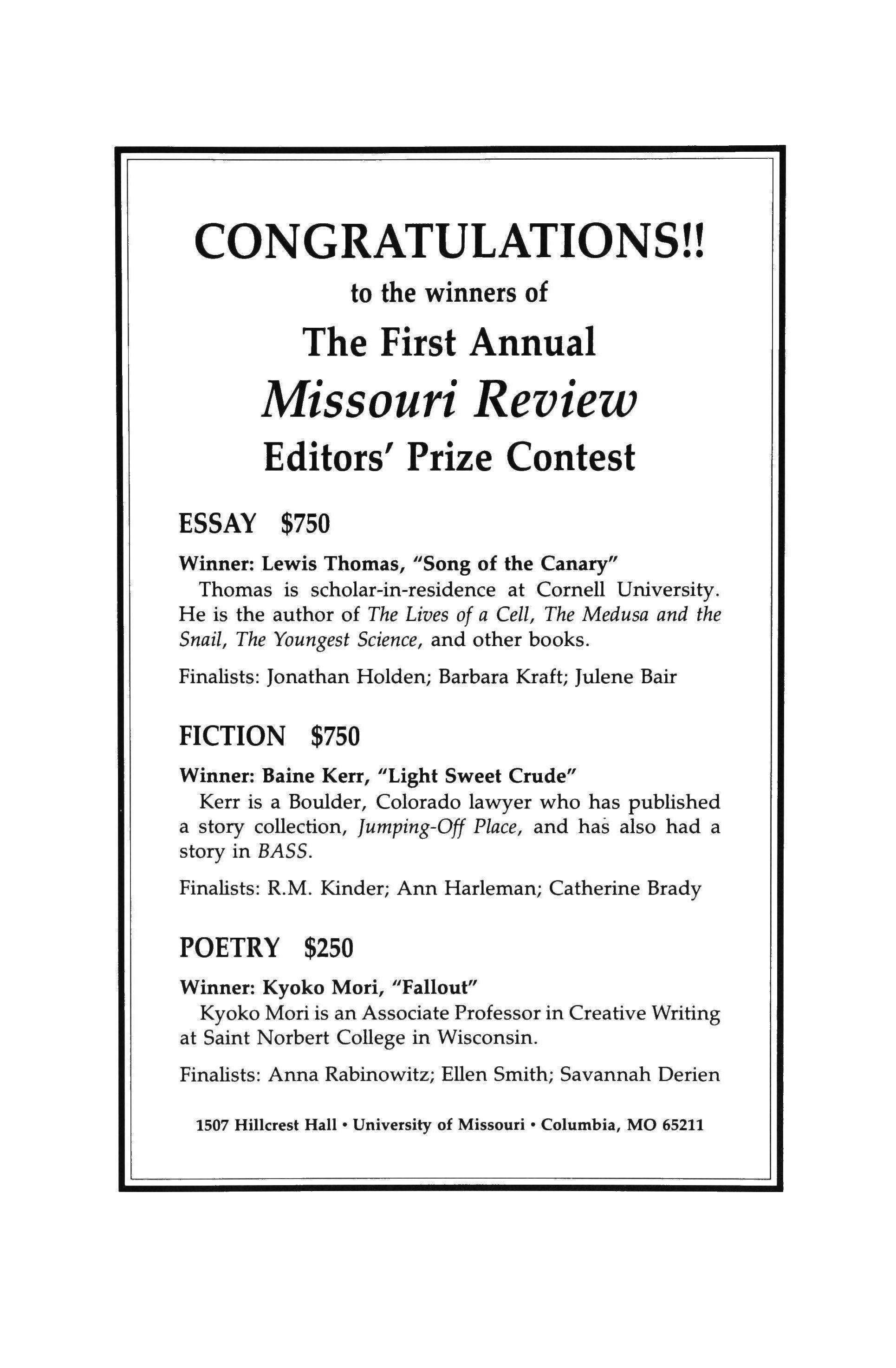
CONGRATULATIONS!!
to the winners of The First Annual Missouri Review
Editors' Prize Contest
ESSAY $750
Winner: Lewis Thomas, "Song of the Canary" Thomas is scholar-in-residence at Cornell University. He is the author of The Lives of a Cell, The Medusa and the Snail, The Youngest Science, and other books.
Finalists: Jonathan Holden; Barbara Kraft; [ulene Bair
FICTION $750
Winner: Baine Kerr, "Light Sweet Crude" Kerr is a Boulder, Colorado lawyer who has published a story collection, Jumping-Off Place, and has also had a story in BASS.
Finalists: R.M. Kinder; Ann Harleman; Catherine Brady
POETRY $250
Winner: Kyoko Mori, "Fallout" Kyoko Mori is an Associate Professor in Creative Writing at Saint Norbert College in Wisconsin.
Finalists: Anna Rabinowitz; Ellen Smith; Savannah Derien 1507 Hillcrest Hall· University of Missouri· Columbia, MO 65211
Where you can still hear people thinking for themselves
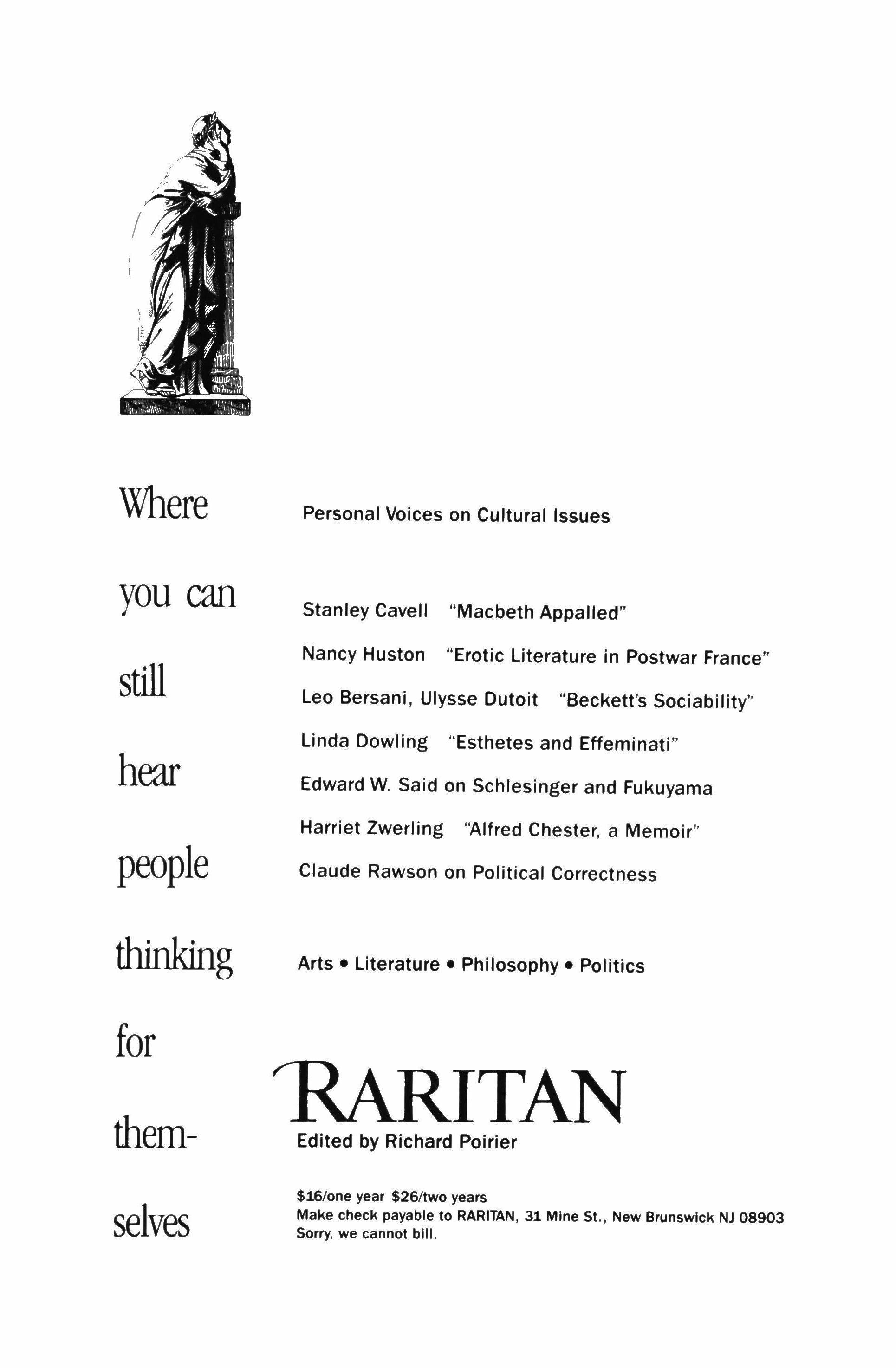
Personal Voices on Cultural Issues
Stanley Cavell "Macbeth Appalled"
Nancy Huston "Erotic Literature in Postwar France"
Leo Bersani, Ulysse Dutoit "Beckett's Sociability"
Linda Dowling "Esthetes and Effeminati"
Edward W. Said on Schlesinger and Fukuyama
Harriet Zwerling "Alfred Chester, a Memoir"
Claude Rawson on Political Correctness
Arts. Literature. Philosophy • Politics
�ITAN
Edited by Richard Poirier
Make check payable to RARITAN, 31 Mine St., New Brunswick NJ 08903
bill.
$16/one year $26/two years
Sorry, we cannot
TriQuarterly thanks the following life subscribers:
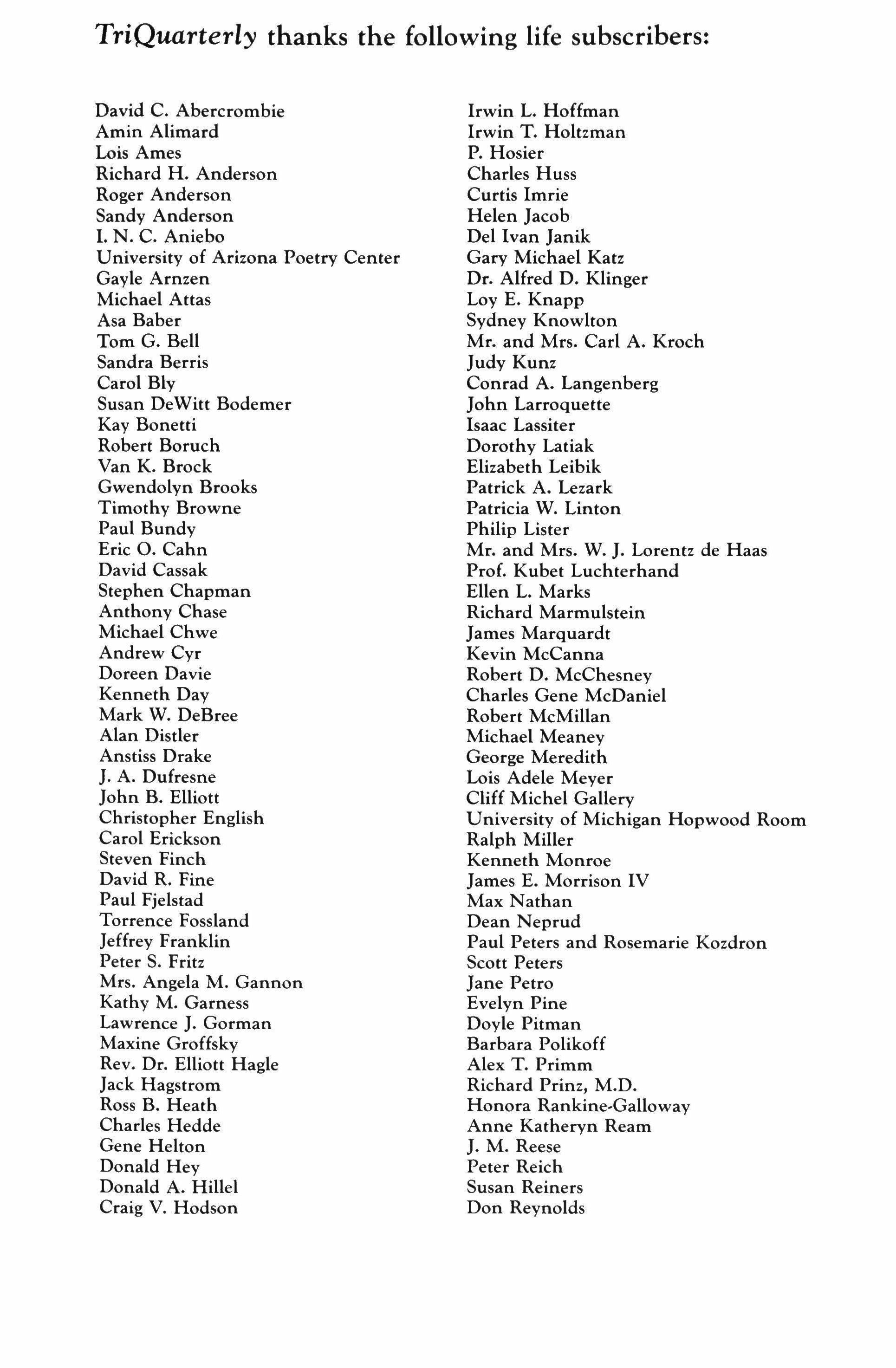
David C. Abercrombie
Amin Alimard
Lois Ames
Richard H. Anderson
Roger Anderson
Sandy Anderson
1. N. C. Aniebo
University of Arizona Poetry Center
Gayle Arnzen
Michael Attas
Asa Baber
Tom G. Bell
Sandra Berris
Carol Bly
Susan DeWitt Bodemer
Kay Bonetti
Robert Boruch
Van K. Brock
Gwendolyn Brooks
Timothy Browne
Paul Bundy
Eric O. Cahn
David Cassak
Stephen Chapman
Anthony Chase
Michael Chwe
Andrew Cvr
Doreen Davie
Kenneth Day
Mark W. DeBree
Alan Distler
Anstiss Drake
J. A. Dufresne
John B. Elliott
Christopher English
Carol Erickson
Steven Finch
David R. Fine
Paul Fjelstad
Torrence Fossland
Jeffrey Franklin
Peter S. Fritz
Mrs. Angela M. Gannon
Kathy M. Garness
Lawrence J. Gorman
Maxine Groffsky
Rev. Dr. Elliott Hagle
Jack Hagstrom
Ross B. Heath
Charles Hedde
Gene Helton
Donald Hey
Donald A. Hillel
Craig V. Hodson
Irwin L. Hoffman
Irwin T. Holtzman
P. Hosier
Charles Huss
Curtis Imrie
Helen Jacob
Del Ivan Janik
Gary Michael Katz
Dr. Alfred D. Klinger
Loy E. Knapp
Sydney Knowlton
Mr. and Mrs. Carl A. Kroch
Judy Kunz
Conrad A. Langenberg
John Larroquette
Isaac Lassiter
Dorothy Latiak
Elizabeth Leibik
Patrick A. Lezark
Patricia W. Linton
Philip Lister
Mr. and Mrs. W. J. Lorentz de Haas
Prof. Kubet Luchterhand
Ellen L. Marks
Richard Marmulstein
James Marquardt
Kevin McCanna
Robert D. McChesney
Charles Gene McDaniel
Robert McMillan
Michael Meaney
George Meredith
Lois Adele Meyer
Cliff Michel Gallery
University of Michigan Hopwood Room
Ralph Miller
Kenneth Monroe
James E. Morrison IV
Max Nathan
Dean Neprud
Paul Peters and Rosemarie Kozdron
Scott Peters
Jane Petro
Evelyn Pine
Doyle Pitman
Barbara Polikoff
Alex T. Primm
Richard Prinz, M.D.
Honora Rankine-Galloway
Anne Katheryn Ream
J. M. Reese
Peter Reich
Susan Reiners
Don Reynolds
Christopher Richter
Diane Rider
Rivier College
Sam Rosenthal
Jim Rowe
Patricia Ruby
Joan Rybka
Joel Schilling, D.D.S.
Paul and June Schlueter, Ph.D.s
Mrs. H. C. Schmidt
Robert I. Schneideman
Hart Frank Schulz
Koji Seki
David A. Selby
Herbert Shore
John Silbersack
Martin Silverman
Gregory F. Smolarek
Dr. Wanda Sorgente
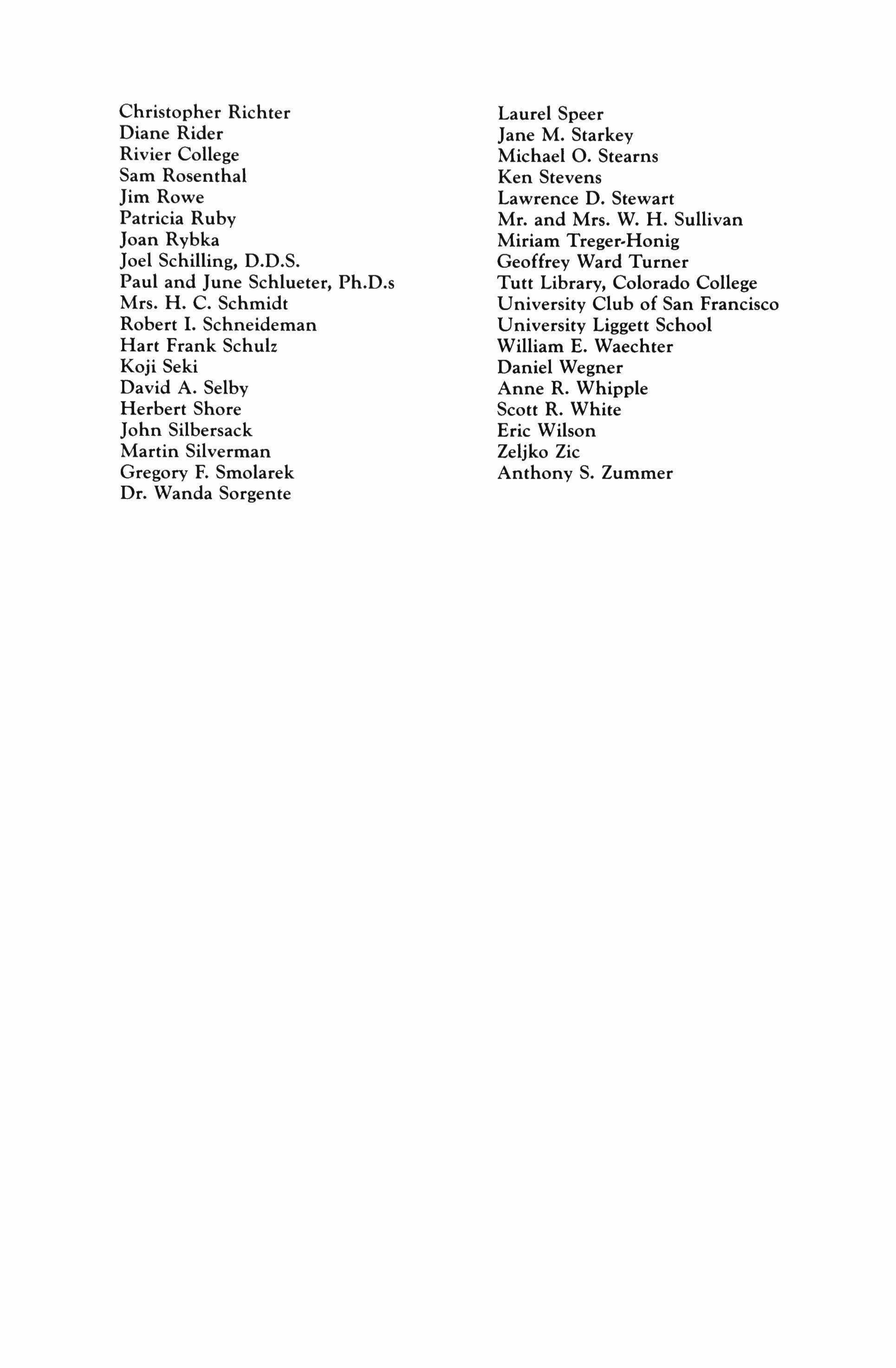
Laurel Speer
Jane M. Starkey
Michael O. Stearns
Ken Stevens
Lawrence D. Stewart
Mr. and Mrs. W. H. Sullivan
Miriam Treger-Honig
Geoffrey Ward Turner
Tutt Library, Colorado College
University Club of San Francisco
University Liggett School
William E. Waechter
Daniel Wegner
Anne R. Whipple
Scott R. White
Eric Wilson
Zeliko Zic
Anthony S. Zummer
Donors to TriQuarterly
We wish to express our thanks to the following individual donors to TriQuarterly;
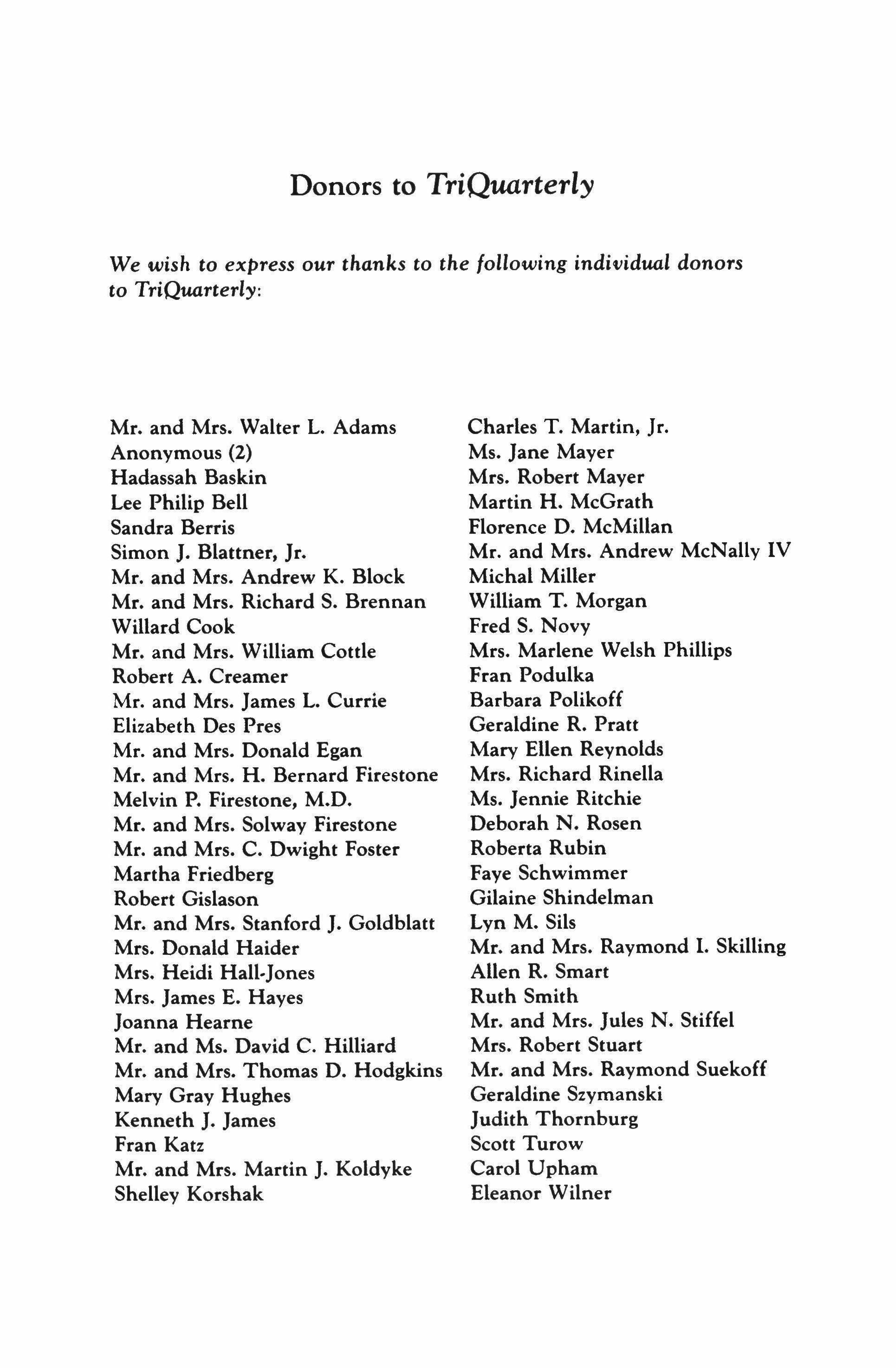
Mr. and Mrs. Walter L. Adams
Anonymous (2)
Hadassah Baskin
Lee Philip Bell
Sandra Berris
Simon J. Blattner, Jr.
Mr. and Mrs. Andrew K. Block
Mr. and Mrs. Richard S. Brennan
Willard Cook
Mr. and Mrs. William Cottle
Robert A. Creamer
Mr. and Mrs. James L. Currie
Elizabeth Des Pres
Mr. and Mrs. Donald Egan
Mr. and Mrs. H. Bernard Firestone
Melvin P. Firestone, M.D.
Mr. and Mrs. Solway Firestone
Mr. and Mrs. C. Dwight Foster
Martha Friedberg
Robert Gislason
Mr. and Mrs. Stanford J. Goldblatt
Mrs. Donald Haider
Mrs. Heidi Hall.Jones
Mrs. James E. Hayes
Joanna Hearne
Mr. and Ms. David C. Hilliard
Mr. and Mrs. Thomas D. Hodgkins
Mary Gray Hughes
Kenneth J. James
Fran Katz
Mr. and Mrs. Martin J. Koldvke
Shelley Korshak
Charles T. Martin, Jr.
Ms. Jane Mayer
Mrs. Robert Mayer
Martin H. McGrath
Florence D. McMillan
Mr. and Mrs. Andrew McNally IV
Michal Miller
William T. Morgan
Fred S. Novy
Mrs. Marlene Welsh Phillips
Fran Podulka
Barbara Polikoff
Geraldine R. Pratt
Mary Ellen Reynolds
Mrs. Richard Rinella
Ms. Jennie Ritchie
Deborah N. Rosen
Roberta Rubin
Faye Schwimmer
Gilaine Shindelman
Lyn M. Sils
Mr. and Mrs. Raymond 1. Skilling
Allen R. Smart
Ruth Smith
Mr. and Mrs. Jules N. Stiffel
Mrs. Robert Stuart
Mr. and Mrs. Raymond Suekoff
Geraldine Szymanski
Judith Thornburg
Scott Turow
Carol Upham
Eleanor Wilner
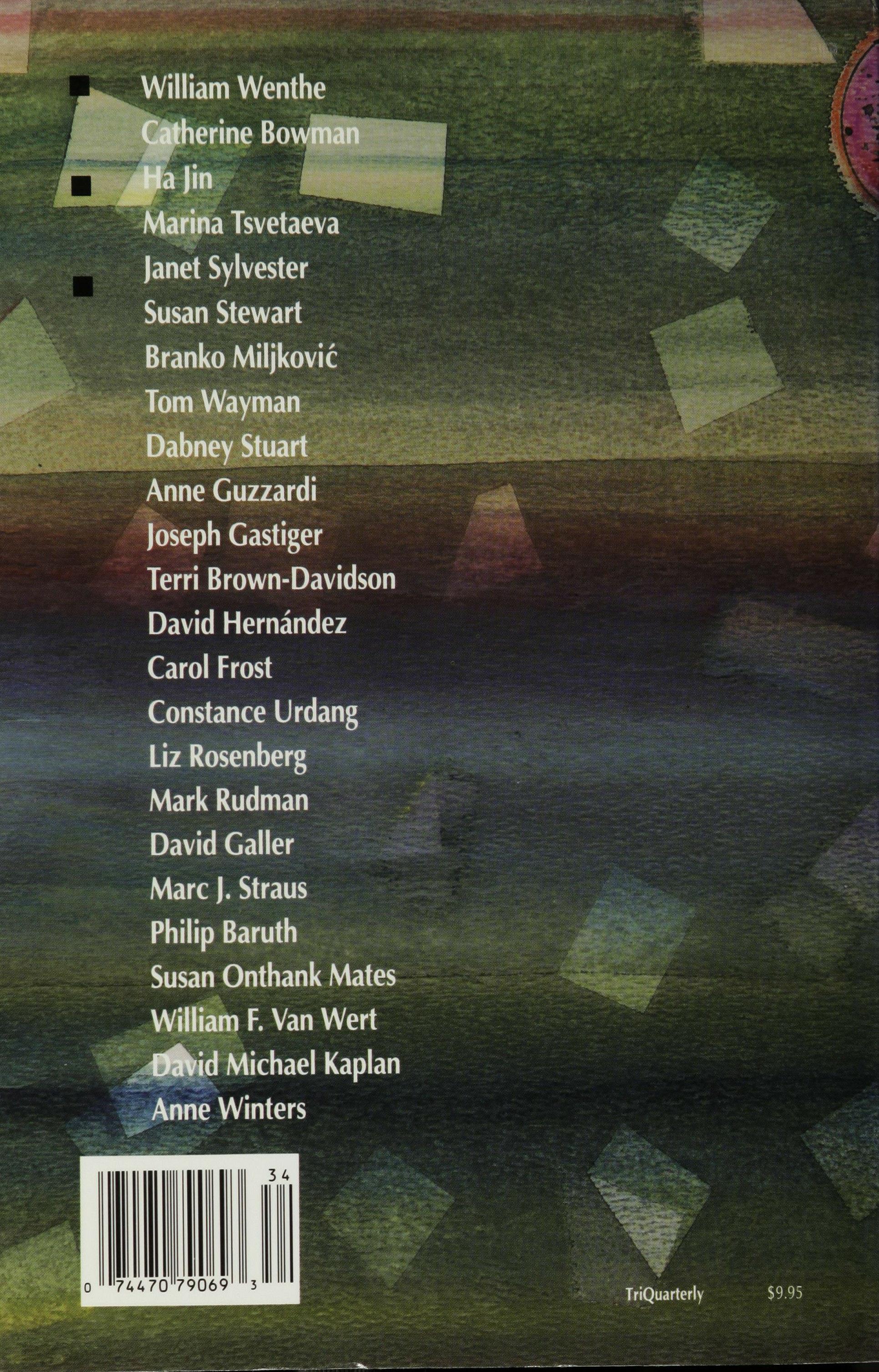

































 Translated by Gwenan Wilbur
Translated by Gwenan Wilbur











 Translated
Translated























































 Translated by James Hoggard
Translated by James Hoggard



















 Elvia Rodriguez: For Annabelle Lee
Elvia Rodriguez: For Annabelle Lee
 Joel Rendon: La calabera «Pinta," El perro agradecido, Caldo de hombre
Joel Rendon: La calabera «Pinta," El perro agradecido, Caldo de hombre
 Joel Rendon: A la contralucha, Tierra nueva, Origen de America
Joel Rendon: A la contralucha, Tierra nueva, Origen de America
































































 Nicolas de Jesus: El altar
Nicolas de Jesus: El altar
 Nicolas de Jesus: La llegada
Nicolas de Jesus: La llegada






















































































































































